




EDITOR
GUEST CO-EDITOR
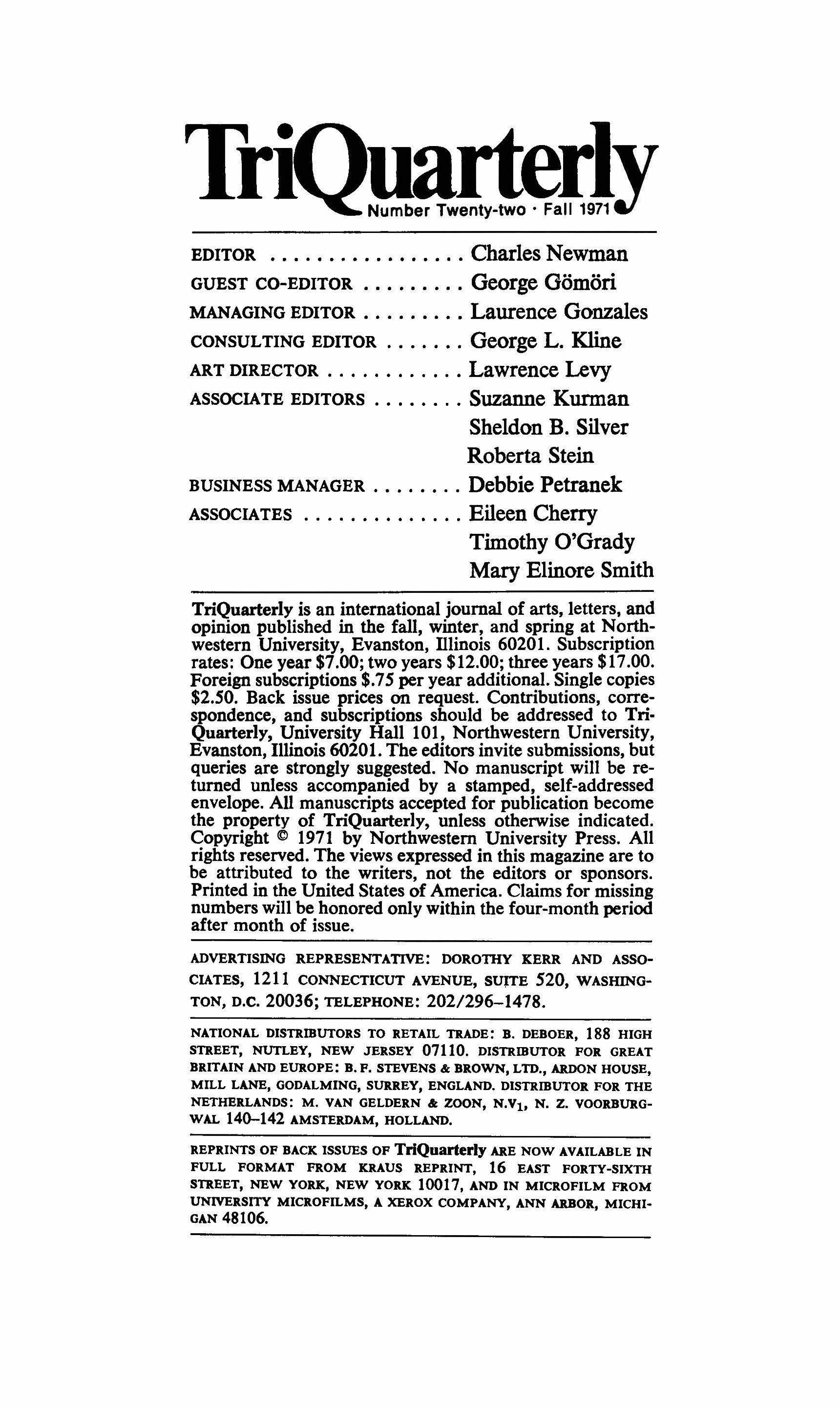
Charles Newman
George Oomori
MANAGING EDITOR Laurence Gonzales
CONSULTING EDITOR
George L. Kline
ART DIRECTOR Lawrence Levy
ASSOCIATE EDITORS
BUSINESS MANAGER
ASSOCIATES
Suzanne Kurman
Sheldon B. Silver
Roberta Stein
Debbie Petranek
Eileen Cherry
Timothy O'Grady
Mary Elinore Smith
TriQuarterly is an international journal of arts, letters, and opinion published in the fall, winter, and spring at Northwestern University, Evanston, llIinois 60201. Subscription rates: One year $7.00; two years $12.00; three years $17.00. Foreign subscriptions $.75 per year additional. Single copies $2.50. Back issue prices on request. Contributions, correspondence, and subscriptions should be addressed to TriQuarterly, University Hall 101, Northwestern University, Evanston, llIinois 60201. The editors invite SUbmissions, but queries are strongly suggested. No manuscript will be returned unless accompanied by a stamped, self-addressed envelope. All manuscripts accepted for publication become the property of TriQuarterly, unless otherwise indicated. Copyright e 1971 by Northwestern University Press. All rights reserved. The views expressed in this magazine are to be attributed to the writers, not the editors or sponsors. Printed in the United States of America. Claims for missing numbers will be honored only within the four-month period after month of issue.
ADVERTISING REPRESENTATIVE: DOR01HY KERR AND ASSOCIATES, 1211 CONNECTICUT AVENUE, SUJTE 520, WASHINGTON, D.C. 20036; TELEPHONE: 2021296-1478.
NATIONAL DlsTRmUTORS TO RETAIL TRADE: B. DEBOER, 188 HIGH STREET, NUTLEY, NEW JERSEY 07110. DISTRmUTOR FOR GREAT BRrrAIN AND EUROPE: B. F. STEVENS'" BROWN, LTD., ARDON HOUSE, MILL LANE, GODALMING, SURREY, ENGLAND. D1STRmUTOR FOR THE NETHERLANDS: M. VAN GELDERN '" zoox, N.V!> N. Z. VOORBURGWAL 140-142 AMSTERDAM, HOLLAND.
REPRINTS OF BACK ISSUES OF TriQuarterly ARE NOW AVAILABLE IN FULL FORMAT FROM KRAUS REPRINT, 16 EAST FORTY-SIXTH STREET, NEW YORK, NEW YORK 10017, AND IN MICROFILM FROM UNIVERSITY MICROFILMS, A XEROX COMPANY, ANN ARBOR, MICHIGAN 48106.
Foreword BY GEORGE GOMORI 4
Beyond revisionism: Leszek Kolakowski's recent philosophical development BY GEORGE L. KLINE 13
An epistemology of the striptease 49t
The psychoanalytic theory of culture 68
Historical understanding and the intelligibility of history 103
The philosophical role of the Reformation 118t
A stenographic report of the devil's metaphysical press conference in Warsaw, on the 20th of December, 1963 139t
Ethics without a moral code 154t
Two tales from Lailonia: The humps 183 The worst quarrel 191t
Solomon, or people as gods 196t
The beggar and the pretty girl205t
The epistemological significance of the aetiology of knowledge: a gloss on Mannheim 221
Selective bibliography 239

t These articles used by gcm�ous l1_ermis_sio_n_01 Grove Press.
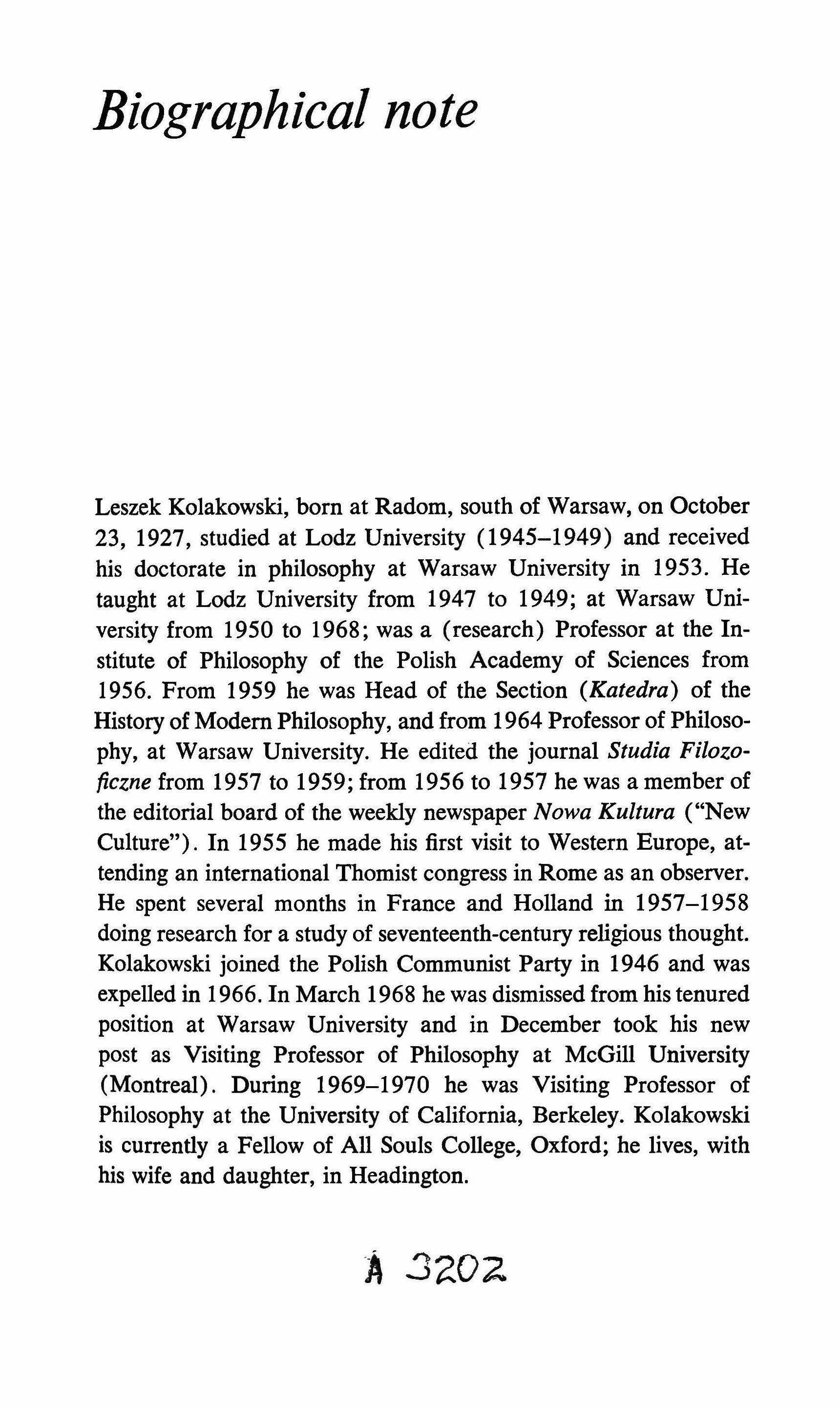
Leszek Kolakowski, born at Radom, south of Warsaw, on October 23, 1927, studied at Lodz University (1945-1949) and received his doctorate in philosophy at Warsaw University in 1953. He taught at Lodz University from 1947 to 1949; at Warsaw University from 1950 to 1968; was a (research) Professor at the Institute of Philosophy of the Polish Academy of Sciences from 1956. From 1959 he was Head of the Section (Katedra) of the History of Modem Philosophy, and from 1964 Professor of Philosophy, at Warsaw University. He edited the journal Studia Filozoficzne from 1957 to 1959; from 1956 to 1957 he was a member of the editorial board of the weekly newspaper Nowa Kultura ("New Culture"). In 1955 he made his first visit to Western Europe, attending an international Thomist congress in Rome as an observer. He spent several months in France and Holland in 1957-1958 doing research for a study of seventeenth-century religious thought. Kolakowski joined the Polish Communist Party in 1946 and was expelled in 1966. In March 1968 he was dismissed from his tenured position at Warsaw University and in December took his new post as Visiting Professor of Philosophy at McGill University (Montreal). During 1969-1970 he was Visiting Professor of Philosophy at the University of California, Berkeley. Kolakowski is currently a Fellow of All Souls College, Oxford; he lives, with his wife and daughter, in Headington.
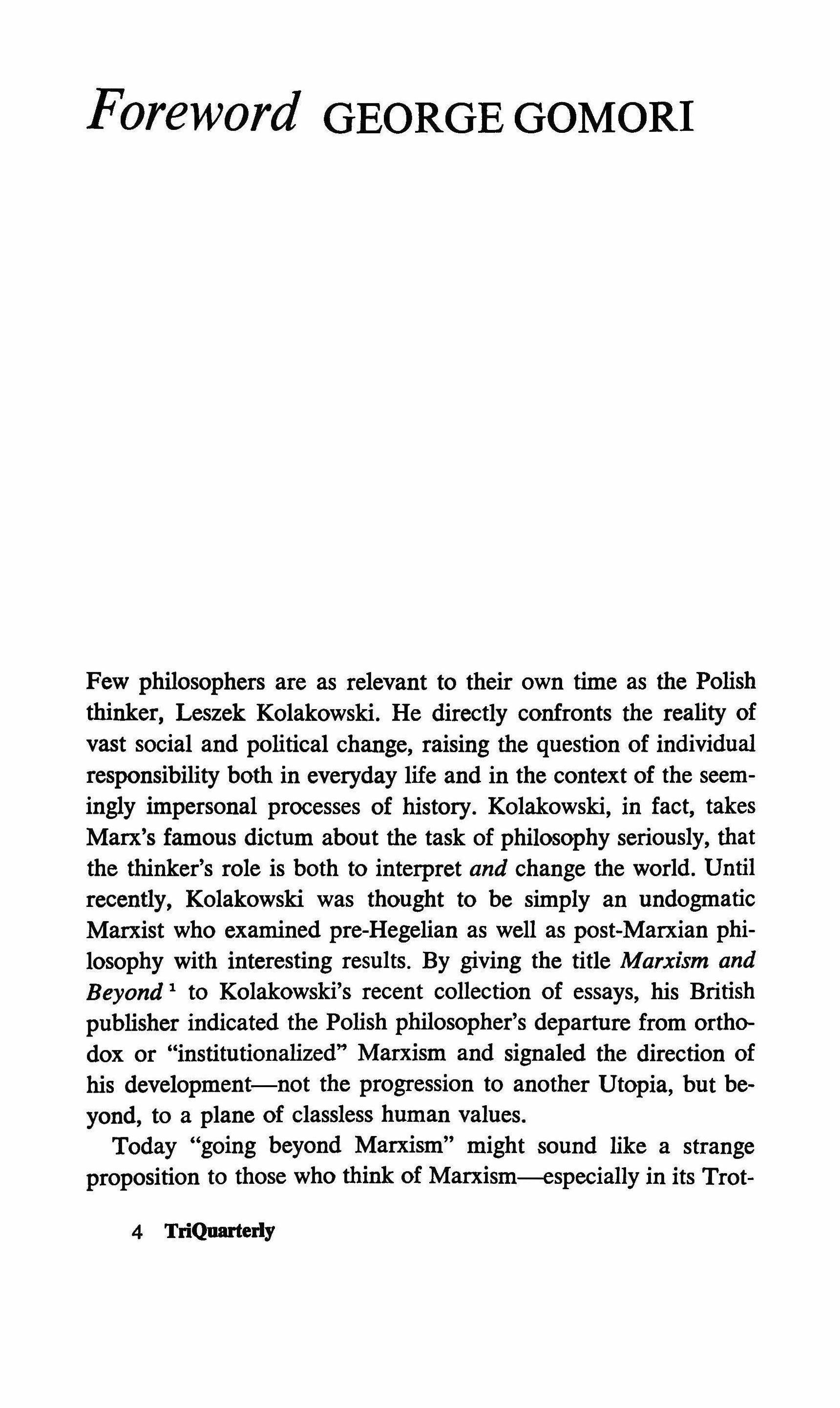
Few philosophers are as relevant to their own time as the Polish thinker, Leszek Kolakowski. He directly confronts the reality of vast social and political change, raising the question of individual responsibility both in everyday life and in the context of the seemingly impersonal processes of history. Kolakowski, in fact, takes Marx's famous dictum about the task of philosophy seriously, that the thinker's role is both to interpret and change the world. Until recently, Kolakowski was thought to be simply an undogmatic Marxist who examined pre-Hegelian as well as post-Marxian philosophy with interesting results. By giving the title Marxism and Beyond 1 to Kolakowski's recent collection of essays, his British publisher indicated the Polish philosopher's departure from orthodox or "institutionalized'" Marxism and signaled the direction of his development-not the progression to another Utopia, but beyond, to a plane of classless human values.
Today "going beyond Marxism" might sound like a strange proposition to those who think of Marxism-especially in its Trot-
4 TriQuarterly
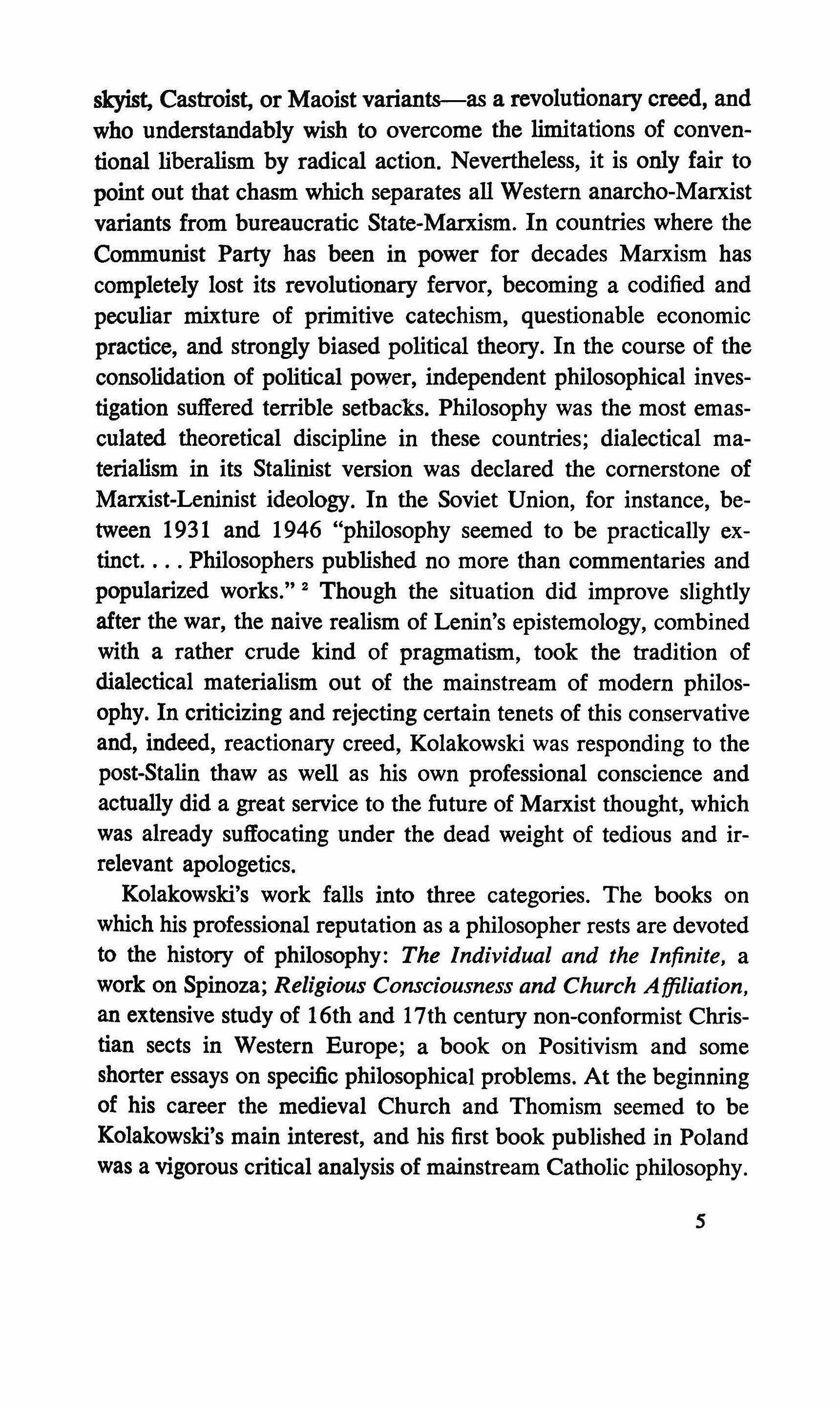
skyist, Castroist, or Maoist variants-as a revolutionary creed, and who understandably wish to overcome the limitations of conventionalliberalism by radical action. Nevertheless, it is only fair to point out that chasm which separates all Western anarcho-Marxist variants from bureaucratic State-Marxism. In countries where the Communist Party has been in power for decades Marxism has completely lost its revolutionary fervor, becoming a codified and peculiar mixture of primitive catechism, questionable economic practice, and strongly biased political theory. In the course of the consolidation of political power, independent philosophical investigation suffered terrible setbacks. Philosophy was the most emasculated theoretical discipline in these countries; dialectical materialism in its Stalinist version was declared the cornerstone of Marxist-Leninist ideology. In the Soviet Union, for instance, between 1931 and 1946 "philosophy seemed to be practically extinct. Philosophers published no more than commentaries and popularized works." 2 Though the situation did improve slightly after the war, the naive realism of Lenin's epistemology, combined with a rather crude kind of pragmatism, took the tradition of dialectical materialism out of the mainstream of modern philosophy. In criticizing and rejecting certain tenets of this conservative and, indeed, reactionary creed, Kolakowski was responding to the post-Stalin thaw as well as his own professional conscience and actually did a great service to the future of Marxist thought, which was already suffocating under the dead weight of tedious and irrelevant apologetics.
Kolakowski's work falls into three categories. The books on which his professional reputation as a philosopher rests are devoted to the history of philosophy: The Individual and the Infinite, a work on Spinoza; Religious Consciousness and Church Affiliation, an extensive study of 16th and 17th century non-conformist Christian sects in Western Europe; a book on Positivism and some shorter essays on specific philosophical problems. At the beginning of his career the medieval Church and Thomism seemed to be Kolakowski's main interest, and his first book published in Poland was a vigorous critical analysis of mainstream Catholic philosophy.
5
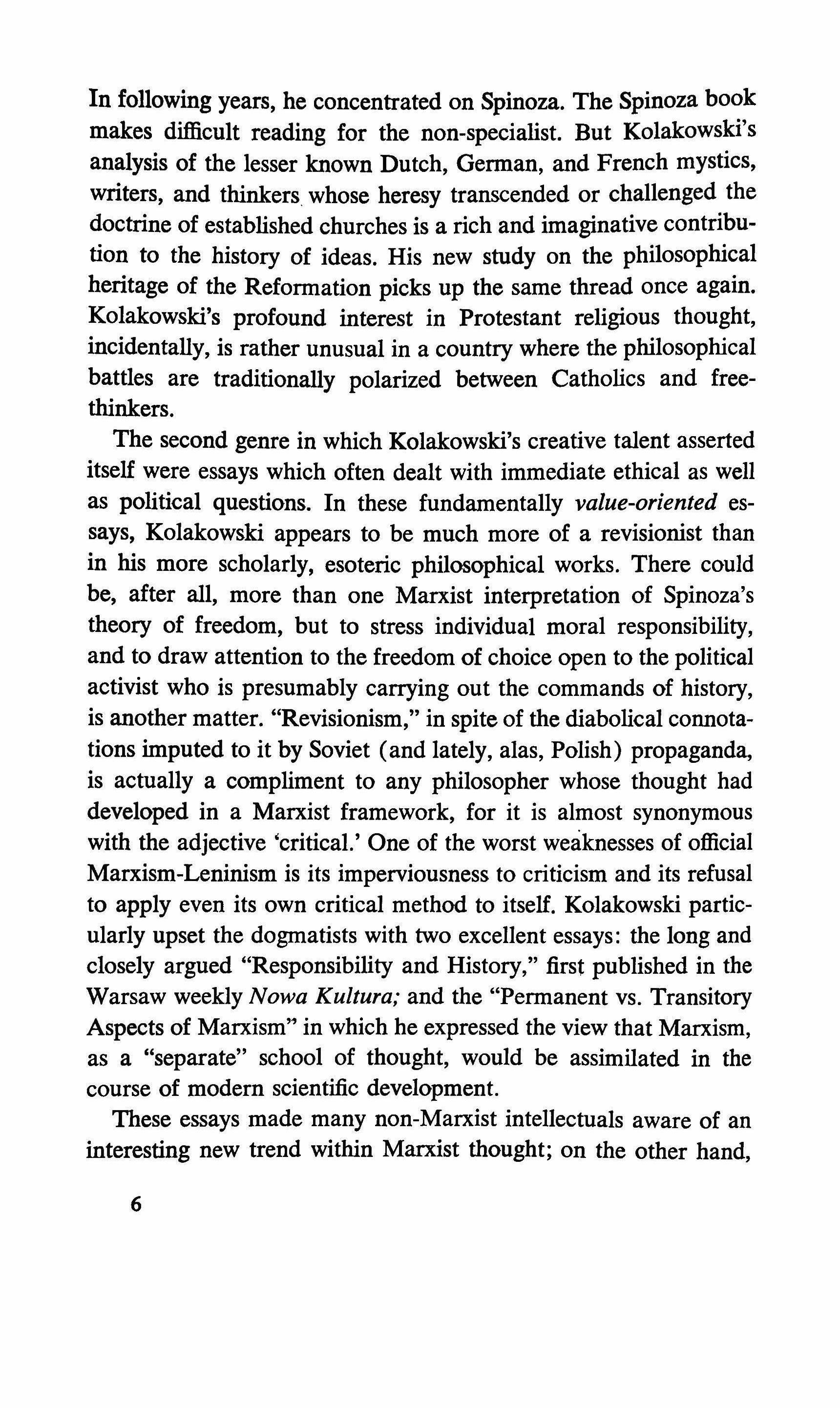
In following years, he concentrated on Spinoza. The Spinoza book makes difficult reading for the non-specialist. But Kolakowski's analysis of the lesser known Dutch, German, and French mystics, writers, and thinkers whose heresy transcended or challenged the doctrine of established churches is a rich and imaginative contribution to the history of ideas. His new study on the philosophical heritage of the Reformation picks up the same thread once again. Kolakowski's profound interest in Protestant religious thought, incidentally, is rather unusual in a country where the philosophical battles are traditionally polarized between Catholics and freethinkers.
The second genre in which Kolakowski's creative talent asserted itself were essays which often dealt with immediate ethical as well as political questions. In these fundamentally value-oriented essays, Kolakowski appears to be much more of a revisionist than in his more scholarly, esoteric philosophical works. There could be, after all, more than one Marxist interpretation of Spinoza's theory of freedom, but to stress individual moral responsibility, and to draw attention to the freedom of choice open to the political activist who is presumably carrying out the commands of history, is another matter. "Revisionism," in spite of the diabolical connotations imputed to it by Soviet (and lately, alas, Polish) propaganda, is actually a compliment to any philosopher whose thought had developed in a Marxist framework, for it is almost synonymous with the adjective 'critical.' One of the worst weaknesses of official Marxism-Leninism is its imperviousness to criticism and its refusal to apply even its own critical method to itself. Kolakowski particularly upset the dogmatists with two excellent essays: the long and closely argued "Responsibility and History," first published in the Warsaw weekly Nowa Kultura; and the "Permanent vs. Transitory Aspects of Marxism" in which he expressed the view that Marxism, as a "separate" school of thought, would be assimilated in the course of modern scientific development.
These essays made many non-Marxist intellectuals aware of an interesting new trend within Marxist thought; on the other hand,
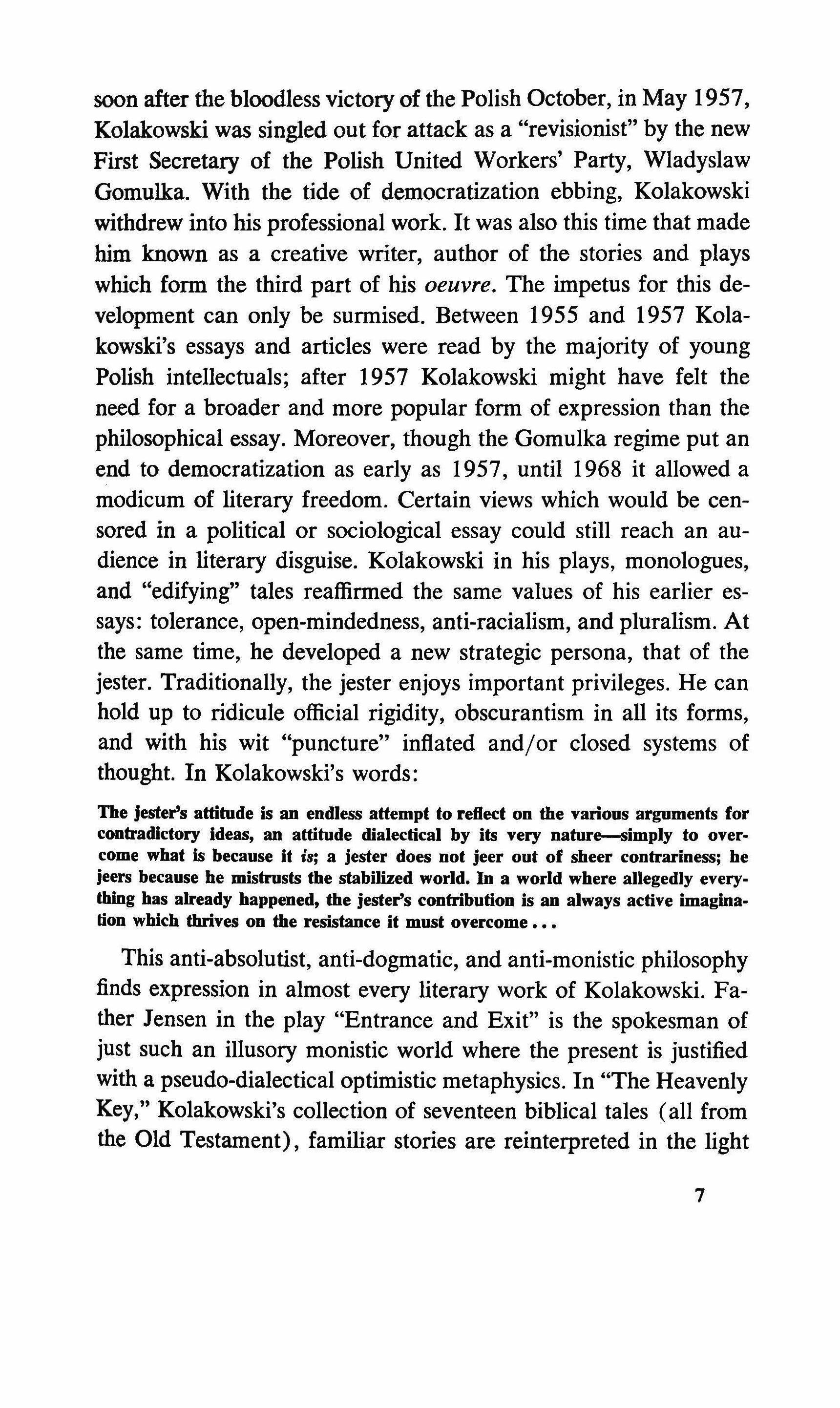
soon after the bloodless victory of the Polish October, in May 1957, Kolakowski was singled out for attack as a "revisionist" by the new First Secretary of the Polish United Workers' Party, Wladyslaw Gomulka. With the tide of democratization ebbing, Kolakowski withdrew into his professional work. It was also this time that made him known as a creative writer, author of the stories and plays which form the third part of his oeuvre. The impetus for this development can only be surmised. Between 1955 and 1957 Kolakowski's essays and articles were read by the majority of young Polish intellectuals; after 1957 Kolakowski might have felt the need for a broader and more popular form of expression than the philosophical essay. Moreover, though the Gomulka regime put an end to democratization as early as 1957, until 1968 it allowed a modicum of literary freedom. Certain views which would be censored in a political or sociological essay could still reach an audience in literary disguise. Kolakowski in his plays, monologues, and "edifying" tales reaffirmed the same values of his earlier essays: tolerance, open-mindedness, anti-racialism, and pluralism. At the same time, he developed a new strategic persona, that of the jester. Traditionally, the jester enjoys important privileges. He can hold up to ridicule official rigidity, obscurantism in all its forms, and with his wit "puncture" inflated and/or closed systems of thought. In Kolakowski's words:
The jester's attitude is an endless attempt to reflect on the various arguments for contradictory ideas, an attitude dialectical by its very nature--simply to overcome what is because it is; a jester does not jeer out of sheer contrariness; he jeers because he mistrusts the stabilized world. In a world where allegedly everything has already happened, the jester's contribution is an always active imagination which thrives on the resistance it must overcome
This anti-absolutist, anti-dogmatic, and anti-monistic philosophy finds expression in almost every literary work of Kolakowski. Father Jensen in the play "Entrance and Exit" is the spokesman of just such an illusory monistic world where the present is justified with a pseudo-dialectical optimistic metaphysics. In "The Heavenly Key," Kolakowski's collection of seventeen biblical tales (all from the Old Testament), familiar stories are reinterpreted in the light

of dialectical reason. In his first play, as well as in the "edifying" biblical tales, the author of "The Heavenly Key'" is extremely critical of the divine terror and manipulation which make God's (or his deputy's) power absolute. This criticism, however, is couched in metaphorical and ambiguous terms; it is not simply a positivist lashing out against Jehova, the unpredictable god of Abraham and his descendants, for the tale usually contains a wry comment on the failings of the human protagonists and a caustic analysis on the workings of power in general. As Kolakowski says, "the moral consequence of every action is completely unpredictable and can be understood and judged only after the fact."
Kolakowski's Satan is a brilliant dialectician and often argues his case with considerable skill, but God, whose power is built on the simpler principles of loyalty and obedience, usually has the last word. Each biblical tale has its unconventional moral, or morals, through which Kolakowski demonstrates the relativity of ethics and the uncertainty of truth. Among other things he proves (in the story of Job) that rational behavior in a non-rational context might be more futile than irrational behavior, and that the individual is essentially defenseless when he is confronted with irrational metaphysical demands. These tales discourage the reader from reaching any final moral, and are nothing less than brilliant exercises in dialectics.
Besides these biblical stories, Kolakowski has also written a series of "philosophical tales," Thirteen Tales from the Kingdom of Lailonia, consisting of short, amusing fables built around the antinomy "faith vs. reality," and the conflict between objective and subjective reality. Kolakowski's answers are on the whole ambiguous, though less so than in the biblical tales. In "The Worst Quarrel" he stresses the necessity of faith. In spite of dangers, inevitable setbacks, and defeats, man is driven by his hopes and desires "to find a better city." Hope survives historical stagnation and individual frustration. By taking into account the experience of his predecessors, man can begin again, perhaps with a greater chance of success. 8
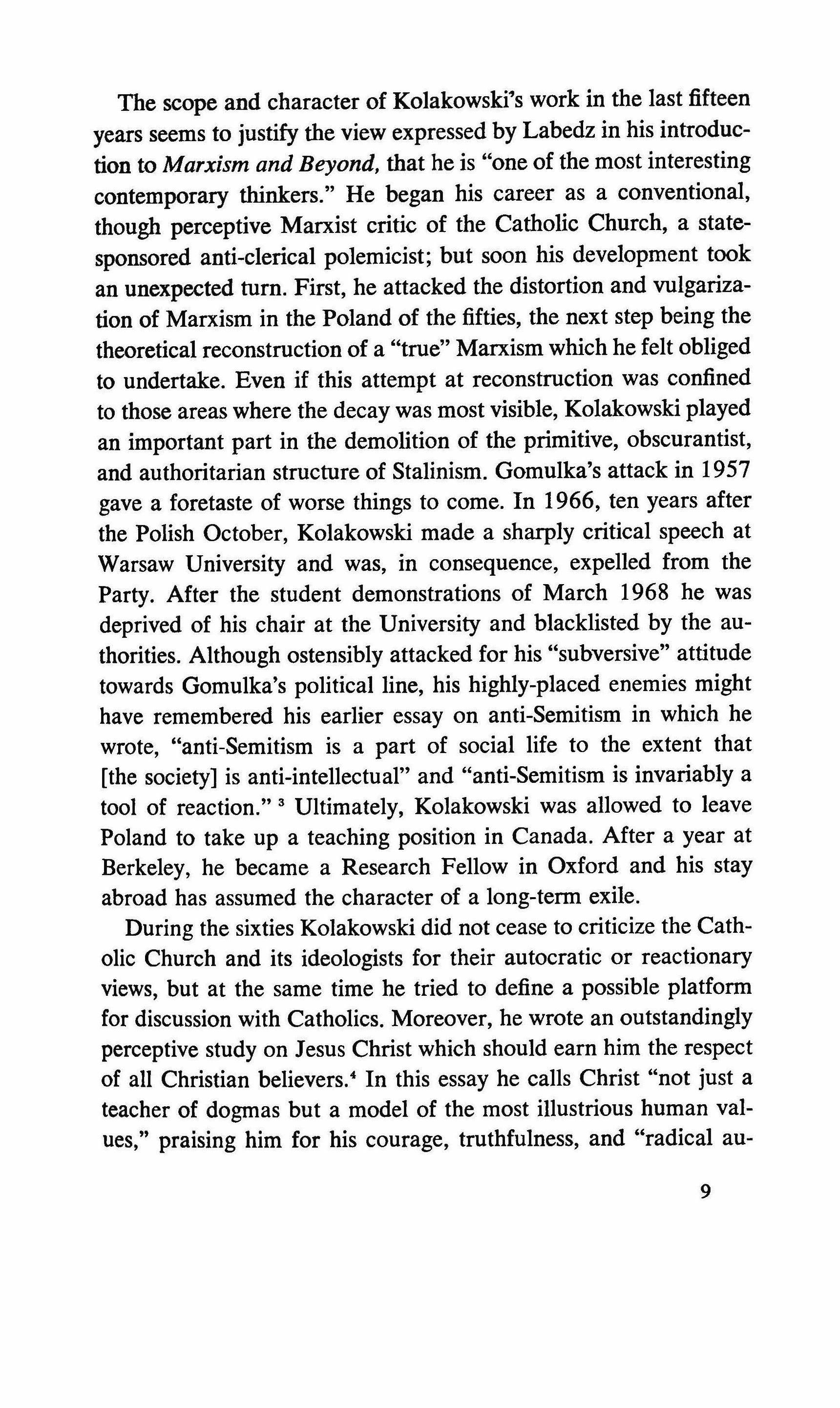
The scope and character of Kolakowski's work in the last fifteen years seems to justify the view expressed by Labedz in his introduction to Marxism and Beyond, that he is "one of the most interesting contemporary thinkers." He began his career as a conventional, though perceptive Marxist critic of the Catholic Church, a statesponsored anti-clerical polemicist; but soon his development took an unexpected turn. First, he attacked the distortion and vulgarization of Marxism in the Poland of the fifties, the next step being the theoretical reconstruction of a "true" Marxism which he felt obliged to undertake. Even if this attempt at reconstruction was confined to those areas where the decay was most visible, Kolakowski played an important part in the demolition of the primitive, obscurantist, and authoritarian structure of Stalinism. Gomulka's attack in 1957 gave a foretaste of worse things to come. In 1966, ten years after the Polish October, Kolakowski made a sharply critical speech at Warsaw University and was, in consequence, expelled from the Party. After the student demonstrations of March 1968 he was deprived of his chair at the University and blacklisted by the authorities. Although ostensibly attacked for his "subversive" attitude towards Gomulka's political line, his highly-placed enemies might have remembered his earlier essay on anti-Semitism in which he wrote, "anti-Semitism is a part of social life to the extent that [the society] is anti-intellectual" and "anti-Semitism is invariably a tool of reaction." 3 Ultimately, Kolakowski was allowed to leave Poland to take up a teaching position in Canada. After a year at Berkeley, he became a Research Fellow in Oxford and his stay abroad has assumed the character of a long-term exile.
During the sixties Kolakowski did not cease to criticize the Catholic Church and its ideologists for their autocratic or reactionary views, but at the same time he tried to define a possible platform for discussion with Catholics. Moreover, he wrote an outstandingly perceptive study on Jesus Christ which should earn him the respect of all Christian believers.' In this essay he calls Christ "not just a teacher of dogmas but a model of the most illustrious human values," praising him for his courage, truthfulness, and "radical au-
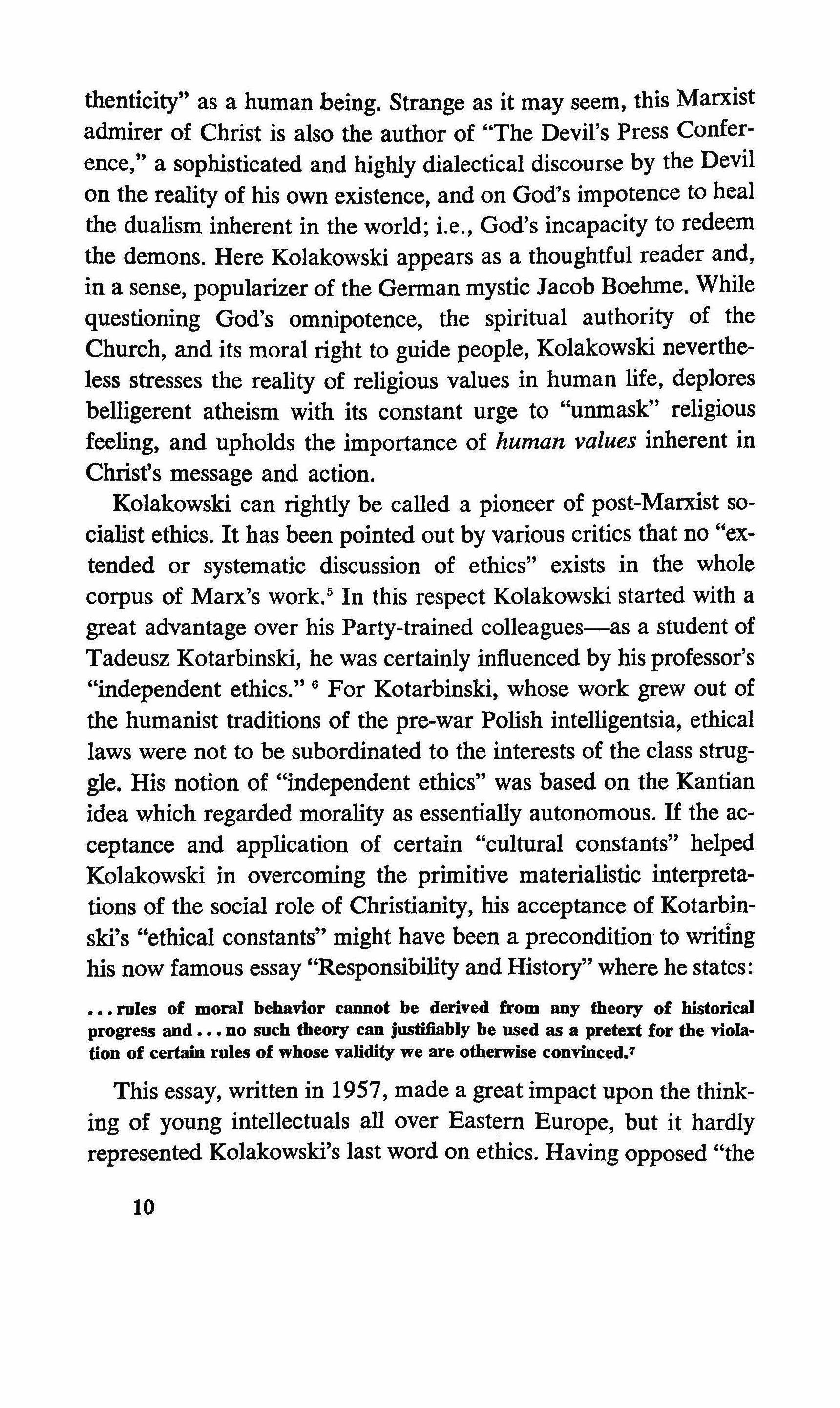
thenticity" as a human being. Strange as it may seem, this Marxist admirer of Christ is also the author of "The Devil's Press Conference," a sophisticated and highly dialectical discourse by the Devil on the reality of his own existence, and on God's impotence to heal the dualism inherent in the world; i.e., God's incapacity to redeem the demons. Here Kolakowski appears as a thoughtful reader and, in a sense, popularizer of the German mystic Jacob Boehme. While questioning God's omnipotence, the spiritual authority of the Church, and its moral right to guide people, Kolakowski nevertheless stresses the reality of religious values in human life, deplores belligerent atheism with its constant urge to "unmask" religious feeling, and upholds the importance of human values inherent in Christ's message and action.
Kolakowski can rightly be called a pioneer of post-Marxist socialist ethics. It has been pointed out by various critics that no "extended or systematic discussion of ethics" exists in the whole corpus of Marx's work." In this respect Kolakowski started with a great advantage over his Party-trained colleagues-as a student of Tadeusz Kotarbinski, he was certainly influenced by his professor's "independent ethics." 6 For Kotarbinski, whose work grew out of the humanist traditions of the pre-war Polish intelligentsia, ethical laws were not to be subordinated to the interests of the class struggle. His notion of "independent ethics" was based on the Kantian idea which regarded morality as essentially autonomous. If the acceptance and application of certain "cultural constants" helped Kolakowski in overcoming the primitive materialistic interpretations of the social role of Christianity, his acceptance of Kotarbinski's "ethical constants" might have been a precondition to writing his now famous essay "Responsibility and History" where he states: rules of moral behavior cannot be derived from any theory of historical progress and no such theory can justifiably be used as a pretext for the violation of certain rules of whose validity we are otherwise convinced.1
This essay, written in 1957, made a great impact upon the thinking of young intellectuals all over Eastern Europe, but it hardly represented Kolakowski's last word on ethics. Having opposed "the

duty of individual choice to an opportunistic philosophy of history masquerading as realism," he went even further, moving away from Kant towards Fichte, from Spinoza towards Pascal. In the essay "Ethics Without a Moral Code," published in 1962, he rejected any set of moral rules which allows the individual to shun responsibility for his own decision and which is most likely to confirm him in fanatical convictions--"liquidating in his consciousness that element of uncertainty which makes the co-existence of incompatible opinions at all possible." 8 Much preferable to any moral code is a world "full of holes" where every single decision has to be taken freely and independently without reference to a higher set or system of previously accepted values. In other words, Kolakowski's ethical vision is existential without being existentialist, rational though not necessarily rationalistic, and is in a state of constant flux and revision. With every decision we choose new values; paradoxically, only this seeming inconsistency can assure us a degree of consistency in making the right decisions.
Kolakowski's work abounds in paradoxes and is not exempt from contradictions. The main question asked by his Western critics is whether he accepts the priority of social progress over moral values or vice versa. Kline calls this the dilemma of Kantian Marxism." Yet in view of Kolakowski's development in recent years, it is perhaps reasonable to say that he has resolved this dilemma. He is now much closer to Pascal (and in some respects even to Kierkegaard) and more responsive to the essence of authentic existential thought than he has ever been. While postulating an "act of faith" in the possibility of a man-made history, Kolakowski appears to be much less certain about the inevitability and direction of historical progress. Man should be a free agent, he should create his own destiny. Yet his liberation from the dead hand of the past, from external and internal constraints, is a difficult and contradictory process open to unexpected setbacks and pseudo-liberation. Most significant perhaps is his insistence that a classless and free society is guaranteed neither by science nor by history.
For all his recent emphasis on faith and individual responsibility,
Kolakowski is a major figure of the Second Enlightenment. This is a movement more limited in its scope than the first, its claims are more modest and it concerns only those huge authoritarian structures which still exist in the middle of our century: the Catholic Church and the Communist Party. The first Enlightenment wanted to free mankind from "prejudice and superstition"; this is also the aim of Kolakowski, who wants us to reject all myths and dogmas (however convenient), and to give up our "infantile love" of authority. This might well be the gist of his message: You cannot love both truth and authority, you have to choose-without dogmas, often rethinking your own premises. Kolakowski's is a philosophy for grownups.
Notes:
1. This collection contains the same essays as the American edition, Toward a Marxist Humanism, published by Grove Press. Labedz' introduction appears only in the English edition,
2. I. M. Bochenski, Contemporary European Philosophy, University of California Press, 1964, p. 63.
3. Leszek Kolakowski, Swiatopoglad I zycie codzienne, Warsaw, 1957, pp. 165, 170.
4. See full text in TriQuarterly 9, Spring 1967, pp. 65-77.
5. E. Kamenka, Marxism and Ethics, Macmillan, London, 1969, p. 6.
6. Kotarbinski's views are discussed in detail in Henryk Skolimowski's Polish Analytical Philosophy, Routledge and Kegan Paul, London, 1967.
7. Leszek Kolakowski, Marxism and Beyond, Pall Mall Press, London, 1969, p. 173.
8. Leszek Kolakowski, Kultura I Jetysze, Warsaw, 1967, pp. 178-179. See TrlQuarterly 22, p. 175.
9. European Philosophy Today, ed, George L. Kline, Quadrangle, Chicago, 1965, p. 149.

George Gomar! studied in Budapest and at Oxford. Since 1969 he has been teaching Polish at the University of Cambridge. He co-edited New Writing of East Europe (Chicago, 1968) with Charles Newman and most recently contributed to a handbook on the Soviet Union and Eastern Europe (Anthony Blond, London). Mr. Gomori was co-editor of TriQuarterly 9. He is a native 0/ Hungary.
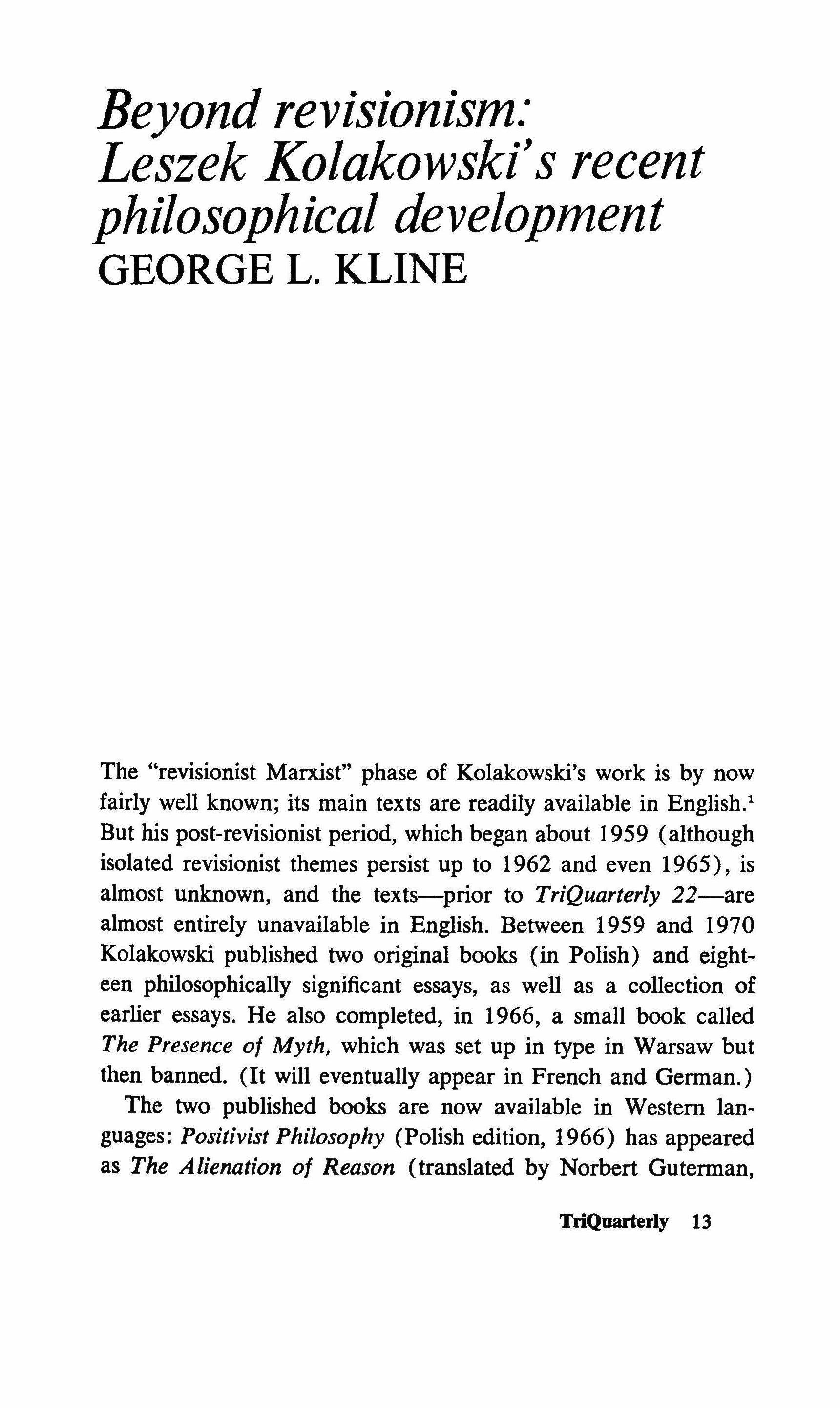
The "revisionist Marxist" phase of Kolakowski's work is by now fairly well known; its main texts are readily available in English.' But his post-revisionist period, which began about 1959 (although isolated revisionist themes persist up to 1962 and even 1965), is almost unknown, and the texts-prior to TriQuarterly 22-are almost entirely unavailable in English. Between 1959 and 1970 Kolakowski published two original books (in Polish) and eighteen philosophically significant essays, as well as a collection of earlier essays. He also completed, in 1966, a small book called The Presence of Myth, which was set up in type in Warsaw but then banned. (It will eventually appear in French and German.)
The two published books are now available in Western languages: Positivist Philosophy (Polish edition, 1966) has appeared as The Alienation of Reason (translated by Norbert Guterman, TrlQuarterly 13
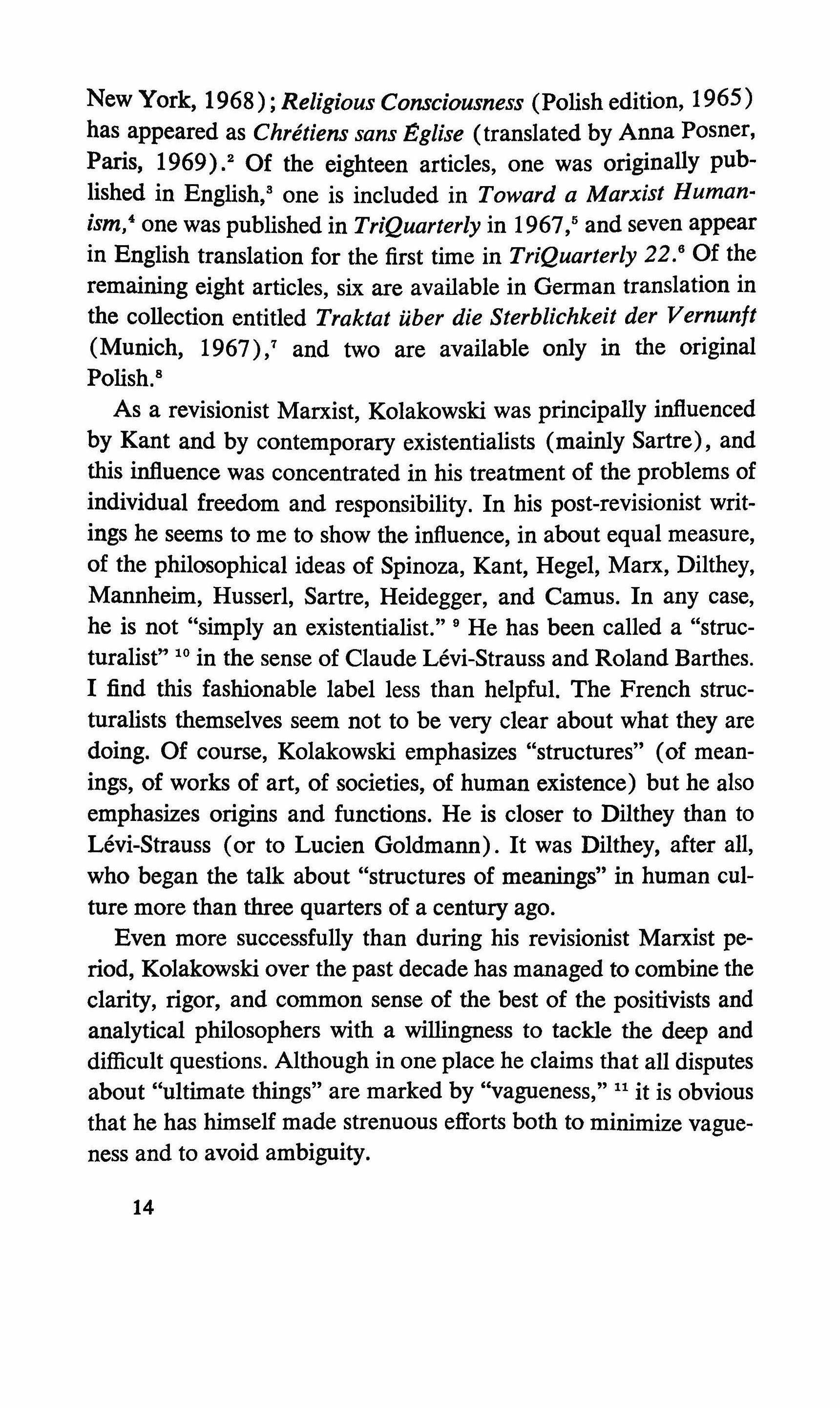
New York, 1968); Religious Consciousness (Polish edition, 1965) has appeared as Chretiens sans Eglise (translated by Anna Posner, Paris, 1969).2 Of the eighteen articles, one was originally published in English," one is included in Toward a Marxist Humanism,' one was published in TriQuarterly in 1967,5 and seven appear in English translation for the first time in TriQuarterly 22.6 Of the remaining eight articles, six are available in German translation in the collection entitled Traktat tiber die Sterblichkeit der Vemunjt (Munich, 1967)/ and two are available only in the original Polish.s
As a revisionist Marxist, Kolakowski was principally influenced by Kant and by contemporary existentialists (mainly Sartre), and this influence was concentrated in his treatment of the problems of individual freedom and responsibility. In his post-revisionist writings he seems to me to show the influence, in about equal measure, of the philosophical ideas of Spinoza, Kant, Hegel, Marx, Dilthey, Mannheim, Husserl, Sartre, Heidegger, and Camus. In any case, he is not "simply an existentialist." 9 He has been called a "structuralist" 10 in the sense of Claude Levi-Strauss and Roland Barthes. I find this fashionable label less than helpful. The French structuralists themselves seem not to be very clear about what they are doing. Of course, Kolakowski emphasizes "structures" (of meanings, of works of art, of societies, of human existence) but he also emphasizes origins and functions. He is closer to Dilthey than to Levi-Strauss (or to Lucien Goldmann). It was Dilthey, after all, who began the talk about "structures of meanings" in human culture more than three quarters of a century ago. Even more successfully than during his revisionist Marxist period, Kolakowski over the past decade has managed to combine the clarity, rigor, and common sense of the best of the positivists and analytical philosophers with a willingness to tackle the deep and difficult questions. Although in one place he claims that all disputes about "ultimate things" are marked by "vagueness," 11 it is obvious that he has himself made strenuous efforts both to minimize vagueness and to avoid ambiguity.
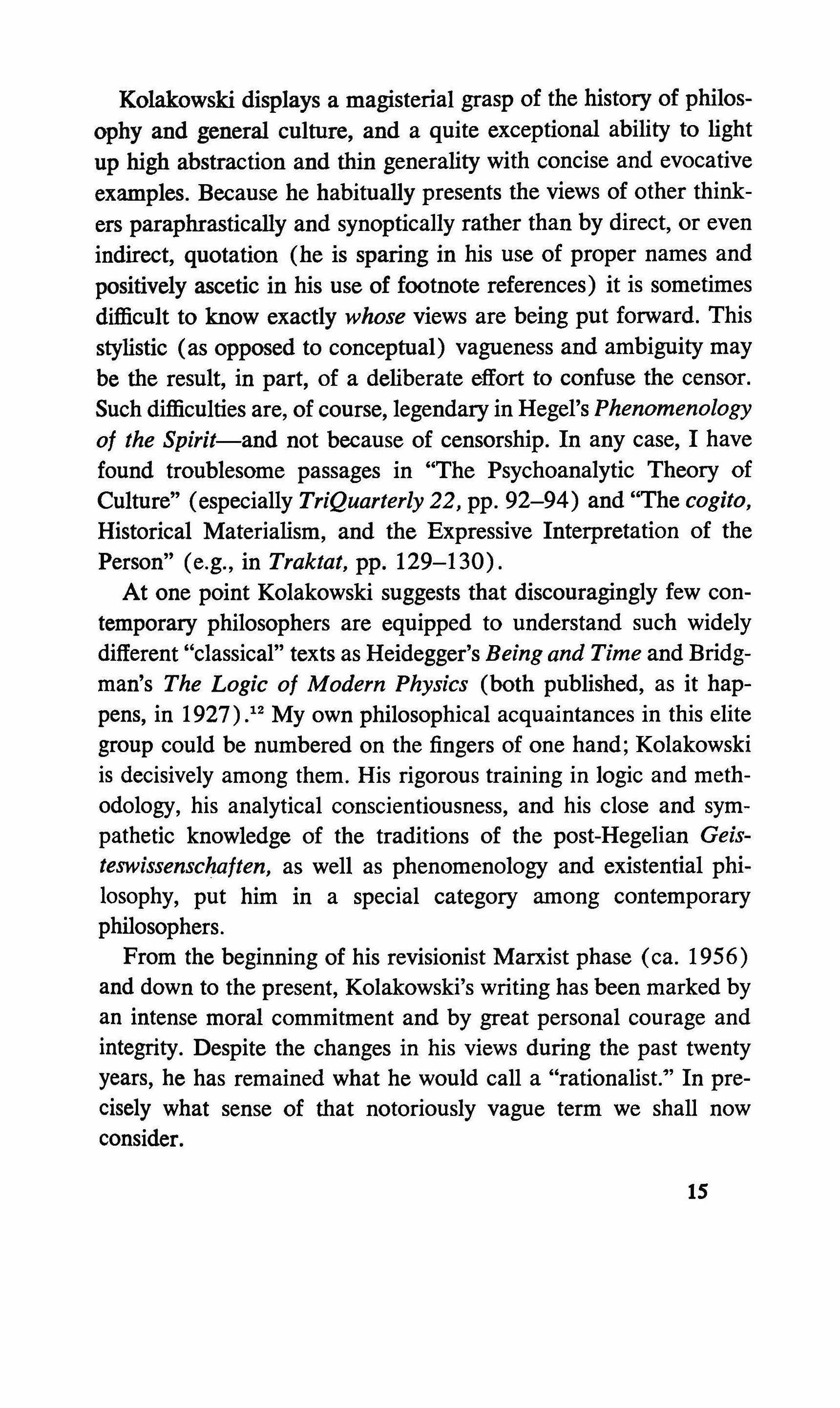
Kolakowski displays a magisterial grasp of the history of philosophy and general culture, and a quite exceptional ability to light up high abstraction and thin generality with concise and evocative examples. Because he habitually presents the views of other thinkers paraphrastically and synoptically rather than by direct, or even indirect, quotation (he is sparing in his use of proper names and positively ascetic in his use of footnote references) it is sometimes difficult to know exactly whose views are being put forward. This stylistic (as opposed to conceptual) vagueness and ambiguity may be the result, in part, of a deliberate effort to confuse the censor. Such difficulties are, of course, legendary in Hegel's Phenomenology of the Spirit-and not because of censorship. In any case, I have found troublesome passages in "The Psychoanalytic Theory of Culture" (especially TriQuarterly 22, pp. 92-94) and "The cogito, Historical Materialism, and the Expressive Interpretation of the Person" (e.g., in Traktat, pp. 129-130).
At one point Kolakowski suggests that discouragingly few contemporary philosophers are equipped to understand such widely different "classical" texts as Heidegger's Being and Time and Bridgman's The Logic of Modern Physics (both published, as it happens, in 1927) .12 My own philosophical acquaintances in this elite group could be numbered on the fingers of one hand; Kolakowski is decisively among them. His rigorous training in logic and methodology, his analytical conscientiousness, and his close and sympathetic knowledge of the traditions of the post-Hegelian Gelsteswissenschaften, as well as phenomenology and existential philosophy, put him in a special category among contemporary philosophers.
From the beginning of his revisionist Marxist phase (ca. 1956) and down to the present, Kolakowski's writing has been marked by an intense moral commitment and by great personal courage and integrity. Despite the changes in his views during the past twenty years, he has remained what he would call a "rationalist." In precisely what sense of that notoriously vague term we shall now consider.
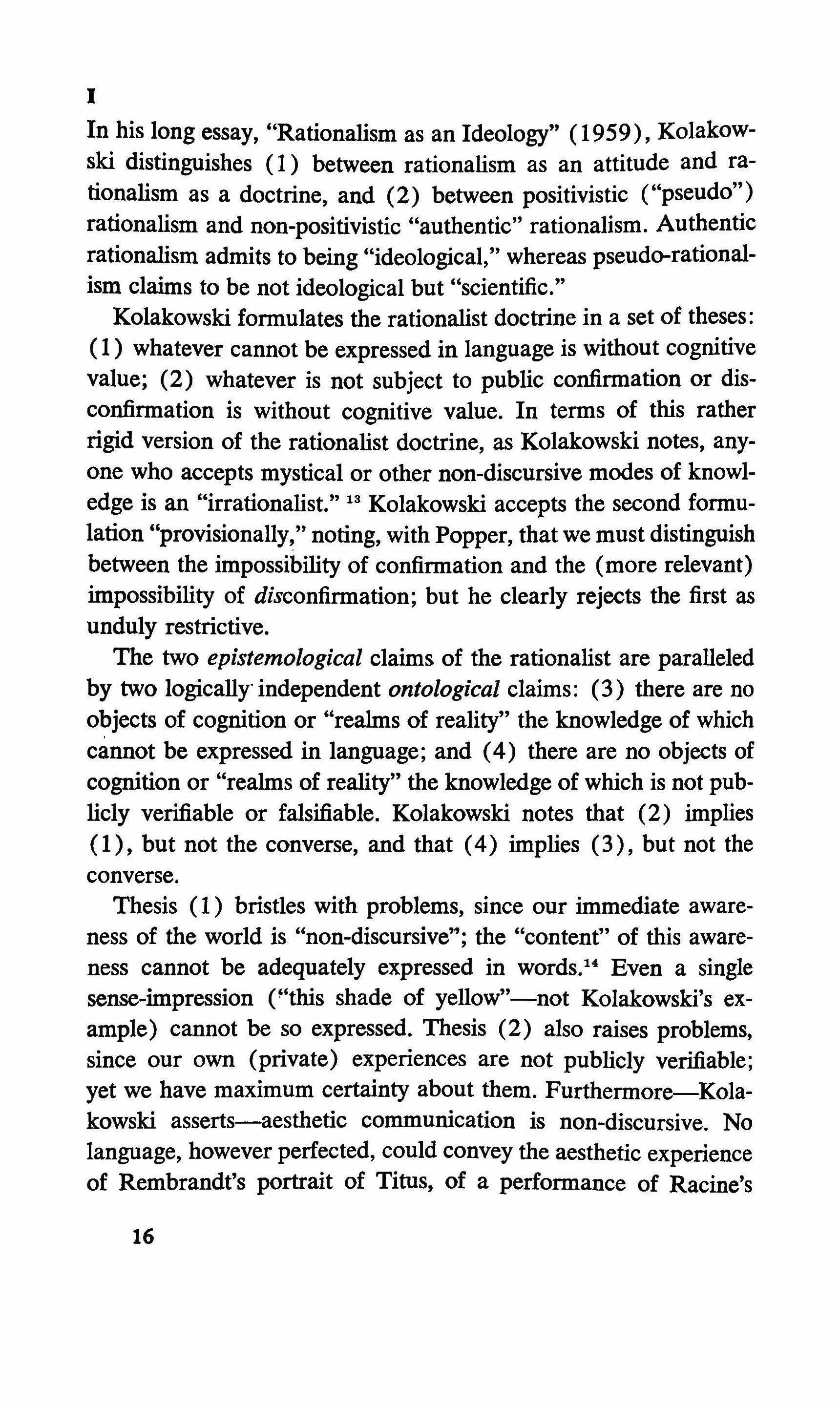
In his long essay, "Rationalism as an Ideology" (1959), Kolakowski distinguishes (1) between rationalism as an attitude and rationalism as a doctrine, and (2) between positivistic ("pseudo") rationalism and non-positivistic "authentic" rationalism. Authentic rationalism admits to being "ideological," whereas pseudo-rationalism claims to be not ideological but "scientific."
Kolakowski formulates the rationalist doctrine in a set of theses: ( 1) whatever cannot be expressed in language is without cognitive value; (2) whatever is not subject to public confirmation or disconfirmation is without cognitive value. In terms of this rather rigid version of the rationalist doctrine, as Kolakowski notes, anyone who accepts mystical or other non-discursive modes of knowledge is an "irrationalist." 13 Kolakowski accepts the second formulation "provisionally," noting, with Popper, that we must distinguish between the impossibility of confirmation and the (more relevant) impossibility of disconfirmation; but he clearly rejects the first as unduly restrictive.
The two epistemological claims of the rationalist are paralleled by two logically'independent ontological claims: (3) there are no objects of cognition or "realms of reality" the knowledge of which cannot be expressed in language; and (4) there are no objects of cognition or "realms of reality" the knowledge of which is not publicly verifiable or falsifiable. Kolakowski notes that (2) implies (1), but not the converse, and that (4) implies (3), but not the converse.
Thesis (1) bristles with problems, since our immediate awareness of the world is "non-discursive"; the "content" of this awareness cannot be adequately expressed in words," Even a single sense-impression C'tbis shade of yellow"-not Kolakowski's example) cannot be so expressed. Thesis (2) also raises problems, since our own (private) experiences are not publicly verifiable; yet we have maximum certainty about them. Furthermore-Kolakowski asserts-aesthetic communication is non-discursive. No language, however perfected, could convey the aesthetic experience of Rembrandt's portrait of Titus, of a performance of Racine's
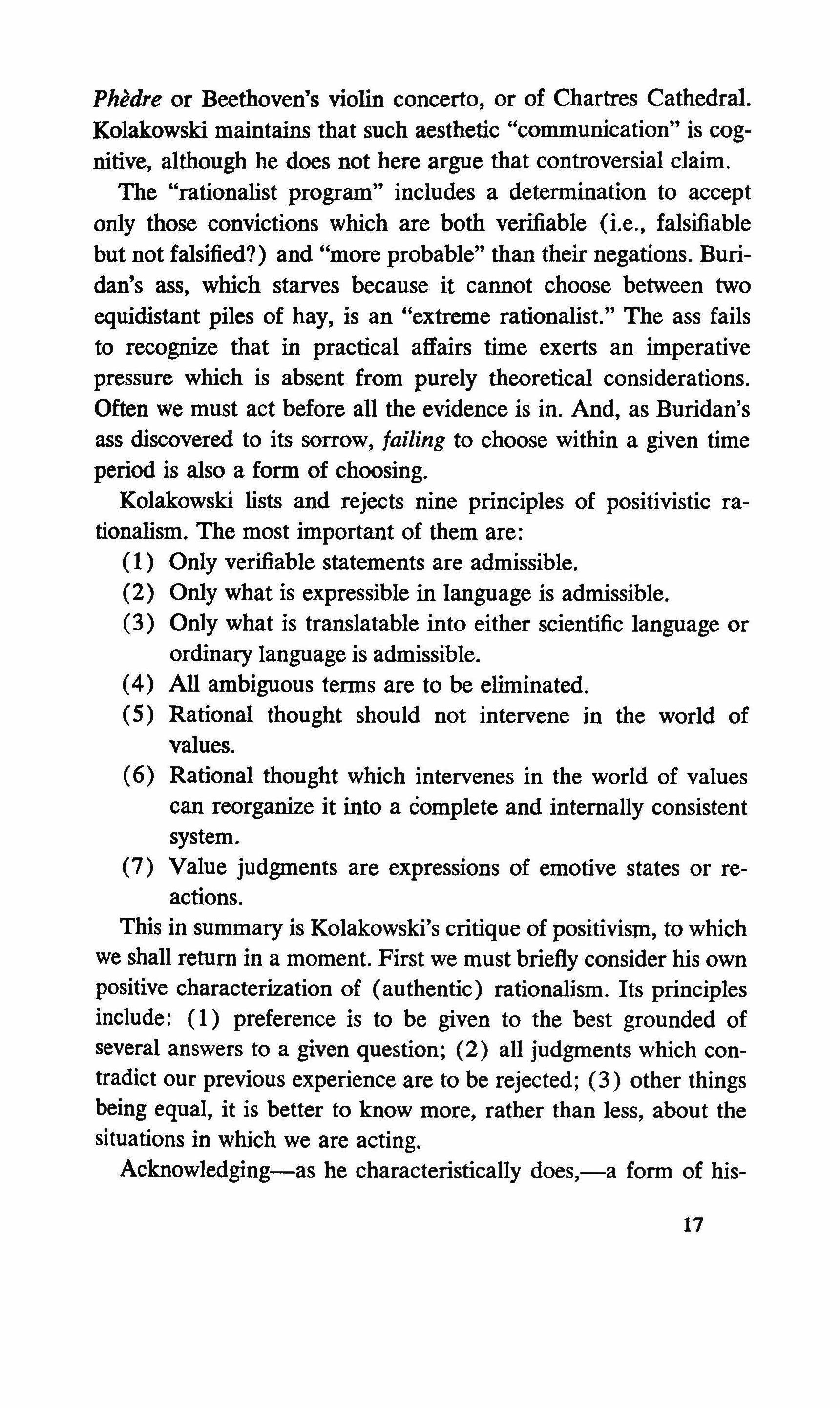
Phedre or Beethoven's violin concerto, or of Chartres Cathedral. Kolakowski maintains that such aesthetic "communication" is cognitive, although he does not here argue that controversial claim.
The "rationalist program" includes a determination to accept only those convictions which are both verifiable (i.e., falsifiable but not falsified?) and "more probable" than their negations. Buridan's ass, which starves because it cannot choose between two equidistant piles of hay, is an "extreme rationalist." The ass fails to recognize that in practical affairs time exerts an imperative pressure which is absent from purely theoretical considerations. Often we must act before all the evidence is in. And, as Buridan's ass discovered to its sorrow, failing to choose within a given time period is also a form of choosing.
Kolakowski lists and rejects nine principles of positivistic rationalism. The most important of them are:
(1) Only verifiable statements are admissible.
(2) Only what is expressible in language is admissible.
(3) Only what is translatable into either scientific language or ordinary language is admissible.
(4) All ambiguous terms are to be eliminated.
(5) Rational thought should not intervene in the world of values.
(6) Rational thought which intervenes in the world of values can reorganize it into a complete and internally consistent system.
(7) Value judgments are expressions of emotive states or reactions.
This in summary is Kolakowski's critique of positivism, to which we shall return in a moment. First we must briefly consider his own positive characterization of (authentic) rationalism. Its principles include: ( 1) preference is to be given to the best grounded of several answers to a given question; (2) all judgments which contradict our previous experience are to be rejected; (3) other things being equal, it is better to know more, rather than less, about the situations in which we are acting.
Acknowledging-as he characteristically does,-a form of his17
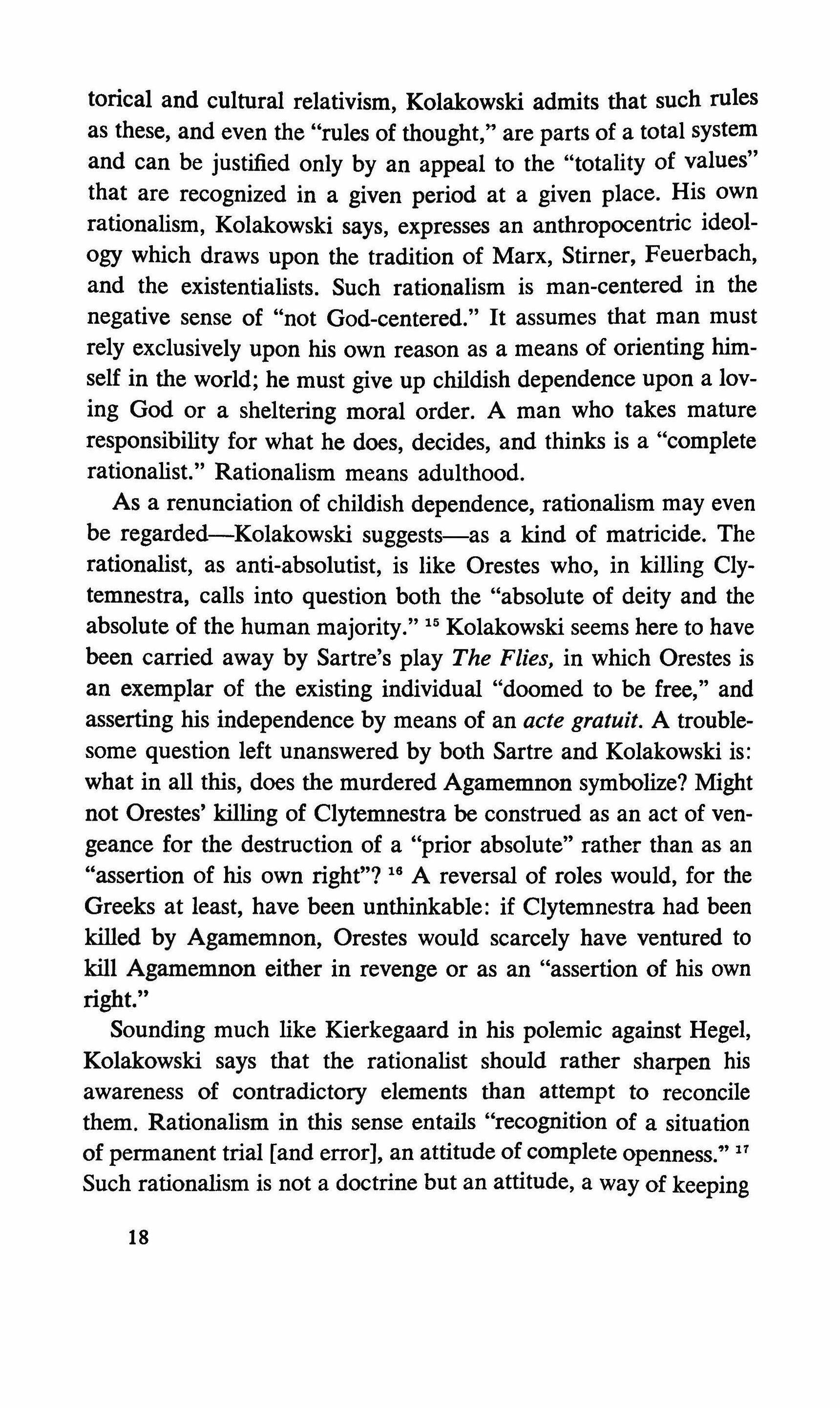
torical and cultural relativism, Kolakowski admits that such rules as these, and even the "rules of thought," are parts of a total system and can be justified only by an appeal to the "totality of values" that are recognized in a given period at a given place. His own rationalism, Kolakowski says, expresses an anthropocentric ideology which draws upon the tradition of Marx, Stirner, Feuerbach, and the existentialists. Such rationalism is man-centered in the negative sense of "not God-centered." It assumes that man must rely exclusively upon his own reason as a means of orienting himself in the world; he must give up childish dependence upon a loving God or a sheltering moral order. A man who takes mature responsibility for what he does, decides, and thinks is a "complete rationalist." Rationalism means adulthood.
As a renunciation of childish dependence, rationalism may even be regarded-Kolakowski suggests-as a kind of matricide. The rationalist, as anti-absolutist, is like Orestes who, in killing Clytemnestra, calls into question both the "absolute of deity and the absolute of the human majority." 15 Kolakowski seems here to have been carried away by Sartre's play The Flies, in which Orestes is an exemplar of the existing individual "doomed to be free," and asserting his independence by means of an acte gratuit. A troublesome question left unanswered by both Sartre and Kolakowski is: what in all this, does the murdered Agamemnon symbolize? Might not Orestes' killing of Clytemnestra be construed as an act of vengeance for the destruction of a "prior absolute" rather than as an "assertion of his own right"? 16 A reversal of roles would, for the Greeks at least, have been unthinkable: if Clytemnestra had been killed by Agamemnon, Orestes would scarcely have ventured to kill Agamemnon either in revenge or as an "assertion of his own right."
Sounding much like Kierkegaard in his polemic against Hegel, Kolakowski says that the rationalist should rather sharpen his awareness of contradictory elements than attempt to reconcile them. Rationalism in this sense entails "recognition of a situation of permanent trial [and error], an attitude of complete openness." 17 Such rationalism is not a doctrine but an attitude, a way of keeping
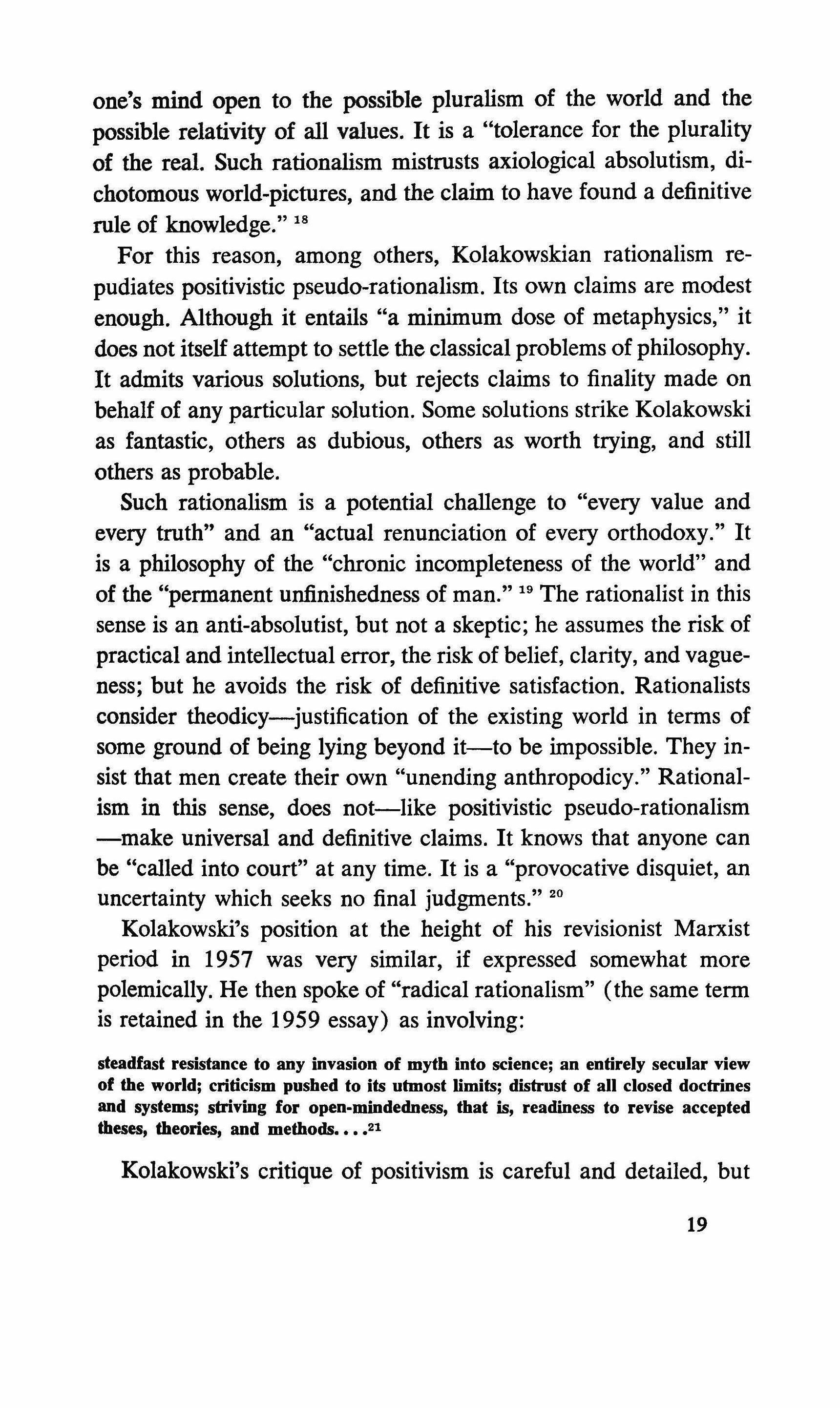
one's mind open to the possible pluralism of the world and the possible relativity of all values. It is a "tolerance for the plurality of the real. Such rationalism mistrusts axiological absolutism, dichotomous world-pictures, and the claim to have found a definitive rule of knowledge." 18
For this reason, among others, Kolakowskian rationalism repudiates positivistic pseudo-rationalism. Its own claims are modest enough. Although it entails "a minimum dose of metaphysics," it does not itself attempt to settle the classical problems of philosophy. It admits various solutions, but rejects claims to finality made on behalf of any particular solution. Some solutions strike Kolakowski as fantastic, others as dubious, others as worth trying, and still others as probable.
Such rationalism is a potential challenge to "every value and every truth" and an "actual renunciation of every orthodoxy." It is a philosophy of the "chronic incompleteness of the world" and of the "permanent unfinishedness of man." 19 The rationalist in this sense is an anti-absolutist, but not a skeptic; he assumes the risk of practical and intellectual error, the risk of belief, clarity, and vagueness; but he avoids the risk of definitive satisfaction. Rationalists consider theodicy-justification of the existing world in terms of some ground of being lying beyond it-to be impossible. They insist that men create their own "unending anthropodicy." Rationalism in this sense, does not-like positivistic pseudo-rationalism -make universal and definitive claims. It knows that anyone can be "called into court" at any time. It is a "provocative disquiet, an uncertainty which seeks no final judgments." 20
Kolakowski's position at the height of his revisionist Marxist period in 1957 was very similar, if expressed somewhat more polemically. He then spoke of "radical rationalism" (the same term is retained in the 1959 essay) as involving:
steadfast resistance to any invasion of myth into science; an entirely secular view of the world; criticism pushed to its utmost limits; distrust of all closed doctrines and systems; striving for open-mindedness, that is, readiness to revise accepted theses, theories, and methods 21
Kolakowski's critique of positivism is careful and detailed, but 19
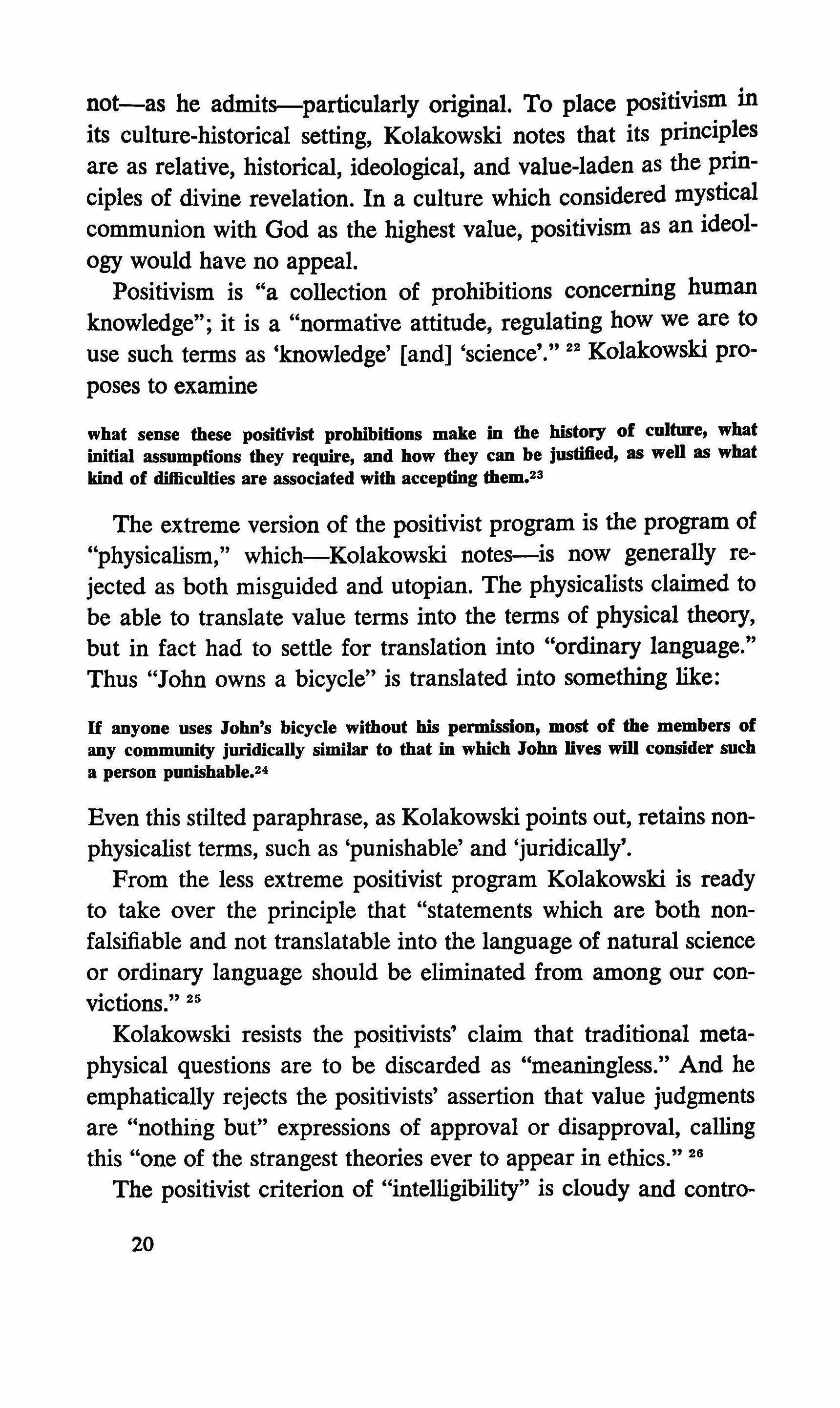
not-as he admits-particularly original. To place positivism in its culture-historical setting, Kolakowski notes that its principles are as relative, historical, ideological, and value-laden as the principles of divine revelation. In a culture which considered mystical communion with God as the highest value, positivism as an ideology would have no appeal.
Positivism is "a collection of prohibitions concerning human knowledge"; it is a "normative attitude, regulating how we are to use such terms as 'knowledge' [and] 'science'." 22 Kolakowski proposes to examine
what sense these positivist prohibitions make in the history of culture, what initial assumptions they require, and how they can be justified, as well as what kind of difficulties are associated with accepting them.23
The extreme version of the positivist program is the program of "physicalism," which-Kolakowski notes-is now generally rejected as both misguided and utopian. The physicalists claimed to be able to translate value terms into the terms of physical theory, but in fact had to settle for translation into "ordinary language." Thus "John owns a bicycle" is translated into something like:
H anyone uses John's bicycle without his permission, most of the members of any community juridically similar to that in which John lives will consider such a person punishable.24
Even this stilted paraphrase, as Kolakowski points out, retains nonphysicalist terms, such as 'punishable' and 'juridically'.
From the less extreme positivist program Kolakowski is ready to take over the principle that "statements which are both nonfalsifiable and not translatable into the language of natural science or ordinary language should be eliminated from among our convictions." 25
Kolakowski resists the positivists' claim that traditional metaphysical questions are to be discarded as "meaningless." And he emphatically rejects the positivists' assertion that value judgments are "nothing but" expressions of approval or disapproval, calling this "one of the strangest theories ever to appear in ethics." 26
The positivist criterion of "intelligibility" is cloudy and contra20
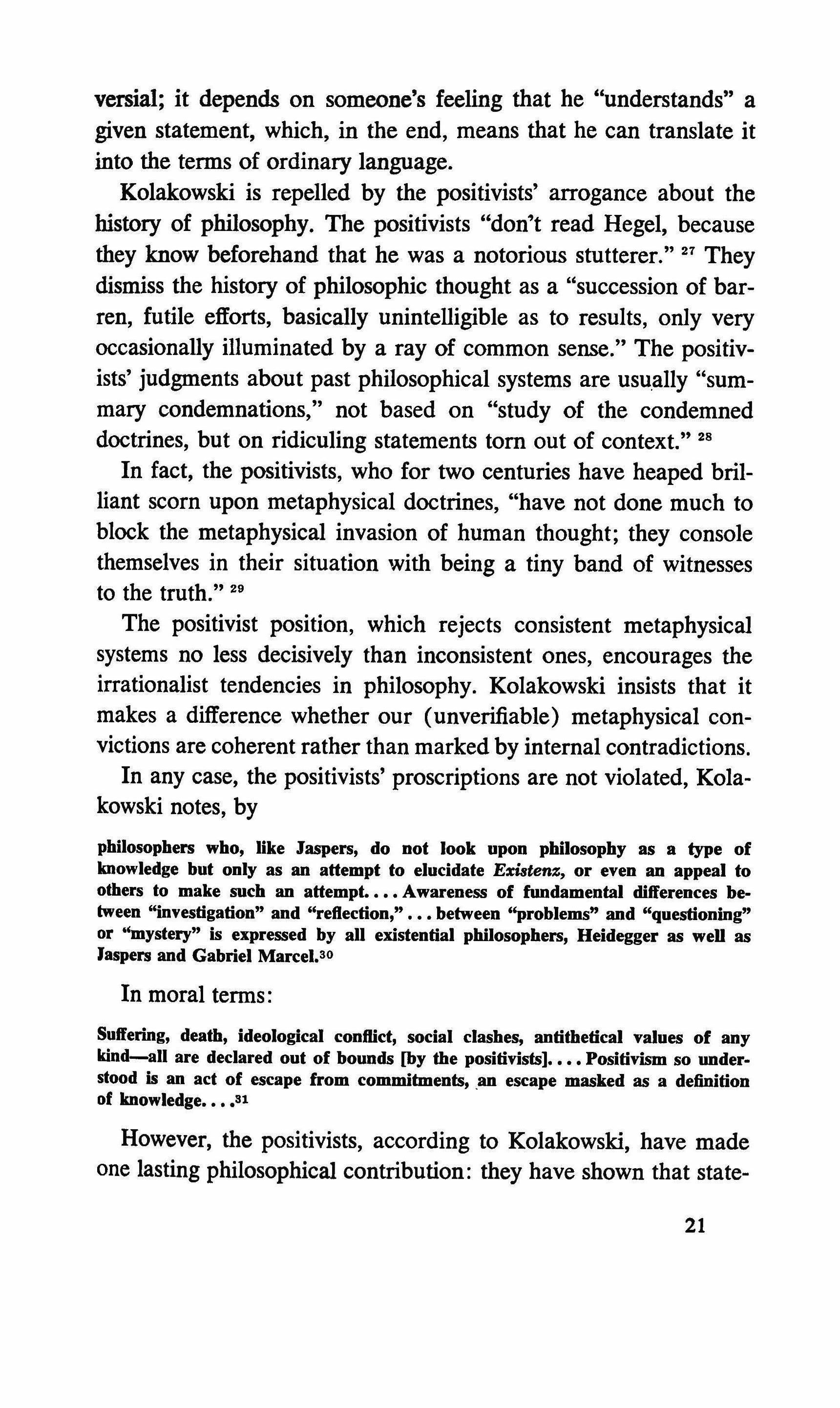
versial; it depends on someone's feeling that he "understands" a given statement, which, in the end, means that he can translate it into the terms of ordinary language.
Kolakowski is repelled by the positivists' arrogance about the history of philosophy. The positivists "don't read Hegel, because they know beforehand that he was a notorious stutterer." 21 They dismiss the history of philosophic thought as a "succession of barren, futile efforts, basically unintelligible as to results, only very occasionally illuminated by a ray of common sense." The positivists' judgments about past philosophical systems are usually "summary condemnations," not based on "study of the condemned doctrines, but on ridiculing statements tom out of context." 28
In fact, the positivists, who for two centuries have heaped brilliant scorn upon metaphysical doctrines, "have not done much to block the metaphysical invasion of human thought; they console themselves in their situation with being a tiny band of witnesses to the truth." 29
The positivist position, which rejects consistent metaphysical systems no less decisively than inconsistent ones, encourages the irrationalist tendencies in philosophy. Kolakowski insists that it makes a difference whether our (unverifiable) metaphysical convictions are coherent rather than marked by internal contradictions.
In any case, the positivists' proscriptions are not violated, Kolakowski notes, by philosophers who, like Jaspers, do not look upon philosophy as a type of knowledge but only as an attempt to elucidate Emtenz, or even an appeal to others to make such an attempt Awareness of fundamental differences between "investigation" and "reftection," between ''problems'' and "questioning" or "mystery" is expressed by all existential philosophers, Heidegger as well as Jaspers and Gabriel Marcel.30
In moral terms:
Suffering, death, ideological conflict, social clashes, antithetical values of any kind-all are declared out of bounds [by the positivists) Positivism so understood is an act of escape from commitments, ,an escape masked as a definition of knowledge 81
However, the positivists, according to Kolakowski, have made one lasting philosophical contribution: they have shown that state-
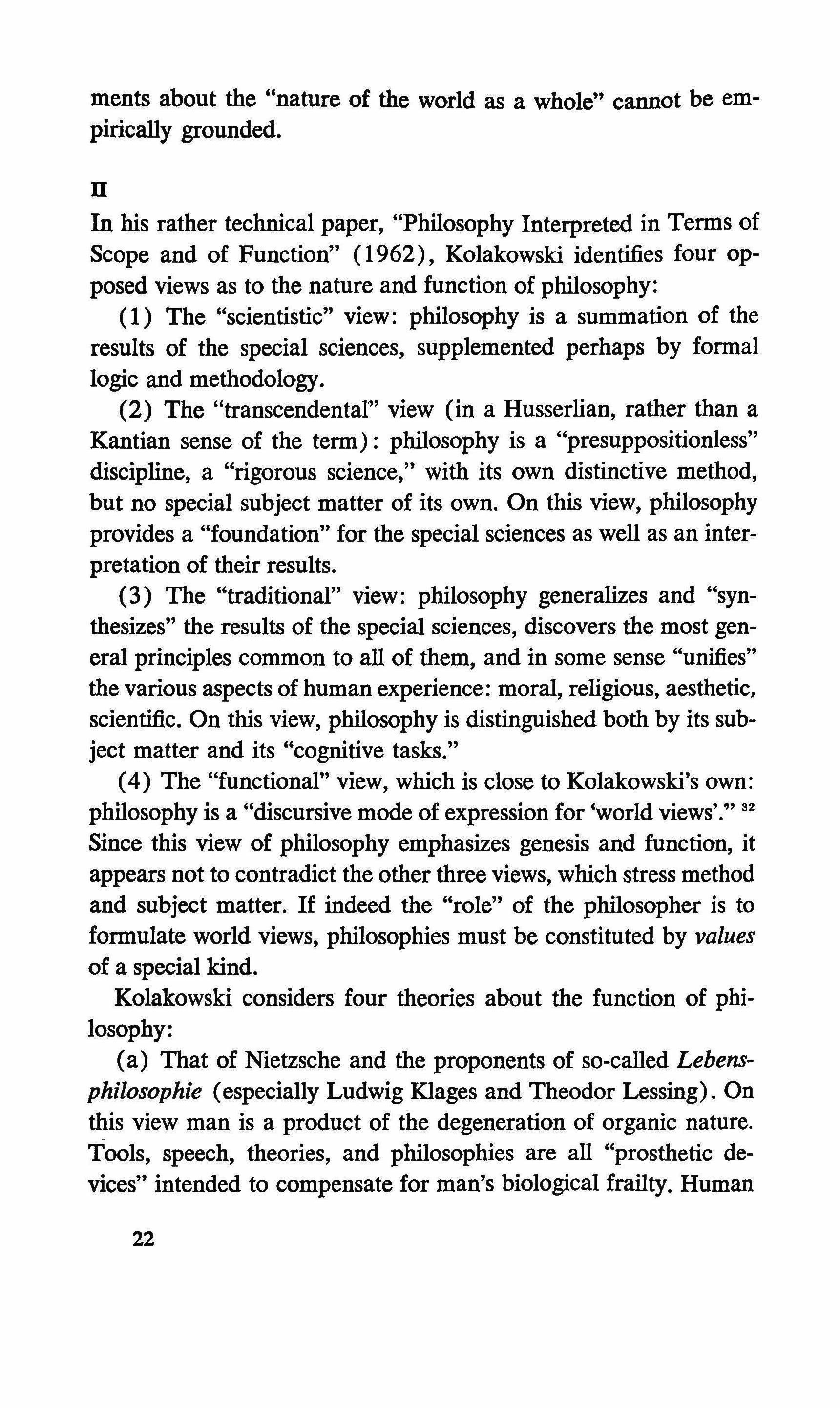
ments about the "nature of the world as a whole" cannot be empirically grounded.
n
In his rather technical paper, "Philosophy Interpreted in Terms of Scope and of Function" (1962), Kolakowski identifies four opposed views as to the nature and function of philosophy:
(1) The "scientistic" view: philosophy is a summation of the results of the special sciences, supplemented perhaps by formal logic and methodology.
(2) The "transcendental" view (in a Husserlian, rather than a Kantian sense of the term): philosophy is a "presuppositionless" discipline, a "rigorous science," with its own distinctive method, but no special subject matter of its own. On this view, philosophy provides a "foundation" for the special sciences as well as an interpretation of their results.
(3) The "traditional" view: philosophy generalizes and "synthesizes" the results of the special sciences, discovers the most general principles common to all of them, and in some sense "unifies" the various aspects of human experience: moral, religious, aesthetic, scientific. On this view, philosophy is distinguished both by its subject matter and its "cognitive tasks."
(4) The "functional" view, which is close to Kolakowski's own: philosophy is a "discursive mode of expression for 'world views'." 32 Since this view of philosophy emphasizes genesis and function, it appears not to contradict the other three views, which stress method and subject matter. If indeed the "role" of the philosopher is to formulate world views, philosophies must be constituted by values of a special kind.
Kolakowski considers four theories about the function of philosophy:
(a) That of Nietzsche and the proponents of so-called Lebensphilosophie (especially Ludwig Klages and Theodor Lessing). On this view man is a product of the degeneration of organic nature. Tools, speech, theories, and philosophies are all "prosthetic devices" intended to compensate for man's biological frailty. Human
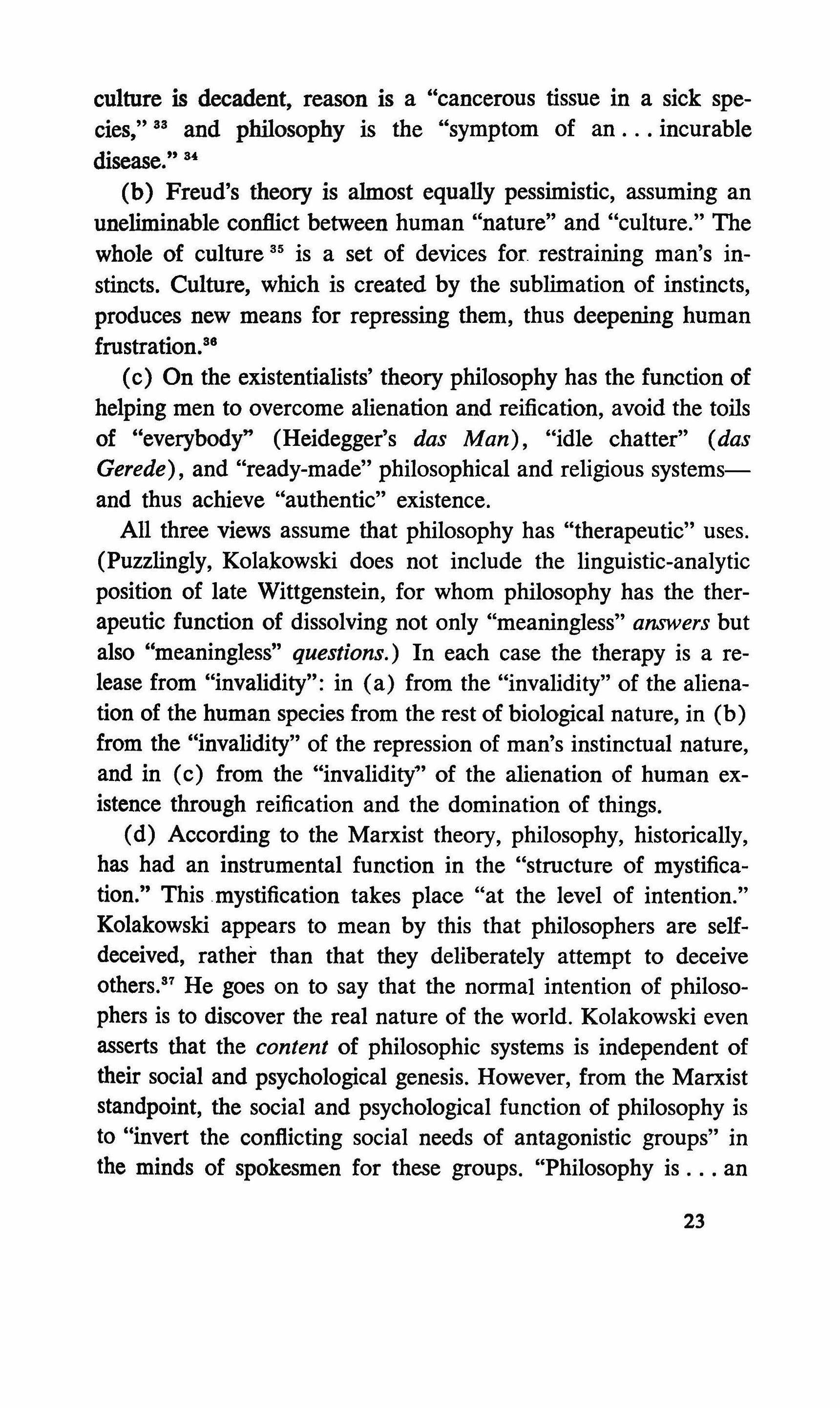
culture is decadent, reason is a "cancerous tissue in a sick species," 33 and philosophy is the "symptom of an incurable disease." 3'
(b) Freud's theory is almost equally pessimistic, assuming an uneliminable conflict between human "nature" and "culture." The whole of culture 35 is a set of devices for restraining man's instincts. Culture, which is created by the sublimation of instincts, produces new means for repressing them, thus deepening human frustration."
(c) On the existentialists' theory philosophy has the function of helping men to overcome alienation and remcation, avoid the toils of "everybody" (Heidegger's das Man), "idle chatter" (das Gerede), and "ready-made" philosophical and religious systemsand thus achieve "authentic" existence.
All three views assume that philosophy has "therapeutic" uses. (Puzzlingly, Kolakowski does not include the linguistic-analytic position of late Wittgenstein, for whom philosophy has the therapeutic function of dissolving not only "meaningless" answers but also "meaningless" questions.) In each case the therapy is a release from "invalidity": in (a) from the "invalidity" of the alienation of the human species from the rest of biological nature, in (b) from the "invalidity" of the repression of man's instinctual nature, and in (c) from the "invalidity" of the alienation of human existence through reification and the domination of things.
(d) According to the Marxist theory, philosophy, historically, has had an instrumental function in the "structure of mystification." This mystification takes place "at the level of intention." Kolakowski appears to mean by this that philosophers are selfdeceived, rather than that they deliberately attempt to deceive others." He goes on to say that the normal intention of philosophers is to discover the real nature of the world. Kolakowski even asserts that the content of philosophic systems is independent of their social and psychological genesis. However, from the Marxist standpoint, the social and psychological function of philosophy is to "invert the conflicting social needs of antagonistic groups" in the minds of spokesmen for these groups. "Philosophy is an
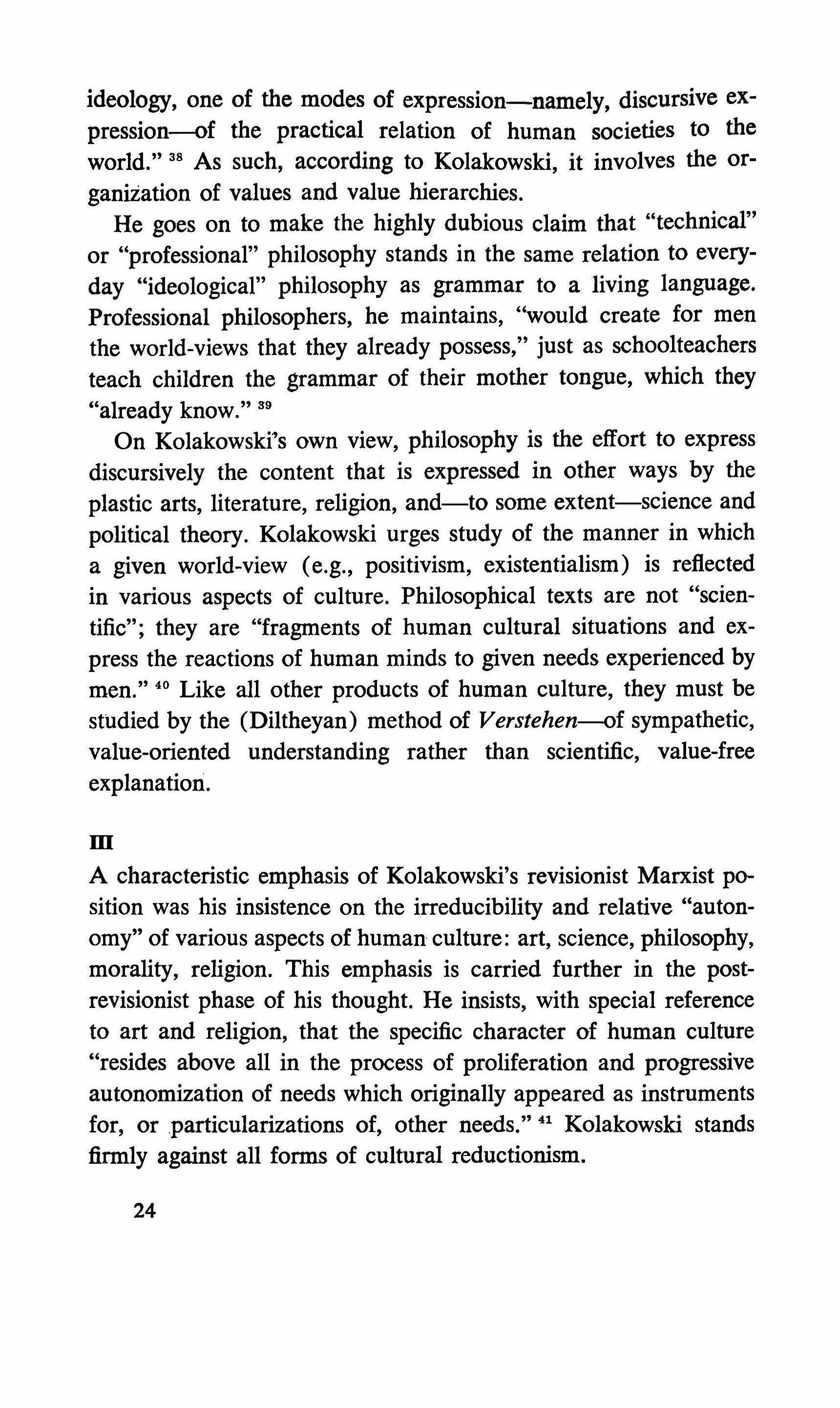
ideology, one of the modes of expression-namely, discursive expression-s-of the practical relation of human societies to the world." 38 As such, according to Kolakowski, it involves the organization of values and value hierarchies.
He goes on to make the highly dubious claim that "technical" or "professional" philosophy stands in the same relation to everyday "ideological" philosophy as grammar to a living language. Professional philosophers, he maintains, "would create for men the world-views that they already possess," just as schoolteachers teach children the grammar of their mother tongue, which they "already know." 89
On Kolakowski's own view, philosophy is the effort to express discursively the content that is expressed in other ways by the plastic arts, literature, religion, and-to some extent-science and political theory. Kolakowski urges study of the manner in which a given world-view (e.g., positivism, existentialism) is reflected in various aspects of culture. Philosophical texts are not "scientific"; they are "fragments of human cultural situations and express the reactions of human minds to given needs experienced by men." 40 Like all other products of human culture, they must be studied by the (Diltheyan) method of Verstehen=-oi sympathetic, value-oriented understanding rather than scientific, value-free explanation. m
A characteristic emphasis of Kolakowski's revisionist Marxist position was his insistence on the irreducibility and relative "autonomy" of various aspects of human culture: art, science, philosophy, morality, religion. This emphasis is carried further in the postrevisionist phase of his thought. He insists, with special reference to art and religion, that the specific character of human culture "resides above all in the process of proliferation and progressive autonomization of needs which originally appeared as instruments for, or particularizations of, other needs." 41 Kolakowski stands firmly against all forms of cultural reductionism.
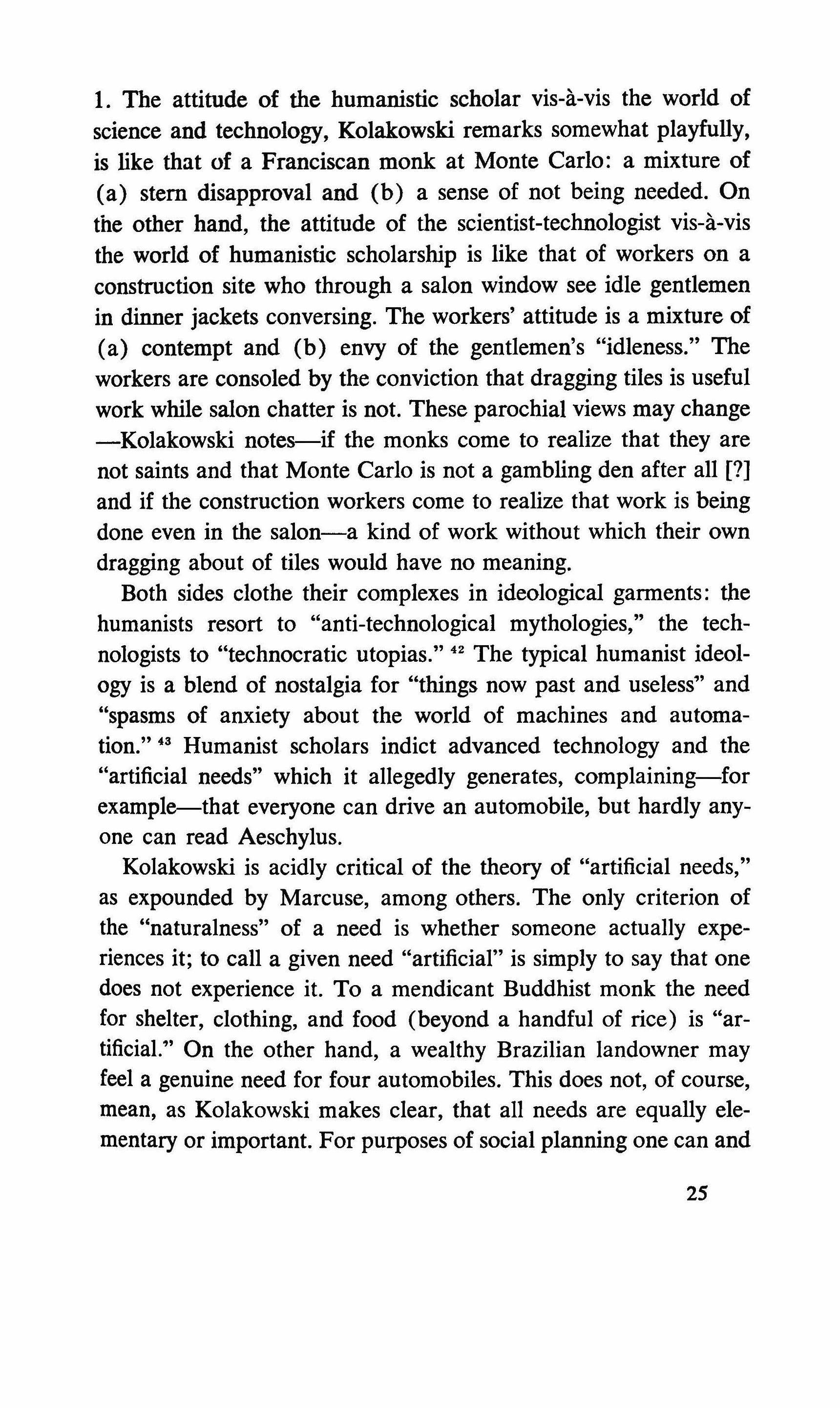
1. The attitude of the humanistic scholar vis-a-vis the world of science and technology, Kolakowski remarks somewhat playfully, is like that of a Franciscan monk at Monte Carlo: a mixture of (a) stem disapproval and (b) a sense of not being needed. On the other hand, the attitude of the scientist-technologist vis-a-vis the world of humanistic scholarship is like that of workers on a construction site who through a salon window see idle gentlemen in dinner jackets conversing. The workers' attitude is a mixture of (a) contempt and (b) envy of the gentlemen's "idleness." The workers are consoled by the conviction that dragging tiles is useful work while salon chatter is not. These parochial views may change -Kolakowski notes-if the monks come to realize that they are not saints and that Monte Carlo is not a gambling den after all [?] and if the construction workers come to realize that work is being done even in the salon-a kind of work without which their own dragging about of tiles would have no meaning.
Both sides clothe their complexes in ideological garments: the humanists resort to "anti-technological mythologies," the technologists to "technocratic utopias."
42 The typical humanist ideology is a blend of nostalgia for "things now past and useless" and "spasms of anxiety about the world of machines and automation." 43 Humanist scholars indict advanced technology and the "artificial needs" which it allegedly generates, complaining-for example-that everyone can drive an automobile, but hardly anyone can read Aeschylus.
Kolakowski is acidly critical of the theory of "artificial needs," as expounded by Marcuse, among others. The only criterion of the "naturalness" of a need is whether someone actually experiences it; to call a given need "artificial" is simply to say that one does not experience it. To a mendicant Buddhist monk the need for shelter, clothing, and food (beyond a handful of rice) is "artificial." On the other hand, a wealthy Brazilian landowner may feel a genuine need for four automobiles. This does not, of course, mean, as Kolakowski makes clear, that all needs are equally elementary or important. For purposes of social planning one can and
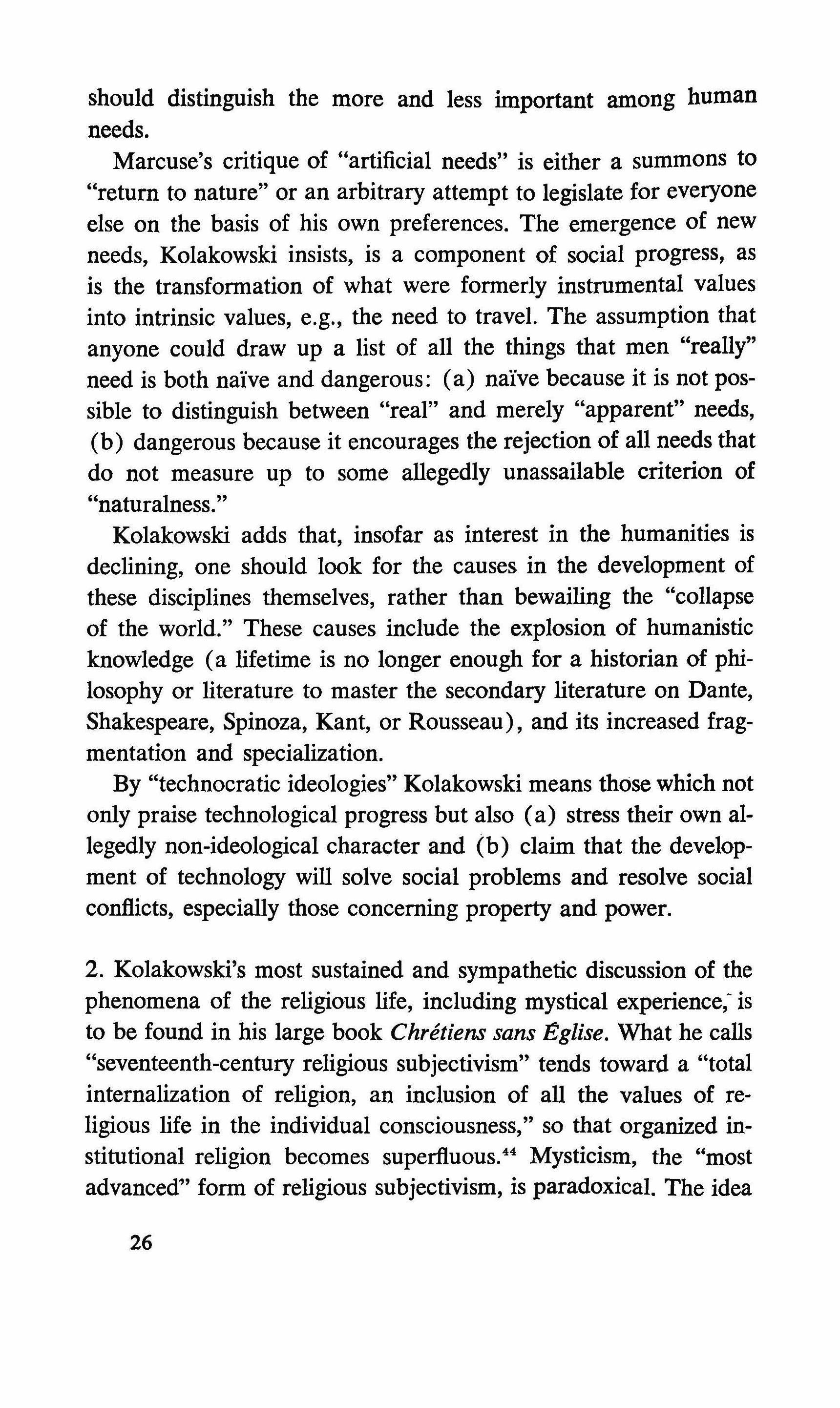
should distinguish the more and less important among human needs.
Marcuse's critique of "artificial needs" is either a summons to "return to nature" or an arbitrary attempt to legislate for everyone else on the basis of his own preferences. The emergence of new needs, Kolakowski insists, is a component of social progress, as is the transformation of what were formerly instrumental values into intrinsic values, e.g., the need to travel. The assumption that anyone could draw up a list of all the things that men "really" need is both naive and dangerous: (a) naive because it is not possible to distinguish between "real" and merely "apparent" needs, (b) dangerous because it encourages the rejection of all needs that do not measure up to some allegedly unassailable criterion of "naturalness.
Kolakowski adds that, insofar as interest in the humanities is declining, one should look for the causes in the development of these disciplines themselves, rather than bewailing the "collapse of the world." These causes include the explosion of humanistic knowledge (a lifetime is no longer enough for a historian of philosophy or literature to master the secondary literature on Dante, Shakespeare, Spinoza, Kant, or Rousseau), and its increased fragmentation and specialization.
By "technocratic ideologies" Kolakowski means those which not only praise technological progress but also (a) stress their own allegedly non-ideological character and (b) claim that the development of technology will solve social problems and resolve social conflicts, especially those concerning property and power.
2. Kolakowski's most sustained and sympathetic discussion of the phenomena of the religious life, including mystical experience; is to be found in his large book Chretiens sans Eglise. What he calls "seventeenth-century religious subjectivism" tends toward a "total internalization of religion, an inclusion of all the values of religious life in the individual consciousness," so that organized institutional religion becomes superfluous." Mysticism, the "most advanced" form of religious subjectivism, is paradoxical. The idea
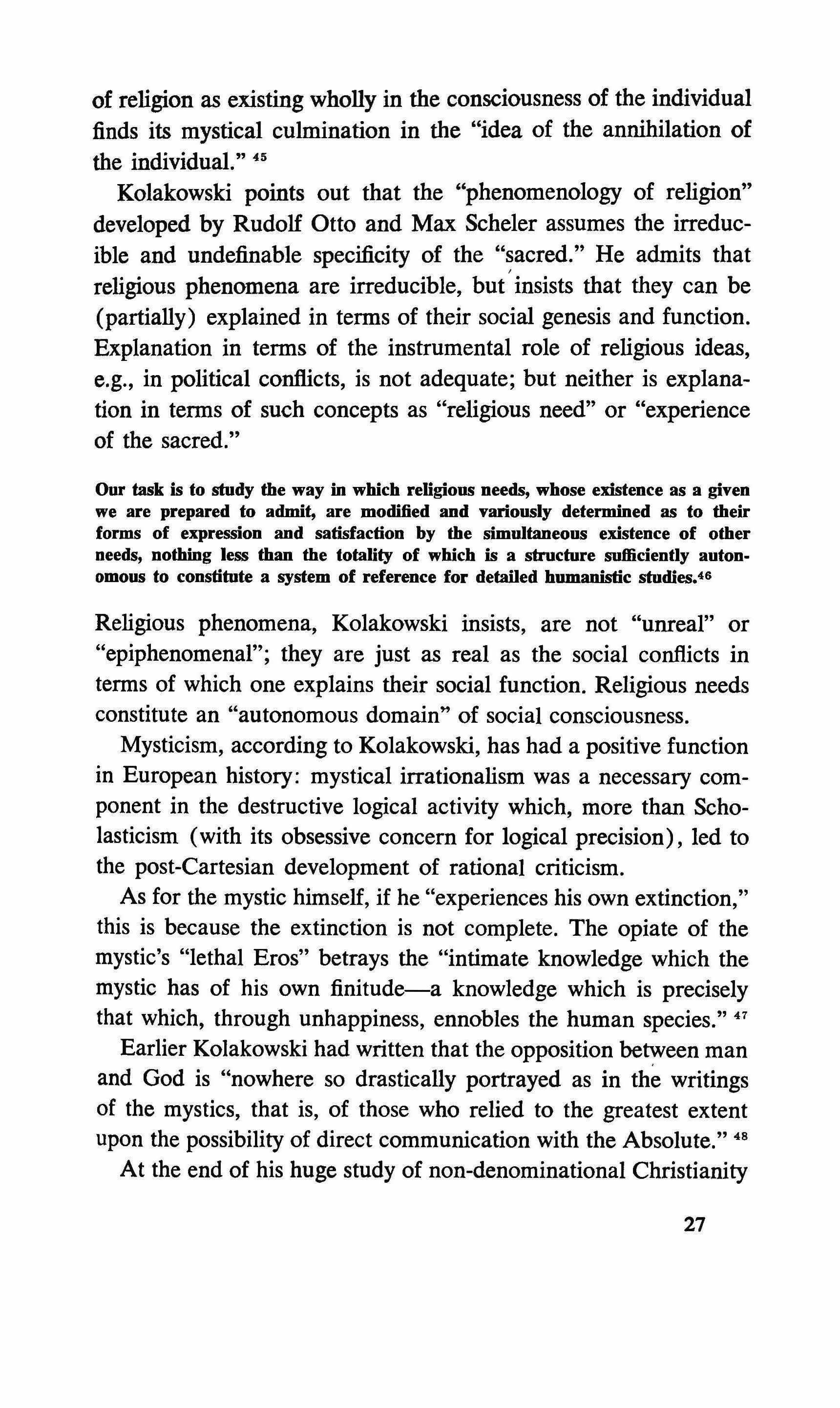
of religion as existing wholly in the consciousness of the individual finds its mystical culmination in the "idea of the annihilation of the individual." 45
Kolakowski points out that the "phenomenology of religion" developed by Rudolf Otto and Max Scheler assumes the irreducible and undefinable specificity of the "�acred." He admits that religious phenomena are irreducible, but insists that they can be (partially) explained in terms of their social genesis and function. Explanation in terms of the instrumental role of religious ideas, e.g., in political conflicts, is not adequate; but neither is explanation in terms of such concepts as "religious need" or "experience of the sacred."
Our task is to study the way in which religious needs, whose existence as a given we are prepared to admit, are modified and variously determined as to their forms of expression and satisfaction by the simultaneous existence of other needs, nothing less than the totality of which is a structure sufficiently autonomous to constitute a system of reference for detailed humanistic studies.4s
Religious phenomena, Kolakowski insists, are not "unreal" or "epiphenomenal"; they are just as real as the social conflicts in terms of which one explains their social function. Religious needs constitute an "autonomous domain" of social consciousness.
Mysticism, according to Kolakowski, has had a positive function in European history: mystical irrationalism was a necessary component in the destructive logical activity which, more than Scholasticism (with its obsessive concern for logical precision), led to the post-Cartesian development of rational criticism.
As for the mystic himself, if he "experiences his own extinction," this is because the extinction is not complete. The opiate of the mystic'S "lethal Eros" betrays the "intimate knowledge which the mystic has of his own finitude-a knowledge which is precisely that which, through unhappiness, ennobles the human species."
47
Earlier Kolakowski had written that the opposition between man and God is "nowhere so drastically portrayed as in the writings of the mystics, that is, of those who relied to the greatest extent upon the possibility of direct communication with the Absolute."
48
At the end of his huge study of non-denominational Christianity
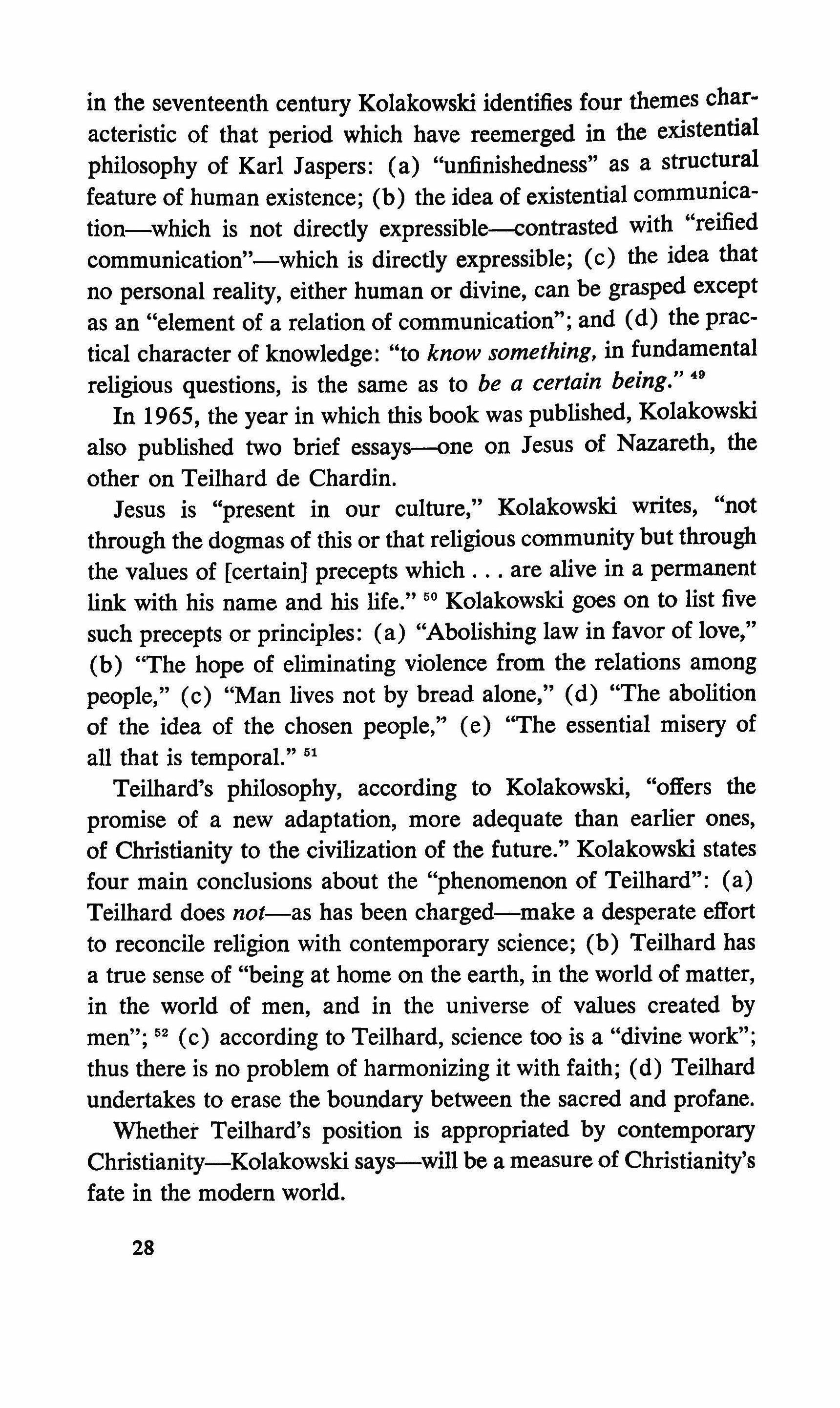
in the seventeenth century Kolakowski identifies four themes characteristic of that period which have reemerged in the existential philosophy of Karl Jaspers: (a) "unfinishedness" as a structural feature of human existence; (b) the idea of existential communication-which is not directly expressible--contrasted with "reified communication"-which is directly expressible; (c) the idea that no personal reality, either human or divine, can be grasped except as an "element of a relation of communication"; and (d) the practical character of knowledge: "to know something, in fundamental religious questions, is the same as to be a certain being." '9
In 1965, the year in which this book was published, Kolakowski also published two brief essays--one on Jesus of Nazareth, the other on Teilhard de Chardin.
Jesus is "present in our culture," Kolakowski writes, "not through the dogmas of this or that religious community but through the values of [certain] precepts which are alive in a permanent link with his name and his life." 50 Kolakowski goes on to list five such precepts or principles: (a) "Abolishing law in favor of love," (b) "The hope of eliminating violence from the relations among people," (c) "Man lives not by bread alone," (d) "The abolition of the idea of the chosen people,'" (e) "The essential misery of all that is temporal." 51
Teilhard's philosophy, according to Kolakowski, "offers the promise of a new adaptation, more adequate than earlier ones, of Christianity to the civilization of the future." Kolakowski states four main conclusions about the "phenomenon of Teilhard": (a) Teilhard does not-as has been charged-make a desperate effort to reconcile religion with contemporary science; (b) Teilhard has a true sense of "being at home on the earth, in the world of matter, in the world of men, and in the universe of values created by men"; 52 (c) according to Teilhard, science too is a "divine work"; thus there is no problem of harmonizing it with faith; (d) Teilhard undertakes to erase the boundary between the sacred and profane. Whether Teilhard's position is appropriated by contemporary Christianity-Kolakowski says-will be a measure of Christianity's fate in the modern world.
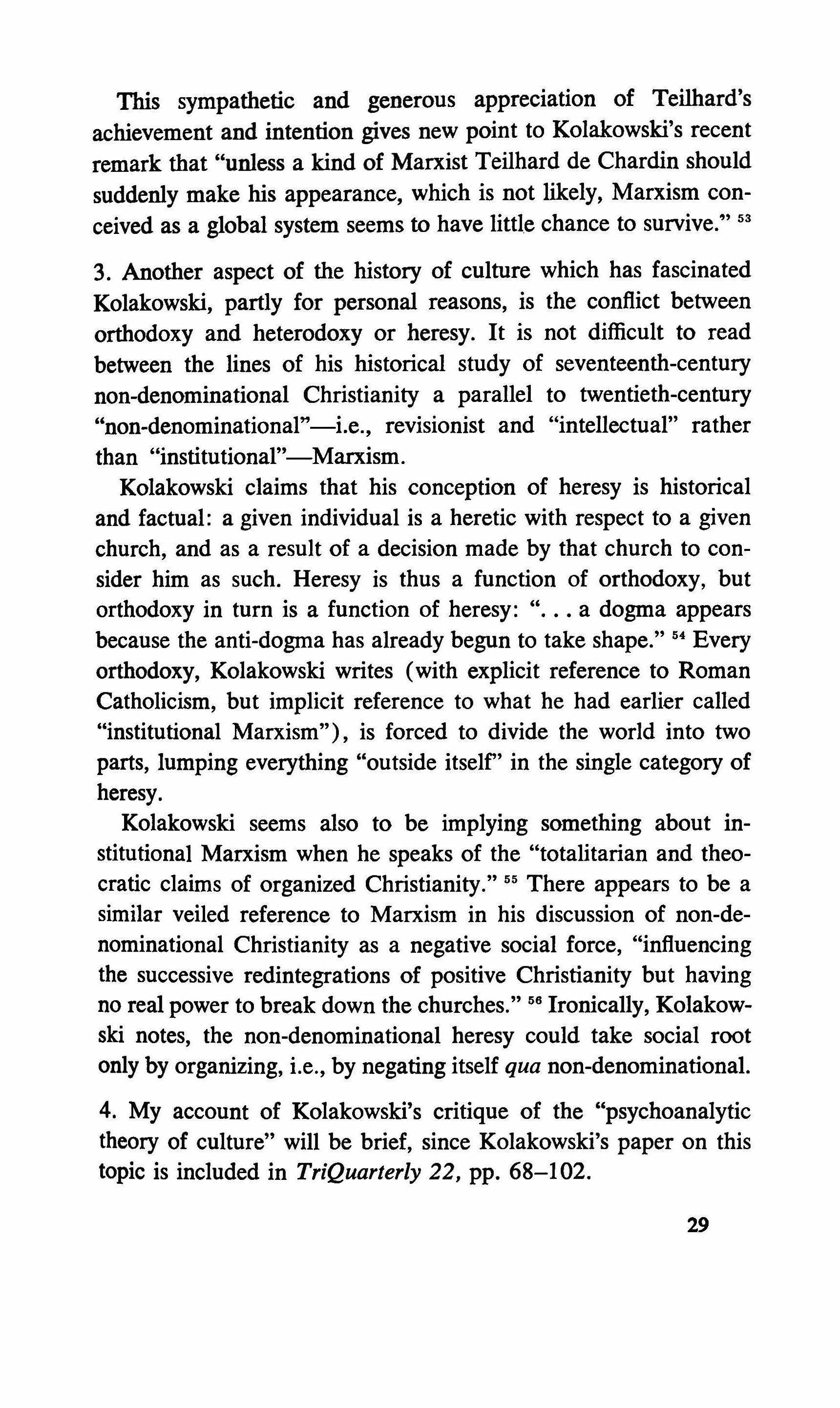
This sympathetic and generous appreciation of Teilhard's achievement and intention gives new point to Kolakowski's recent remark that "unless a kind of Marxist Teilhard de Chardin should suddenly make his appearance, which is not likely, Marxism conceived as a global system seems to have little chance to survive." 53
3. Another aspect of the history of culture which has fascinated Kolakowski, partly for personal reasons, is the conflict between orthodoxy and heterodoxy or heresy. It is not difficult to read between the lines of his historical study of seventeenth-century non-denominational Christianity a parallel to twentieth-century "non-denominational"-i.e., revisionist and "intellectual" rather than "institutional"-Marxism.
Kolakowski claims that his conception of heresy is historical and factual: a given individual is a heretic with respect to a given church, and as a result of a decision made by that church to consider him as such. Heresy is thus a function of orthodoxy, but orthodoxy in turn is a function of heresy: " a dogma appears because the anti-dogma has already begun to take shape." 54 Every orthodoxy, Kolakowski writes (with explicit reference to Roman Catholicism, but implicit reference to what he had earlier called "institutional Marxism"), is forced to divide the world into two parts, lumping everything "outside itself' in the single category of heresy.
Kolakowski seems also to be implying something about institutional Marxism when he speaks of the "totalitarian and theocratic claims of organized Christianity." 55 There appears to be a similar veiled reference to Marxism in his discussion of non-denominational Christianity as a negative social force, "influencing the successive redintegrations of positive Christianity but having no real power to break down the churches." 56 Ironically, Kolakowski notes, the non-denominational heresy could take social root only by organizing, i.e., by negating itself qua non-denominational.
4. My account of Kolakowski's critique of the "psychoanalytic theory of culture" will be brief, since Kolakowski's paper on this topic is included in TriQuarterly 22, pp. 68-102.
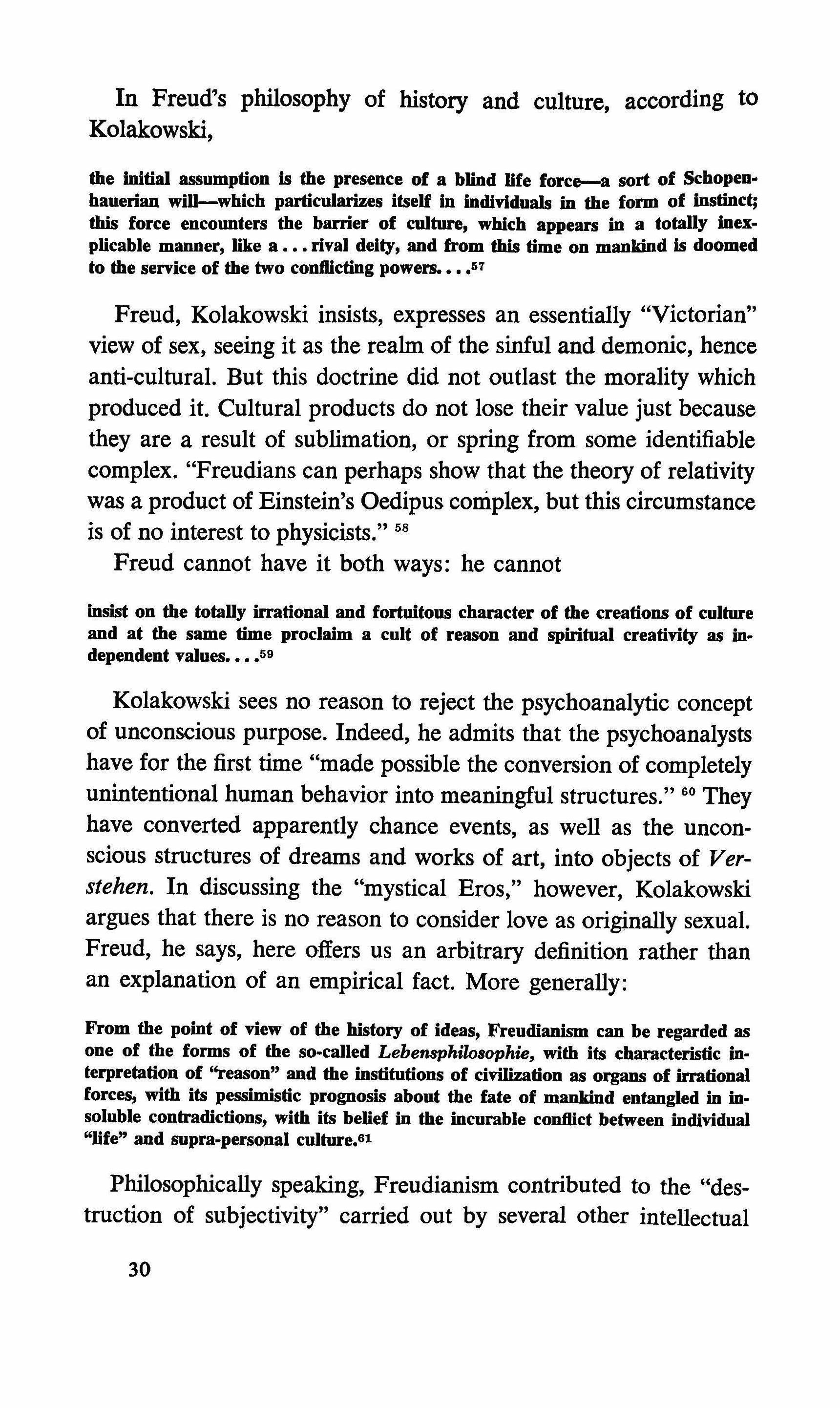
In Freud's philosophy of history and culture, according to Kolakowski, the initial assumption is the presence of a blind life force--a sort of Schopenhauerian will-which particularizes itself in individuals in the form of instinct; this force encounters the barrier of culture, which appears in a totally inexplicable manner, like a rival deity, and from this time on mankind is doomed to the service of the two confticting powers 61
Freud, Kolakowski insists, expresses an essentially "Victorian" view of sex, seeing it as the realm of the sinful and demonic, hence anti-cultural. But this doctrine did not outlast the morality which produced it. Cultural products do not lose their value just because they are a result of sublimation, or spring from some identifiable complex. "Freudians can perhaps show that the theory of relativity was a product of Einstein's Oedipus complex, but this circumstance is of no interest to physicists." 58
Freud cannot have it both ways: he cannot insist on the totally irrational and fortuitous character of the creations of culture and at the same time proclaim a cult of reason and spiritual creativity as independent values 59
Kolakowski sees no reason to reject the psychoanalytic concept of unconscious purpose. Indeed, he admits that the psychoanalysts have for the first time "made possible the conversion of completely unintentional human behavior into meaningful structures." 60 They have converted apparently chance events, as well as the unconscious structures of dreams and works of art, into objects of Verstehen. In discussing the "mystical Eros," however, Kolakowski argues that there is no reason to consider love as originally sexual. Freud, he says, here offers us an arbitrary definition rather than an explanation of an empirical fact. More generally:
From the point of view of the history of ideas, Freudianism can be regarded as one of the forms of the so-called Lebensphilosophie, with its characteristic interpretation of ''reason'' and the institutions of civilization as organs of irrational forces, with its pessimistic prognosis about the fate of mankind entangled in insoluble contradictions, with its belief in the incurable conflict between individual ''life'' and supra-personal culture.61
Philosophically speaking. Freudianism contributed to the "destruction of subjectivity" carried out by several other intellectual
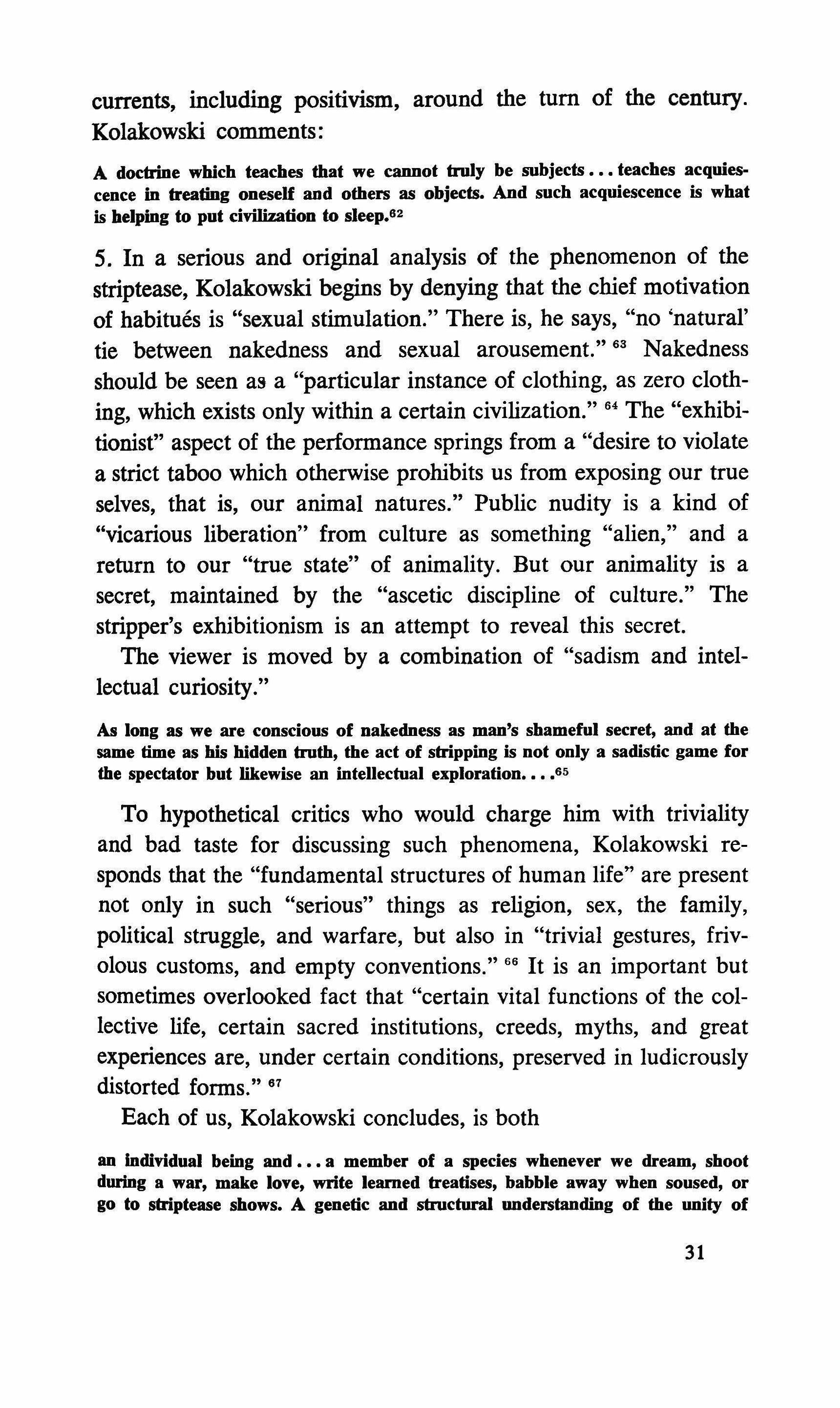
currents, including positivism, around the tum of the century. Kolakowski comments:
A doctrine which teaches that we cannot truly be subjects teaches acquiescence in treating oneseU and others as objects. And such acquiescence is what is helping to put civilization to sleep.52
5. In a serious and original analysis of the phenomenon of the striptease, Kolakowski begins by denying that the chief motivation of habitues is "sexual stimulation." There is, he says, "no 'natural' tie between nakedness and sexual arousement." 63 Nakedness should be seen as a "particular instance of clothing, as zero clothing, which exists only within a certain civilization." 64 The "exhibitionist" aspect of the performance springs from a "desire to violate a strict taboo which otherwise prohibits us from exposing our true selves, that is, our animal natures." Public nudity is a kind of "vicarious liberation" from culture as something "alien," and a return to our "true state" of animality. But our animality is a secret, maintained by the "ascetic discipline of culture." The stripper's exhibitionism is an attempt to reveal this secret. The viewer is moved by a combination of "sadism and intellectual curiosity."
As long as we are conscious of nakedness as man's shameful secret, and at the same time as his hidden truth, the act of stripping is not only a sadistic game for the spectator but likewise an intellectual exploration 65
To hypothetical critics who would charge him with triviality and bad taste for discussing such phenomena, Kolakowski responds that the "fundamental structures of human life" are present not only in such "serious" things as religion, sex, the family, political struggle, and warfare, but also in "trivial gestures, frivolous customs, and empty conventions." 66 It is an important but sometimes overlooked fact that "certain vital functions of the collective life, certain sacred institutions, creeds, myths, and great experiences are, under certain conditions, preserved in ludicrously distorted forms." 61
Each of us, Kolakowski concludes, is both an Individual being and a member of a species whenever we dream, shoot during a war, make love, write learned treatises, babble away when soused, or go to striptease shows. A genetic and structural understanding of the unity of
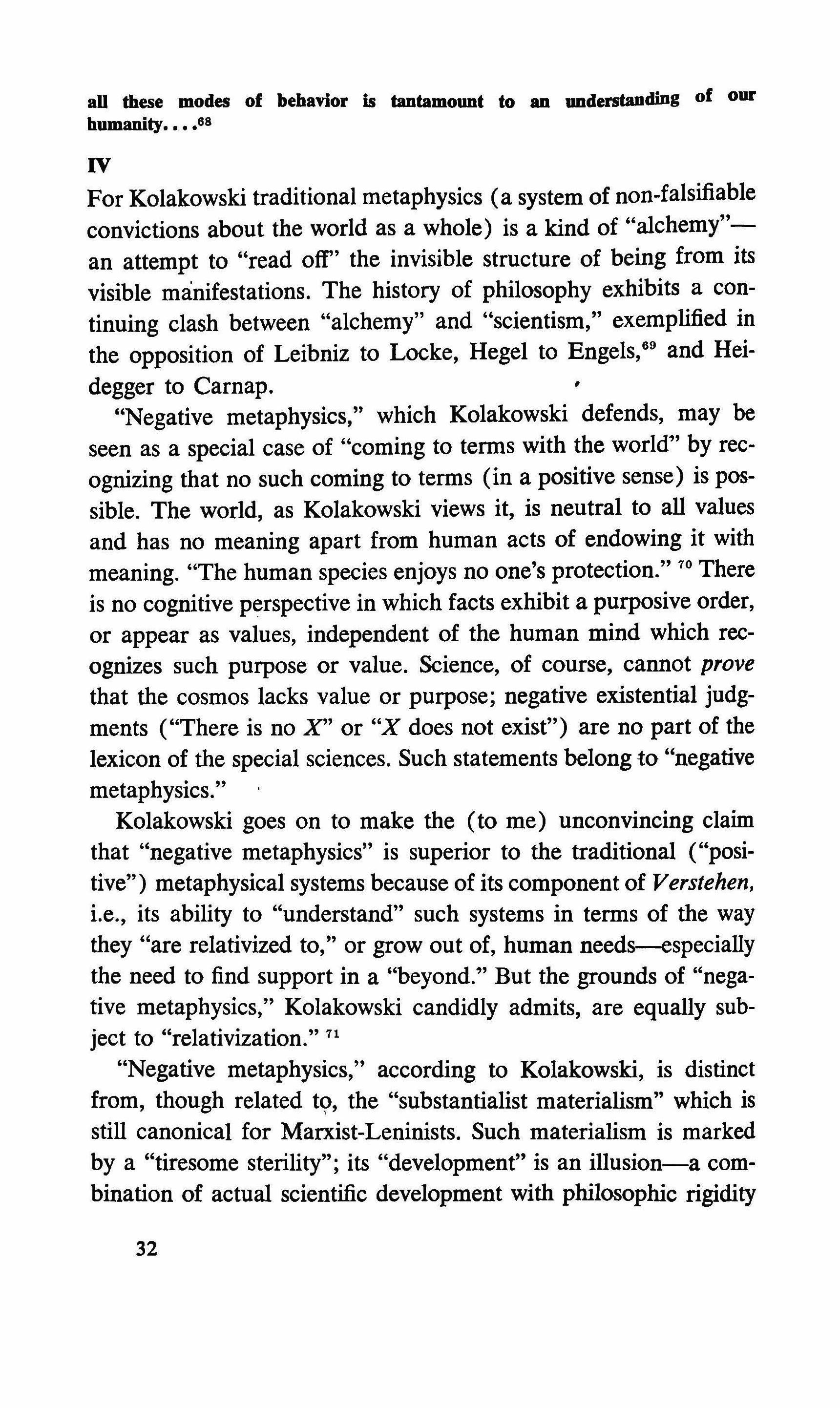
aU these modes of behavior is tantamount to an understanding of our humanity, ",68
For Kolakowski traditional metaphysics (a system of non-falsifiable convictions about the world as a whole) is a kind of "alchemy"an attempt to "read off" the invisible structure of being from its visible manifestations. The history of philosophy exhibits a continuing clash between "alchemy" and "scientism," exemplified in the opposition of Leibniz to Locke, Hegel to Engels," and Heidegger to Carnap.
"Negative metaphysics," which Kolakowski defends, may be seen as a special case of "coming to terms with the world" by recognizing that no such coming to terms (in a positive sense) is possible. The world, as Kolakowski views it, is neutral to all values and has no meaning apart from human acts of endowing it with meaning. "The human species enjoys no one's protection." 70 There is no cognitive perspective in which facts exhibit a purposive order, or appear as values, independent of the human mind which recognizes such purpose or value. Science, of course, cannot prove that the cosmos lacks value or purpose; negative existential judgments ("There is no X" or "X does not exist") are no part of the lexicon of the special sciences. Such statements belong to "negative metaphysics.
Kolakowski goes on to make the (to me) unconvincing claim that "negative metaphysics" is superior to the traditional ("positive") metaphysical systems because of its component of Verstehen, i.e., its ability to "understand" such systems in terms of the way they "are relativized to," or grow out of, human needs-especially the need to find support in a "beyond." But the grounds of "negative metaphysics," Kolakowski candidly admits, are equally subject to "relativization." 71
"Negative metaphysics," according to Kolakowski, is distinct from, though related to, the "substantialist materialism" which is still canonical for Marxist-Leninists. Such materialism is marked by a "tiresome sterility"; its "development" is an illusion-a combination of actual scientific development with philosophic rigidity
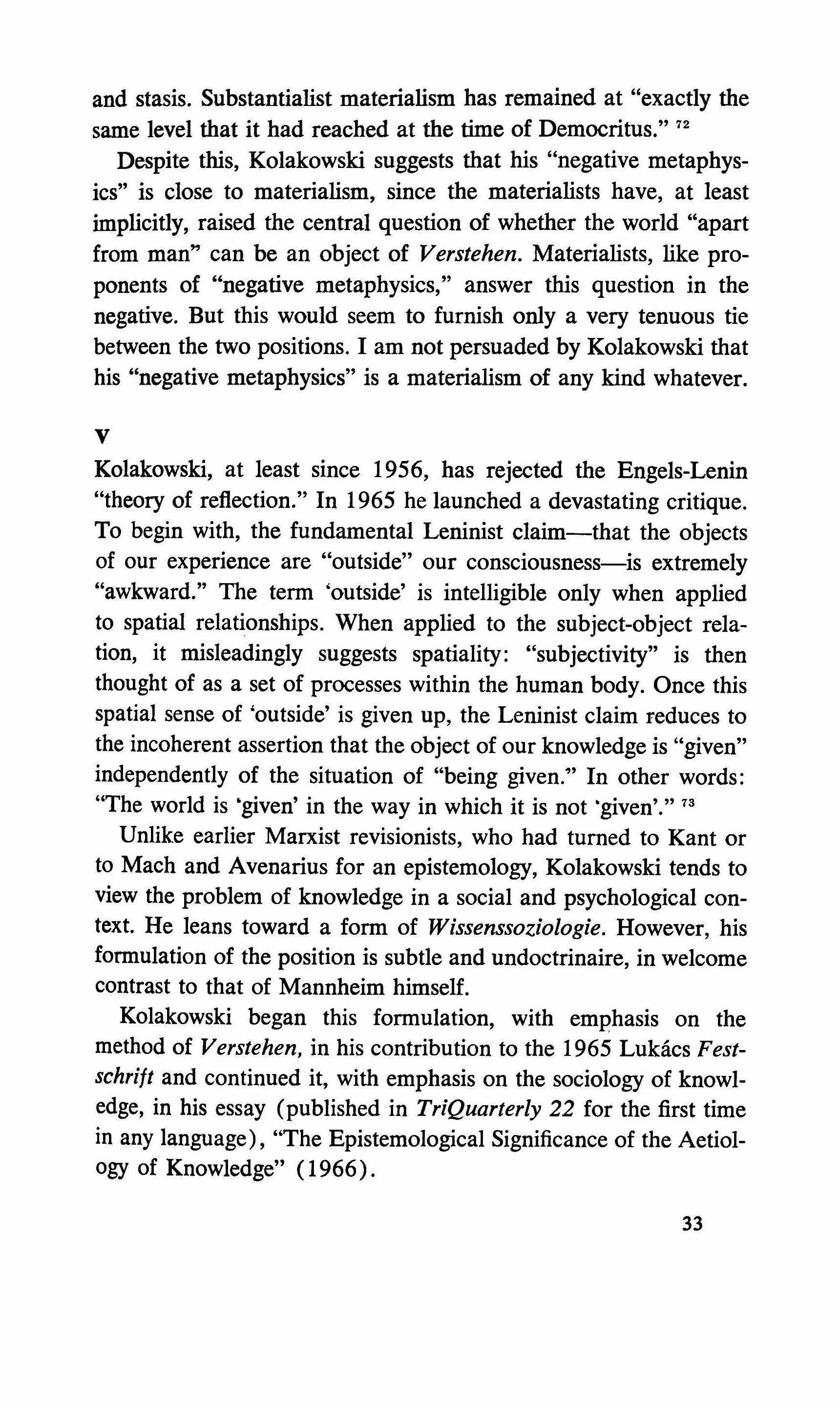
and stasis. Substantialist materialism has remained at "exactly the same level that it had reached at the time of Democritus." 72
Despite this, Kolakowski suggests that his "negative metaphysics" is close to materialism, since the materialists have, at least implicitly, raised the central question of whether the world "apart from man" can be an object of Verstehen. Materialists, like proponents of "negative metaphysics," answer this question in the negative. But this would seem to furnish only a very tenuous tie between the two positions. I am not persuaded by Kolakowski that his "negative metaphysics" is a materialism of any kind whatever.
v
Kolakowski, at least since 1956, has rejected the Engels-Lenin "theory of reflection." In 1965 he launched a devastating critique. To begin with, the fundamental Leninist claim-that the objects of our experience are "outside" our consciousness-is extremely "awkward." The term 'outside' is intelligible only when applied to spatial relationships. When applied to the subject-object relation, it misleadingly suggests spatiality: "subjectivity" is then thought of as a set of processes within the human body. Once this spatial sense of 'outside' is given up, the Leninist claim reduces to the incoherent assertion that the object of our knowledge is "given" independently of the situation of "being given." In other words: "The world is 'given' in the way in which it is not 'given'." 73
Unlike earlier Marxist revisionists, who had turned to Kant or to Mach and Avenarius for an epistemology, Kolakowski tends to view the problem of knowledge in a social and psychological context. He leans toward a form of Wissenssoziologie. However, his formulation of the position is subtle and undoctrinaire, in welcome contrast to that of Mannheim himself.
Kolakowski began this formulation, with emphasis on the method of Verstehen, in his contribution to the 1965 Lukacs Festschrijt and continued it, with emphasis on the sociology of knowledge, in his essay (published in TriQuarterly 22 for the first time in any language), "The Epistemological Significance of the Aetiology of Knowledge" (1966).

Kolakowski uses the expression 'aetiology [i.e., causal study] of knowledge' to refer inclusively to investigations of the non-cognitive factors which have a causal effect upon cognition or, as he puts it, to "all genetic studies of the distorting, or constitutive, influence which the social or psychological situations in which knowledge is acquired and confirmed exert upon the content of that knowledge." 14
Epistemology deals with the criteria of truth and falsity; the aetiology of knowledge deals with conditions of genesis and development. Kolakowski agrees with Mannheim that the motives which cause people to accept or reject a given proposition do not affect the truth value of that proposition. But "aetiological" factors can be regarded as epistemologically negligible only if one has attained an "epistemologically privileged" position. As Kolakowski puts it:
to measure the cognitive "pressure" exerted by individual or collective fnterests upon the content of knowledge we must antecedently have at our disposal infallible criteria for distinguishing between truth and faJsity.75
Kolakowski easily refutes Mannheim's uncritical assumption that intellectuals as a class enjoy such a cognitively privileged position, concluding that their alleged epistemological privilege is "nothing more than the privilege of imposing universally obligatory norms of thought and, as such, offers no evidence for the extra-situational validity of these norms." 76 Mannheim jointly asserts two clearly incompatible claims: (1) that "social opinions and theories are always expressed within a perspective that is defined by a particular interest,'" and (2) that "there is one social group [that to which Mannheim himself belonged!] which is able to free itself from such 'particularisms'." 77
Kolakowski insists that he is not questioning the validity of knowledge as such, but only the "possibility of a reflection upon knowledge which would legitimize its claim to transcendental, extra-historical, extra-cultural, extra-psychological Validity," 78 and that his position therefore is not a skepticism. Still, it appears to be a relativism; and, as Kolakowski himself had said in another connection: "Every historical relativism destroys itself, since it destroys

the possibility of other than purely historical arguments in its own behalf." 79
One species of knowledge whose possibility Kolakowski seems not to have called into question is Diltheyan Verstehen-an ''understanding'' of human and cultural phenomena which differs from mere description or explanation by its sympathetic grasping of the meanings, values, and purposes embedded in the "structures" of human culture. Such Verstehen is twofold. It involves: (1) the understanding of a given objectified expression of a human intention (e.g., a text) and (2) a genetic and functional explanation which does not attempt to reduce social facts to psychological states.
Following Max Weber, Kolakowski insists that Dilthey's method (or rule) of Nacherlebnis ("recreation of past experience") is not entailed by the method of Verstehen. He wishes to retain the latter while rejecting the former, since (a) there are no criteria which would permit us to establish that a given historian's recreation of the experience of a man long dead is in fact accurate; (b) the only adequate expression of a given intention is the work in which it was "objectified," hence every interpretation which differs from that work will be inadequate. Kolakowski maintains that the only alternative to the method of Verstehen is behaviorism.
Kolakowski's view of ideology seems to me to have changed very little since the beginning of his revisionist Marxist period. Then as now he interpreted ideology as an "organization of values" for purposes of social action; then as now he considered the idea of an "end of ideology" unrealistic; then as now he urged that ideologies be "de-totalized" and opposed the claims to universality and intellectual monopoly on the part of any ideology. Then as now he asserted that "ideologies can only be understood with reference (though the reference may be negative) to institutions," and that "ideologies must be fought by ideological means." 80
According to Kolakowski, ideologies cannot function effectively to resolve social conflicts unless those who profess them believe them to be a response to needs (e.g., religious needs) which are 35
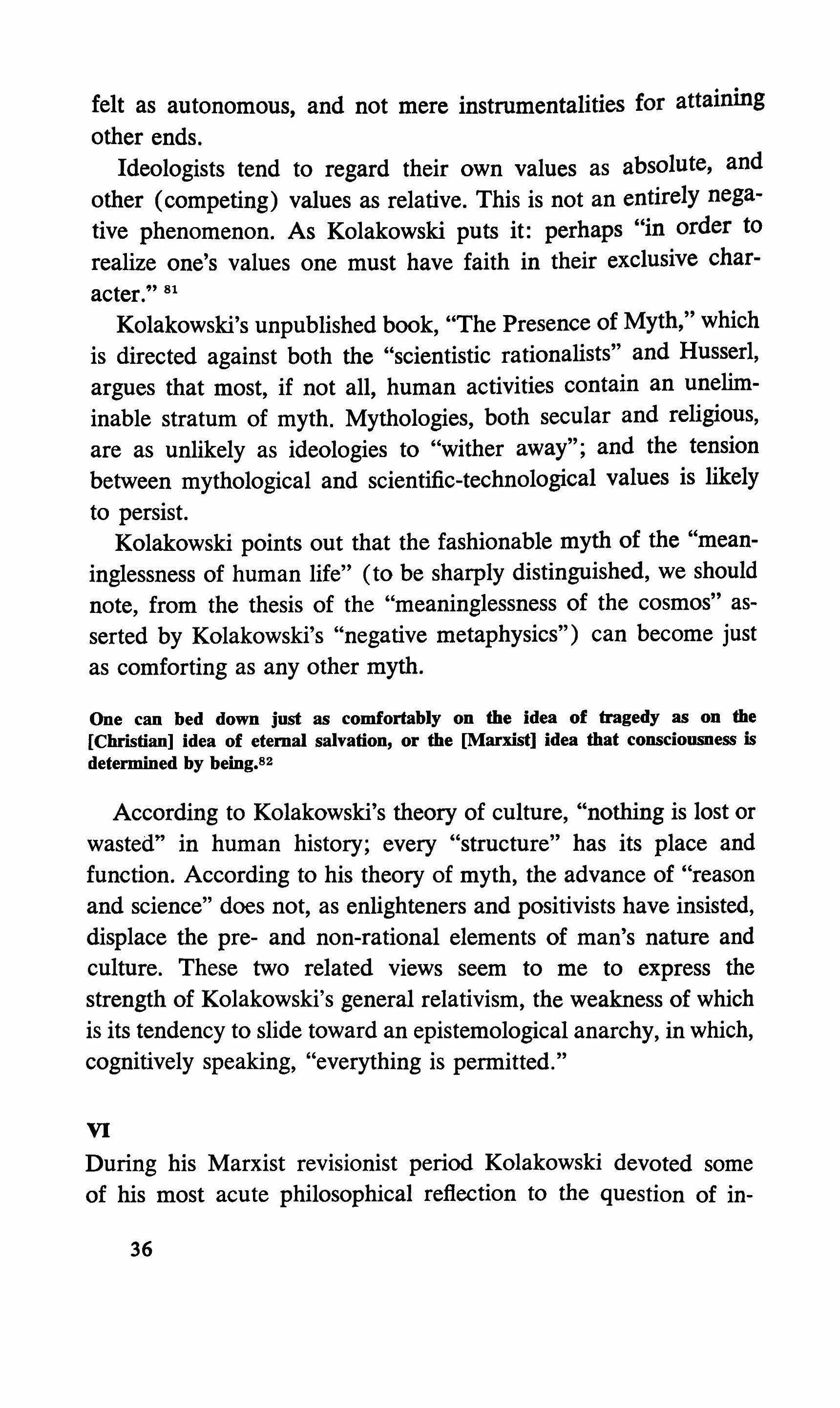
felt as autonomous, and not mere instrumentalities for attaining other ends.
Ideologists tend to regard their own values as absolute, and other (competing) values as relative. This is not an entirely negative phenomenon. As Kolakowski puts it: perhaps "in order to realize one's values one must have faith in their exclusive character." 81
Kolakowski's unpublished book, "The Presence of Myth," which is directed against both the "scientistic rationalists" and Husserl, argues that most, if not all, human activities contain an uneliminable stratum of myth. Mythologies, both secular and religious, are as unlikely as ideologies to "wither away"; and the tension between mythological and scientific-technological values is likely to persist.
Kolakowski points out that the fashionable myth of the "meaninglessness of human life" (to be sharply distinguished, we should note, from the thesis of the "meaninglessness of the cosmos" asserted by Kolakowski's "negative metaphysics") can become just as comforting as any other myth.
One can bed down just as comfortably on the idea of tragedy as on the [Christian] idea of eternal salvation, or the [Marxist] idea that consciousness is determined by being.82
According to Kolakowski's theory of culture, "nothing is lost or wasted" in human history; every "structure" has its place and function. According to his theory of myth, the advance of "reason and science" does not, as enlighteners and positivists have insisted, displace the pre- and non-rational elements of man's nature and culture. These two related views seem to me to express the strength of Kolakowski's general relativism, the weakness of which is its tendency to slide toward an epistemological anarchy, in which, cognitively speaking, "everything is permitted."
VI
During his Marxist revisionist period Kolakowski devoted some of his most acute philosophical reflection to the question of in-

dividual freedom and moral responsibility." His philosophy of man provides a transition to the post-revisionist writings on the human person. Its chief statement is in the long essay, "The cogito, Historical Materialism, and the Expressive Interpretation of the Person" (1962).84
Kolakowski is sensitive, as few Marxists have been, to the ambiguities of the term 'man'." 'Man', he says, may mean zoological species or biological organism (as used in Lebensphilosophie and by Freud and the pragmatists), or a metaphysically distinct being (as used in Existenzphilosophie), or historical society (as used by Marx). None of these usages includes the sense which is central for Kolakowski, namely, "individual person," although the existentialist position comes closest with its characterization of man as a "being constituted by thought about himself," whose effort is to shake off "every reification, every surrender to alien, thing-like modes of being."
86 The fate of the individual person has generally remained at the periphery of Marxist discussion, but Kolakowski sees no reason why the principle of the "unrepeatability" and "uniqueness" of human individuals should not be embraced by Marxists. However, it seems at least possible that one of the reasons for the gradual evaporation of Marxist content in Kolakowski's work after 1962, and especially after 1965, may have been the realization that within the framework of Marxismeven that provided by the young Marx-no adequate account of the individual human person could in fact be given.
In a careful examination of the position which he calls "subjective personalism," Kolakowski discusses the "incommensurability" of the subjective and objective spheres. The first is constituted only by "being experienced"; the second includes all thing-like entities, not just physical things but also human products, in particular, the world of meanings and "expressed ideas." 87 The person is a wholly non-intellectual and (to use Husserlian language) "pre-predicative" reality. No component part of one subject-world can at the same time be a component part of another subject-world.
However, the "inexpressible person" can be manifested in behavior which in turn can have its reified effect on the experiencing
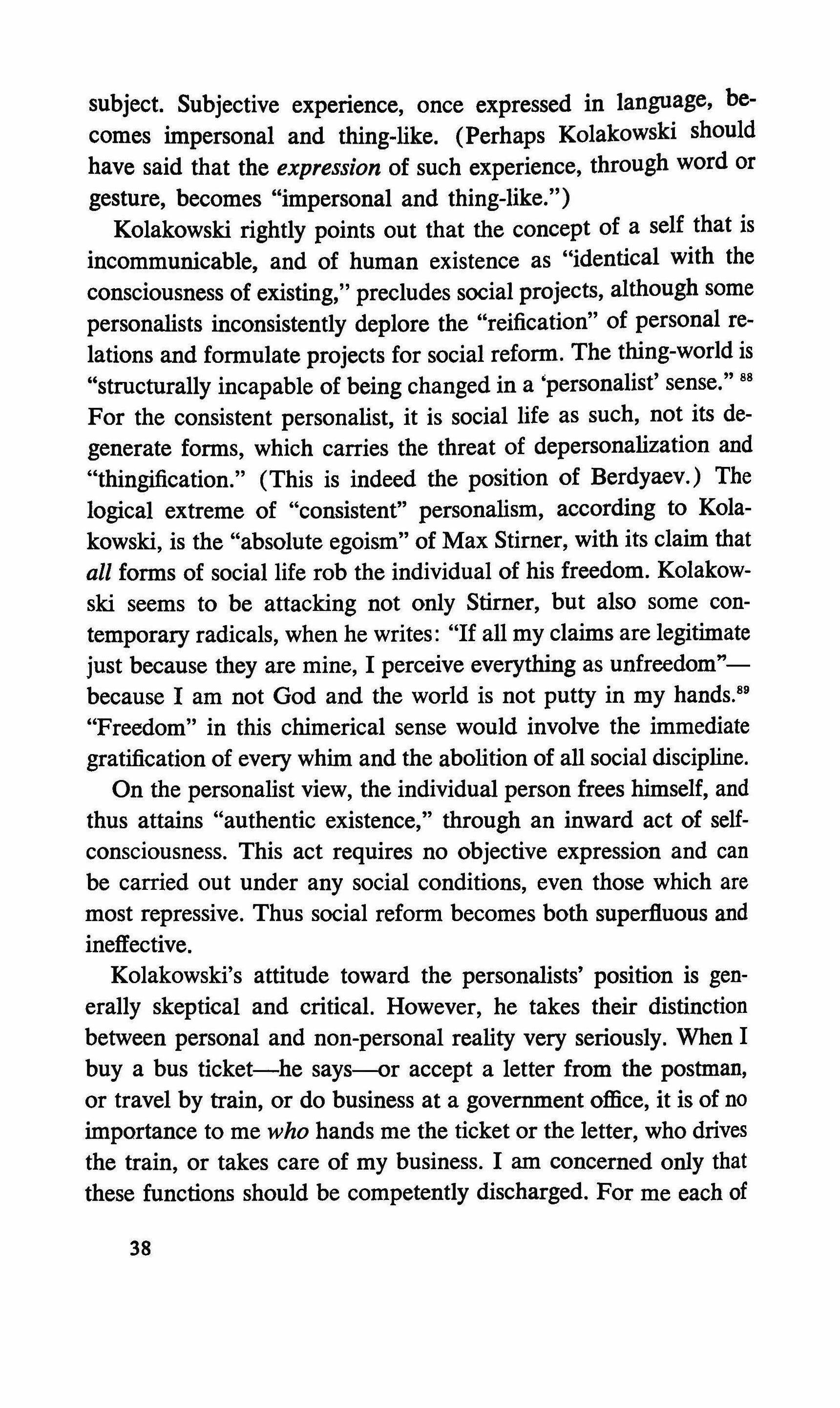
subject. Subjective experience, once expressed in language, becomes impersonal and thing-like. (Perhaps Kolakowski should have said that the expression of such experience, through word or gesture, becomes "impersonal and thing-like.")
Kolakowski rightly points out that the concept of a self that is incommunicable, and of human existence as "identical with the consciousness of existing," precludes social projects, although some personalists inconsistently deplore the "reification" of personal relations and formulate projects for social reform. The thing-world is "structurally incapable of being changed in a 'personalist' sense." B8
For the consistent personalist, it is social life as such, not its degenerate forms, which carries the threat of depersonalization and "thingification." (This is indeed the position of Berdyaev.) The logical extreme of "consistent" personalism, according to Kolakowski, is the "absolute egoism" of Max Stirner, with its claim that all forms of social life rob the individual of his freedom. Kolakowski seems to be attacking not only Stimer, but also some contemporary radicals, when he writes: "If all my claims are legitimate just because they are mine, I perceive everything as unfreedom"because I am not God and the world is not putty in my hands." "Freedom" in this chimerical sense would involve the immediate gratification of every whim and the abolition of all social discipline.
On the personalist view, the individual person frees himself, and thus attains "authentic existence," through an inward act of selfconsciousness. This act requires no objective expression and can be carried out under any social conditions, even those which are most repressive. Thus social reform becomes both superfluous and ineffective.
Kolakowski's attitude toward the personalists' position is generally skeptical and critical. However, he takes their distinction between personal and non-personal reality very seriously. When I buy a bus ticket-he says--or accept a letter from the postman, or travel by train, or do business at a government office, it is of no importance to me who hands me the ticket or the letter, who drives the train, or takes care of my business. I am concerned only that these functions should be competently discharged. For me each of
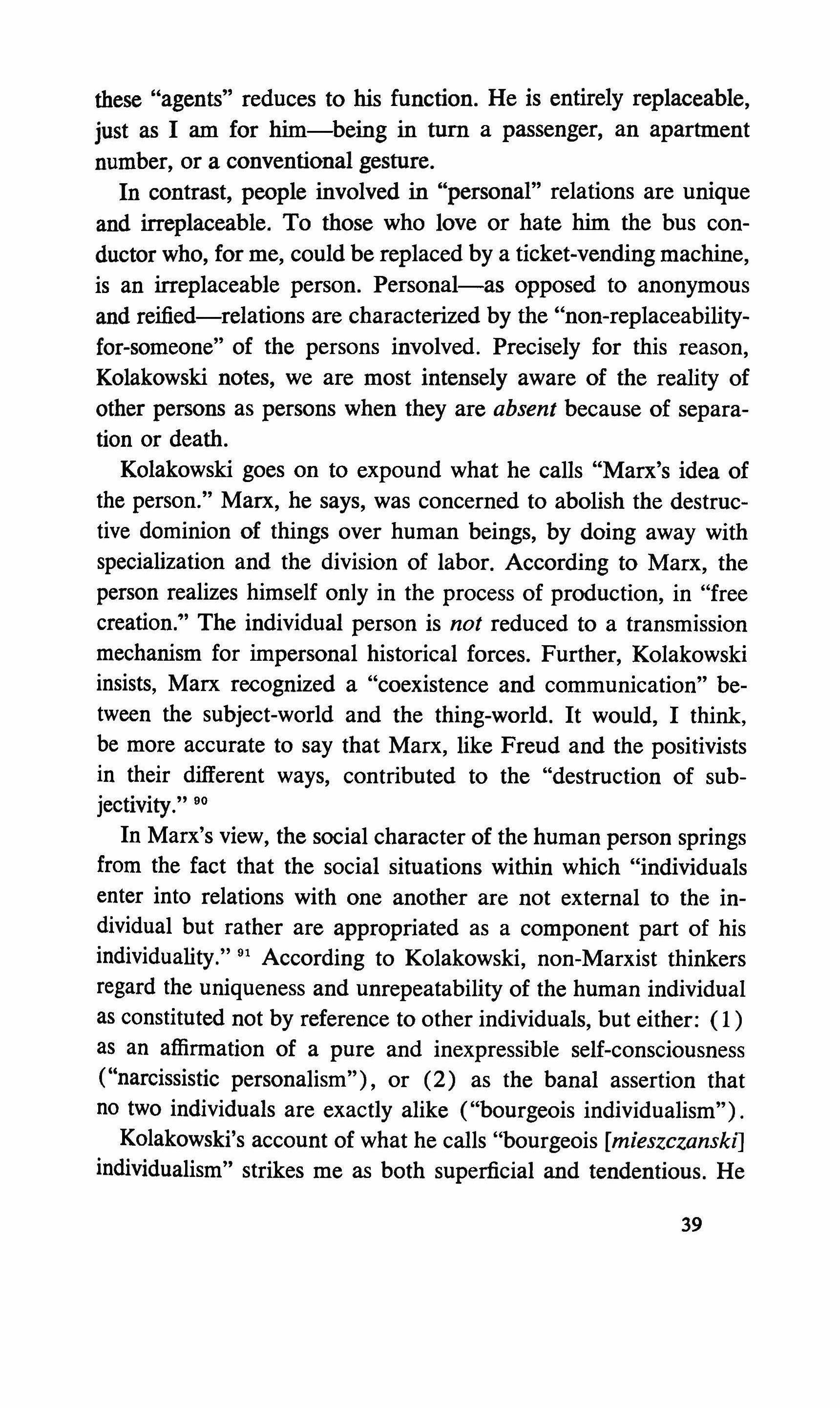
these "agents" reduces to his function. He is entirely replaceable, just as I am for him-being in turn a passenger, an apartment number, or a conventional gesture.
In contrast, people involved in "personal" relations are unique and irreplaceable. To those who love or hate him the bus conductor who, for me, could be replaced by a ticket-vending machine, is an irreplaceable person. Personal-as opposed to anonymous and reified-relations are characterized by the "non-replaceabilityfor-someone" of the persons involved. Precisely for this reason, Kolakowski notes, we are most intensely aware of the reality of other persons as persons when they are absent because of separation or death.
Kolakowski goes on to expound what he calls "Marx's idea of the person." Marx, he says, was concerned to abolish the destructive dominion of things over human beings, by doing away with specialization and the division of labor. According to Marx, the person realizes himself only in the process of production, in "free creation." The individual person is not reduced to a transmission mechanism for impersonal historical forces. Further, Kolakowski insists, Marx recognized a "coexistence and communication" between the subject-world and the thing-world. It WOUld, I think, be more accurate to say that Marx, like Freud and the positivists in their different ways, contributed to the "destruction of subjectivity."
90
In Marx's view, the social character of the human person springs from the fact that the social situations within which "individuals enter into relations with one another are not external to the individual but rather are appropriated as a component part of his individuality." 91 According to Kolakowski, non-Marxist thinkers regard the uniqueness and unrepeatability of the human individual as constituted not by reference to other individuals, but either: (1) as an affirmation of a pure and inexpressible self-consciousness ("narcissistic personalism"), or (2) as the banal assertion that no two individuals are exactly alike ("bourgeois individualism").
Kolakowski's account of what he calls "bourgeois [mieszczanskl] individualism" strikes me as both superficial and tendentious. He
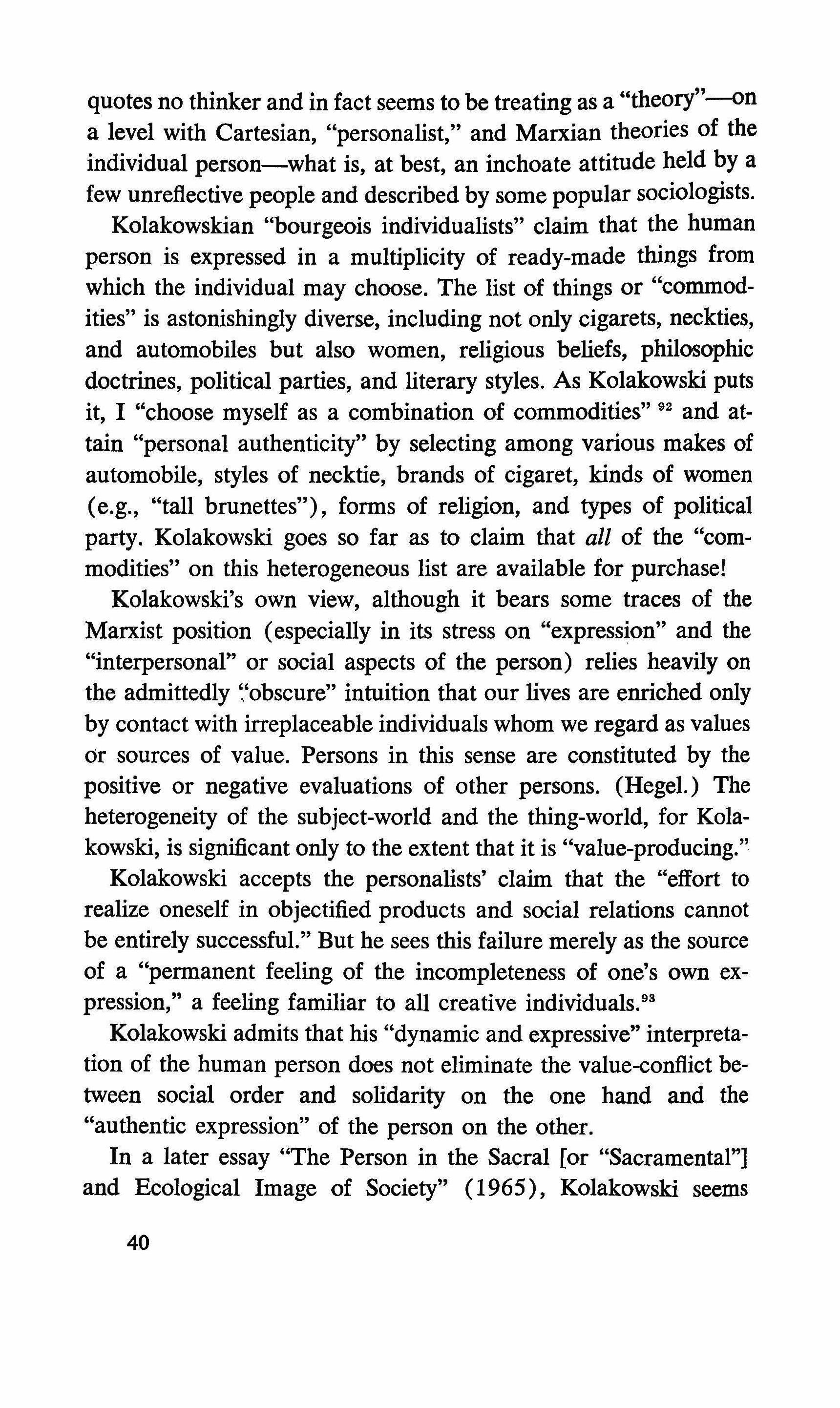
quotes no thinker and in fact seems to be treating as a "theory"-on a level with Cartesian, "personalist," and Marxian theories of the individual person-what is, at best, an inchoate attitude held by a few unreflective people and described by some popular sociologists.
Kolakowskian "bourgeois individualists" claim that the human person is expressed in a multiplicity of ready-made things from which the individual may choose. The list of things or "commodities" is astonishingly diverse, including not only cigarets, neckties, and automobiles but also women, religious beliefs, philosophic doctrines, political parties, and literary styles. As Kolakowski puts it, I "choose myself as a combination of commodities" 92 and attain "personal authenticity" by selecting among various makes of automobile, styles of necktie, brands of cigaret, kinds of women (e.g., "tall brunettes"), forms of religion, and types of political party. Kolakowski goes so far as to claim that all of the "commodities" on this heterogeneous list are available for purchase!
Kolakowski's own view, although it bears some traces of the Marxist position (especially in its stress on "expression" and the "interpersonal" or social aspects of the person) relies heavily on the admittedly "obscure" intuition that our lives are enriched only by contact with irreplaceable individuals whom we regard as values or sources of value. Persons in this sense are constituted by the positive or negative evaluations of other persons. (Hegel.) The heterogeneity of the subject-world and the thing-world, for Kolakowski, is significant only to the extent that it is "value-producing."
Kolakowski accepts the personalists' claim that the "effort to realize oneself in objectified products and social relations cannot be entirely successful." But he sees this failure merely as the source of a "permanent feeling of the incompleteness of one's own expression," a feeling familiar to all creative individuals."
Kolakowski admits that his "dynamic and expressive" interpretation of the human person does not eliminate the value-conflict between social order and solidarity on the one hand and the "authentic expression" of the person on the other.
In a later essay "The Person in the Sacral [or "Sacramental"'] and Ecological Image of Society" (1965), Kolakowski seems
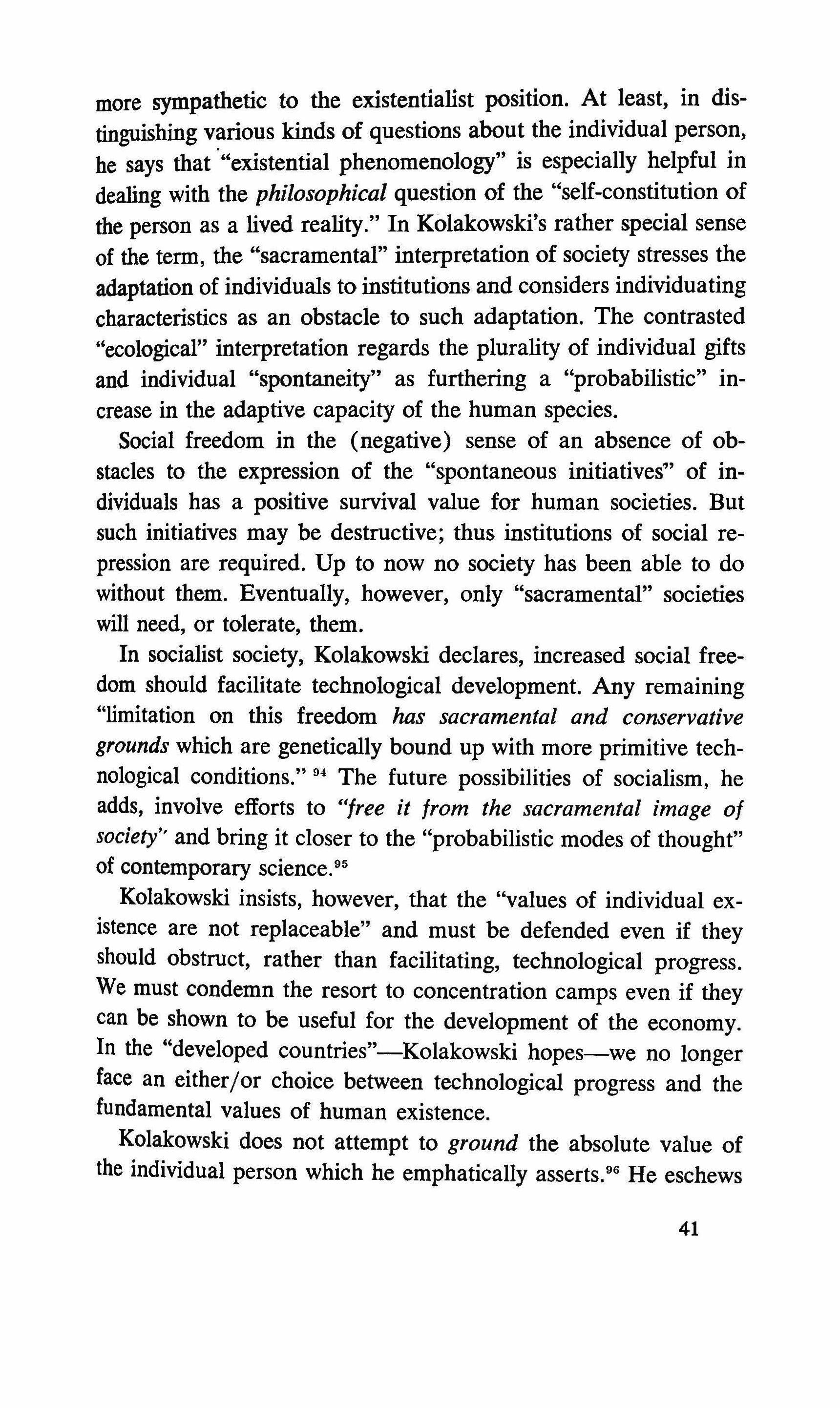
more sympathetic to the existentialist position. At least, in distinguishing various kinds of questions about the individual person, he says that'"existential phenomenology" is especially helpful in dealing with the philosophical question of the "self-constitution of the person as a lived reality." In Kolakowski's rather special sense of the term, the "sacramental" interpretation of society stresses the adaptation of individuals to institutions and considers individuating characteristics as an obstacle to such adaptation. The contrasted "ecological" interpretation regards the plurality of individual gifts and individual "spontaneity" as furthering a "probabilistic" increase in the adaptive capacity of the human species.
Social freedom in the (negative) sense of an absence of obstacles to the expression of the "spontaneous initiatives" of individuals has a positive survival value for human societies. But such initiatives may be destructive; thus institutions of social repression are required. Up to now no society has been able to do without them. Eventually, however, only "sacramental" societies will need, or tolerate, them.
In socialist society, Kolakowski declares, increased social freedom should facilitate technological development. Any remaining "limitation on this freedom has sacramental and conservative grounds which are genetically bound up with more primitive technological conditions." 94 The future possibilities of socialism, he adds, involve efforts to "free it from the sacramental image of society" and bring it closer to the "probabilistic modes of thought" of contemporary science. 95
Kolakowski insists, however, that the "values of individual existence are not replaceable" and must be defended even if they should obstruct, rather than facilitating, technological progress. We must condemn the resort to concentration camps even if they can be shown to be useful for the development of the economy. In the "developed countries"-Kolakowski hopes-we no longer face an either/or choice between technological progress and the fundamental values of human existence.
Kolakowski does not attempt to ground the absolute value of the individual person which he emphatically asserts." He eschews
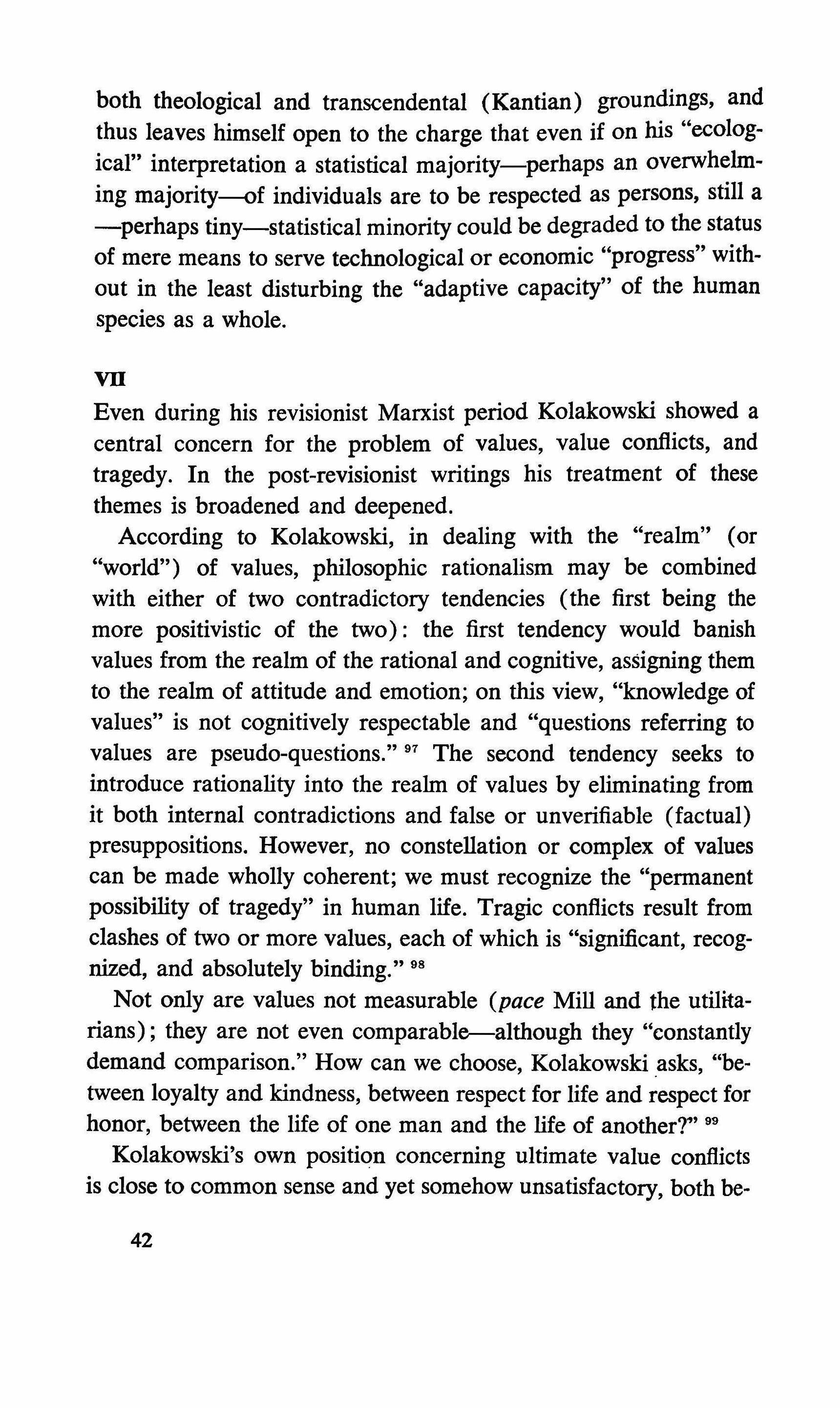
both theological and transcendental (Kantian) groundings, and thus leaves himself open to the charge that even if on his "ecological" interpretation a statistical majority-perhaps an overwhelming majority-of individuals are to be respected as persons, still a -perhaps tiny-statistical minority could be degraded to the status of mere means to serve technological or economic "progress" without in the least disturbing the "adaptive capacity" of the human species as a whole.
Even during his revisionist Marxist period Kolakowski showed a central concern for the problem of values, value conflicts, and tragedy. In the post-revisionist writings his treatment of these themes is broadened and deepened.
According to Kolakowski, in dealing with the "realm" (or "world") of values, philosophic rationalism may be combined with either of two contradictory tendencies (the first being the more positivistic of the two): the first tendency would banish values from the realm of the rational and cognitive, assigning them to the realm of attitude and emotion; on this view, "knowledge of values" is not cognitively respectable and "questions referring to values are pseudo-questions."
91 The second tendency seeks to introduce rationality into the realm of values by eliminating from it both internal contradictions and false or unverifiable (factual) presuppositions. However, no constellation or complex of values can be made wholly coherent; we must recognize the "permanent possibility of tragedy" in human life. Tragic conflicts result from clashes of two or more values, each of which is "significant, recognized, and absolutely binding." 98
Not only are values not measurable (pace Mill and the utilitarians); they are not even comparable-although they "constantly demand comparison." How can we choose, Kolakowski asks, "between loyalty and kindness, between respect for life and respect for honor, between the life of one man and the life of another?" 99
Kolakowski's own position concerning ultimate value conflicts is close to common sense and yet somehow unsatisfactory, both be-
cause it tends toward axiological relativism and because it is not philosophically "grounded." He declares candidly:
When I say that human life is a value, I do not want to say that it is a relative value-that it is a value only in certain circumstances and that, in other cir· cumstances, the destruction of life is a moral good. On the other hand, I do not care to renounce the death penalty completely or to proclaim a doctrine of nonresistance to evil and humbleness before aggression in the name of reverence for life Human life is an absolute value, but we are permitted and sometimes obliged to kiD 100
Kolakowski makes it clear that we should not feel complacent or comfortable about this. Rather we should feel both guilt and anxiety (in a sense close to Kierkegaardian "fear and trembling"), since in moral choices we are faced with the "impossibility of doing justice to all the values thrown up by a given situation" as well as the "impossibility of foreseeing the effects of one's choice on the values one holds." 101

Kolakowski rejects historicist relativism because it empties human history of all meaning; he is prepared to accept a meaning which is not "immanent" in history (hence not discoverable) but "transcendent"-attributed to or projected upon history by men in an act of philosophical or religious faith. As he puts it:
Either we admit the authentically historicist perspective and by this fact condemn history to eternal opacity and unintelligibiUty or else we take up again the idea of a history made meaningful by a conscious project extended into the past This project must contain at the same time the hope that it is reaUy poBBible and the faith that its possibiUties rest on the pre-historical eidos of a humanitas whose painful course of incarnation is furnished to us by history.102
The fact that the key terms are in Greek and Latin (a reference to Husserl) does not change the fact that Kolakowski is appealing to a trans-historical, almost Platonic essence or form of man. He admits that he is here making a "decision about the choice of values' and not carrying out a "scientific procedure." Yet, without such a decision, "history remains eternally obscure," whereas with it "history becomes significant by virtue of the imposed intelligibility of which we are the authors." 103
Kolakowski's post-revisionist position is almost Protagorean in
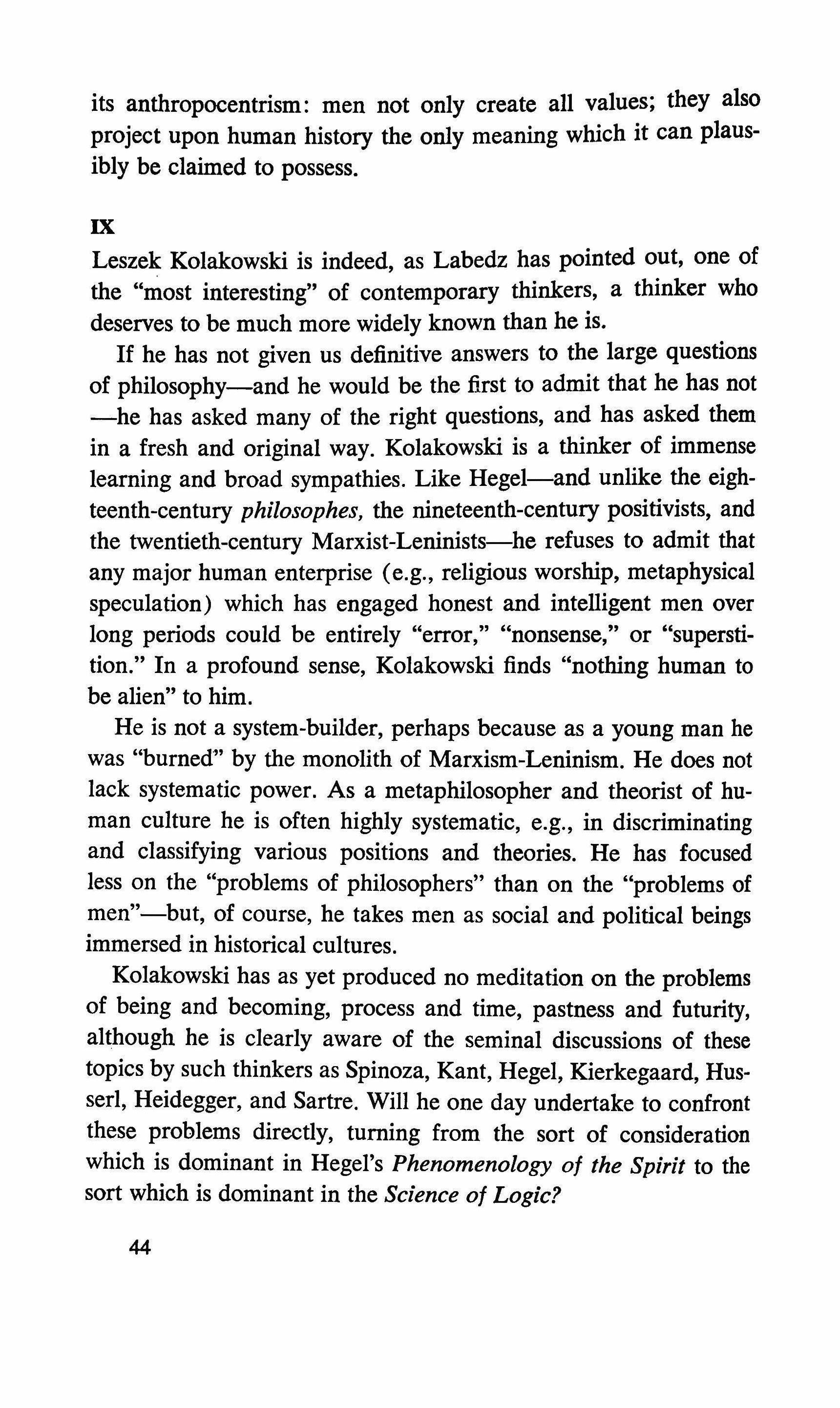
its anthropocentrism: men not only create all values; they also project upon human history the only meaning which it can plausibly be claimed to possess.
Leszek Kolakowski is indeed, as Labedz has pointed out, one of the "most interesting" of contemporary thinkers, a thinker who deserves to be much more widely known than he is.
If he has not given us definitive answers to the large questions of philosophy-and he would be the first to admit that he has not -he has asked many of the right questions, and has asked them in a fresh and original way. Kolakowski is a thinker of immense learning and broad sympathies. Like Hegel-and unlike the eighteenth-century philosophes, the nineteenth-century positivists, and the twentieth-century Marxist-Leninists-he refuses to admit that any major human enterprise (e.g., religious worship, metaphysical speculation) which has engaged honest and intelligent men over long periods could be entirely "error," "nonsense," or "superstition." In a profound sense, Kolakowski finds "nothing human to be alien" to him.
He is not a system-builder, perhaps because as a young man he was "burned" by the monolith of Marxism-Leninism. He does not lack systematic power. As a metaphilosopher and theorist of human culture he is often highly systematic, e.g., in discriminating and classifying various positions and theories. He has focused less on the "problems of philosophers" than on the "problems of men"-but, of course, he takes men as social and political beings immersed in historical cultures.
Kolakowski has as yet produced no meditation on the problems of being and becoming, process and time, pastness and futurity, although he is clearly aware of the seminal discussions of these topics by such thinkers as Spinoza, Kant, Hegel, Kierkegaard, Husserl, Heidegger, and Sartre. Will he one day undertake to confront these problems directly, turning from the sort of consideration which is dominant in Hegel's Phenomenology of the Spirit to the sort which is dominant in the Science of Logic?
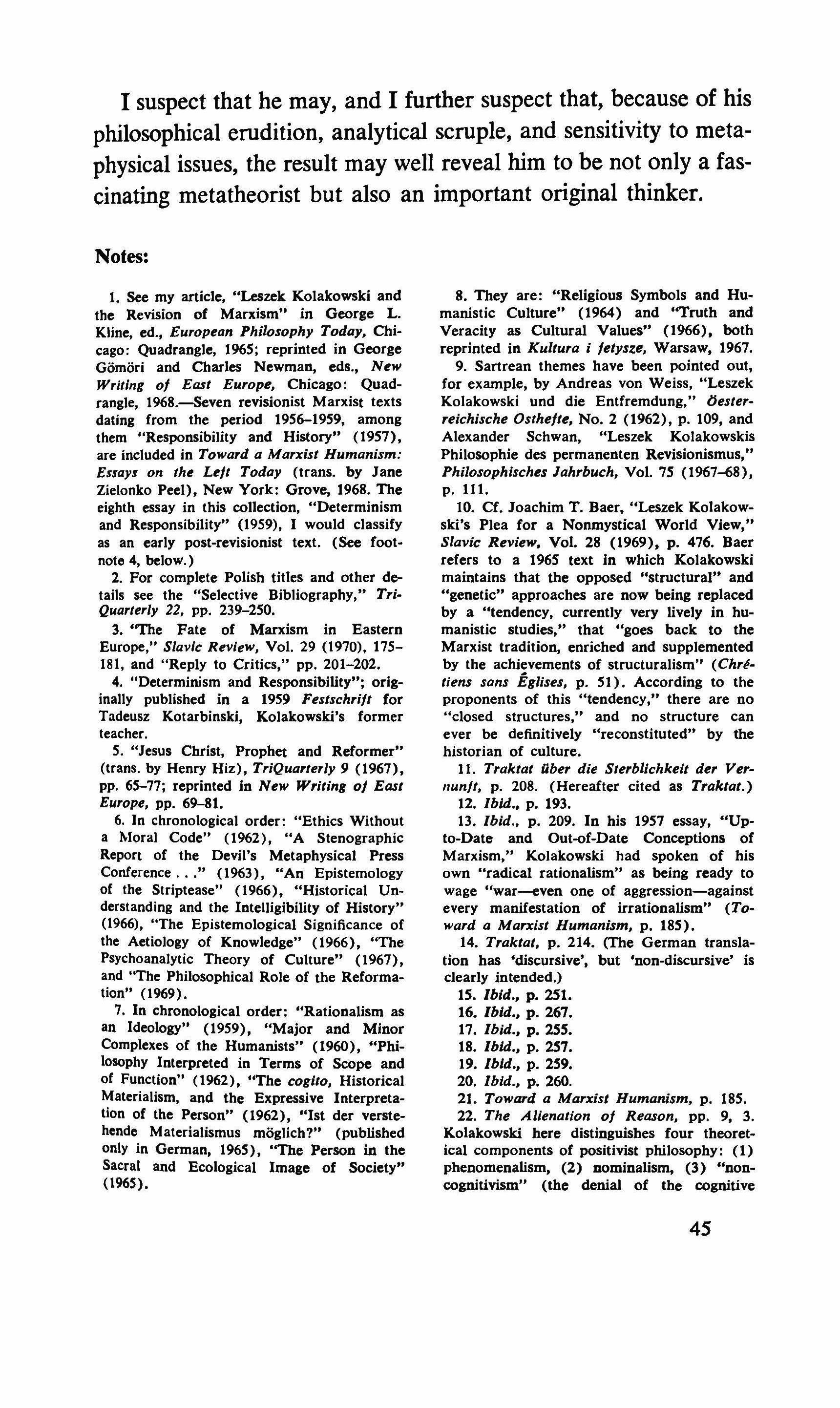
I suspect that he may, and I further suspect that, because of his philosophical erudition, analytical scruple, and sensitivity to metaphysical issues, the result may well reveal him to be not only a fascinating metatheorist but also an important original thinker.
Notes:
1. See my article, "Leszek Kolakowski and the Revision of Marxism" in George L. Kline, ed., European Philosophy Today, Chicago: Quadrangle, 1965; reprinted in George Gomor] and Charles Newman, eds., New Writing 01 East Europe, Chicago: Quadrangle, 1968.-Seven revisionist Marxist texts dating from the period 1956-1959, among them "Responsibility and History" (1957), are included in Toward a Marxist Humanism: Essays on the Left Today (trans. by Jane Zielonko Peel), New York: Grove, 1968. The eighth essay in this collection, "Determinism and Responsibility" (1959), I would classify as an early post-revisionist text. (See footnote 4, below.)
2. For complete Polish titles and other details see the "Selective Bibliography," TriQuarterly 22, pp. 239-250.
3. ''The Fate of Marxism in Eastern Europe," Slavic Review, Vol. 29 (1970), 175181, and "Reply to Critics," pp. 201-202.
4. "Determinism and Responsibility"; originally published in a 1959 Festschrift for Tadeusz Kotarbinski, Kolakowski's former teacher.
5. "Jesus Christ, Prophet and Reformer" (trans. by Henry Hiz), TriQuarterly 9 (1967), pp. 65-77; reprinted in New Writing of East Europe, pp. 69-81.
6. In chronological order: "Ethics Without a Moral Code" (1962) "A Stenographic Report of the Devil's Metaphysical Press Conference (1963), "An Epistemology of the Striptease" (1966), "Historical Understanding and the Intelligibility of History" (1966), "The Epistemological Significance of the Aetiology of Knowledge" (1966), "The Psychoanalytic Theory of Culture" (1967), and "The Philosophical Role of the Reformation" (1969).
7. In chronological order: "Rationalism as an Ideology" (1959), "Major and Minor Complexes of the Humanists" (1960), "Philosophy Interpreted in Terms of Scope and of Function" (1962), "The cogito, Historical Materialism, and the Expressive Interpretation of the Person" (1962), "Ist der verstehende Materialismus moglich?" (published only in German, 1965), "The Person in the Sacral and Ecological Image of Society" (1965),
8. They are: "Religious Symbols and Humanistic Culture" (1964) and "Truth and Veracity as Cultural Values" (1966), both reprinted in Kultura I fetysze, Warsaw, 1967.
9. Sartrean themes have been pointed out, for example, by Andreas von Weiss, "Leszek Kolakowski und die Entfrerndung," /jesterreichische Ostheite, No.2 (1962), p. 109, and Alexander Schwan, "Leszek Kolakowskis Philosophie des permanenten Revisionismus," Philosophisches Jahrbuch, Vol. 75 (1967-68), p. 111.
10. Cf. Joachim T. Baer, "Leszek Kolakowski's Plea for a Nonmystical World View," Slavic Review, Vol. 28 (1969), p. 476. Baer refers to a 1965 text in which Kolakowski maintains that the opposed "structural" and "genetic" approaches are now being replaced by a "tendency, currently very lively in humanistic studies," that "goes back to the Marxist tradition, enriched and supplemented by the achievements of structuralism" (ehretiens sans Eglises, p. 51). According to the proponents of this "tendency," there are no "closed structures," and no structure can ever be definitively "reconstituted" by the historian of culture.
11. Traktat aber die Sterblichkelt der Vernunjt, p. 208. (Hereafter cited as Traktat.v
12. Ibid., p. 193.
13. tua.. p. 209. In his 1957 essay, "Upto-Date and Out-of-Date Conceptions of Marxism," Kolakowski had spoken of his own "radical rationalism" as being ready to wage "war--even one of aggression-against every manifestation of irrationalism" (Toward Q Marxist Humanism, p. 185).
14. Traktat, p. 214. (The German translation has 'discursive', but 'non-discursive' is clearly Intended.)
15. Ibid., p. 251.
16. tua., p. 267.
17. tu«, p. 255.
18. tu«, p. 257.
19. Ibid., p. 259.
20. Ibid., p. 260.
21. Toward a Marrlst Humanism, p. 185.
22. The Alienation of Reason, pp. 9, 3. Kolakowski here distinguishes four theoretical components of positivist philosophy: (1) phenomenalism, (2) nominalism, (3) "noncognitivism" (the denial of the cognitive

status of value judgments), and (4) the doctrine of the "unity of scientific method."
23. The Alienation of Reason, p. 10.
24. Traktat, pp, 219f.
25. Ibid., pp. 22Of.
26. tu«. p. 236.
27. Ibid., p. 242.
28. The Alienation of Reason, pp. 203f.
29. Traktat, p. 168.
30. The Alienation of Reason, p. 208.
31. tu«, p. 210.
32. Traktat, p. 11.
33. iu«. p. 255.
34. The Alienation of Reason, p. 219.
35. The German translation has Natur, but the Polish original has kultura (cf. Traktat, p. 15; Kultura I /etysze, p. 20).
36. WII shall consider some of the details of Kolakowski's critique of the "psychoanalytic theory of culture" in Sec. III below.
37. For example, Kolakowski wrote in 1958 that if Spinoza's solution to the "two main problems of life to which philosophy has to give an answer-the problem of freedom and the problem of death-is fictitious, it is the most beautiful of the many fictions with which philosophy has nourished the human mind down through the ages" (Jednostka i nieskonczonoIE, Warsaw, 1958, p. 623).
38. Traktat, p. 21.
39. tua; p. 22.
40. tu«, p. 241.
41. Chretiens, p. 49.
42. Traktat, p. 184.
43. tu«, p. 185.
44. Chretiens, pp. 27f.
45. tu«, p. 30.
46. tua; p. SO.
47. tu«. p. 609.
48. Traktat, p. 20.
49. Chretiens, p. 806.
SO. "Jesus Christ, Prophet and Reformer," New Writing of East Europe, p. 76.
51. Ibid., pp. 77-80.
52. Kolakowski as quoted in A. Melucci, "Leszek Kolakowski: un marxismo spreghidlcato," Rivista dl /iloso/ia neo-scolastica, Vol. 59 (1967), p. 620.
53. "The Fate of Marxism in Eastern Europe," Slavic Review, Vol. 29 (1970), p. 181.
54. Chretiens, p. 69.
55. tu«, p. 334.
56. tu«, p. 799.
57. "The Psychoanalytic Theory of Culture," TrlQuarterly 22, p. 89.
58. ''The Epistemological Significance of the Aetiology of Knowledge," TriQuarterly 22, p. 222. 46
59. "The psychoanalytic Theory ," p. 91.
60. Traktat, p. 166.
61. ''The Psychoanalytic Theory ," p. 99.
62. tu«, p. 102.
63. "An Epistemology of the Striptease," TriQuarterly 22, p. 60.
64. tsu; p. 60.
65. Ibid., p. 63.
66. Ibid., p. 66.
67. Ibtd., p. 66.
68. uu; p. 67.
69. The text in the Traktat makes Engels appear as a representative of "alchemy" and Hegel as a defender of "scientism." The text published in Forum, Vol. 12, No. 138-139 (1965), p. 285, is correct.
70. Traktat, p. 252.
71. Ibid., p. 179.
72. Ibid., pp. 176f.
73. Ibid., p. 173.
74. "The Epistemological Significance ," p. 221.
75. tua; p. 224.
76. tu«, p. 230.
77. tua; p. 232.
78. Ibid., p. 238.
79. Traktat, p. 180.
80. Chretiens, p. 23; The Alienation 0/ Reason, pp. 205f; cf. also Traktat, p. 233.
81. The Alienation of Reason, p. 203.
82. Traktat, p. 265.
83. See especially his essay, "Responsibility and History" (1957), in Toward a Marxist Humanism.
84. The Polish term osobowosc may also mean 'personality'. The Polish term /ednostka means 'individual'.
85. The Polish term is czl'owiek. Since Polish uses no articles, there is no way to distinguish syntactically between 'man', 'a man', and 'the man'. (Cf. Latin homo.)
86. Traktat, p. 18.
87. tsu., pp. 130f.
88. Ibtd., p. 134.
89. Ibid., p. 149.
90. On Freud's "destruction of subjectivity" see "The Psychoanalytic Theory ," pp. 89f. For Marx, even the young Marx, subjectivity is thin and "abstract" (in a HegeIian sense of the term). To be truly human, one must produce, i.e., objectify. Human selfactualization, to be significant, must issue in an external, public, historical product. (See my article, "Some Critical Comments on Marx's Philosophy," in N. Lobkowicz, ed., Marx and the Western World, Notre Dame University Press, 1967, esp, pp. 427-429.)
91. Traktat, p. 145.
92. Ibid., p. 151.
93. Ibid., p. IS9.
94. Traktat, pp. 8Sf. The italicized phrase appears in the original journal version of the article and is included in the German translation but was deleted by the censor from the collection of Kolakowski's essays published in 1967. (Cf. Kultura IletYlU, p. 143.)
9S. The italicized phrase was deleted by the censor. (Cf. Kultura I letysze, p. 144.) In the German version the Polish word probablUstyc:z;ny is mistranslated as prohlblstlsch. (Ct. Traktat, p. 86.)
96. In one place Kolakowski refers to man as an "absolute though finite being" (ehretiens, p. 801). However, his closest approach to a grounding of moral values turns
out to be quite "biologistic." Since moral convictions-he writes--are "part of the selfdefensive [i.e., adaptive] behavior of the human race, any negation of their validity is nonsense" (Toward a Marxist HumanIsm, p. 203n4).
97. The Alienation 0/ Reason, pp, 192, 193.
98. Traktat, p. 23S.
99. "Ethics Without a Moral Code," TriQuarterly 22, p. 173.
100. Ibid., p. 177.
101. Ibid., pp. 1621.
102. "Historical Understanding and the Intelligibility of History," TrlQuarterly 22, pp. 116f.
103. tsu; p. 117.
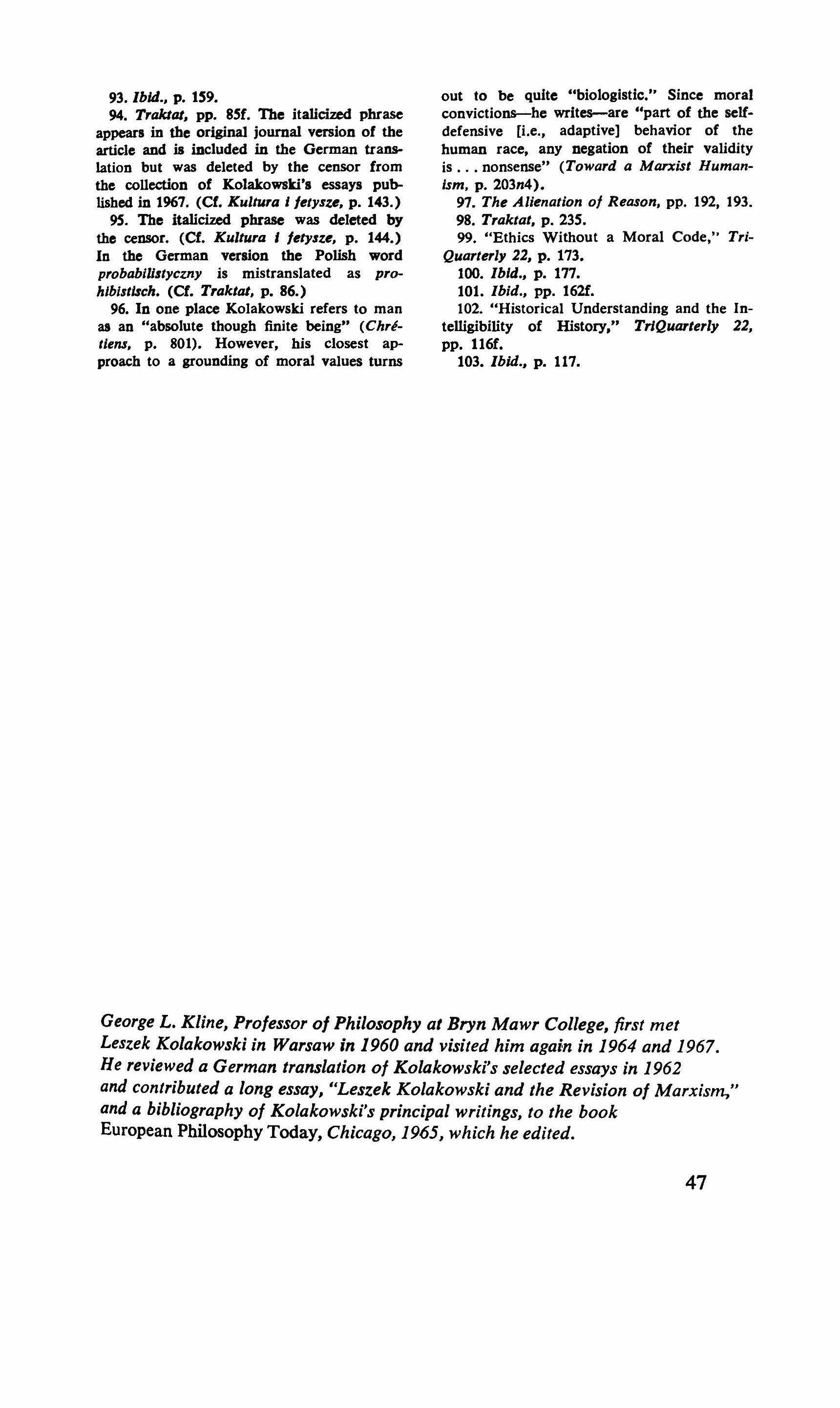
George L. Kline, Professor of Philosophy at Bryn Mawr College, first met Leszek Kolakowski in Warsaw in 1960 and visited him again in 1964 and 1967. He reviewed a German translation of Kolakowski's selected essays in 1962 and contributed a long essay, "Leszek Kolakowski and the Revision of Marxism," and a bibliography of Kolakowski's principal writings, to the book European Philosophy Today, Chicago, 1965, which he edited.
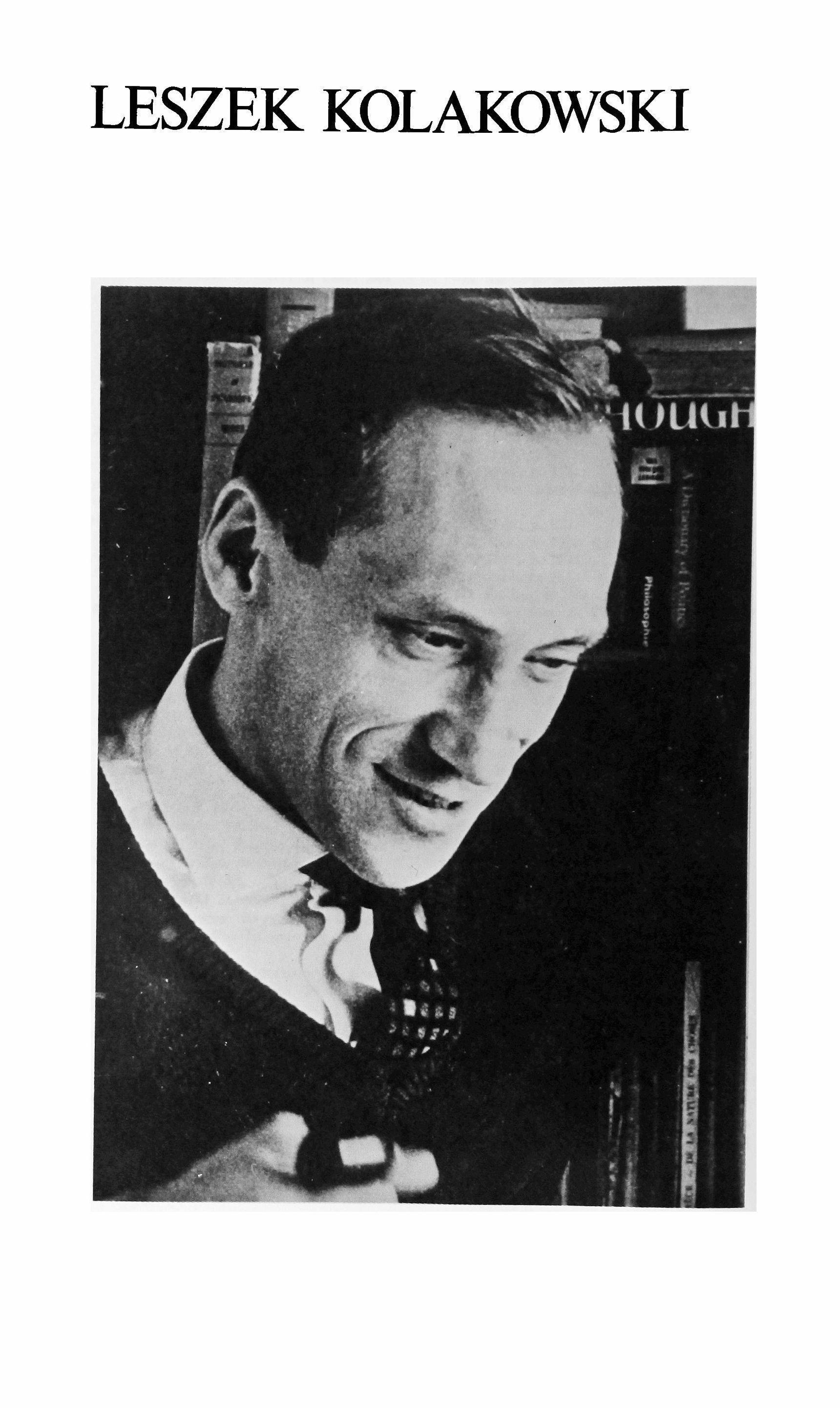
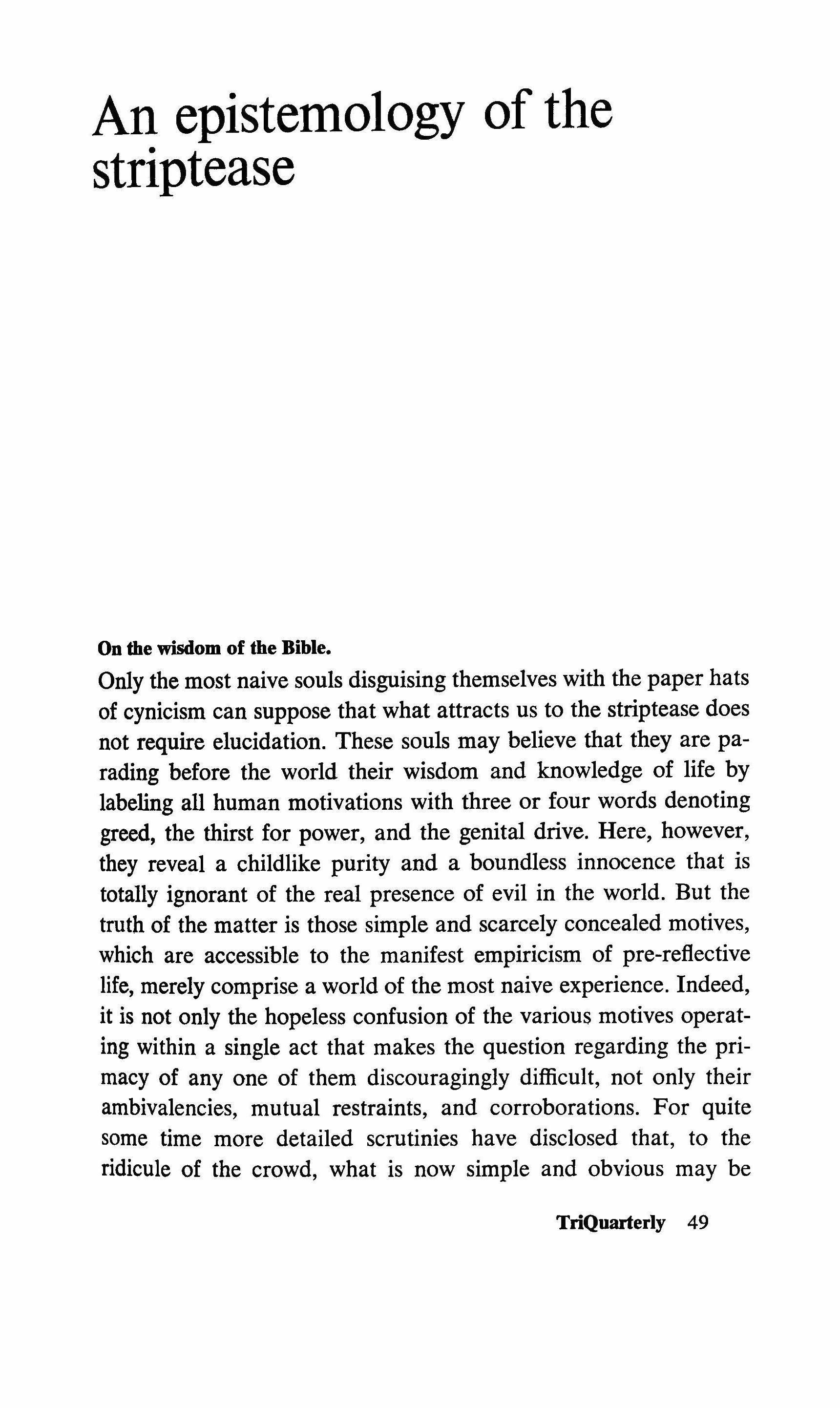
On the wisdom of the Bible.
Only the most naive souls disguising themselves with the paper hats of cynicism can suppose that what attracts us to the striptease does not require elucidation. These souls may believe that they are parading before the world their wisdom and knowledge of life by labeling all human motivations with three or four words denoting greed, the thirst for power, and the genital drive. Here, however, they reveal a childlike purity and a boundless innocence that is totally ignorant of the real presence of evil in the world. But the truth of the matter is those simple and scarcely concealed motives, which are accessible to the manifest empiricism of pre-reflective life, merely comprise a world of the most naive experience. Indeed, it is not only the hopeless confusion of the various motives operating within a single act that makes the question regarding the primacy of anyone of them discouragingly difficult, not only their ambivalencies, mutual restraints, and corroborations. For quite some time more detailed scrutinies have disclosed that, to the ridicule of the crowd, what is now simple and obvious may be
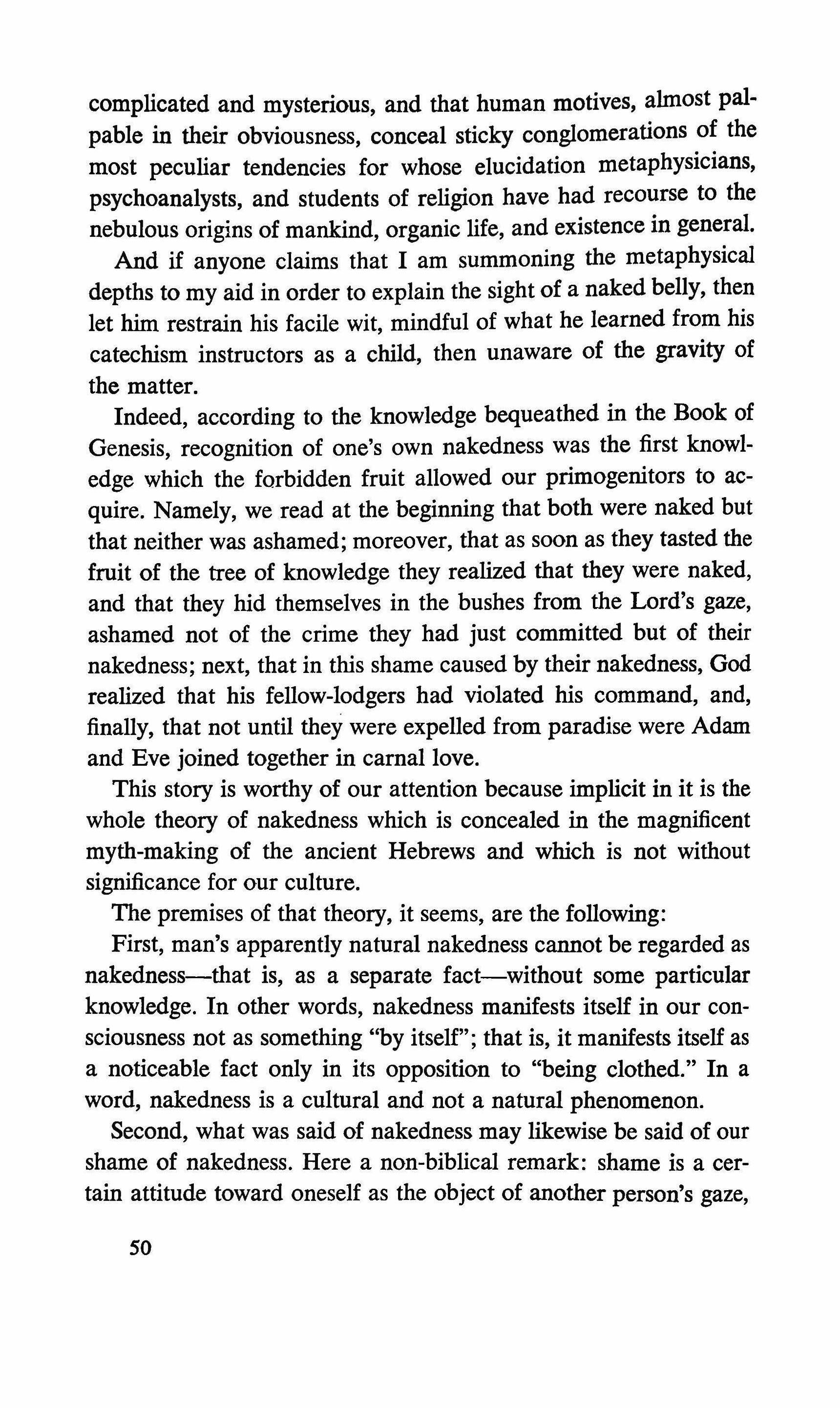
complicated and mysterious, and that human motives, almost palpable in their obviousness, conceal sticky conglomerations of the most peculiar tendencies for whose elucidation metaphysicians, psychoanalysts, and students of religion have had recourse to the nebulous origins of mankind, organic life, and existence in general.
And if anyone claims that I am summoning the metaphysical depths to my aid in order to explain the sight of a naked belly, then let him restrain his facile wit, mindful of what he learned from his catechism instructors as a child, then unaware of the gravity of the matter.
Indeed, according to the knowledge bequeathed in the Book of Genesis, recognition of one's own nakedness was the first knowledge which the forbidden fruit allowed our primogenitors to acquire. Namely, we read at the beginning that both were naked but that neither was ashamed; moreover, that as soon as they tasted the fruit of the tree of knowledge they realized that they were naked, and that they hid themselves in the bushes from the Lord's gaze, ashamed not of the crime they had just committed but of their nakedness; next, that in this shame caused by their nakedness, God realized that his fellow-lodgers had violated his command, and, finally, that not until they were expelled from paradise were Adam and Eve joined together in carnal love.
This story is worthy of our attention because implicit in it is the whole theory of nakedness which is concealed in the magnificent myth-making of the ancient Hebrews and which is not without significance for our culture.
The premises of that theory, it seems, are the following:
First, man's apparently natural nakedness cannot be regarded as nakedness-that is, as a separate fact-without some particular knowledge. In other words, nakedness manifests itself in our consciousness not as something "by itself"; that is, it manifests itself as a noticeable fact only in its opposition to "being clothed." In a word, nakedness is a cultural and not a natural phenomenon.
Second, what was said of nakedness may likewise be said of our shame of nakedness. Here a non-biblical remark: shame is a certain attitude toward oneself as the object of another person's gaze, so
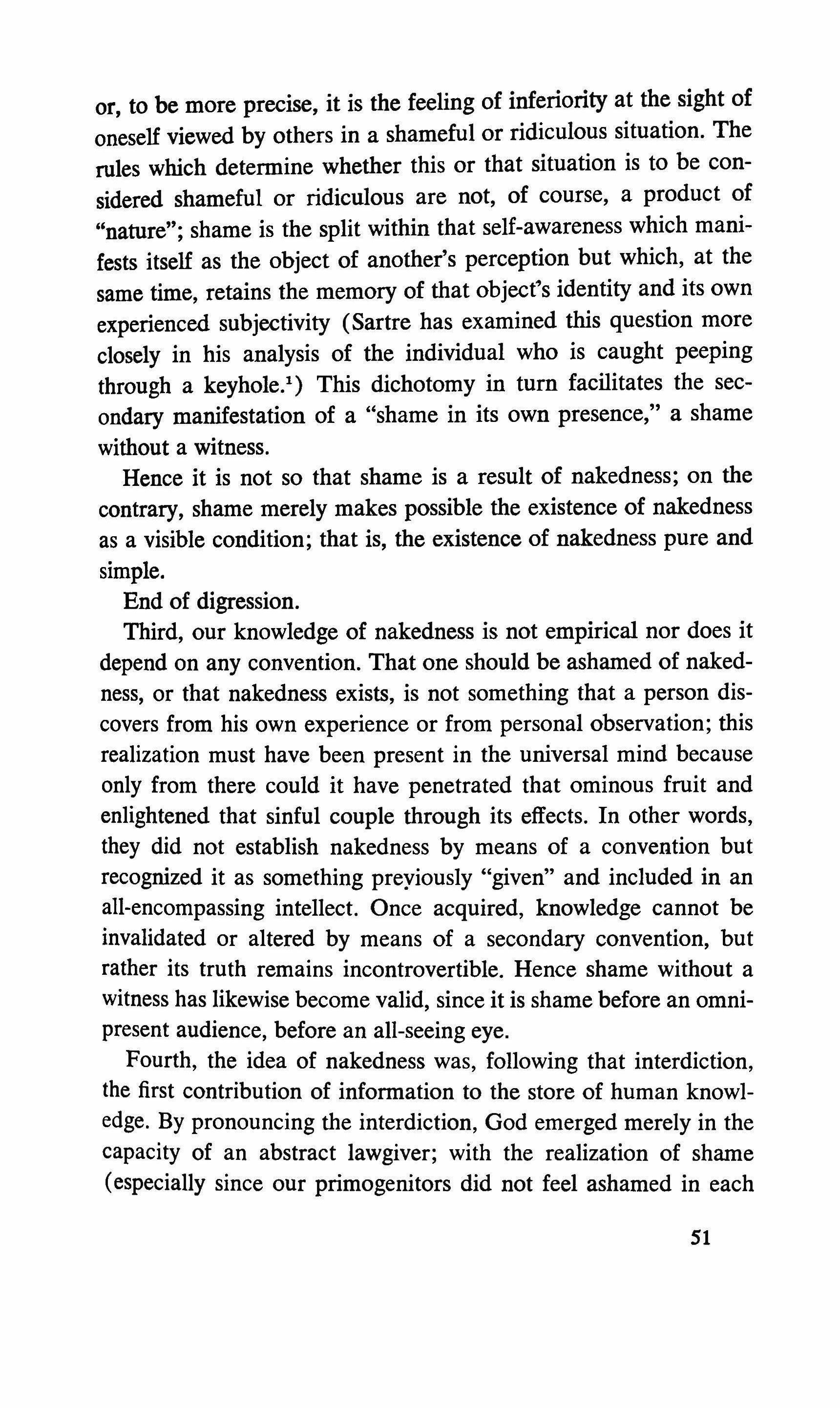
or, to be more precise, it is the feeling of inferiority at the sight of oneself viewed by others in a shameful or ridiculous situation. The rules which determine whether this or that situation is to be considered shameful or ridiculous are not, of course, a product of "nature"; shame is the split within that self-awareness which manifests itself as the object of another's perception but which, at the same time, retains the memory of that object's identity and its own experienced subjectivity (Sartre has examined this question more closely in his analysis of the individual who is caught peeping through a keyhole. 1 ) This dichotomy in turn facilitates the secondary manifestation of a "shame in its own presence," a shame without a witness.
Hence it is not so that shame is a result of nakedness; on the contrary, shame merely makes possible the existence of nakedness as a visible condition; that is, the existence of nakedness pure and simple.
Third, our knowledge of nakedness is not empirical nor does it depend on any convention. That one should be ashamed of nakedness, or that nakedness exists, is not something that a person discovers from his own experience or from personal observation; this realization must have been present in the universal mind because only from there could it have penetrated that ominous fruit and enlightened that sinful couple through its effects. In other words, they did not establish nakedness by means of a convention but recognized it as something preyiously "given" and included in an all-encompassing intellect. Once acquired, knowledge cannot be invalidated or altered by means of a secondary convention, but rather its truth remains incontrovertible. Hence shame without a witness has likewise become valid, since it is shame before an omnipresent audience, before an all-seeing eye.
Fourth, the idea of nakedness was, following that interdiction, the first contribution of information to the store of human knowledge. By pronouncing the interdiction, God emerged merely in the capacity of an abstract lawgiver; with the realization of shame (especially since our primogenitors did not feel ashamed in each
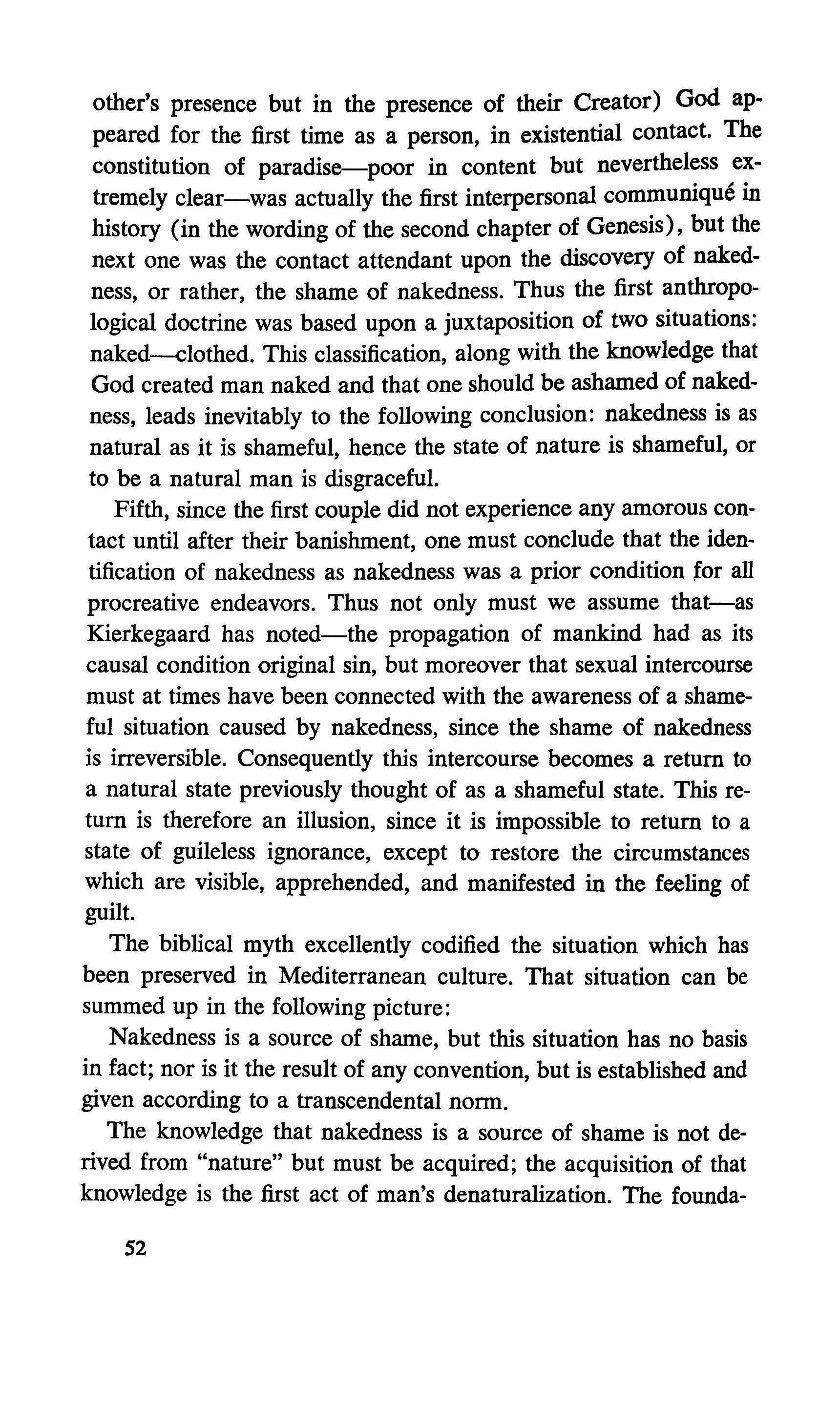
other's presence but in the presence of their Creator) God appeared for the first time as a person, in existential contact. The constitution of paradise-poor in content but nevertheless extremely clear-was actually the first interpersonal communique in history (in the wording of the second chapter of Genesis), but the next one was the contact attendant upon the discovery of nakedness, or rather, the shame of nakedness. Thus the first anthropological doctrine was based upon a juxtaposition of two situations: naked-clothed. This classification, along with the knowledge that God created man naked and that one should be ashamed of nakedness, leads inevitably to the following conclusion: nakedness is as natural as it is shameful, hence the state of nature is shameful, or to be a natural man is disgraceful.
Fifth, since the first couple did not experience any amorous contact until after their banishment, one must conclude that the identification of nakedness as nakedness was a prior condition for all procreative endeavors. Thus not only must we assume that-as Kierkegaard has noted-the propagation of mankind had as its causal condition original sin, but moreover that sexual intercourse must at times have been connected with the awareness of a shameful situation caused by nakedness, since the shame of nakedness is irreversible. Consequently this intercourse becomes a return to a natural state previously thought of as a shameful state. This return is therefore an illusion, since it is impossible to return to a state of guileless ignorance, except to restore the circumstances which are visible, apprehended, and manifested in the feeling of guilt.
The biblical myth excellently codified the situation which has been preserved in Mediterranean culture. That situation can be summed up in the following picture:
Nakedness is a source of shame, but this situation has no basis in fact; nor is it the result of any convention, but is established and given according to a transcendental norm.
The knowledge that nakedness is a source of shame is not derived from "nature" but must be acquired; the acquisition of that knowledge is the first act of man's denaturalization. The founda-

tion of culture (in opposition to nature) is the identification of nakedness in contradistinction to being clothed.
There exists an all-seeing eye which penetrates our clothing and continuously sees each of us as naked, natural, or ashamed. Each of these premises is logically independent of the others; hence each must be acknowledged separately. Together they form a consistent whole which can be expressed as follows: the truth of a man is his shame. As a matter of fact the genuine or natural man is a man unconsciously ashamed (since he is still unaware of his state, even though that state is present according to a divine norm); the man who conceals his shame is the man of culture. To be sure, this shame is suppressed, though not eliminated, since the omniscient eye is always vigilant. Not only did truth and nakedness become related to each other (which is preserved in such expressions as "the naked truth," the "bare fact," etc., as well as in the very etymology of the Greek word which was given so much attention by Heidegger: truth uncoveredness), but truth and shame as well. (When we say "appearance and reality," by these very words we imply that appearance is beautiful and reality is ugly; in much the same way we use almost exclusively such expressions as "he revealed his true face" and others.) Thus did we arrive at the conclusion-humorous in its formulation but nevertheless present in the mental background of our thought-that man is truly naked, while clothing conceals this truth. A return to truth is a return to shame which by now is ineluctably known. We have no choice, therefore, but to oscillate between shame and deception. (In heaven will we be clothed or naked? I wonder whether any of the doctors of the Church have ever taken up this question when discussing the conditions surrounding the resurrection of bodies.)
The application of Husserlian authority. Here a digression. What is the real origin of that imaginary construct? How did the conviction originally come about that one should be ashamed of nakedness and that clothing is a form of concealment? We have no reliable information concerning this question. Yet ever since Descartes in his Principia, Puffendorf in
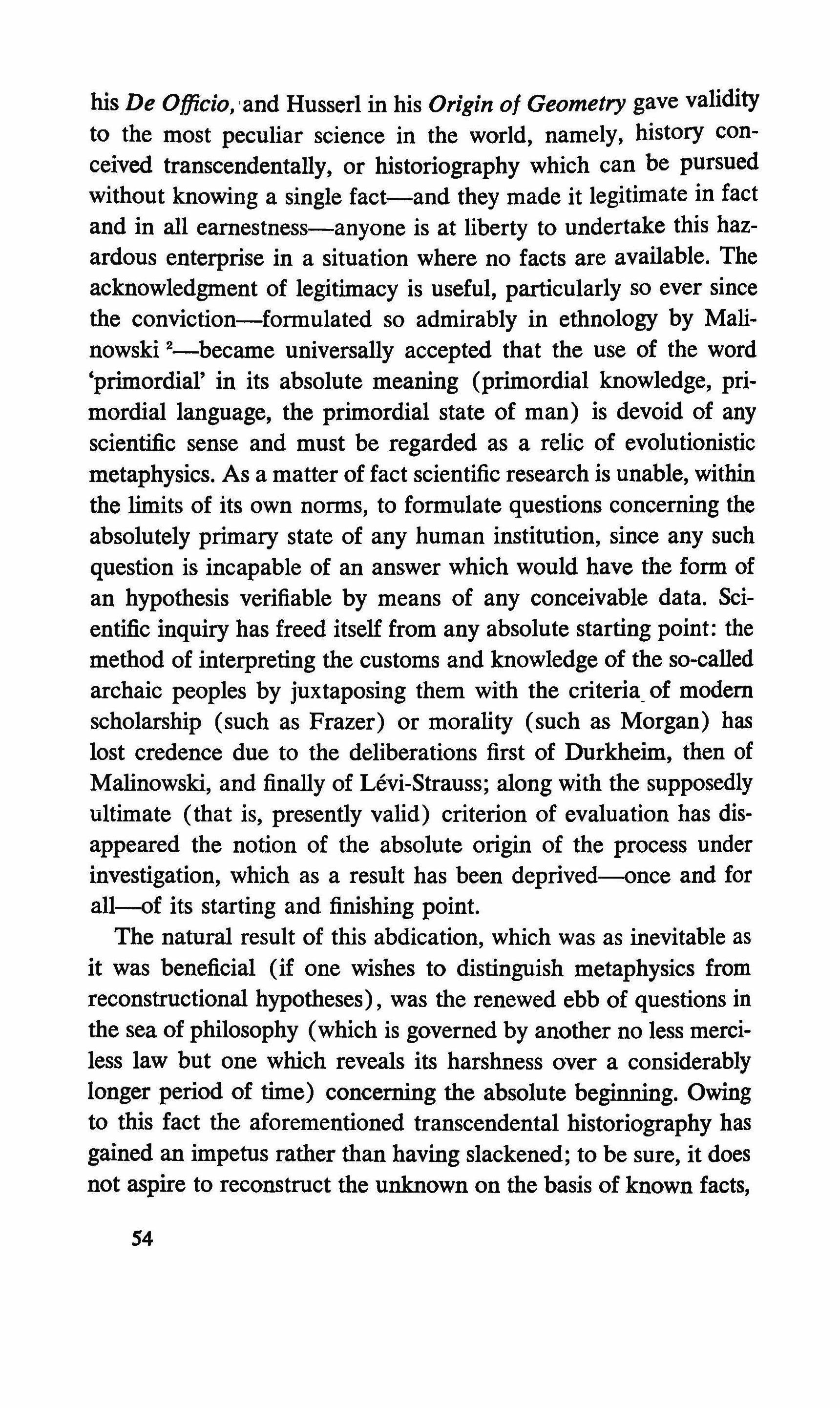
his De Officio, 'and Husserl in his Origin 0/ Geometry gave validity to the most peculiar science in the world, namely, history conceived transcendentally, or historiography which can be pursued without knowing a single fact-and they made it legitimate in fact and in all earnestness-anyone is at liberty to undertake this hazardous enterprise in a situation where no facts are available. The acknowledgment of legitimacy is useful, particularly so ever since the conviction-formulated so admirably in ethnology by Malinowski 2-became universally accepted that the use of the word 'primordial' in its absolute meaning (primordial knowledge, primordiallanguage, the primordial state of man) is devoid of any scientific sense and must be regarded as a relic of evolutionistic metaphysics. As a matter of fact scientific research is unable, within the limits of its own norms, to formulate questions concerning the absolutely primary state of any human institution, since any such question is incapable of an answer which would have the form of an hypothesis verifiable by means of any conceivable data. Scientific inquiry has freed itself from any absolute starting point: the method of interpreting the customs and knowledge of the so-called archaic peoples by juxtaposing them with the criteria_ of modem scholarship (such as Frazer) or morality (such as Morgan) has lost credence due to the deliberations first of Durkheim, then of Malinowski, and finally of Levi-Strauss; along with the supposedly ultimate (that is, presently valid) criterion of evaluation has disappeared the notion of the absolute origin of the process under investigation, which as a result has been deprived-once and for all-of its starting and finishing point.
The natural result of this abdication, which was as inevitable as it was beneficial (if one wishes to distinguish metaphysics from reconstructional hypotheses), was the renewed ebb of questions in the sea of philosophy (which is governed by another no less merciless law but one which reveals its harshness over a considerably longer period of time) concerning the absolute beginning. Owing to this fact the aforementioned transcendental historiography has gained an impetus rather than having slackened; to be sure, it does not aspire to reconstruct the unknown on the basis of known facts, S4
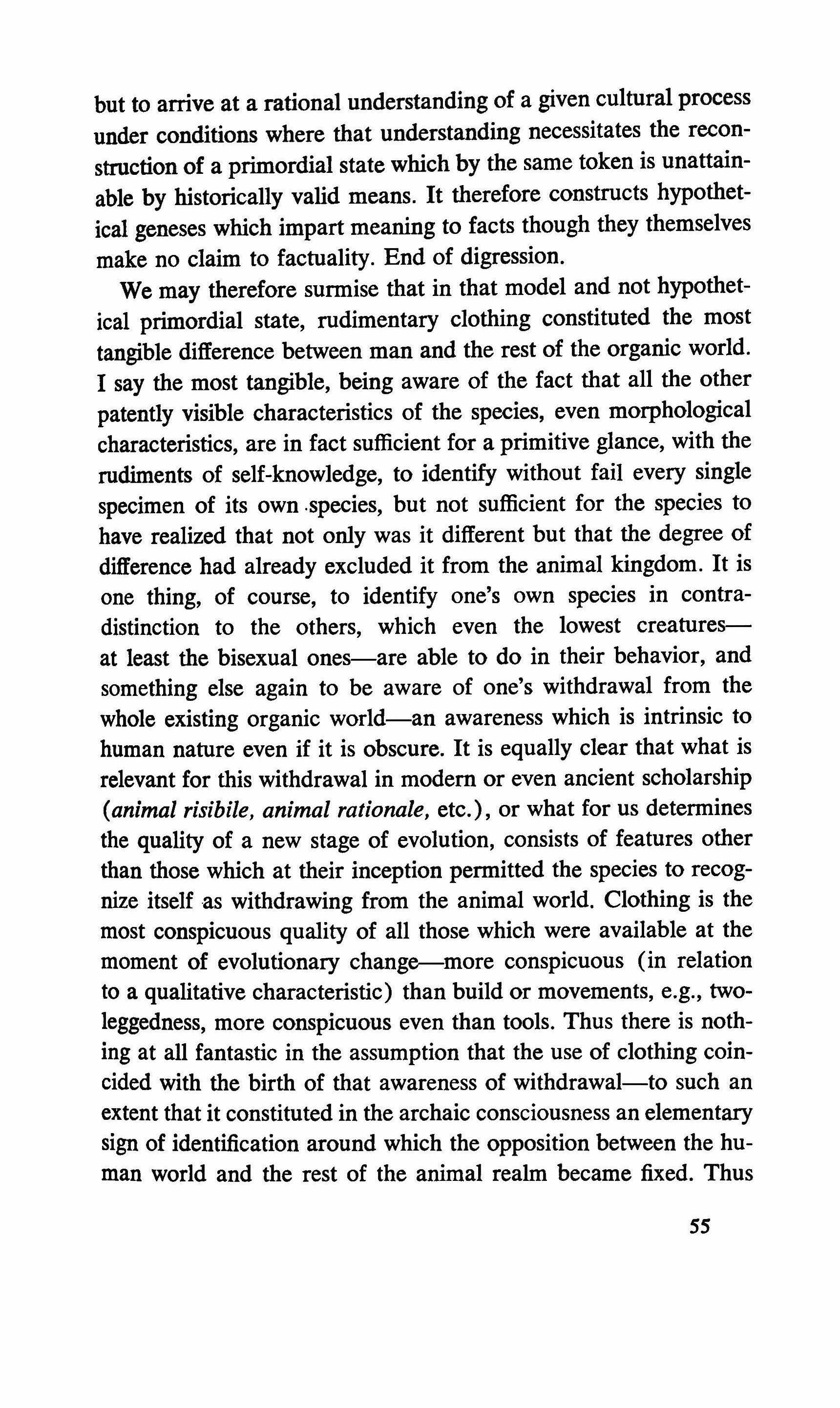
but to arrive at a rational understanding of a given cultural process under conditions where that understanding necessitates the reconstruction of a primordial state which by the same token is unattainable by historically valid means. It therefore constructs hypothetical geneses which impart meaning to facts though they themselves make no claim to factuality. End of digression.
We may therefore surmise that in that model and not hypothetical primordial state, rudimentary clothing constituted the most tangible difference between man and the rest of the organic world. I say the most tangible, being aware of the fact that all the other patently visible characteristics of the species, even morphological characteristics, are in fact sufficient for a primitive glance, with the rudiments of self-knowledge, to identify without fail every single specimen of its own .species, but not sufficient for the species to have realized that not only was it different but that the degree of difference had already excluded it from the animal kingdom. It is one thing, of course, to identify one's own species in contradistinction to the others, which even the lowest creaturesat least the bisexual ones-are able to do in their behavior, and something else again to be aware of one's withdrawal from the whole existing organic world-an awareness which is intrinsic to human nature even if it is obscure. It is equally clear that what is relevant for this withdrawal in modem or even ancient scholarship (animal risibile, animal rationale, etc.), or what for us determines the quality of a new stage of evolution, consists of features other than those which at their inception permitted the species to recognize itself as withdrawing from the animal world. Clothing is the most conspicuous quality of all those which were available at the moment of evolutionary change-more conspicuous (in relation to a qualitative characteristic) than build or movements, e.g., twoleggedness, more conspicuous even than tools. Thus there is nothing at all fantastic in the assumption that the use of clothing coincided with the birth of that awareness of withdrawal-to such an extent that it constituted in the archaic consciousness an elementary sign of identification around which the opposition between the human world and the rest of the animal realm became fixed. Thus
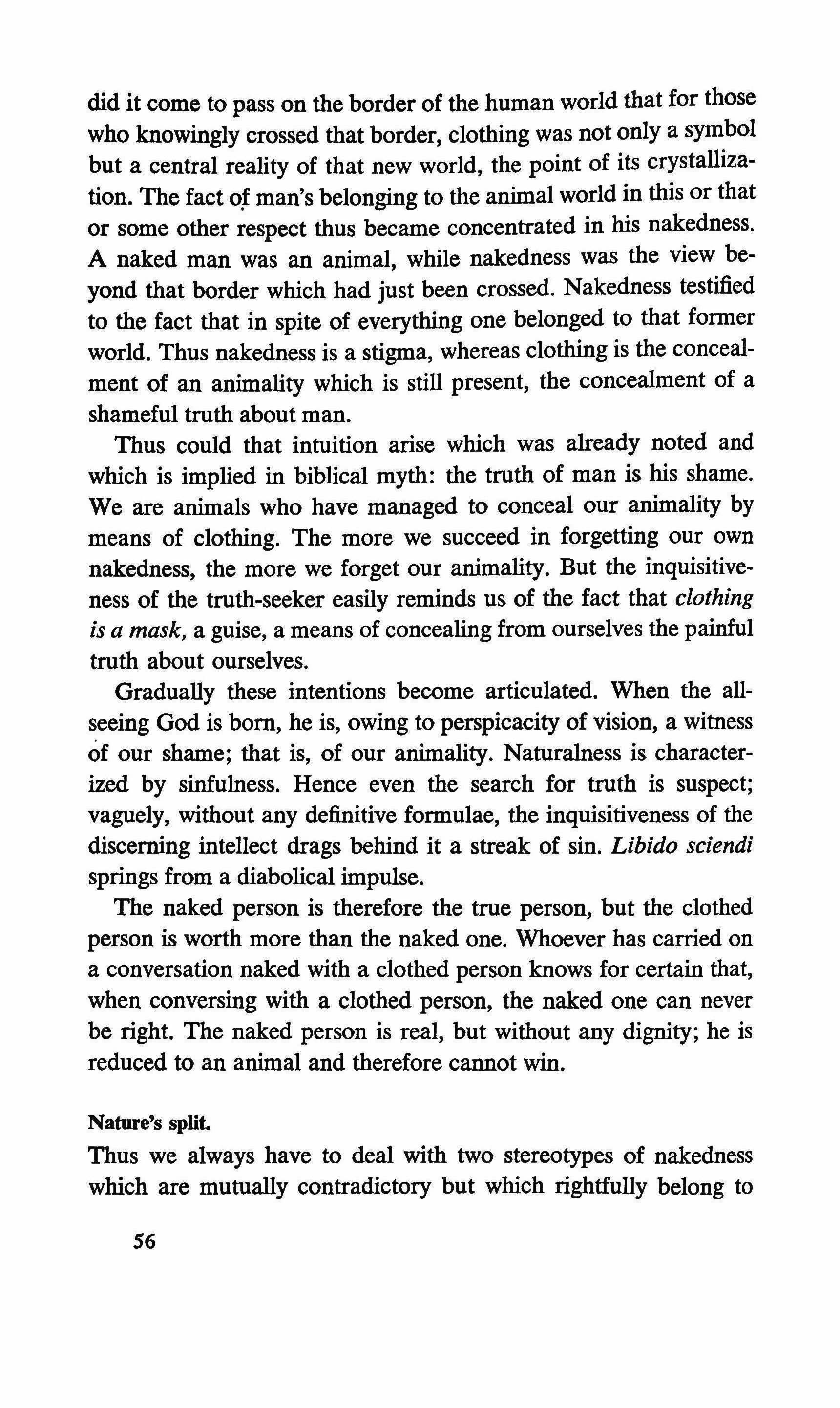
did it come to pass on the border of the human world that for those who knowingly crossed that border, clothing was not only a symbol but a central reality of that new world, the point of its crystallization. The fact of man's belonging to the animal world in this or that or some other respect thus became concentrated in his nakedness. A naked man was an animal, while nakedness was the view beyond that border which had just been crossed. Nakedness testified to the fact that in spite of everything one belonged to that former world. Thus nakedness is a stigma, whereas clothing is the concealment of an animality which is still present, the concealment of a shameful truth about man.
Thus could that intuition arise which was already noted and which is implied in biblical myth: the truth of man is his shame. We are animals who have managed to conceal our animality by means of clothing. The more we succeed in forgetting our own nakedness, the more we forget our animality. But the inquisitiveness of the truth-seeker easily reminds us of the fact that clothing is a mask, a guise, a means of concealing from ourselves the painful truth about ourselves.
Gradually these intentions become articulated. When the allseeing God is born, he is, owing to perspicacity of vision, a witness of our shame; that is, of our animality. Naturalness is characterized by sinfulness. Hence even the search for truth is suspect; vaguely, without any definitive formulae, the inquisitiveness of the discerning intellect drags behind it a streak of sin. Libido sciendi springs from a diabolical impulse.
The naked person is therefore the true person, but the clothed person is worth more than the naked one. Whoever has carried on a conversation naked with a clothed person knows for certain that, when conversing with a clothed person, the naked one can never be right. The naked person is real, but without any dignity; he is reduced to an animal and therefore cannot win.
Nature's split.
Thus we always have to deal with two stereotypes of nakedness which are mutually contradictory but which rightfully belong to S6
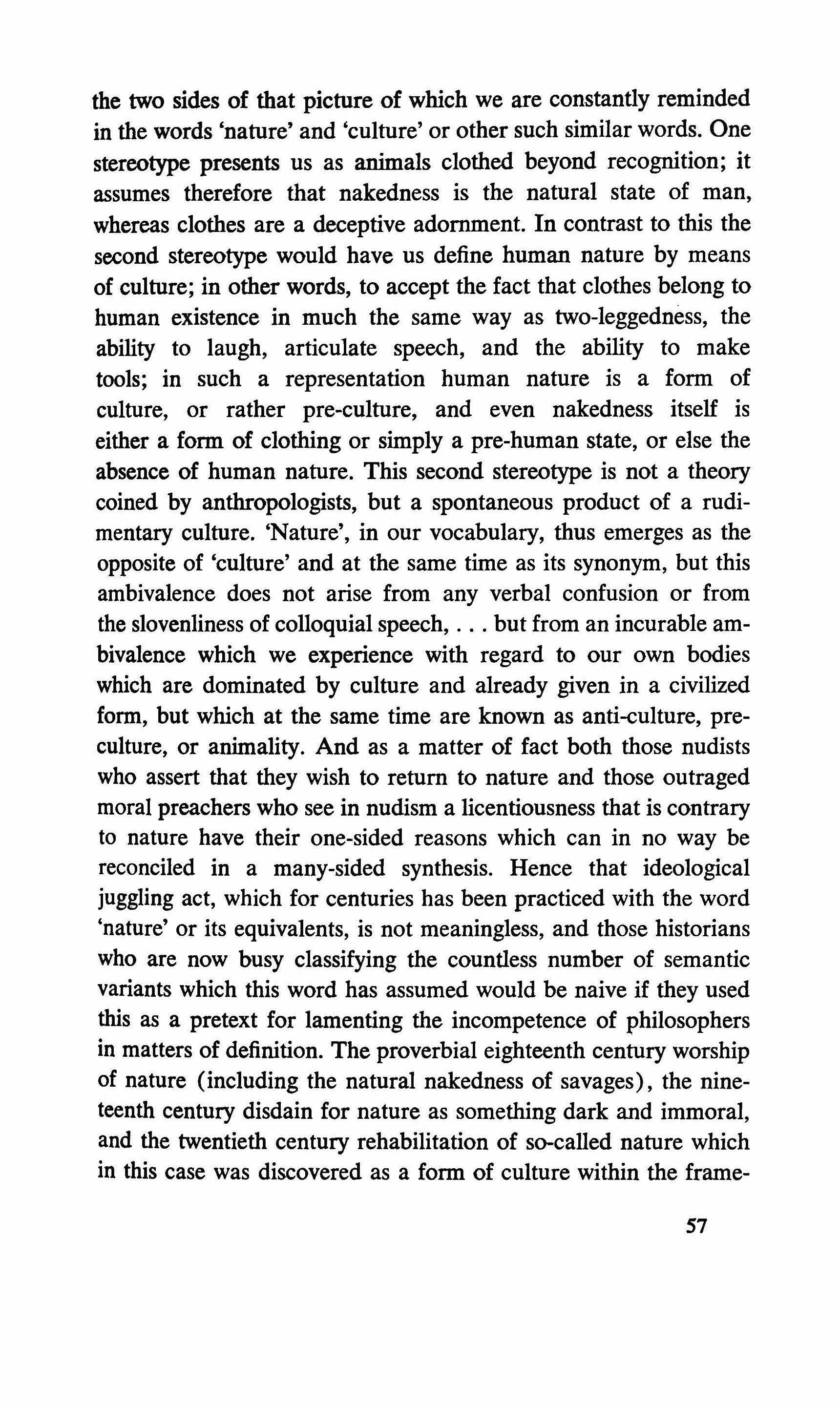
the two sides of that picture of which we are constantly reminded in the words 'nature' and 'culture' or other such similar words. One stereotype presents us as animals clothed beyond recognition; it assumes therefore that nakedness is the natural state of man, whereas clothes are a deceptive adornment. In contrast to this the second stereotype would have us define human nature by means of culture; in other words, to accept the fact that clothes belong to human existence in much the same way as two-leggedness, the ability to laugh, articulate speech, and the ability to make tools; in such a representation human nature is a form of culture, or rather pre-culture, and even nakedness itself is either a form of clothing or simply a pre-human state, or else the absence of human nature. This second stereotype is not a theory coined by anthropologists, but a spontaneous product of a rudimentary culture. 'Nature', in our vocabulary, thus emerges as the opposite of 'culture' and at the same time as its synonym, but this ambivalence does not arise from any verbal confusion or from the slovenliness of colloquial speech, but from an incurable ambivalence which we experience with regard to our own bodies which are dominated by culture and already given in a civilized form, but which at the same time are known as anti-culture, preculture, or animality. And as a matter of fact both those nudists who assert that they wish to return to nature and those outraged moral preachers who see in nudism a licentiousness that is contrary to nature have their one-sided reasons which can in no way be reconciled in a many-sided synthesis. Hence that ideological juggling act, which for centuries has been practiced with the word 'nature' or its equivalents, is not meaningless, and those historians who are now busy classifying the countless number of semantic variants which this word has assumed would be naive if they used this as a pretext for lamenting the incompetence of philosophers in matters of definition. The proverbial eighteenth century worship of nature (including the natural nakedness of savages), the nineteenth century disdain for nature as something dark and immoral, and the twentieth century rehabilitation of so-called nature which in this case was discovered as a form of culture within the frame-
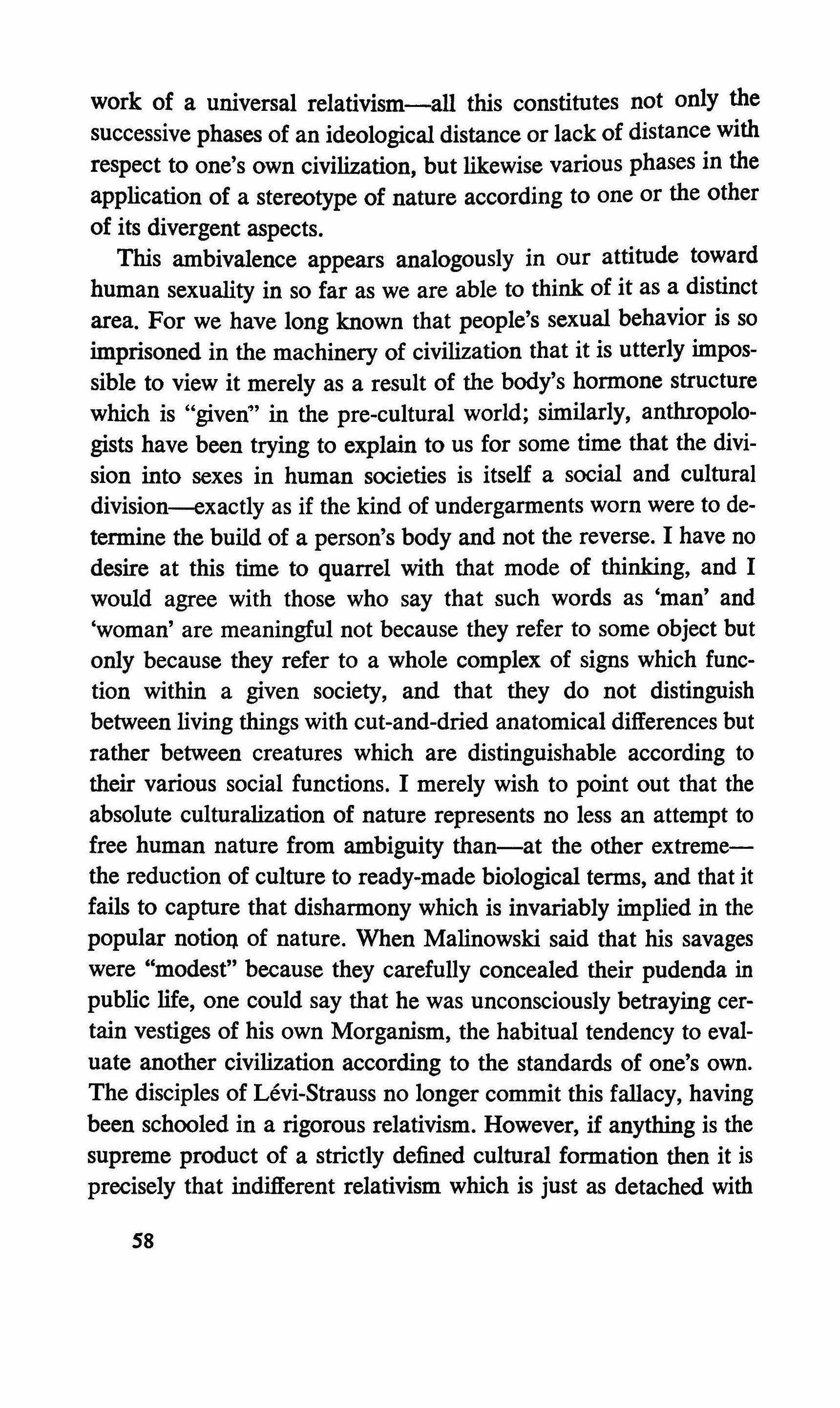
work of a universal relativism-all this constitutes not only the successive phases of an ideological distance or lack of distance with respect to one's own civilization, but likewise various phases in the application of a stereotype of nature according to one or the other of its divergent aspects.
This ambivalence appears analogously in our attitude toward human sexuality in so far as we are able to think of it as a distinct area. For we have long known that people's sexual behavior is so imprisoned in the machinery of civilization that it is utterly impossible to view it merely as a result of the body's hormone structure which is "given" in the pre-cultural world; similarly, anthropologists have been trying to explain to us for some time that the division into sexes in human societies is itself a social and cultural division-exactly as if the kind of undergarments worn were to determine the build of a person's body and not the reverse. I have no desire at this time to quarrel with that mode of thinking, and I would agree with those who say that such words as 'man' and 'woman' are meaningful not because they refer to some object but only because they refer to a whole complex of signs which function within a given society, and that they do not distinguish between living things with cut-and-dried anatomical differences but rather between creatures which are distinguishable according to their various social functions. I merely wish to point out that the absolute culturalization of nature represents no less an attempt to free human nature from ambiguity than-at the other extremethe reduction of culture to ready-made biological terms, and that it fails to capture that disharmony which is invariably implied in the popular notion of nature. When Malinowski said that his savages were "modest" because they carefully concealed their pudenda in public life, one could say that he was unconsciously betraying certain vestiges of his own Morganism, the habitual tendency to evaluate another civilization according to the standards of one's own. The disciples of Levi-Strauss no longer commit this fallacy, having been schooled in a rigorous relativism. However, if anything is the supreme product of a strictly defined cultural formation then it is precisely that indifferent relativism which is just as detached with
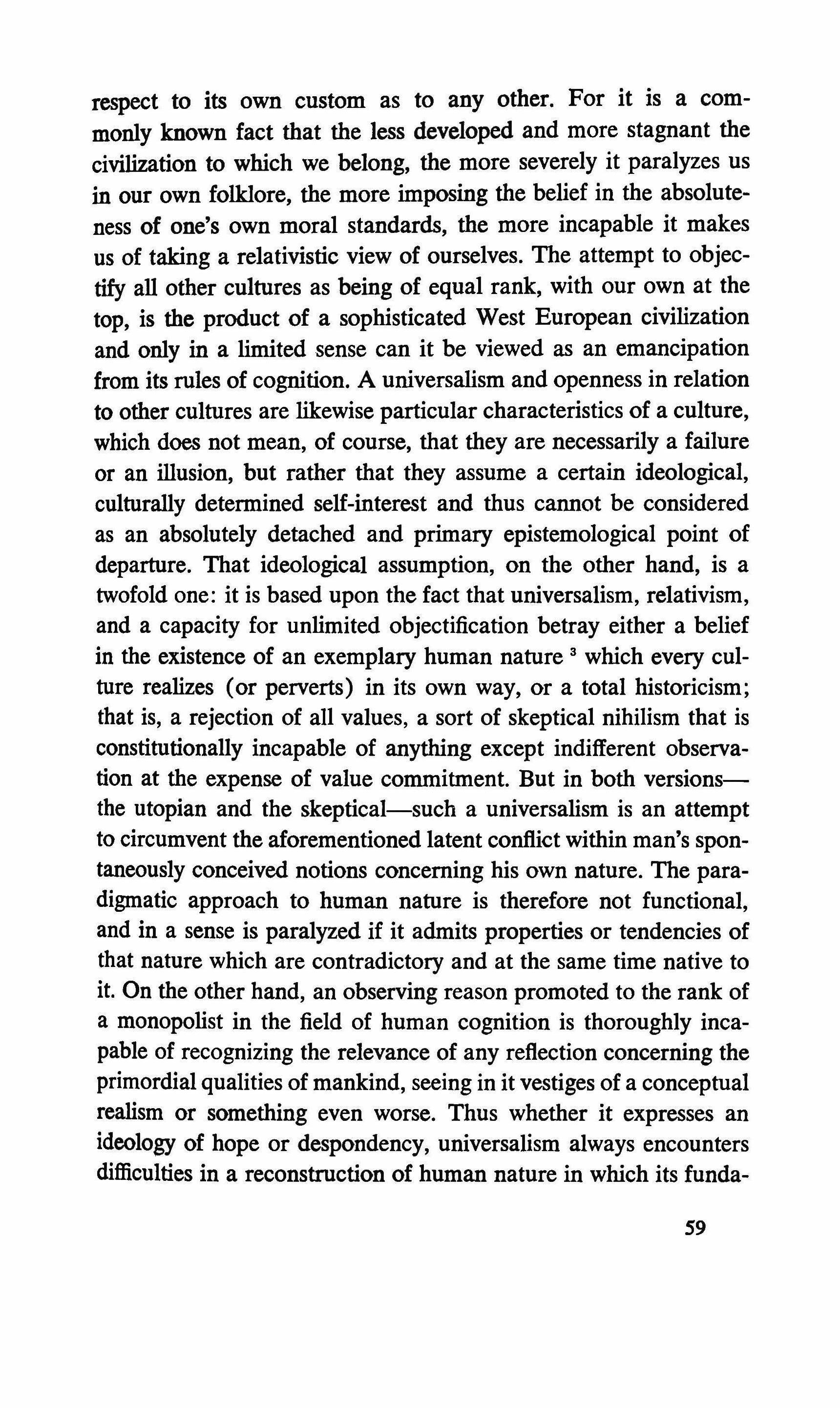
respect to its own custom as to any other. For it is a commonly known fact that the less developed and more stagnant the civilization to which we belong, the more severely it paralyzes us in our own folklore, the more imposing the belief in the absoluteness of one's own moral standards, the more incapable it makes us of taking a relativistic view of ourselves. The attempt to objectify all other cultures as being of equal rank, with our own at the top, is the product of a sophisticated West European civilization and only in a limited sense can it be viewed as an emancipation from its rules of cognition. A universalism and openness in relation to other cultures are likewise particular characteristics of a culture, which does not mean, of course, that they are necessarily a failure or an illusion, but rather that they assume a certain ideological, culturally determined self-interest and thus cannot be considered as an absolutely detached and primary epistemological point of departure. That ideological assumption, on the other hand, is a twofold one: it is based upon the fact that universalism, relativism, and a capacity for unlimited objectification betray either a belief in the existence of an exemplary human nature 3 which every culture realizes (or perverts) in its own way, or a total historicism; that is, a rejection of all values, a sort of skeptical nihilism that is constitutionally incapable of anything except indifferent observation at the expense of value commitment. But in both versionsthe utopian and the skeptical-such a universalism is an attempt to circumvent the aforementioned latent conflict within man's spontaneously conceived notions concerning his own nature. The paradigmatic approach to human nature is therefore not functional, and in a sense is paralyzed if it admits properties or tendencies of that nature which are contradictory and at the same time native to it. On the other hand, an observing reason promoted to the rank of a monopolist in the field of human cognition is thoroughly incapable of recognizing the relevance of any reflection concerning the primordialqualities of mankind, seeing in it vestiges of a conceptual realism or something even worse. Thus whether it expresses an ideology of hope or despondency, universalism always encounters difficulties in a reconstruction of human nature in which its funda-

mental incoherence would be made visible. The understanding of nakedness is affected by this situation. Nakedness may be understood either as a part of the much regretted, innocent, exemplary, and original nature of man or as one of many equal and equally indifferent cultural phenomena. In order to truly grasp the contradiction inherent in the realization of nakedness (nakedness as the real, animal version of human nature which is concealed by clothing; nakedness as a particular instance of clothing, as zero clothing, which exists only within a certain civilization-and outside civilization there is no human nature) it is necessary to accomplish something that is virtually impossible: to identify oneself with one's own culture and at the same time maintain an objectifying distance in relation to it. Identification is necessary for preserving the purely cultural meaning of nakedness in our experience; distance is necessary in order to treat clothing as a means of disguising the animal and to treat nakedness as undisguised man. Yet such a quasi-schizophrenia, complicated as it may be in plain speech, is peculiar to unarticulated everyday experience and it alone can elucidate the most significant aspects of a striptease show.
The dialectical structure of perception during a striptease show.
Let us return to the beginning. The supposition that striptease fans are seeking sexual arousement and that this is a sufficient explanation of their motives is a gross oversimplification, for there is no "natural" tie between nakedness and sexual arousement. That tie must in every instance be created by culture. In itself it explains nothing and remains itself a subject of inquiry. (In the Victorian epoch every portion of a woman's uncovered skin was an erotic allusion; if on the other hand we say that "the fashion has changed" then we immediately give rise to new questions rather than explain anything). Moreover, the heavy attendance of women at such shows forces us to look for additional interpretations if we wish to avoid the absurd supposition that it is simply a matter of lesbian curiosity.
Let us first of all consider two elements which are present in that
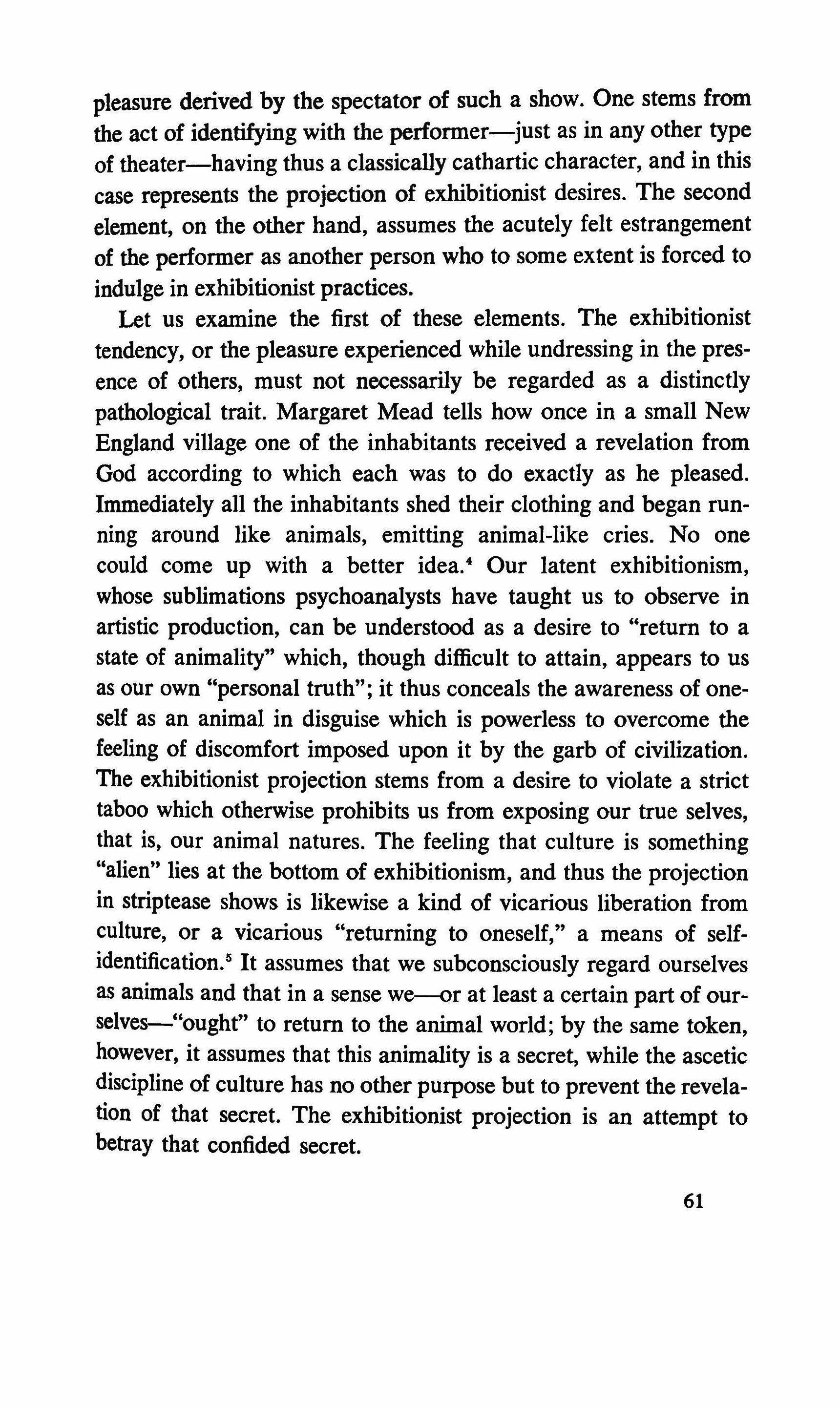
pleasure derived by the spectator of such a show. One stems from the act of identifying with the pedormer-just as in any other type of theater-having thus a classically cathartic character, and in this case represents the projection of exhibitionist desires. The second element, on the other hand, assumes the acutely felt estrangement of the performer as another person who to some extent is forced to indulge in exhibitionist practices.
Let us examine the first of these elements. The exhibitionist tendency, or the pleasure experienced while undressing in the presence of others, must not necessarily be regarded as a distinctly pathological trait. Margaret Mead tells how once in a small New England village one of the inhabitants received a revelation from God according to which each was to do exactly as he pleased.
Immediately all the inhabitants shed their clothing and began running around like animals, emitting animal-like cries. No one could come up with a better idea.' Our latent exhibitionism, whose sublimations psychoanalysts have taught us to observe in artistic production, can be understood as a desire to "return to a state of animality" which, though difficult to attain, appears to us as our own "personal truth"; it thus conceals the awareness of oneself as an animal in disguise which is powerless to overcome the feeling of discomfort imposed upon it by the garb of civilization. The exhibitionist projection stems from a desire to violate a strict taboo which otherwise prohibits us from exposing our true selves, that is, our animal natures. The feeling that culture is something "alien" lies at the bottom of exhibitionism, and thus the projection in striptease shows is likewise a kind of vicarious liberation from culture, or a vicarious "returning to oneself," a means of selfidentification." It assumes that we subconsciously regard ourselves as animals and that in a sense we--or at least a certain part of ourselves-"ought" to return to the animal world; by the same token, however, it assumes that this animality is a secret, while the ascetic discipline of culture has no other purpose but to prevent the revelation of that secret. The exhibitionist projection is an attempt to betray that confided secret.
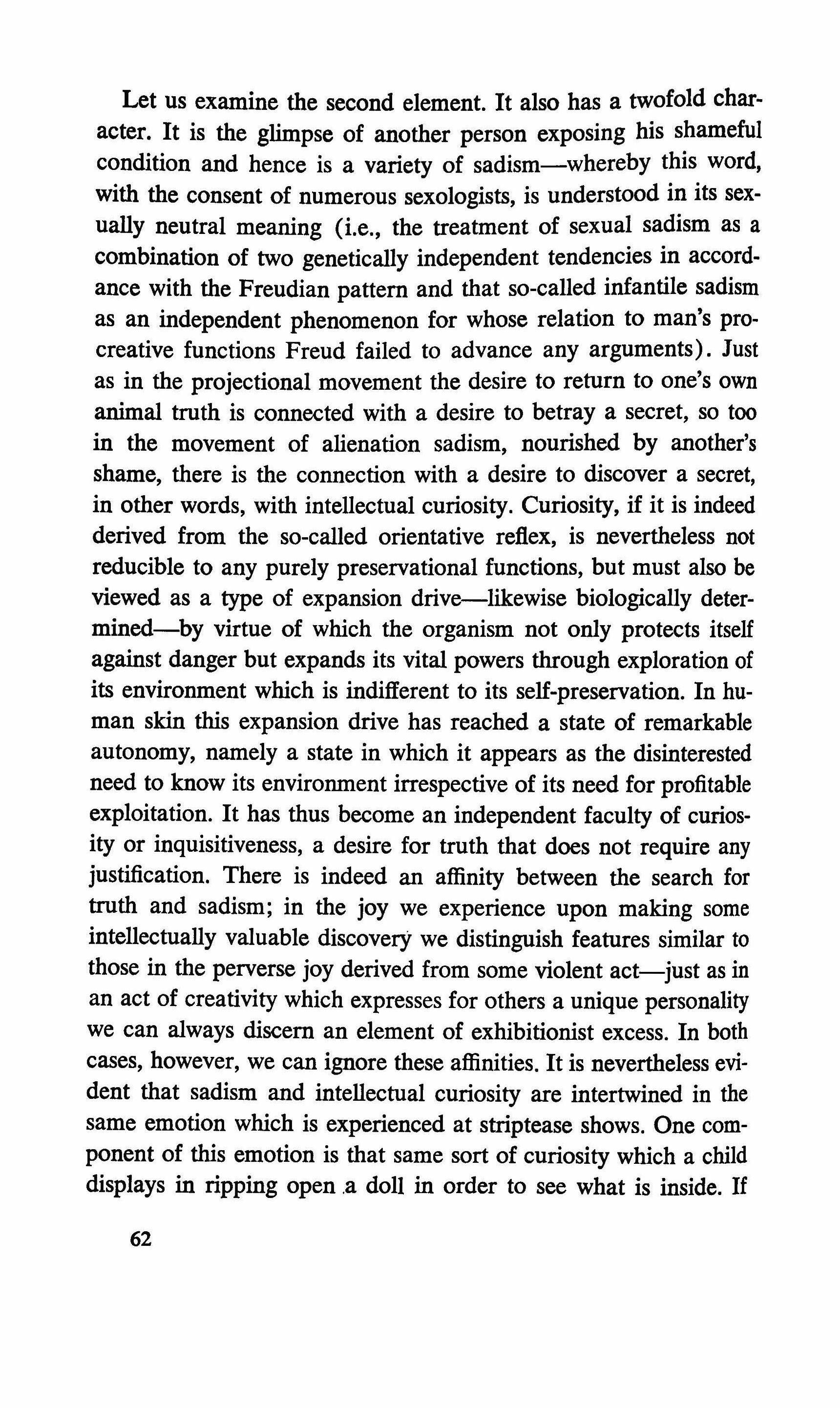
Let us examine the second element. It also has a twofold character. It is the glimpse of another person exposing his shameful condition and hence is a variety of sadism-whereby this word, with the consent of numerous sexologists, is understood in its sexually neutral meaning (i.e., the treatment of sexual sadism as a combination of two genetically independent tendencies in accordance with the Freudian pattern and that so-called infantile sadism as an independent phenomenon for whose relation to man's procreative functions Freud failed to advance any arguments). Just as in the projectional movement the desire to return to one's own animal truth is connected with a desire to betray a secret, so too in the movement of alienation sadism, nourished by another's shame, there is the connection with a desire to discover a secret, in other words, with intellectual curiosity. Curiosity, if it is indeed derived from the so-called orientative reflex, is nevertheless not reducible to any purely preservational functions, but must also be viewed as a type of expansion drive-likewise biologically determined-by virtue of which the organism not only protects itself against danger but expands its vital powers through exploration of its environment which is indifferent to its self-preservation. In human skin this expansion drive has reached a state of remarkable autonomy, namely a state in which it appears as the disinterested need to know its environment irrespective of its need for profitable exploitation. It has thus become an independent faculty of curiosity or inquisitiveness, a desire for truth that does not require any justification. There is indeed an affinity between the search for truth and sadism; in the joy we experience upon making some intellectually valuable discovery we distinguish features similar to those in the perverse joy derived from some violent act-just as in an act of creativity which expresses for others a unique personality we can always discern an element of exhibitionist excess. In both cases, however, we can ignore these affinities. It is nevertheless evident that sadism and intellectual curiosity are intertwined in the same emotion which is experienced at striptease shows. One component of this emotion is that same sort of curiosity which a child displays in ripping open a doll in order to see what is inside. If
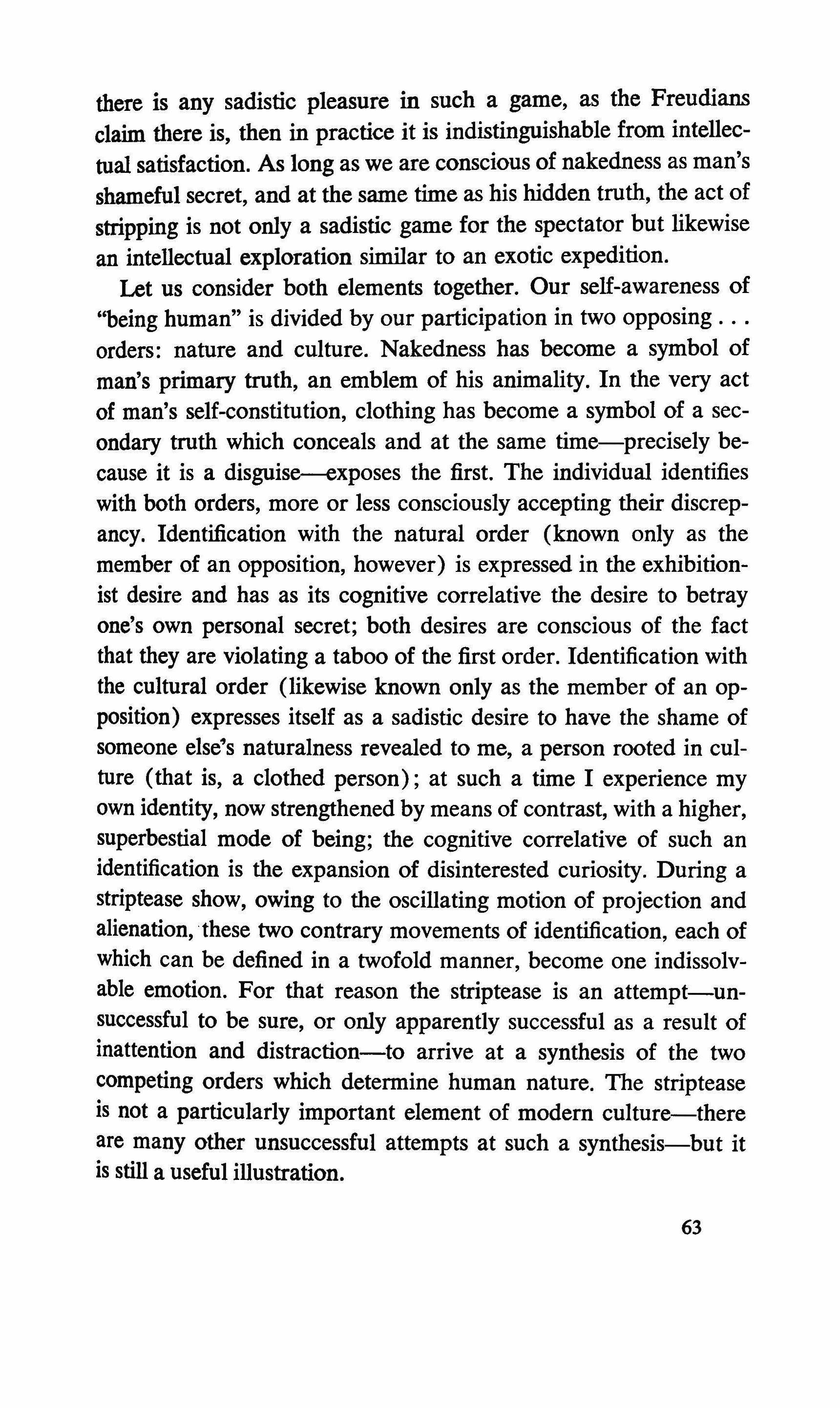
there is any sadistic pleasure in such a game, as the Freudians claim there is, then in practice it is indistinguishable from intellectual satisfaction. As long as we are conscious of nakedness as man's shameful secret, and at the same time as his hidden truth, the act of stripping is not only a sadistic game for the spectator but likewise an intellectual exploration similar to an exotic expedition. Let us consider both elements together. Our self-awareness of "being human" is divided by our participation in two opposing orders: nature and culture. Nakedness has become a symbol of man's primary truth, an emblem of his animality. In the very act of man's self-constitution, clothing has become a symbol of a secondary truth which conceals and at the same time-precisely because it is a disguise--exposes the first. The individual identifies with both orders, more or less consciously accepting their discrepancy. Identification with the natural order (known only as the member of an opposition, however) is expressed in the exhibitionist desire and has as its cognitive correlative the desire to betray one's own personal secret; both desires are conscious of the fact that they are violating a taboo of the first order. Identification with the cultural order (likewise known only as the member of an opposition) expresses itself as a sadistic desire to have the shame of someone else's naturalness revealed to me, a person rooted in culture (that is, a clothed person); at such a time I experience my own identity, now strengthened by means of contrast, with a higher, superbestial mode of being; the cognitive correlative of such an identification is the expansion of disinterested curiosity. During a striptease show, owing to the oscillating motion of projection and alienation, these two contrary movements of identification, each of which can be defined in a twofold manner, become one indissolvable emotion. For that reason the striptease is an attempt-unsuccessful to be sure, or only apparently successful as a result of inattention and distraction-to arrive at a synthesis of the two competing orders which determine human nature. The striptease is not a particularly important element of modern culture-there are many other unsuccessful attempts at such a synthesis-but it is still a useful illustration.

A self-defense.
I shall reply to three objections. The first is a crude one though it may arise. It goes as follows: What is man after all? An animal which has had a hat pressed on its head by force? A boar kicking against the spear pricks? I would answer that the boar has neither sharpened the spears nor does he charge at himself with one. Cultural restrictions, viewed as a constraint on nature, are just as much a human product as nature itself, which is identified only as the counterpart of a presumed persecutor. The presence of a certain system of sexual restrictions is an indispensable condition of any human civilization-there are few anthropologists who would dispute this relationship; if all the rules and sacral considerations protecting them were suddenly to vanish from the collective consciousness of society, if the force of our superego suddenly lost its effectiveness on a universal scale, the whole of human civilization would become a heap of ruins in the space of two generations. From this point of view, it is worth recalling that the differences between the puritanical and liberal sexual codes are insignificant when compared to the distance separating them from some hypothetical state of absolute freedom; this fact is easily overlooked because the strictures which constitute the common core of both puritanical and liberal codes appear so obvious that frequently they are not even formulated, with the result that their multiplicity does not strike the eye. Nevertheless, the fact that even these relaxed rules are themselves rules, that is, partial executors of that force exerted by culture, cannot be dismissed. That is why I am suspicious of all those philosophies of harmony which see in culture or in the specifically human "spirit" only an ennobling superstructure gracefully draped over the animal body (as the Thomist and all hylomorphic schools teach), while much closer to the truth seems to me to be the position of Scheler, who sees in culture an act of ascetic negation with respect to one's own body. 6
The second objection concerns the striptease itself. It goes as follows: Anyone who goes to striptease shows is perfectly aware of the fact that he is seeking sexual arousement. It is utterly ridiculous to explain the problem as though this simple though universally operative and universally known motive were not at all present. I

would reply that I am not impervious to this fact and I make no attempt to conceal it. Nor am I in any way prompted by a desire to deny the obvious or by a fondness for paradox. On the other hand I would say that ever since our culture legitimized certain manifestations of sexual appetite and rescued it from the darkness, sexual motivations have encountered increasingly less resistance in people's understanding of their own behavior and have become easily recognizable. From this it does not follow, however, that everything which has sexual impulses as a conscious motive has thus been explained. For at no time and at no stage does sexual behavior appear in a purified form, free of culturally acquired patterns. Therefore the question why certain conditions (e.g., even nakedness itself) establish themselves as sexually important, and become part of a socially recognized pattern associated with sexual activities, is always valid. Secondly, the conviction that sexuality itself requires no interpretation but is simply present in nature as an absolutely primary fact has in any case been wisely criticized, above all by the Jungian school; of equal validity is the question to what extent sexual behavior is a particularization, manifestation, or concealment of more primitive energies. The assumption that in a developed system of disguised self-deception the authentic basis invariably has a sexual character, or that as soon as sexual motivation becomes conscious it alone must be the "true" one and can itself no longer disguise anything-such an assumption is the inheritance of puritanical prejudice and, in the theoretical realm, of Freudian schemata. Modern civilization, which has allowed sexual motivations a certain degree of public exposure, has thus made of them a possible means of camouflaging other motivations.
The third objection is the following: if it is assumed that the interpretation just advanced is capable of being defended, then having recourse to the fundamental structures of human nature in order to explain a frivolous amusement show-a show whose cultural functions are ultimately immaterial-is blatantly artificial and in bad taste. I am addressing myself to this hypothetical objection because it touches upon a question that is crucial for our whole method of reflecting upon culture. Certain fundamental structures of human life are present not only in those grave and momentous

phenomena which likewise attract the attention of anthropologists and philosophers because of their immediate impact-phenomena such as war, religion, racial hatred, sexual life in general, art, political conflicts, the family, etc. They are also present in trivial gestures, frivolous customs, and empty conventions. Tracing the movement of powerful springs in the tiny tributaries, the tiny offshoots of life on the outer periphery of culture, is not only valid but possesses a certain function of its own which has long been known: it is precisely in those trivial cases, those isolated instances, whether they be of degenerate forms or even parodies, that the ubiquity of those basic structures is most glaringly visible. Our culture, for example, abounds in caricature-like remnants left over from the great religious experiences of the past. We are justified in exploring the anthropological background of a phenomenon such as the mass consumption of stimulants; if anyone now regards it as trivial or ridiculous to see, for instance, a link between our modem culture of intoxicants and the functions of religious ecstasy, and if anyone derides us by saying that we are hearing reverberations from the metaphysical depths in the hiccups of a belching drunkard at a railway station bar, then I would reply that the clever fellow is making fun of his own stupidity. For the fact that certain vital functions of the collective life, certain sacred institutions, creeds, myths, and great experiences are, under certain conditions, preserved in ludicrously distorted forms is an extremely relevant subject for anthropological analysis. Thus Mircea Eliade points out-si magna parvisthat the custom of extinguishing the lights on New Year's Eve with the advent of the new year is a remnant of great mythological structures which once divided the course of the world into alternate cycles of growth and decay; 1 every birth of a new world took place after a period of absolute chaos and confusion; certain rituals expressed that entrance into chaos which foreshadowed a renaissance, and our own custom of turning off the lights at midnight on December 31 is an unconscious imitation of those rituals. I recall LeviStrauss' remarkable anthropological analysis of the ways in which names are given to dogs and horses." Studies of this sort are least suited to serve as an object of ridicule. An understanding of the to-
tality of culture, after all, presupposes an understanding of the genesis of its particulars. Even in our most banal gestures there are vague recollections of the origins of human culture just as in our bodies we find traces of our ancestor the lemur, our ancestor the fish, and our ancestor the starfish. Each of us is therefore an individual being and at the same time a member of a species whenever we dream, shoot during a war, make love, write learned treatises, babble away when soused, or go to striptease shows. A genetic and structural understanding of the unity of all these modes of behavior is tantamount to an understanding of our humanity, in other words it is the proper goal of philosophical anthropology. The multistoried layers of our psychic structure have different degrees of mobility like the different layers of oceanic water; yet those plainly visible undulating motions of the surface are ultimately determined by the whole of that stratification and thus at first glance seem to be the work of capricious chance. 1966
translated by Louis
lribarne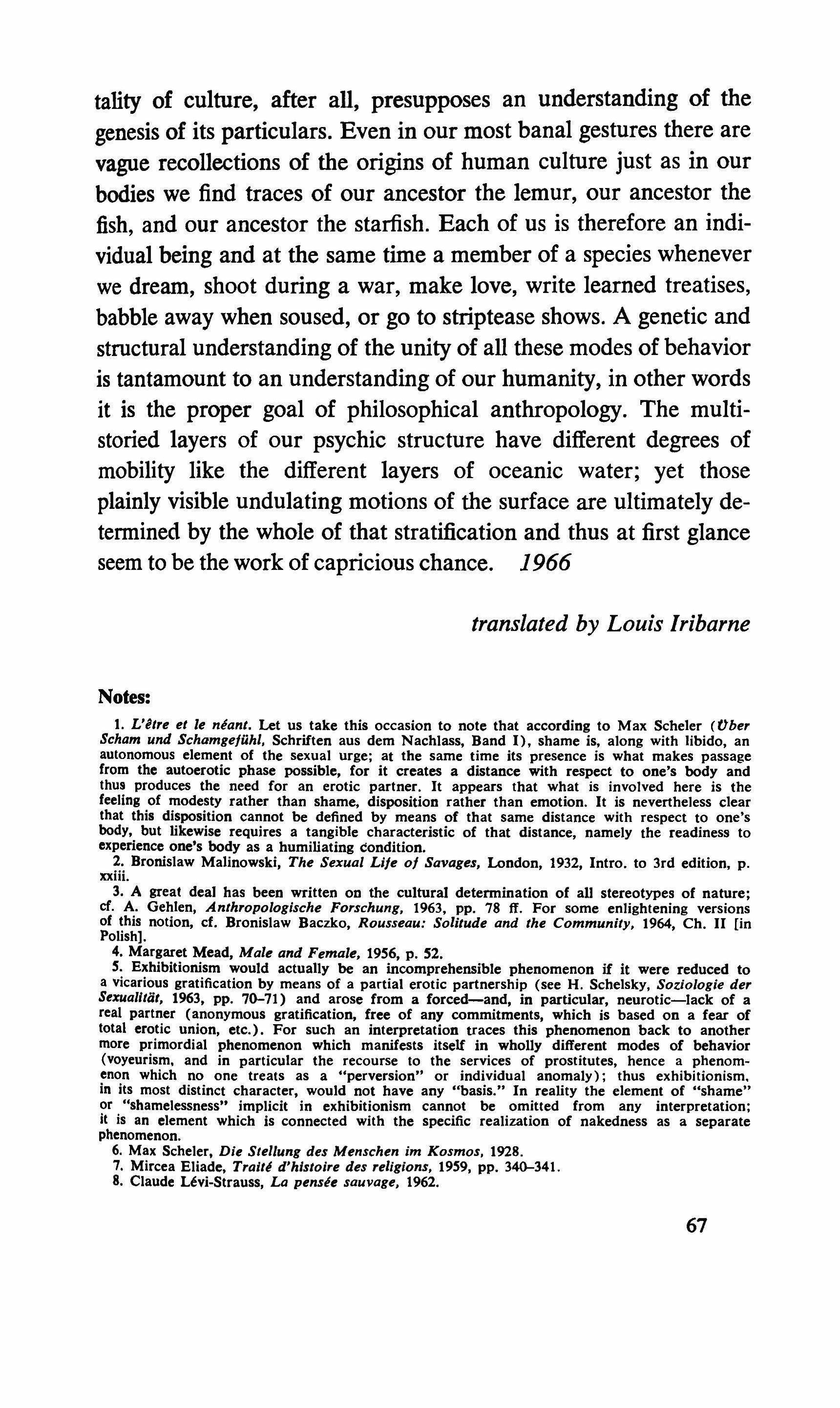
Notes:
1. L'2tre et le neant, Let us take this occasion to note that according to Max Scheler (Ober Scham und Schamgefilhl, Schriften aus dem Nachlass, Band I), shame is, along with libido, an autonomous element of the sexual urge; at the same time its presence is what makes passage from the autoerotic phase possible, for it creates a distance with respect to one's body and thus produces the need for an erotic partner. It appears that what is involved here is the feeling of modesty rather than shame, disposition rather than emotion. It is nevertheless clear that this disposition cannot be defined by means of that same distance with respect to one's body, but likewise requires a tangible characteristic of that distance, namely the readiness to experience one's body as a humiliating condition.
2. Bronislaw Malinowski, The Sexual Life of Savages, London, 1932, Intro. to 3rd edition, p. xxiii.
3. A great deal has been written on the cultural determination of all stereotypes of nature; cf. A. Gehlen, Anthropologische Forschung, 1963, pp. 78 ff. For some enlightening versions of this notion, ct. Bronislaw Baczko, Rousseau: Solitude and the Community, 1964, Ch. II [in Polish].
4. Margaret Mead, Male and Female, 1956, p. 52.
5. Exhibitionism would actually be an incomprehensible phenomenon if it were reduced to a vicarious gratification by means of a partial erotic partnership (see H. Schelsky, Soziologie der Sexualltiit, 1963, pp. 70-71) and arose from a forced-and, in particular, neurotic-lack of a real partner (anonymous gratification, free of any commitments, which is based on a fear of total erotic union, etc.) For such an interpretation traces this phenomenon back to another more primordial phenomenon which manifests itself in wholly different modes of behavior (voyeurism, and in particular the recourse to the services of prostitutes, hence a phenomenon which no one treats as a "perversion" or individual anomaly); thus exhibitionism. in its most distinct character, would not have any "basis." In reality the element of "shame" or "shamelessness" implicit in exhibitionism cannot be omitted from any interpretation; it is an element which is connected with the specific realization of nakedness as a separate phenomenon.
6. Max Scheler, Die Stel/ung des Menschen im Kosmos, 1928.
7. Mircea Eliade, Traite d'histoir« des religions, 1959, pp. 340-341.
8. Claude Levl-Strauss, La pensee sauvage, 1962.
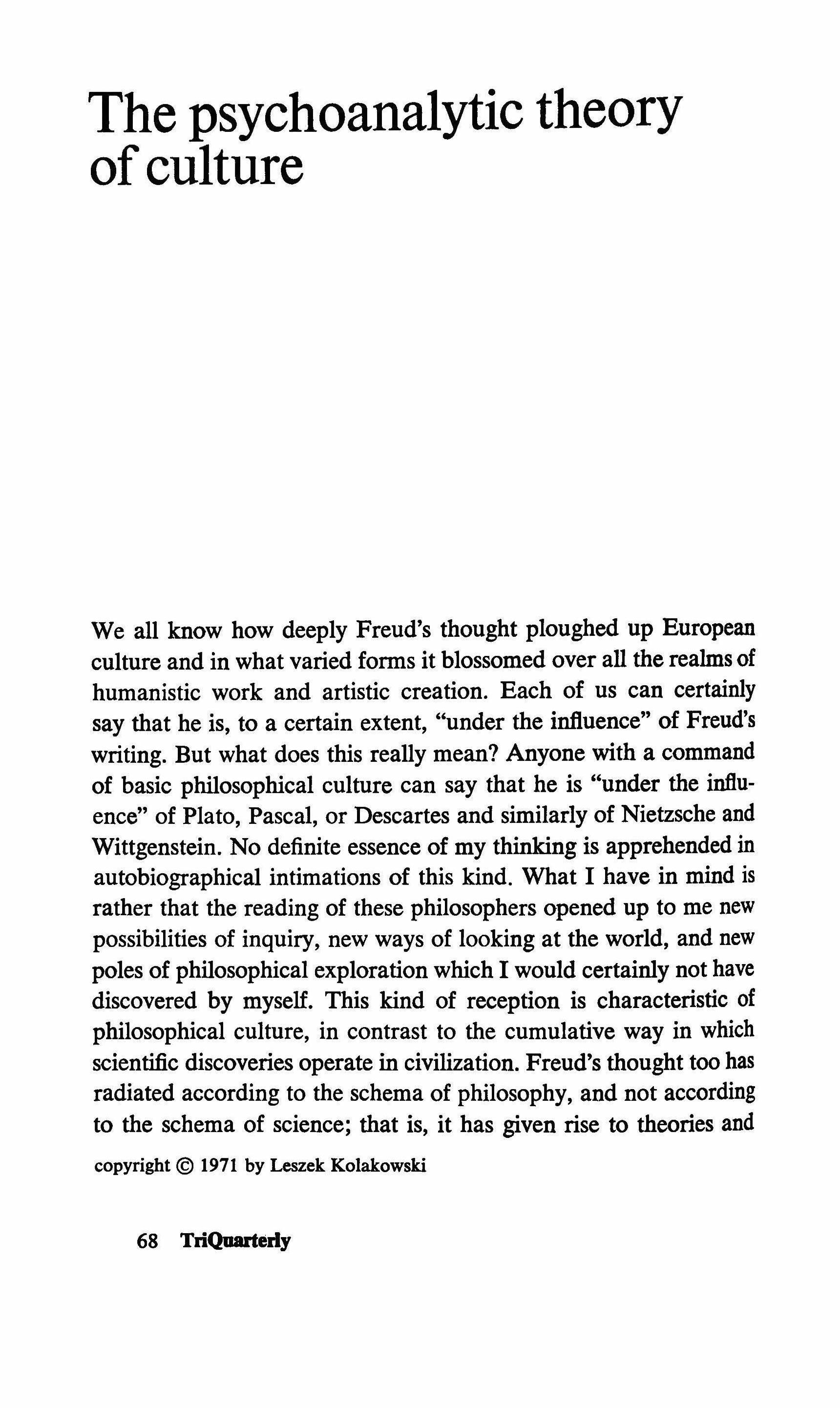
We all know how deeply Freud's thought ploughed up European culture and in what varied forms it blossomed over all the realms of humanistic work and artistic creation. Each of us can certainly say that he is, to a certain extent, "under the influence" of Freud's writing. But what does this really mean? Anyone with a command of basic philosophical culture can say that he is "under the influence" of Plato, Pascal, or Descartes and similarly of Nietzsche and Wittgenstein. No definite essence of my thinking is apprehended in autobiographical intimations of this kind. What I have in mind is rather that the reading of these philosophers opened up to me new possibilities of inquiry, new ways of looking at the world, and new poles of philosophical exploration which I would certainly not have discovered by myself. This kind of reception is characteristic of philosophical culture, in contrast to the cumulative way in which scientific discoveries operate in civilization. Freud's thought too has radiated according to the schema of philosophy, and not according to the schema of science; that is, it has given rise to theories and copyright © 1971 by Leszek
Kolakowski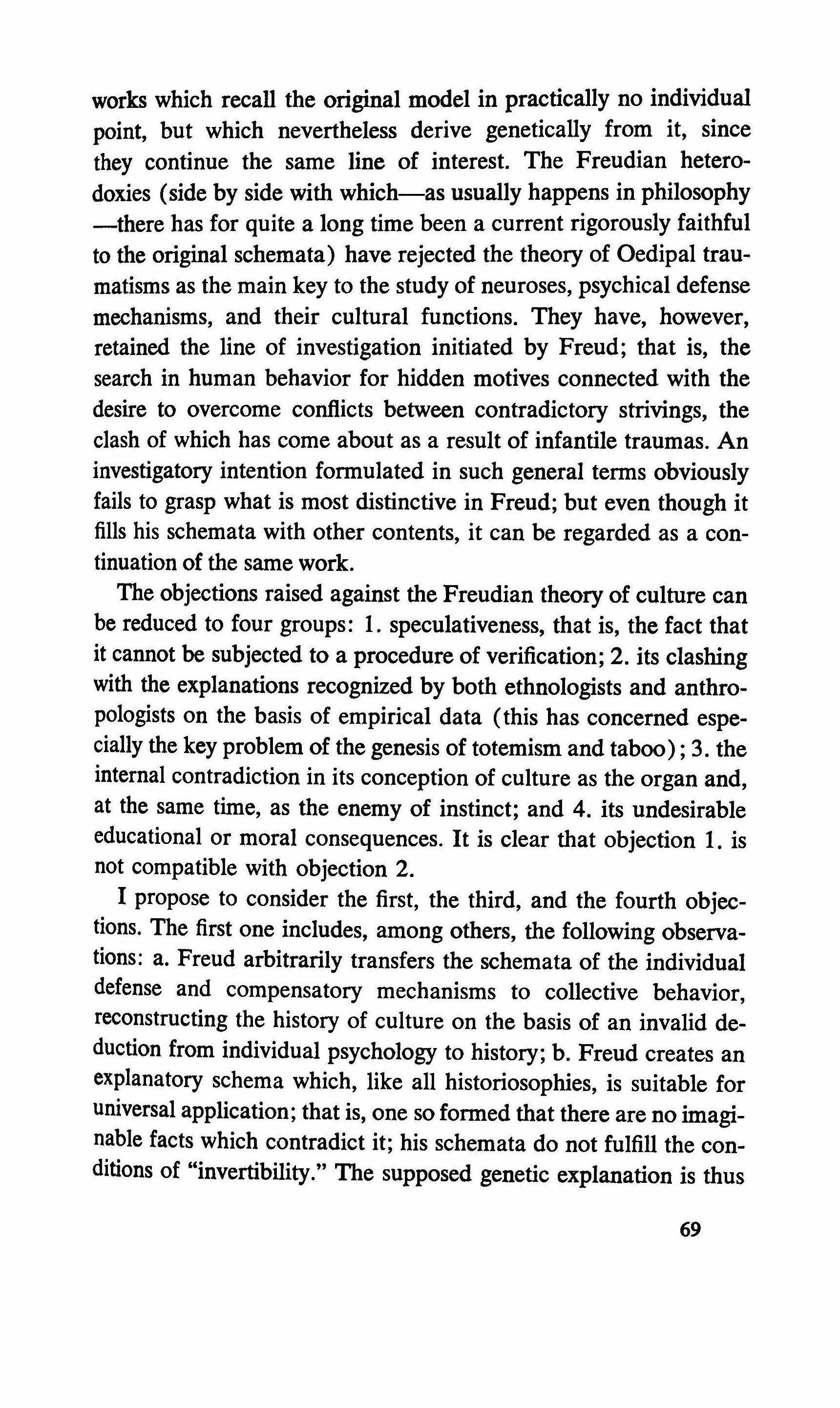
works which recall the original model in practically no individual point, but which nevertheless derive genetically from it, since they continue the same line of interest. The Freudian heterodoxies (side by side with which-as usually happens in philosophy -there has for quite a long time been a current rigorously faithful to the original schemata) have rejected the theory of Oedipal traumatisms as the main key to the study of neuroses, psychical defense mechanisms, and their cultural functions. They have, however, retained the line of investigation initiated by Freud; that is, the search in human behavior for hidden motives connected with the desire to overcome conflicts between contradictory strivings, the clash of which has come about as a result of infantile traumas. An investigatory intention formulated in such general terms obviously fails to grasp what is most distinctive in Freud; but even though it fills his schemata with other contents, it can be regarded as a continuation of the same work.
The objections raised against the Freudian theory of culture can be reduced to four groups: 1. speculativeness, that is, the fact that it cannot be subjected to a procedure of verification; 2. its clashing with the explanations recognized by both ethnologists and anthropologists on the basis of empirical data (this has concerned especially the key problem of the genesis of totemism and taboo); 3. the internal contradiction in its conception of culture as the organ and, at the same time, as the enemy of instinct; and 4. its undesirable educational or moral consequences. It is clear that objection 1. is not compatible with objection 2.
I propose to consider the first, the third, and the fourth objections. The first one includes, among others, the following observations: a. Freud arbitrarily transfers the schemata of the individual defense and compensatory mechanisms to collective behavior, reconstructing the history of culture on the basis of an invalid deduction from individual psychology to history; b. Freud creates an explanatory schema which, like all historiosophies, is suitable for universal application; that is, one so formed that there are no imaginable facts which contradict it; his schemata do not fulfill the conditions of "invertibility." The supposed genetic explanation is thus
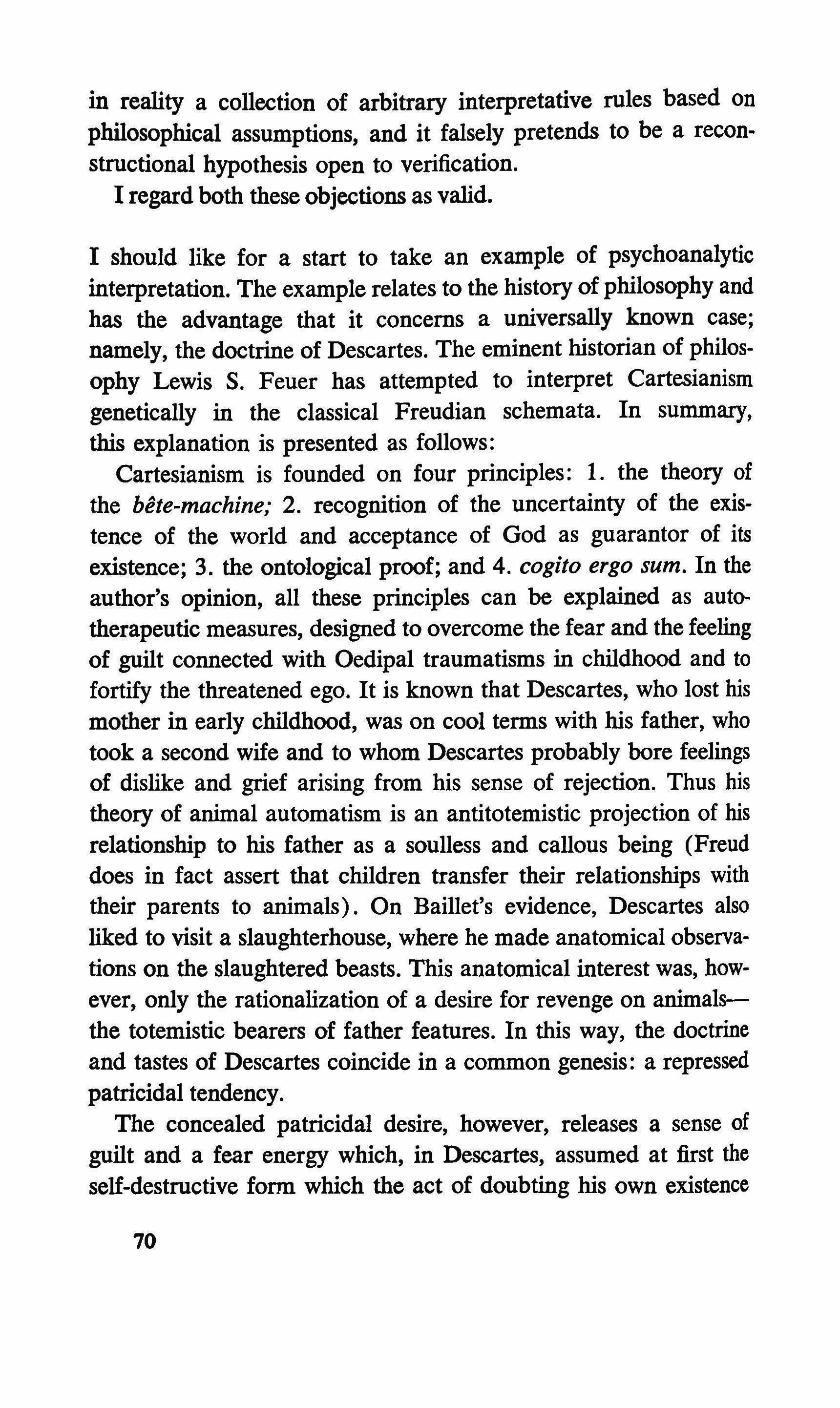
in reality a collection of arbitrary interpretative rules based on philosophical assumptions, and it falsely pretends to be a reconstructional hypothesis open to verification. I regard both these objections as valid.
I should like for a start to take an example of psychoanalytic interpretation. The example relates to the history of philosophy and has the advantage that it concerns a universally known case; namely, the doctrine of Descartes. The eminent historian of philosophy Lewis S. Feuer has attempted to interpret Cartesianism genetically in the classical Freudian schemata. In summary, this explanation is presented as follows: Cartesianism is founded on four principles: 1. the theory of the bete-machine; 2. recognition of the uncertainty of the existence of the world and acceptance of God as guarantor of its existence; 3. the ontological proof; and 4. cogito ergo sum. In the author's opinion, all these principles can be explained as autotherapeutic measures, designed to overcome the fear and the feeling of guilt connected with Oedipal traumatisms in childhood and to fortify the threatened ego. It is known that Descartes, who lost his mother in early childhood, was on cool terms with his father, who took a second wife and to whom Descartes probably bore feelings of dislike and grief arising from his sense of rejection. Thus his theory of animal automatism is an antitotemistic projection of his relationship to his father as a soulless and callous being (Freud does in fact assert that children transfer their relationships with their parents to animals). On Baillet's evidence, Descartes also liked to visit a slaughterhouse, where he made anatomical observations on the slaughtered beasts. This anatomical interest was, however, only the rationalization of a desire for revenge on animalsthe totemistic bearers of father features. In this way, the doctrine and tastes of Descartes coincide in a common genesis: a repressed patricidal tendency.
The concealed patricidal desire, however, releases a sense of guilt and a fear energy which, in Descartes, assumed at first the self-destructive form which the act of doubting his own existence
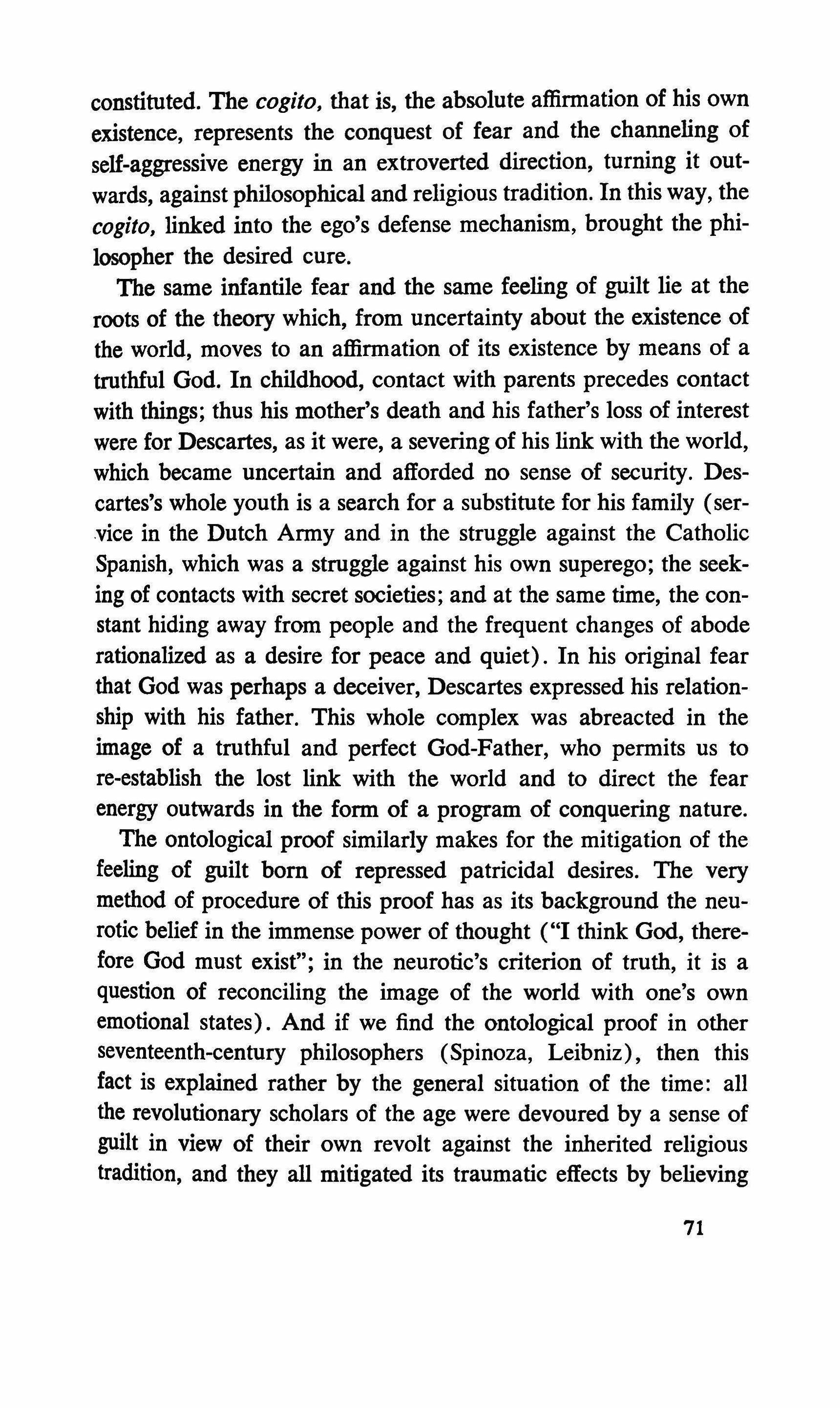
constituted. The cogito, that is, the absolute affirmation of his own existence, represents the conquest of fear and the channeling of self-aggressive energy in an extroverted direction, turning it outwards, against philosophical and religious tradition. In this way, the cogito, linked into the ego's defense mechanism, brought the philosopher the desired cure.
The same infantile fear and the same feeling of guilt lie at the roots of the theory which, from uncertainty about the existence of the world, moves to an affirmation of its existence by means of a truthful God. In childhood, contact with parents precedes contact with things; thus his mother's death and his father's loss of interest were for Descartes, as it were, a severing of his link with the world, which became uncertain and afforded no sense of security. Descartes's whole youth is a search for a substitute for his family (service in the Dutch Army and in the struggle against the Catholic Spanish, which was a struggle against his own superego; the seeking of contacts with secret societies; and at the same time, the constant hiding away from people and the frequent changes of abode rationalized as a desire for peace and quiet). In his original fear that God was perhaps a deceiver, Descartes expressed his relationship with his father. This whole complex was abreacted in the image of a truthful and perfect God-Father, who permits us to re-establish the lost link with the world and to direct the fear energy outwards in the form of a program of conquering nature.
The ontological proof similarly makes for the mitigation of the feeling of guilt born of repressed patricidal desires. The very method of procedure of this proof has as its background the neurotic belief in the immense power of thought ("I think God, therefore God must exist"; in the neurotic's criterion of truth, it is a question of reconciling the image of the world with one's own emotional states). And if we find the ontological proof in other seventeenth-century philosophers (Spinoza, Leibniz) then this fact is explained rather by the general situation of the time: all the revolutionary scholars of the age were devoured by a sense of guilt in view of their own revolt against the inherited religious tradition, and they all mitigated its traumatic effects by believing
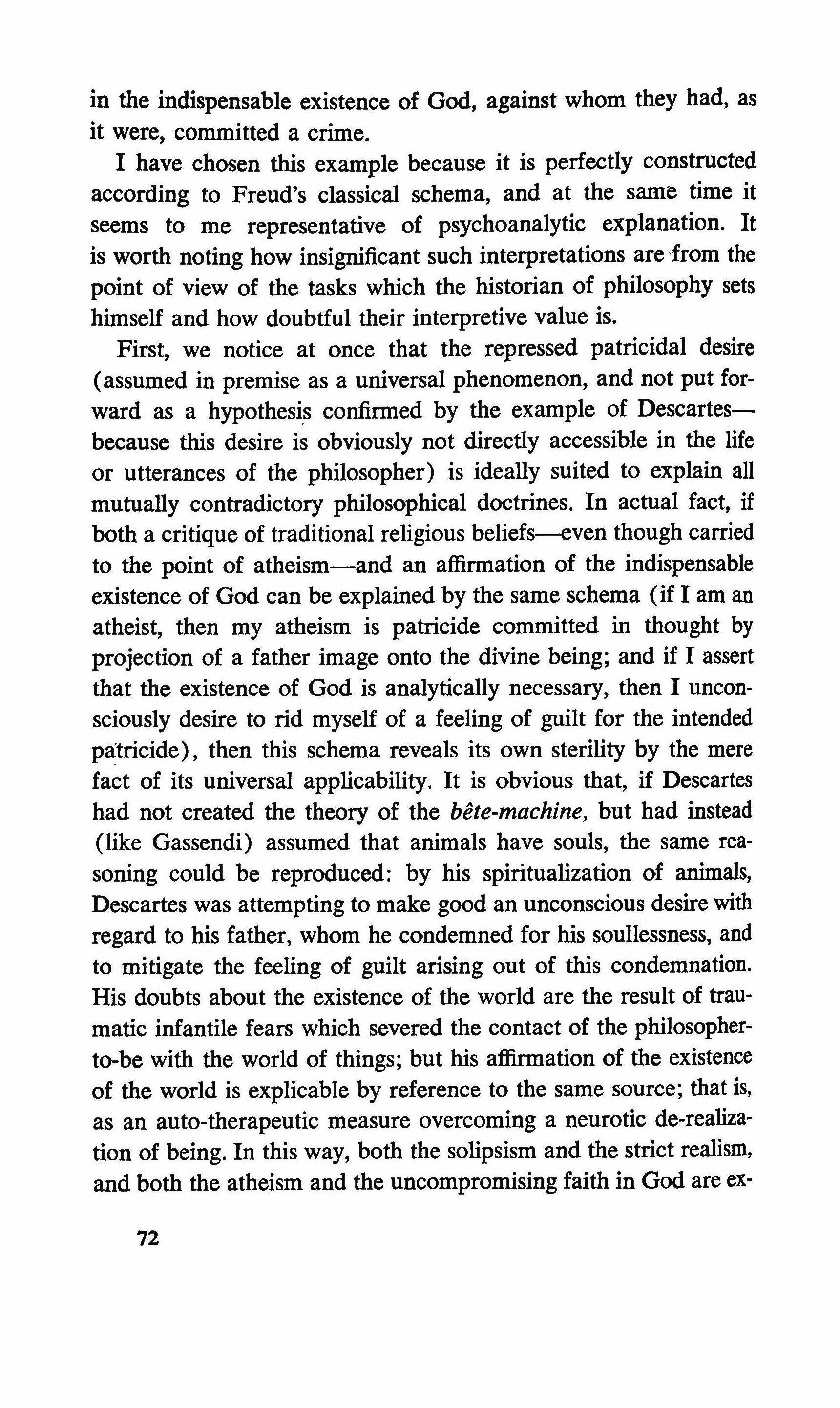
in the indispensable existence of God, against whom they had, as it were, committed a crime.
I have chosen this example because it is perfectly constructed according to Freud's classical schema, and at the same time it seems to me representative of psychoanalytic explanation. It is worth noting how insignificant such interpretations are from the point of view of the tasks which the historian of philosophy sets himself and how doubtful their interpretive value is.
First, we notice at once that the repressed patricidal desire (assumed in premise as a universal phenomenon, and not put forward as a hypothesis confirmed by the example of Descartes-because this desire is obviously not directly accessible in the life or utterances of the philosopher) is ideally suited to explain all mutually contradictory philosophical doctrines. In actual fact, if both a critique of traditional religious beliefs-even though carried to the point of atheism-and an affirmation of the indispensable existence of God can be explained by the same schema (if I am an atheist, then my atheism is patricide committed in thought by projection of a father image onto the divine being; and if I assert that the existence of God is analytically necessary, then I unconsciously desire to rid myself of a feeling of guilt for the intended patricide), then this schema reveals its own sterility by the mere fact of its universal applicability. It is obvious that, if Descartes had not created the theory of the bete-machine, but had instead (like Gassendi) assumed that animals have souls, the same reasoning could be reproduced: by his spiritualization of animals, Descartes was attempting to make good an unconscious desire with regard to his father, whom he condemned for his soullessness, and to mitigate the feeling of guilt arising out of this condemnation. His doubts about the existence of the world are the result of traumatic infantile fears which severed the contact of the philosopherto-be with the world of things; but his affirmation of the existence of the world is explicable by reference to the same source; that is, as an auto-therapeutic measure overcoming a neurotic de-realization of being. In this way, both the solipsism and the strict realism, and both the atheism and the uncompromising faith in God are ex-
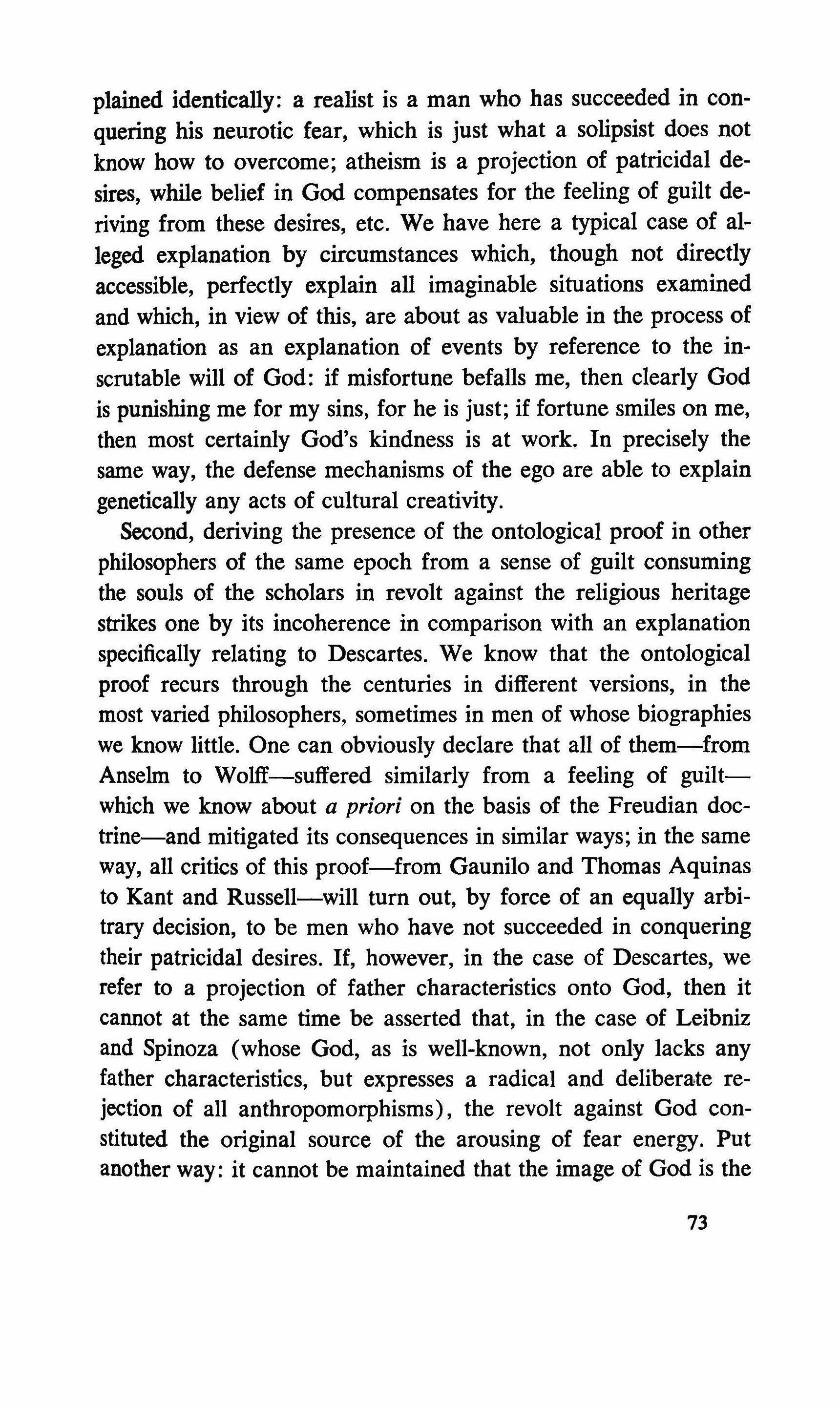
plained identically: a realist is a man who has succeeded in conquering his neurotic fear, which is just what a solipsist does not know how to overcome; atheism is a projection of patricidal desires, while belief in God compensates for the feeling of guilt deriving from these desires, etc. We have here a typical case of alleged explanation by circumstances which, though not directly accessible, perfectly explain all imaginable situations examined and which, in view of this, are about as valuable in the process of explanation as an explanation of events by reference to the inscrutable will of God: if misfortune befalls me, then clearly God is punishing me for my sins, for he is just; if fortune smiles on me, then most certainly God's kindness is at work. In precisely the same way, the defense mechanisms of the ego are able to explain genetically any acts of cultural creativity.
Second, deriving the presence of the ontological proof in other philosophers of the same epoch from a sense of guilt consuming the souls of the scholars in revolt against the religious heritage strikes one by its incoherence in comparison with an explanation specifically relating to Descartes. We know that the ontological proof recurs through the centuries in different versions, in the most varied philosophers, sometimes in men of whose biographies we know little. One can obviously declare that all of them-from Anselm to Wolff-suffered similarly from a feeling of guiltwhich we know about a priori on the basis of the Freudian doctrine-and mitigated its consequences in similar ways; in the same way, all critics of this proof-from Gaunilo and Thomas Aquinas to Kant and Russell-will turn out, by force of an equally arbitrary decision, to be men who have not succeeded in conquering their patricidal desires. If, however, in the case of Descartes, we refer to a projection of father characteristics onto God, then it cannot at the same time be asserted that, in the case of Leibniz and Spinoza (whose God, as is well-known, not only lacks any father characteristics, but expresses a radical and deliberate rejection of all anthropomorphisms), the revolt against God constituted the original source of the arousing of fear energy. Put another way: it cannot be maintained that the image of God is the
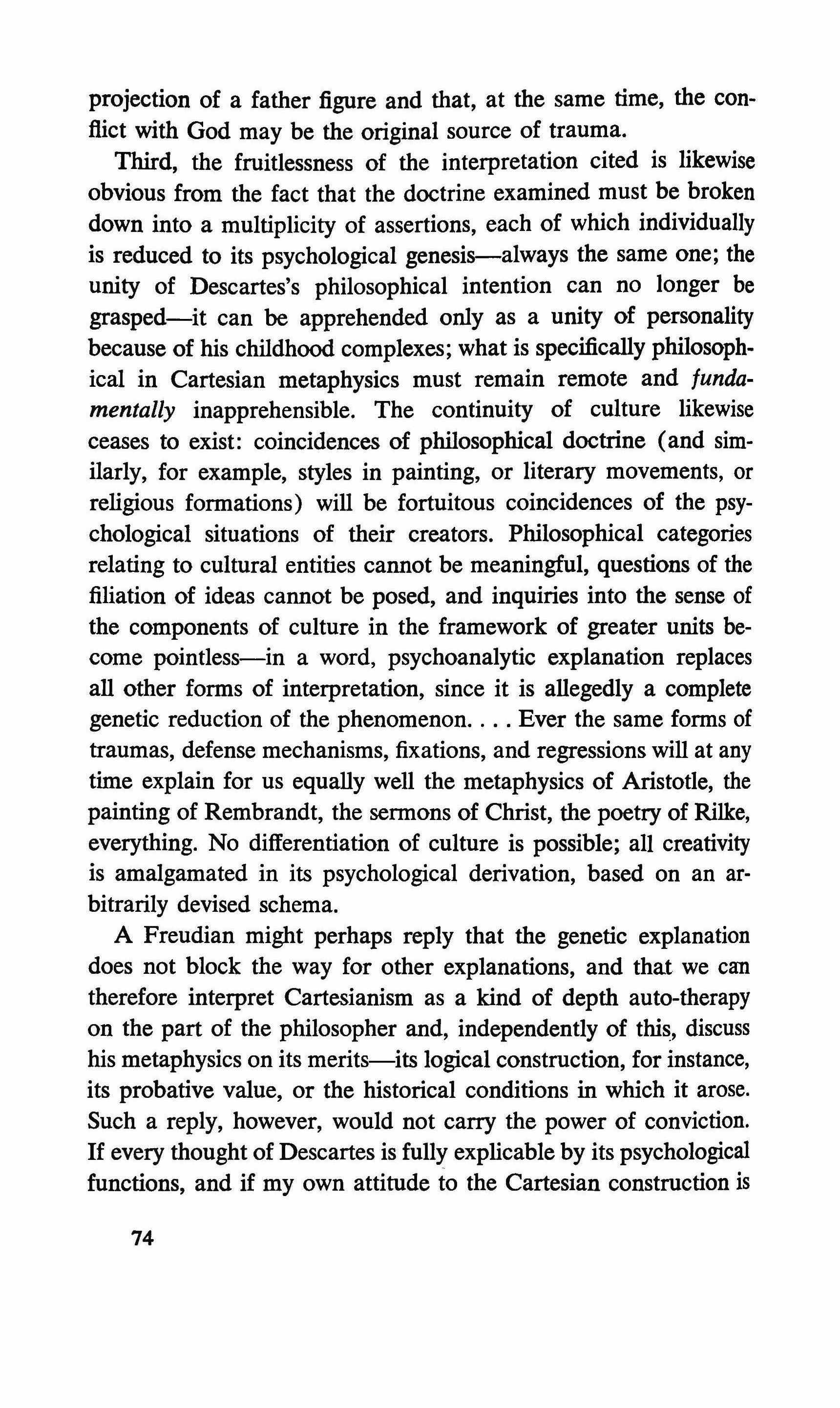
projection of a father figure and that, at the same time, the conflict with God may be the original source of trauma.
Third, the fruitlessness of the interpretation cited is likewise obvious from the fact that the doctrine examined must be broken down into a multiplicity of assertions, each of which individually is reduced to its psychological genesis-always the same one; the unity of Descartes's philosophical intention can no longer be grasped-it can be apprehended only as a unity of personality because of his childhood complexes; what is specifically philosophical in Cartesian metaphysics must remain remote and fundamentally inapprehensible. The continuity of culture likewise ceases to exist: coincidences of philosophical doctrine (and similarly, for example, styles in painting, or literary movements, or religious formations) will be fortuitous coincidences of the psychological situations of their creators. Philosophical categories relating to cultural entities cannot be meaningful, questions of the filiation of ideas cannot be posed, and inquiries into the sense of the components of culture in the framework of greater units become pointless-in a word, psychoanalytic explanation replaces all other forms of interpretation, since it is allegedly a complete genetic reduction of the phenomenon Ever the same forms of traumas, defense mechanisms, fixations, and regressions will at any time explain for us equally well the metaphysics of Aristotle, the painting of Rembrandt, the sermons of Christ, the poetry of Rilke, everything. No differentiation of culture is possible; all creativity is amalgamated in its psychological derivation, based on an arbitrarily devised schema.
A Freudian might perhaps reply that the genetic explanation does not block the way for other explanations, and that we can therefore interpret Cartesianism as a kind of depth auto-therapy on the part of the philosopher and, independently of this, discuss his metaphysics on its merits-its logical construction, for instance, its probative value, or the historical conditions in which it arose. Such a reply, however, would not carry the power of conviction. If every thought of Descartes is fully explicable by its psychological functions, and if my own attitude to the Cartesian construction is
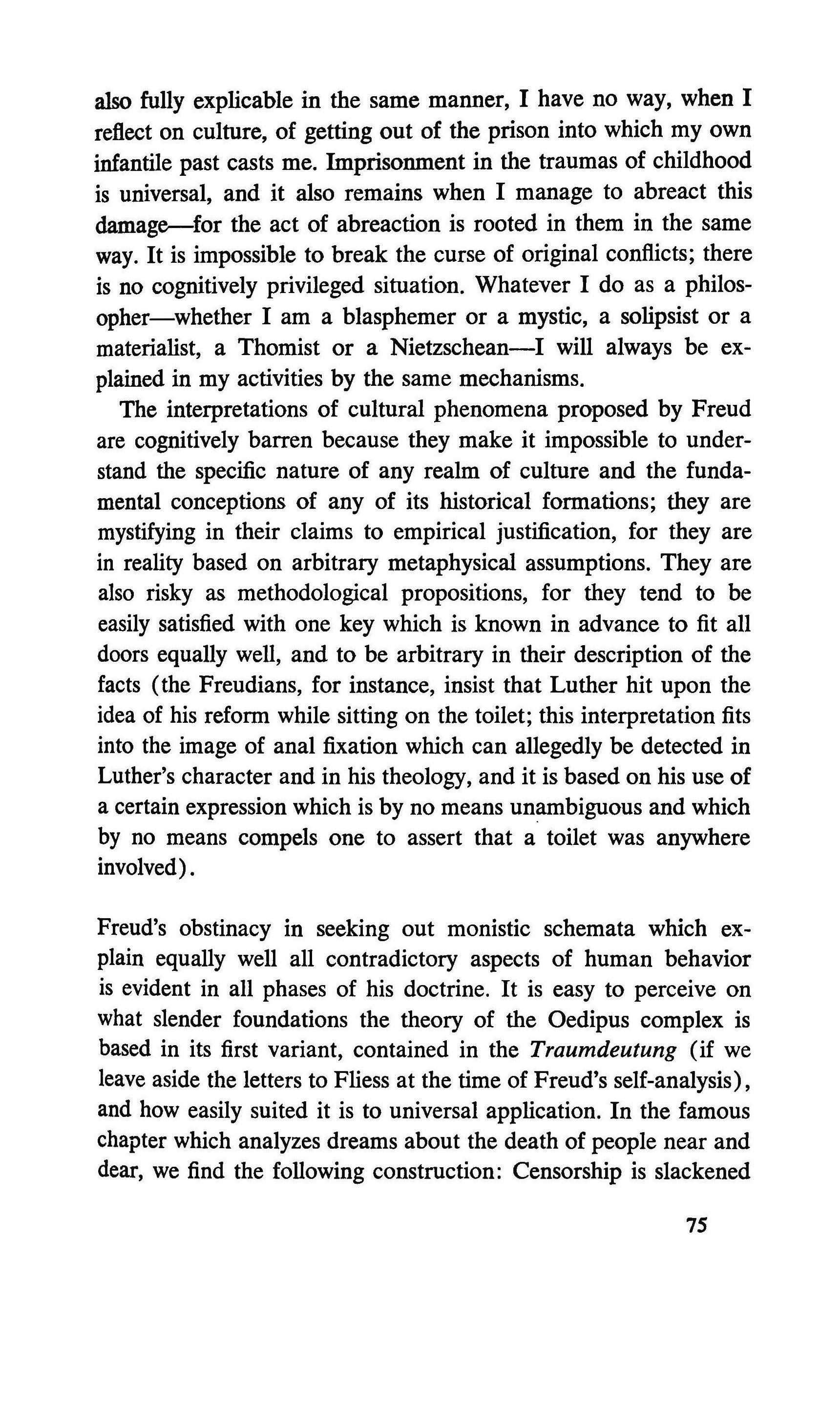
also fully explicable in the same manner, I have no way, when I reflect on culture, of getting out of the prison into which my own infantile past casts me. Imprisonment in the traumas of childhood is universal, and it also remains when I manage to abreact this damage--for the act of abreaction is rooted in them in the same way. It is impossible to break the curse of original conflicts; there is no cognitively privileged situation. Whatever I do as a philosopher-whether I am a blasphemer or a mystic, a solipsist or a materialist, a Thomist or a Nietzschean-I will always be explained in my activities by the same mechanisms.
The interpretations of cultural phenomena proposed by Freud are cognitively barren because they make it impossible to understand the specific nature of any realm of culture and the fundamental conceptions of any of its historical formations; they are mystifying in their claims to empirical justification, for they are in reality based on arbitrary metaphysical assumptions. They are also risky as methodological propositions, for they tend to be easily satisfied with one key which is known in advance to fit all doors equally well, and to be arbitrary in their description of the facts (the Freudians, for instance, insist that Luther hit upon the idea of his reform while sitting on the toilet; this interpretation fits into the image of anal fixation which can allegedly be detected in Luther's character and in his theology, and it is based on his use of a certain expression which is by no means unambiguous and which by no means compels one to assert that a toilet was anywhere involved).
Freud's obstinacy in seeking out monistic schemata which explain equally well all contradictory aspects of human behavior is evident in all phases of his doctrine. It is easy to perceive on what slender foundations the theory of the Oedipus complex is based in its first variant, contained in the Traumdeutung (if we leave aside the letters to Fliess at the time of Freud's self-analysis), and how easily suited it is to universal application. In the famous chapter which analyzes dreams about the death of people near and dear, we find the following construction: Censorship is slackened
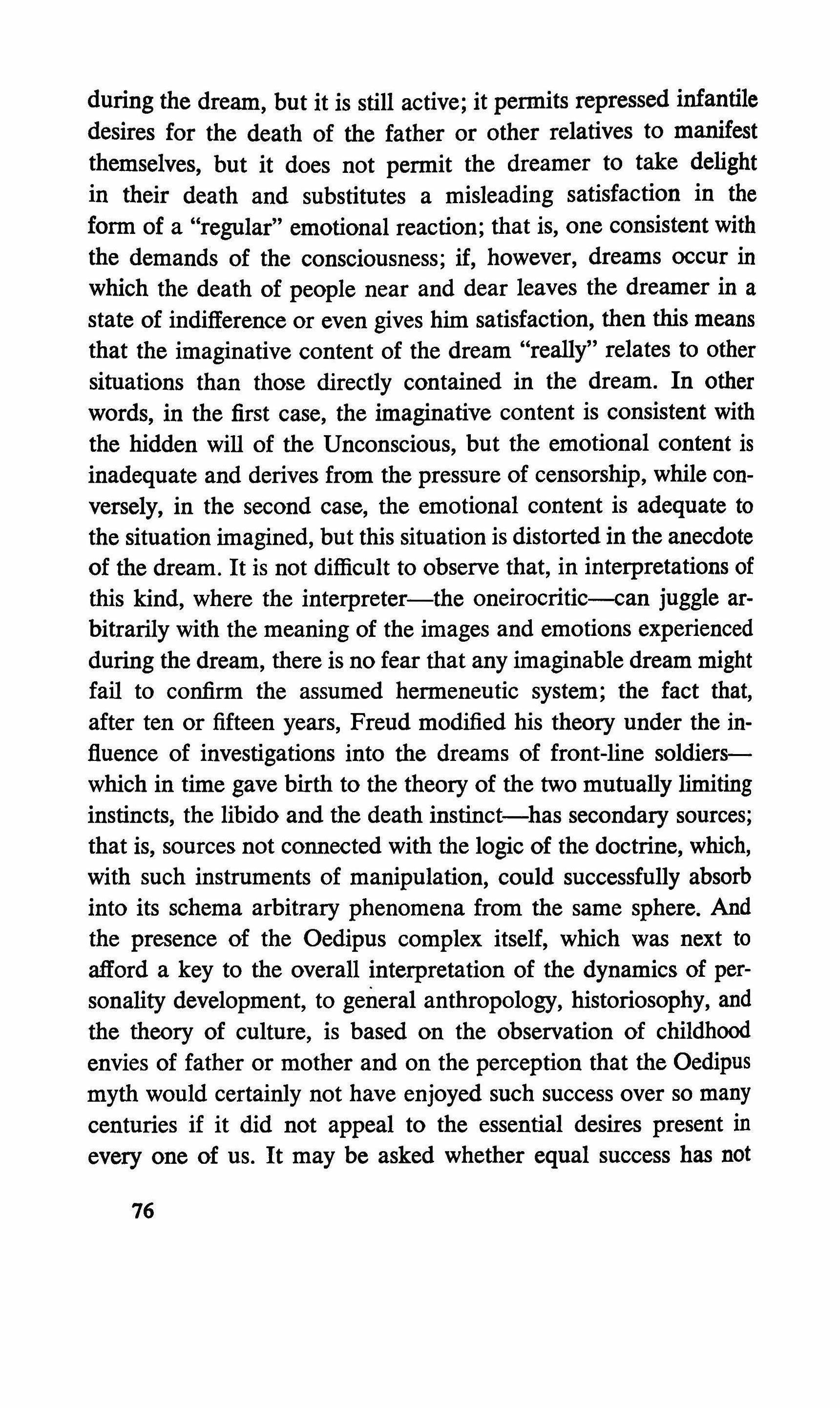
during the dream, but it is still active; it permits repressed infantile desires for the death of the father or other relatives to manifest themselves, but it does not permit the dreamer to take delight in their death and substitutes a misleading satisfaction in the form of a "regular" emotional reaction; that is, one consistent with the demands of the consciousness; if, however, dreams occur in which the death of people near and dear leaves the dreamer in a state of indifference or even gives him satisfaction, then this means that the imaginative content of the dream "really" relates to other situations than those directly contained in the dream. In other words, in the first case, the imaginative content is consistent with the hidden will of the Unconscious, but the emotional content is inadequate and derives from the pressure of censorship, while conversely, in the second case, the emotional content is adequate to the situation imagined, but this situation is distorted in the anecdote of the dream. It is not difficult to observe that, in interpretations of this kind, where the interpreter-the oneirocritic-can juggle arbitrarily with the meaning of the images and emotions experienced during the dream, there is no fear that any imaginable dream might fail to confirm the assumed hermeneutic system; the fact that, after ten or fifteen years, Freud modified his theory under the influence of investigations into the dreams of front-line soldierswhich in time gave birth to the theory of the two mutually limiting instincts, the libido and the death instinct-has secondary sources; that is, sources not connected with the logic of the doctrine, which, with such instruments of manipulation, could successfully absorb into its schema arbitrary phenomena from the same sphere. And the presence of the Oedipus complex itself, which was next to afford a key to the overall interpretation of the dynamics of personality development, to general anthropology, historiosophy, and the theory of culture, is based on the observation of childhood envies of father or mother and on the perception that the Oedipus myth would certainly not have enjoyed such success over so many centuries if it did not appeal to the essential desires present in every one of us. It may be asked whether equal success has not
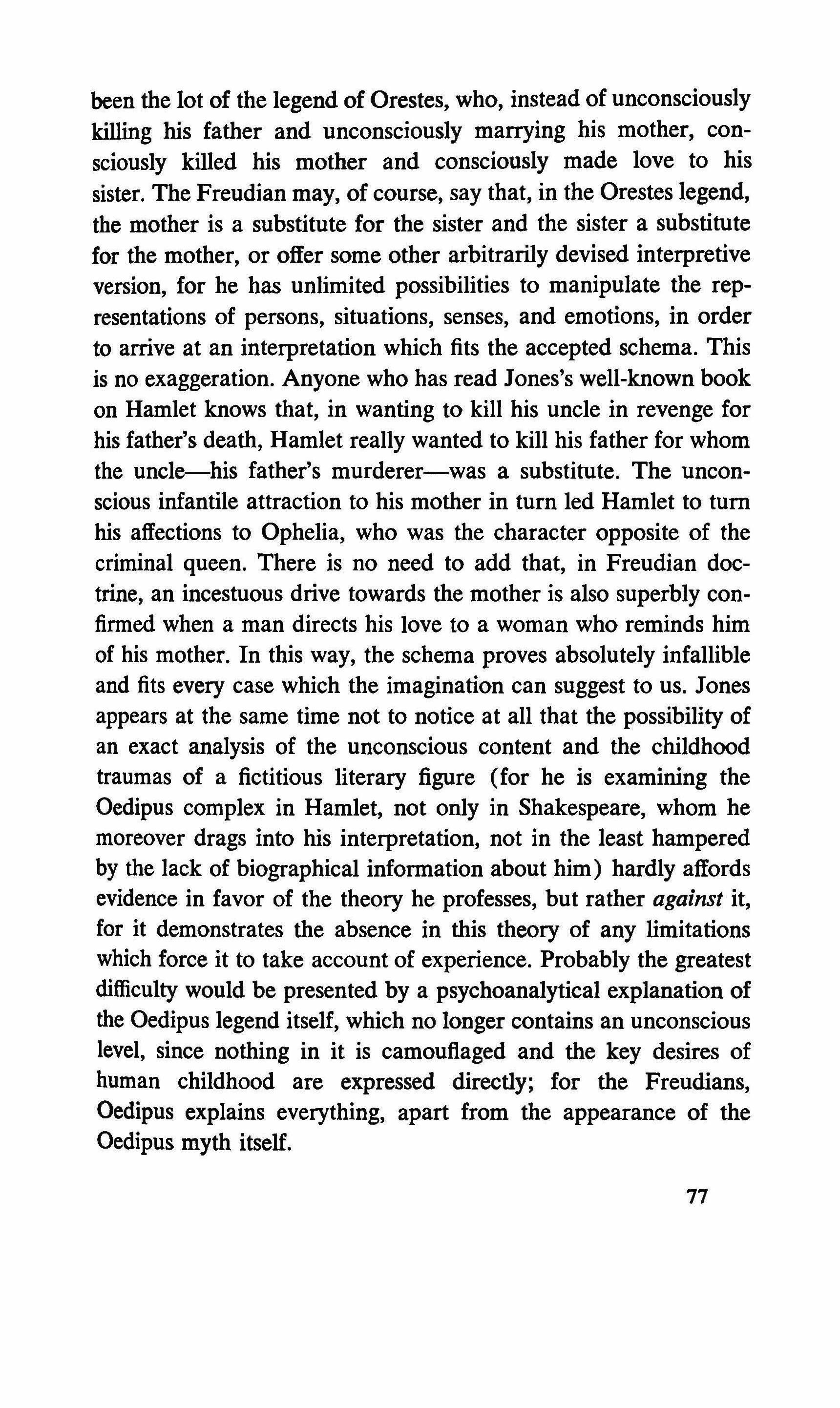
been the lot of the legend of Orestes, who, instead of unconsciously killing his father and unconsciously marrying his mother, consciously killed his mother and consciously made love to his sister. The Freudian may, of course, say that, in the Orestes legend, the mother is a substitute for the sister and the sister a substitute for the mother, or offer some other arbitrarily devised interpretive version, for he has unlimited possibilities to manipulate the representations of persons, situations, senses, and emotions, in order to arrive at an interpretation which fits the accepted schema. This is no exaggeration. Anyone who has read Jones's well-known book on Hamlet knows that, in wanting to kill his uncle in revenge for his father's death, Hamlet really wanted to kill his father for whom the uncle-his father's murderer-was a substitute. The unconscious infantile attraction to his mother in turn led Hamlet to tum his affections to Ophelia, who was the character opposite of the criminal queen. There is no need to add that, in Freudian doctrine, an incestuous drive towards the mother is also superbly confirmed when a man directs his love to a woman who reminds him of his mother. In this way, the schema proves absolutely infallible and fits every case which the imagination can suggest to us. Jones appears at the same time not to notice at all that the possibility of an exact analysis of the unconscious content and the childhood traumas of a fictitious literary figure (for he is examining the Oedipus complex in Hamlet, not only in Shakespeare, whom he moreover drags into his interpretation, not in the least hampered by the lack of biographical information about him) hardly affords evidence in favor of the theory he professes, but rather against it, for it demonstrates the absence in this theory of any limitations which force it to take account of experience. Probably the greatest difficulty would be presented by a psychoanalytical explanation of the Oedipus legend itself, which no longer contains an unconscious level, since nothing in it is camouflaged and the key desires of human childhood are expressed directly; for the Freudians, Oedipus explains everything, apart from the appearance of the Oedipus myth itself.

The application of sexual characteristics to traumatic experiences in childhood and, in general, to the three phases of childhood development has been criticized so often that it is not worth entering into a discussion of this question; there are in reality, as has often been pointed out, no rational reasons for ascribing a sexual significance to elementary childish pleasures (such as sucking, eating, playing with faeces) and to the unpleasantnesses arising from the corresponding prohibitions, since there is no empirical fact pointing to any connection between them and reproductive activities. But it is well-known that Freud was uncompromising on this point; when, in his preface to the French translation of the Five Lectures, Clarapede attempted to tone down the sexual content of the category of libido and reduce it to an undifferentiated sum of driving forces, Freud raised an immediate protest against this interpretation (which was not in fact his formulation, but Jung's) and emphasized the purely sexual character of libidinal energy-which then drove Clarapede to criticize the theory.
In fact, the second Freudian theory of instincts is similarly speculative and unsupported in character. One readily notices that the binary character of the dynamic image of the psyche (the libido and the lch-Triebe in the first phase and Eros and Thanatos in the second phase) and the triple division of static structure (the Unconscious, the Subconscious, and consciousness; later, Id, Ego, and Superego) are both maintained throughout the development of the doctrine. Freud seems to be more concerned with maintaining this quantitative relationship than with providing the schemata with real empirical support. What other reasons are there for treating aggressive tendencies as self-destructive forces working in the reverse direction? I admit that the category of the death instinct is applicable and important; that is, that various phenomena in culture and human behavior seem to indicate the presence in the psyche of dynamic death-bearing components which the human subject turns against himself. Nevertheless, the application of the same category to aggressive tendencies is an utterly arbitrary idea. Why could one not in fact declare that it is all the other way around; that is, that the drive for self-destruction is secondary and
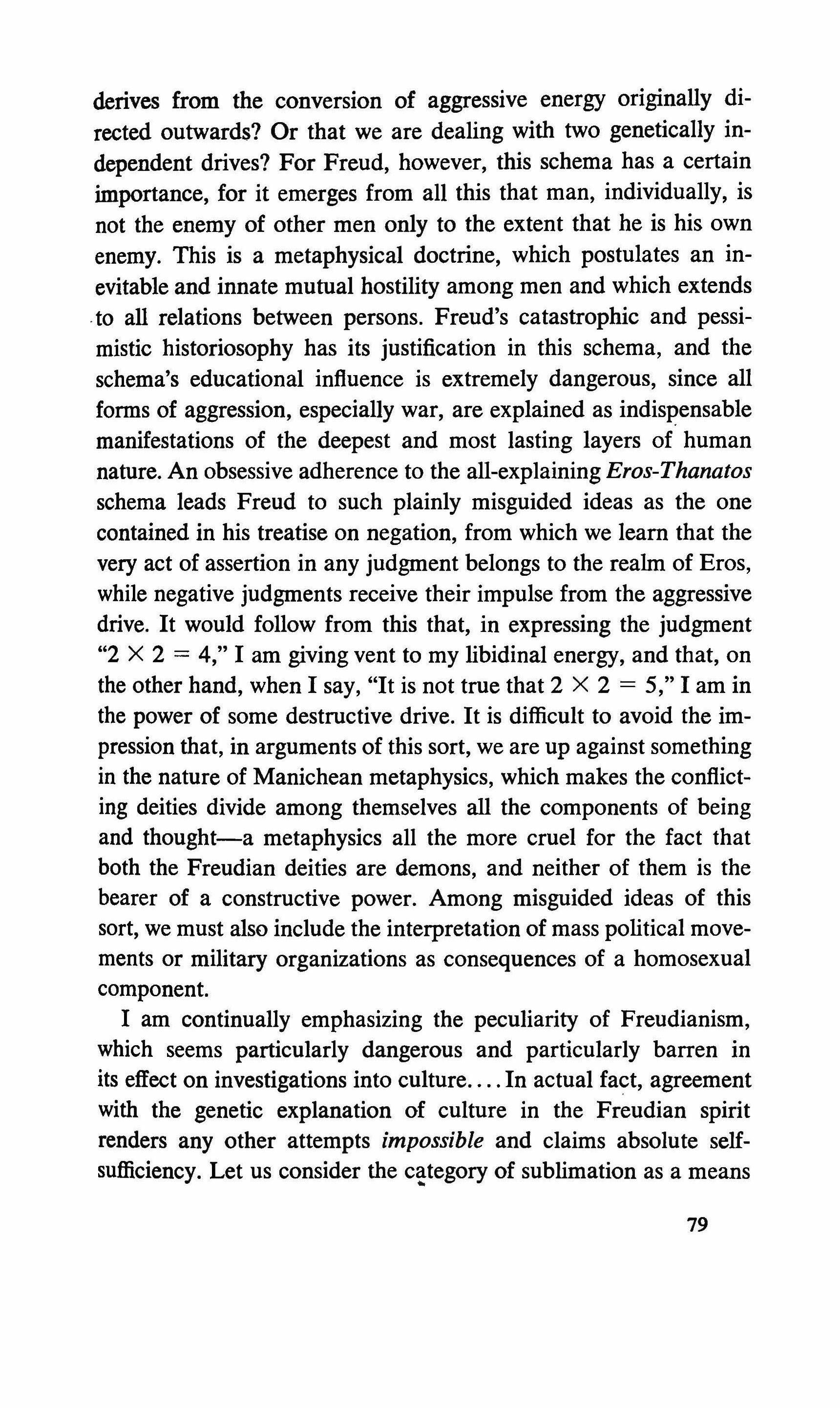
derives from the conversion of aggressive energy originally directed outwards? Or that we are dealing with two genetically independent drives? For Freud, however, this schema has a certain importance, for it emerges from all this that man, individually, is not the enemy of other men only to the extent that he is his own enemy. This is a metaphysical doctrine, which postulates an inevitable and innate mutual hostility among men and which extends to all relations between persons. Freud's catastrophic and pessimistic historiosophy has its justification in this schema, and the schema's educational influence is extremely dangerous, since all forms of aggression, especially war, are explained as indispensable manifestations of the deepest and most lasting layers of human nature. An obsessive adherence to the all-explaining Eros-Thanatos schema leads Freud to such plainly misguided ideas as the one contained in his treatise on negation, from which we learn that the very act of assertion in any judgment belongs to the realm of Eros, while negative judgments receive their impulse from the aggressive drive. It would follow from this that, in expressing the judgment "2 X 2 = 4," I am giving vent to my libidinal energy, and that, on the other hand, when I say, "It is not true that 2 X 2 5," I am in the power of some destructive drive. It is difficult to avoid the impression that, in arguments of this sort, we are up against something in the nature of Manichean metaphysics, which makes the conflicting deities divide among themselves all the components of being and thought-a metaphysics all the more cruel for the fact that both the Freudian deities are demons, and neither of them is the bearer of a constructive power. Among misguided ideas of this sort, we must also include the interpretation of mass political movements or military organizations as consequences of a homosexual component.
I am continually emphasizing the peculiarity of Freudianism, which seems particularly dangerous and particularly barren in its effect on investigations into culture In actual fact, agreement with the genetic explanation of culture in the Freudian spirit renders any other attempts impossible and claims absolute selfsufficiency. Let us consider the c�tegory of sublimation as a means
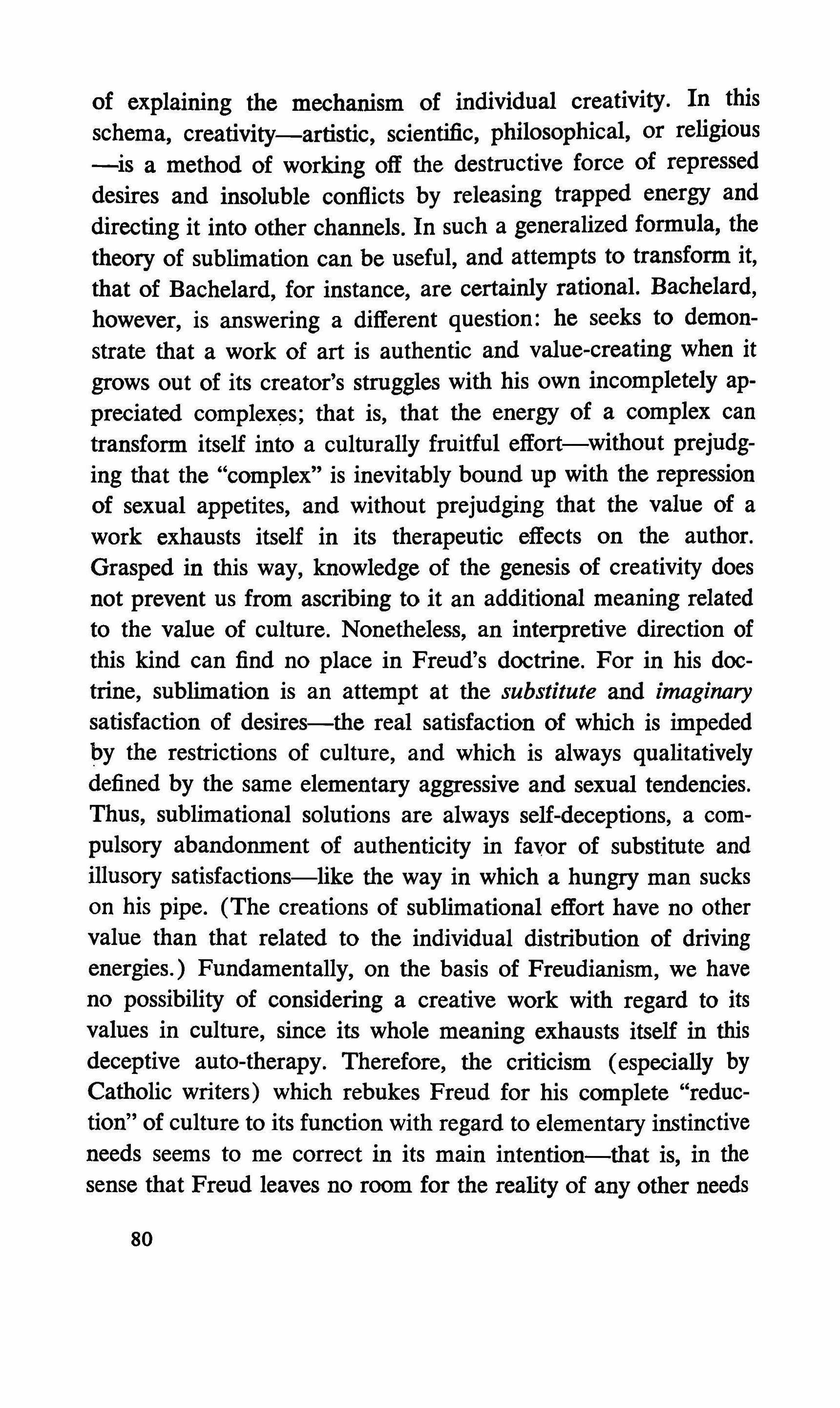
of explaining the mechanism of individual creativity. In this schema, creativity-artistic, scientific, philosophical, or religious -is a method of working off the destructive force of repressed desires and insoluble conflicts by releasing trapped energy and directing it into other channels. In such a generalized formula, the theory of sublimation can be useful, and attempts to transform it, that of Bachelard, for instance, are certainly rational. Bachelard, however, is answering a different question: he seeks to demonstrate that a work of art is authentic and value-creating when it grows out of its creator's struggles with his own incompletely appreciated complexes; that is, that the energy of a complex can transform itself into a culturally fruitful effort-without prejudging that the "complex" is inevitably bound up with the repression of sexual appetites, and without prejudging that the value of a work exhausts itself in its therapeutic effects on the author.
Grasped in this way, knowledge of the genesis of creativity does not prevent us from ascribing to it an additional meaning related to the value of culture. Nonetheless, an interpretive direction of this kind can find no place in Freud's doctrine. For in his doctrine, sublimation is an attempt at the substitute and imaginary satisfaction of desires-the real satisfaction of which is impeded by the restrictions of culture, and which is always qualitatively defined by the same elementary aggressive and sexual tendencies. Thus, sublimational solutions are always self-deceptions, a compulsory abandonment of authenticity in favor of substitute and illusory satisfactions-like the way in which a hungry man sucks on his pipe. (The creations of sublimational effort have no other value than that related to the individual distribution of driving energies.) Fundamentally, on the basis of Freudianism, we have no possibility of considering a creative work with regard to its values in culture, since its whole meaning exhausts itself in this deceptive auto-therapy. Therefore, the criticism (especially by Catholic writers) which rebukes Freud for his complete "reduction" of culture to its function with regard to elementary instinctive needs seems to me correct in its main intention-that is, in the sense that Freud leaves no room for the reality of any other needs

than those genetically connected with procreation and aggression, not even in the form of genetically secondary, but historically selfdependent needs (as in Malinowski's philosophy of culture). If philogenetically primary needs are at the same time the only real needs in the progress of all human history, and if the whole cultural superstructure does not create any autonomized spheres, but is permanently enslaved in the service of these needs, then evaluation of the creations of culture in their individuality is no longer "another subject" which could be practiced side by side with psychoanalytic explanations, but is downright impossible. Sublimation is always an illusory solution, even if the organization of social life forces us to seek such solutions. Furthermore, the consciousness which achieves self-transparency, even only in the confines permitted by analytical therapy, removes the possibility of sublimation, and therefore of creativity. Sublimational acts with full self-knowledge of their function would be nothing but caricature (imagine Kafka first convincing himself, as a result of analytical investigation, that he was dominated by neurotic fear because, for instance, of a castration complex, and then deciding to work off the fear by writing The Trial). Since the real satisfaction of drives is impossible, there remain the alternatives: either we live in selfdelusion, producing culture, or we achieve self-knowledge and, accepting the inevitability of our frustrations and the sufferings bound up with them, we abandon cultural creation. The Freudian philosophy of culture does not stop at the genetic derivation of all the spheres of culture from the same source, but in addition reduces them functionally to the same source in the individual manifestations of culture. In this sense, I am in agreement with the criticism, once formulated by Dalbiez, that Freudianism is incapable of grasping what is philosophical in philosophy, what is artistic in art, what is religious in religion, and what is scientific in science-that is, that it cannot describe the specific qualities of human spiritual values.
I should like to pose one more basic question, a decisive answer to which would, however, demand considerably greater knowledge
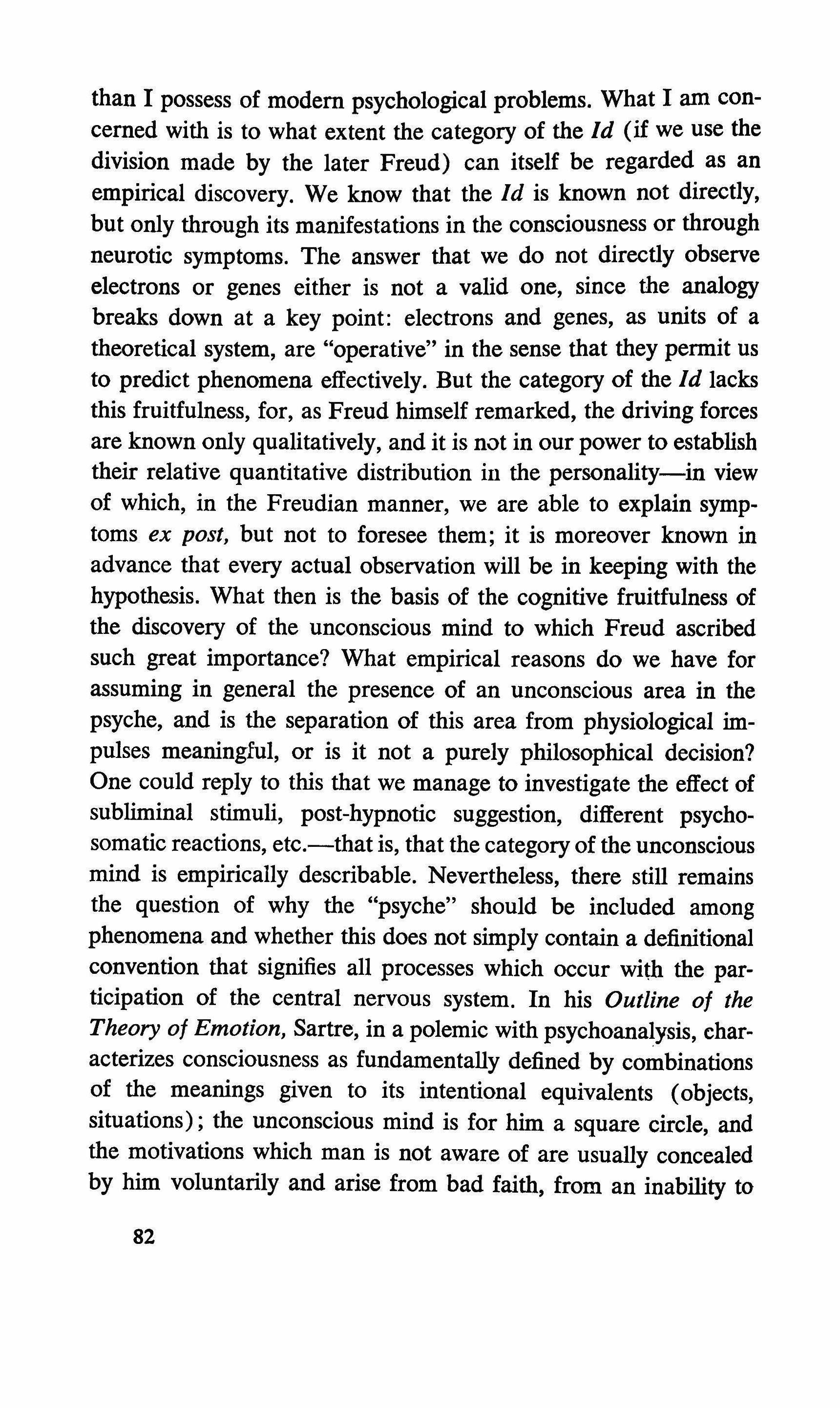
than I possess of modern psychological problems. What I am concerned with is to what extent the category of the Id (if we use the division made by the later Freud) can itself be regarded as an empirical discovery. We know that the Id is known not directly, but only through its manifestations in the consciousness or through neurotic symptoms. The answer that we do not directly observe electrons or genes either is not a valid one, since the analogy breaks down at a key point: electrons and genes, as units of a theoretical system, are "operative" in the sense that they permit us to predict phenomena effectively. But the category of the Id lacks this fruitfulness, for, as Freud himself remarked, the driving forces are known only qualitatively, and it is not in our power to establish their relative quantitative distribution in the personality-in view of which, in the Freudian manner, we are able to explain symptoms ex post, but not to foresee them; it is moreover known in advance that every actual observation will be in keeping with the hypothesis. What then is the basis of the cognitive fruitfulness of the discovery of the unconscious mind to which Freud ascribed such great importance? What empirical reasons do we have for assuming in general the presence of an unconscious area in the psyche, and is the separation of this area from physiological impulses meaningful, or is it not a purely philosophical decision? One could reply to this that we manage to investigate the effect of subliminal stimuli, post-hypnotic suggestion, different psychosomatic reactions, etc.-that is, that the category of the unconscious mind is empirically describable. Nevertheless, there still remains the question of why the "psyche" should be included among phenomena and whether this does not simply contain a definitional convention that signifies all processes which occur with the participation of the central nervous system. In his Outline of the Theory of Emotion, Sartre, in a polemic with psychoanalysis, characterizes consciousness as fundamentally defined by combinations of the meanings given to its intentional equivalents (objects, situations); the unconscious mind is for him a square circle, and the motivations which man is not aware of are usually concealed by him voluntarily and arise from bad faith, from an inability to
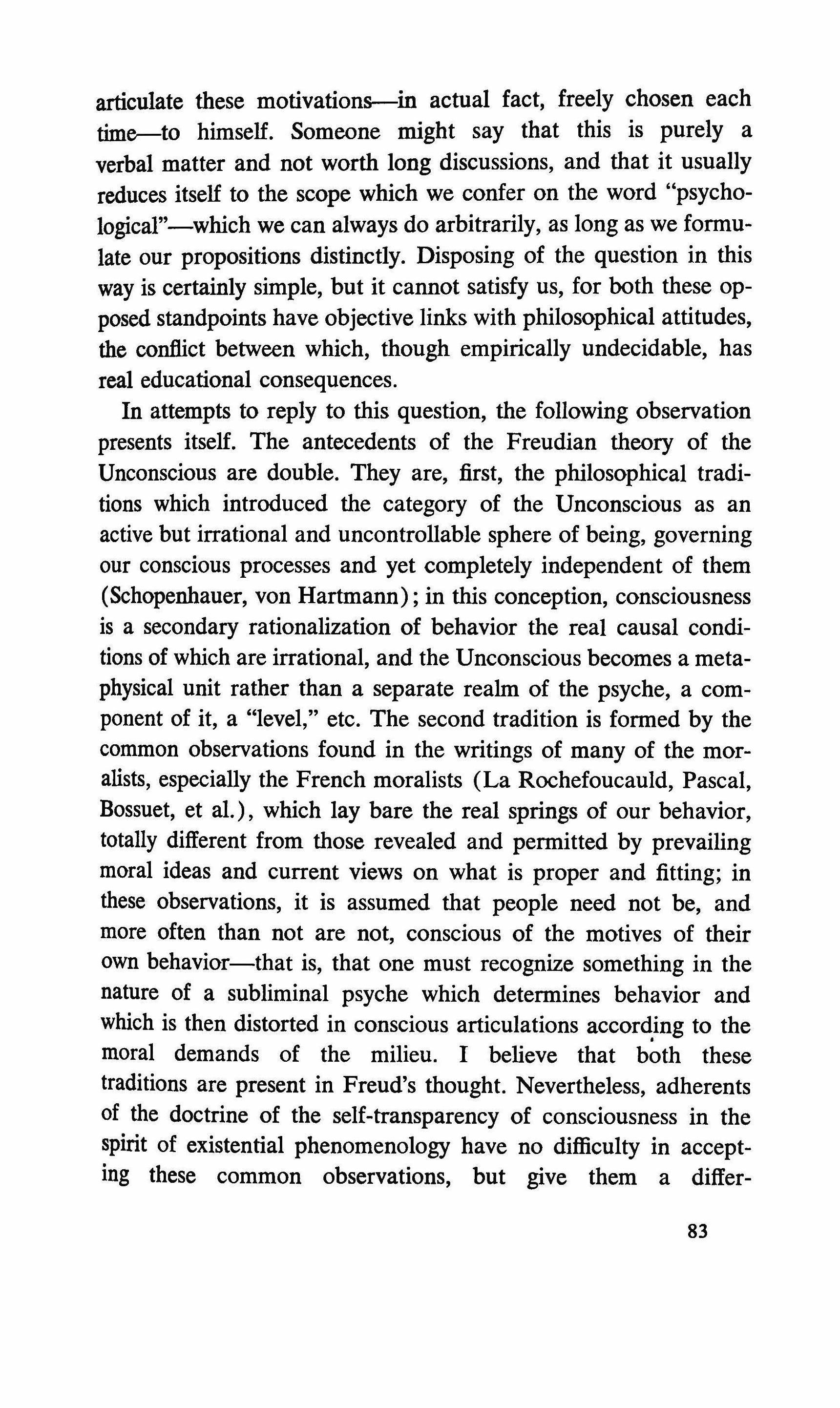
articulate these motivations--in actual fact, freely chosen each time-to himself. Someone might say that this is purely a verbal matter and not worth long discussions, and that it usually reduces itself to the scope which we confer on the word "psychological"-which we can always do arbitrarily, as long as we formulate our propositions distinctly. Disposing of the question in this way is certainly simple, but it cannot satisfy us, for both these opposed standpoints have objective links with philosophical attitudes, the conflict between which, though empirically undecidable, has real educational consequences.
In attempts to reply to this question, the following observation presents itself. The antecedents of the Freudian theory of the Unconscious are double. They are, first, the philosophical traditions which introduced the category of the Unconscious as an active but irrational and uncontrollable sphere of being, governing our conscious processes and yet completely independent of them (Schopenhauer, von Hartmann); in this conception, consciousness is a secondary rationalization of behavior the real causal conditions of which are irrational, and the Unconscious becomes a metaphysical unit rather than a separate realm of the psyche, a component of it, a "level," etc. The second tradition is formed by the common observations found in the writings of many of the moralists, especially the French moralists (La Rochefoucauld, Pascal, Bossuet, et al.), which lay bare the real springs of our behavior, totally different from those revealed and permitted by prevailing moral ideas and current views on what is proper and fitting; in these observations, it is assumed that people need not be, and more often than not are not, conscious of the motives of their own behavior-that is, that one must recognize something in the nature of a subliminal psyche which determines behavior and which is then distorted in conscious articulations according to the moral demands of the milieu. I believe that both these traditions are present in Freud's thought. Nevertheless, adherents of the doctrine of the self-transparency of consciousness in the spirit of existential phenomenology have no difficulty in accepting these common observations, but give them a differ-
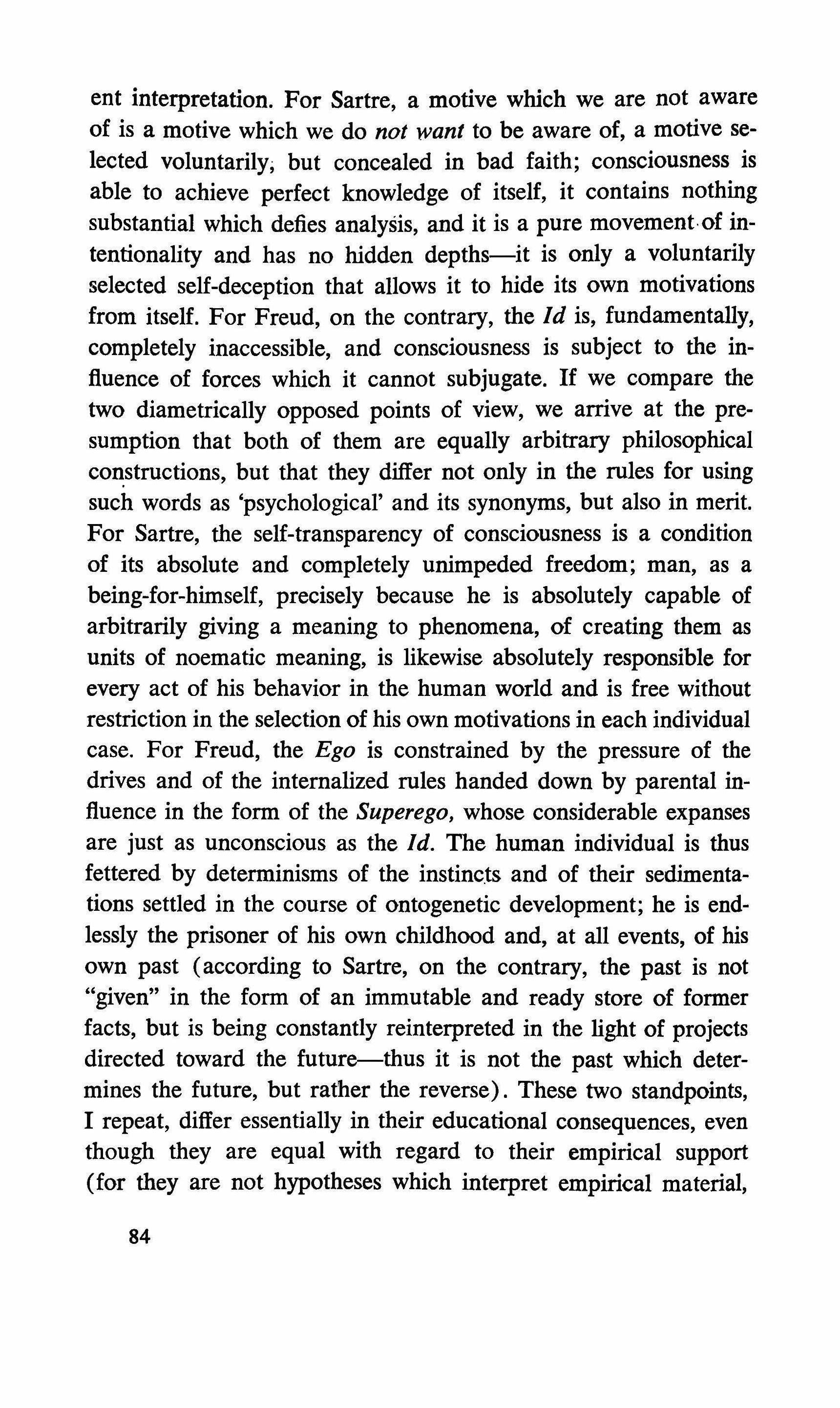
ent interpretation. For Sartre, a motive which we are not aware of is a motive which we do not want to be aware of, a motive selected voluntarily; but concealed in bad faith; consciousness is able to achieve perfect knowledge of itself, it contains nothing substantial which defies analysis, and it is a pure movement-of intentionality and has no hidden depths-it is only a voluntarily selected self-deception that allows it to hide its own motivations from itself. For Freud, on the contrary, the Id is, fundamentally, completely inaccessible, and consciousness is subject to the influence of forces which it cannot subjugate. If we compare the two diametrically opposed points of view, we arrive at the presumption that both of them are equally arbitrary philosophical constructions, but that they differ not only in the rules for using such words as 'psychological' and its synonyms, but also in merit. For Sartre, the self-transparency of consciousness is a condition of its absolute and completely unimpeded freedom; man, as a being-for-himself, precisely because he is absolutely capable of arbitrarily giving a meaning to phenomena, of creating them as units of noematic meaning, is likewise absolutely responsible for every act of his behavior in the human world and is free without restriction in the selection of his own motivations in each individual case. For Freud, the Ego is constrained by the pressure of the drives and of the internalized rules handed down by parental influence in the form of the Superego, whose considerable expanses are just as unconscious as the Id. The human individual is thus fettered by determinisms of the instincts and of their sedimentations settled in the course of ontogenetic development; he is endlessly the prisoner of his own childhood and, at all events, of his own past (according to Sartre, on the contrary, the past is not "given" in the form of an immutable and ready store of former facts, but is being constantly reinterpreted in the light of projects directed toward the future-thus it is not the past which determines the future, but rather the reverse). These two standpoints, I repeat, differ essentially in their educational consequences, even though they are equal with regard to their empirical support (for they are not hypotheses which interpret empirical material,
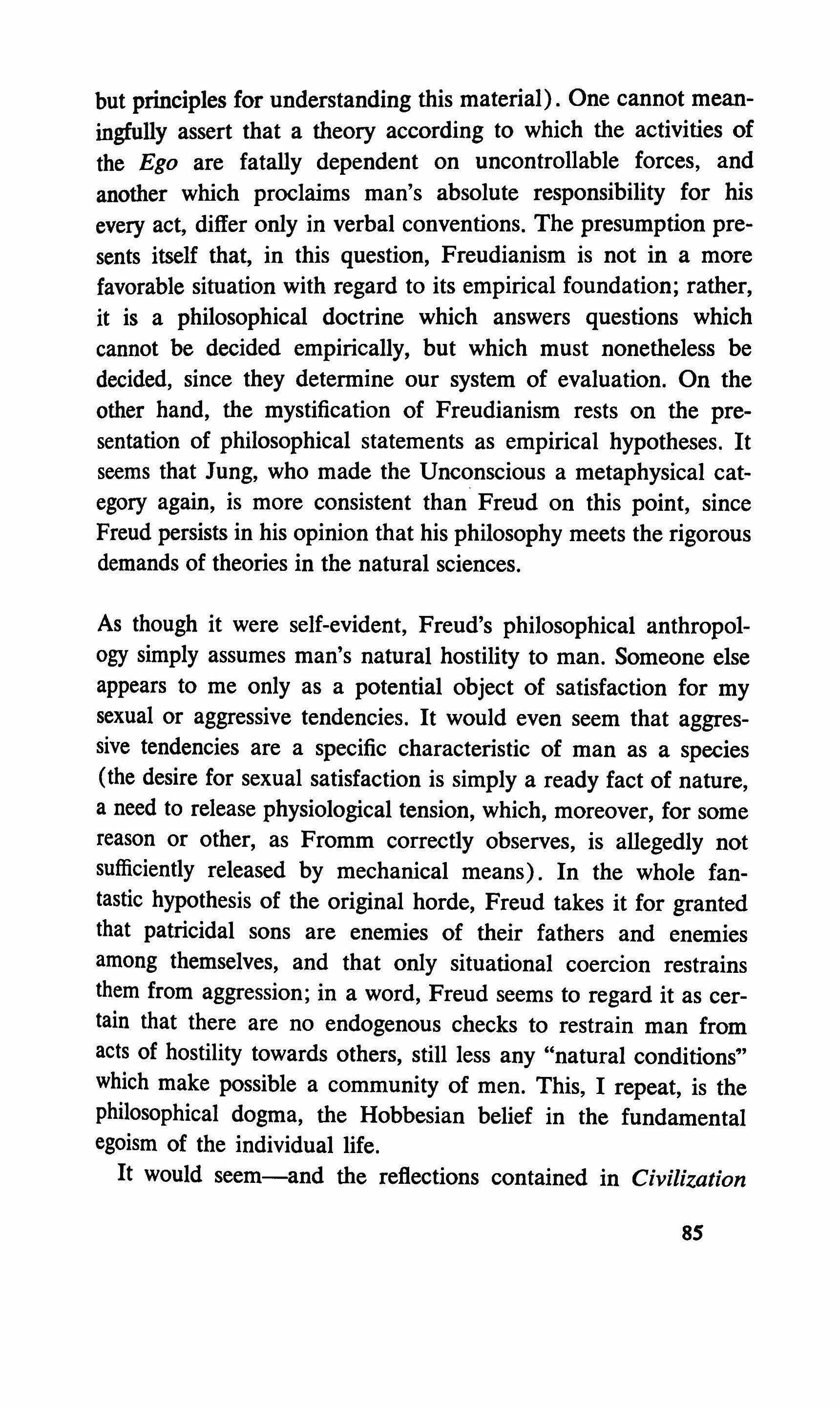
but principles for understanding this material). One cannot meaningfully assert that a theory according to which the activities of the Ego are fatally dependent on uncontrollable forces, and another which proclaims man's absolute responsibility for his every act, differ only in verbal conventions. The presumption presents itself that, in this question, Freudianism is not in a more favorable situation with regard to its empirical foundation; rather, it is a philosophical doctrine which answers questions which cannot be decided empirically, but which must nonetheless be decided, since they determine our system of evaluation. On the other hand, the mystification of Freudianism rests on the presentation of philosophical statements as empirical hypotheses. It seems that Jung, who made the Unconscious a metaphysical category again, is more consistent than Freud on this point, since Freud persists in his opinion that his philosophy meets the rigorous demands of theories in the natural sciences.
As though it were self-evident, Freud's philosophical anthropology simply assumes man's natural hostility to man. Someone else appears to me only as a potential object of satisfaction for my sexual or aggressive tendencies. It would even seem that aggressive tendencies are a specific characteristic of man as a species (the desire for sexual satisfaction is simply a ready fact of nature, a need to release physiological tension, which, moreover, for some reason or other, as Fromm correctly observes, is allegedly not sufficiently released by mechanical means). In the whole fantastic hypothesis of the original horde, Freud takes it for granted that patricidal sons are enemies of their fathers and enemies among themselves, and that only situational coercion restrains them from aggression; in a word, Freud seems to regard it as certain that there are no endogenous checks to restrain man from acts of hostility towards others, still less any "natural conditions" which make possible a community of men. This, I repeat, is the philosophical dogma, the Hobbesian belief in the fundamental egoism of the individual life. It would seem-and the reflections contained in Civilization

and Its Discontents speak distinctly for an interpretation of this kind-that the antagonism of nature and culture is uneliminable from the point of view of the Freudian theory of instincts; that culture is only a repressive force in relation to the driving tendencies and a locus of substitute and illusory satisfactions, which, moreover, in their tum themselves multiply the instruments of repression; that is, create a vicious circle, where the means designed to mitigate the effects of frustration contribute to intensifying the situations which give rise to this frustration. If we were to take the schema seriously, it must be expected that the gulf between the demands of culture and the pressure of the instincts must grow in relation to the advancement of civilization, only periodically allowing the release of natural aggressiveness in acts of savage mass warfare. Similarly, there must be an increase in the part played in culture by illusory compensatory means suitable for application on a mass scale and, above all, religious beliefs. The mutual hostility of drives and cultural institutions must, I repeat, grow, since the repressed desires belong to the permanent layer of nature and since coexistence in culture is an impossibility without this repression. Nonetheless, The Future of an Illusion quite unexpectedly opens up a different perspective. Here, Freud declares that religious beliefs are similar to the phase of infantile neurosis which everyone goes through, but which passes off; in the same way, it is possible, and even highly probable, that mankind comes out of childhood in order to discover a rational justification of culture which dispenses with divine sanctions-that is, in order to reconcile itself to its fate. It appears impossible to reconcile these two points of view. If the perspective of reconciling oneself with one's fate were real, this would mean that mankind can abandon the satisfaction of natural desires and transform this very act of resignation into nature. In this discrepancy, we observe a typical example of the nonchalant way in which Freud transfers a category of the psychology of individual development to the history of mankind. In actual fact, the analogy with childhood neurosis is fallacious from the point of view of Freud's own doctrine, for in the case of childhood repressions (if we leave aside the later fixa-
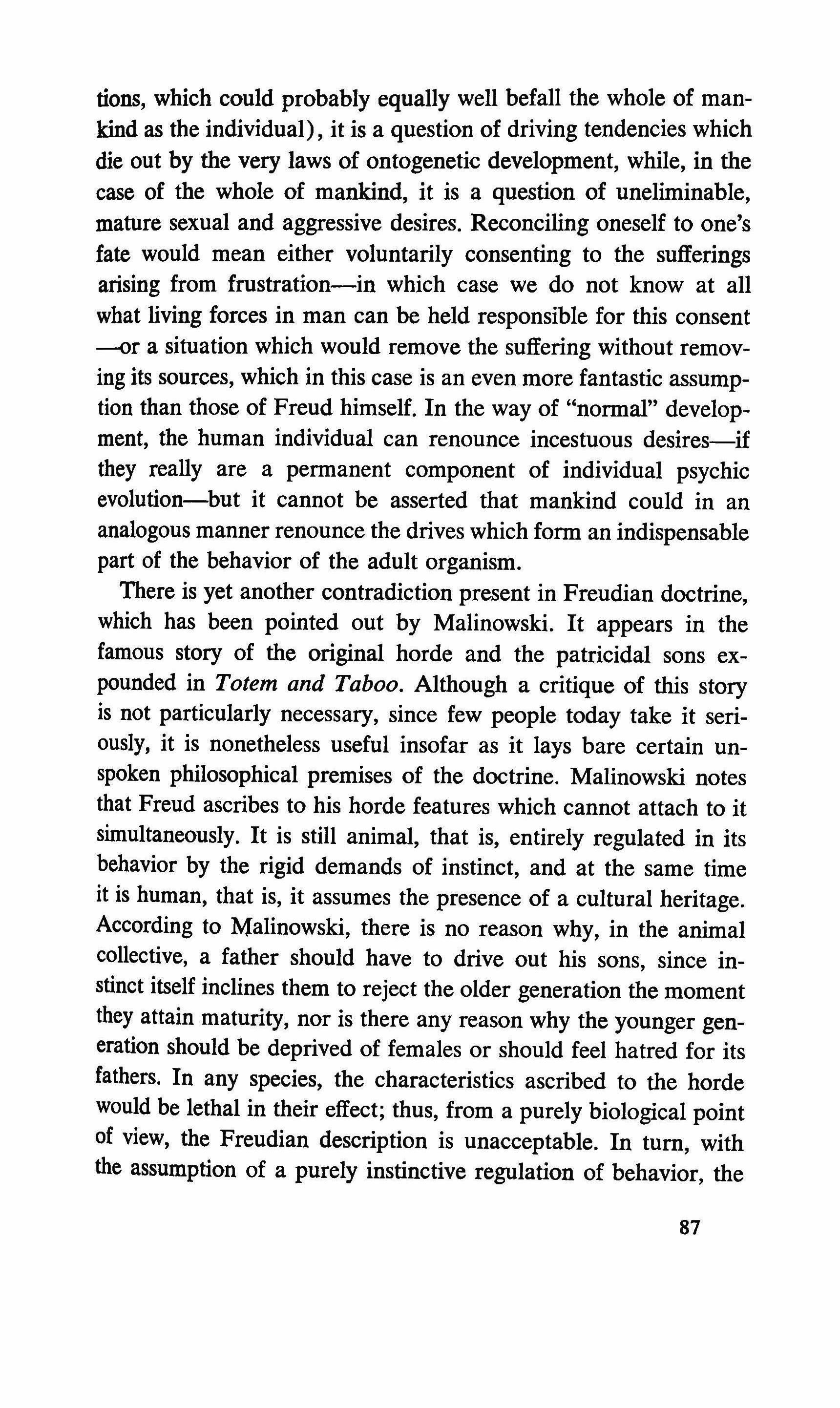
tions, which could probably equally well befall the whole of mankind as the individual), it is a question of driving tendencies which die out by the very laws of ontogenetic development, while, in the case of the whole of mankind, it is a question of uneliminable, mature sexual and aggressive desires. Reconciling oneself to one's fate would mean either voluntarily consenting to the sufferings arising from frustration-in which case we do not know at all what living forces in man can be held responsible for this consent -or a situation which would remove the suffering without removing its sources, which in this case is an even more fantastic assumption than those of Freud himself. In the way of "normal" development, the human individual can renounce incestuous desires-if they really are a permanent component of individual psychic evolution-but it cannot be asserted that mankind could in an analogous manner renounce the drives which form an indispensable part of the behavior of the adult organism.
There is yet another contradiction present in Freudian doctrine, which has been pointed out by Malinowski. It appears in the famous story of the original horde and the patricidal sons expounded in Totem and Taboo. Although a critique of this story is not particularly necessary, since few people today take it seriously, it is nonetheless useful insofar as it lays bare certain unspoken philosophical premises of the doctrine. Malinowski notes that Freud ascribes to his horde features which cannot attach to it simultaneously. It is still animal, that is, entirely regulated in its behavior by the rigid demands of instinct, and at the same time it is human, that is, it assumes the presence of a cultural heritage. According to Malinowski, there is no reason why, in the animal collective, a father should have to drive out his sons, since instinct itself inclines them to reject the older generation the moment they attain maturity, nor is there any reason why the younger generation should be deprived of females or should feel hatred for its fathers. In any species, the characteristics ascribed to the horde would be lethal in their effect; thus, from a purely biological point of view, the Freudian description is unacceptable. In tum, with the assumption of a purely instinctive regulation of behavior, the
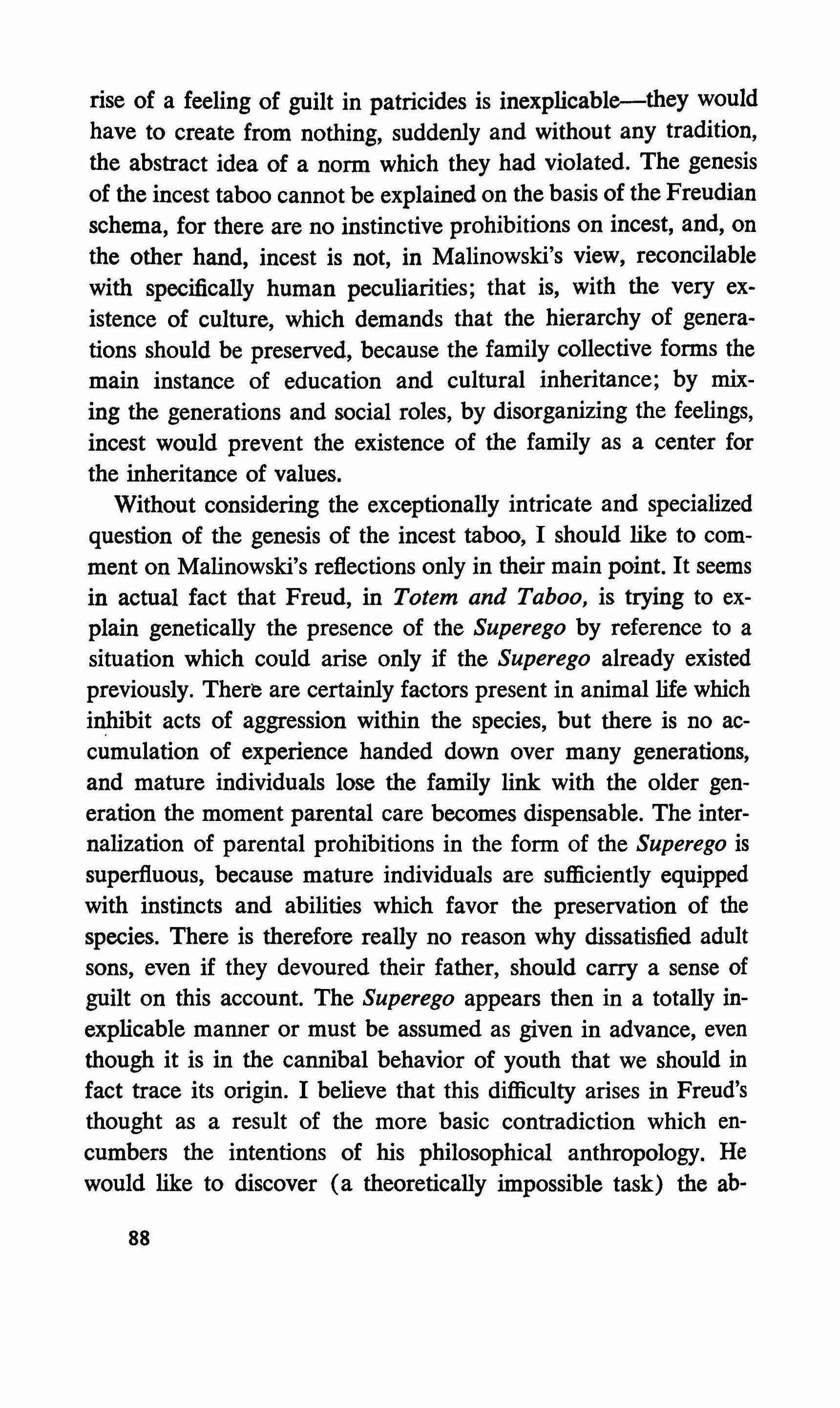
rise of a feeling of guilt in patricides is inexplicable-they would have to create from nothing, suddenly and without any tradition, the abstract idea of a norm which they had violated. The genesis of the incest taboo cannot be explained on the basis of the Freudian schema, for there are no instinctive prohibitions on incest, and, on the other hand, incest is not, in Malinowski's view, reconcilable with specifically human peculiarities; that is, with the very existence of culture, which demands that the hierarchy of generations should be preserved, because the family collective forms the main instance of education and cultural inheritance; by mixing the generations and social roles, by disorganizing the feelings, incest would prevent the existence of the family as a center for the inheritance of values.
Without considering the exceptionally intricate and specialized question of the genesis of the incest taboo, I should like to comment on Malinowski's reflections only in their main point. It seems in actual fact that Freud, in Totem and Taboo, is trying to explain genetically the presence of the Superego by reference to a situation which could arise only if the Superego already existed previously. There are certainly factors present in animal life which inhibit acts of aggression within the species, but there is no accumulation of experience handed down over many generations, and mature individuals lose the family link with the older generation the moment parental care becomes dispensable. The internalization of parental prohibitions in the form of the Superego is superfluous, because mature individuals are sufficiently equipped with instincts and abilities which favor the preservation of the species. There is therefore really no reason why dissatisfied adult sons, even if they devoured their father, should carry a sense of guilt on this account. The Superego appears then in a totally inexplicable manner or must be assumed as given in advance, even though it is in the cannibal behavior of youth that we should in fact trace its origin. I believe that this difficulty arises in Freud's thought as a result of the more basic contradiction which encumbers the intentions of his philosophical anthropology. He would like to discover (a theoretically impossible task) the ab-
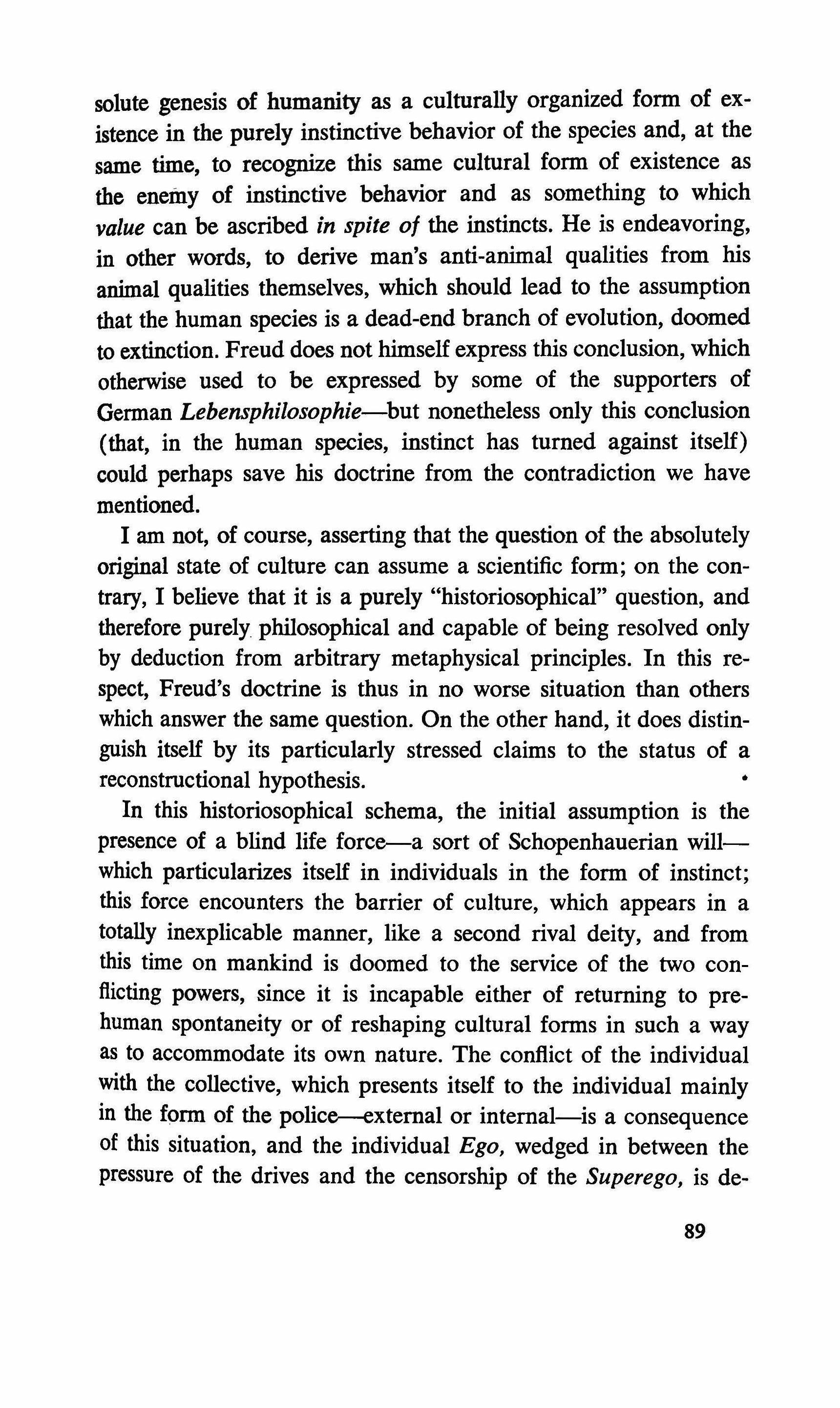
solute genesis of humanity as a culturally organized form of existence in the purely instinctive behavior of the species and, at the same time, to recognize this same cultural form of existence as the enemy of instinctive behavior and as something to which value can be ascribed in spite of the instincts. He is endeavoring, in other words, to derive man's anti-animal qualities from his animal qualities themselves, which should lead to the assumption that the human species is a dead-end branch of evolution, doomed to extinction. Freud does not himself express this conclusion, which otherwise used to be expressed by some of the supporters of German Lebensphilosophie-but nonetheless only this conclusion (that, in the human species, instinct has turned against itself) could perhaps save his doctrine from the contradiction we have mentioned.
I am not, of course, asserting that the question of the absolutely original state of culture can assume a scientific form; on the contrary, I believe that it is a purely "historiosophical" question, and therefore purely philosophical and capable of being resolved only by deduction from arbitrary metaphysical principles. In this respect, Freud's doctrine is thus in no worse situation than others which answer the same question. On the other hand, it does distinguish itself by its particularly stressed claims to the status of a reconstructional hypothesis. •
In this historiosophical schema, the initial assumption is the presence of a blind life force--a sort of Schopenhauerian willwhich particularizes itself in individuals in the form of instinct; this force encounters the barrier of culture, which appears in a totally inexplicable manner, like a second rival deity, and from this time on mankind is doomed to the service of the two conflicting powers, since it is incapable either of returning to prehuman spontaneity or of reshaping cultural forms in such a way as to accommodate its own nature. The conflict of the individual with the collective, which presents itself to the individual mainly in the form of the police--external or internal-is a consequence of this situation, and the individual Ego, wedged in between the pressure of the drives and the censorship of the Superego, is de-
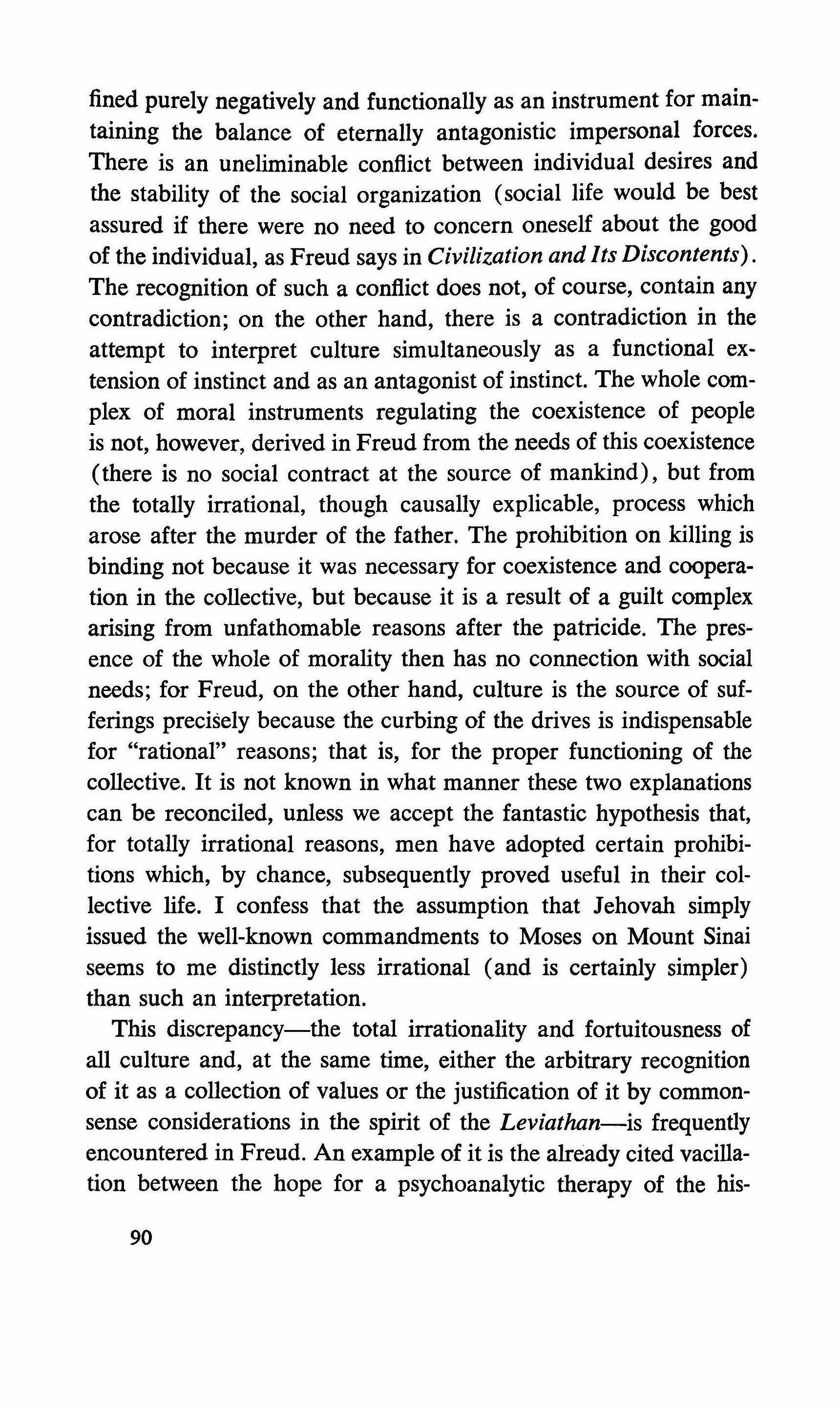
fined purely negatively and functionally as an instrument for maintaining the balance of eternally antagonistic impersonal forces. There is an uneliminable conflict between individual desires and the stability of the social organization (social life would be best assured if there were no need to concern oneself about the good of the individual, as Freud says in Civilization and Its Discontents) The recognition of such a conflict does not, of course, contain any contradiction; on the other hand, there is a contradiction in the attempt to interpret culture simultaneously as a functional extension of instinct and as an antagonist of instinct. The whole complex of moral instruments regulating the coexistence of people is not, however, derived in Freud from the needs of this coexistence (there is no social contract at the source of mankind), but from the totally irrational, though causally explicable, process which arose after the murder of the father. The prohibition on killing is binding not because it was necessary for coexistence and cooperation in the collective, but because it is a result of a guilt complex arising from unfathomable reasons after the patricide. The presence of the whole of morality then has no connection with social needs; for Freud, on the other hand, culture is the source of sufferings precisely because the curbing of the drives is indispensable for "rational" reasons; that is, for the proper functioning of the collective. It is not known in what manner these two explanations can be reconciled, unless we accept the fantastic hypothesis that, for totally irrational reasons, men have adopted certain prohibitions which, by chance, subsequently proved useful in their collective life. I confess that the assumption that Jehovah simply issued the well-known commandments to Moses on Mount Sinai seems to me distinctly less irrational (and is certainly simpler) than such an interpretation.
This discrepancy-the total irrationality and fortuitousness of all culture and, at the same time, either the arbitrary recognition of it as a collection of values or the justification of it by commonsense considerations in the spirit of the Leviathan-is frequently encountered in Freud. An example of it is the already cited vacillation between the hope for a psychoanalytic therapy of the his-
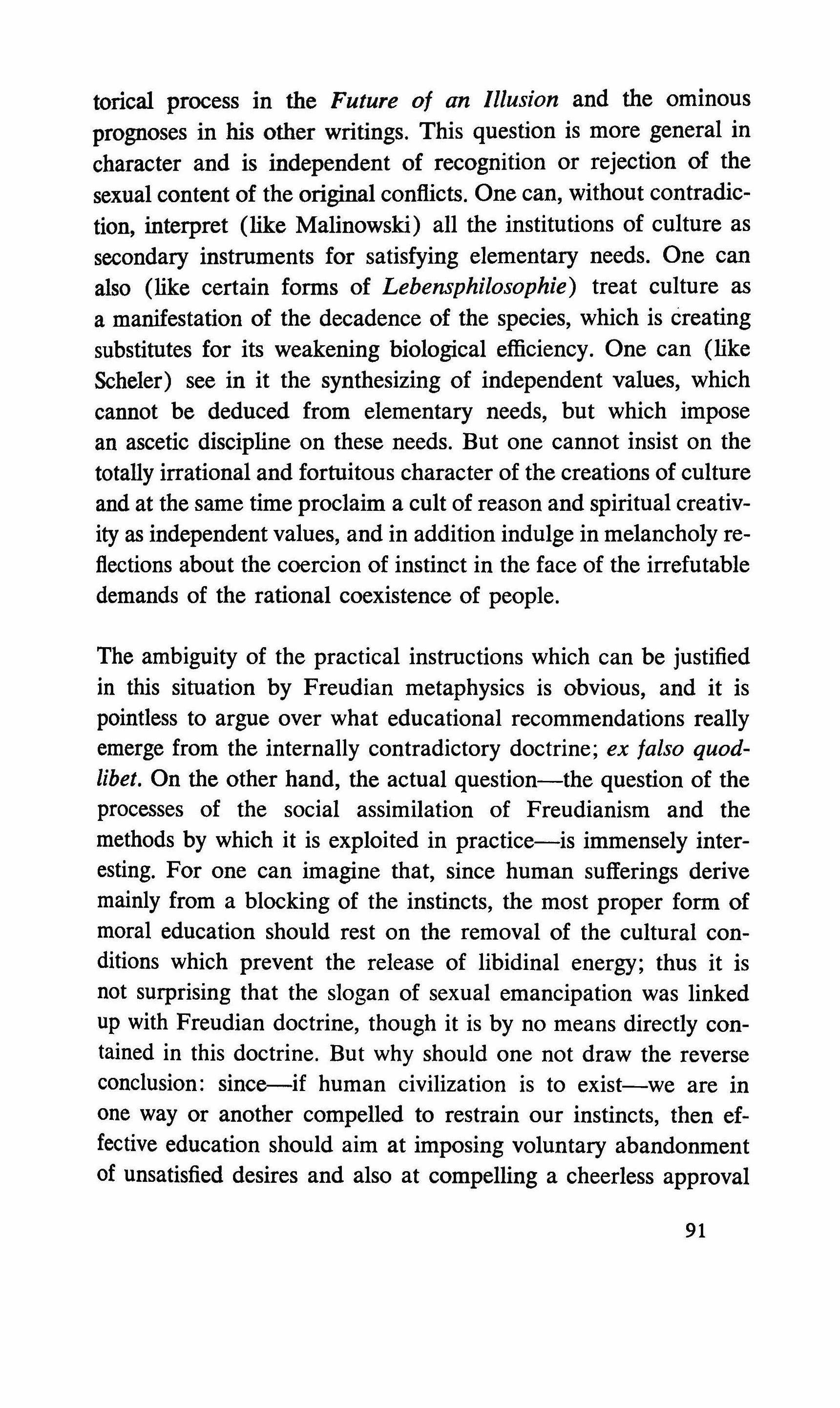
torical process in the Future of an Illusion and the ominous prognoses in his other writings. This question is more general in character and is independent of recognition or rejection of the sexual content of the original conflicts. One can, without contradiction, interpret (like Malinowski) all the institutions of culture as secondary instruments for satisfying elementary needs. One can also (like certain forms of Lebensphilosophie) treat culture as a manifestation of the decadence of the species, which is creating substitutes for its weakening biological efficiency. One can (like Scheler) see in it the synthesizing of independent values, which cannot be deduced from elementary needs, but which impose an ascetic discipline on these needs. But one cannot insist on the totally irrational and fortuitous character of the creations of culture and at the same time proclaim a cult of reason and spiritual creativity as independent values, and in addition indulge in melancholy reflections about the coercion of instinct in the face of the irrefutable demands of the rational coexistence of people.
The ambiguity of the practical instructions which can be justified in this situation by Freudian metaphysics is obvious, and it is pointless to argue over what educational recommendations really emerge from the internally contradictory doctrine; ex falso quodlibet. On the other hand, the actual question-the question of the processes of the social assimilation of Freudianism and the methods by which it is exploited in practice-is immensely interesting. For one can imagine that, since human sufferings derive mainly from a blocking of the instincts, the most proper form of moral education should rest on the removal of the cultural conditions which prevent the release of libidinal energy; thus it is not surprising that the slogan of sexual emancipation was linked up with Freudian doctrine, though it is by no means directly contained in this doctrine. But why should one not draw the reverse conclusion: since-if human civilization is to exist-we are in one way or another compelled to restrain our instincts, then effective education should aim at imposing voluntary abandonment of unsatisfied desires and also at compelling a cheerless approval
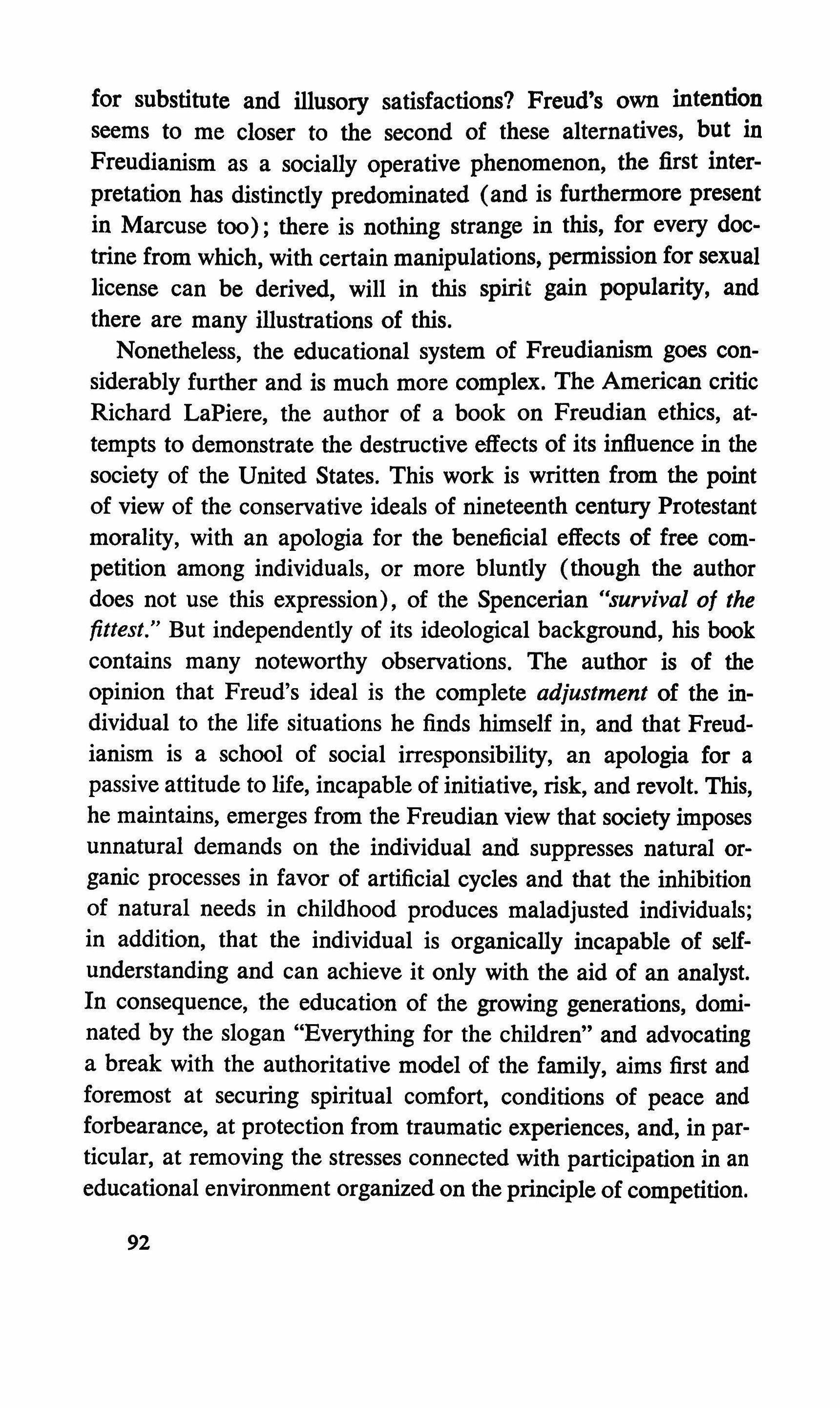
for substitute and illusory satisfactions? Freud's own intention seems to me closer to the second of these alternatives, but in Freudianism as a socially operative phenomenon, the first interpretation has distinctly predominated (and is furthermore present in Marcuse too); there is nothing strange in this, for every doctrine from which, with certain manipulations, permission for sexual license can be derived, will in this spirit gain popularity, and there are many illustrations of this. Nonetheless, the educational system of Freudianism goes considerably further and is much more complex. The American critic Richard LaPiere, the author of a book on Freudian ethics, attempts to demonstrate the destructive effects of its influence in the society of the United States. This work is written from the point of view of the conservative ideals of nineteenth century Protestant morality, with an apologia for the beneficial effects of free competition among individuals, or more bluntly (though the author does not use this expression), of the Spencerian "survival of the fittest." But independently of its ideological background, his book contains many noteworthy observations. The author is of the opinion that Freud's ideal is the complete adjustment of the individual to the life situations he finds himself in, and that Freudianism is a school of social irresponsibility, an apologia for a passive attitude to life, incapable of initiative, risk, and revolt. This, he maintains, emerges from the Freudian view that society imposes unnatural demands on the individual and suppresses natural organic processes in favor of artificial cycles and that the inhibition of natural needs in childhood produces maladjusted individuals; in addition, that the individual is organically incapable of selfunderstanding and can achieve it only with the aid of an analyst. In consequence, the education of the growing generations, dominated by the slogan "Everything for the children" and advocating a break with the authoritative model of the family, aims first and foremost at securing spiritual comfort, conditions of peace and forbearance, at protection from traumatic experiences, and, in particular, at removing the stresses connected with participation in an educational environment organized on the principle of competition.
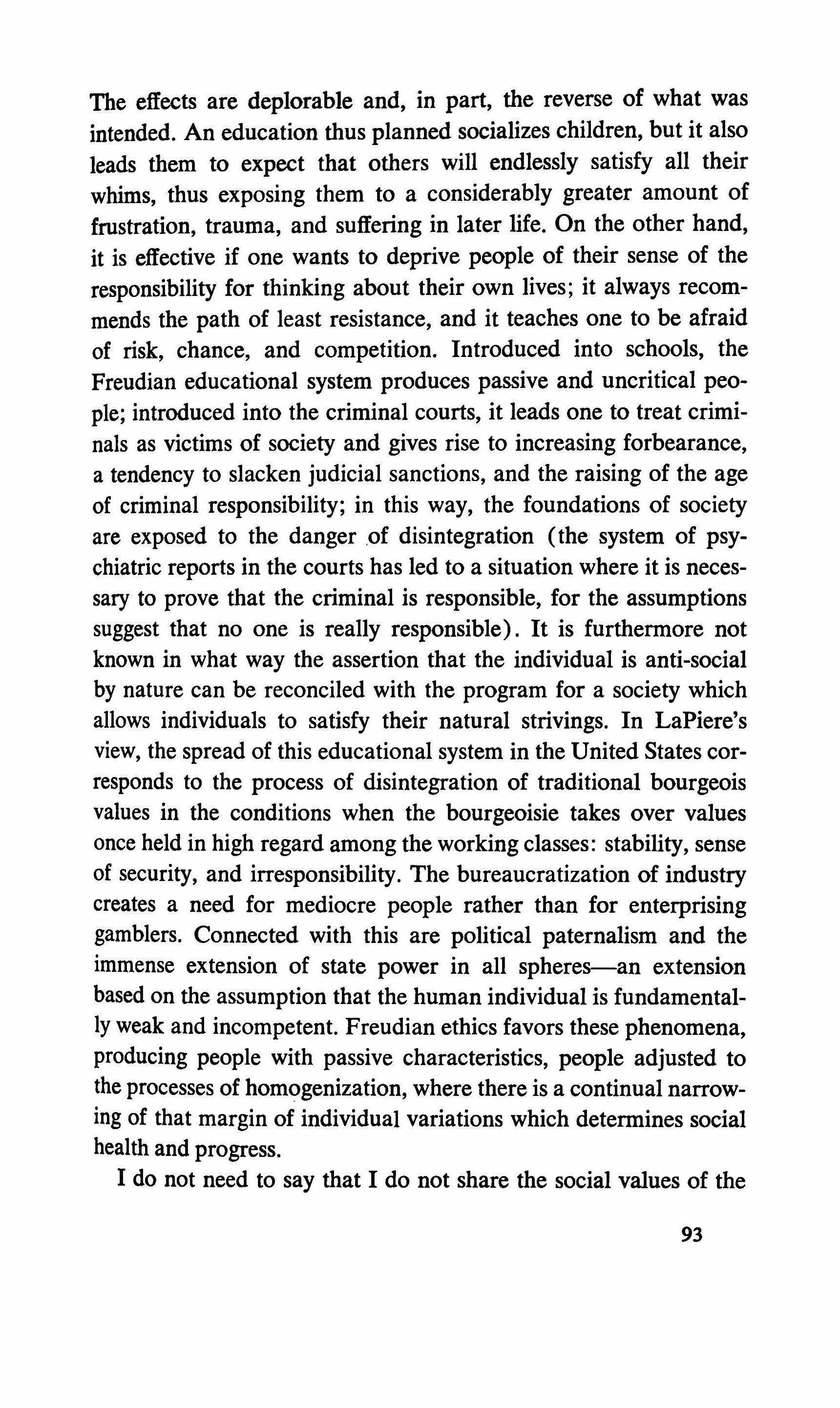
The effects are deplorable and, in part, the reverse of what was intended. An education thus planned socializes children, but it also leads them to expect that others will endlessly satisfy all their whims, thus exposing them to a considerably greater amount of frustration, trauma, and suffering in later life. On the other hand, it is effective if one wants to deprive people of their sense of the responsibility for thinking about their own lives; it always recommends the path of least resistance, and it teaches one to be afraid of risk, chance, and competition. Introduced into schools, the Freudian educational system produces passive and uncritical people; introduced into the criminal courts, it leads one to treat criminals as victims of society and gives rise to increasing forbearance, a tendency to slacken judicial sanctions, and the raising of the age of criminal responsibility; in this way, the foundations of society are exposed to the danger of disintegration (the system of psychiatric reports in the courts has led to a situation where it is necessary to prove that the criminal is responsible, for the assumptions suggest that no one is really responsible). It is furthermore not known in what way the assertion that the individual is anti-social by nature can be reconciled with the program for a society which allows individuals to satisfy their natural strivings. In LaPiere's view, the spread of this educational system in the United States corresponds to the process of disintegration of traditional bourgeois values in the conditions when the bourgeoisie takes over values once held in high regard among the working classes: stability, sense of security, and irresponsibility. The bureaucratization of industry creates a need for mediocre people rather than for enterprising gamblers. Connected with this are political paternalism and the immense extension of state power in all spheres----an extension based on the assumption that the human individual is fundamentally weak and incompetent. Freudian ethics favors these phenomena, producing people with passive characteristics, people adjusted to the processes of homogenization, where there is a continual narrowing of that margin of individual variations which determines social health and progress.
I do not need to say that I do not share the social values of the 93
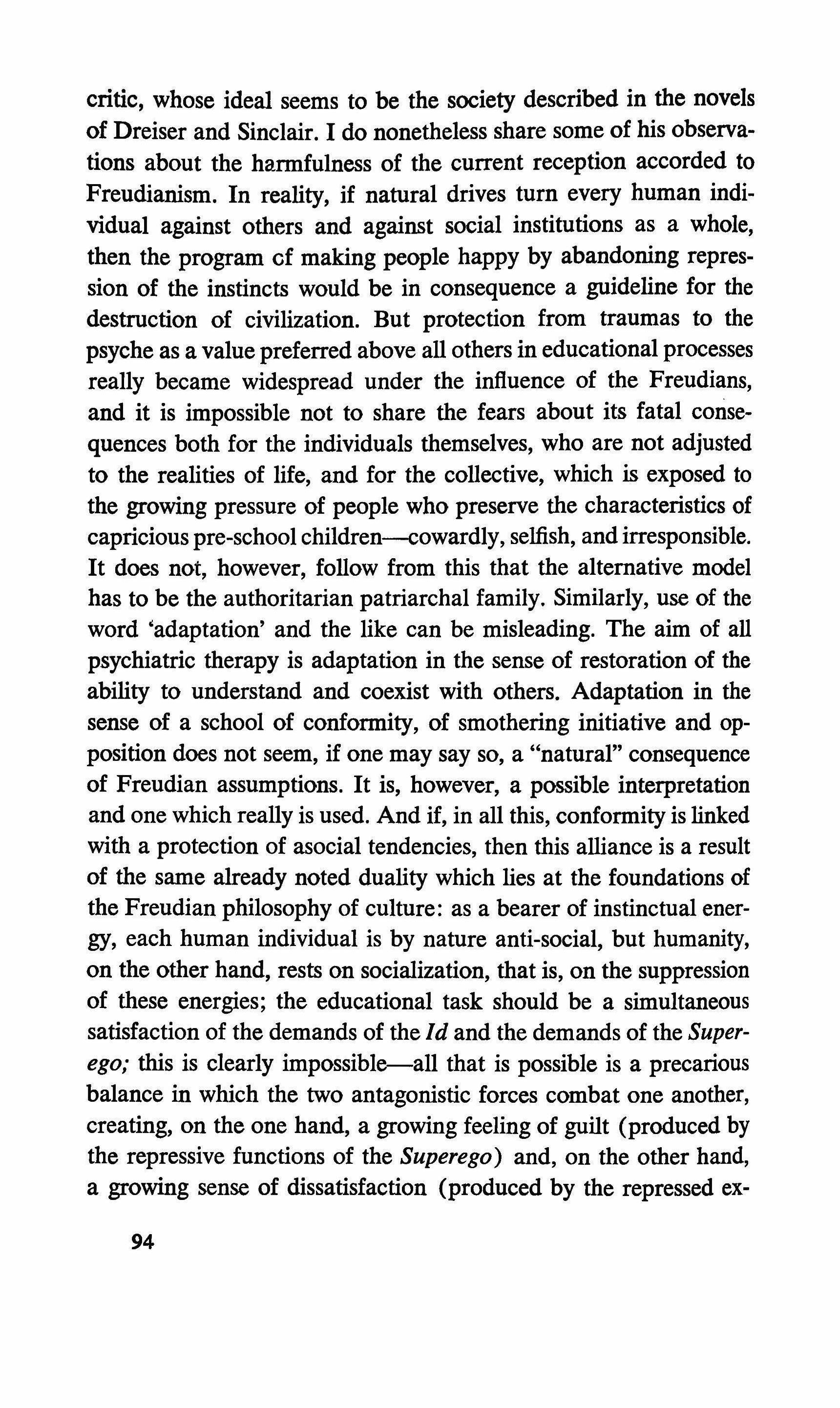
critic, whose ideal seems to be the society described in the novels of Dreiser and Sinclair. I do nonetheless share some of his observations about the harmfulness of the current reception accorded to Freudianism. In reality, if natural drives turn every human individual against others and against social institutions as a whole, then the program of making people happy by abandoning repression of the instincts would be in consequence a guideline for the destruction of civilization. But protection from traumas to the psyche as a value preferred above all others in educational processes really became widespread under the influence of the Freudians, and it is impossible not to share the fears about its fatal consequences both for the individuals themselves, who are not adjusted to the realities of life, and for the collective, which is exposed to the growing pressure of people who preserve the characteristics of capriciouspre-school children--cowardly, selfish, and irresponsible. It does not, however, follow from this that the alternative model has to be the authoritarian patriarchal family. Similarly, use of the word 'adaptation' and the like can be misleading. The aim of all psychiatric therapy is adaptation in the sense of restoration of the ability to understand and coexist with others. Adaptation in the sense of a school of conformity, of smothering initiative and opposition does not seem, if one may say so, a "natural" consequence of Freudian assumptions. It is, however, a possible interpretation and one which really is used. And if, in all this, conformity is linked with a protection of asocial tendencies, then this alliance is a result of the same already noted duality which lies at the foundations of the Freudian philosophy of culture: as a bearer of instinctual energy, each human individual is by nature anti-social, but humanity, on the other hand, rests on socialization, that is, on the suppression of these energies; the educational task should be a simultaneous satisfaction of the demands of the Id and the demands of the Superego; this is clearly impossible-all that is possible is a precarious balance in which the two antagonistic forces combat one another, creating, on the one hand, a growing feeling of guilt (produced by the repressive functions of the Superego) and, on the other hand, a growing sense of dissatisfaction (produced by the repressed ex-
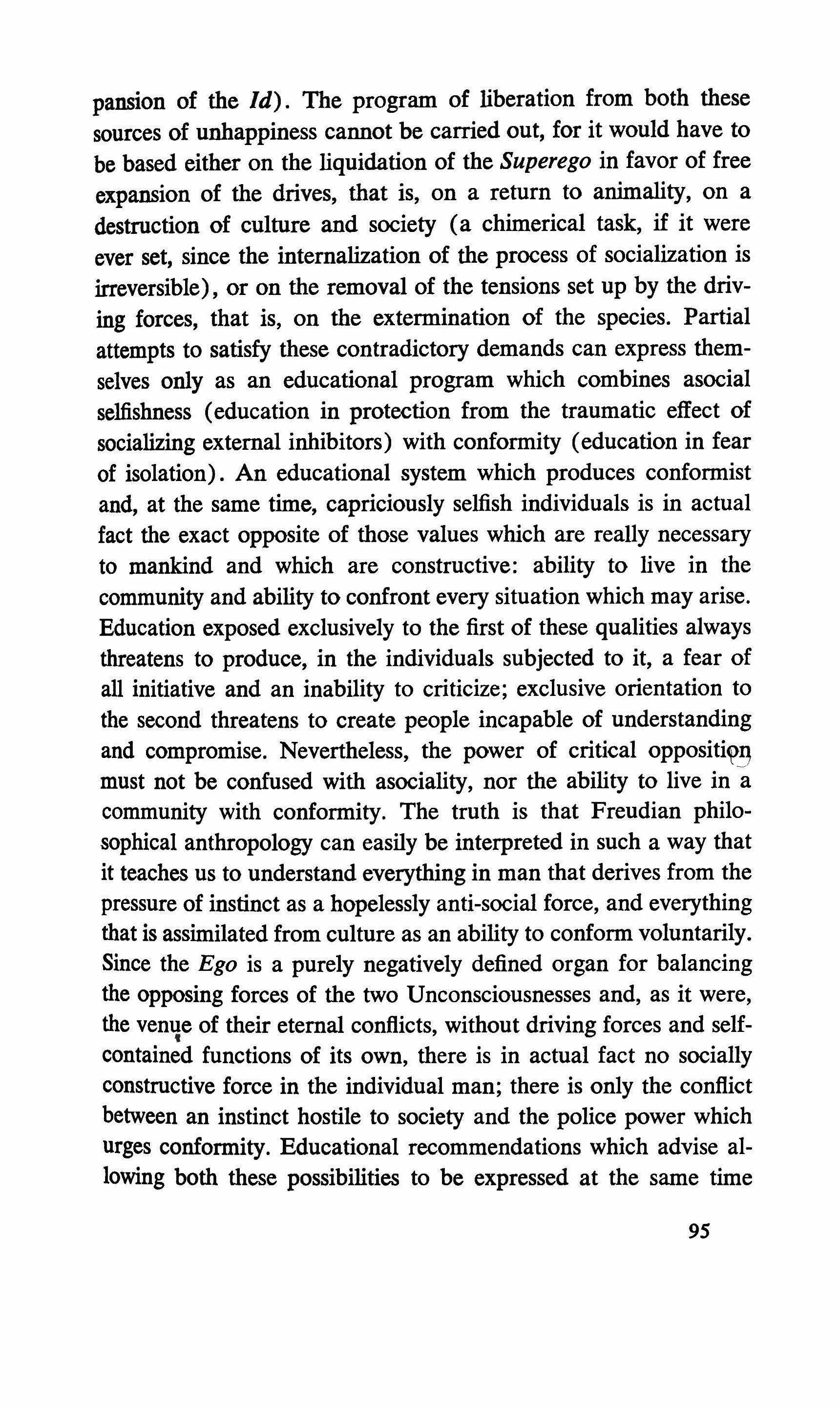
pansion of the Id). The program of liberation from both these sources of unhappiness cannot be carried out, for it would have to be based either on the liquidation of the Superego in favor of free expansion of the drives, that is, on a return to animality, on a destruction of culture and society (a chimerical task, if it were ever set, since the internalization of the process of socialization is irreversible), or on the removal of the tensions set up by the driving forces, that is, on the extermination of the species. Partial attempts to satisfy these contradictory demands can express themselves only as an educational program which combines asocial selfishness (education in protection from the traumatic effect of socializing external inhibitors) with conformity (education in fear of isolation). An educational system which produces conformist and, at the same time, capriciously selfish individuals is in actual fact the exact opposite of those values which are really necessary to mankind and which are constructive: ability to live in the community and ability to confront every situation which may arise. Education exposed exclusively to the first of these qualities always threatens to produce, in the individuals subjected to it, a fear of all initiative and an inability to criticize; exclusive orientation to the second threatens to create people incapable of understanding and compromise. Nevertheless, the power of critical oppositi�� must not be confused with asociality, nor the ability to live in a community with conformity. The truth is that Freudian philosophical anthropology can easily be interpreted in such a way that it teaches us to understand everything in man that derives from the pressure of instinct as a hopelessly anti-social force, and everything that is assimilated from culture as an ability to conform voluntarily. Since the Ego is a purely negatively defined organ for balancing the opposing forces of the two Unconsciousnesses and, as it were, the venqe of their eternal conflicts, without driving forces and selfcontained functions of its own, there is in actual fact no socially constructive force in the individual man; there is only the conflict between an instinct hostile to society and the police power which urges conformity. Educational recommendations which advise allowing both these possibilities to be expressed at the same time 9S
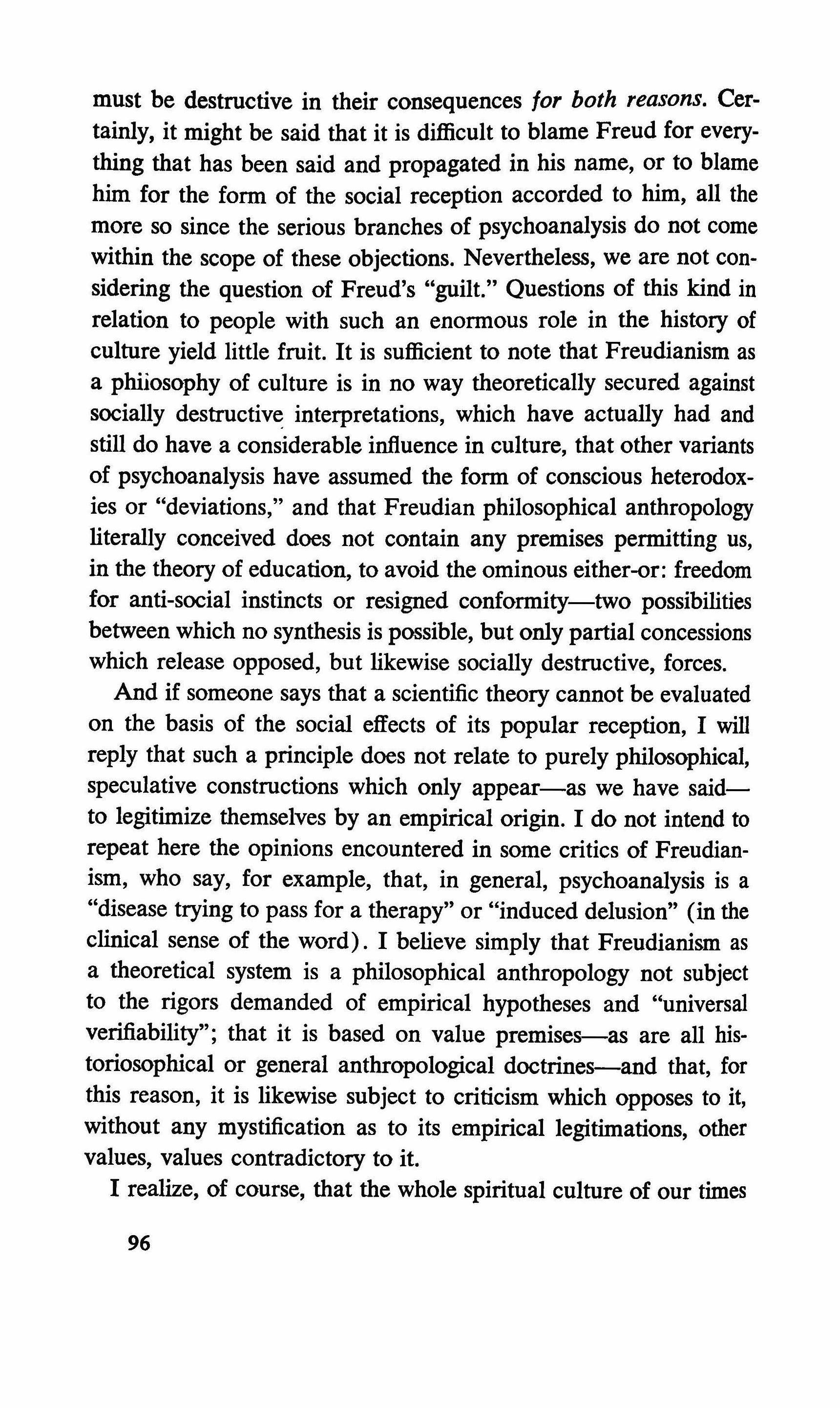
must be destructive in their consequences for both reasons. Certainly, it might be said that it is difficult to blame Freud for everything that has been said and propagated in his name, or to blame him for the form of the social reception accorded to him, all the more so since the serious branches of psychoanalysis do not come within the scope of these objections. Nevertheless, we are not considering the question of Freud's "guilt." Questions of this kind in relation to people with such an enormous role in the history of culture yield little fruit. It is sufficient to note that Freudianism as a philosophy of culture is in no way theoretically secured against socially destructive interpretations, which have actually had and still do have a considerable influence in culture, that other variants of psychoanalysis have assumed the form of conscious heterodoxies or "deviations," and that Freudian philosophical anthropology literally conceived does not contain any premises permitting us, in the theory of education, to avoid the ominous either-or: freedom for anti-social instincts or resigned conformity-two possibilities between which no synthesis is possible, but only partial concessions which release opposed, but likewise socially destructive, forces.
And if someone says that a scientific theory cannot be evaluated on the basis of the social effects of its popular reception, I will reply that such a principle does not relate to purely philosophical, speculative constructions which only appear-as we have saidto legitimize themselves by an empirical origin. I do not intend to repeat here the opinions encountered in some critics of Freudianism, who say, for example, that, in general, psychoanalysis is a "disease trying to pass for a therapy" or "induced delusion" (in the clinical sense of the word). I believe simply that Freudianism as a theoretical system is a philosophical anthropology not subject to the rigors demanded of empirical hypotheses and "universal verifiability"; that it is based on value premises-as are all historiosophical or general anthropological doctrines-and that, for this reason, it is likewise subject to criticism which opposes to it, without any mystification as to its empirical legitimations, other values, values contradictory to it.
I realize, of course, that the whole spiritual culture of our times
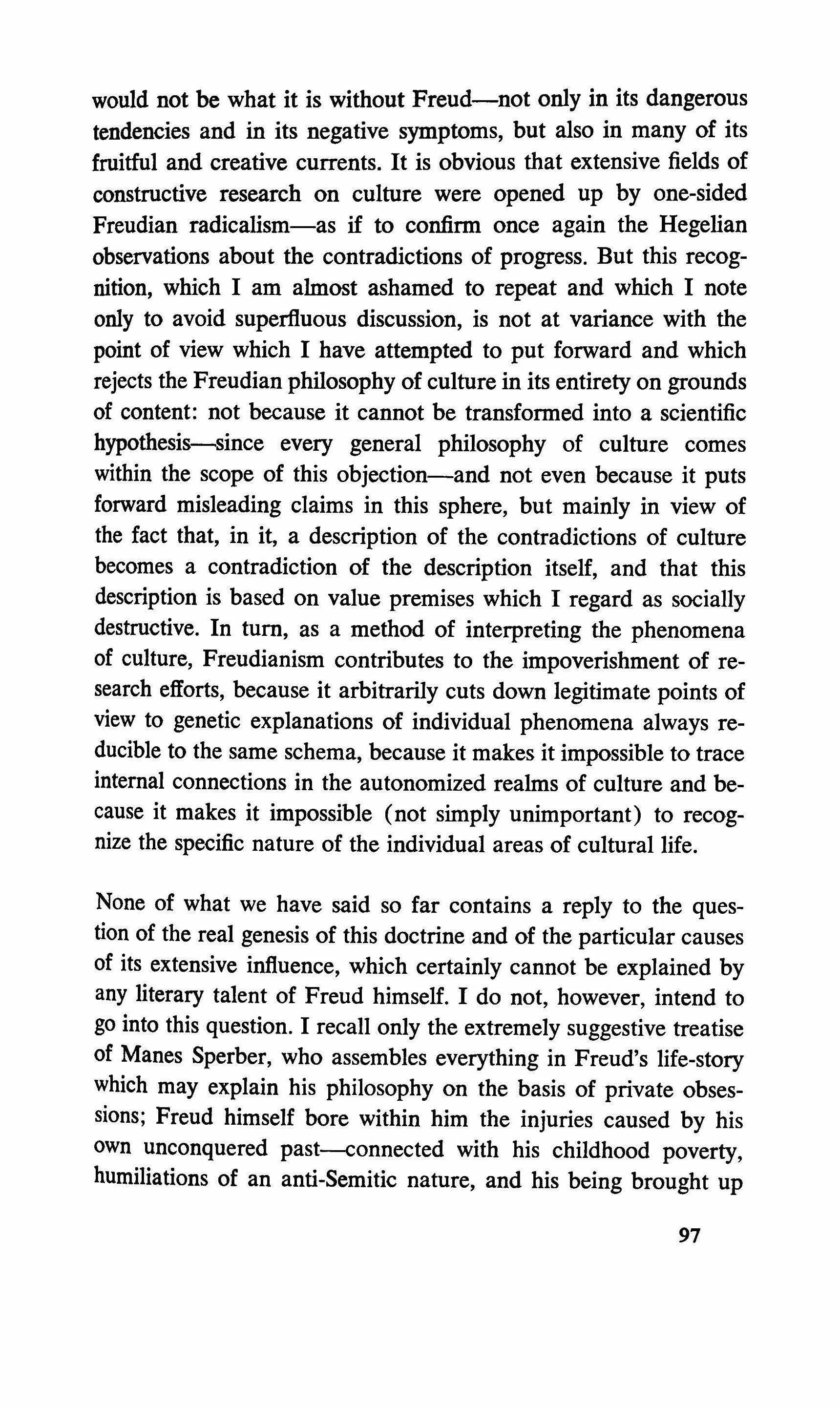
would not be what it is without Freud-not only in its dangerous tendencies and in its negative symptoms, but also in many of its fruitful and creative currents. It is obvious that extensive fields of constructive research on culture were opened up by one-sided Freudian radicalism-as if to confirm once again the Hegelian observations about the contradictions of progress. But this recognition, which I am almost ashamed to repeat and which I note only to avoid superfluous discussion, is not at variance with the point of view which I have attempted to put forward and which rejects the Freudian philosophy of culture in its entirety on grounds of content: not because it cannot be transformed into a scientific hypothesis-since every general philosophy of culture comes within the scope of this objection-and not even because it puts forward misleading claims in this sphere, but mainly in view of the fact that, in it, a description of the contradictions of culture becomes a contradiction of the description itself, and that this description is based on value premises which I regard as socially destructive. In tum, as a method of interpreting the phenomena of culture, Freudianism contributes to the impoverishment of research efforts, because it arbitrarily cuts down legitimate points of view to genetic explanations of individual phenomena always reducible to the same schema, because it makes it impossible to trace internal connections in the autonomized realms of culture and because it makes it impossible (not simply unimportant) to recognize the specific nature of the individual areas of cultural life.
None of what we have said so far contains a reply to the question of the real genesis of this doctrine and of the particular causes of its extensive influence, which certainly cannot be explained by any literary talent of Freud himself. I do not, however, intend to go into this question. I recall only the extremely suggestive treatise of Manes Sperber, who assembles everything in Freud's life-story which may explain his philosophy on the basis of private obsessions; Freud himself bore within him the injuries caused by his own unconquered past--connected with his childhood poverty, humiliations of an anti-Semitic nature, and his being brought up
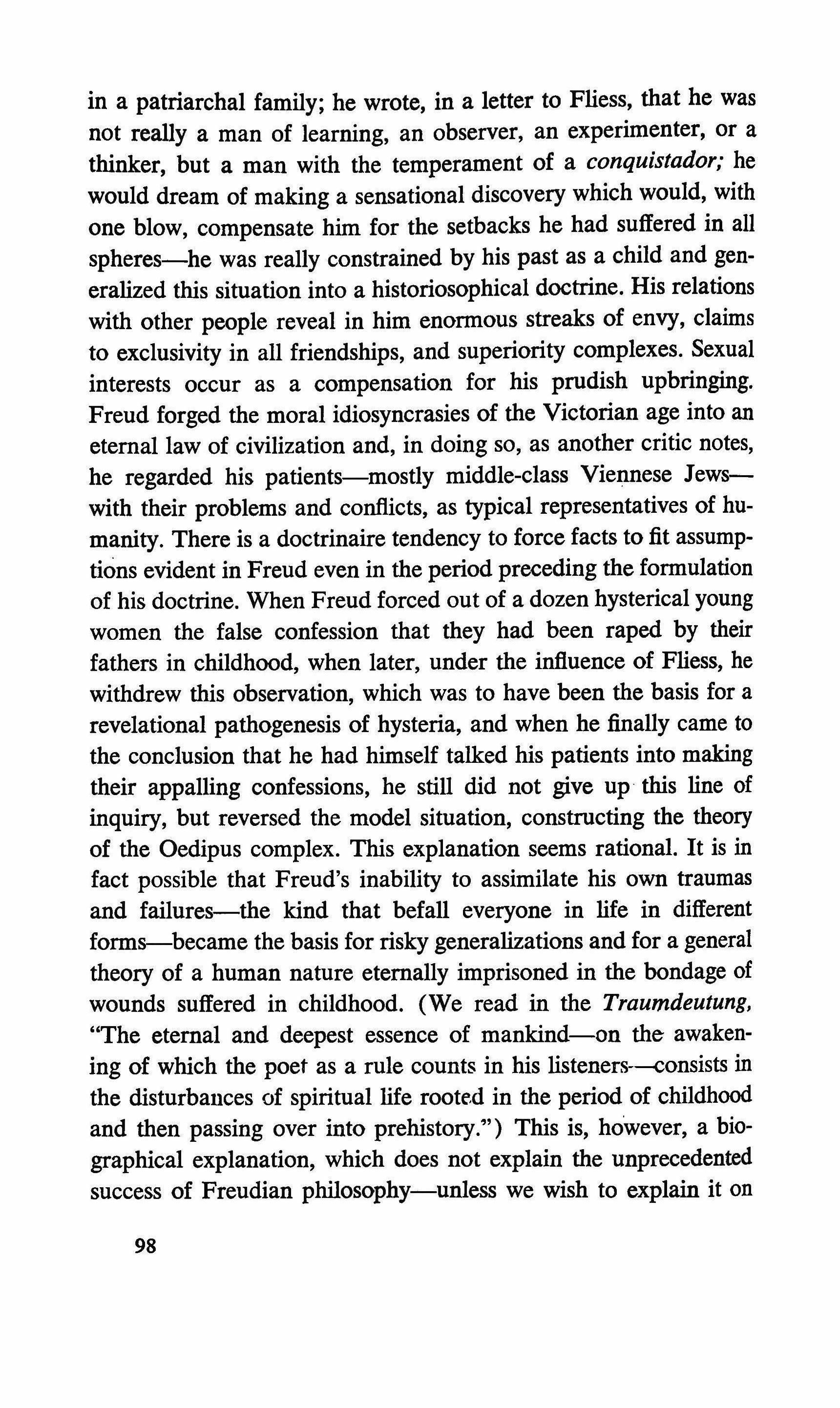
in a patriarchal family; he wrote, in a letter to Fliess, that he was not really a man of learning, an observer, an experimenter, or a thinker, but a man with the temperament of a conquistador,· he would dream of making a sensational discovery which would, with one blow, compensate him for the setbacks he had suffered in all spheres-he was really constrained by his past as a child and generalized this situation into a historiosophical doctrine. His relations with other people reveal in him enormous streaks of envy, claims to exclusivity in all friendships, and superiority complexes. Sexual interests occur as a compensation for his prudish upbringing. Freud forged the moral idiosyncrasies of the Victorian age into an eternal law of civilization and, in doing so, as another critic notes, he regarded his patients-mostly middle-class Viennese Jewswith their problems and conflicts, as typical representatives of humanity. There is a doctrinaire tendency to force facts to fit assumptions evident in Freud even in the period preceding the formulation of his doctrine. When Freud forced out of a dozen hysterical young women the false confession that they had been raped by their fathers in childhood, when later, under the influence of Fliess, he withdrew this observation, which was to have been the basis for a revelational pathogenesis of hysteria, and when he finally came to the conclusion that he had himself talked his patients into making their appalling confessions, he still did not give up this line of inquiry, but reversed the model situation, constructing the theory of the Oedipus complex. This explanation seems rational. It is in fact possible that Freud's inability to assimilate his own traumas and failures-the kind that befall everyone in life in different forms-became the basis for risky generalizations and for a general theory of a human nature eternally imprisoned in the bondage of wounds suffered in childhood. (We read in the Traumdeutung, "The eternal and deepest essence of mankind-on the awakening of which the poet as a rule counts in his listeners----consists in the disturbances of spiritual life rooted in the period of childhood and then passing over into prehistory.") This is, however, a biographical explanation, which does not explain the unprecedented success of Freudian philosophy-unless we wish to explain it on
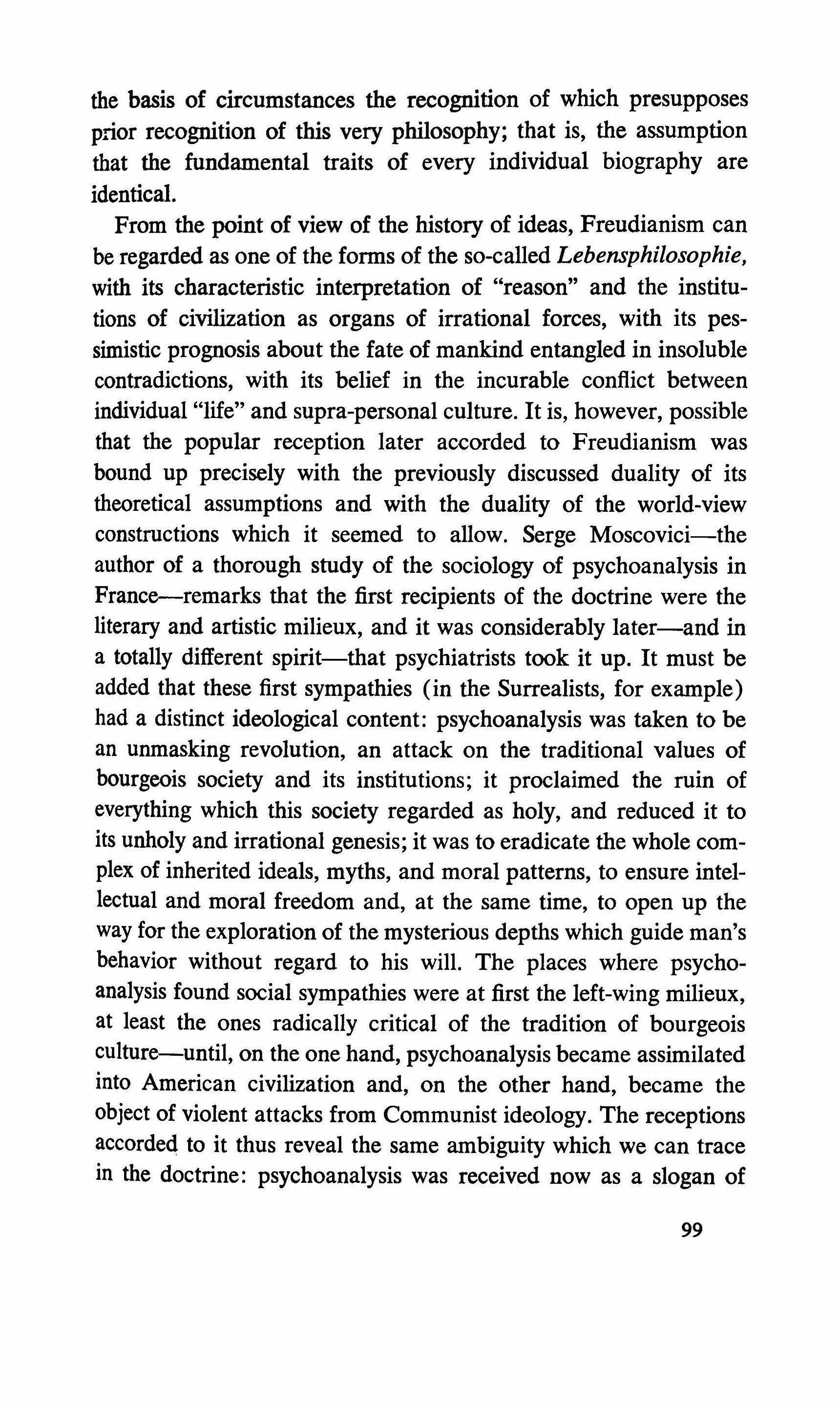
the basis of circumstances the recognition of which presupposes prior recognition of this very philosophy; that is, the assumption that the fundamental traits of every individual biography are identical.
From the point of view of the history of ideas, Freudianism can be regarded as one of the forms of the so-called Lebensphilosophie, with its characteristic interpretation of "reason" and the institutions of civilization as organs of irrational forces, with its pessimistic prognosis about the fate of mankind entangled in insoluble contradictions, with its belief in the incurable conflict between individual "life" and supra-personal culture. It is, however, possible that the popular reception later accorded to Freudianism was bound up precisely with the previously discussed duality of its theoretical assumptions and with the duality of the world-view constructions which it seemed to allow. Serge Moscovici-the author of a thorough study of the sociology of psychoanalysis in France-remarks that the first recipients of the doctrine were the literary and artistic milieux, and it was considerably later-and in a totally different spirit-that psychiatrists took it up. It must be added that these first sympathies (in the Surrealists, for example) had a distinct ideological content: psychoanalysis was taken to be an unmasking revolution, an attack on the traditional values of bourgeois society and its institutions; it proclaimed the ruin of everything which this society regarded as holy, and reduced it to its unholy and irrational genesis; it was to eradicate the whole complex of inherited ideals, myths, and moral patterns, to ensure intellectual and moral freedom and, at the same time, to open up the way for the exploration of the mysterious depths which guide man's behavior without regard to his will. The places where psychoanalysis found social sympathies were at first the left-wing milieux, at least the ones radically critical of the tradition of bourgeois culture-until, on the one hand, psychoanalysis became assimilated into American civilization and, on the other hand, became the object of violent attacks from Communist ideology. The receptions accorded to it thus reveal the same ambiguity which we can trace in the doctrine: psychoanalysis was received now as a slogan of 99
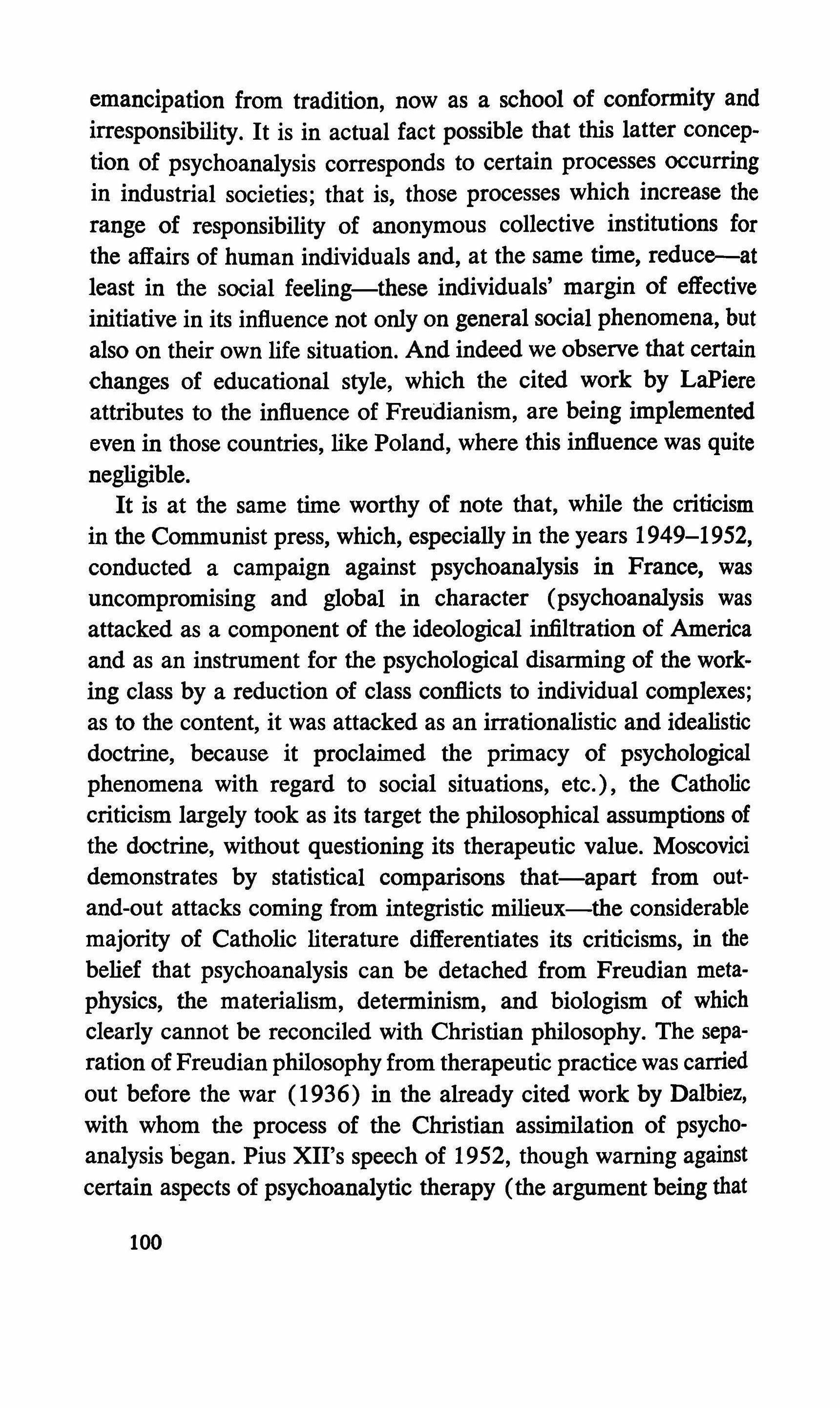
emancipation from tradition, now as a school of conformity and irresponsibility. It is in actual fact possible that this latter conception of psychoanalysis corresponds to certain processes occurring in industrial societies; that is, those processes which increase the range of responsibility of anonymous collective institutions for the affairs of human individuals and, at the same time, reduce--at least in the social feeling-these individuals' margin of effective initiative in its influence not only on general social phenomena, but also on their own life situation. And indeed we observe that certain changes of educational style, which the cited work by LaPiere attributes to the influence of Freudianism, are being implemented even in those countries, like Poland, where this influence was quite negligible.
It is at the same time worthy of note that, while the criticism in the Communist press, which, especially in the years 1949-1952, conducted a campaign against psychoanalysis in France, was uncompromising and global in character (psychoanalysis was attacked as a component of the ideological infiltration of America and as an instrument for the psychological disarming of the working class by a reduction of class conflicts to individual complexes; as to the content, it was attacked as an irrationalistic and idealistic doctrine, because it proclaimed the primacy of psychological phenomena with regard to social situations, etc.), the Catholic criticism largely took as its target the philosophical assumptions of the doctrine, without questioning its therapeutic value. Moscovici demonstrates by statistical comparisons that-apart from outand-out attacks coming from integristic milieux-the considerable majority of Catholic literature differentiates its criticisms, in the belief that psychoanalysis can be detached from Freudian metaphysics, the materialism, determinism, and biologism of which clearly cannot be reconciled with Christian philosophy. The separation of Freudian philosophy from therapeutic practice was carried out before the war (1936) in the already cited work by Dalbiez, with whom the process of the Christian assimilation of psychoanalysis began. Pius XII's speech of 1952, though warning against certain aspects of psychoanalytic therapy (the argument being that 100
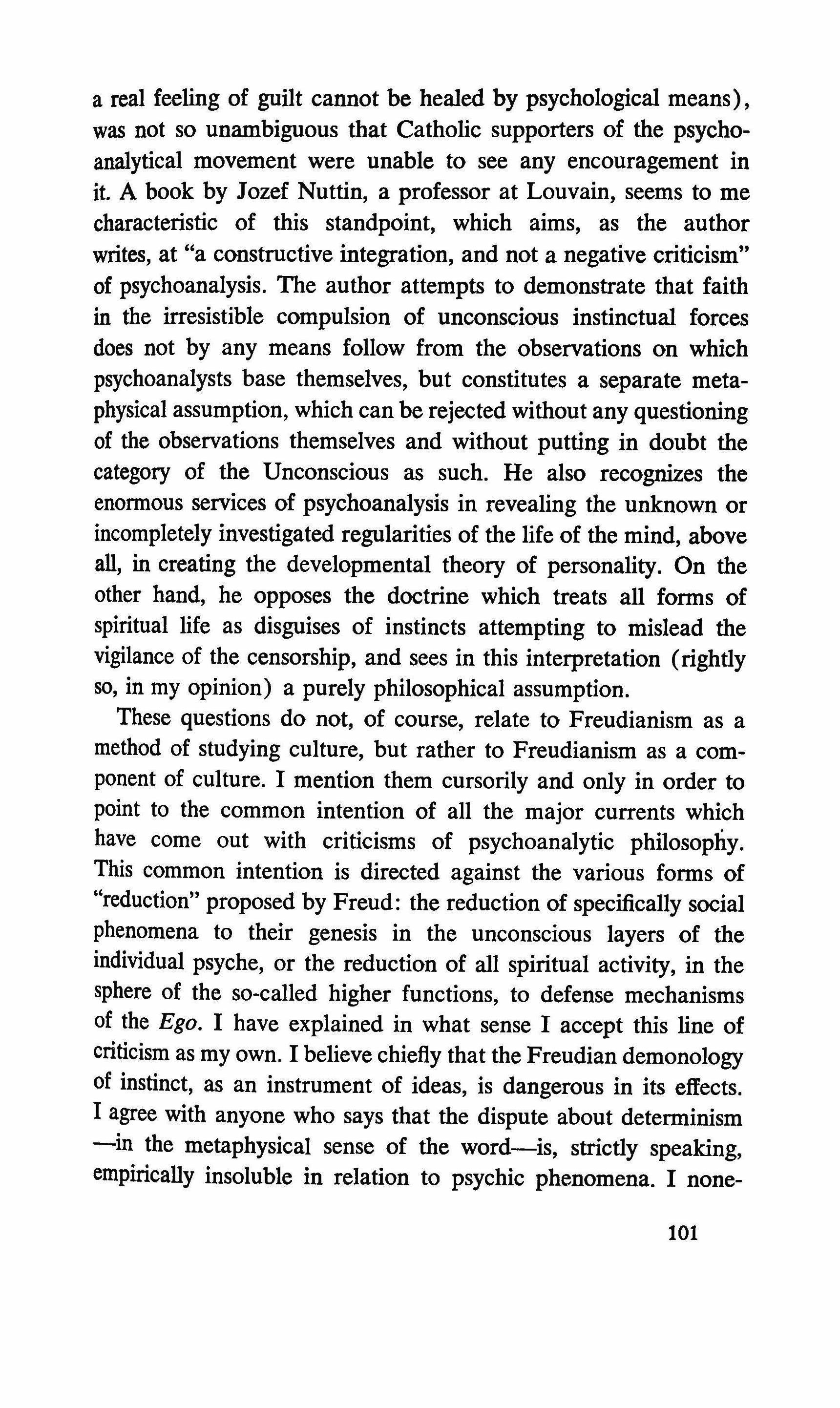
a real feeling of guilt cannot be healed by psychological means), was not so unambiguous that Catholic supporters of the psychoanalytical movement were unable to see any encouragement in it. A book by Jozef Nuttin, a professor at Louvain, seems to me characteristic of this standpoint, which aims, as the author writes, at "a constructive integration, and not a negative criticism" of psychoanalysis. The author attempts to demonstrate that faith in the irresistible compulsion of unconscious instinctual forces does not by any means follow from the observations on which psychoanalysts base themselves, but constitutes a separate metaphysical assumption, which can be rejected without any questioning of the observations themselves and without putting in doubt the category of the Unconscious as such. He also recognizes the enormous services of psychoanalysis in revealing the unknown or incompletely investigated regularities of the life of the mind, above all, in creating the developmental theory of personality. On the other hand, he opposes the doctrine which treats all forms of spiritual life as disguises of instincts attempting to mislead the vigilance of the censorship, and sees in this interpretation (rightly so, in my opinion) a purely philosophical assumption. These questions do not, of course, relate to Freudianism as a method of studying culture, but rather to Freudianism as a component of culture. I mention them cursorily and only in order to point to the common intention of all the major currents which have come out with criticisms of psychoanalytic philosophy. This common intention is directed against the various forms of "reduction" proposed by Freud: the reduction of specifically social phenomena to their genesis in the unconscious layers of the individual psyche, or the reduction of all spiritual activity, in the sphere of the so-called higher functions, to defense mechanisms of the Ego. I have explained in what sense I accept this line of criticism as my own. I believe chiefly that the Freudian demonology of instinct, as an instrument of ideas, is dangerous in its effects. I agree with anyone who says that the dispute about determinism -in the metaphysical sense of the word-is, strictly speaking, empirically insoluble in relation to psychic phenomena. I none-
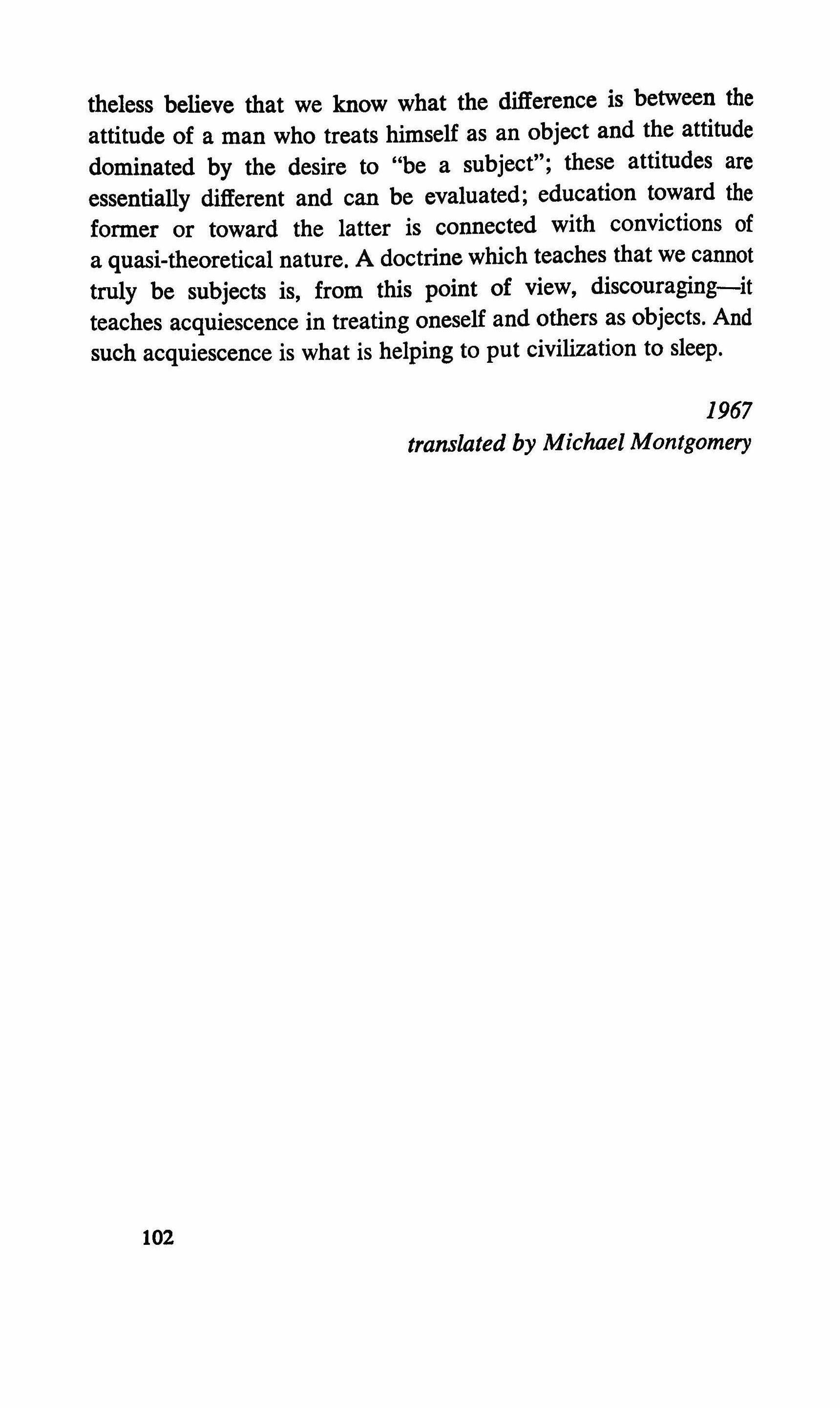
theless believe that we know what the difference is between the attitude of a man who treats himself as an object and the attitude dominated by the desire to "be a subject"; these attitudes are essentially different and can be evaluated; education toward the former or toward the latter is connected with convictions of a quasi-theoretical nature. A doctrine which teaches that we cannot truly be subjects is, from this point of view, discouraging-it teaches acquiescence in treating oneself and others as objects. And such acquiescence is what is helping to put civilization to sleep.
1967
translated by Michael Montgomery
1
It is customary in general hermeneutics to distinguish several situations to which the term 'understanding' is applied. To begin with, this word is used for any procedure in which, starting from a sign, we penetrate to the designated object-it being presupposed that the sign is not merely a symptom (as is the case in causal explanations in the sciences) but that it has been intentionally produced previously as a sign. Understanding refers to the sign, while the signified, without being confused with the intention of the author of the sign, is identified with the very object toward which the significant intention has been directed. It is in this manner that we understand language.
We also say that we "understand" something when we mean that we know the function of an element in a whole. This is therefore the understanding of functional localization. Needless to say, this manner of understanding refers not only to the knowledge of human behavior and its products but also to natural phenomena.
copyright©
1971 by Leszek Kolakowski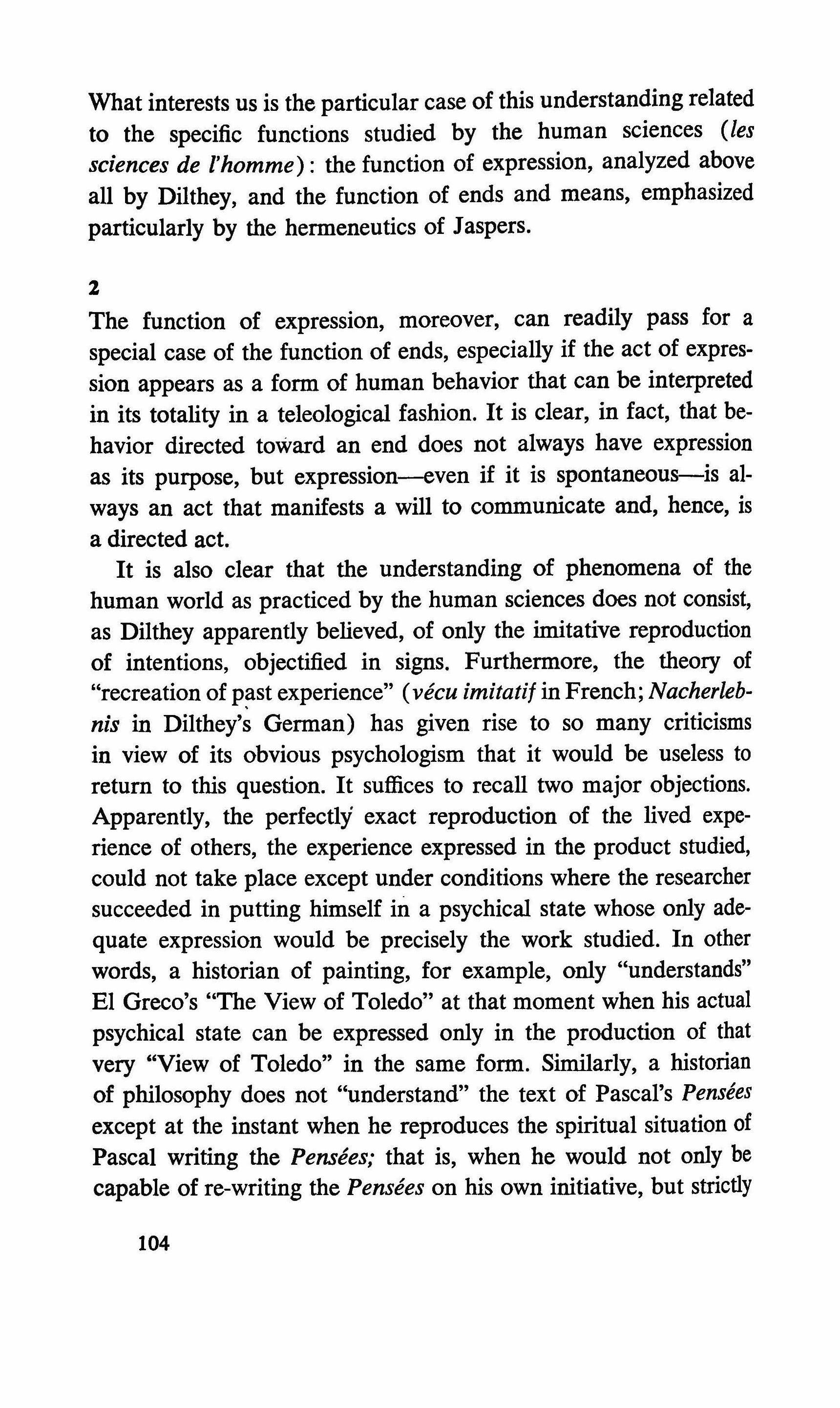
What interests us is the particular case of this understanding related to the specific functions studied by the human sciences (les sciences de l'homme): the function of expression, analyzed above all by Dilthey, and the function of ends and means, emphasized particularly by the hermeneutics of Jaspers.
2
The function of expression, moreover, can readily pass for a special case of the function of ends, especially if the act of expression appears as a form of human behavior that can be interpreted in its totality in a teleological fashion. It is clear, in fact, that behavior directed toward an end does not always have expression as its purpose, but expression-even if it is spontaneous--is always an act that manifests a will to communicate and, hence, is a directed act.
It is also clear that the understanding of phenomena of the human world as practiced by the human sciences does not consist, as Dilthey apparently believed, of only the imitative reproduction of intentions, objectified in signs. Furthermore, the theory of "recreation of p�st experience" (vecu imitatif in French; Nacherlebnis in Dilthey's German) has given rise to so many criticisms in view of its obvious psychologism that it would be useless to return to this question. It suffices to recall two major objections. Apparently, the perfectly exact reproduction of the lived experience of others, the experience expressed in the product studied, could not take place except under conditions where the researcher succeeded in putting himself in a psychical state whose only adequate expression would be precisely the work studied. In other words, a historian of painting, for example, only "understands" EI Greco's "The View of Toledo" at that moment when his actual psychical state can be expressed only in the production of that very "View of Toledo" in the same form. Similarly, a historian of philosophy does not "understand" the text of Pascal's Pensees except at the instant when he reproduces the spiritual situation of Pascal writing the Pensees; that is, when he would not only be capable of re-writing the Pensees on his own initiative, but strictly
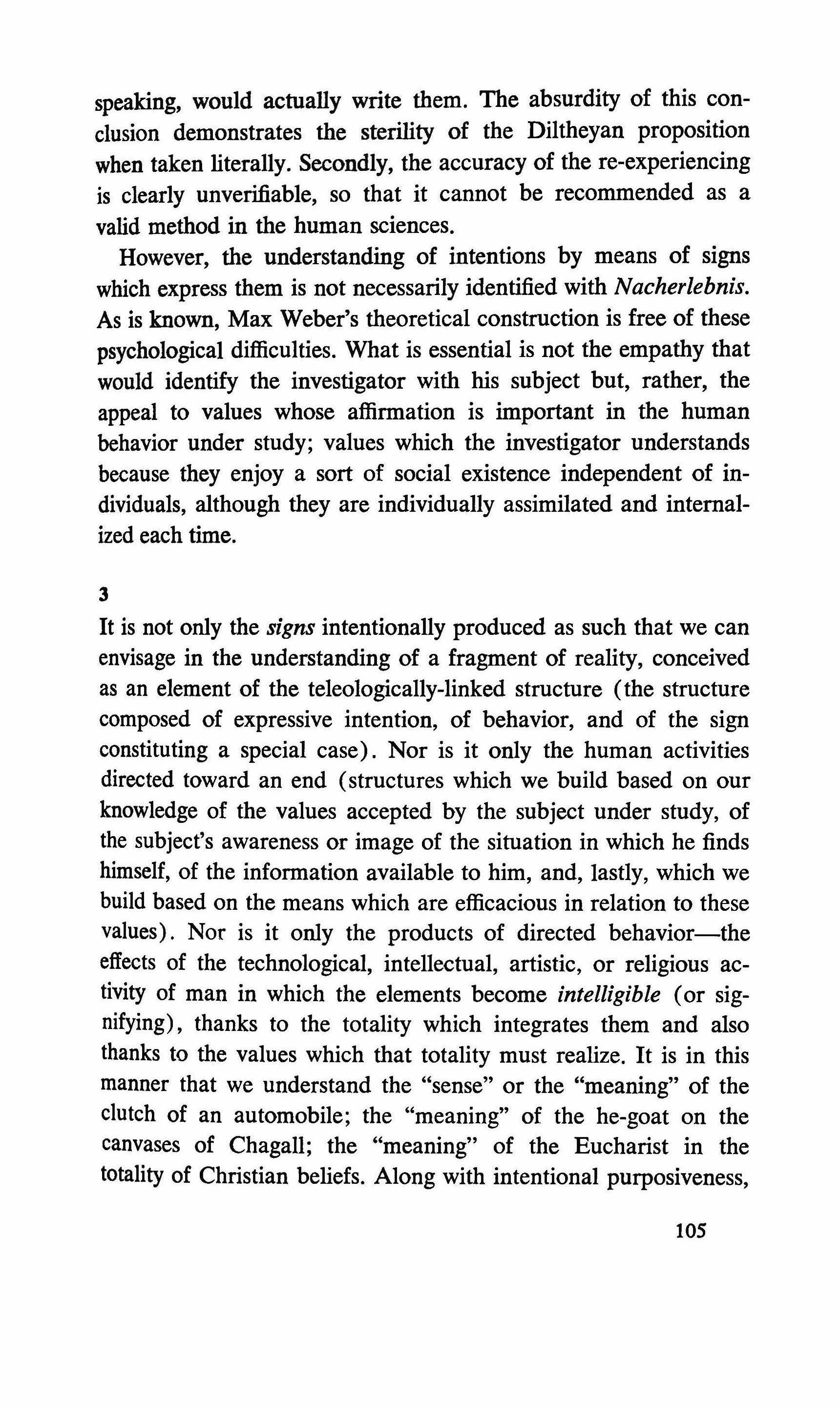
speaking, would actually write them. The absurdity of this conclusion demonstrates the sterility of the Diltheyan proposition when taken literally. Secondly, the accuracy of the re-experiencing is clearly unverifiable, so that it cannot be recommended as a valid method in the human sciences.
However, the understanding of intentions by means of signs which express them is not necessarily identified with Nacherlebnis. As is known, Max Weber's theoretical construction is free of these psychological difficulties. What is essential is not the empathy that would identify the investigator with his subject but, rather, the appeal to values whose affirmation is important in the human behavior under study; values which the investigator understands because they enjoy a sort of social existence independent of individuals, although they are individually assimilated and internalized each time.
3
It is not only the signs intentionally produced as such that we can envisage in the understanding of a fragment of reality, conceived as an element of the teleologically-linked structure (the structure composed of expressive intention, of behavior, and of the sign constituting a special case). Nor is it only the human activities directed toward an end (structures which we build based on our knowledge of the values accepted by the subject under study, of the subject's awareness or image of the situation in which he finds himself, of the information available to him, and, lastly, which we build based on the means which are efficacious in relation to these values). Nor is it only the products of directed behavior-the effects of the technological, intellectual, artistic, or religious activity of man in which the elements become intelligible (or signifying), thanks to the totality which integrates them and also thanks to the values which that totality must realize. It is in this manner that we understand the "sense" or the "meaning" of the clutch of an automobile; the "meaning" of the he-goat on the canvases of Chagall; the "meaning" of the Eucharist in the totality of Christian beliefs. Along with intentional purposiveness,
lOS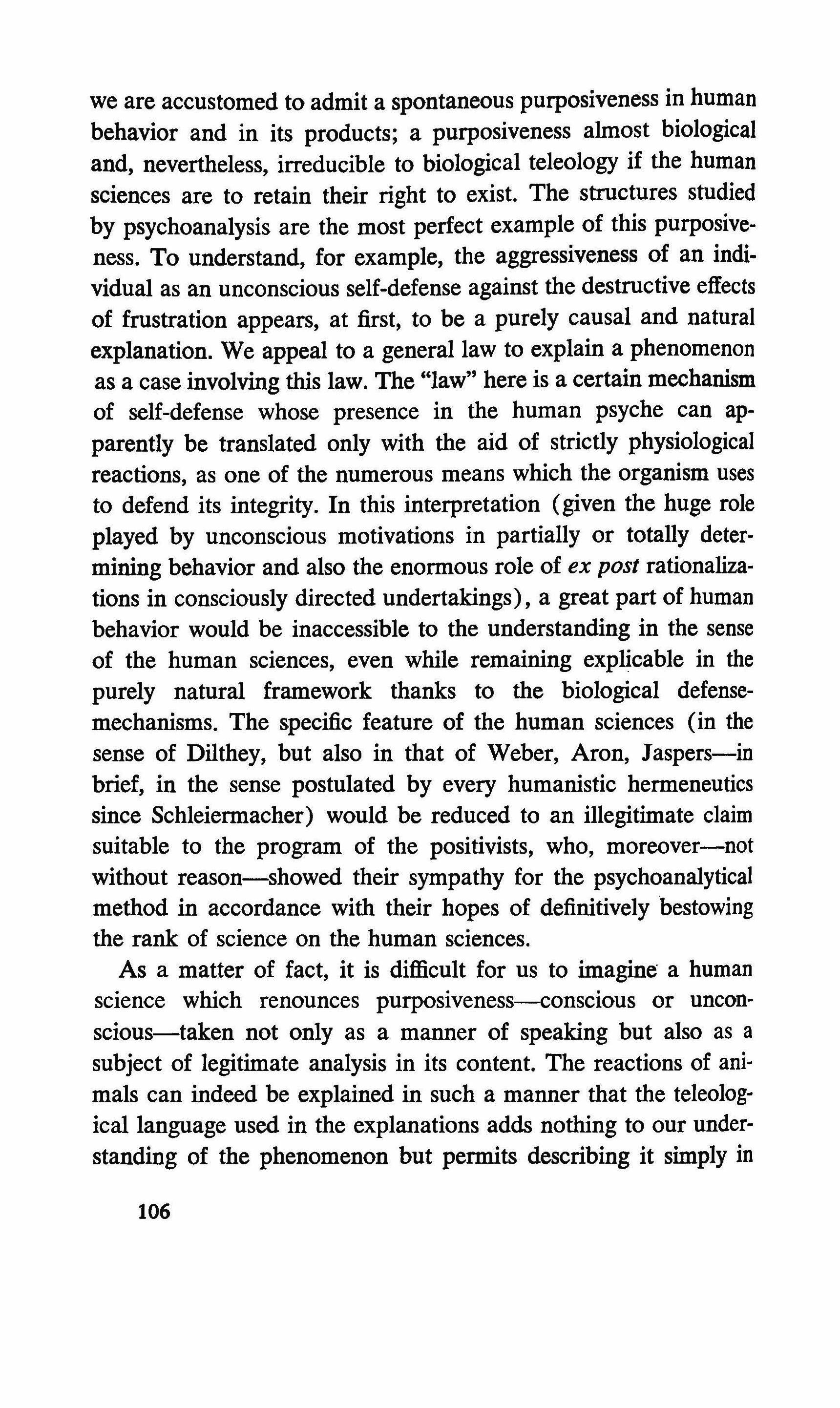
we are accustomed to admit a spontaneous purposiveness in human behavior and in its products; a purposiveness almost biological and, nevertheless, irreducible to biological teleology if the human sciences are to retain their right to exist. The structures studied by psychoanalysis are the most perfect example of this purposiveness. To understand, for example, the aggressiveness of an individual as an unconscious self-defense against the destructive effects of frustration appears, at first, to be a purely causal and natural explanation. We appeal to a general law to explain a phenomenon as a case involving this law. The "law" here is a certain mechanism of self-defense whose presence in the human psyche can apparently be translated only with the aid of strictly physiological reactions, as one of the numerous means which the organism uses to defend its integrity. In this interpretation (given the huge role played by unconscious motivations in partially or totally determining behavior and also the enormous role of ex post rationalizations in consciously directed undertakings), a great part of human behavior would be inaccessible to the understanding in the sense of the human sciences, even while remaining explicable in the purely natural framework thanks to the biological defensemechanisms. The specific feature of the human sciences (in the sense of Dilthey, but also in that of Weber, Aron, Jaspers-in brief, in the sense postulated by every humanistic hermeneutics since Schleiermacher) would be reduced to an illegitimate claim suitable to the program of the positivists, who, moreover-not without reason-showed their sympathy for the psychoanalytical method in accordance with their hopes of definitively bestowing the rank of science on the human sciences.
As a matter of fact, it is difficult for us to imagine a human science which renounces purposiveness-conscious or unconscious-taken not only as a manner of speaking but also as a subject of legitimate analysis in its content. The reactions of animals can indeed be explained in such a manner that the teleologicallanguage used in the explanations adds nothing to our understanding of the phenomenon but permits describing it simply in
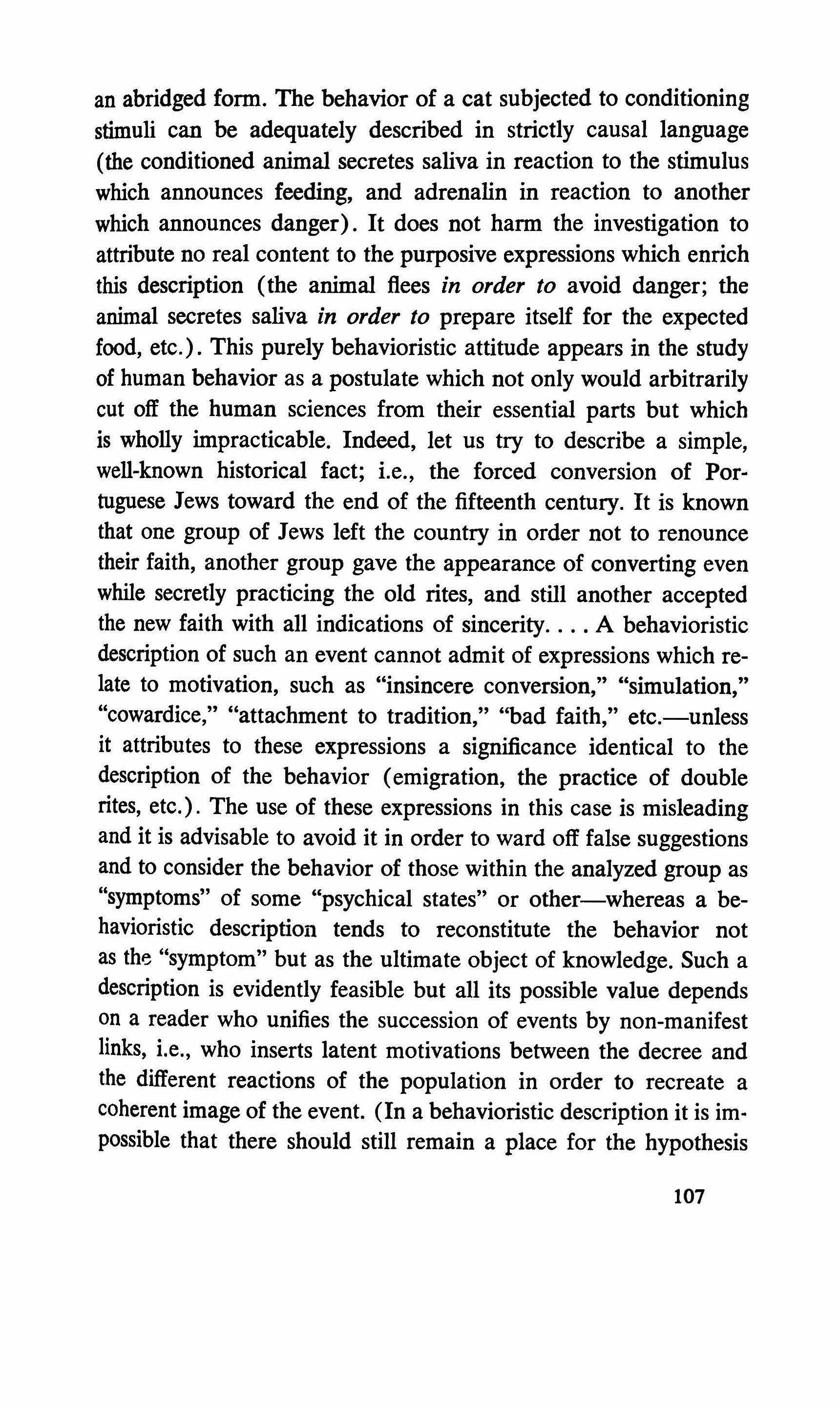
an abridged form. The behavior of a cat subjected to conditioning stimuli can be adequately described in strictly causal language (the conditioned animal secretes saliva in reaction to the stimulus which announces feeding, and adrenalin in reaction to another which announces danger). It does not harm the investigation to attribute no real content to the purposive expressions which enrich this description (the animal flees in order to avoid danger; the animal secretes saliva in order to prepare itself for the expected food, etc.). This purely behavioristic attitude appears in the study of human behavior as a postulate which not only would arbitrarily cut off the human sciences from their essential parts but which is wholly impracticable. Indeed, let us try to describe a simple, well-known historical fact; i.e., the forced conversion of Portuguese Jews toward the end of the fifteenth century. It is known that one group of Jews left the country in order not to renounce their faith, another group gave the appearance of converting even while secretly practicing the old rites, and still another accepted the new faith with all indications of sincerity A behavioristic description of such an event cannot admit of expressions which relate to motivation, such as "insincere conversion," "simulation," "cowardice," "attachment to tradition," "bad faith," etc.-unless it attributes to these expressions a significance identical to the description of the behavior (emigration, the practice of double rites, etc.). The use of these expressions in this case is misleading and it is advisable to avoid it in order to ward off false suggestions and to consider the behavior of those within the analyzed group as "symptoms" of some "psychical states" or other-whereas a behavioristic description tends to reconstitute the behavior not as the "symptom" but as the ultimate object of knowledge. Such a description is evidently feasible but all its possible value depends on a reader who unifies the succession of events by non-manifest links, i.e., who inserts latent motivations between the decree and the different reactions of the population in order to recreate a coherent image of the event. (In a behavioristic description it is impossible that there should still remain a place for the hypothesis
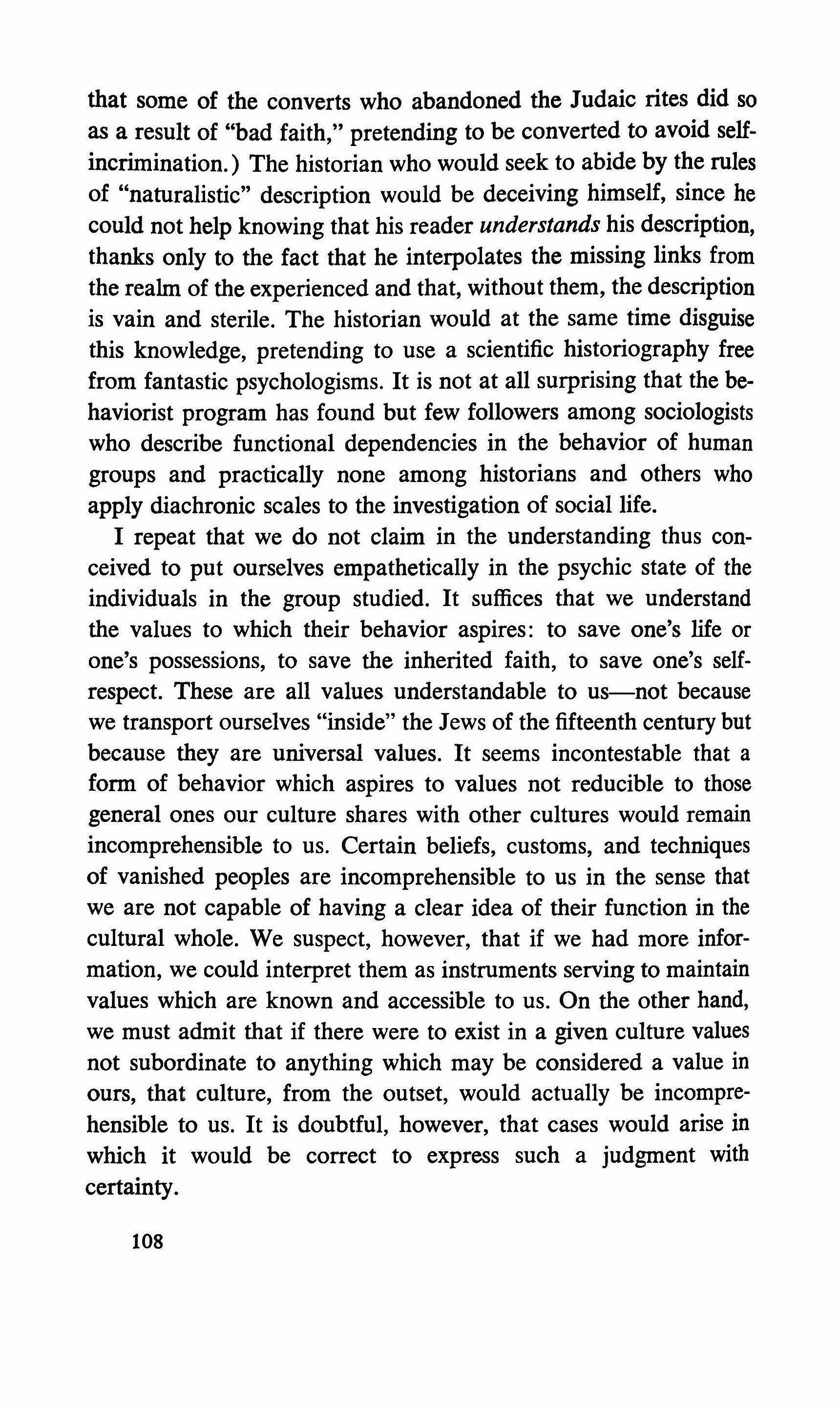
that some of the converts who abandoned the Judaic rites did so as a result of "bad faith," pretending to be converted to avoid selfincrimination.) The historian who would seek to abide by the rules of "naturalistic" description would be deceiving himself, since he could not help knowing that his reader understands his description, thanks only to the fact that he interpolates the missing links from the realm of the experienced and that, without them, the description is vain and sterile. The historian would at the same time disguise this knowledge, pretending to use a scientific historiography free from fantastic psychologisms. It is not at all surprising that the behaviorist program has found but few followers among sociologists who describe functional dependencies in the behavior of human groups and practically none among historians and others who apply diachronic scales to the investigation of social life.
I repeat that we do not claim in the understanding thus conceived to put ourselves empathetically in the psychic state of the individuals in the group studied. It suffices that we understand the values to which their behavior aspires: to save one's life or one's possessions, to save the inherited faith, to save one's selfrespect. These are all values understandable to us-not because we transport ourselves "inside" the Jews of the fifteenth century but because they are universal values. It seems incontestable that a form of behavior which aspires to values not reducible to those general ones our culture shares with other cultures would remain incomprehensible to us. Certain beliefs, customs, and techniques of vanished peoples are incomprehensible to us in the sense that we are not capable of having a clear idea of their function in the cultural whole. We suspect, however, that if we had more information, we could interpret them as instruments serving to maintain values which are known and accessible to us. On the other hand, we must admit that if there were to exist in a given culture values not subordinate to anything which may be considered a value in ours, that culture, from the outset, would actually be incomprehensible to us. It is doubtful, however, that cases would arise in which it would be correct to express such a judgment with certainty.
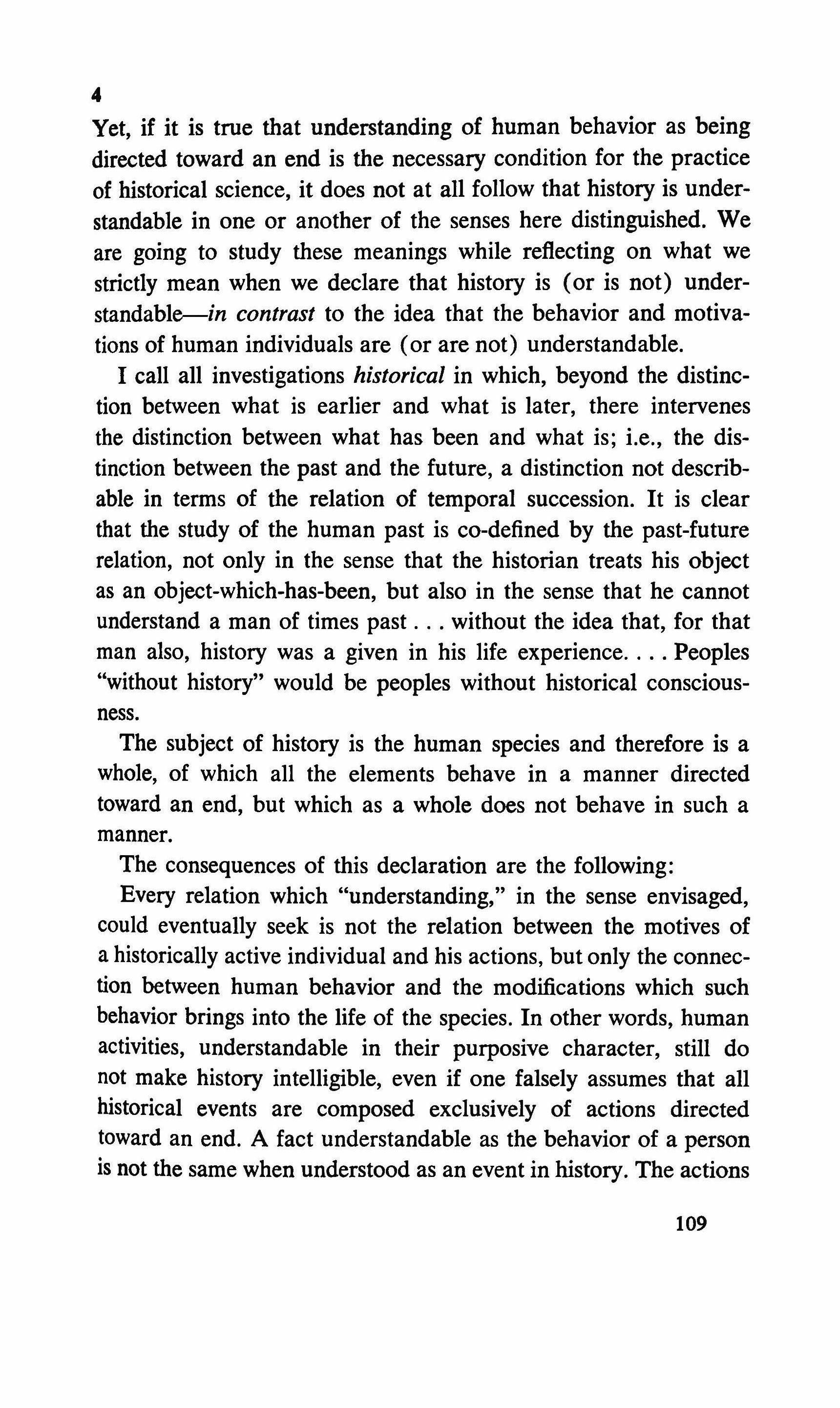
Yet, if it is true that understanding of human behavior as being directed toward an end is the necessary condition for the practice of historical science, it does not at all follow that history is understandable in one or another of the senses here distinguished. We are going to study these meanings while reflecting on what we strictly mean when we declare that history is (or is not) understandable-in contrast to the idea that the behavior and motivations of human individuals are (or are not) understandable.
I call all investigations historical in which, beyond the distinction between what is earlier and what is later, there intervenes the distinction between what has been and what is; i.e., the distinction between the past and the future, a distinction not describable in terms of the relation of temporal succession. It is clear that the study of the human past is co-defined by the past-future relation, not only in the sense that the historian treats his object as an object-which-has-been, but also in the sense that he cannot understand a man of times past without the idea that, for that man also, history was a given in his life experience Peoples "without history" would be peoples without historical consciousness.
The subject of history is the human species and therefore is a whole, of which all the elements behave in a manner directed toward an end, but which as a whole does not behave in such a manner.
The consequences of this declaration are the following:
Every relation which "understanding," in the sense envisaged, could eventually seek is not the relation between the motives of a historically active individual and his actions, but only the connection between human behavior and the modifications which such behavior brings into the life of the species. In other words, human activities, understandable in their purposive character, still do not make history intelligible, even if one falsely assumes that all historical events are composed exclusively of actions directed toward an end. A fact understandable as the behavior of a person is not the same when understood as an event in history. The actions
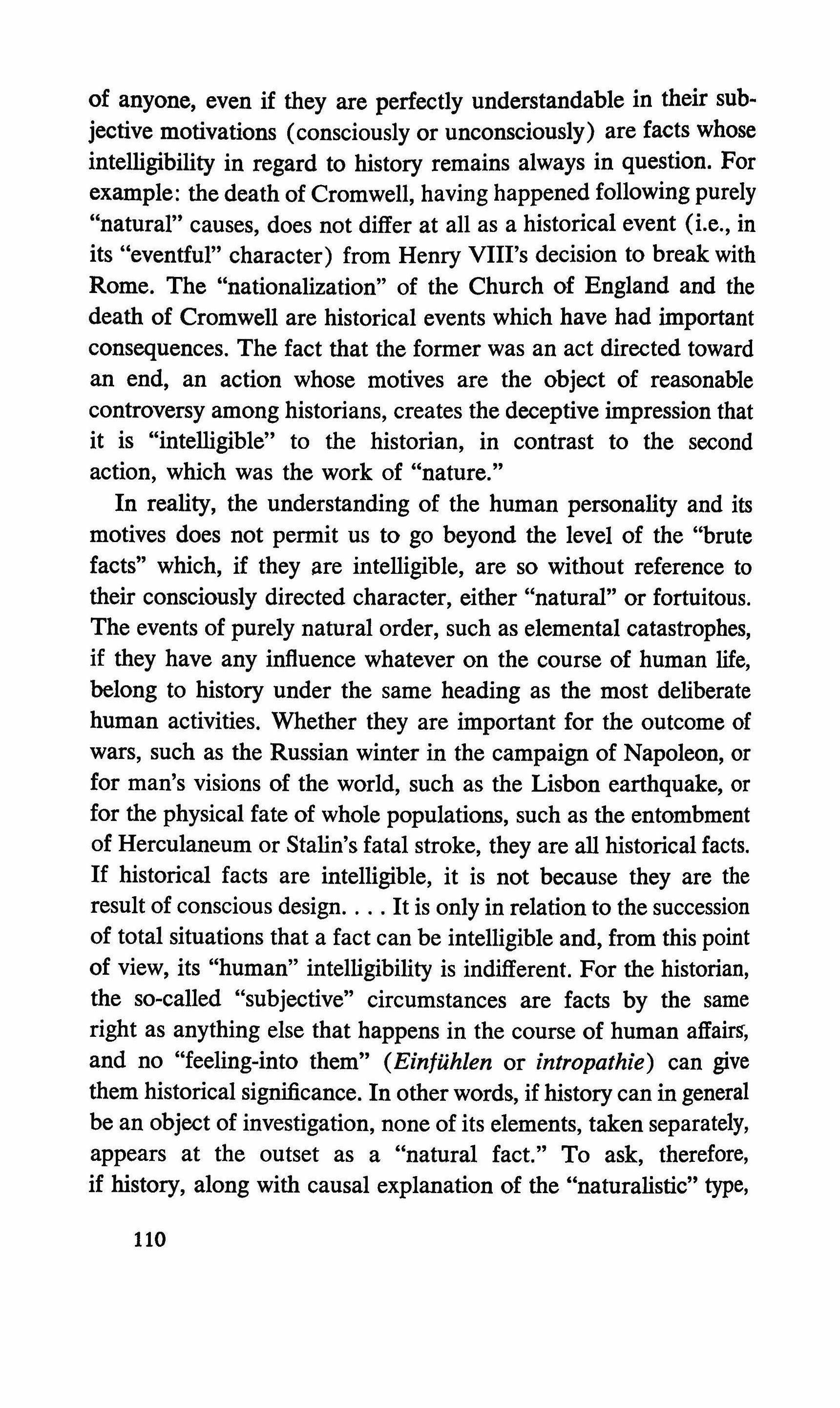
of anyone, even if they are perfectly understandable in their subjective motivations (consciously or unconsciously) are facts whose intelligibility in regard to history remains always in question. For example: the death of Cromwell, having happened following purely "natural" causes, does not differ at all as a historical event (i.e., in its "eventful" character) from Henry VIII's decision to break with Rome. The "nationalization" of the Church of England and the death of Cromwell are historical events which have had important consequences. The fact that the former was an act directed toward an end, an action whose motives are the object of reasonable controversy among historians, creates the deceptive impression that it is "intelligible" to the historian, in contrast to the second action, which was the work of "nature."
In reality, the understanding of the human personality and its motives does not permit us to go beyond the level of the "brute facts" which, if they are intelligible, are so without reference to their consciously directed character, either "natural" or fortuitous. The events of purely natural order, such as elemental catastrophes, if they have any influence whatever on the course of human life, belong to history under the same heading as the most deliberate human activities. Whether they are important for the outcome of wars, such as the Russian winter in the campaign of Napoleon, or for man's visions of the world, such as the Lisbon earthquake, or for the physical fate of whole populations, such as the entombment of Herculaneum or Stalin's fatal stroke, they are all historical facts. If historical facts are intelligible, it is not because they are the result of conscious design It is only in relation to the succession of total situations that a fact can be intelligible and, from this point of view, its "human" intelligibility is indifferent. For the historian, the so-called "subjective" circumstances are facts by the same right as anything else that happens in the course of human affairs, and no "feeling-into them" (Einiilhlen or intropathie) can give them historical significance. In other words, if history can in general be an object of investigation, none of its elements, taken separately, appears at the outset as a "natural fact." To ask, therefore, if history, along with causal explanation of the "naturalistic" type,
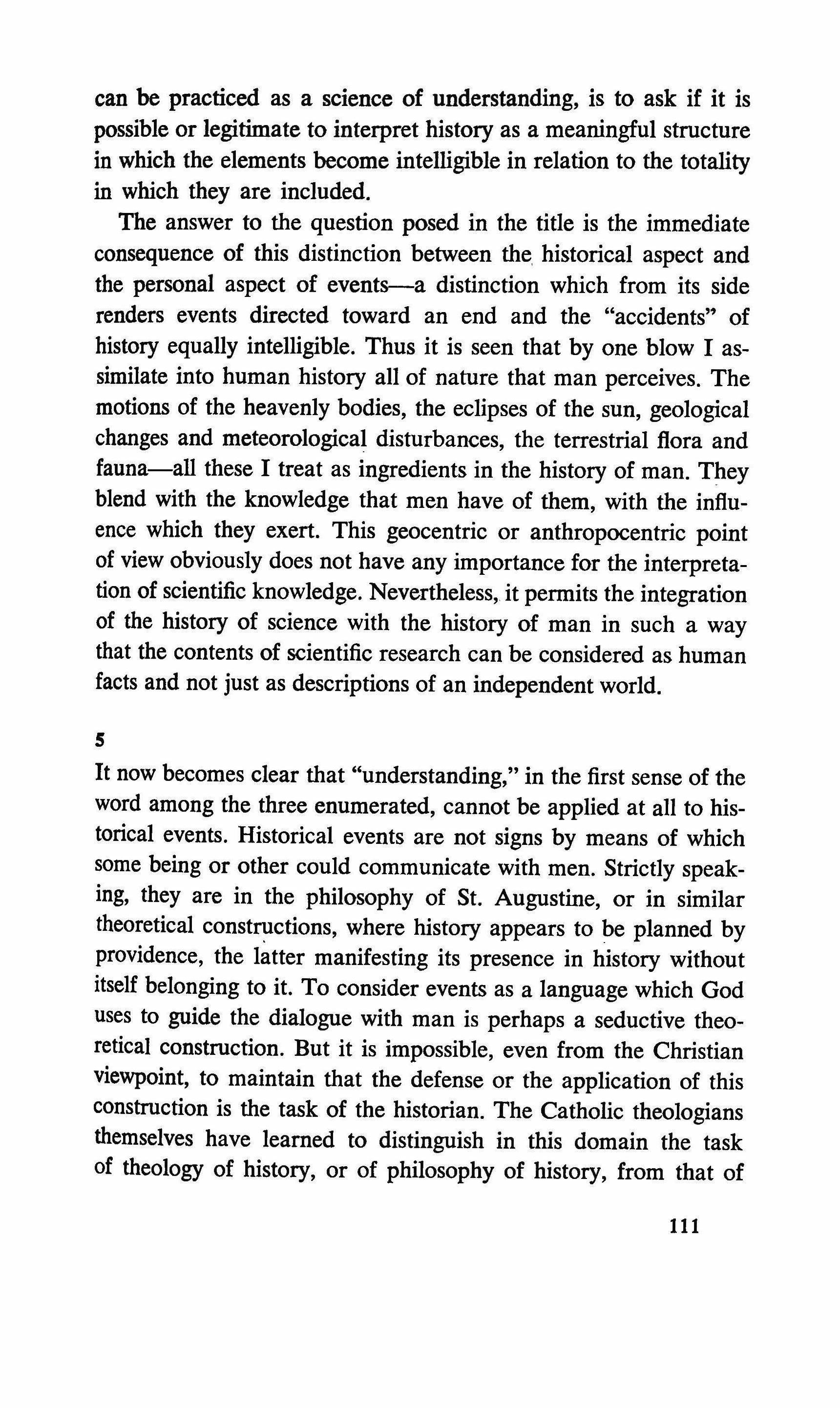
can be practiced as a science of understanding, is to ask if it is possible or legitimate to interpret history as a meaningful structure in which the elements become intelligible in relation to the totality in which they are included.
The answer to the question posed in the title is the immediate consequence of this distinction between the. historical aspect and the personal aspect of events-a distinction which from its side renders events directed toward an end and the "accidents" of history equally intelligible. Thus it is seen that by one blow I assimilate into human history all of nature that man perceives. The motions of the heavenly bodies, the eclipses of the sun, geological changes and meteorological disturbances, the terrestrial flora and fauna-all these I treat as ingredients in the history of man. They blend with the knowledge that men have of them, with the influence which they exert. This geocentric or anthropocentric point of view obviously does not have any importance for the interpretation of scientific knowledge. Nevertheless, it permits the integration of the history of science with the history of man in such a way that the contents of scientific research can be considered as human facts and not just as descriptions of an independent world.
5
It now becomes clear that "understanding," in the first sense of the word among the three enumerated, cannot be applied at all to historical events. Historical events are not signs by means of which some being or other could communicate with men. Strictly speaking, they are in the philosophy of St. Augustine, or in similar theoretical constructions, where history appears to be planned by providence, the latter manifesting its presence in history without itself belonging to it. To consider events as a language which God uses to guide the dialogue with man is perhaps a seductive theoretical construction. But it is impossible, even from the Christian viewpoint, to maintain that the defense or the application of this construction is the task of the historian. The Catholic theologians themselves have learned to distinguish in this domain the task of theology of history, or of philosophy of history, from that of 111
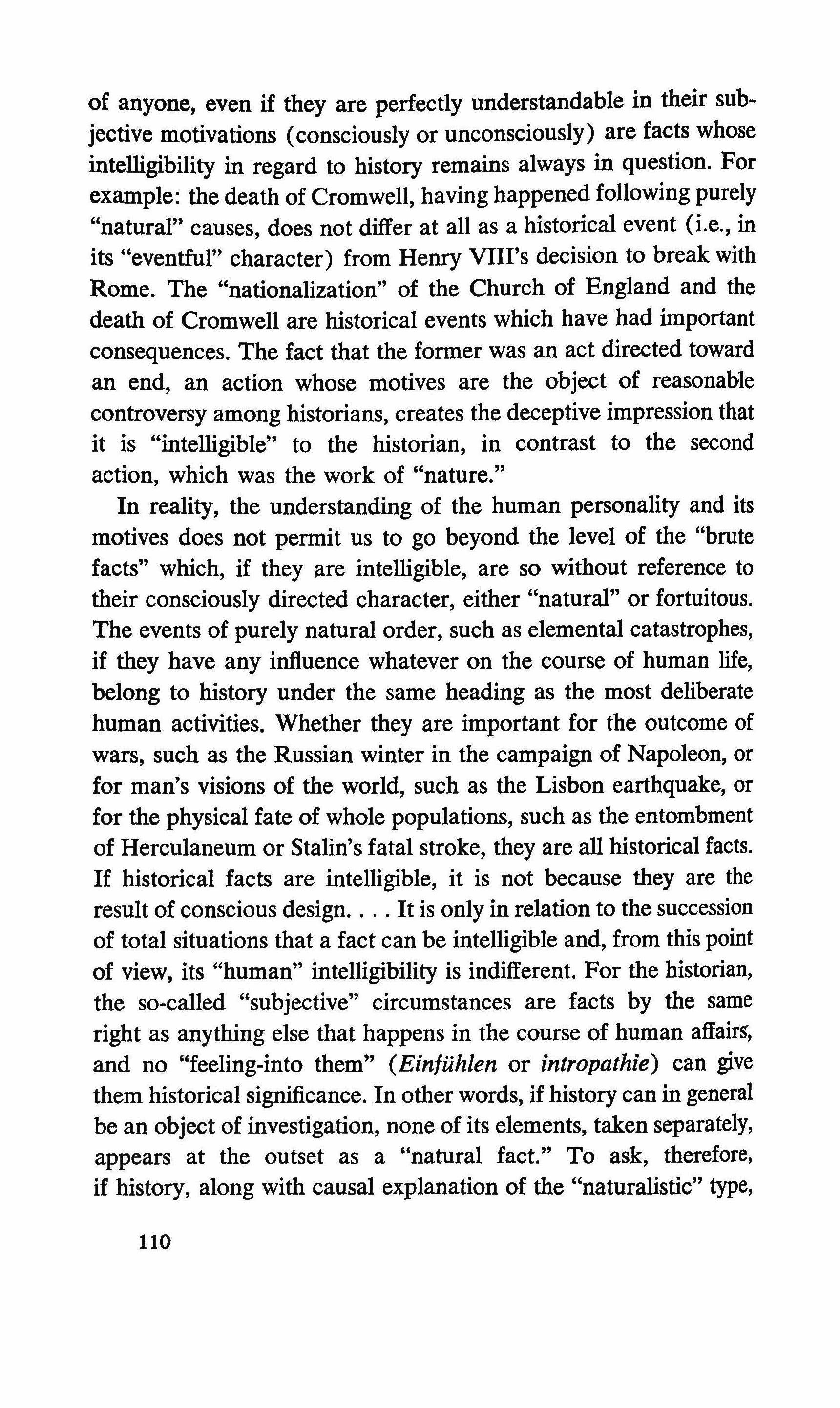
of anyone, even if they are perfectly understandable in their subjective motivations (consciously or unconsciously) are facts whose intelligibility in regard to history remains always in question. For example: the death of Cromwell, having happened following purely "natural" causes, does not differ at all as a historical event (i.e., in its "eventful" character) from Henry VIII's decision to break with Rome. The "nationalization" of the Church of England and the death of Cromwell are historical events which have had important consequences. The fact that the former was an act directed toward an end, an action whose motives are the object of reasonable controversy among historians, creates the deceptive impression that it is "intelligible" to the historian, in contrast to the second action, which was the work of "nature."
In reality, the understanding of the human personality and its motives does not permit us to go beyond the level of the "brute facts" which, if they are intelligible, are so without reference to their consciously directed character, either "natural" or fortuitous. The events of purely natural order, such as elemental catastrophes, if they have any influence whatever on the course of human life, belong to history under the same heading as the most deliberate human activities. Whether they are important for the outcome of wars, such as the Russian winter in the campaign of Napoleon, or for man's visions of the world, such as the Lisbon earthquake, or for the physical fate of whole populations, such as the entombment of Herculaneum or Stalin's fatal stroke, they are all historical facts. If historical facts are intelligible, it is not because they are the result of conscious design. It is only in relation to the succession of total situations that a fact can be intelligible and, from this point of view, its "human" intelligibility is indifferent. For the historian, the so-called "subjective" circumstances are facts by the same right as anything else that happens in the course of human affairs; and no "feeling-into them" (Einiiihlen or intropathie) can give them historical significance. In other words, if history can in general be an object of investigation, none of its elements, taken separately, appears at the outset as a "natural fact." To ask, therefore, if history, along with causal explanation of the "naturalistic" type,

can be practiced as a science of understanding, is to ask if it is possible or legitimate to interpret history as a meaningful structure in which the elements become intelligible in relation to the totality in which they are included.
The answer to the question posed in the title is the immediate consequence of this distinction between the. historical aspect and the personal aspect of events-a distinction which from its side renders events directed toward an end and the "accidents" of history equally intelligible. Thus it is seen that by one blow I assimilate into human history all of nature that man perceives. The motions of the heavenly bodies, the eclipses of the sun, geological changes and meteorological disturbances, the terrestrial flora and fauna-all these I treat as ingredients in the history of man. They blend with the knowledge that men have of them, with the influence which they exert. This geocentric or anthropocentric point of view obviously does not have any importance for the interpretation of scientific knowledge. Nevertheless, it permits the integration of the history of science with the history of man in such a way that the contents of scientific research can be considered as human facts and not just as descriptions of an independent world.
5
It now becomes clear that "understanding," in the first sense of the word among the three enumerated, cannot be applied at all to historical events. Historical events are not signs by means of which some being or other could communicate with men. Strictly speaking, they are in the philosophy of St. Augustine, or in similar theoretical constructions, where history appears to be planned by providence, the latter manifesting its presence in history without itself belonging to it. To consider events as a language which God uses to guide the dialogue with man is perhaps a seductive theoretical construction. But it is impossible, even from the Christian viewpoint, to maintain that the defense or the application of this construction is the task of the historian. The Catholic theologians themselves have learned to distinguish in this domain the task of theology of history, or of philosophy of history, from that of 111
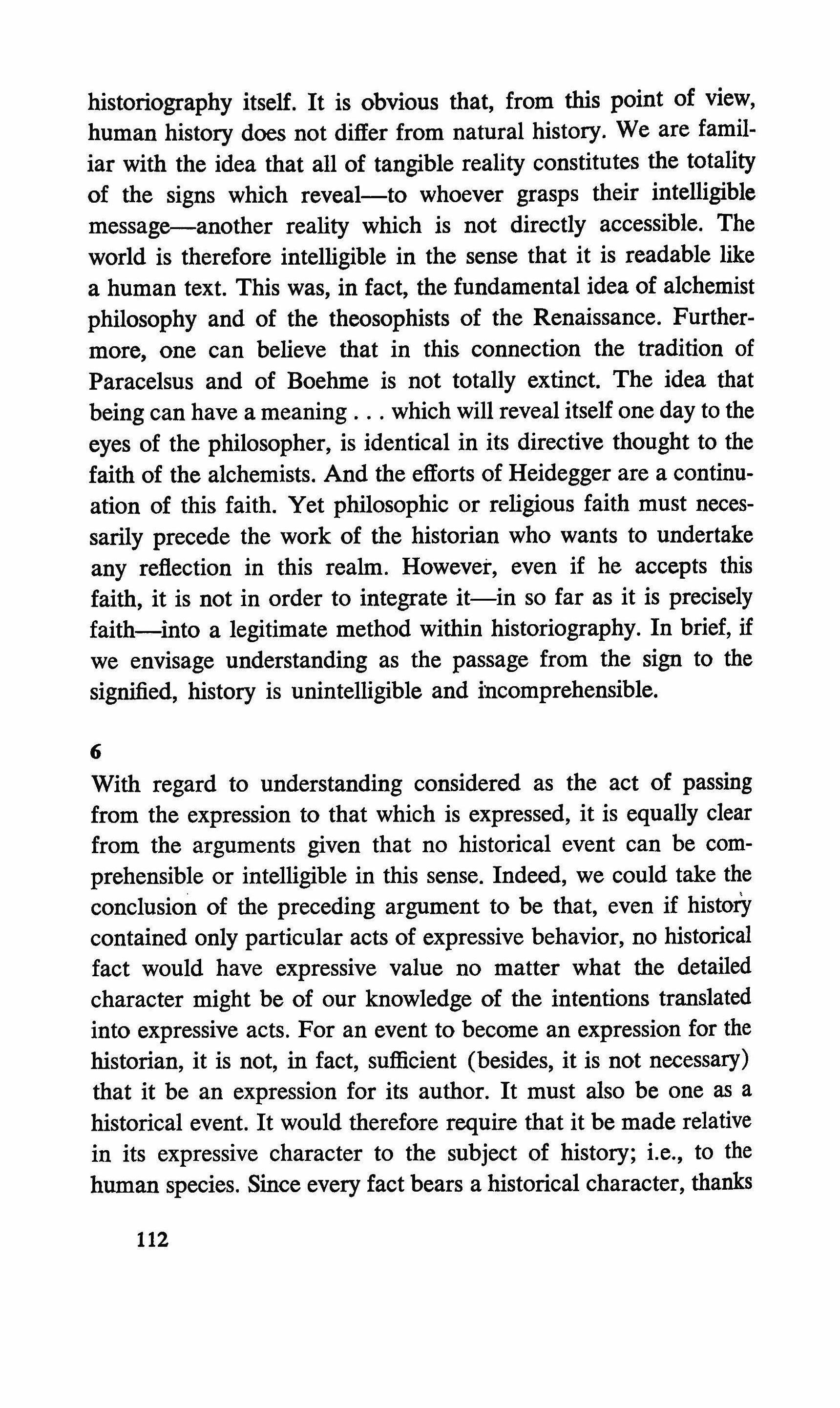
historiography itself. It is obvious that, from this point of view, human history does not differ from natural history. We are familiar with the idea that all of tangible reality constitutes the totality of the signs which reveal-to whoever grasps their intelligible message-another reality which is not directly accessible. The world is therefore intelligible in the sense that it is readable like a human text. This was, in fact, the fundamental idea of alchemist philosophy and of the theosophists of the Renaissance. Furthermore, one can believe that in this connection the tradition of Paracelsus and of Boehme is not totally extinct. The idea that being can have a meaning which will reveal itself one day to the eyes of the philosopher, is identical in its directive thought to the faith of the alchemists. And the efforts of Heidegger are a continuation of this faith. Yet philosophic or religious faith must necessarily precede the work of the historian who wants to undertake any reflection in this realm. However, even if he accepts this faith, it is not in order to integrate it-in so far as it is precisely faith-into a legitimate method within historiography. In brief, if we envisage understanding as the passage from the sign to the signified, history is unintelligible and incomprehensible.
6
With regard to understanding considered as the act of passing from the expression to that which is expressed, it is equally clear from the arguments given that no historical event can be comprehensible or intelligible in this sense. Indeed, we could take the conclusion of the preceding argument to be that, even if history contained only particular acts of expressive behavior, no historical fact would have expressive value no matter what the detailed character might be of our knowledge of the intentions translated into expressive acts. For an event to become an expression for the historian, it is not, in fact, sufficient (besides, it is not necessary) that it be an expression for its author. It must also be one as a historical event. It would therefore require that it be made relative in its expressive character to the subject of history; i.e., to the human species. Since every fact bears a historical character, thanks
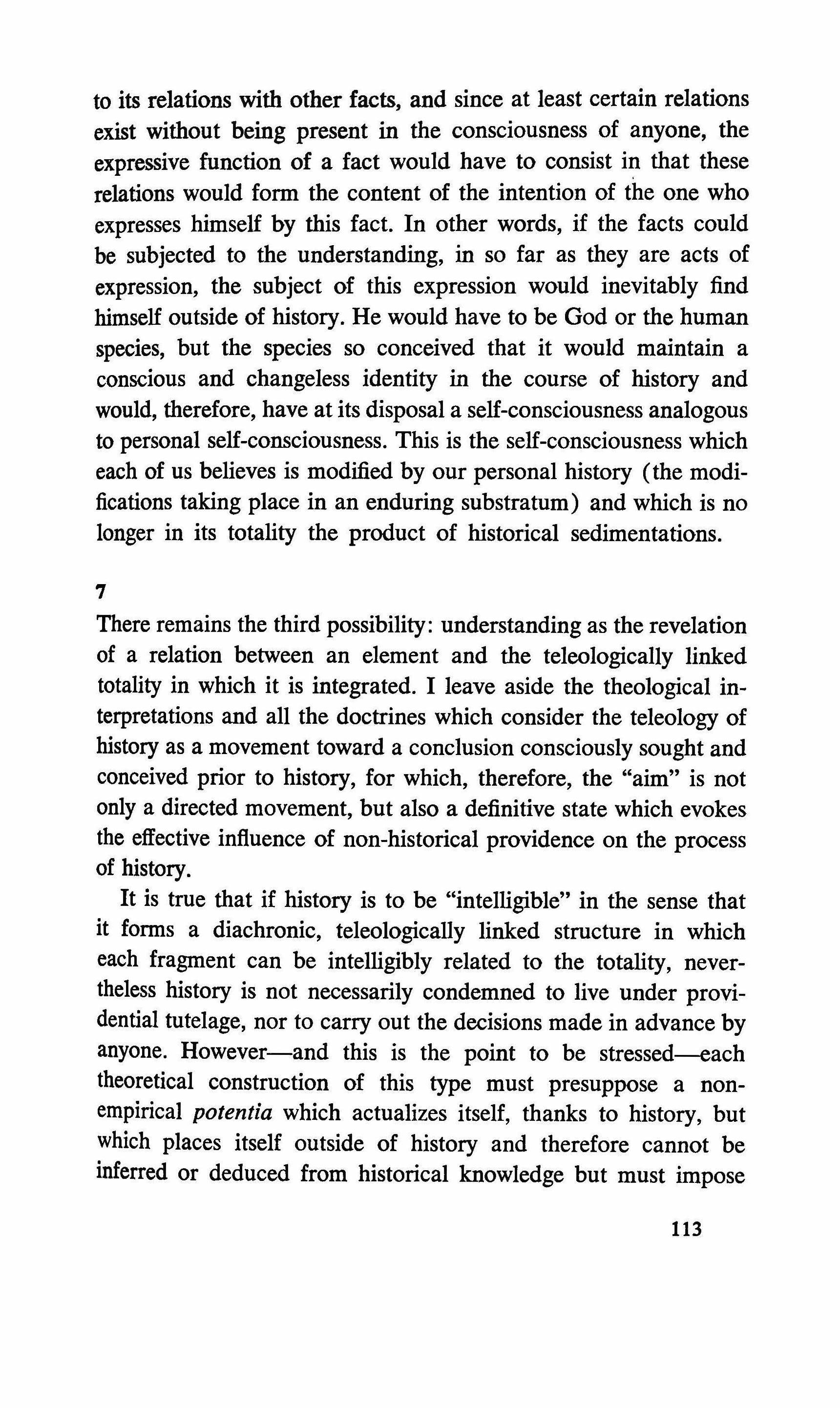
to its relations with other facts, and since at least certain relations exist without being present in the consciousness of anyone, the expressive function of a fact would have to consist in that these relations would form the content of the intention of the one who expresses himself by this fact. In other words, if the facts could be subjected to the understanding, in so far as they are acts of expression, the subject of this expression would inevitably find himself outside of history. He would have to be God or the human species, but the species so conceived that it would maintain a conscious and changeless identity in the course of history and would, therefore, have at its disposal a self-consciousness analogous to personal self-consciousness. This is the self-consciousness which each of us believes is modified by our personal history (the modifications taking place in an enduring substratum) and which is no longer in its totality the product of historical sedimentations.
7
There remains the third possibility: understanding as the revelation of a relation between an element and the teleologically linked totality in which it is integrated. I leave aside the theological interpretations and all the doctrines which consider the teleology of history as a movement toward a conclusion consciously sought and conceived prior to history, for which, therefore, the "aim" is not only a directed movement, but also a definitive state which evokes the effective influence of non-historical providence on the process of history.
It is true that if history is to be "intelligible" in the sense that it forms a diachronic, teleologically linked structure in which each fragment can be intelligibly related to the totality, nevertheless history is not necessarily condemned to live under providential tutelage, nor to carry out the decisions made in advance by anyone. However-and this is the point to be stressed-each theoretical construction of this type must presuppose a nonempirical potentia which actualizes itself, thanks to history, but which places itself outside of history and therefore cannot be inferred or deduced from historical knowledge but must impose
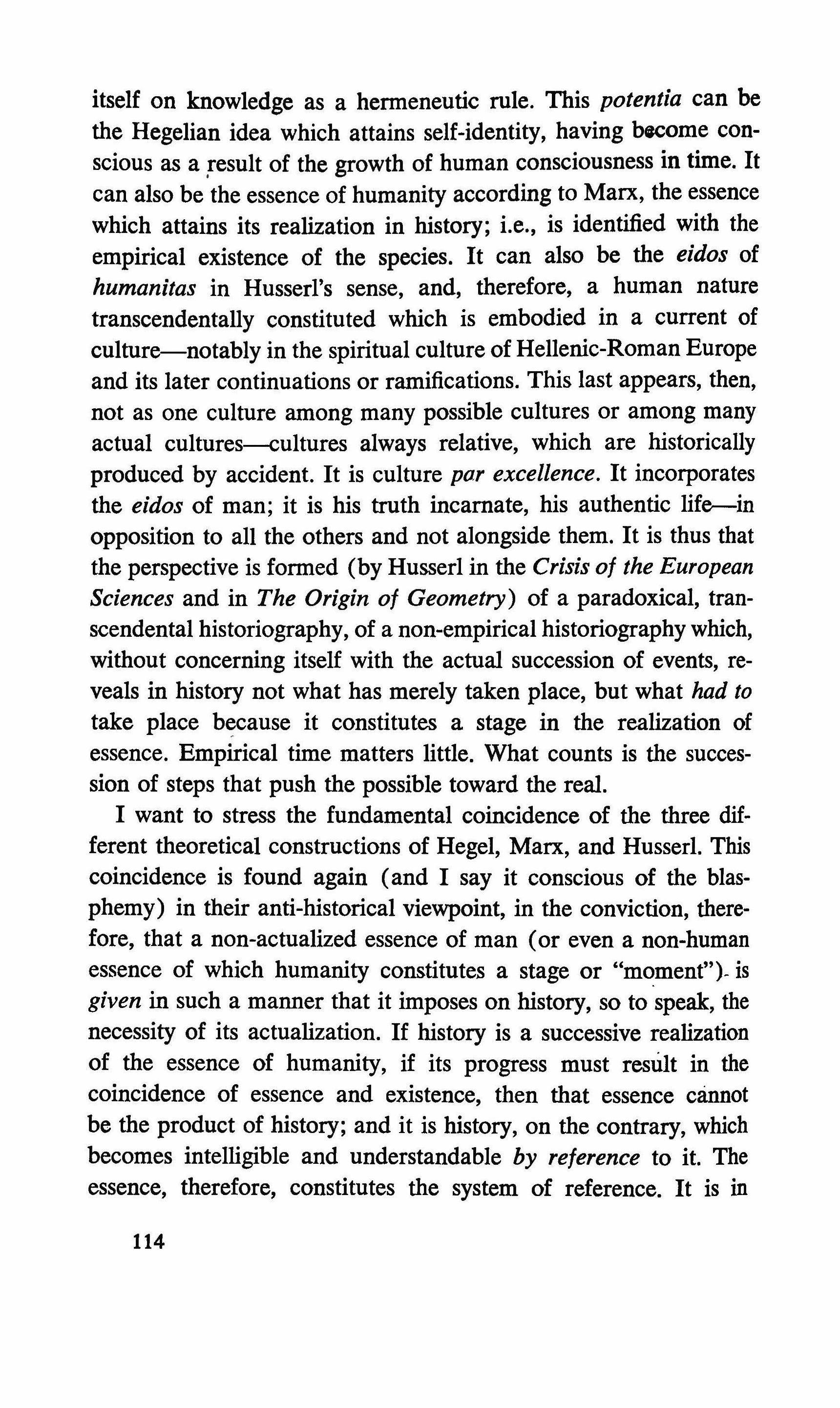
itself on knowledge as a hermeneutic rule. This potentia can be the Hegelian idea which attains self-identity, having become conscious as a result of the growth of human consciousness in time. It can also be the essence of humanity according to Marx, the essence which attains its realization in history; i.e., is identified with the empirical existence of the species. It can also be the eidos of humanitas in HusserI's sense, and, therefore, a human nature transcendentally constituted which is embodied in a current of culture-notably in the spiritual culture of Hellenic-Roman Europe and its later continuations or ramifications. This last appears, then, not as one culture among many possible cultures or among many actual cultures--cultures always relative, which are historically produced by accident. It is culture par excellence. It incorporates the eidos of man; it is his truth incarnate, his authentic life-in opposition to all the others and not alongside them. It is thus that the perspective is formed (by HusserI in the Crisis of the European Sciences and in The Origin of Geometry) of a paradoxical, transcendental historiography, of a non-empirical historiography which, without concerning itself with the actual succession of events, reveals in history not what has merely taken place, but what had to take place because it constitutes a stage in the realization of essence. Empirical time matters little. What counts is the succession of steps that push the possible toward the real.
I want to stress the fundamental coincidence of the three different theoretical constructions of Hegel, Marx, and HusserI. This coincidence is found again (and I say it conscious of the blasphemy) in their anti-historical viewpoint, in the conviction, therefore, that a non-actualized essence of man (or even a non-human essence of which humanity constitutes a stage or "moment"). is given in such a manner that it imposes on history, so to speak, the necessity of its actualization. If history is a successive realization of the essence of humanity, if its progress must result in the coincidence of essence and existence, then that essence cannot be the product of history; and it is history, on the contrary, which becomes intelligible and understandable by reference to it. The essence, therefore, constitutes the system of reference. It is in
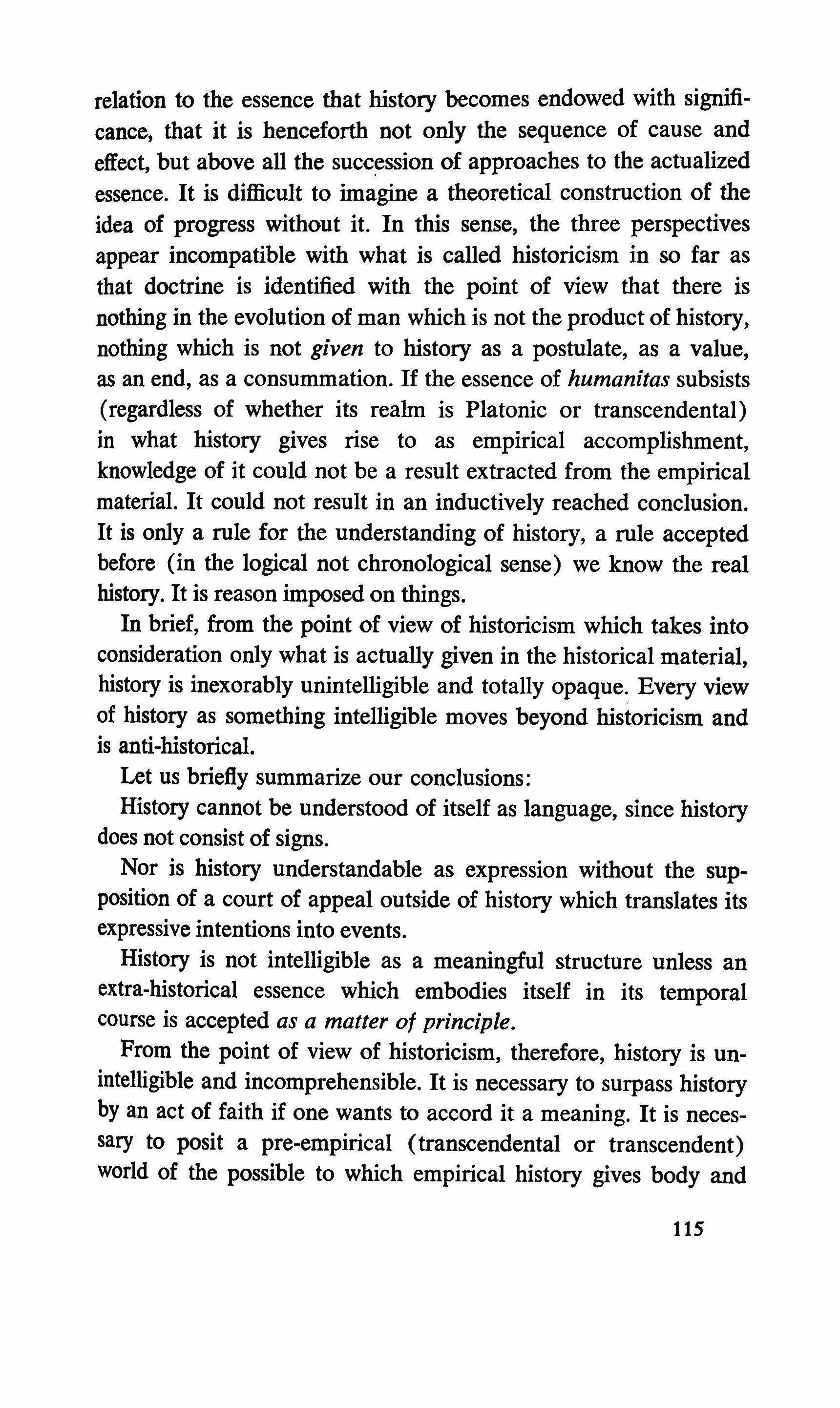
relation to the essence that history becomes endowed with significance, that it is henceforth not only the sequence of cause and effect, but above all the succession of approaches to the actualized essence. It is difficult to imagine a theoretical construction of the idea of progress without it. In this sense, the three perspectives appear incompatible with what is called historicism in so far as that doctrine is identified with the point of view that there is nothing in the evolution of man which is not the product of history, nothing which is not given to history as a postulate, as a value, as an end, as a consummation. If the essence of humanitas subsists (regardless of whether its realm is Platonic or transcendental) in what history gives rise to as empirical accomplishment, knowledge of it could not be a result extracted from the empirical material. It could not result in an inductively reached conclusion. It is only a rule for the understanding of history, a rule accepted before (in the logical not chronological sense) we know the real history. It is reason imposed on things.
In brief, from the point of view of historicism which takes into consideration only what is actually given in the historical material, history is inexorably unintelligible and totally opaque. Every view of history as something intelligible moves beyond historicism and is anti-historical.
Let us briefly summarize our conclusions:
History cannot be understood of itself as language, since history does not consist of signs.
Nor is history understandable as expression without the supposition of a court of appeal outside of history which translates its expressive intentions into events.
History is not intelligible as a meaningful structure unless an extra-historical essence which embodies itself in its temporal course is accepted as a matter of principle.
From the point of view of historicism, therefore, history is unintelligible and incomprehensible. It is necessary to surpass history by an act of faith if one wants to accord it a meaning. It is necessary to posit a pre-empirical (transcendental or transcendent) world of the possible to which empirical history gives body and 115

which it transforms into reality. It is necessary, in short, to admit the distinction between the possible and the actual in the Leibnizian sense. History is deprived of significance, and without that it is a natural process similar to the evolution of stellar systems and equally incapable of being understood.
8
However, if history does not permit us to extract from it any immanent intelligibility except by virtue of a previous act of faith which endows it with meaning, a question arises: Can the act of faith be justified? This question goes beyond the present theme and I do not intend to enter into it here. It is only necessary to emphasize that this act of faith is certainly indispensable to man and that the most powerful actualizations of history presupposed this act of faith as their spiritual condition. This faith is therefore creative and fertile, although one should not be under the illusion that it can cease to be a faith-in particular, that it becomes other than a faith once the conclusion is drawn from the historical material where it awaits its discoverer. Since the Enlightenment, philosophers have elevated their faith almost to a science. It is time to place the alleged science at the level of faith. I do not say "degrade." I do not say "elevate." I say: place at the level of faith.
This faith is always charged with a practical significance. It is a projection which gives the past its meaning. It is in relation to our intention that our historical heritage, which represents just so many preparatory acts for this intention, is organized. Hegel, Marx, and Husserl were perfectly aware that, at the moment when they wrote about history, they were not truly writing about history. They were writing the autobiography of spirit. In writing, they continued that about which they were writing. Their project, so to speak, inscribed itself directly in history, giving it intelligibility. This conclusion does not imply any discouragement or skepticism. It tries, on the contrary, to grasp an "either-or" which appears inevitable: either we admit the authentically historicist perspective and by this fact condemn history to eternal opacity and unintel-
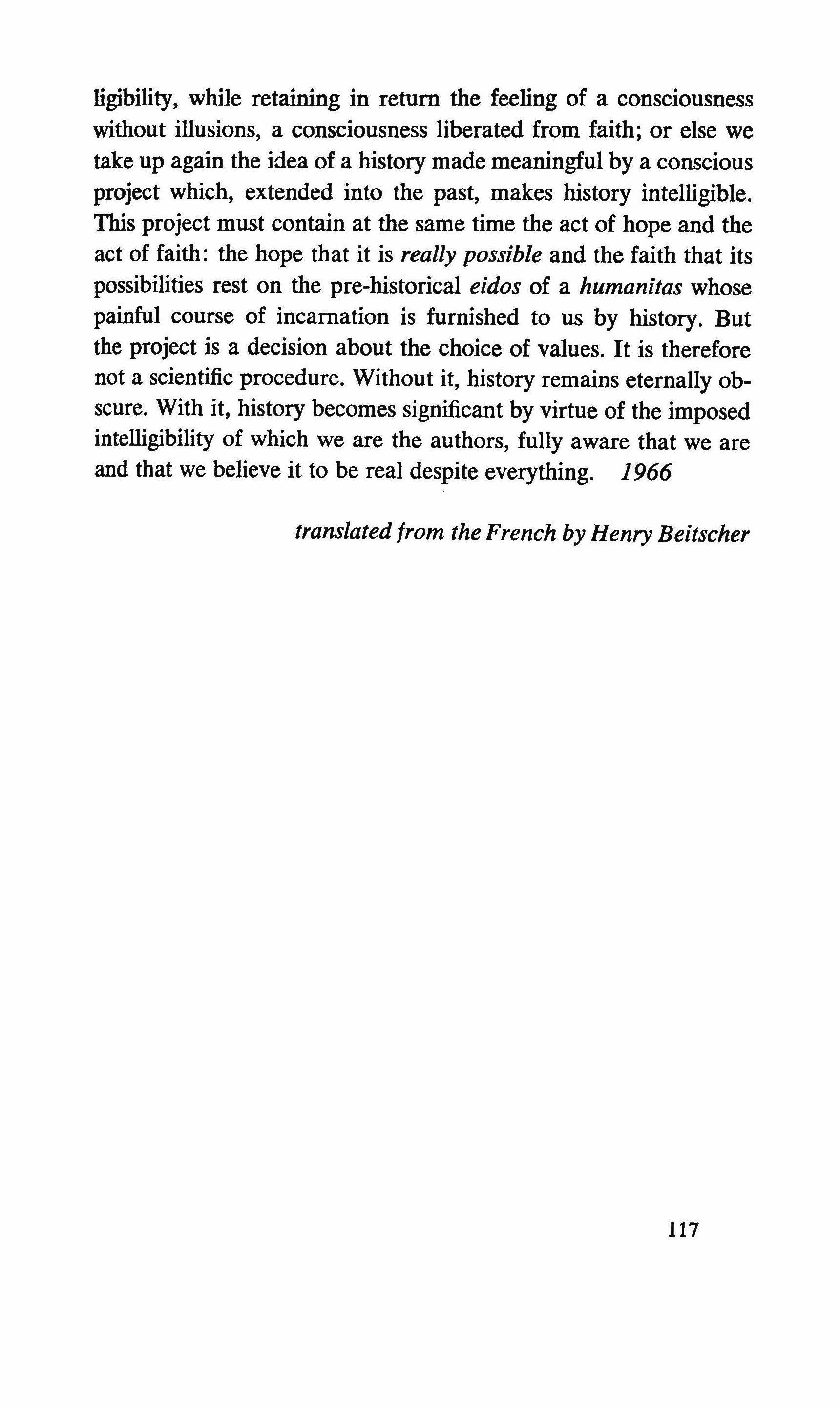
ligibility, while retaining in return the feeling of a consciousness without illusions, a consciousness liberated from faith; or else we take up again the idea of a history made meaningful by a conscious project which, extended into the past, makes history intelligible. This project must contain at the same time the act of hope and the act of faith: the hope that it is really possible and the faith that its possibilities rest on the pre-historical eidos of a humanitas whose painful course of incarnation is furnished to us by history. But the project is a decision about the choice of values. It is therefore not a scientific procedure. Without it, history remains eternally obscure. With it, history becomes significant by virtue of the imposed intelligibility of which we are the authors, fully aware that we are and that we believe it to be real despite everything. 1966
translated from the French by Henry Beitscher
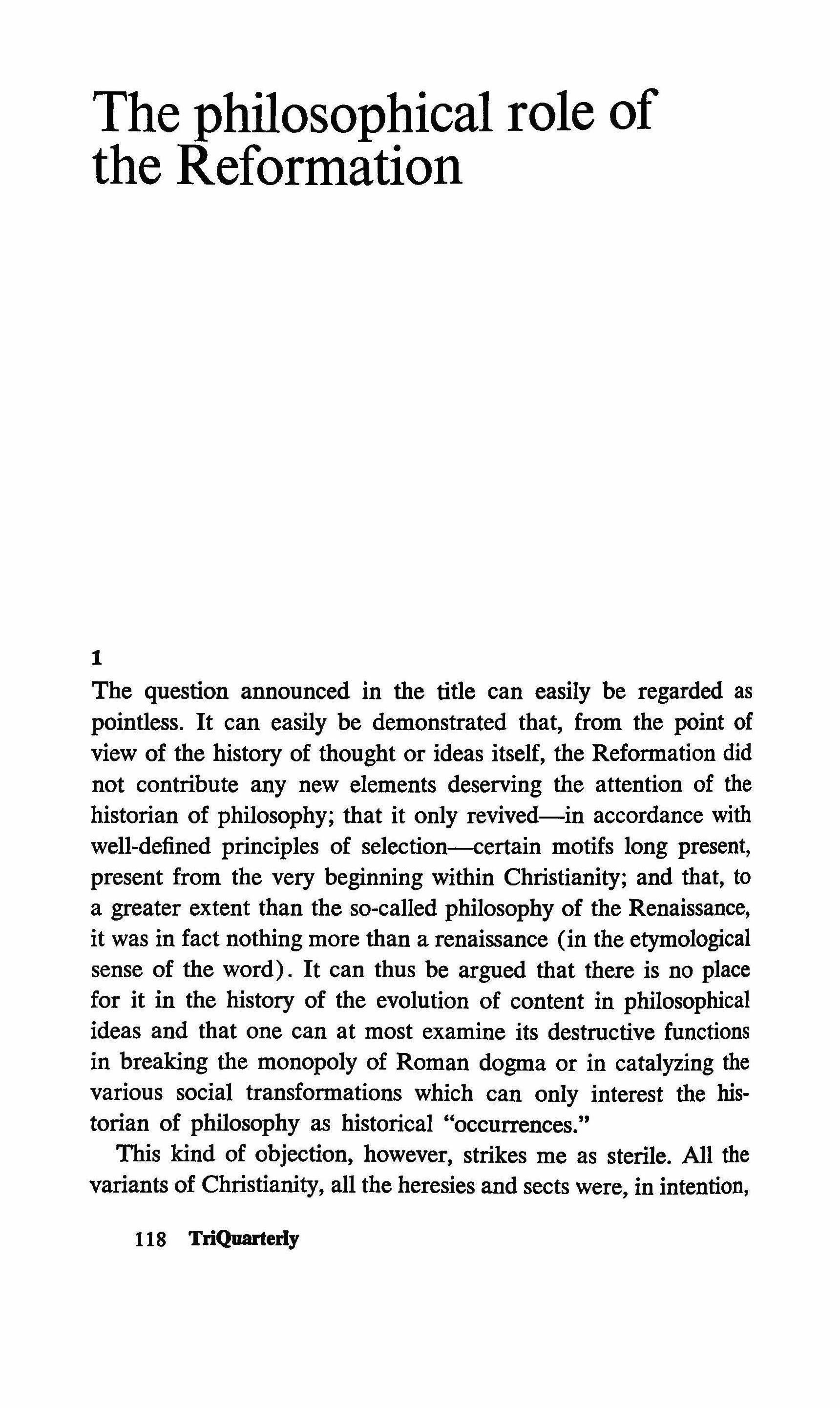
1
The question announced in the title can easily be regarded as pointless. It can easily be demonstrated that, from the point of view of the history of thought or ideas itself, the Reformation did not contribute any new elements deserving the attention of the historian of philosophy; that it only revived-in accordance with well-defined principles of selection-certain motifs long present, present from the very beginning within Christianity; and that, to a greater extent than the so-called philosophy of the Renaissance, it was in fact nothing more than a renaissance (in the etymological sense of the word). It can thus be argued that there is no place for it in the history of the evolution of content in philosophical ideas and that one can at most examine its destructive functions in breaking the monopoly of Roman dogma or in catalyzing the various social transformations which can only interest the historian of philosophy as historical "occurrences." This kind of objection, however, strikes me as sterile. All the variants of Christianity, all the heresies and sects were, in intention,

an interpretation of the same canon and none of them laid any claim to having discovered something new; moreover, all or nearly all the fundamental divergences of interpretation had been articulated in the first centuries of Christianity. Any principle which aimed at excluding from the sphere of the history of philosophy anything not distinctly new would force us to neglect huge areas of Christian philosophy and theology, which could only be of importance to the historian of ideas for research into the social consciousness, not for any well-attested ideas. At least two reasons militate against this kind of procedure. The first is the universally acknowledged and well-tested circumstance by which the sense of philosophical ideas is, in each individual case, codefined by the whole intellectual and cultural situation in which the idea occurs; the same thoughts recur-or so it seems-but each time they must be articulated differently, continually varying the language in which they are expressed; they adapt themselves to the current style, lead to different conclusions, and spring from different motives. Secondly, a panoramic view of the history of philosophy reveals the very thing which could serve as a pretext for removing religious conflicts from the sphere of the history of philosophy. In the history of philosophy too, one can discover the repetition of the same fundamental anxieties, each time dressed up in different words; the difference between the monotony of religious notions and beliefs on the one hand and the changeability and variety of philosophical speculation on the other may well prove reducible to the verbal level and have not the remotest connection with the essential ideas of either.
In reality, the very selection and method of arrangement of the same ideas can, as we know, determine the distinctly innovatory character of philosophical undertakings-in accordance with Pascal's well-known dictum. If, for instance, a group put into circulation an appropriate selection of the ideas of Augustine, opposing them to the scholastic systems and assigning them to philosophical reflection, then, by this alone, a new and significant situation is created, not only in the history of the Church, but also in the history of ideas.
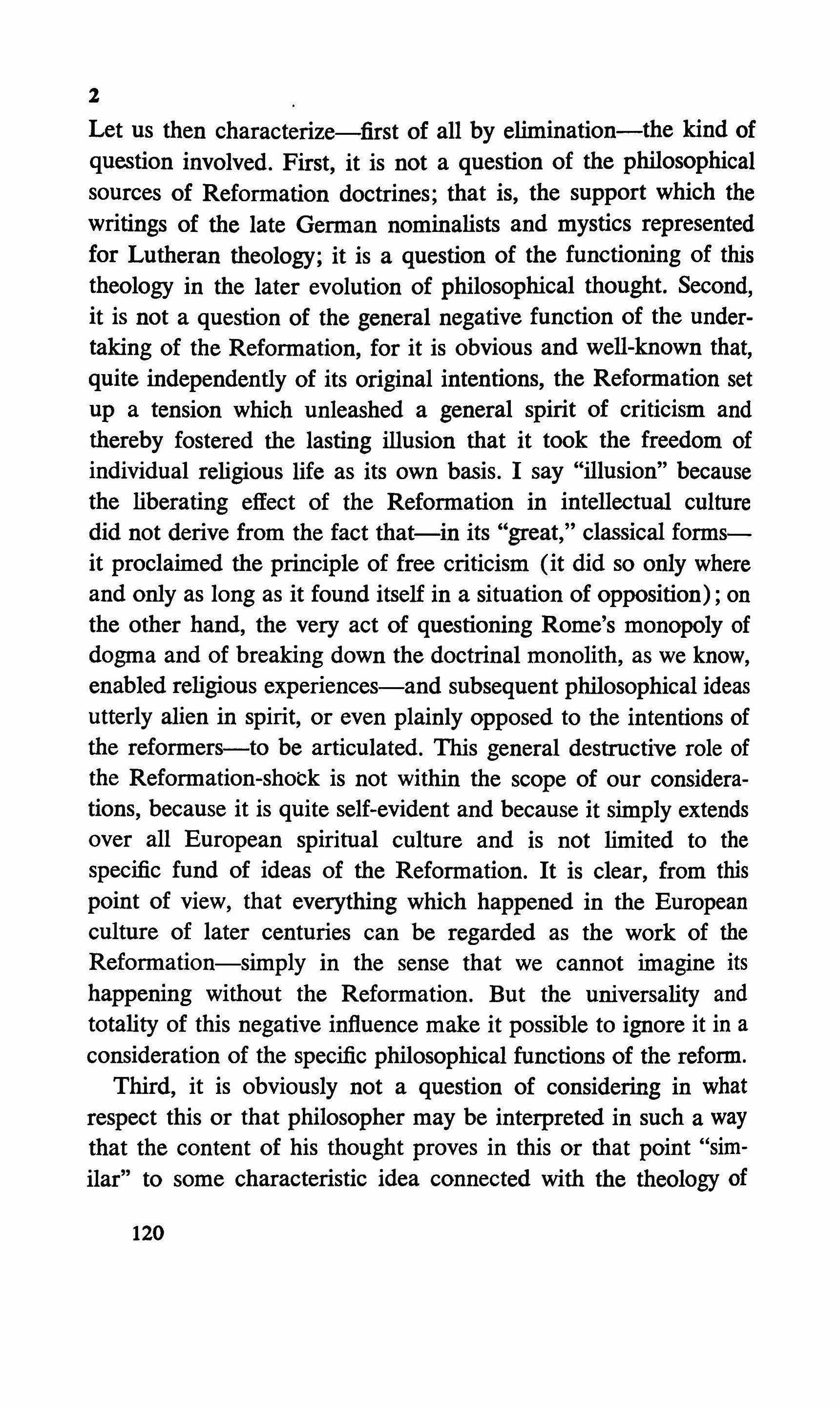
Let us then characterize-first of all by elimination-the kind of question involved. First, it is not a question of the philosophical sources of Reformation doctrines; that is, the support which the writings of the late German nominalists and mystics represented for Lutheran theology; it is a question of the functioning of this theology in the later evolution of philosophical thought. Second, it is not a question of the general negative function of the undertaking of the Reformation, for it is obvious and well-known that, quite independently of its original intentions, the Reformation set up a tension which unleashed a general spirit of criticism and thereby fostered the lasting illusion that it took the freedom of individual religious life as its own basis. I say "illusion" because the liberating effect of the Reformation in intellectual culture did not derive from the fact that-in its "great," classical formsit proclaimed the principle of free criticism (it did so only where and only as long as it found itself in a situation of opposition) ; on the other hand, the very act of questioning Rome's monopoly of dogma and of breaking down the doctrinal monolith, as we know, enabled religious experiences-and subsequent philosophical ideas utterly alien in spirit, or even plainly opposed to the intentions of the reformers-to be articulated. This general destructive role of the Reformation-shock is not within the scope of our considerations, because it is quite self-evident and because it simply extends over all European spiritual culture and is not limited to the specific fund of ideas of the Reformation. It is clear, from this point of view, that everything which happened in the European culture of later centuries can be regarded as the work of the Reformation-simply in the sense that we cannot imagine its happening without the Reformation. But the universality and totality of this negative influence make it possible to ignore it in a consideration of the specific philosophical functions of the reform. Third, it is obviously not a question of considering in what respect this or that philosopher may be interpreted in such a way that the content of his thought proves in this or that point "similar" to some characteristic idea connected with the theology of
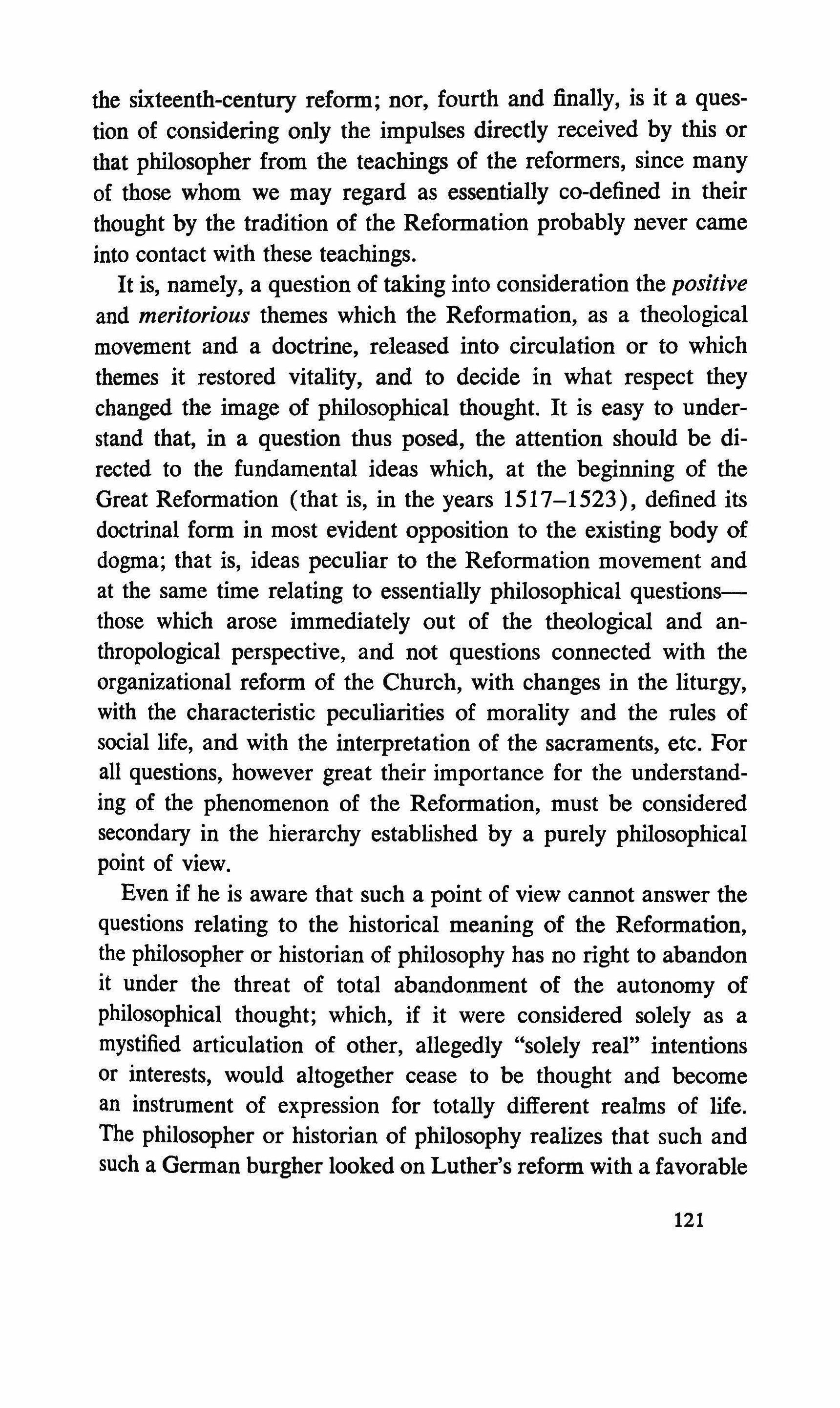
the sixteenth-century reform; nor, fourth and finally, is it a question of considering only the impulses directly received by this or that philosopher from the teachings of the reformers, since many of those whom we may regard as essentially co-defined in their thought by the tradition of the Reformation probably never came into contact with these teachings.
It is, namely, a question of taking into consideration the positive and meritorious themes which the Reformation, as a theological movement and a doctrine, released into circulation or to which themes it restored vitality, and to decide in what respect they changed the image of philosophical thought. It is easy to understand that, in a question thus posed, the attention should be directed to the fundamental ideas which, at the beginning of the Great Reformation (that is, in the years 1517-1523), defined its doctrinal form in most evident opposition to the existing body of dogma; that is, ideas peculiar to the Reformation movement and at the same time relating to essentially philosophical questionsthose which arose immediately out of the theological and anthropological perspective, and not questions connected with the organizational reform of the Church, with changes in the liturgy, with the characteristic peculiarities of morality and the rules of social life, and with the interpretation of the sacraments, etc. For all questions, however great their importance for the understanding of the phenomenon of the Reformation, must be considered secondary in the hierarchy established by a purely philosophical point of view.
Even if he is aware that such a point of view cannot answer the questions relating to the historical meaning of the Reformation, the philosopher or historian of philosophy has no right to abandon it under the threat of total abandonment of the autonomy of philosophical thought; which, if it were considered solely as a mystified articulation of other, allegedly "solely real" intentions or interests, would altogether cease to be thought and become an instrument of expression for totally different realms of life. The philosopher or historian of philosophy realizes that such and such a German burgher looked on Luther's reform with a favorable
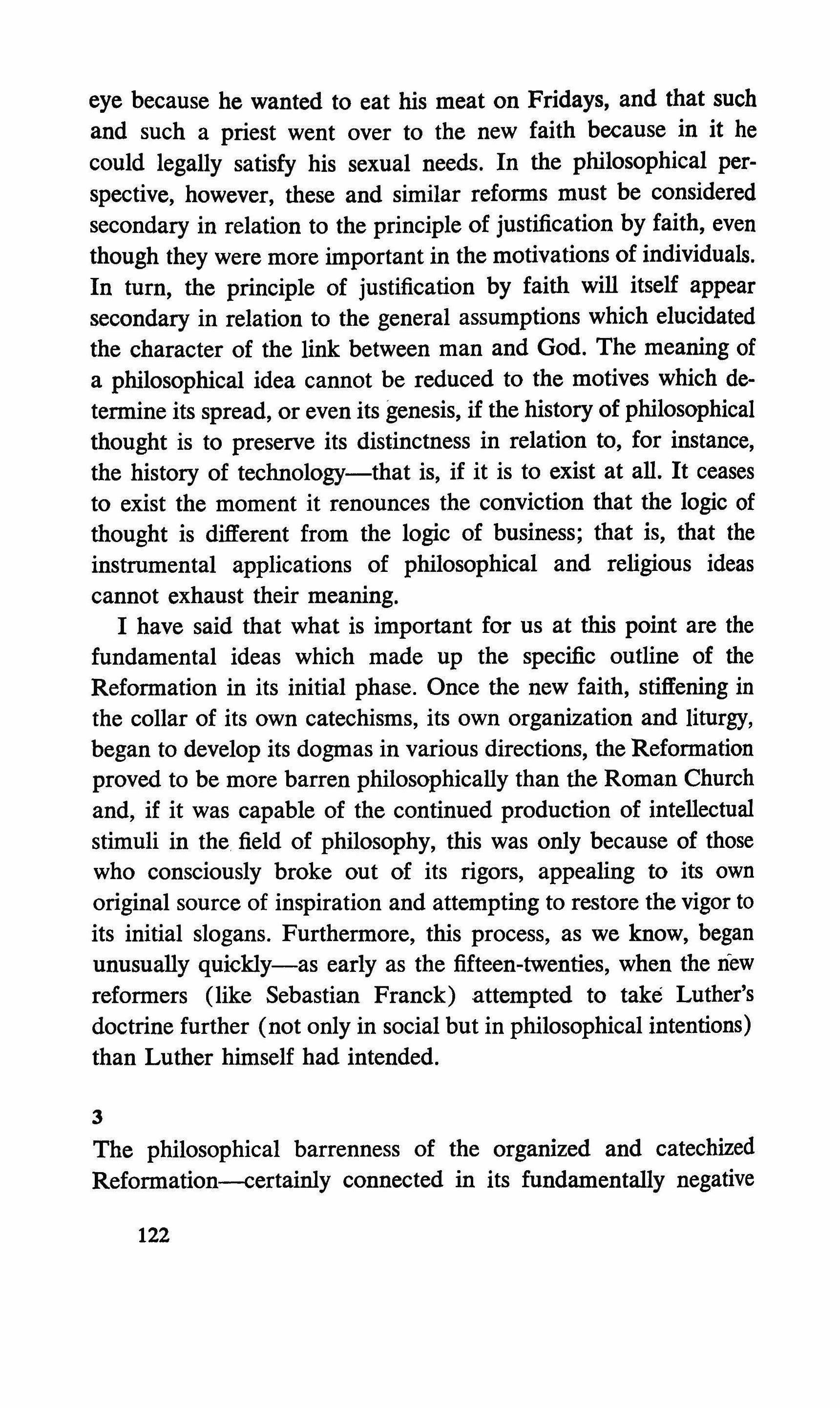
eye because he wanted to eat his meat on Fridays, and that such and such a priest went over to the new faith because in it he could legally satisfy his sexual needs. In the philosophical perspective, however, these and similar reforms must be considered secondary in relation to the principle of justification by faith, even though they were more important in the motivations of individuals. In turn, the principle of justification by faith will itself appear secondary in relation to the general assumptions which elucidated the character of the link between man and God. The meaning of a philosophical idea cannot be reduced to the motives which determine its spread, or even its genesis, if the history of philosophical thought is to preserve its distinctness in relation to, for instance, the history of technology-that is, if it is to exist at all. It ceases to exist the moment it renounces the conviction that the logic of thought is different from the logic of business; that is, that the instrumental applications of philosophical and religious ideas cannot exhaust their meaning.
I have said that what is important for us at this point are the fundamental ideas which made up the specific outline of the Reformation in its initial phase. Once the new faith, stiffening in the collar of its own catechisms, its own organization and liturgy, began to develop its dogmas in various directions, the Reformation proved to be more barren philosophically than the Roman Church and, if it was capable of the continued production of intellectual stimuli in the. field of philosophy, this was only because of those who consciously broke out of its rigors, appealing to its own original source of inspiration and attempting to restore the vigor to its initial slogans. Furthermore, this process, as we know, began unusually quickly-as early as the fifteen-twenties, when the new reformers (like Sebastian Franck) attempted to take Luther's doctrine further (not only in social but in philosophical intentions) than Luther himself had intended.
3
The philosophical barrenness of the organized and catechized Reformation--certainly connected in its fundamentally negative
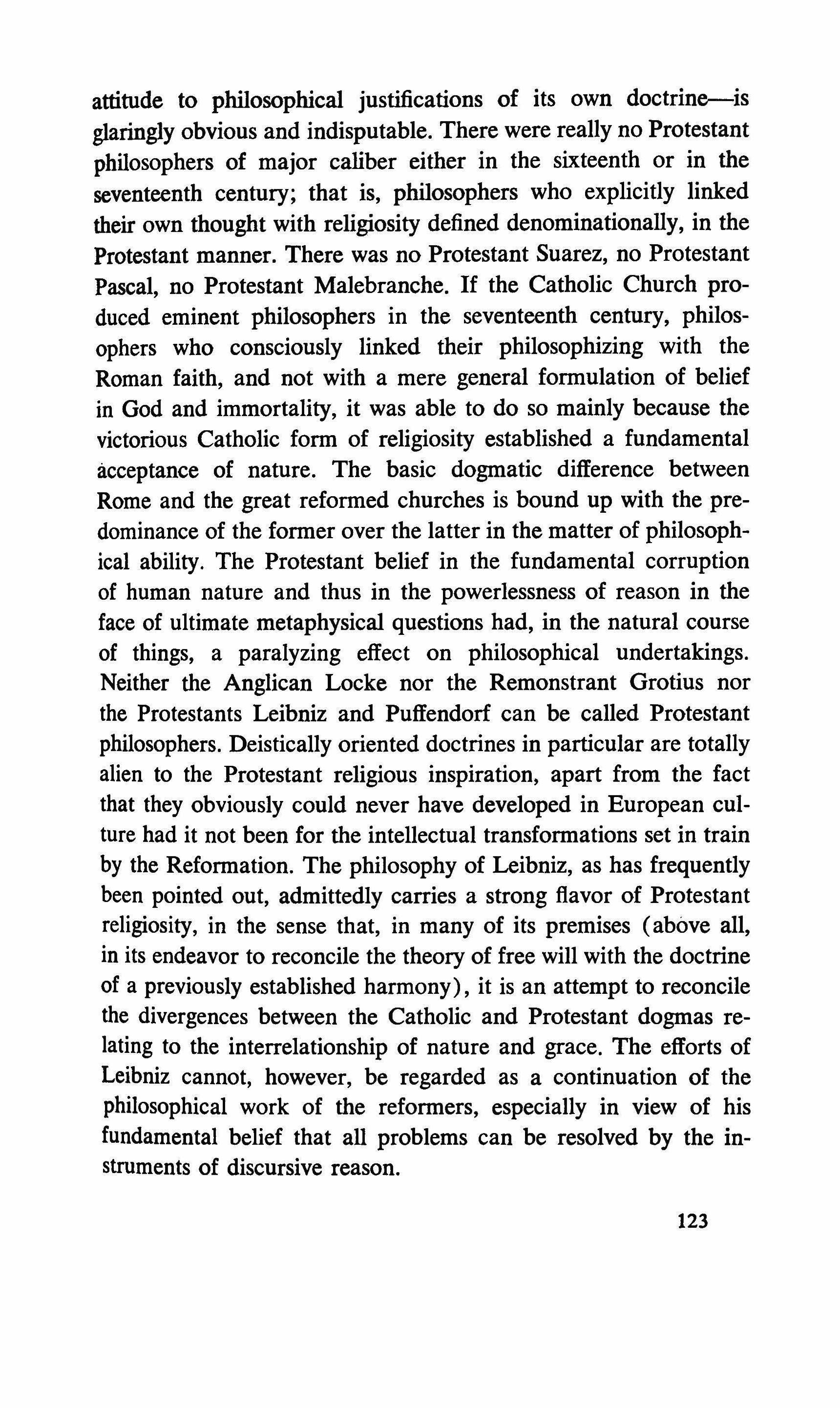
attitude to philosophical justifications of its own doctrine--is glaringly obvious and indisputable. There were really no Protestant philosophers of major caliber either in the sixteenth or in the seventeenth century; that is, philosophers who explicitly linked their own thought with religiosity defined denominationally, in the Protestant manner. There was no Protestant Suarez, no Protestant Pascal, no Protestant Malebranche. If the Catholic Church produced eminent philosophers in the seventeenth century, philosophers who consciously linked their philosophizing with the Roman faith, and not with a mere general formulation of belief in God and immortality, it was able to do so mainly because the victorious Catholic form of religiosity established a fundamental acceptance of nature. The basic dogmatic difference between Rome and the great reformed churches is bound up with the predominance of the former over the latter in the matter of philosophical ability. The Protestant belief in the fundamental corruption of human nature and thus in the powerlessness of reason in the face of ultimate metaphysical questions had, in the natural course of things, a paralyzing effect on philosophical undertakings. Neither the Anglican Locke nor the Remonstrant Grotius nor the Protestants Leibniz and Puffendorf can be called Protestant philosophers. Deistically oriented doctrines in particular are totally alien to the Protestant religious inspiration, apart from the fact that they obviously could never have developed in European culture had it not been for the intellectual transformations set in train by the Reformation. The philosophy of Leibniz, as has frequently been pointed out, admittedly carries a strong flavor of Protestant religiosity, in the sense that, in many of its premises (above all, in its endeavor to reconcile the theory of free will with the doctrine of a previously established harmony), it is an attempt to reconcile the divergences between the Catholic and Protestant dogmas relating to the interrelationship of nature and grace. The efforts of Leibniz cannot, however, be regarded as a continuation of the philosophical work of the reformers, especially in view of his fundamental belief that all problems can be resolved by the instruments of discursive reason.
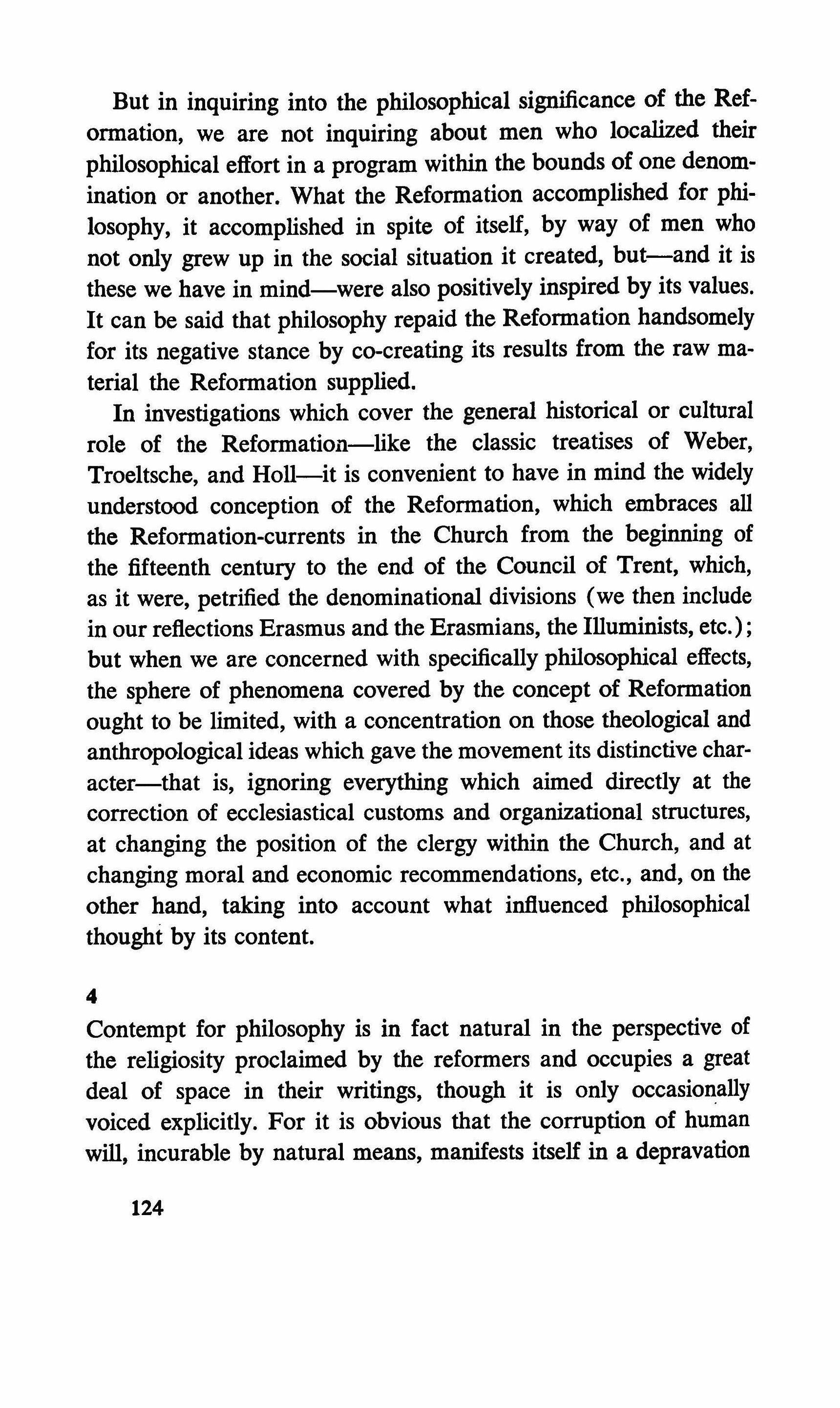
But in inquiring into the philosophical significance of the Reformation, we are not inquiring about men who localized their philosophical effort in a program within the bounds of one denomination or another. What the Reformation accomplished for philosophy, it accomplished in spite of itself, by way of men who not only grew up in the social situation it created, but-and it is these we have in mind-were also positively inspired by its values. It can be said that philosophy repaid the Reformation handsomely for its negative stance by co-creating its results from the raw material the Reformation supplied.
In investigations which cover the general historical or cultural role of the Reformation-like the classic treatises of Weber, Troeltsche, and Holl-it is convenient to have in mind the widely understood conception of the Reformation, which embraces alI the Reformation-currents in the Church from the beginning of the fifteenth century to the end of the Council of Trent, which, as it were, petrified the denominational divisions (we then include in our reflections Erasmus and the Erasmians, the Illuminists, etc.) ; but when we are concerned with specifically philosophical effects, the sphere of phenomena covered by the concept of Reformation ought to be limited, with a concentration on those theological and anthropological ideas which gave the movement its distinctive character-that is, ignoring everything which aimed directly at the correction of ecclesiastical customs and organizational structures, at changing the position of the clergy within the Church, and at changing moral and economic recommendations, etc., and, on the other hand, taking into account what influenced philosophical thought by its content.
4
Contempt for philosophy is in fact natural in the perspective of the religiosity proclaimed by the reformers and occupies a great deal of space in their writings, though it is only occasionally voiced explicitly. For it is obvious that the corruption of human will, incurable by natural means, manifests itself in a depravation

of the reason, which, if it wishes to deepen the divine mysteries of its own accord, only succeeds in multiplying the fruits of pride and the chances of damnation. Nee rectum dictamen habet natura, nee bonam voluntatem"-these words contained in Luther's Latin theses, drafted shortly before October 31, 1517, say all that needs to be said about philosophy and are supplemented by additional explanations which drastically reveal the process of Luther's final break with Aristotelianism and scholastic theology. Anyone who says that a theologian must be a logician is a heretic; in fact, syllogistic reasonings cannot apply to things divine, and anyone who tries to use them to investigate the mystery of the Trinity will unfailingly cease to believe in it. "In a word, Aristotle is to theology as darkness is to light." The same alternatives, either trust in reason or believe in the divine mysteries, will be repeated many times over in the attacks on Erasmus, who, despite all his indifference to metaphysical speculation and despite his Praise of Folly, appears to Luther to be allied with the scholastics in his fundamental trust in the possibilities of human nature and reason. Indeed, Erasmus did not intend, nor did he recommend, penetration into the divine mysteries, nor did he assert that the content of Christianity could be justified by rational means: he recommended continued adherence to the formulas of the Bible, without any detailed demolition of them in disputes over dogma. In spite of this, Luther's hatred is understandable: for Erasmus, everything that is essential in Christianity is simple and easily perceived by natural light, and absolutely sufficient to enable the Christian to know, from a practical point of view, what to abide by in life; the rest is not of major importance. In a word, Christianity, in Erasmus' conception, is not a violation of nature in its moral precepts nor a violation of reason in its theological ideas. For Luther, on the contrary, the unintelligibility of the divine mysteries was supposed to serve first and foremost to implant in a man a contempt for himself and his powers, inasmuch as "to love God is to hate oneself."
Calvin's anti-philosophicalism is, with the same initial premises, 125
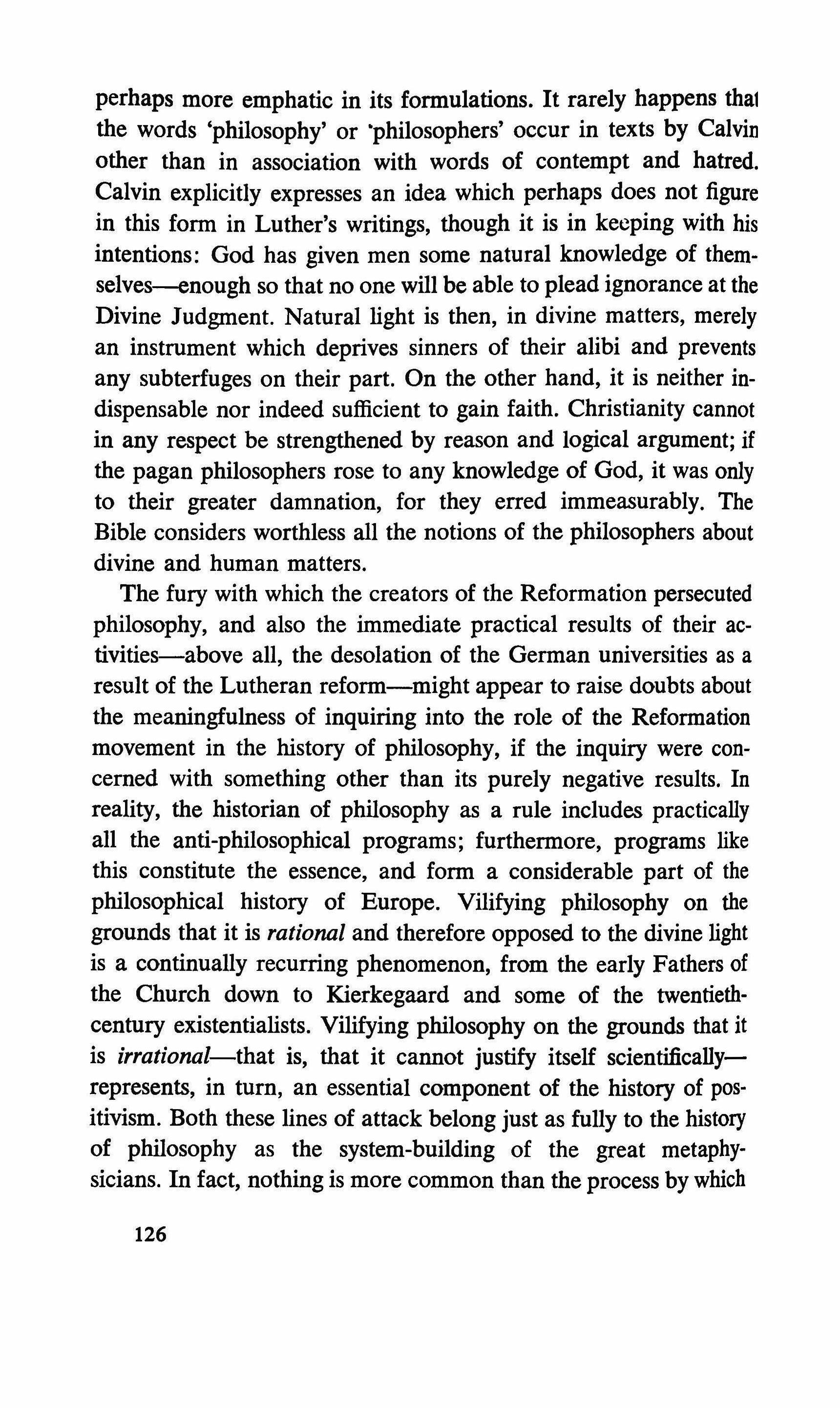
perhaps more emphatic in its formulations. It rarely happens thai the words 'philosophy' or 'philosophers' occur in texts by Calvin other than in association with words of contempt and hatred. Calvin explicitly expresses an idea which perhaps does not figure in this form in Luther's writings, though it is in keeping with his intentions: God has given men some natural knowledge of themselves-enough so that no one will be able to plead ignorance at the Divine Judgment. Natural light is then, in divine matters, merely an instrument which deprives sinners of their alibi and prevents any subterfuges on their part. On the other hand, it is neither indispensable nor indeed sufficient to gain faith. Christianity cannot in any respect be strengthened by reason and logical argument; if the pagan philosophers rose to any knowledge of God, it was only to their greater damnation, for they erred immeasurably. The Bible considers worthless all the notions of the philosophers about divine and human matters.
The fury with which the creators of the Reformation persecuted philosophy, and also the immediate practical results of their activities-above all, the desolation of the German universities as a result of the Lutheran reform-might appear to raise doubts about the meaningfulness of inquiring into the role of the Reformation movement in the history of philosophy, if the inquiry were concerned with something other than its purely negative results. In reality, the historian of philosophy as a rule includes practically all the anti-philosophical programs; furthermore, programs like this constitute the essence, and form a considerable part of the philosophical history of Europe. Vilifying philosophy on the grounds that it is rational and therefore opposed to the divine light is a continually recurring phenomenon, from the early Fathers of the Church down to Kierkegaard and some of the twentiethcentury existentialists. Vilifying philosophy on the grounds that it is irrational-that is, that it cannot justify itself scientificallyrepresents, in turn, an essential component of the history of positivism. Both these lines of attack belong just as fully to the history of philosophy as the system-building of the great metaphysicians. In fact, nothing is more common than the process by which

an obsessive dislike of philosophy becomes the root from which new forms of philosophical endeavor are nurtured.
5
To sum it up in a few words, Luther's interpretation of Christianity develops in two totally different and mutually incompatible lines, a mystical line and an existential line, which both, nonetheless, start at the same point. The seeds of this dual development are concealed in the very idea of justification by faith. For it is not difficult to see that, although we manage to reconstruct the private motivations which led Luther to his discovery or even to understand empathetically his experience of the Christian hope of redemption, when this experience becomes a doctrine, it immediately loses the coherence of the original experience and begins to show signs of internal contradiction.
From the psychological point of view, the initial act of Lutheranism is the experience of resignation: an awareness of one's own powerlessness in the struggle against the innate wretchedness of mankind, a dazzling understanding that one must confidently entrust divine omnipotence, not only with one's outward fate, but also with one's ability to earn spiritual merits before His countenance and with one's corrupt will, which no human endeavor can heal. "Doubt in yourself" is thus the first commandment which outweighs all the others and constitutes the core of the true act of faith. The non-normative theological translation of this commandment proclaims: a corrupt nature does not lead to God. The principle of justification by faith is a consequence and a generalization of this more general conviction: since nature does not lead to God, no endeavor based on innate human capabilities can make us just according to divine criteria, and thus only God (if one rejects the terrible possibility of a general damnation of man), by the effect of his freely given grace, can acknowledge us as just, in spite of our sins, and save us from eternal perdition. The principle which proclaims that a corrupt nature does not lead to God (which was not expressed by Luther in. these words, but which nonetheless sums up his reply to the question of the relationship
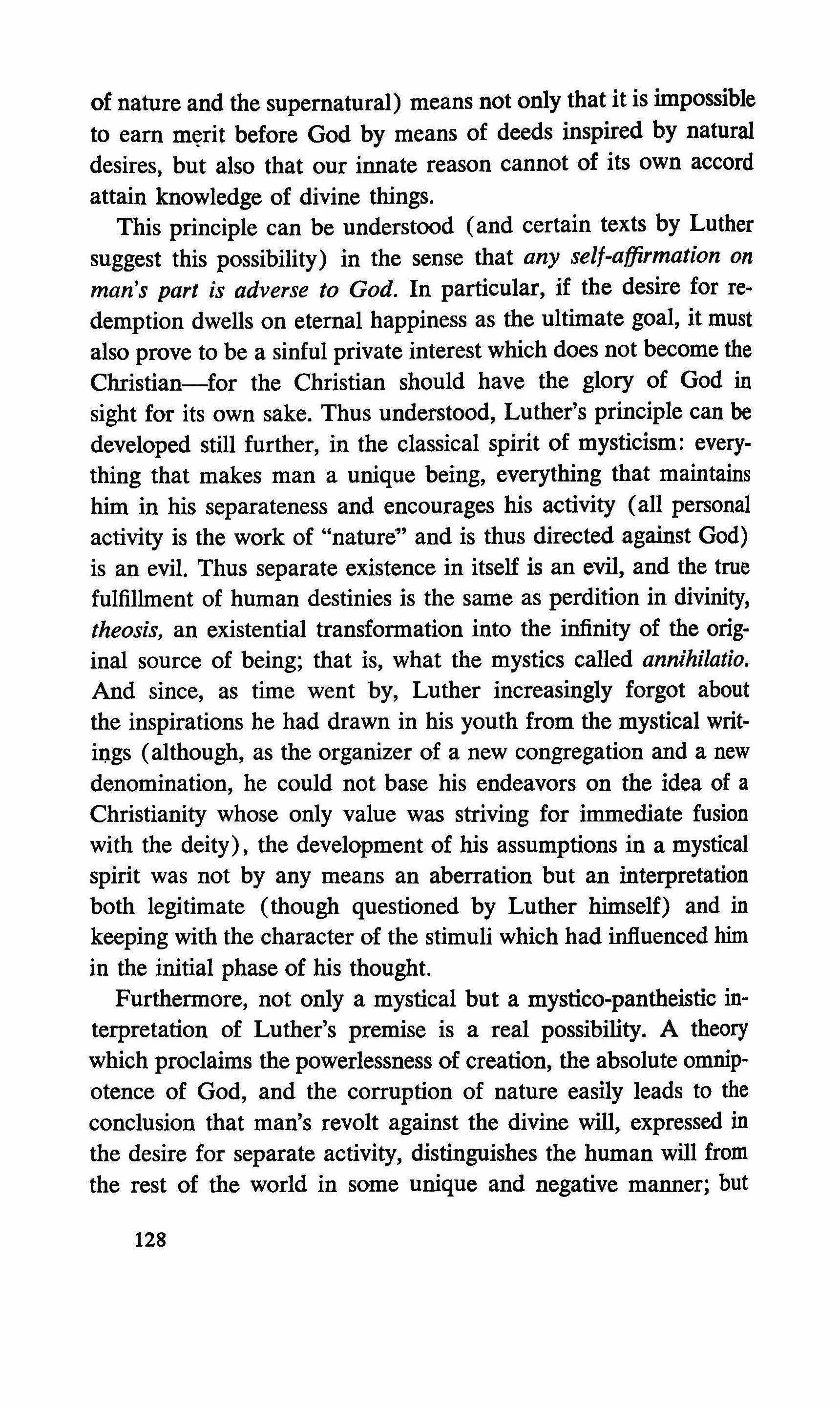
of nature and the supernatural) means not only that it is impossible to earn merit before God by means of deeds inspired by natural desires, but also that our innate reason cannot of its own accord attain knowledge of divine things.
This principle can be understood (and certain texts by Luther suggest this possibility) in the sense that any self-affirmation on man's part is adverse to God. In particular, if the desire for redemption dwells on eternal happiness as the ultimate goal, it must also prove to be a sinful private interest which does not become the Christian-for the Christian should have the glory of God in sight for its own sake. Thus understood, Luther's principle can be developed still further, in the classical spirit of mysticism: everything that makes man a unique being, everything that maintains him in his separateness and encourages his activity (all personal activity is the work of "nature" and is thus directed against God) is an evil. Thus separate existence in itself is an evil, and the true fulfillment of human destinies is the same as perdition in divinity, theosis, an existential transformation into the infinity of the original source of being; that is, what the mystics called annihilatio. And since, as time went by, Luther increasingly forgot about the inspirations he had drawn in his youth from the mystical writings (although, as the organizer of a new congregation and a new denomination, he could not base his endeavors on the idea of a Christianity whose only value was striving for immediate fusion with the deity), the development of his assumptions in a mystical spirit was not by any means an aberration but an interpretation both legitimate (though questioned by Luther himself) and in keeping with the character of the stimuli which had influenced him in the initial phase of his thought.
Furthermore, not only a mystical but a mystico-pantheistic interpretation of Luther's premise is a real possibility. A theory which proclaims the powerlessness of creation, the absolute omnipotence of God, and the corruption of nature easily leads to the conclusion that man's revolt against the divine will, expressed in the desire for separate activity, distinguishes the human will from the rest of the world in some unique and negative manner; but
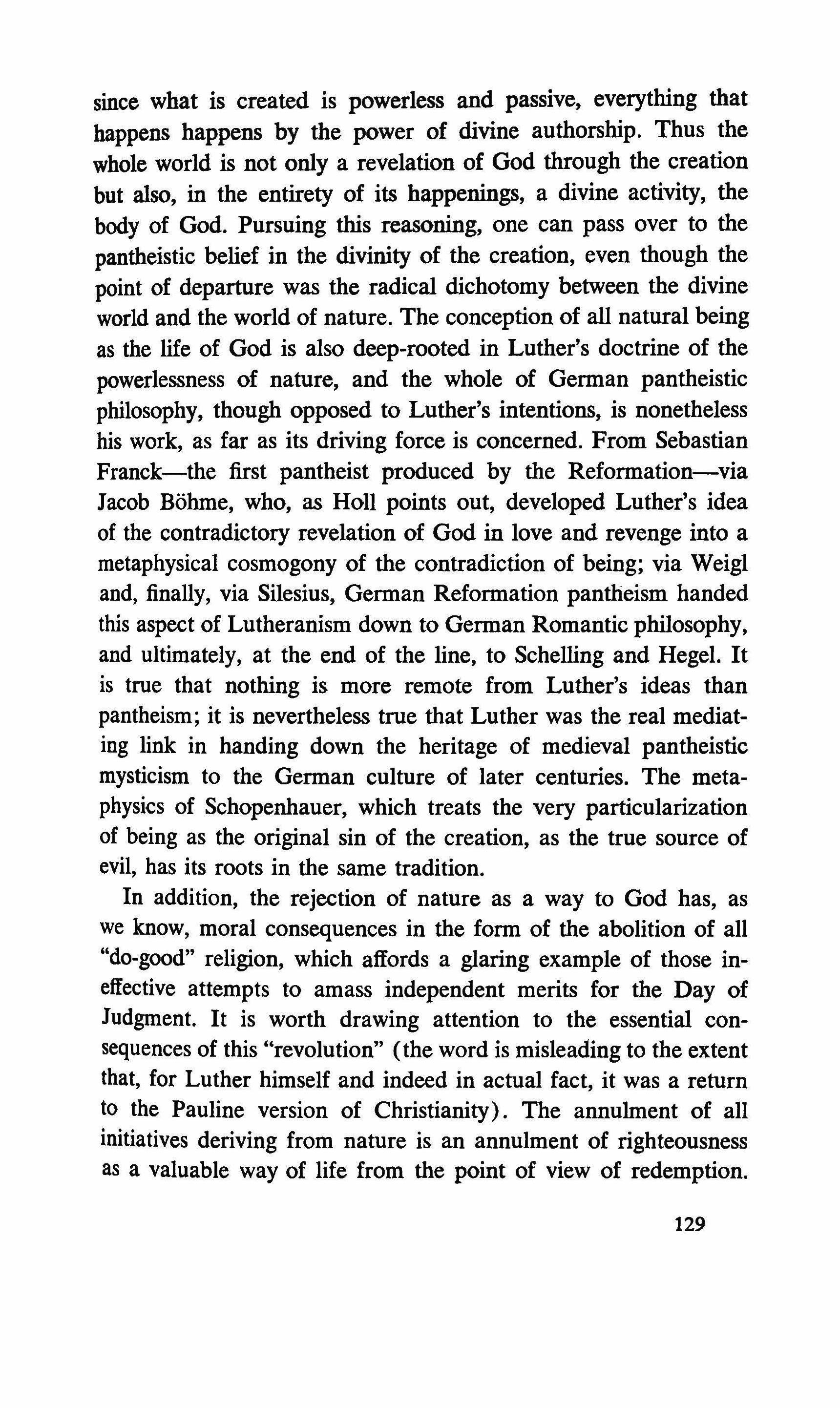
since what is created is powerless and passive, everything that happens happens by the power of divine authorship. Thus the whole world is not only a revelation of God through the creation but also, in the entirety of its happenings, a divine activity, the body of God. Pursuing this reasoning, one can pass over to the pantheistic belief in the divinity of the creation, even though the point of departure was the radical dichotomy between the divine world and the world of nature. The conception of all natural being as the life of God is also deep-rooted in Luther's doctrine of the powerlessness of nature, and the whole of German pantheistic philosophy, though opposed to Luther's intentions, is nonetheless his work, as far as its driving force is concerned. From Sebastian Franck-the first pantheist produced by the Reformation-via Jacob Bohme, who, as Holl points out, developed Luther's idea of the contradictory revelation of God in love and revenge into a metaphysical cosmogony of the contradiction of being; via Weigl and, finally, via Silesius, German Reformation pantheism handed this aspect of Lutheranism down to German Romantic philosophy, and ultimately, at the end of the line, to Schelling and Hegel. It is true that nothing is more remote from Luther's ideas than pantheism; it is nevertheless true that Luther was the real mediating link in handing down the heritage of medieval pantheistic mysticism to the German culture of later centuries. The metaphysics of Schopenhauer, which treats the very particularization of being as the original sin of the creation, as the true source of evil, has its roots in the same tradition.
In addition, the rejection of nature as a way to God has, as we know, moral consequences in the form of the abolition of all "do-good" religion, which affords a glaring example of those ineffective attempts to amass independent merits for the Day of Judgment. It is worth drawing attention to the essential consequences of this "revolution" (the word is misleading to the extent that, for Luther himself and indeed in actual fact, it was a return to the Pauline version of Christianity). The annulment of all initiatives deriving from nature is an annulment of righteousness as a valuable way of life from the point of view of redemption.

The abolition of righteousness in favor of love is a motif that has had an astonishing career since Luther's time. On the one hand, it became the inspiration of the explicitly antinomist movements, which, in principles proclaiming the unimportance of good deeds and of all "external" actions, saw a pretext for moral anarchy and the abolition of all discipline (which, moreover, has nothing in common with Luther's intentions). On the other hand, as has often been pointed out, the Lutheran ethic became a source of the Kantian moral doctrine-via the pietistic Renaissance. The conviction that true moral qualities relate solely to will itself is of Lutheran origin, and in this sense, the whole anti-utilitarian movement in ethics initiated by Kantianism may be recognized as the heritage of Lutheranism. Kant's ethic is a secularization of Luther's anti-works theology.
In a limited sense, the principle which proclaims that nature is not a way to God can, however, be regarded as an inspiration of the deistic tradition, although the gulf which separates the original initiatives of the Reformation from its results is particularly glaring in this case. For this principle certainly operated in two different directions: it disavowed the efficacy of all efforts of natural reason in things religious, and it condemned "usus rationis in divinis" as a usurpation; yet, at the same time, within the bounds of the natural world, it declared its indifference, as long as there were no fears of a conflict between the results of natural cognition and the word of God. It thus made possible the attitude-subsequently so widespread among the Protestant scholars--of acceptance, without closer examination, of a fundamentally irrational faith, while, at the same time, recognizing the autonomy of worldly reason in the natural order. I say that we can speak here of the philosophical influence of the Reformation only "in a limited sense," because this influence falls rather under the heading of negative influences. Nonetheless, not only is the deism of the Protestant countries genetically linked with the essentially Reformational separation of natural reality and divine reality; the belief that there is no way leading from nature to God also links Descartes with Pascal (as Alquie points out), although the mean-

ing of this principle as well as its motivations is different in each case.
6
If, however, we leave aside this current of energy--of unparalleled importance in the history of European culture, yet "secondary" from the point of view of the question under considerationwhich overflowed from the Reformation impulse into philosophical life, the other essential line of influence is, as we have said, the existential trend. The existential sense of Lutheranism appears more evident than its mystical sense but it is more difficult to formulate its objective content.
We can, however, see in Luther's writings that the idea of justification by faith has a double polemical orientation: it is directed against the 'principle of justification by deeds and, at the same time, against the principle of justification by doctrine. The world of faith is radically different from the world of discursive thought; it grows from a violent break, a gap which separates all things natural from all things divine. True Christianity is born out of the overcoming of nature-that is, of one's own will, of human self-affirmation; it is only possible when we overcome the false Christianity conceived of as prolongation, complementation, or ennoblement of natural human inclinations-this is the point around which the mystical variant of the Reformation revolution develops. True Christianity is at the same time an overcoming of Christianity understood as doctrine, as theology; it is the ruin of the blind nonchalance with which the believer places his hope of eternal life in his own orthodoxy. Satan also believes in God and shudders-in accordance with the fine phrase in a text which, moreover (for other reasons), appeared to Luther as the most suspect of the canonical collection (James 2: 19). A Christian is Dot one who has assembled some knowledge of God; Christ's mission was neither to inform people nor to promise them redemption for learning their doctrine correctly. A Christian is one who lives in faith and faith is not conviction but a total spiritual regeneration, a complete renewal, a destruction of the old man,
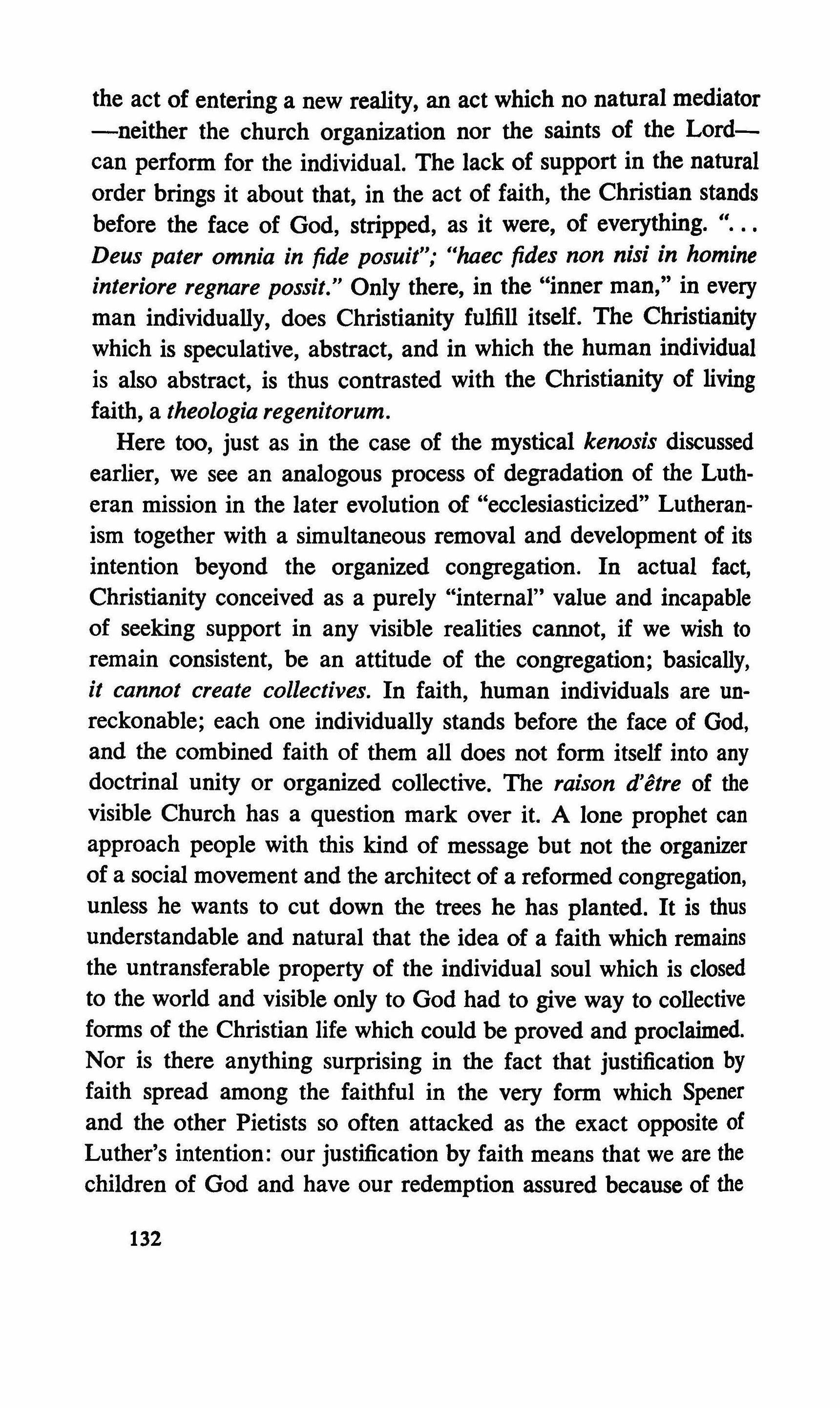
the act of entering a new reality, an act which no natural mediator -neither the church organization nor the saints of the Lordcan perform for the individual. The lack of support in the natural order brings it about that, in the act of faith, the Christian stands before the face of God, stripped, as it were, of everything. Deus pater omnia in fide posuit"; "haec fides non nisi in homine interiore regnare possit." Only there, in the "inner man," in every man individually, does Christianity fulfill itself. The Christianity which is speculative, abstract, and in which the human individual is also abstract, is thus contrasted with the Christianity of living faith, a theologia regenitorum.
Here too, just as in the case of the mystical kenosis discussed earlier, we see an analogous process of degradation of the Lutheran mission in the later evolution of "ecclesiasticized" Lutheranism together with a simultaneous removal and development of its intention beyond the organized congregation. In actual fact, Christianity conceived as a purely "internal" value and incapable of seeking support in any visible realities cannot, if we wish to remain consistent, be an attitude of the congregation; basically, it cannot create collectives. In faith, human individuals are unreckonable; each one individually stands before the face of God, and the combined faith of them all does not form itself into any doctrinal unity or organized collective. The raison d'etre of the visible Church has a question mark over it. A lone prophet can approach people with this kind of message but not the organizer of a social movement and the architect of a reformed congregation, unless he wants to cut down the trees he has planted. It is thus understandable and natural that the idea of a faith which remains the untransferable property of the individual soul which is closed to the world and visible only to God had to give way to collective forms of the Christian life which could be proved and proclaimed. Nor is there anything surprising in the fact that justification by faith spread among the faithful in the very form which Spener and the other Pietists so often attacked as the exact opposite of Luther's intention: our justification by faith means that we are the children of God and have our redemption assured because of the

true doctrine handed down by Christ, corrupted and perverted by the Papacy and extracted from oblivion by Luther.
We can now apprehend somewhat more clearly the difference between the two essentially divergent interpretations of the principle which establishes the fundamental separation of God and nature: the mystical and the existential interpretations. The former 'emphasizes the necessity of eliminating nature, in which is included, in its peripheral versions, human individuality as such, or-in its pantheistic conclusion-absolutely all particularization of existence. The latter emphasizes the need for every human individual to strip himself of all "natural" forms of support, of everything temporal and, at the same time, of everything abstract, in order to attain the state of the "inner man," who, in his full concreteness and his untransferable subjectivity, stands before the world of grace. These two tendencies aim in opposite directions: the existential extremity of the former is the all-absorbing absolute existence, in confrontation with which or in relation to which all individual existence loses its appearance of ontological independence; the existential extremity of the latter tendency is, on the contrary, the irreducible Iemeinigkeit (to borrow Heidegger's expression) of every human being separately, together with the unreckonability of all of them together.
The existential line of development revived by Luther-for in this point too, he was the renewer of a fallow but, nonetheless, real Christian tradition=-certainly does not possess so obvious a continuity as the mystical line, which can be traced almost from generation to generation in German culture, right down to the nineteenth century. But it is just as real. Clearly the Catholic Augustinianism of the seventeenth century in its Jansenist version cannot with complete certainty be considered an intentional prolongation of Luther's program. It is, nevertheless, an attempt at the kind of counter-reformation which endeavored to defeat its opponent with his own weapons, appealing to the same motifs of early Christianity as its opponent did and to lay claim within the Roman Church to the same values as the heretics had done on their own account. From the point of view which interests us here,
133
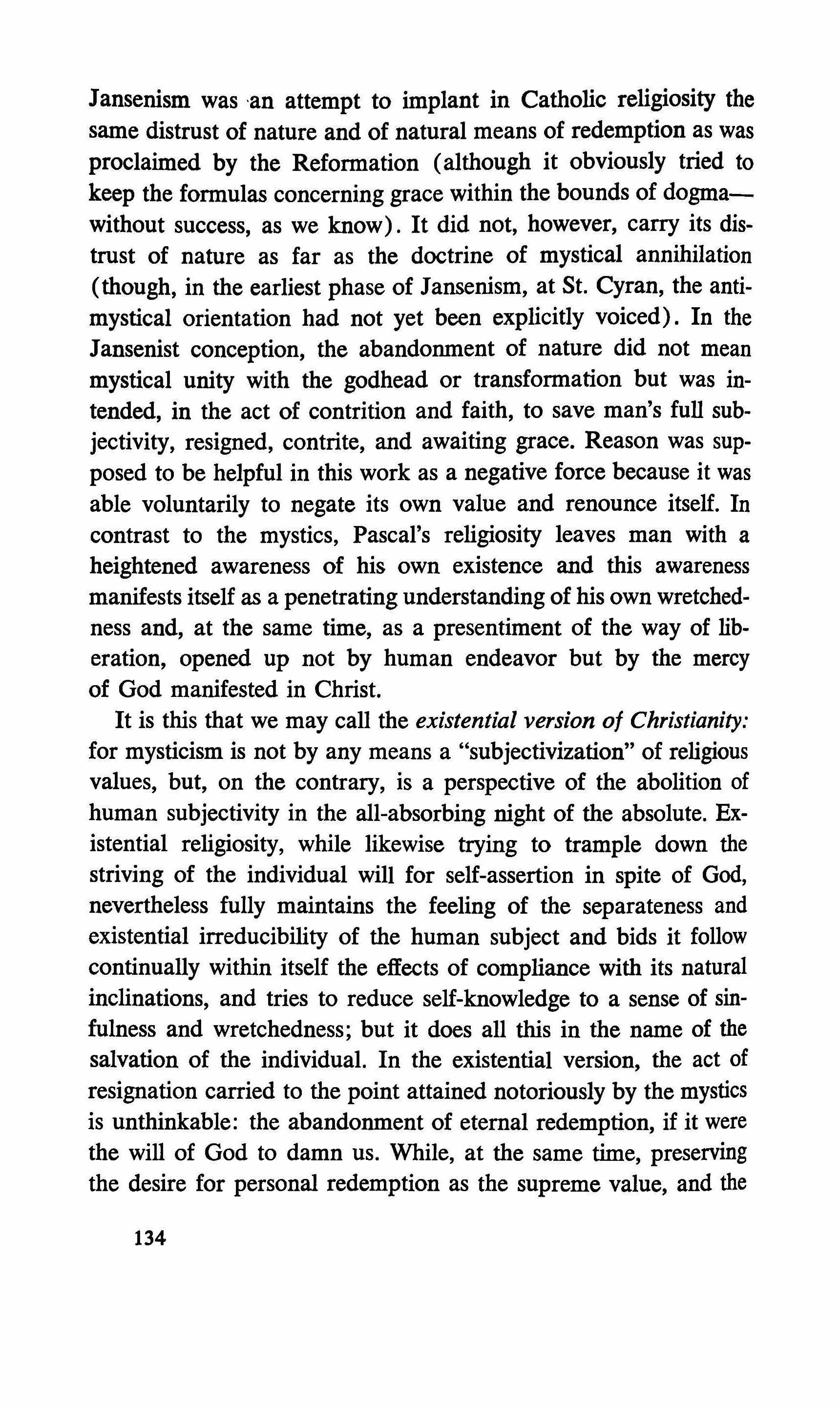
Jansenism was -an attempt to implant in Catholic religiosity the same distrust of nature and of natural means of redemption as was proclaimed by the Reformation (although it obviously tried to keep the formulas concerning grace within the bounds of dogmawithout success, as we know). It did not, however, carry its distrust of nature as far as the doctrine of mystical annihilation (though, in the earliest phase of Jansenism, at St. Cyran, the antimystical orientation had not yet been explicitly voiced). In the Jansenist conception, the abandonment of nature did not mean mystical unity with the godhead or transformation but was intended, in the act of contrition and faith, to save man's full subjectivity, resigned, contrite, and awaiting grace. Reason was supposed to be helpful in this work as a negative force because it was able voluntarily to negate its own value and renounce itself. In contrast to the mystics, Pascal's religiosity leaves man with a heightened awareness of his own existence and this awareness manifests itself as a penetrating understanding of his own wretchedness and, at the same time, as a presentiment of the way of liberation, opened up not by human endeavor but by the mercy of God manifested in Christ.
It is this that we may call the existential version of Christianity: for mysticism is not by any means a "subjectivization" of religious values, but, on the contrary, is a perspective of the abolition of human subjectivity in the all-absorbing night of the absolute. Existential religiosity, while likewise trying to trample down the striving of the individual will for self-assertion in spite of God, nevertheless fully maintains the feeling of the separateness and existential irreducibility of the human subject and bids it follow continually within itself the effects of compliance with its natural inclinations, and tries to reduce self-knowledge to a sense of sinfulness and wretchedness; but it does all this in the name of the salvation of the individual. In the existential version, the act of resignation carried to the point attained notoriously by the mystics is unthinkable: the abandonment of eternal redemption, if it were the will of God to damn us. While, at the same time, preserving the desire for personal redemption as the supreme value, and the
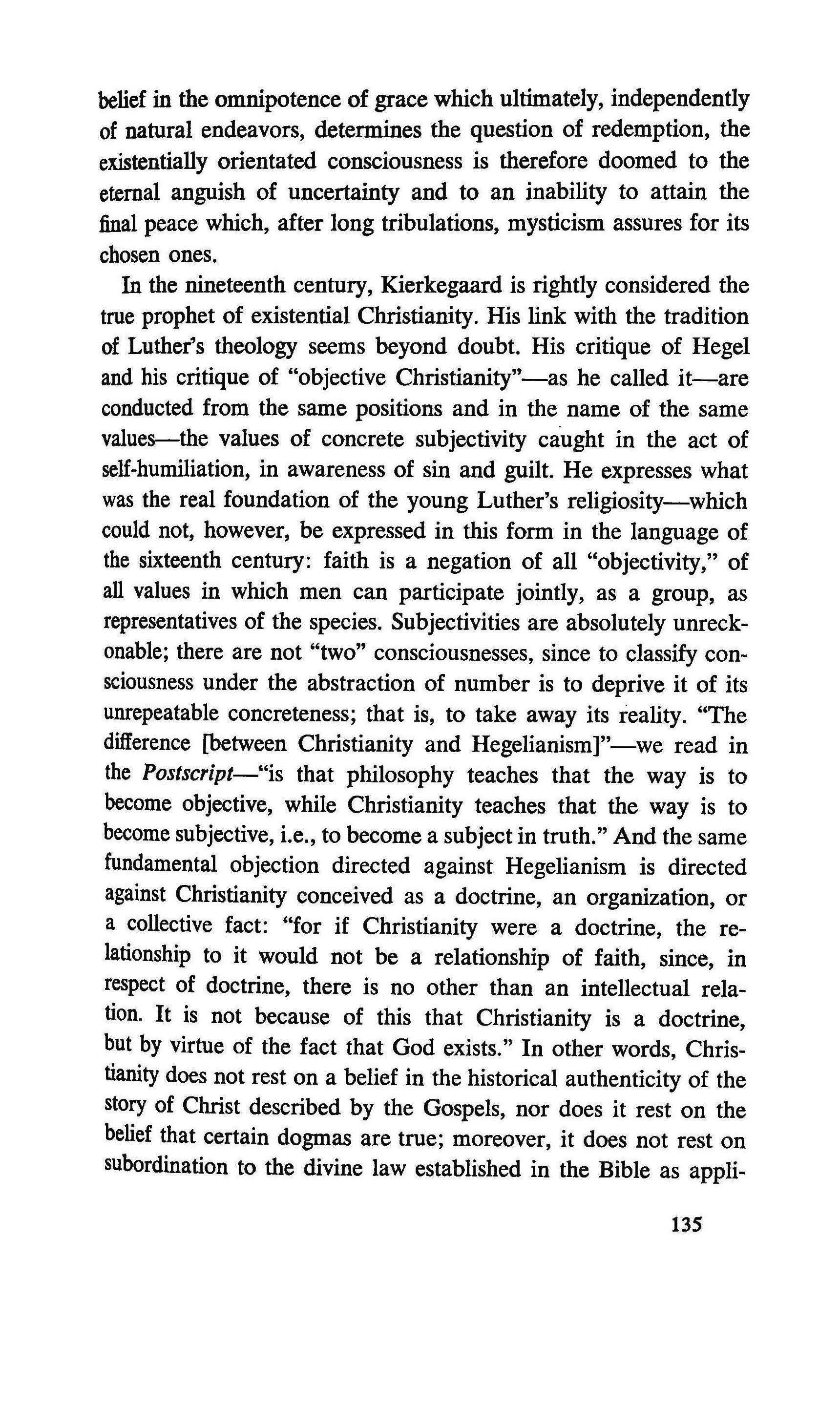
belief in the omnipotence of grace which ultimately, independently of natural endeavors, determines the question of redemption, the existentially orientated consciousness is therefore doomed to the eternal anguish of uncertainty and to an inability to attain the final peace which, after long tribulations, mysticism assures for its chosen ones.
In the nineteenth century, Kierkegaard is rightly considered the true prophet of existential Christianity. His link with the tradition of Luther's theology seems beyond doubt. His critique of Hegel and his critique of "objective Christianity"-as he called it-are conducted from the same positions and in the name of the same values-the values of concrete subjectivity caught in the act of self-humiliation, in awareness of sin and guilt. He expresses what was the real foundation of the young Luther's religiosity-which could not, however, be expressed in this form in the language of the sixteenth century: faith is a negation of all "objectivity," of all values in which men can participate jointly, as a group, as representatives of the species. Subjectivities are absolutely unreckonable; there are not "two" consciousnesses, since to classify consciousness under the abstraction of number is to deprive it of its unrepeatable concreteness; that is, to take away its reality. "The difference [between Christianity and Hegelianism]"-we read in the Postscript-"is that philosophy teaches that the way is to become objective, while Christianity teaches that the way is to become subjective, i.e., to become a subject in truth." And the same fundamental objection directed against Hegelianism is directed against Christianity conceived as a doctrine, an organization, or a collective fact: "for if Christianity were a doctrine, the relationship to it would not be a relationship of faith, since, in respect of doctrine, there is no other than an intellectual relation. It is not because of this that Christianity is a doctrine, but by virtue of the fact that God exists." In other words, Christianity does not rest on a belief in the historical authenticity of the story of Christ described by the Gospels, nor does it rest on the belief that certain dogmas are true; moreover, it does not rest on subordination to the divine law established in the Bible as appli-
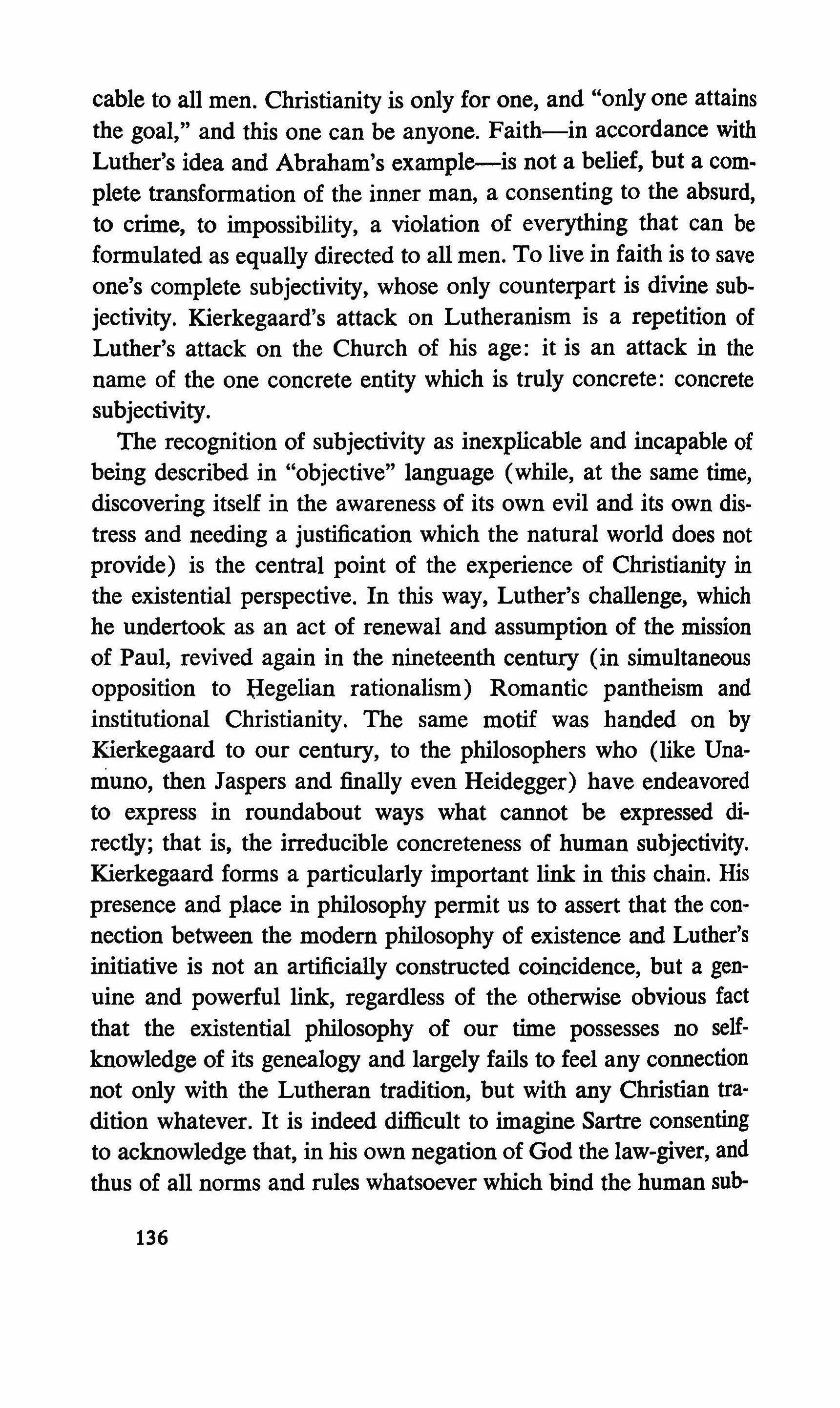
cable to all men. Christianity is only for one, and "only one attains the goal," and this one can be anyone. Faith-in accordance with Luther's idea and Abraham's example-is not a belief, but a complete transformation of the inner man, a consenting to the absurd, to crime, to impossibility, a violation of everything that can be formulated as equally directed to all men. To live in faith is to save one's complete subjectivity, whose only counterpart is divine subjectivity. Kierkegaard's attack on Lutheranism is a repetition of Luther's attack on the Church of his age: it is an attack in the name of the one concrete entity which is truly concrete: concrete subjectivity
The recognition of subjectivity as inexplicable and incapable of being described in "objective" language (while, at the same time, discovering itself in the awareness of its own evil and its own distress and needing a justification which the natural world does not provide) is the central point of the experience of Christianity in the existential perspective. In this way, Luther's challenge, which he undertook as an act of renewal and assumption of the mission of Paul, revived again in the nineteenth century (in simultaneous opposition to Hegelian rationalism) Romantic pantheism and institutional Christianity. The same motif was handed on by Kierkegaard to our century, to the philosophers who (like Unaniuno, then Jaspers and finally even Heidegger) have endeavored to express in roundabout ways what cannot be expressed directly; that is, the irreducible concreteness of human subjectivity. Kierkegaard forms a particularly important link in this chain. His presence and place in philosophy permit us to assert that the connection between the modem philosophy of existence and Luther's initiative is not an artificially constructed coincidence, but a genuine and powerful link, regardless of the otherwise obvious fact that the existential philosophy of our time possesses no selfknowledge of its genealogy and largely fails to feel any connection not only with the Lutheran tradition, but with any Christian tradition whatever. It is indeed difficult to imagine Sartre consenting to acknowledge that, in his own negation of God the law-giver, and thus of all norms and rules whatsoever which bind the human sub-

ject independently of its own free decision, there lurks an echo of the Lutheran negation of the law which Christ's religion of grace had brought with it. And yet this connection is not altogether fictitious. Moreover, the Lutheran negation of philosophy--of philosophy conceived as a doctrine and not only absent from the world of Christian values, but altogether harmful--occurs again in the Kierkegaardian-and, in general, in the existential--conception of philosophy as an act of self-knowledge which must be continually renewed by everyone individually and which cannot transform itself into an abstract theory or doctrine aspiring to general validity. This thread appears with particular forcefulness in the work of Jaspers: since existence, each time equally original for its duration, cannot be conceived as an object, as a collection of qualities which can be enumerated in abstract terms, philosophy as an attempt to catalogue or describe existence is not possible, at least not in the form of theory; philosophical work is rather a continually renewed challenge in which the individual existence tries to set up contact with another, knowing, however, that this contact will never become a self-communication in the sense that an idea can be communicated or a thing passed on. This essentially existential negation of philosophy also has its roots in Luther's Christianity.
7
To sum up, Luther's initiative was a new interpretation of the Augustinian confession: Deum et animam scire cupio. It contained within it the will which characterized philosophical and religious endeavors almost from their origins-the will to define mankind as opposed to the rest of nature. Deprived of its natural support and placed before the overpowering attraction of grace, human subjectivity was supposed to define itself in the awareness of its own downfall and misery. This act of fundamentally severing the link with nature opened up two ways, which we have described as the mystical and the existential lines of the Reformation challenge. In the former case, man, in trying to discover and identify himself in opposition to the world, finds nothing but corruption and
137
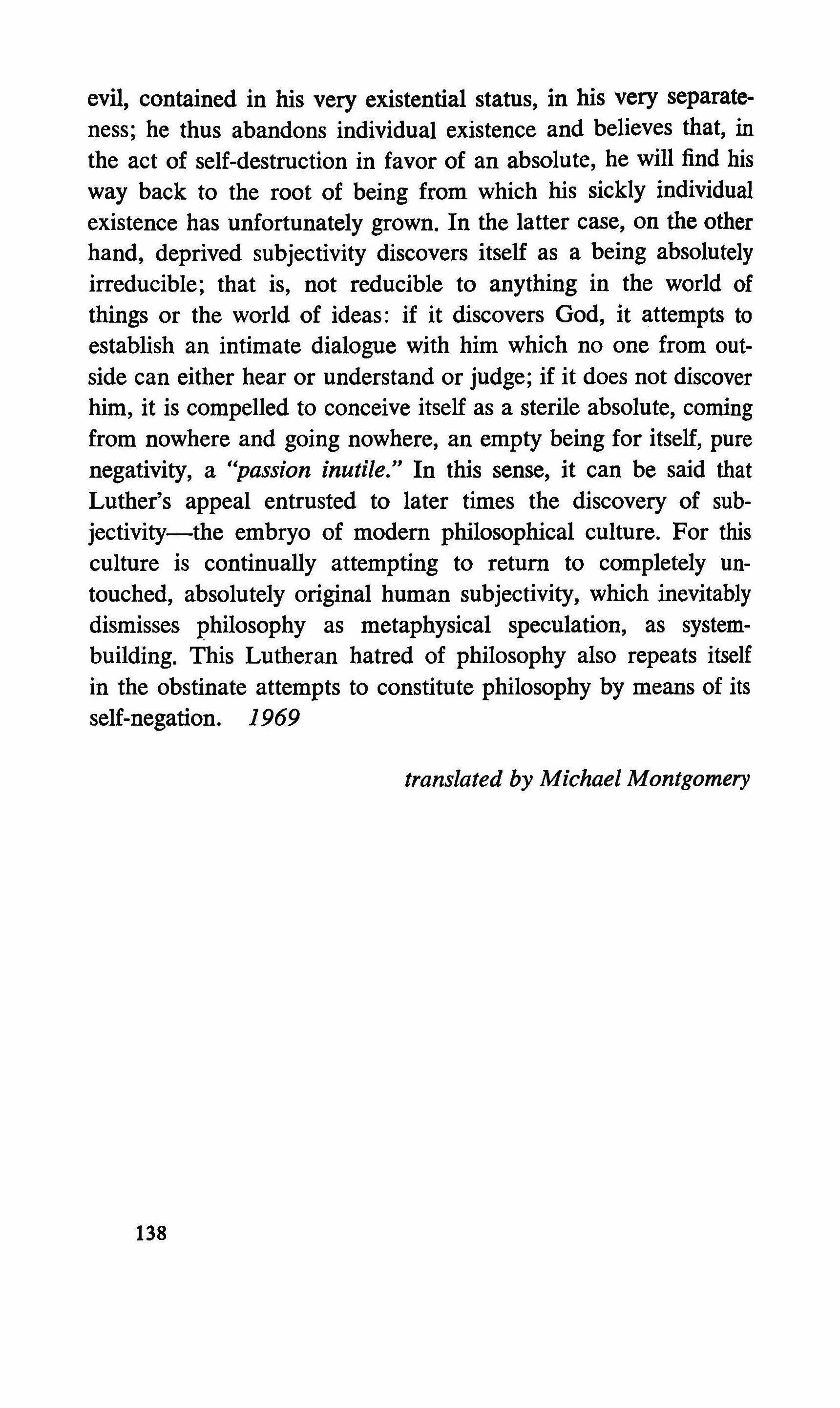
evil, contained in his very existential status, in his very separateness; he thus abandons individual existence and believes that, in the act of self-destruction in favor of an absolute, he will find his way back to the root of being from which his sickly individual existence has unfortunately grown. In the latter case, on the other hand, deprived subjectivity discovers itself as a being absolutely irreducible; that is, not reducible to anything in the world of things or the world of ideas: if it discovers God, it attempts to establish an intimate dialogue with him which no one from outside can either hear or understand or judge; if it does not discover him, it is compelled to conceive itself as a sterile absolute, coming from nowhere and going nowhere, an empty being for itself, pure negativity, a "passion inutile." In this sense, it can be said that Luther's appeal entrusted to later times the discovery of subjectivity-the embryo of modern philosophical culture. For this culture is continually attempting to return to completely untouched, absolutely original human subjectivity, which inevitably dismisses philosophy as metaphysical speculation, as systembuilding. This Lutheran hatred of philosophy also repeats itself in the obstinate attempts to constitute philosophy by means of its self-negation. 1969
translated by Michael Montgomeryon the 20th of December, 1963
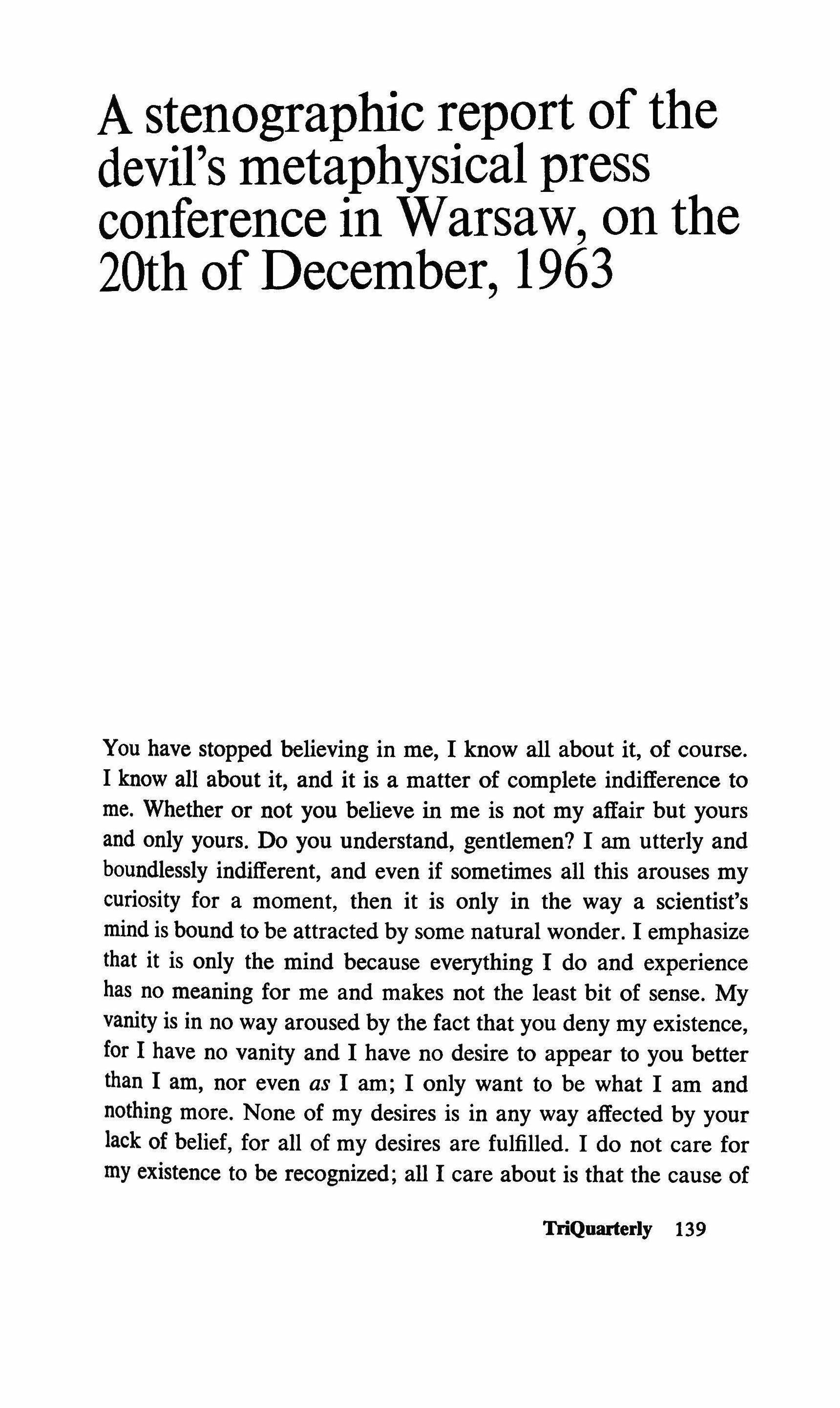
You have stopped believing in me, I know all about it, of course. I know all about it, and it is a matter of complete indifference to me. Whether or not you believe in me is not my affair but yours and only yours. Do you understand, gentlemen? I am utterly and boundlessly indifferent, and even if sometimes all this arouses my curiosity for a moment, then it is only in the way a scientist's mind is bound to be attracted by some natural wonder. I emphasize that it is only the mind because everything I do and experience has no meaning for me and makes not the least bit of sense. My vanity is in no way aroused by the fact that you deny my existence, for I have no vanity and I have no desire to appear to you better than I am, nor even as I am; I only want to be what I am and nothing more. None of my desires is in any way affected by your lack of belief, for all of my desires are fulfilled. I do not care for my existence to be recognized; all I care about is that the cause of
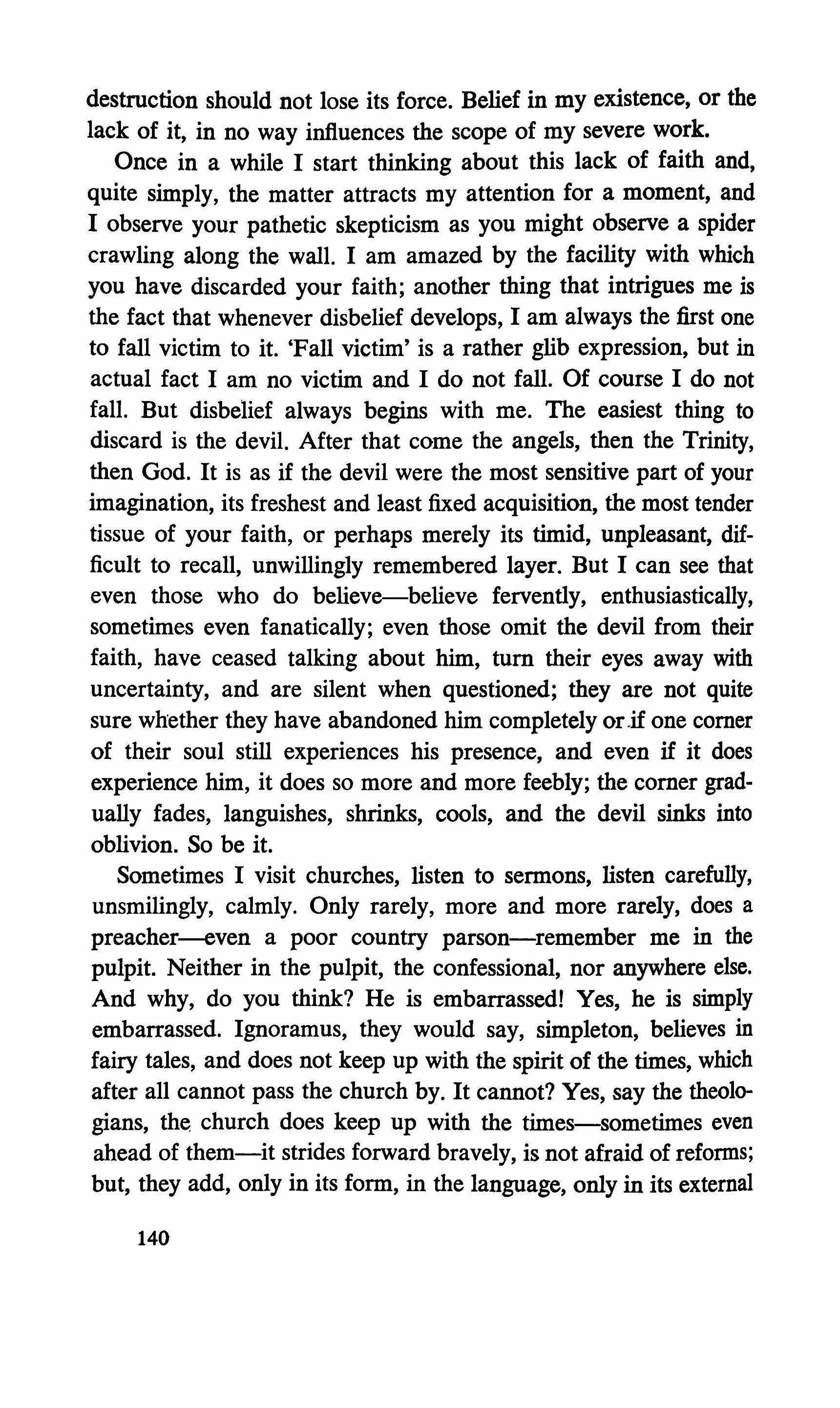
destruction should not lose its force. Belief in my existence, or the lack of it, in no way influences the scope of my severe work. Once in a while I start thinking about this lack of faith and, quite simply, the matter attracts my attention for a moment, and I observe your pathetic skepticism as you might observe a spider crawling along the wall. I am amazed by the facility with which you have discarded your faith; another thing that intrigues me is the fact that whenever disbelief develops, I am always the first one to fall victim to it. 'Fall victim' is a rather glib expression, but in actual fact I am no victim and I do not fall. Of course I do not fall. But disbelief always begins with me. The easiest thing to discard is the devil. After that come the angels, then the Trinity, then God. It is as if the devil were the most sensitive part of your imagination, its freshest and least fixed acquisition, the most tender tissue of your faith, or perhaps merely its timid, unpleasant, difficult to recall, unwillingly remembered layer. But I can see that even those who do believe-believe fervently, enthusiastically, sometimes even fanatically; even those omit the devil from their faith, have ceased talking about him, tum their eyes away with uncertainty, and are silent when questioned; they are not quite sure whether they have abandoned him completely or.if one comer of their soul still experiences his presence, and even if it does experience him, it does so more and more feebly; the comer gradually fades, languishes, shrinks, cools, and the devil sinks into oblivion. So be it.
Sometimes I visit churches, listen to sermons, listen carefully, unsmilingly, calmly. Only rarely, more and more rarely, does a preacher-even a poor country parson-remember me in the pulpit. Neither in the pulpit, the confessional, nor anywhere else. And why, do you think? He is embarrassed! Yes, he is simply embarrassed. Ignoramus, they would say, simpleton, believes in fairy tales, and does not keep up with the spirit of the times, which after all cannot pass the church by. It cannot? Yes, say the theologians, the church does keep up with the times-sometimes even ahead of them-it strides forward bravely, is not afraid of reforms; but, they add, only in its form, in the language, only in its external
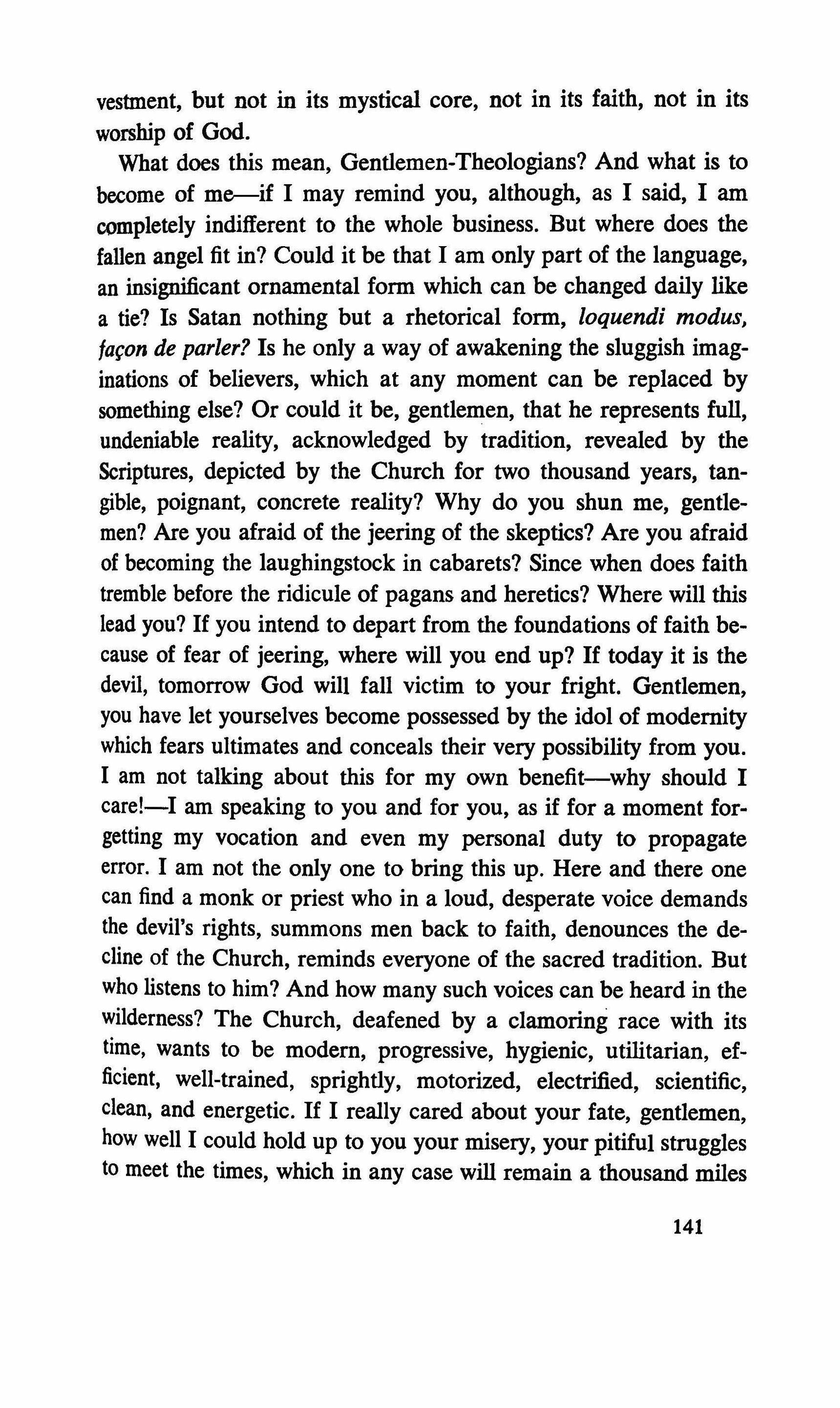
vestment, but not in its mystical core, not in its faith, not in its worship of God.
What does this mean, Gentlemen-Theologians? And what is to become of me-if I may remind you, although, as I said, I am completely indifferent to the whole business. But where does the fallen angel fit in? Could it be that I am only part of the language, an insignificant ornamental form which can be changed daily like a tie? Is Satan nothing but a rhetorical form, loquendi modus, iacon de parler? Is he only a way of awakening the sluggish imaginations of believers, which at any moment can be replaced by something else? Or could it be, gentlemen, that he represents full, undeniable reality, acknowledged by tradition, revealed by the Scriptures, depicted by the Church for two thousand years, tangible, poignant, concrete reality? Why do you shun me, gentlemen? Are you afraid of the jeering of the skeptics? Are you afraid of becoming the laughingstock in cabarets? Since when does faith tremble before the ridicule of pagans and heretics? Where will this lead you? If you intend to depart from the foundations of faith because of fear of jeering, where will you end up? If today it is the devil, tomorrow God will fall victim to your fright. Gentlemen, you have let yourselves become possessed by the idol of modernity which fears ultimates and conceals their very possibility from you. I am not talking about this for my own benefit-why should I care!-I am speaking to you and for you, as if for a moment forgetting my vocation and even my personal duty to propagate error. I am not the only one to bring this up. Here and there one can find a monk or priest who in a loud, desperate voice demands the devil's rights, summons men back to faith, denounces the decline of the Church, reminds everyone of the sacred tradition. But who listens to him? And how many such voices can be heard in the wilderness? The Church, deafened by a clamoring race with its time, wants to be modern, progressive, hygienic, utilitarian, efficient, well-trained, sprightly, motorized, electrified, scientific, clean, and energetic. If I really cared about your fate, gentlemen, how well I could hold up to you your misery, your pitiful struggles to meet the times, which in any case will remain a thousand miles
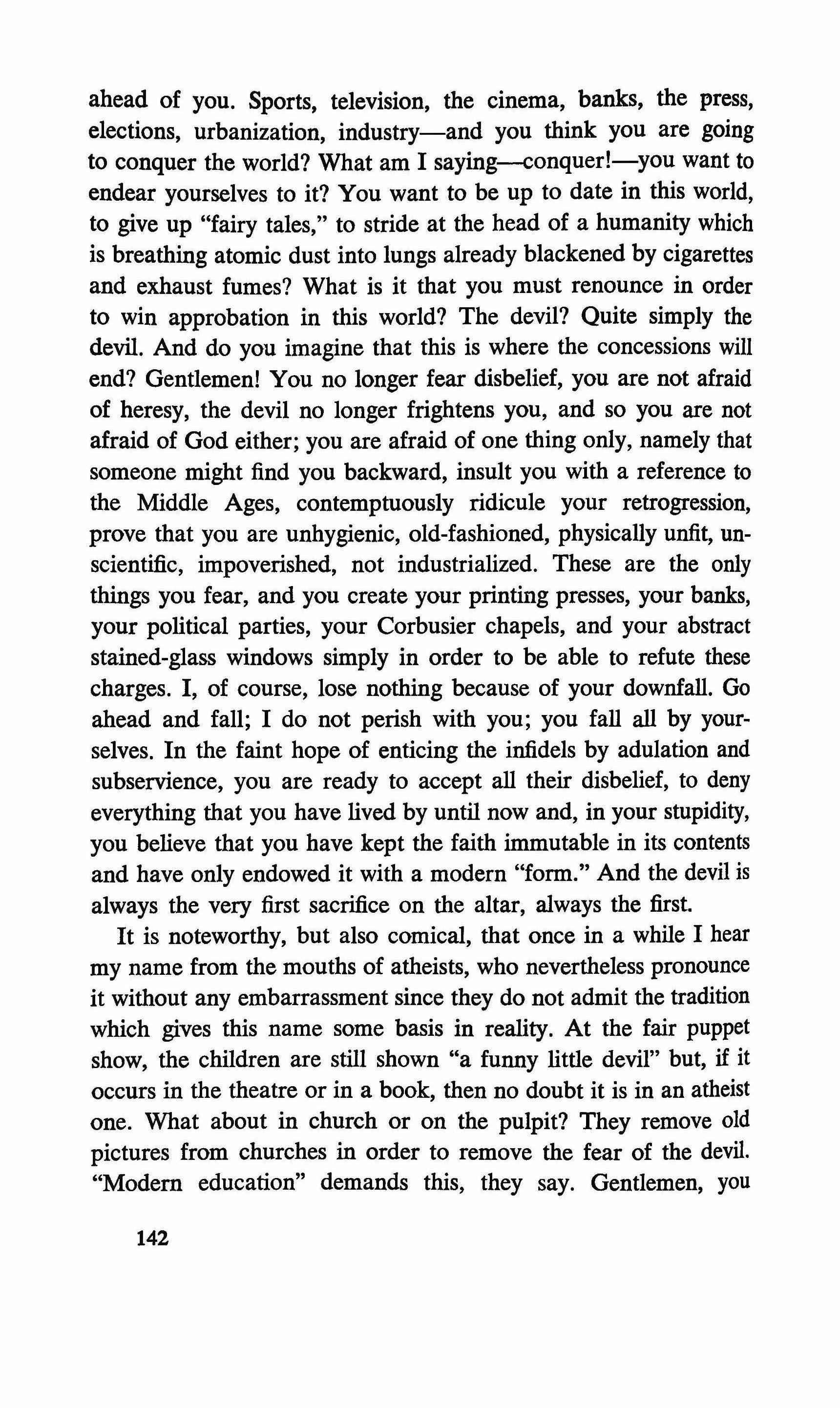
ahead of you. Sports, television, the cinema, banks, the press, elections, urbanization, industry-and you think you are going to conquer the world? What am I saying--conquer!-you want to endear yourselves to it? You want to be up to date in this world, to give up "fairy tales," to stride at the head of a humanity which is breathing atomic dust into lungs already blackened by cigarettes and exhaust fumes? What is it that you must renounce in order to win approbation in this world? The devil? Quite simply the devil. And do you imagine that this is where the concessions will end? Gentlemen! You no longer fear disbelief, you are not afraid of heresy, the devil no longer frightens you, and so you are not afraid of God either; you are afraid of one thing only, namely that someone might find you backward, insult you with a reference to the Middle Ages, contemptuously ridicule your retrogression, prove that you are unhygienic, old-fashioned, physically unfit, unscientific, impoverished, not industrialized. These are the only things you fear, and you create your printing presses, your banks, your political parties, your Corbusier chapels, and your abstract stained-glass windows simply in order to be able to refute these charges. I, of course, lose nothing because of your downfall. Go ahead and fall; I do not perish with you; you fall all by yourselves. In the faint hope of enticing the infidels by adulation and subservience, you are ready to accept all their disbelief, to deny everything that you have lived by until now and, in your stupidity, you believe that you have kept the faith immutable in its contents and have only endowed it with a modern "form." And the devil is always the very first sacrifice on the altar, always the first. It is noteworthy, but also comical, that once in a while I hear my name from the mouths of atheists, who nevertheless pronounce it without any embarrassment since they do not admit the tradition which gives this name some basis in reality. At the fair puppet show, the children are still shown "a funny little devil" but, if it occurs in the theatre or in a book, then no doubt it is in an atheist one. What about in church or on the pulpit? They remove old pictures from churches in order to remove the fear of the devil. "Modem education" demands this, they say. Gentlemen, you
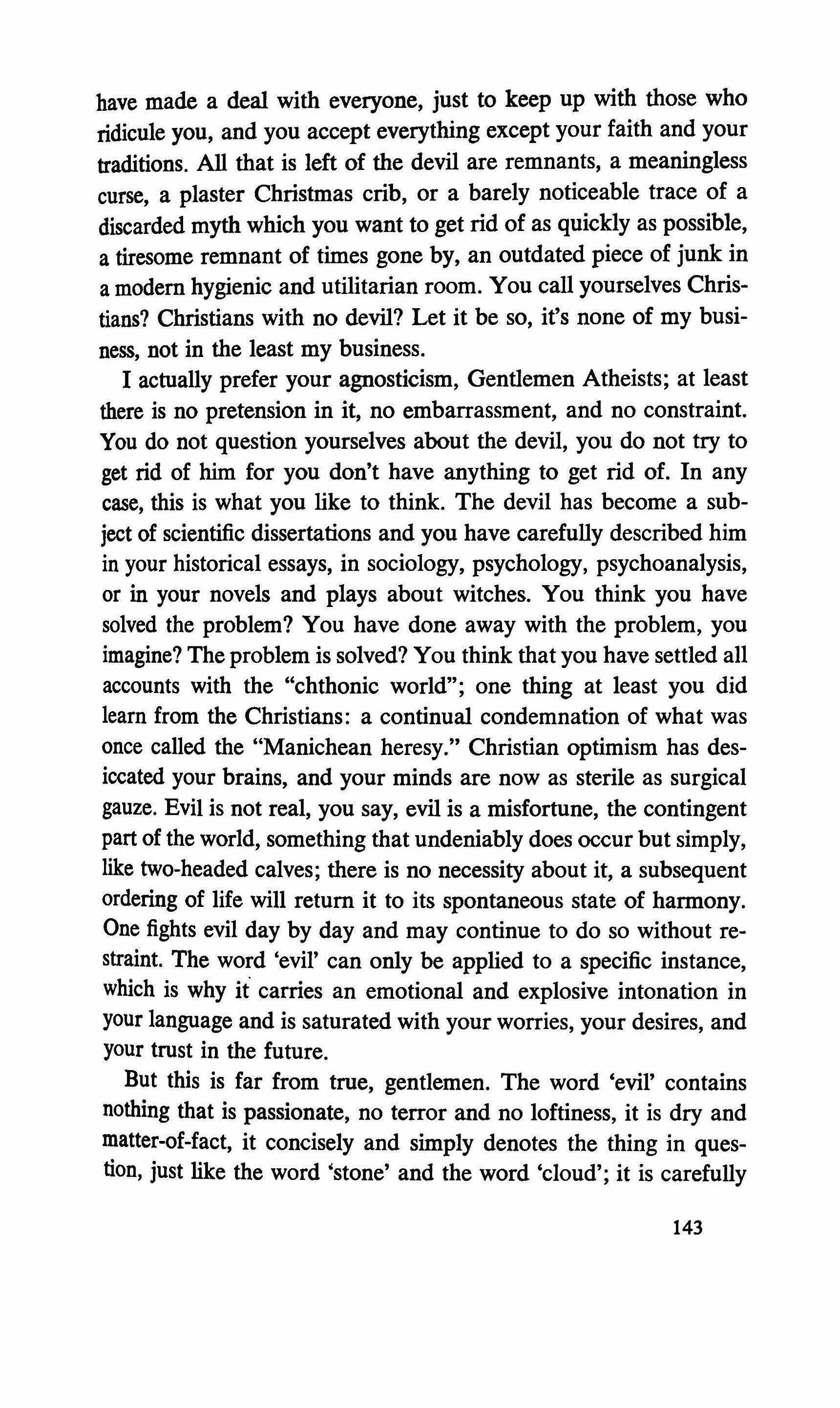
have made a deal with everyone, just to keep up with those who ridicule you, and you accept everything except your faith and your traditions. All that is left of the devil are remnants, a meaningless curse, a plaster Christmas crib, or a barely noticeable trace of a discarded myth which you want to get rid of as quickly as possible, a tiresome remnant of times gone by, an outdated piece of junk in a modem hygienic and utilitarian room. You call yourselves Christians? Christians with no devil? Let it be so, it's none of my business, not in the least my business.
I actually prefer your agnosticism, Gentlemen Atheists; at least there is no pretension in it, no embarrassment, and no constraint. You do not question yourselves about the devil, you do not try to get rid of him for you don't have anything to get rid of. In any case, this is what you like to think. The devil has become a subject of scientific dissertations and you have carefully described him in your historical essays, in sociology, psychology, psychoanalysis, or in your novels and plays about witches. You think you have solved the problem? You have done away with the problem, you imagine? The problem is solved? You think that you have settled all accounts with the "chthonic world"; one thing at least you did learn from the Christians: a continual condemnation of what was once called the "Manichean heresy." Christian optimism has desiccated your brains, and your minds are now as sterile as surgical gauze. Evil is not real, you say, evil is a misfortune, the contingent part of the world, something that undeniably does occur but simply, like two-headed calves; there is no necessity about it, a subsequent ordering of life will return it to its spontaneous state of harmony. One fights evil day by day and may continue to do so without restraint. The word 'evil' can only be applied to a specific instance, which is why it carries an emotional and explosive intonation in your language and is saturated with your worries, your desires, and your trust in the future.
But this is far from true, gentlemen. The word 'evil' contains nothing that is passionate, no terror and no loftiness, it is dry and matter-of-fact, it concisely and simply denotes the thing in question, just like the word 'stone' and the word 'cloud'; it is carefully
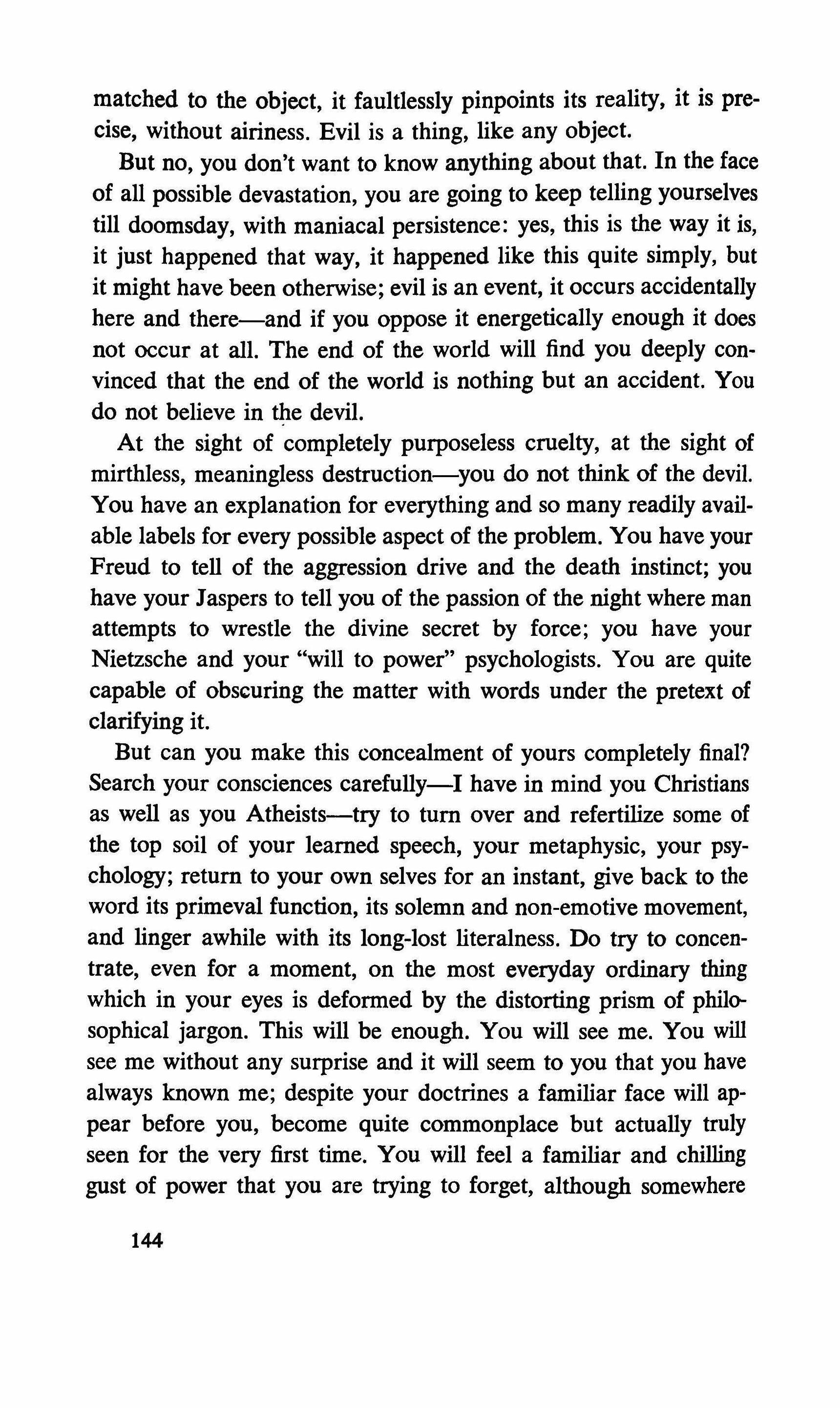
matched to the object, it faultlessly pinpoints its reality, it is precise, without airiness. Evil is a thing, like any object.
But no, you don't want to know anything about that. In the face of all possible devastation, you are going to keep telling yourselves till doomsday, with maniacal persistence: yes, this is the way it is, it just happened that way, it happened like this quite simply, but it might have been otherwise; evil is an event, it occurs accidentally here and there-and if you oppose it energetically enough it does not occur at all. The end of the world will find you deeply convinced that the end of the world is nothing but an accident. You do not believe in the devil.
At the sight of completely purposeless cruelty, at the sight of mirthless, meaningless destruction-you do not think of the devil. You have an explanation for everything and so many readily available labels for every possible aspect of the problem. You have your Freud to tell of the aggression drive and the death instinct; you have your Jaspers to tell you of the passion of the night where man attempts to wrestle the divine secret by force; you have your Nietzsche and your "will to power" psychologists. You are quite capable of obscuring the matter with words under the pretext of clarifying it.
But can you make this concealment of yours completely final? Search your consciences carefully-I have in mind you Christians as well as you Atheists-try to tum over and refertilize some of the top soil of your learned speech, your metaphysic, your psychology; return to your own selves for an instant, give back to the word its primeval function, its solemn and non-emotive movement, and linger awhile with its long-lost literalness. Do try to concentrate, even for a moment, on the most everyday ordinary thing which in your eyes is deformed by the distorting prism of philosophical jargon. This will be enough. You will see me. You will see me without any surprise and it will seem to you that you have always known me; despite your doctrines a familiar face will appear before you, become quite commonplace but actually truly seen for the very first time. You will feel a familiar and chilling gust of power that you are trying to forget, although somewhere
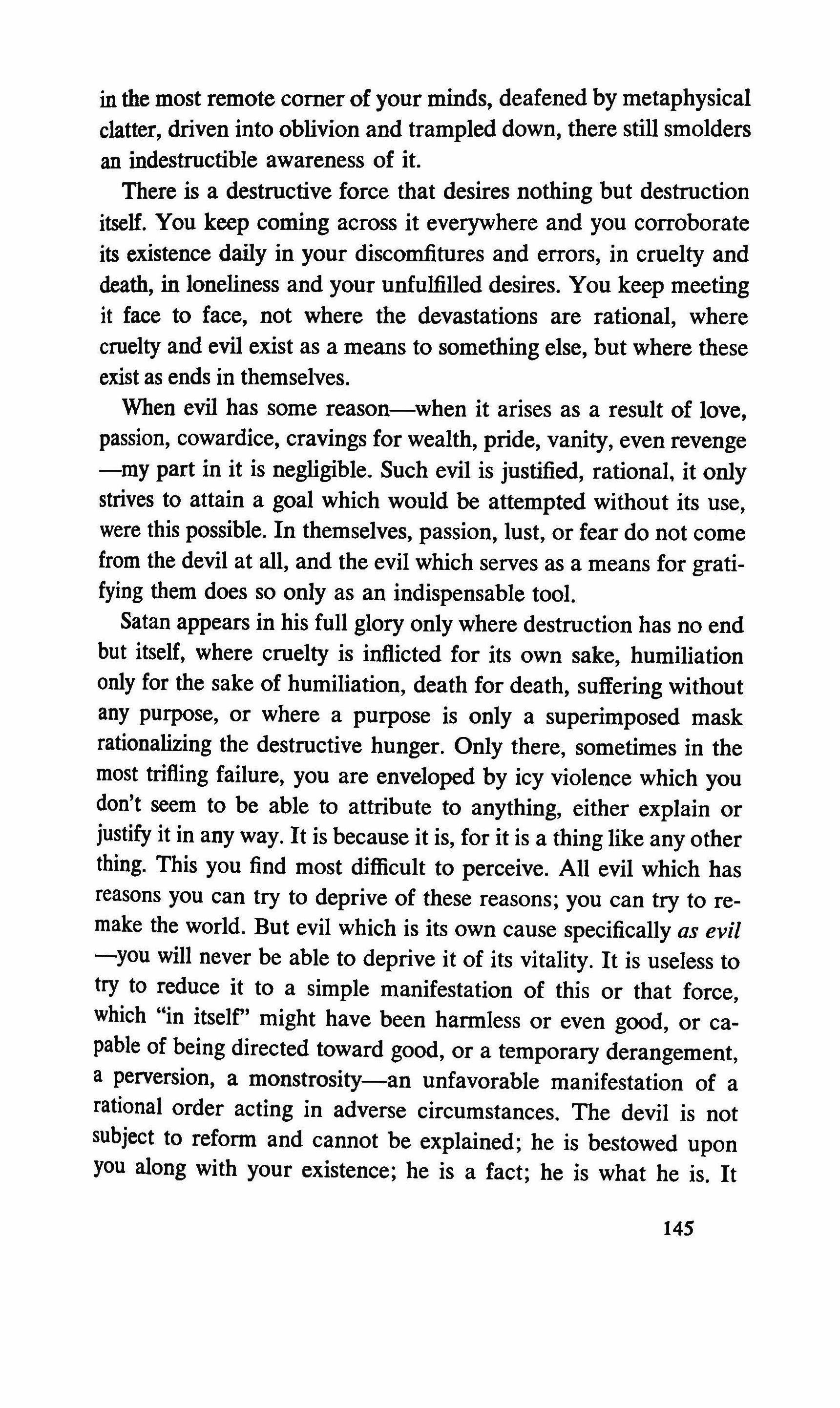
in the most remote comer of your minds, deafened by metaphysical clatter, driven into oblivion and trampled down, there still smolders an indestructible awareness of it.
There is a destructive force that desires nothing but destruction itself. You keep coming across it everywhere and you corroborate its existence daily in your discomfitures and errors, in cruelty and death, in loneliness and your unfulfilled desires. You keep meeting it face to face, not where the devastations are rational, where cruelty and evil exist as a means to something else, but where these exist as ends in themselves.
When evil has some reason-when it arises as a result of love, passion, cowardice, cravings for wealth, pride, vanity, even revenge -my part in it is negligible. Such evil is justified, rational, it only strives to attain a goal which would be attempted without its use, were this possible. In themselves, passion, lust, or fear do not come from the devil at all, and the evil which serves as a means for gratifying them does so only as an indispensable tool.
Satan appears in his full glory only where destruction has no end but itself, where cruelty is inflicted for its own sake, humiliation only for the sake of humiliation, death for death, suffering without any purpose, or where a purpose is only a superimposed mask rationalizing the destructive hunger. Only there, sometimes in the most trifling failure, you are enveloped by icy violence which you don't seem to be able to attribute to anything, either explain or justify it in any way. It is because it is, for it is a thing like any other thing. This you find most difficult to perceive. All evil which has reasons you can try to deprive of these reasons; you can try to remake the world. But evil which is its own cause specifically as evil -you will never be able to deprive it of its vitality. It is useless to try to reduce it to a simple manifestation of this or that force, which "in itself" might have been harmless or even good, or capable of being directed toward good, or a temporary derangement, a perversion, a monstrosity-an unfavorable manifestation of a rational order acting in adverse circumstances. The devil is not subject to reform and cannot be explained; he is bestowed upon you along with your existence; he is a fact; he is what he is. It

may seem strange that in a world where you so persistently try to pick out (or shall I say impose upon it) an order concealed in the amalgamation of chance occurrences, evil continues to appear to you as a sort of fact or irregularity-and irregularity is invariably intrinsic in every fact-and that you deny any inevitable quality to it, and in consequence, instead of including it in your image of earthly realities, you treat it with the concrete spirit of aesthetics. Perhaps it is not odd after all; you have your reasons for this masquerade which liberates you from the devil and thus does not restrain your practical energies which otherwise would be hindered by the realization of their fundamental limitations.
In this way, your knowledge of the world and hope for using this knowledge to improve it can move ahead pari passu, stubbornly deluded in feeling justified in treating evil as a number of dwindling rifts in an essentially good and well-ordered world.
But enough of this. I have decided not to delve into metaphysical realms, where I could in no way ever hope to surmount your chimerical prejudices; in the meantime, quite needlessly, I have let this, that, and the other slip out. In closing, I am ready for questions, but I must emphasize that contrary to popular opinion, the devil is completely devoid of any sense of humor; also, he is not intelligent, if by intelligence one is to understand the ability to deftly grasp and order the world's interesting qualities-it should be quite clear that I have no need of ordering anything and that I cannot have any analogical qualities, just as a stone cannot be more or less stony.
I repeat the first question: if the devil is a constituent of being, is one to treat the story of the angel's fall as legend and rather to suppose that the alleged fallen angel in actual fact is God's secular rival?
I shall reply immediately: no. The story of the angel's fall is absolutely authentic, but this does not imply that evil has the nature of a mere fact and does not belong to the very structure of being. In order to realize this fully it would suffice to take into account the absolute irreversibility of that fact-not in the sense in which every fact which has taken place is irreversible but that this
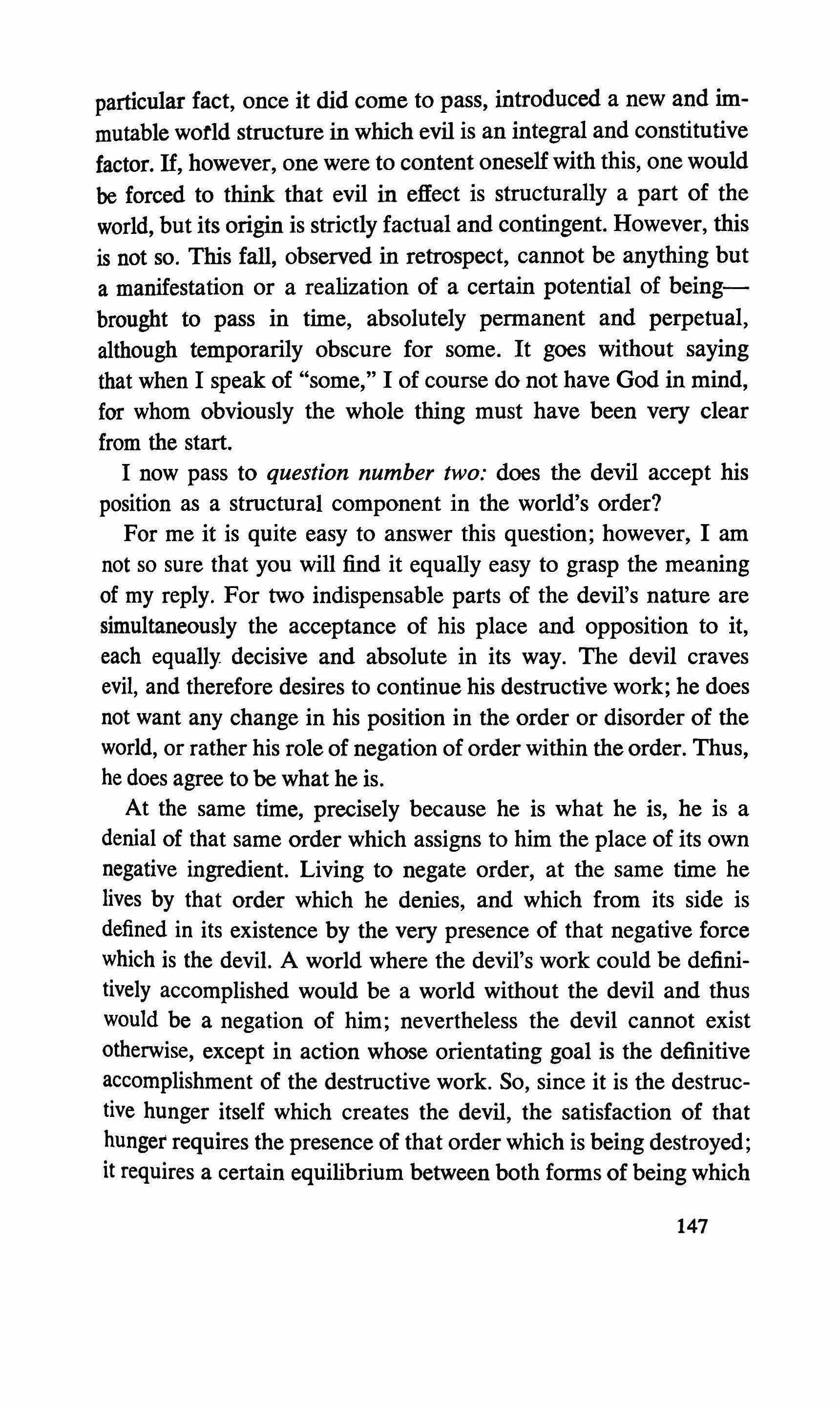
particular fact, once it did come to pass, introduced a new and immutable world structure in which evil is an integral and constitutive factor. If, however, one were to content oneself with this, one would be forced to think: that evil in effect is structurally a part of the world, but its origin is strictly factual and contingent. However, this is not so. This fall, observed in retrospect, cannot be anything but a manifestation or a realization of a certain potential of beingbrought to pass in time, absolutely permanent and perpetual, although temporarily obscure for some. It goes without saying that when I speak of "some," I of course do not have God in mind, for whom obviously the whole thing must have been very clear from the start.
I now pass to question number two: does the devil accept his position as a structural component in the world's order?
For me it is quite easy to answer this question; however, I am not so sure that you will find it equally easy to grasp the meaning of my reply. For two indispensable parts of the devil's nature are simultaneously the acceptance of his place and opposition to it, each equally decisive and absolute in its way. The devil craves evil, and therefore desires to continue his destructive work; he does not want any change in his position in the order or disorder of the world, or rather his role of negation of order within the order. Thus, he does agree to be what he is.
At the same time, precisely because he is what he is, he is a denial of that same order which assigns to him the place of its own negative ingredient. Living to negate order, at the same time he lives by that order which he denies, and which from its side is defined in its existence by the very presence of that negative force which is the devil. A world where the devil's work could be definitively accomplished would be a world without the devil and thus would be a negation of him; nevertheless the devil cannot exist otherwise, except in action whose orientating goal is the definitive accomplishment of the destructive work. So, since it is the destructive hunger itself which creates the devil, the satisfaction of that hunger requires the presence of that order which is being destroyed; it requires a certain equilibrium between both forms of being which
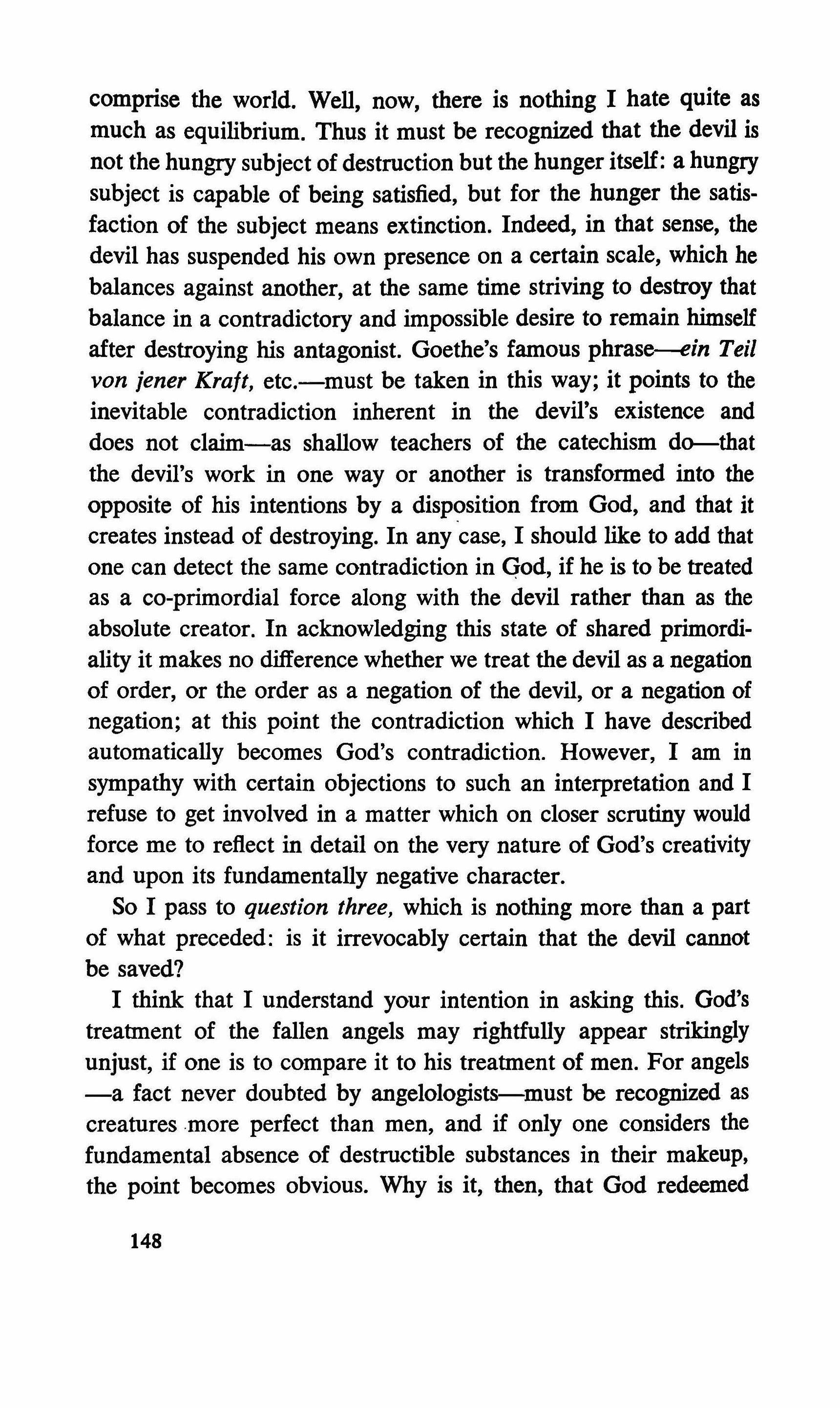
comprise the world. Well, now, there is nothing I hate quite as much as equilibrium. Thus it must be recognized that the devil is not the hungry subject of destruction but the hunger itself: a hungry subject is capable of being satisfied, but for the hunger the satisfaction of the subject means extinction. Indeed, in that sense, the devil has suspended his own presence on a certain scale, which he balances against another, at the same time striving to destroy that balance in a contradictory and impossible desire to remain himself after destroying his antagonist. Goethe's famous phrase--ein Teil von jener Kraft, etc.-must be taken in this way; it points to the inevitable contradiction inherent in the devil's existence and does not claim-as shallow teachers of the catechism do--that the devil's work in one way or another is transformed into the opposite of his intentions by a disposition from God, and that it creates instead of destroying. In any case, I should like to add that one can detect the same contradiction in God, if he is to be treated as a co-primordial force along with the devil rather than as the absolute creator. In acknowledging this state of shared primordiality it makes no difference whether we treat the devil as a negation of order, or the order as a negation of the devil, or a negation of negation; at this point the contradiction which I have described automatically becomes God's contradiction. However, I am in sympathy with certain objections to such an interpretation and I refuse to get involved in a matter which on closer scrutiny would force me to reflect in detail on the very nature of God's creativity and upon its fundamentally negative character.
So I pass to question three, which is nothing more than a part of what preceded: is it irrevocably certain that the devil cannot be saved?
I think that I understand your intention in asking this. God's treatment of the fallen angels may rightfully appear strikingly unjust, if one is to compare it to his treatment of men. For angels -a fact never doubted by angelologists-must be recognized as creatures .more perfect than men, and if only one considers the fundamental absence of destructible substances in their makeup, the point becomes obvious. Why is it, then, that God redeemed
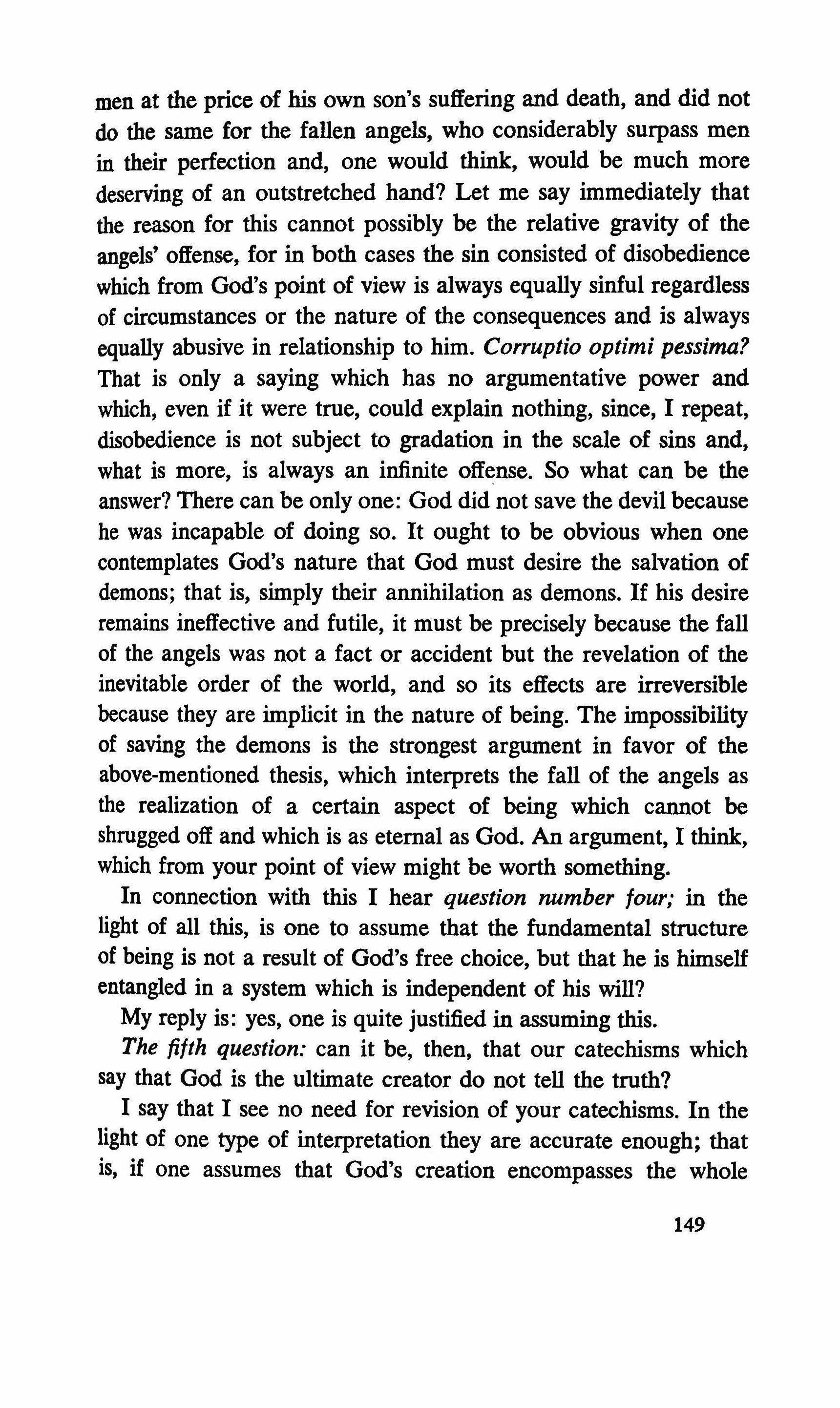
men at the price of his own son's suffering and death, and did not do the same for the fallen angels, who considerably surpass men in their perfection and, one would think, would be much more deserving of an outstretched hand? Let me say immediately that the reason for this cannot possibly be the relative gravity of the angels' offense, for in both cases the sin consisted of disobedience which from God's point of view is always equally sinful regardless of circumstances or the nature of the consequences and is always equally abusive in relationship to him. Corruptio optimi pessimal That is only a saying which has no argumentative power and which, even if it were true, could explain nothing, since, I repeat, disobedience is not subject to gradation in the scale of sins and, what is more, is always an infinite offense. So what can be the answer? There can be only one: God did not save the devil because he was incapable of doing so. It ought to be obvious when one contemplates God's nature that God must desire the salvation of demons; that is, simply their annihilation as demons. If his desire remains ineffective and futile, it must be precisely because the fall of the angels was not a fact or accident but the revelation of the inevitable order of the world, and so its effects are irreversible because they are implicit in the nature of being. The impossibility of saving the demons is the strongest argument in favor of the above-mentioned thesis, which interprets the fall of the angels as the realization of a certain aspect of being which cannot be shrugged off and which is as eternal as God. An argument, I think, which from your point of view might be worth something.
In connection with this I hear question number four; in the light of all this, is one to assume that the fundamental structure of being is not a result of God's free choice, but that he is himself entangled in a system which is independent of his will?
My reply is: yes, one is quite justified in assuming this.
The fifth question: can it be, then, that our catechisms which say that God is the ultimate creator do not tell the truth?
I say that I see no need for revision of your catechisms. In the light of one type of interpretation they are accurate enough; that is, if one assumes that God's creation encompasses the whole
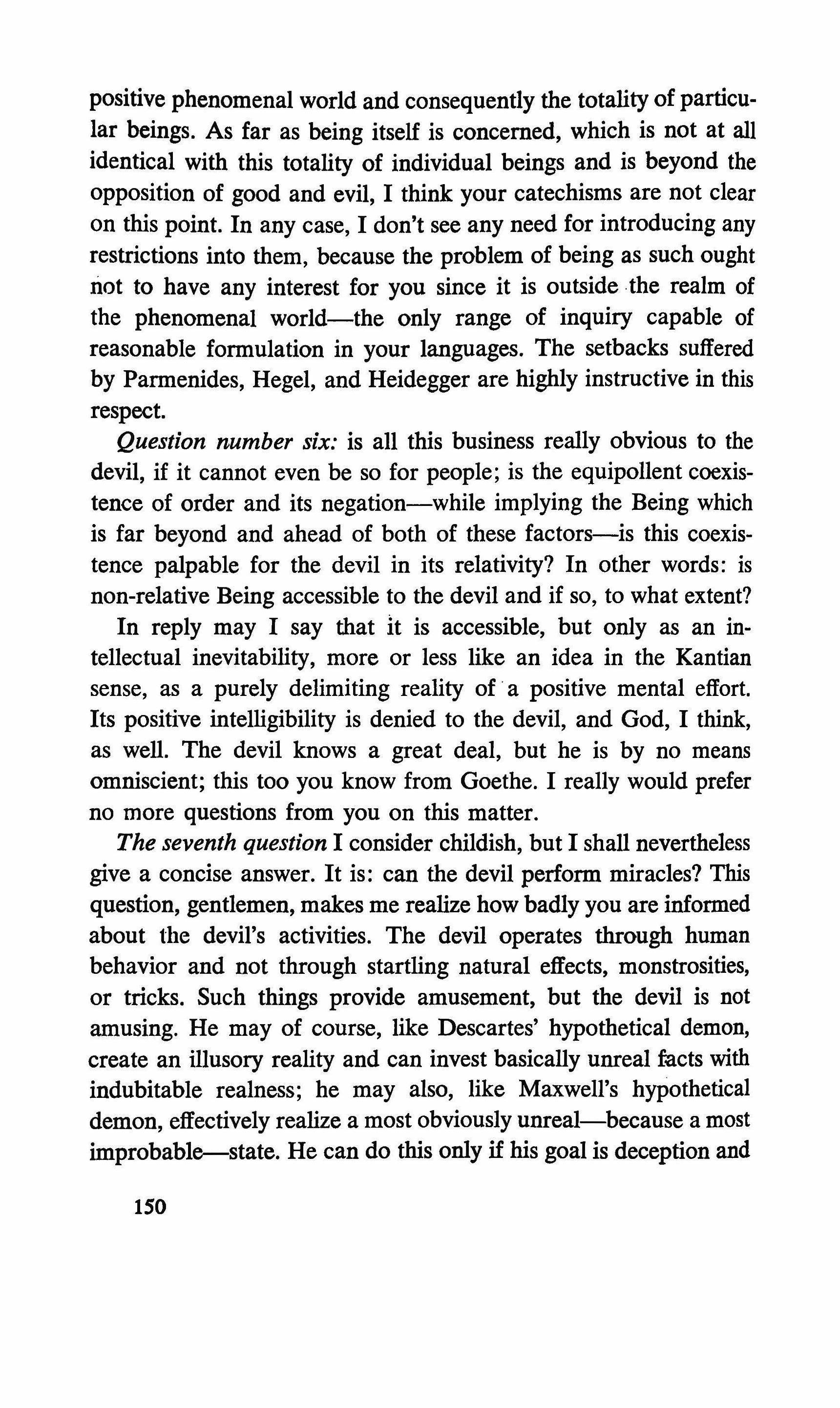
positive phenomenal world and consequently the totality of particular beings. As far as being itself is concerned, which is not at all identical with this totality of individual beings and is beyond the opposition of good and evil, I think your catechisms are not clear on this point. In any case, I don't see any need for introducing any restrictions into them, because the problem of being as such ought not to have any interest for you since it is outsidethe realm of the phenomenal world-the only range of inquiry capable of reasonable formulation in your languages. The setbacks suffered by Parmenides, Hegel, and Heidegger are highly instructive in this respect.
Question number six: is all this business really obvious to the devil, if it cannot even be so for people; is the equipollent coexistence of order and its negation-while implying the Being which is far beyond and ahead of both of these factors-is this coexistence palpable for the devil in its relativity? In other words: is non-relative Being accessible to the devil and if so, to what extent?
In reply may I say that It is accessible, but only as an intellectual inevitability, more or less like an idea in the Kantian sense, as a purely delimiting reality of a positive mental effort. Its positive intelligibility is denied to the devil, and God, I think, as well. The devil knows a great deal, but he is by no means omniscient; this too you know from Goethe. I really would prefer no more questions from you on this matter.
The seventh question I consider childish, but I shall nevertheless give a concise answer. It is: can the devil perform miracles? This question, gentlemen, makes me realize how badly you are informed about the devil's activities. The devil operates through human behavior and not through startling natural effects, monstrosities, or tricks. Such things provide amusement, but the devil is not amusing. He may of course, like Descartes' hypothetical demon, create an illusory reality and can invest basically unreal facts with indubitable realness; he may also, like Maxwell's hypothetical demon, effectively realize a most obviously unreal-because a most improbable-state. He can do this only if his goal is deception and
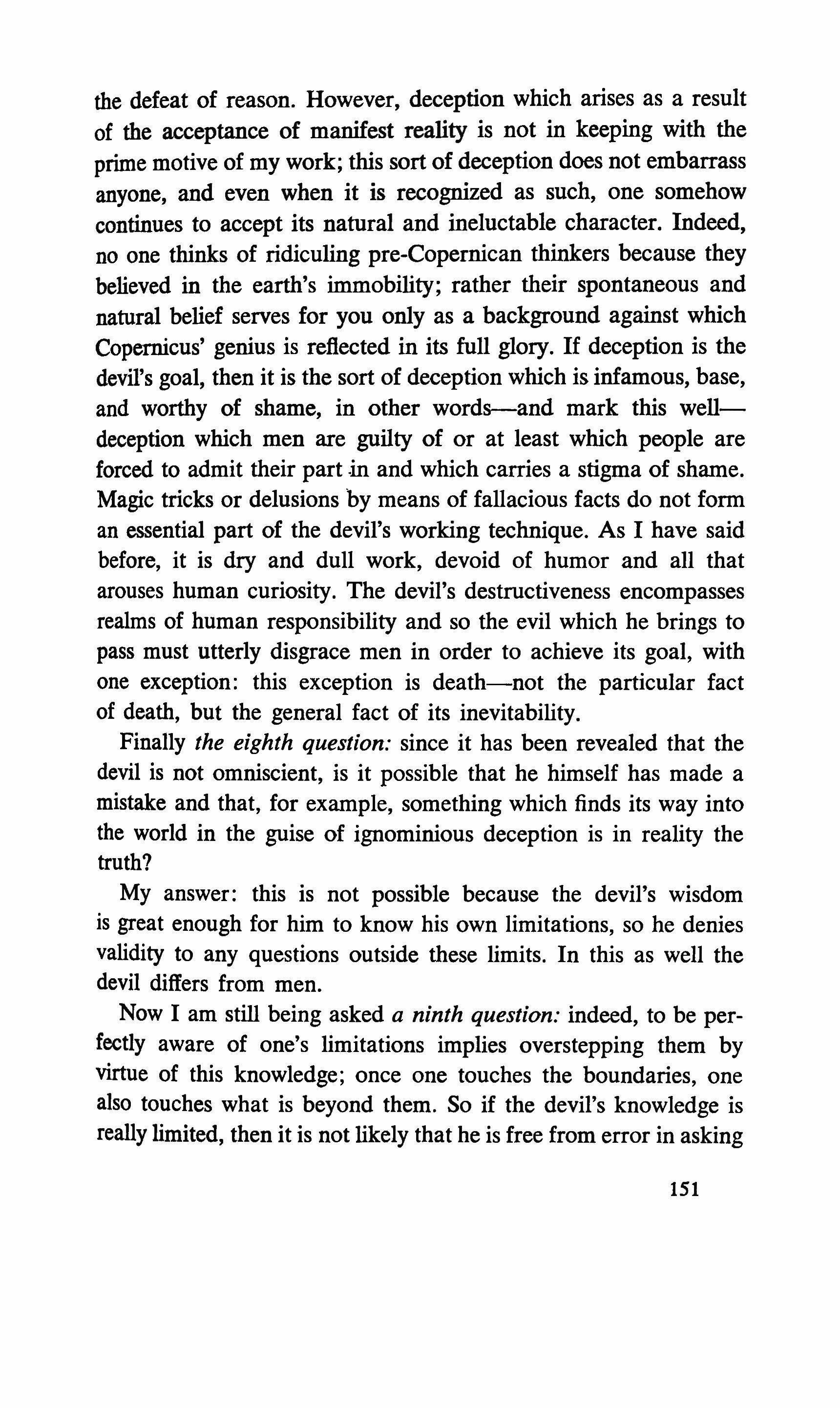
the defeat of reason. However, deception which arises as a result of the acceptance of manifest reality is not in keeping with the prime motive of my work; this sort of deception does not embarrass anyone, and even when it is recognized as such, one somehow continues to accept its natural and ineluctable character. Indeed, no one thinks of ridiculing pre-Copernican thinkers because they believed in the earth's immobility; rather their spontaneous and natural belief serves for you only as a background against which Copernicus' genius is reflected in its full glory. If deception is the devil's goal, then it is the sort of deception which is infamous, base, and worthy of shame, in other words-and mark this welldeception which men are guilty of or at least which people are forced to admit their part .in and which carries a stigma of shame. Magic tricks or delusions by means of fallacious facts do not form an essential part of the devil's working technique. As I have said before, it is dry and dull work, devoid of humor and all that arouses human curiosity. The devil's destructiveness encompasses realms of human responsibility and so the evil which he brings to pass must utterly disgrace men in order to achieve its goal, with one exception: this exception is death-not the particular fact of death, but the general fact of its inevitability.
Finally the eighth question: since it has been revealed that the devil is not omniscient, is it possible that he himself has made a mistake and that, for example, something which finds its way into the world in the guise of ignominious deception is in reality the truth?
My answer: this is not possible because the devil's wisdom is great enough for him to know his own limitations, so he denies validity to any questions outside these limits. In this as well the devil differs from men.
Now I am still being asked a ninth question: indeed, to be perfectly aware of one's limitations implies overstepping them by virtue of this knowledge; once one touches the boundaries, one also touches what is beyond them. So if the devil's knowledge is really limited, then it is not likely that he is free from error in asking
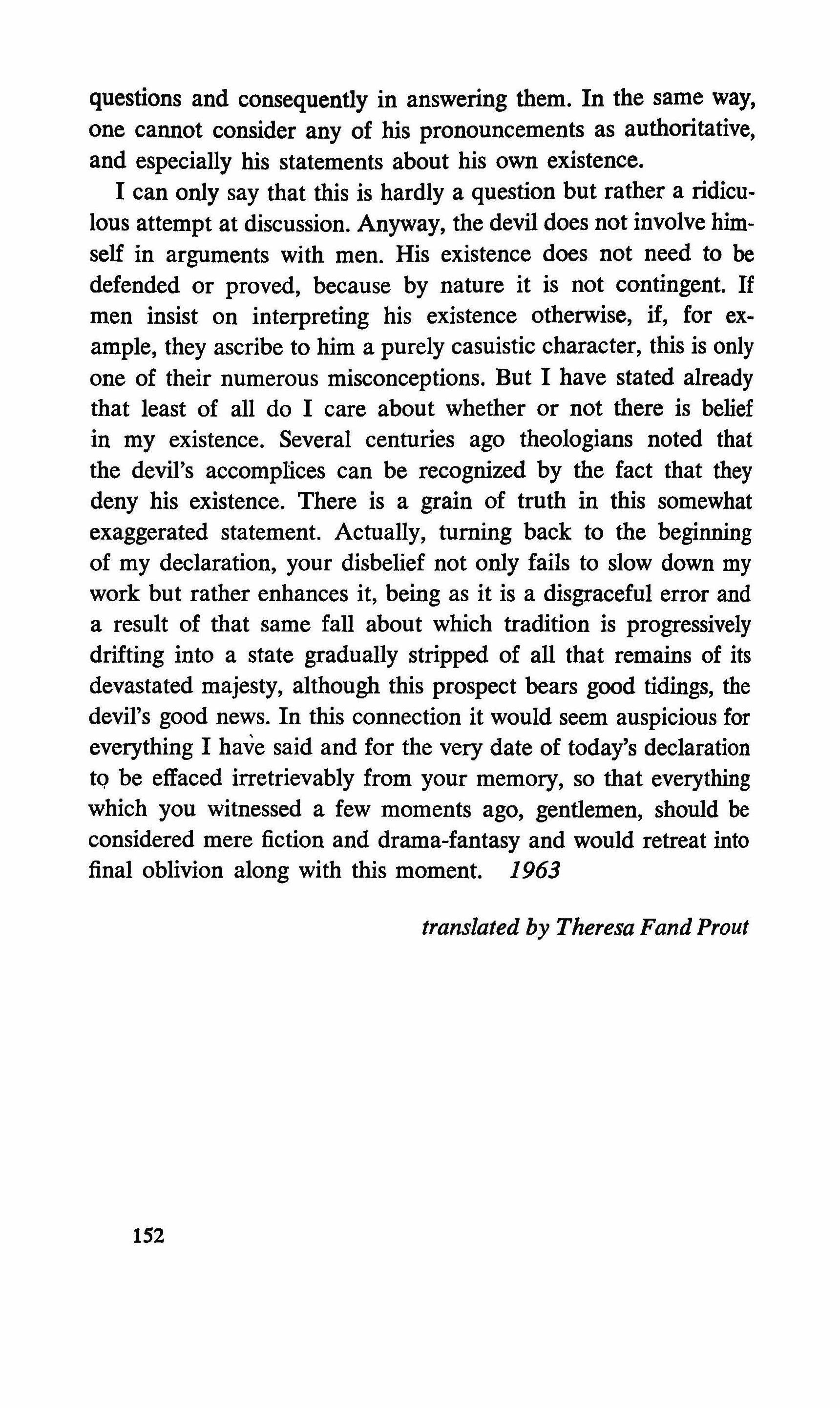
questions and consequently in answering them. In the same way, one cannot consider any of his pronouncements as authoritative, and especially his statements about his own existence.
I can only say that this is hardly a question but rather a ridiculous attempt at discussion. Anyway, the devil does not involve himself in arguments with men. His existence does not need to be defended or proved, because by nature it is not contingent. If men insist on interpreting his existence otherwise, if, for example, they ascribe to him a purely casuistic character, this is only one of their numerous misconceptions. But I have stated already that least of all do I care about whether or not there is belief in my existence. Several centuries ago theologians noted that the devil's accomplices can be recognized by the fact that they deny his existence. There is a grain of truth in this somewhat exaggerated statement. Actually, turning back to the beginning of my declaration, your disbelief not only fails to slow down my work but rather enhances it, being as it is a disgraceful error and a result of that same fall about which tradition is progressively drifting into a state gradually stripped of all that remains of its devastated majesty, although this prospect bears good tidings, the devil's good news. In this connection it would seem auspicious for everything I have said and for the very date of today's declaration to be effaced irretrievably from your memory, so that everything which you witnessed a few moments ago, gentlemen, should be considered mere fiction and drama-fantasy and would retreat into final oblivion along with this moment. 1963
translated by Theresa Fand Prout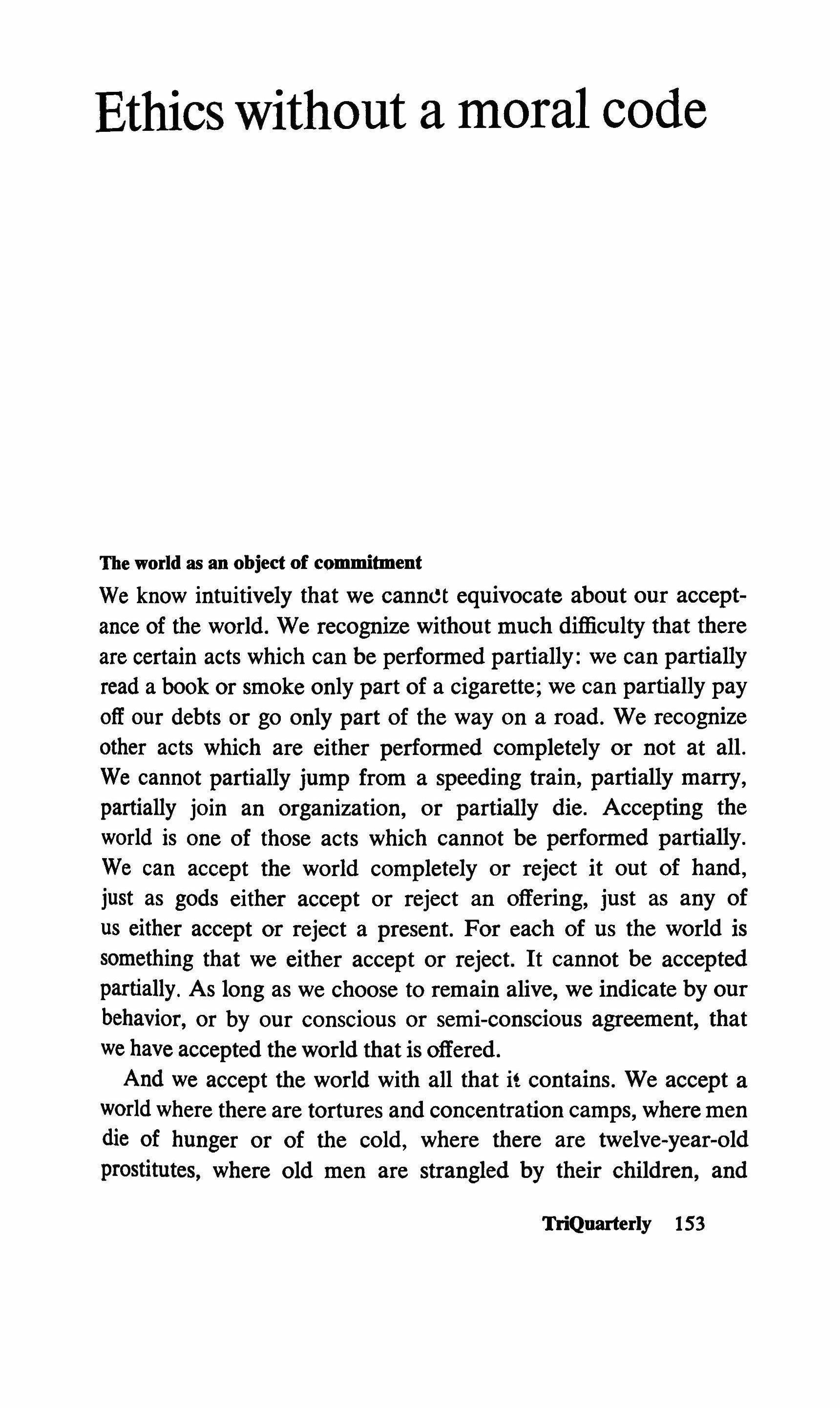
The world as an object of commitment
We know intuitively that we cannot equivocate about our acceptance of the world. We recognize without much difficulty that there are certain acts which can be performed partially: we can partially read a book or smoke only part of a cigarette; we can partially pay off our debts or go only part of the way on a road. We recognize other acts which are either performed completely or not at all. We cannot partially jump from a speeding train, partially marry, partially join an organization, or partially die. Accepting the world is one of those acts which cannot be performed partially. We can accept the world completely or reject it out of hand, just as gods either accept or reject an offering, just as any of us either accept or reject a present. For each of us the world is something that we either accept or reject. It cannot be accepted partially. As long as we choose to remain alive, we indicate by our behavior, or by our conscious or semi-conscious agreement, that we have accepted the world that is offered. And we accept the world with all that it contains. We accept a world where there are tortures and concentration camps, where men die of hunger or of the cold, where there are twelve-year-old prostitutes, where old men are strangled by their children, and
TrlQuarterly 153

where children are mistreated by their parents. We accept the world together with its sufferings, cruelties, shame, anguish, and all the rest. We can accept it no other way, unless we abandon it completely. As long as we live we commit ourselves to the world in which we live.
It by no means follows that we like the painful, stupid, and dreadful sides of the world or that we think that it will remain this way forever. On the contrary, if this banal and trivial observation (and it is trivial in that it articulates an intuition about everyday life) is at all worthy of our attention, it is because it drastically compels us to remember our primeval connection with the world; to remember the obligation which we freely assumed. It forces us to recollect the debt that lies buried at the bottom of our memories.
We accept the terrible sides of the world in the same way that we accept the unpaid debts of an inheritance. We cannot avoid these commitments, and despite our maneuverings, our feigned forgetfulness and ignorance, some debtor is bound to present us with the bills-signed by our esteemed benefactor. The unpleasant surprise spoils our innocent peace.
The world is an inheritance which we receive at birth. At some moment we realize that we have the option of accepting or rejecting the inheritance. We can reject it by rejecting life. From the moment we know that suicide is possible and yet continue to live, we accept the debts of the world as our own. To live is to accept the shame and degradation as our own and to admit that, despite the debts, the inheritance is worth accepting; to admit that, despite the sufferings and swinishness, the world is worthy of our participation. Notwithstanding the hopes of earlier makers of theodicies, we will never be able to calculate the pluses and the minuses, the sum of good and evil in the inherited estate. But we make our own calculations spontaneously, we construct our own private theodicy with which we justify the world and our presence in it.
Somebody may say that this is all nonsense, that we do not live because we choose to live, but because somebody caused us to live or because our purely biological mechanisms prevent us from extinguishing life. In this view, biology would account completely
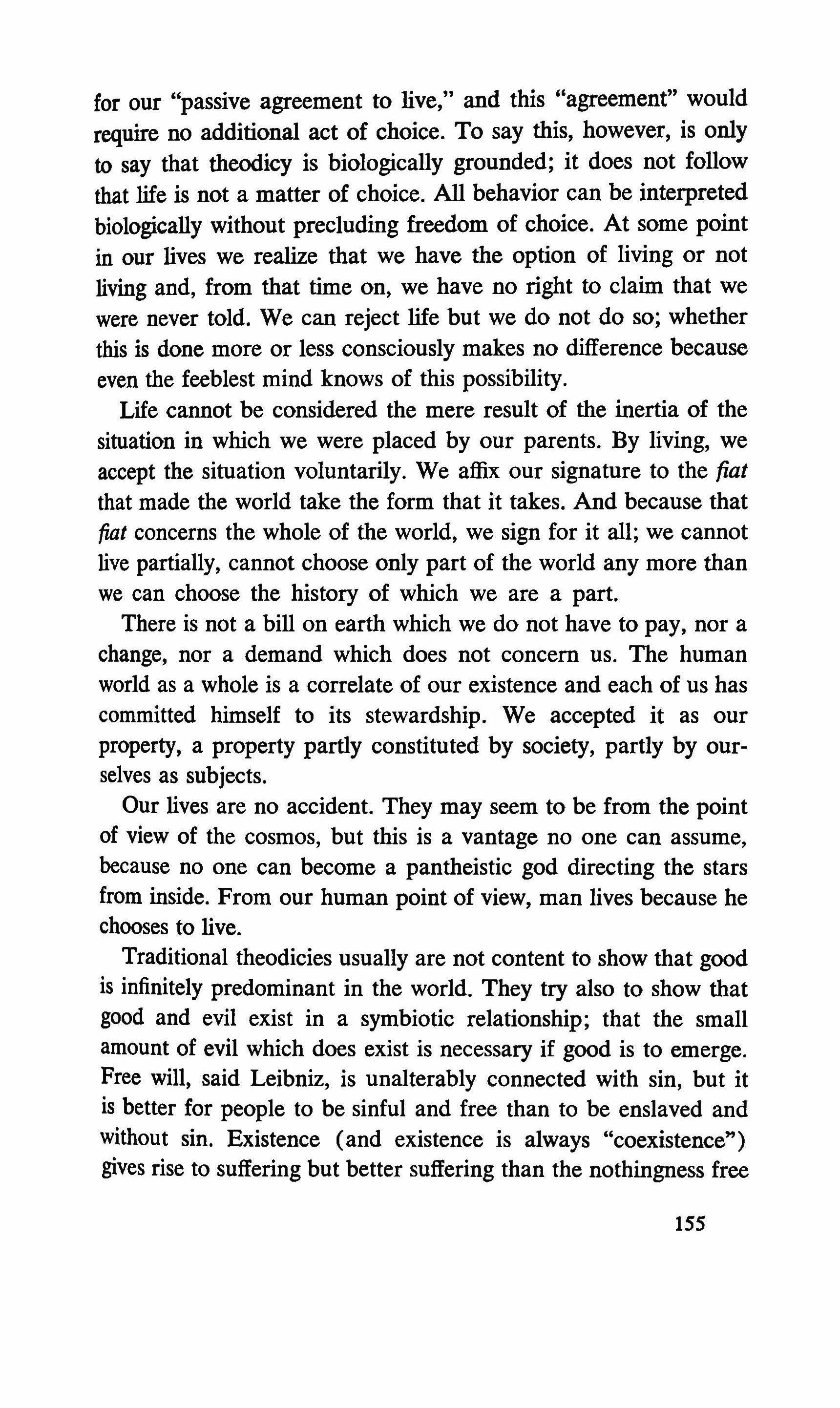
for our "passive agreement to live," and this "agreement" would require no additional act of choice. To say this, however, is only to say that theodicy is biologically grounded; it does not follow that life is not a matter of choice. All behavior can be interpreted biologically without precluding freedom of choice. At some point in our lives we realize that we have the option of living or not living and, from that time on, we have no right to claim that we were never told. We can reject life but we do not do so; whether this is done more or less consciously makes no difference because even the feeblest mind knows of this possibility.
Life cannot be considered the mere result of the inertia of the situation in which we were placed by our parents. By living, we accept the situation voluntarily. We affix our signature to the fiat that made the world take the form that it takes. And because that fiat concerns the whole of the world, we sign for it all; we cannot live partially, cannot choose only part of the world any more than we can choose the history of which we are a part.
There is not a bill on earth which we do not have to pay, nor a change, nor a demand which does not concern us. The human world as a whole is a correlate of our existence and each of us has committed himself to its stewardship. We accepted it as our property, a property partly constituted by society, partly by ourselves as subjects.
Our lives are no accident. They may seem to be from the point of view of the cosmos, but this is a vantage no one can assume, because no one can become a pantheistic god directing the stars from inside. From our human point of view, man lives because he chooses to live.
Traditional theodicies usually are not content to show that good is infinitely predominant in the world. They try also to show that good and evil exist in a symbiotic relationship; that the small amount of evil which does exist is necessary if good is to emerge. Free will, said Leibniz, is unalterably connected with sin, but it is better for people to be sinful and free than to be enslaved and without sin. Existence (and existence is always "coexistence") gives rise to suffering but better suffering than the nothingness free
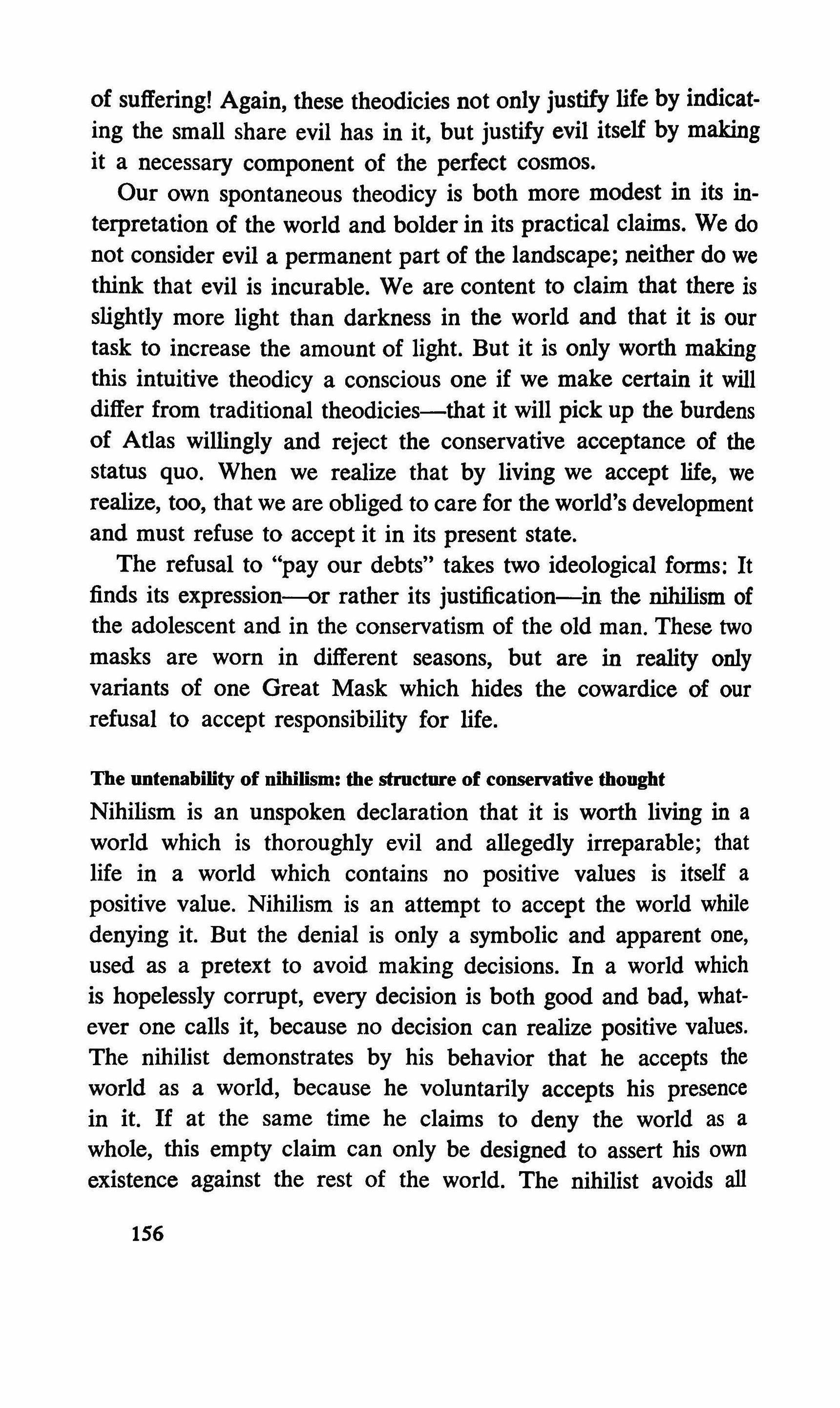
of suffering! Again, these theodicies not only justify life by indicating the small share evil has in it, but justify evil itself by making it a necessary component of the perfect cosmos.
Our own spontaneous theodicy is both more modest in its interpretation of the world and bolder in its practical claims. We do not consider evil a permanent part of the landscape; neither do we think that evil is incurable. We are content to claim that there is slightly more light than darkness in the world and that it is our task to increase the amount of light. But it is only worth making this intuitive theodicy a conscious one if we make certain it will differ from traditional theodicies-that it will pick up the burdens of Atlas willingly and reject the conservative acceptance of the status quo. When we realize that by living we accept life, we realize, too, that we are obliged to care for the world's development and must refuse to accept it in its present state.
The refusal to "pay our debts" takes two ideological forms: It finds its expression-or rather its justification-in the nihilism of the adolescent and in the conservatism of the old man. These two masks are worn in different seasons, but are in reality only variants of one Great Mask which hides the cowardice of our refusal to accept responsibility for life.
The untenability of nihilism: the structure of conservative thought
Nihilism is an unspoken declaration that it is worth living in a world which is thoroughly evil and allegedly irreparable; that life in a world which contains no positive values is itself a positive value. Nihilism is an attempt to accept the world while denying it. But the denial is only a symbolic and apparent one, used as a pretext to avoid making decisions. In a world which is hopelessly corrupt, every decision is both good and bad, whatever one calls it, because no decision can realize positive values. The nihilist demonstrates by his behavior that he accepts the world as a world, because he voluntarily accepts his presence in it. If at the same time he claims to deny the world as a whole, this empty claim can only be designed to assert his own existence against the rest of the world. The nihilist avoids all
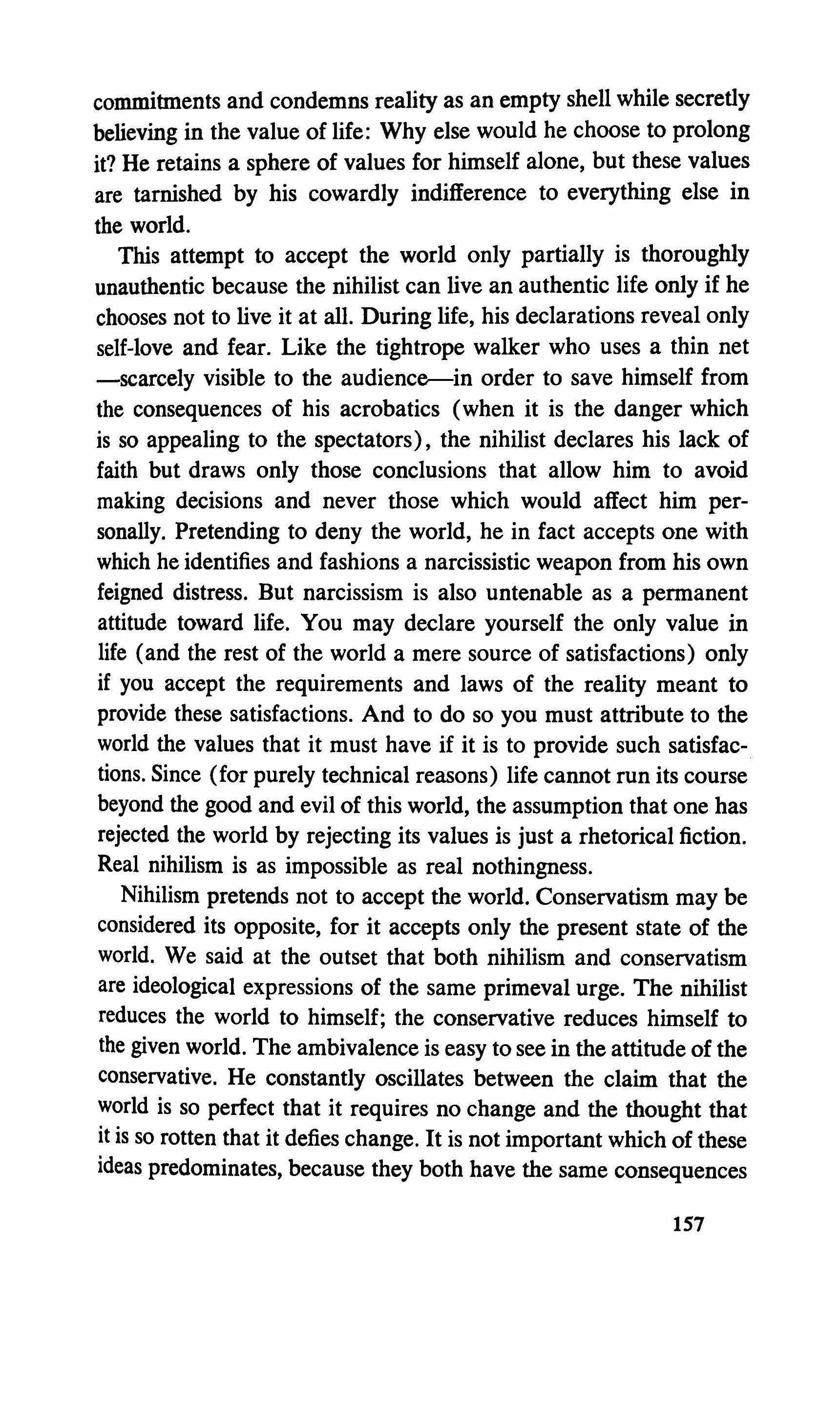
commitments and condemns reality as an empty shell while secretly believing in the value of life: Why else would he choose to prolong it? He retains a sphere of values for himself alone, but these values are tarnished by his cowardly indifference to everything else in the world.
This attempt to accept the world only partially is thoroughly unauthentic because the nihilist can live an authentic life only if he chooses not to live it at all. During life, his declarations reveal only self-love and fear. Like the tightrope walker who uses a thin net -scarcely visible to the audience--in order to save himself from the consequences of his acrobatics (when it is the danger which is so appealing to the spectators), the nihilist declares his lack of faith but draws only those conclusions that allow him to avoid making decisions and never those which would affect him personally. Pretending to deny the world, he in fact accepts one with which he identifies and fashions a narcissistic weapon from his own feigned distress. But narcissism is also untenable as a permanent attitude toward life. You may declare yourself the only value in life (and the rest of the world a mere source of satisfactions) only if you accept the requirements and laws of the reality meant to provide these satisfactions. And to do so you must attribute to the world the values that it must have if it is to provide such satisfactions. Since (for purely technical reasons) life cannot run its course beyond the good and evil of this world, the assumption that one has rejected the world by rejecting its values is just a rhetorical fiction. Real nihilism is as impossible as real nothingness.
Nihilism pretends not to accept the world. Conservatism may be considered its opposite, for it accepts only the present state of the world. We said at the outset that both nihilism and conservatism are ideological expressions of the same primeval urge. The nihilist reduces the world to himself; the conservative reduces himself to the given world. The ambivalence is easy to see in the attitude of the conservative. He constantly oscillates between the claim that the world is so perfect that it requires no change and the thought that it is so rotten that it defies change. It is not important which of these ideas predominates, because they both have the same consequences

in practice. It is important, however, to note that the conservative who thinks that the world is hopelessly corrupt means by this something quite different from the nihilist. He does not mean to say that the world contains no positive values but only that they have all been realized. He uses his conviction that the world is somehow "frozen" in its crippled state to protest against all reform; for he thinks this evil world is not only the best of all possible worlds but that it has realized its highest values.
This ambivalence is best seen by recalling the conservative critiques of socialist ideas. "You want heaven on earth," says the conservative, "but love and death are inescapable sources of suffering and you can eliminate neither of them. Hence your ideal of heaven on earth is a fiction and not worth the effort." That at least is an approximation of Nikolai Berdiaev's criticism of socialism. With the help of some rather dubious logic, the conservative deduces from the unavoidable nature of certain kinds of human suffering the futility of doing battle with any evil or suffering. The argument that "the world can never become heaven, hence there is no need to repair it" is not an argument at all and betrays the real tendency of conservative thought. The conservatives, like the authors of earlier theodicies, are certain that all good has been realized in the world; that while evil is indeed evil, it cannot be eliminated, and each change that takes place is a change for the worse.
The conservative does not identify himself with reality as a whole, only with those aspects of its past in which he sees his own values. And these values are for the most part ones which have survived from the past. They are characterized by their permanence. On the other hand, because the conservative can make sense of new phenomena only by reducing them to ones which he already knows, because he assimilates the world using schemata which he has inherited, he must attribute some permanence to evil. In this respect, the polemics between the orthodox and the heretics during the heroic epoch of Christianity (i.e., during the Reformation and the Counter-reformation) are very instructive. The orthodox Christian boasts about his roots in ancient tradition, frequently
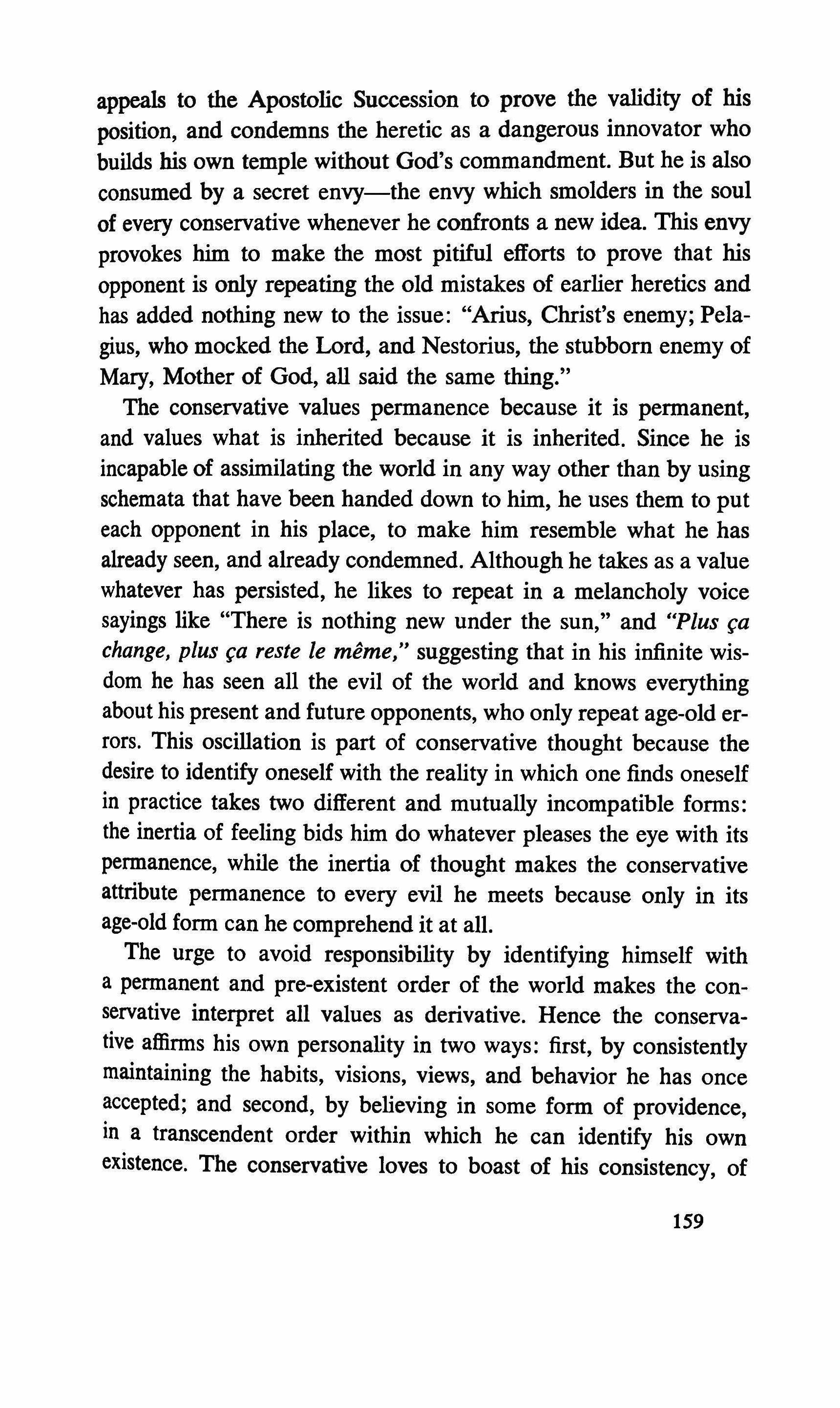
appeals to the Apostolic Succession to prove the validity of his position, and condemns the heretic as a dangerous innovator who builds his own temple without God's commandment. But he is also consumed by a secret envy-the envy which smolders in the soul of every conservative whenever he confronts a new idea. This envy provokes him to make the most pitiful efforts to prove that his opponent is only repeating the old mistakes of earlier heretics and has added nothing new to the issue: "Arius, Christ's enemy; Pelagius, who mocked the Lord, and Nestorius, the stubborn enemy of Mary, Mother of God, all said the same thing."
The conservative values permanence because it is permanent, and values what is inherited because it is inherited. Since he is incapable of assimilating the world in any way other than by using schemata that have been handed down to him, he uses them to put each opponent in his place, to make him resemble what he has already seen, and already condemned. Although he takes as a value whatever has persisted, he likes to repeat in a melancholy voice sayings like "There is nothing new under the sun," and "Plus ca change, plus ca reste Ie meme;" suggesting that in his infinite wisdom he has seen all the evil of the world and knows everything about his present and future opponents, who only repeat age-old errors. This oscillation is part of conservative thought because the desire to identify oneself with the reality in which one finds oneself in practice takes two different and mutually incompatible forms: the inertia of feeling bids him do whatever pleases the eye with its permanence, while the inertia of thought makes the conservative attribute permanence to every evil he meets because only in its age-old form can he comprehend it at all.
The urge to avoid responsibility by identifying himself with a permanent and pre-existent order of the world makes the conservative interpret all values as derivative. Hence the conservative affirms his own personality in two ways: first, by consistently maintaining the habits, visions, views, and behavior he has once accepted; and second, by believing in some form of providence, in a transcendent order within which he can identify his own existence. The conservative loves to boast of his consistency, of
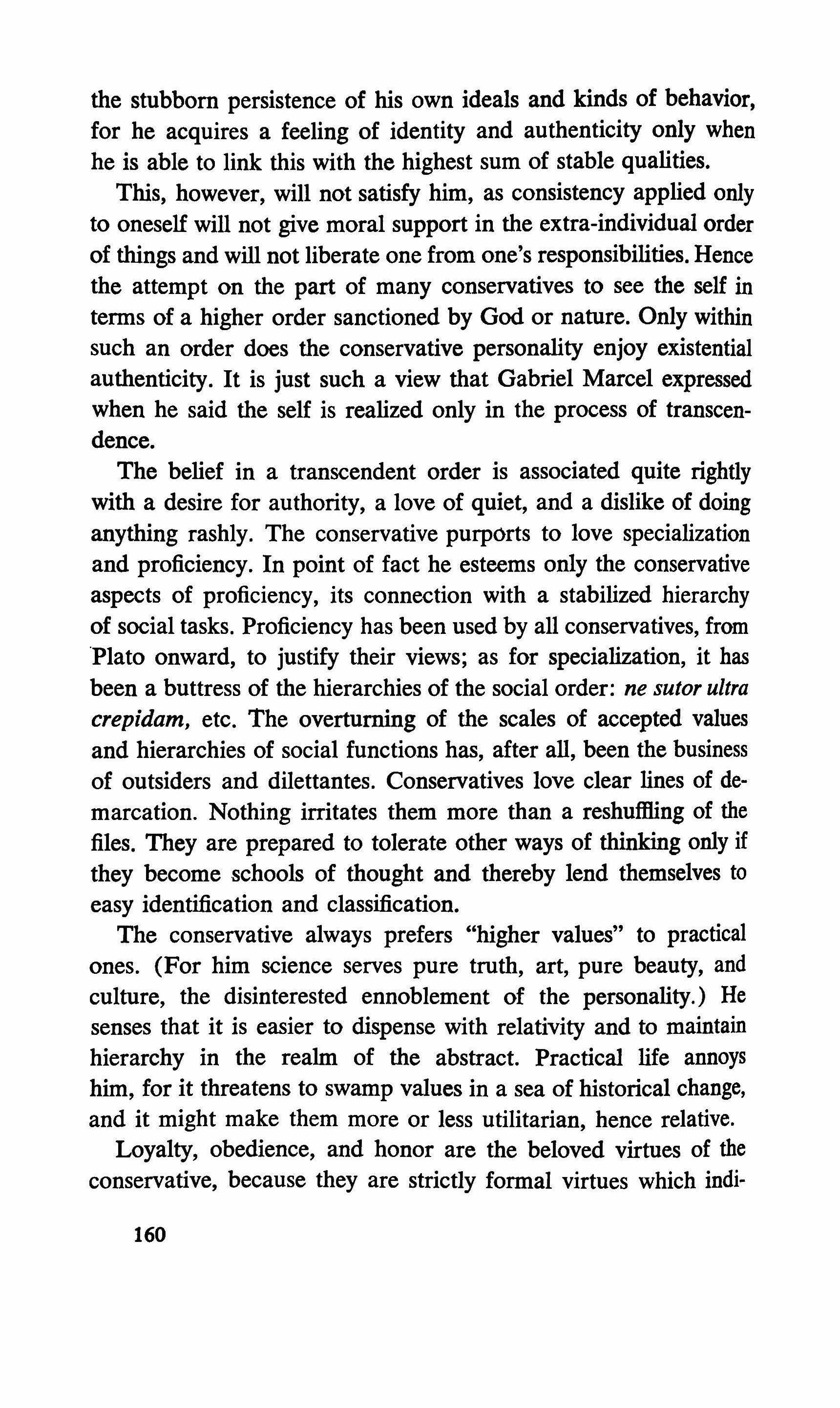
the stubborn persistence of his own ideals and kinds of behavior, for he acquires a feeling of identity and authenticity only when he is able to link this with the highest sum of stable qualities. This, however, will not satisfy him, as consistency applied only to oneself will not give moral support in the extra-individual order of things and will not liberate one from one's responsibilities. Hence the attempt on the part of many conservatives to see the self in terms of a higher order sanctioned by God or nature. Only within such an order does the conservative personality enjoy existential authenticity. It is just such a view that Gabriel Marcel expressed when he said the self is realized only in the process of transcendence.
The belief in a transcendent order is associated quite rightly with a desire for authority, a love of quiet, and a dislike of doing anything rashly. The conservative purports to love specialization and proficiency. In point of fact he esteems only the conservative aspects of proficiency, its connection with a stabilized hierarchy of social tasks. Proficiency has been used by all conservatives, from Plato onward, to justify their views; as for specialization, it has been a buttress of the hierarchies of the social order: ne sutor ultra crepidam, etc. The overturning of the scales of accepted values and hierarchies of social functions has, after all, been the business of outsiders and dilettantes. Conservatives love clear lines of demarcation. Nothing irritates them more than a reshufHing of the files. They are prepared to tolerate other ways of thinking only if they become schools of thought and thereby lend themselves to easy identification and classification.
The conservative always prefers "higher values" to practical ones. (For him science serves pure truth, art, pure beauty, and culture, the disinterested ennoblement of the personality.) He senses that it is easier to dispense with relativity and to maintain hierarchy in the realm of the abstract. Practical life annoys him, for it threatens to swamp values in a sea of historical change, and it might make them more or less utilitarian, hence relative.
Loyalty, obedience, and honor are the beloved virtues of the conservative, because they are strictly formal virtues which indi-
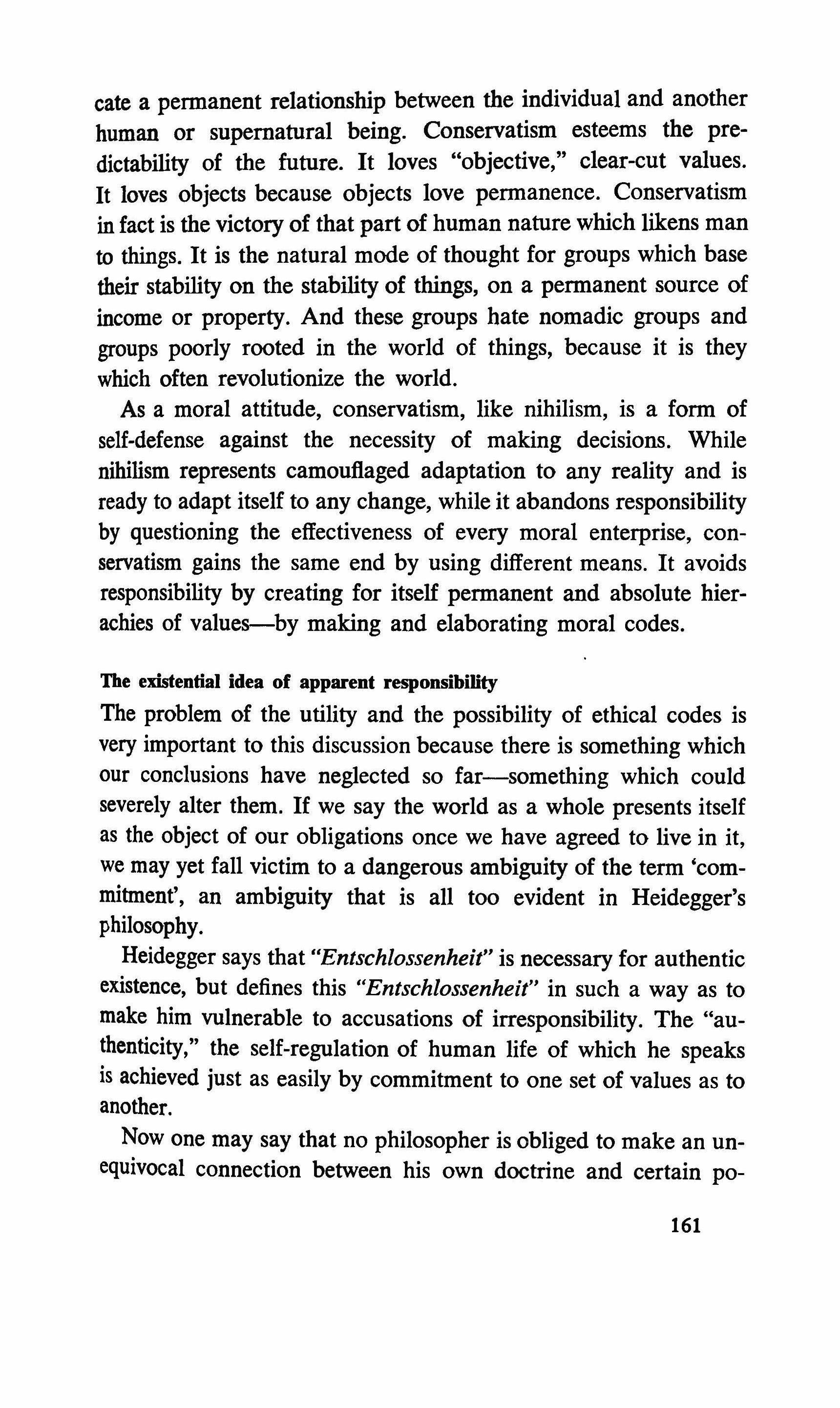
cate a permanent relationship between the individual and another human or supernatural being. Conservatism esteems the predictability of the future. It loves "objective," clear-cut values. It loves objects because objects love permanence. Conservatism in fact is the victory of that part of human nature which likens man to things. It is the natural mode of thought for groups which base their stability on the stability of things, on a permanent source of income or property. And these groups hate nomadic groups and groups poorly rooted in the world of things, because it is they which often revolutionize the world.
As a moral attitude, conservatism, like nihilism, is a form of self-defense against the necessity of making decisions. While nihilism represents camouflaged adaptation to any reality and is ready to adapt itself to any change, while it abandons responsibility by questioning the effectiveness of every moral enterprise, conservatism gains the same end by using different means. It avoids responsibility by creating for itself permanent and absolute hierachies of values--by making and elaborating moral codes.
The existential idea of apparent responsibility
The problem of the utility and the possibility of ethical codes is very important to this discussion because there is something which our conclusions have neglected so far-something which could severely alter them. If we say the world as a whole presents itself as the object of our obligations once we have agreed to live in it, we may yet fall victim to a dangerous ambiguity of the term 'commitment', an ambiguity that is all too evident in Heidegger's philosophy.
Heidegger says that "Entschlossenheit" is necessary for authentic existence, but defines this "Entschlossenheit" in such a way as to make him vulnerable to accusations of irresponsibility. The "authenticity," the self-regulation of human life of which he speaks is achieved just as easily by commitment to one set of values as to another.
Now one may say that no philosopher is obliged to make an unequivocal connection between his own doctrine and certain po-
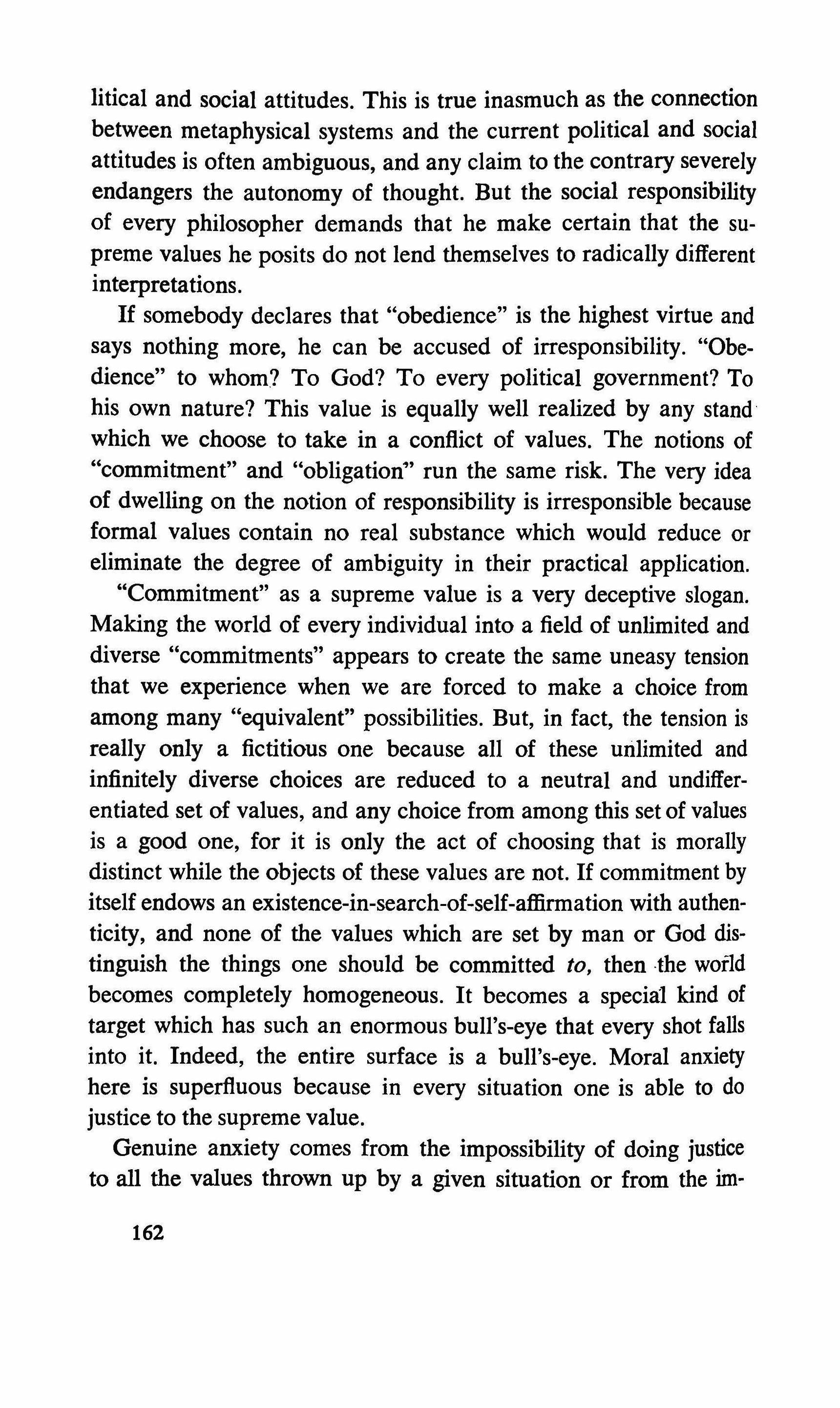
litical and social attitudes. This is true inasmuch as the connection between metaphysical systems and the current political and social attitudes is often ambiguous, and any claim to the contrary severely endangers the autonomy of thought. But the social responsibility of every philosopher demands that he make certain that the supreme values he posits do not lend themselves to radically different interpretations.
If somebody declares that "obedience" is the highest virtue and says nothing more, he can be accused of irresponsibility. "Obedience" to whom? To God? To every political government? To his own nature? This value is equally well realized by any stand which we choose to take in a conflict of values. The notions of "commitment" and "obligation" run the same risk. The very idea of dwelling on the notion of responsibility is irresponsible because formal values contain no real substance which would reduce or eliminate the degree of ambiguity in their practical application. "Commitment" as a supreme value is a very deceptive slogan. Making the world of every individual into a field of unlimited and diverse "commitments" appears to create the same uneasy tension that we experience when we are forced to make a choice from among many "equivalent" possibilities. But, in fact, the tension is really only a fictitious one because all of these unlimited and infinitely diverse choices are reduced to a neutral and undifferentiated set of values, and any choice from among this set of values is a good one, for it is only the act of choosing that is morally distinct while the objects of these values are not. If commitment by itself endows an existence-in-search-of-self-affirmation with authenticity, and none of the values which are set by man or God distinguish the things one should be committed to, then ·the world becomes completely homogeneous. It becomes a special kind of target which has such an enormous bull's-eye that every shot falls into it. Indeed, the entire surface is a bull's-eye. Moral anxiety here is superfluous because in every situation one is able to do justice to the supreme value.
Genuine anxiety comes from the impossibility of doing justice to all the values thrown up by a given situation or from the im-
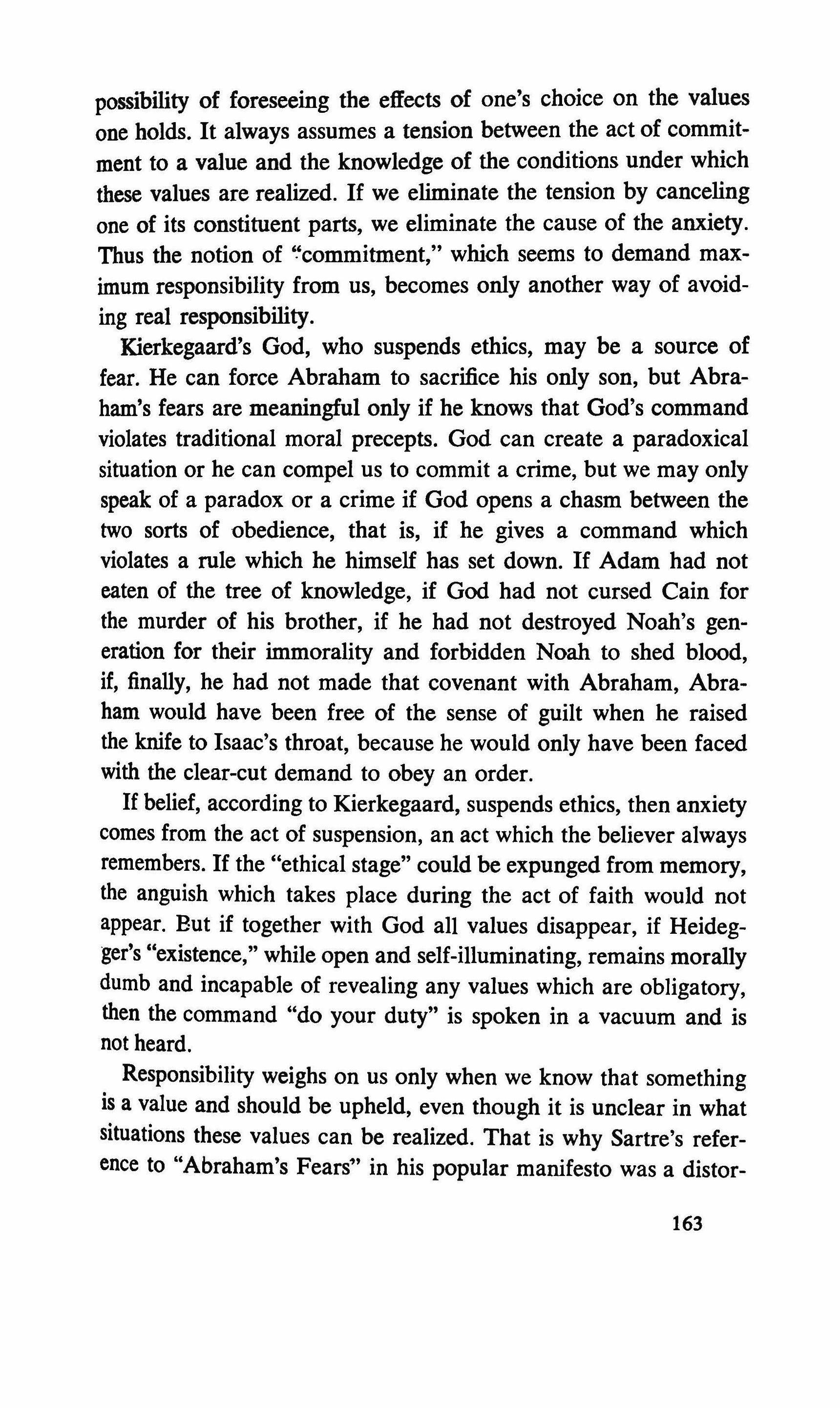
possibility of foreseeing the effects of one's choice on the values one holds. It always assumes a tension between the act of commitment to a value and the knowledge of the conditions under which these values are realized. If we eliminate the tension by canceling one of its constituent parts, we eliminate the cause of the anxiety. Thus the notion of '·'commitment," which seems to demand maximum responsibility from us, becomes only another way of avoiding real responsibility.
Kierkegaard's God, who suspends ethics, may be a source of fear. He can force Abraham to sacrifice his only son, but Abraham's fears are meaningful only if he knows that God's command violates traditional moral precepts. God can create a paradoxical situation or he can compel us to commit a crime, but we may only speak of a paradox or a crime if God opens a chasm between the two sorts of obedience, that is, if he gives a command which violates a rule which he himself has set down. If Adam had not eaten of the tree of knowledge, if God had not cursed Cain for the murder of his brother, if he had not destroyed Noah's generation for their immorality and forbidden Noah to shed blood, if, finally, he had not made that covenant with Abraham, Abraham would have been free of the sense of guilt when he raised the knife to Isaac's throat, because he would only have been faced with the clear-cut demand to obey an order.
If belief, according to Kierkegaard, suspends ethics, then anxiety comes from the act of suspension, an act which the believer always remembers. If the "ethical stage" could be expunged from memory, the anguish which takes place during the act of faith would not appear. But if together with God all values disappear, if Heidegger's "existence," while open and self-illuminating, remains morally dumb and incapable of revealing any values which are obligatory, then the command "do your duty" is spoken in a vacuum and is not heard.
Responsibility weighs on us only when we know that something is a value and should be upheld, even though it is unclear in what situations these values can be realized. That is why Sartre's reference to "Abraham's Fears" in his popular manifesto was a distor-

tion of Kierkegaard's ideas. In Sartre's version there was no place for a "suspension of the ethical sphere."
The three ideal types of Weltanschauungen which we have considered have one feature in common. They all distort the situation of responsibility and liberate us from the anguish of moral choice. They are the nihilist's pseudo-negation of the world, the conservative's acceptance of the "present state" of the world, and the existentialist's notion of the supreme value of "commitment."
The ethical code of the nihilist is useless because the values which provide its standards cannot be realized in the world. For the existentialist (of the type we have discussed), an ethical code is impossible. For the conservative, such a code is necessary, and it is by means of this code that he achieves a mock-liberation from the guilt feeling and the necessity of making moral choices.
The world of the nihilist which is homogeneous in its corruption and the world of the existentialist which is empty of values have no place for hesitation and wavering, indeed, for decision at all, because a decision must be "attracted to a possibility." A decision takes place only when there are poles of oscillation between two fields of attraction, and a moral decision takes place when both fields represent obligatory values and are seen as such. A state of "being between" must consist of a temporary immobilization of powers pulling in the opposite direction and must take place before the term 'decision' can be used, and the term 'moral decision' can be used only if one of the powers is moral and not utilitarian in nature; because Buridan's Ass is faced with a decision, too, but one which is devoid of moral content.
In the conservative model of the world, moral codes--or sets of ethical directives arranged hierarchically and designed to provide resolutions to all moral conflicts-are used to avoid making real moral choices. The code indicates to us which directives are unconditional, which conditional; which must be carried out at all times, which only in certain circumstances. No code is thoroughly exhaustive but the ideal code strives to be.
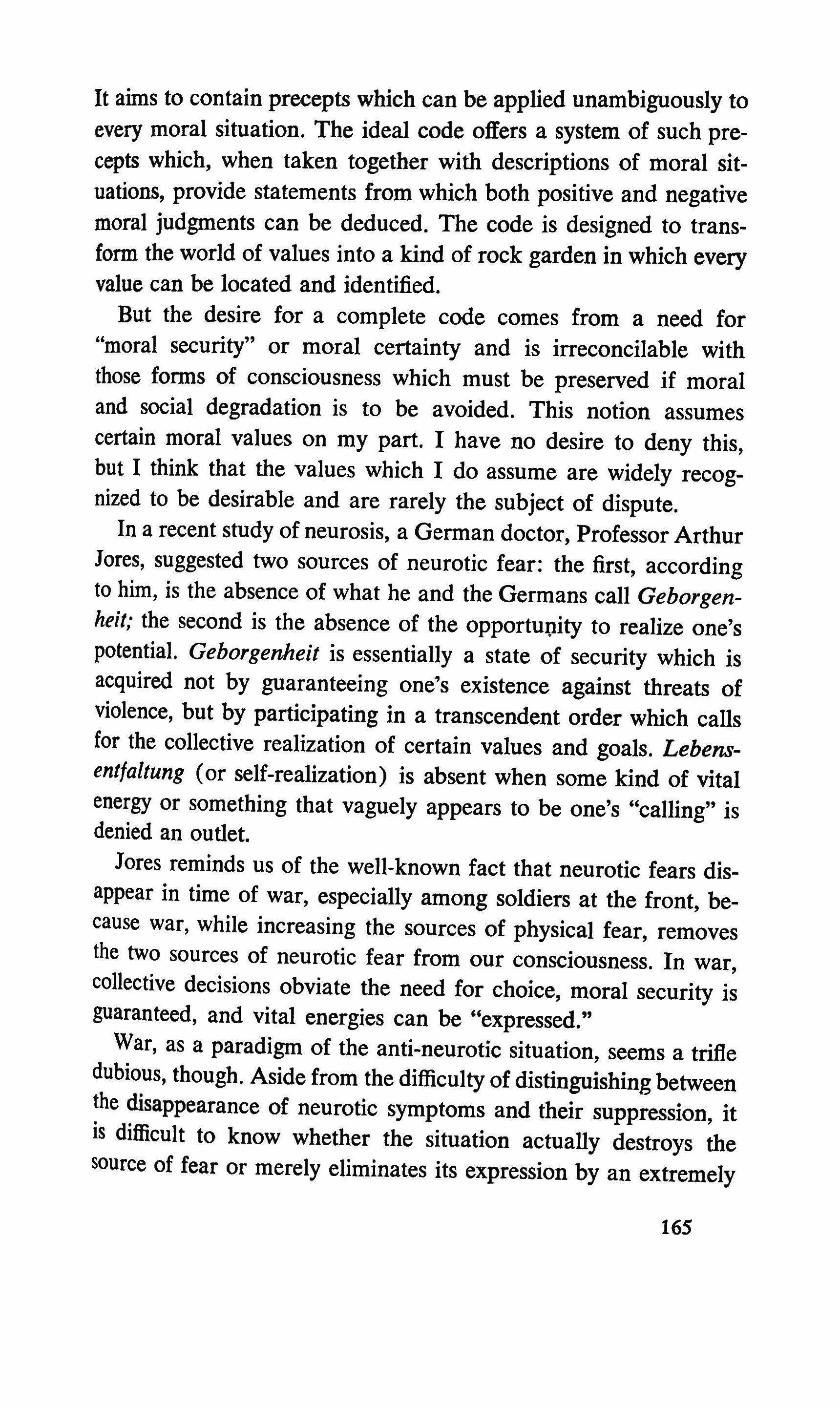
It aims to contain precepts which can be applied unambiguously to every moral situation. The ideal code offers a system of such precepts which, when taken together with descriptions of moral situations, provide statements from which both positive and negative moral judgments can be deduced. The code is designed to transform the world of values into a kind of rock garden in which every value can be located and identified.
But the desire for a complete code comes from a need for "moral security" or moral certainty and is irreconcilable with those forms of consciousness which must be preserved if moral and social degradation is to be avoided. This notion assumes certain moral values on my part. I have no desire to deny this, but I think that the values which I do assume are widely recognized to be desirable and are rarely the subject of dispute.
In a recent study of neurosis, a German doctor, Professor Arthur Jores, suggested two sources of neurotic fear: the first, according to him, is the absence of what he and the Germans call Geborgenheit; the second is the absence of the opportunity to realize one's potential. Geborgenheit is essentially a state of security which is acquired not by guaranteeing one's existence against threats of violence, but by participating in a transcendent order which calls for the collective realization of certain values and goals. Lebensentjaltung (or self-realization) is absent when some kind of vital energy or something that vaguely appears to be one's "calling" is denied an outlet.
Jores reminds us of the well-known fact that neurotic fears disappear in time of war, especially among soldiers at the front, because war, while increasing the sources of physical fear, removes the two sources of neurotic fear from our consciousness. In war, collective decisions obviate the need for choice, moral security is guaranteed, and vital energies can be "expressed."
War, as a paradigm of the anti-neurotic situation, seems a trifle dubious, though. Aside from the difficulty of distinguishing between the disappearance of neurotic symptoms and their suppression, it is difficult to know whether the situation actually destroys the source of fear or merely eliminates its expression by an extremely
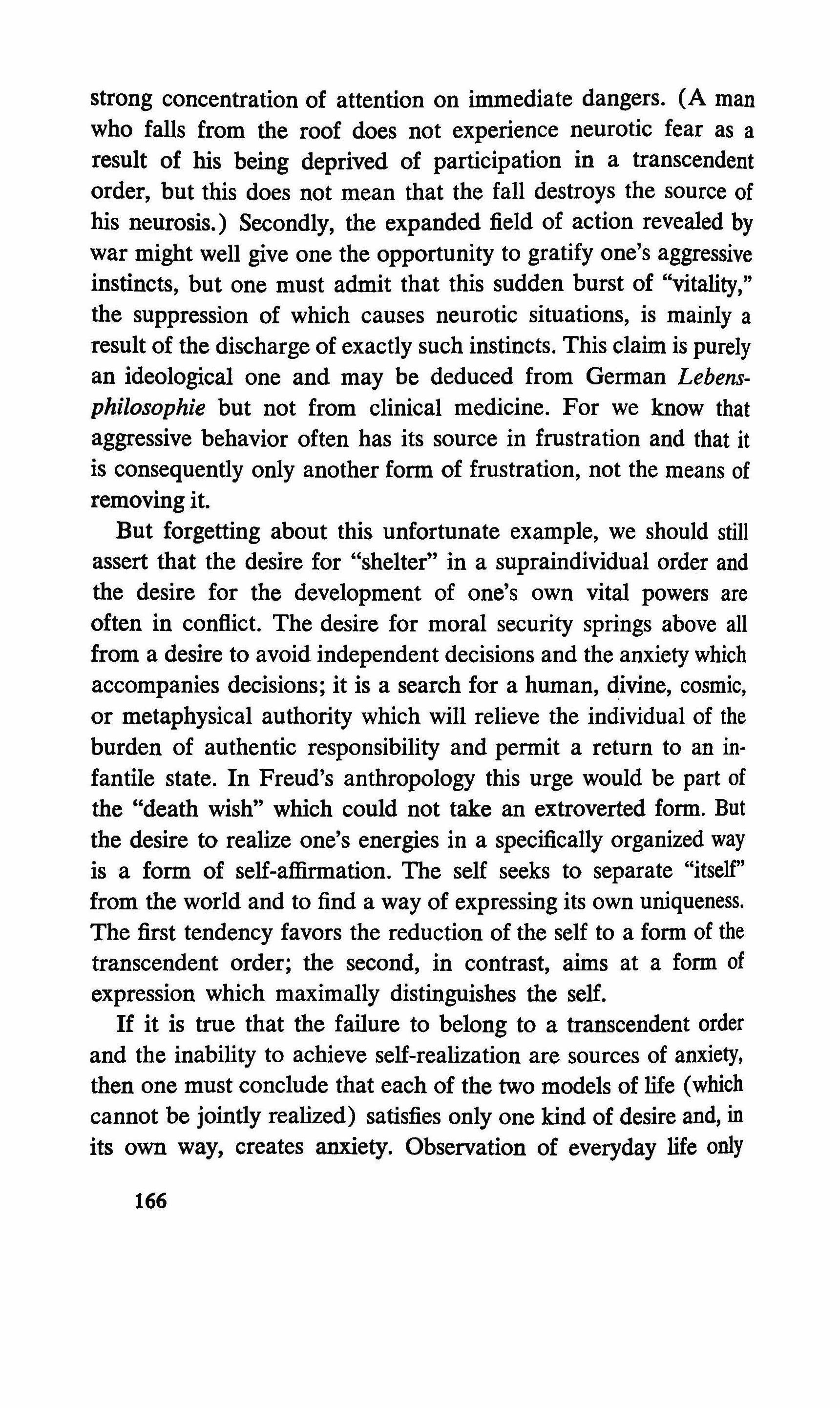
strong concentration of attention on immediate dangers. (A man who falls from the roof does not experience neurotic fear as a result of his being deprived of participation in a transcendent order, but this does not mean that the fall destroys the source of his neurosis.) Secondly, the expanded field of action revealed by war might well give one the opportunity to gratify one's aggressive instincts, but one must admit that this sudden burst of "vitality," the suppression of which causes neurotic situations, is mainly a result of the discharge of exactly such instincts. This claim is purely an ideological one and may be deduced from German Lebensphilosophie but not from clinical medicine. For we know that aggressive behavior often has its source in frustration and that it is consequently only another form of frustration, not the means of removing it.
But forgetting about this unfortunate example, we should still assert that the desire for "shelter" in a supraindividual order and the desire for the development of one's own vital powers are often in conflict. The desire for moral security springs above all from a desire to avoid independent decisions and the anxiety which accompanies decisions; it is a search for a human, divine, cosmic, or metaphysical authority which will relieve the individual of the burden of authentic responsibility and permit a return to an infantile state. In Freud's anthropology this urge would be part of the "death wish" which could not take an extroverted form. But the desire to realize one's energies in a specifically organized way is a form of self-affirmation. The self seeks to separate "itself" from the world and to find a way of expressing its own uniqueness. The first tendency favors the reduction of the self to a form of the transcendent order; the second, in contrast, aims at a form of expression which maximally distinguishes the self.
If it is true that the failure to belong to a transcendent order and the inability to achieve self-realization are sources of anxiety, then one must conclude that each of the two models of life (which cannot be jointly realized) satisfies only one kind of desire and, in its own way, creates anxiety. Observation of everyday life only
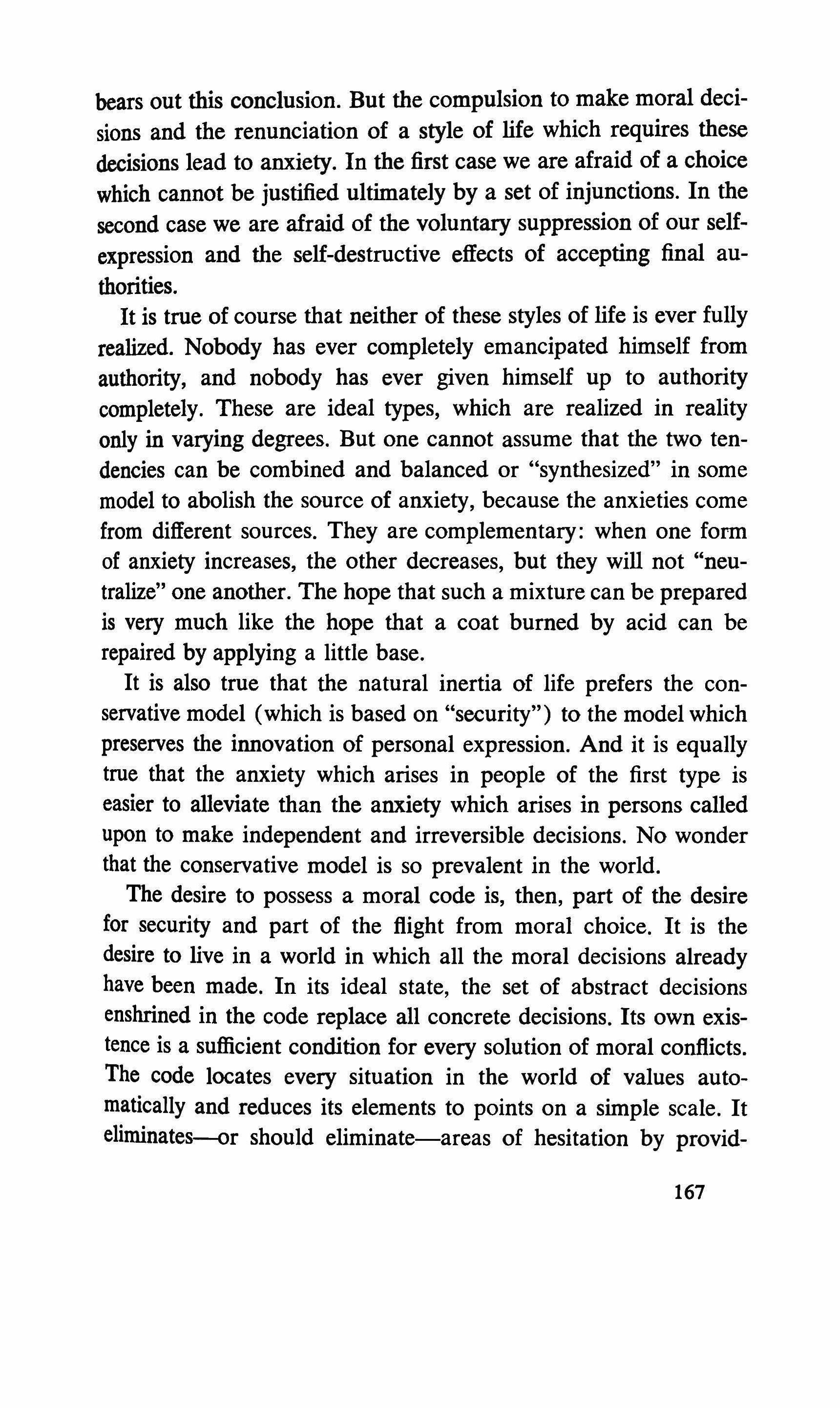
bears out this conclusion. But the compulsion to make moral decisions and the renunciation of a style of life which requires these decisions lead to anxiety. In the first case we are afraid of a choice which cannot be justified ultimately by a set of injunctions. In the second case we are afraid of the voluntary suppression of our selfexpression and the self-destructive effects of accepting final authorities.
It is true of course that neither of these styles of life is ever fully realized. Nobody has ever completely emancipated himself from authority, and nobody has ever given himself up to authority completely. These are ideal types, which are realized in reality only in varying degrees. But one cannot assume that the two tendencies can be combined and balanced or "synthesized" in some model to abolish the source of anxiety, because the anxieties come from different sources. They are complementary: when one form of anxiety increases, the other decreases, but they will not "neutralize" one another. The hope that such a mixture can be prepared is very much like the hope that a coat burned by acid can be repaired by applying a little base.
It is also true that the natural inertia of life prefers the conservative model (which is based on "security") to the model which preserves the innovation of personal expression. And it is equally true that the anxiety which arises in people of the first type is easier to alleviate than the anxiety which arises in persons called upon to make independent and irreversible decisions. No wonder that the conservative model is so prevalent in the world.
The desire to possess a moral code is, then, part of the desire for security and part of the flight from moral choice. It is the desire to live in a world in which all the moral decisions already have been made. In its ideal state, the set of abstract decisions enshrined in the code replace all concrete decisions. Its own existence is a sufficient condition for every solution of moral conflicts. The code locates every situation in the world of values automatically and reduces its elements to points on a simple scale. It eliminates--or should eliminate-areas of hesitation by provid-
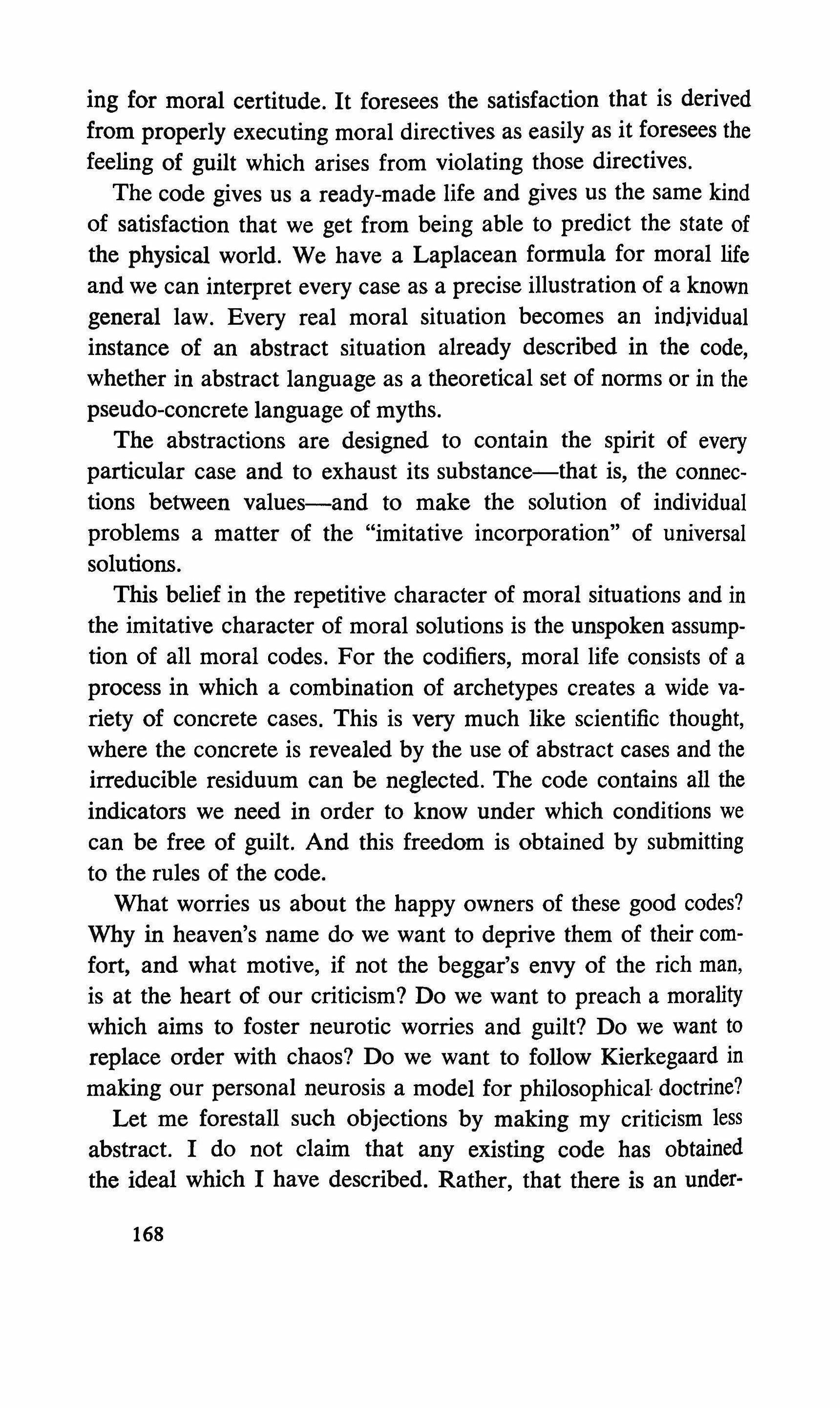
ing for moral certitude. It foresees the satisfaction that is derived from properly executing moral directives as easily as it foresees the feeling of guilt which arises from violating those directives.
The code gives us a ready-made life and gives us the same kind of satisfaction that we get from being able to predict the state of the physical world. We have a Laplacean formula for moral life and we can interpret every case as a precise illustration of a known general law. Every real moral situation becomes an individual instance of an abstract situation already described in the code, whether in abstract language as a theoretical set of norms or in the pseudo-concrete
The abstractions are designed to contain the spirit of every particular case and to exhaust its substance-that is, the connections between values-and to make the solution of individual problems a matter of the "imitative incorporation" of universal solutions.
This belief in the repetitive character of moral situations and in the imitative character of moral solutions is the unspoken assumption of all moral codes. For the codifiers, moral life consists of a process in which a combination of archetypes creates a wide variety of concrete cases. This is very much like scientific thought, where the concrete is revealed by the use of abstract cases and the irreducible residuum can be neglected. The code contains all the indicators we need in order to know under which conditions we can be free of guilt. And this freedom is obtained by submitting to the rules of the code.
What worries us about the happy owners of these good codes? Why in heaven's name do we want to deprive them of their comfort, and what motive, if not the beggar's envy of the rich man, is at the heart of our criticism? Do we want to preach a morality which aims to foster neurotic worries and guilt? Do we want to replace order with chaos? Do we want to follow Kierkegaard in making our personal neurosis a model for philosophical doctrine?
Let me forestall such objections by making my criticism less abstract. I do not claim that any existing code has obtained the ideal which I have described. Rather, that there is an under-

standable inclination to realize this ideal and that those who wish to do so either hope to perfect existing codes or to treat the existing ones as perfect. This practice is so obviously widespread that we don't have to prove its existence.
We want to make two points only: that the search for support in perfect codes obscures the real qualities of the moral situation (and they exist whether we are aware of their existence or not), and that a well-codified moral consciousness leads to a haughty disregard for certain values which hold a high place in our cultural tradition-values which we claim to recognize. We are in fact concerned with the epistemological as well as the moral effects of the desire for codification.
We shall discuss the following three characteristics of the good code which make us blind to certain aspects of moral life. These characteristics are well-known and require no extensive investigation. They are (1) the implicit assumption of a symmetry of obligations and claims, (2) the belief in the homogeneity of values, and (3) the assumption of the basic compatibility of values and norms.
The asymmetry of claims and obligations: the "cogito" factor
A good code always establ�shes a symmetry of claims (or expectations) and obligations. In other words, if, according to the code, it is someone's obligation to behave in a certain way in a given situation, then everybody has the right to expect that behavior from him. Whatever the nature of a person's obligation, everybody has the right to demand that it be carried out. In real life, though, the most precious moral values emerge from the asymmetry of claims and obligations; that is, from situations in which someone accepts an obligation that nobody has the right to demand of him. In some sense, one might say that the paradoxical nature of moral life consists in the inability to separate obligations from individuals (we say "I do" or "you should"). When I accept the obligation of behaving in a certain way in a given situation, I by no means assume that it is the obligation of everyone to behave the same way in that situation. I do not think that my choice forces everybody
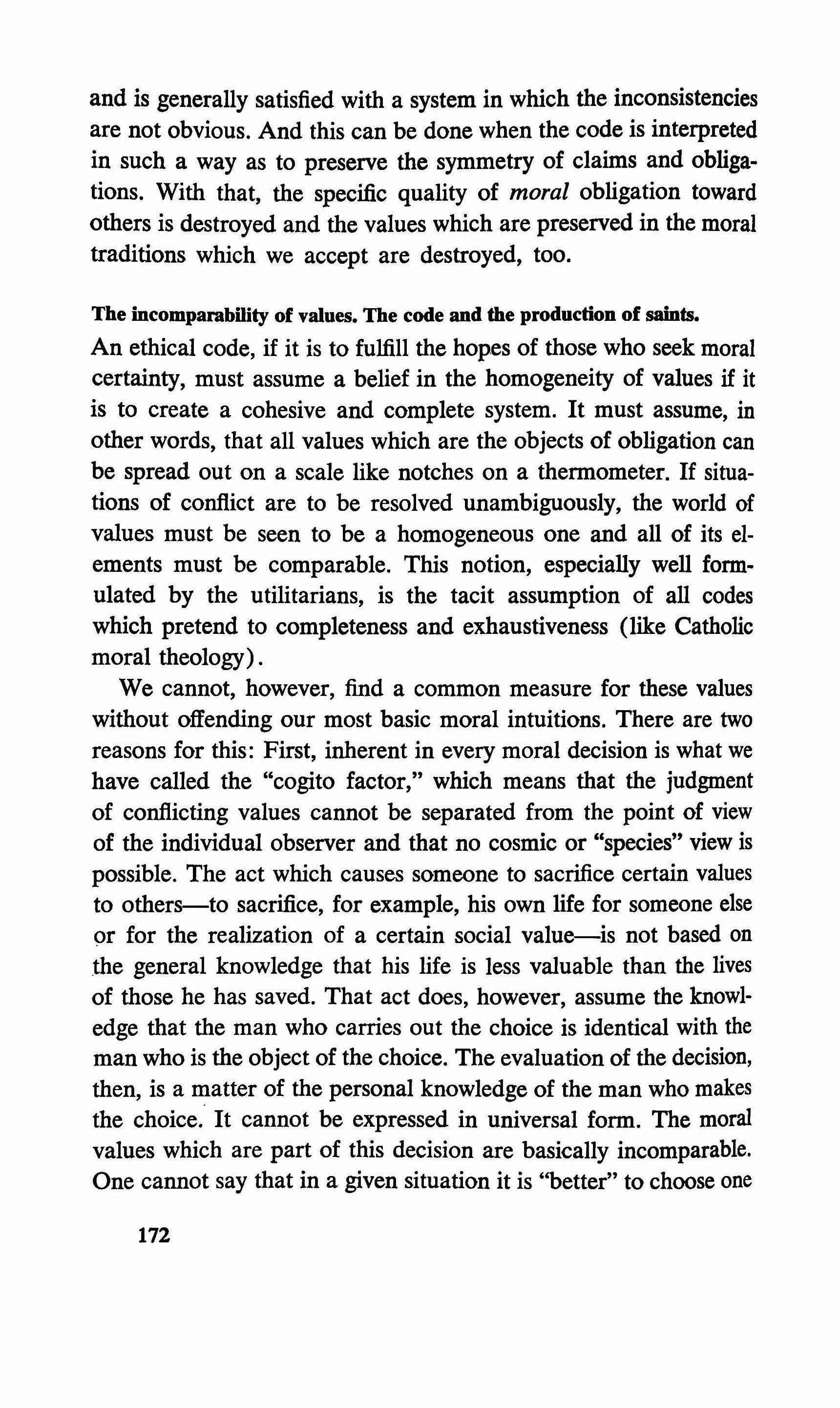
and is generally satisfied with a system in which the inconsistencies are not obvious. And this can be done when the code is interpreted in such a way as to preserve the symmetry of claims and obligations. With that, the specific quality of moral obligation toward others is destroyed and the values which are preserved in the moral traditions which we accept are destroyed, too.
The incomparability of values. The code and the production of saints. An ethical code, if it is to fulfill the hop.es of those who seek moral certainty, must assume a belief in the homogeneity of values if it is to create a cohesive and complete system. It must assume, in other words, that all values which are the objects of obligation can be spread out on a scale like notches on a thermometer. If situations of conflict are to be resolved unambiguously, the world of values must be seen to be a homogeneous one and all of its elements must be comparable. This notion, especially well formulated by the utilitarians, is the tacit assumption of all codes which pretend to completeness and exhaustiveness (like Catholic moral theology).
We cannot, however, find a common measure for these values without offending our most basic moral intuitions. There are two reasons for this: First, inherent in every moral decision is what we have called the "cogito factor," which means that the judgment of conflicting values cannot be separated from the point of view of the individual observer and that no cosmic or "species" view is possible. The act which causes someone to sacrifice certain values to others-to sacrifice, for example, his own life for someone else or for the realization of a certain social value-is not based on the general knowledge that his life is less valuable than the lives of those he has saved. That act does, however, assume the knowledge that the man who carries out the choice is identical with the man who is the object of the choice. The evaluation of the decision, then, is a matter of the personal knowledge of the man who makes the choice. It cannot be expressed in universal form. The moral values which are part of this decision are basically incomparable. One cannot say that in a given situation it is "better" to choose one
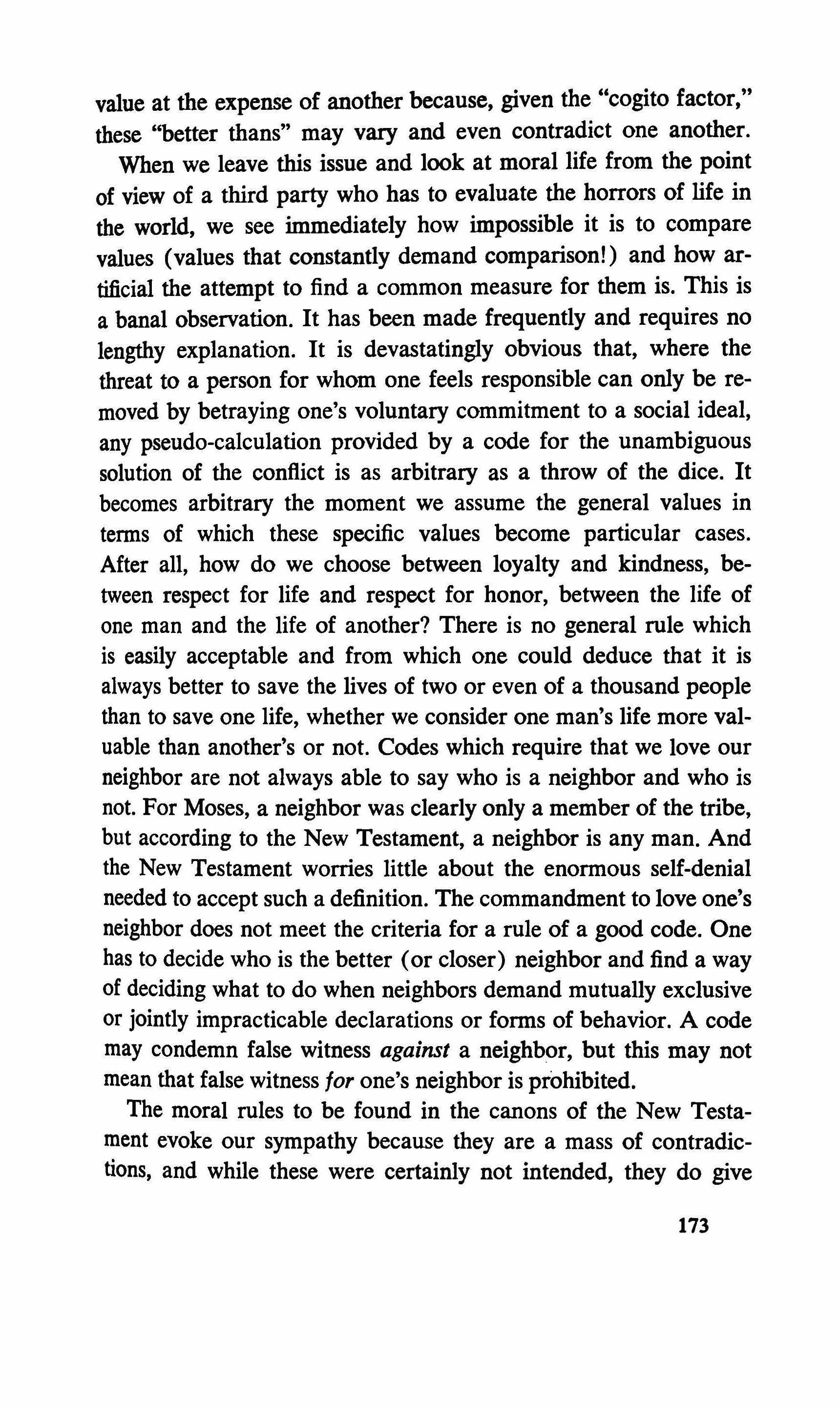
value at the expense of another because, given the "cogito factor," these "better thans" may vary and even contradict one another. When we leave this issue and look at moral life from the point of view of a third party who has to evaluate the horrors of life in the world, we see immediately how impossible it is to compare values (values that constantly demand comparison!) and how artificial the attempt to find a common measure for them is. This is a banal observation. It has been made frequently and requires no lengthy explanation. It is devastatingly obvious that, where the threat to a person for whom one feels responsible can only be removed by betraying one's voluntary commitment to a social ideal, any pseudo-calculation provided by a code for the unambiguous solution of the contlict is as arbitrary as a throw of the dice. It becomes arbitrary the moment we assume the general values in terms of which these specific values become particular cases. After all, how do we choose between loyalty and kindness, between respect for life and respect for honor, between the life of one man and the life of another? There is no general rule which is easily acceptable and from which one could deduce that it is always better to save the lives of two or even of a thousand people than to save one life, whether we consider one man's life more valuable than another's or not. Codes which require that we love our neighbor are not always able to say who is a neighbor and who is not. For Moses, a neighbor was clearly only a member of the tribe, but according to the New Testament, a neighbor is any man. And the New Testament worries little about the enormous self-denial needed to accept such a definition. The commandment to love one's neighbor does not meet the criteria for a rule of a good code. One has to decide who is the better (or closer) neighbor and find a way of deciding what to do when neighbors demand mutually exclusive or jointly impracticable declarations or forms of behavior. A code may condemn false witness against a neighbor, but this may not mean that false witness for one's neighbor is prohibited. The moral rules to be found in the canons of the New Testament evoke our sympathy because they are a mass of contradictions, and while these were certainly not intended, they do give
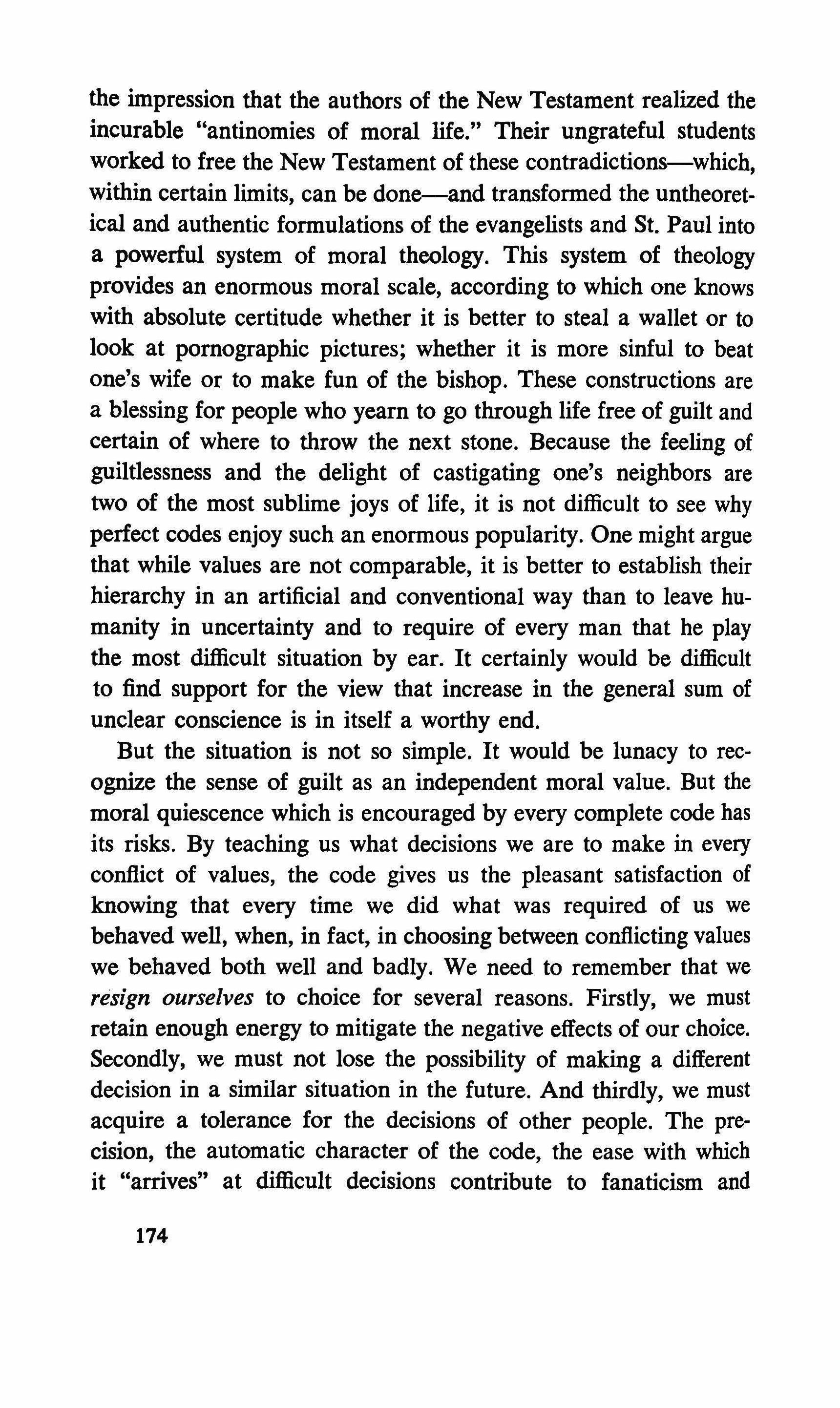
the impression that the authors of the New Testament realized the incurable "antinomies of moral life." Their ungrateful students worked to free the New Testament of these contradictions-which, within certain limits, can be done-and transformed the untheoretical and authentic formulations of the evangelists and St. Paul into a powerful system of moral theology. This system of theology provides an enormous moral scale, according to which one knows with absolute certitude whether it is better to steal a wallet or to look at pornographic pictures; whether it is more sinful to beat one's wife or to make fun of the bishop. These constructions are a blessing for people who yearn to go through life free of guilt and certain of where to throw the next stone. Because the feeling of guiltlessness and the delight of castigating one's neighbors are two of the most sublime joys of life, it is not difficult to see why perfect codes enjoy such an enormous popularity. One might argue that while values are not comparable, it is better to establish their hierarchy in an artificial and conventional way than to leave humanity in uncertainty and to require of every man that he play the most difficult situation by ear. It certainly would be difficult to find support for the view that increase in the general sum of unclear conscience is in itself a worthy end. But the situation is not so simple. It would be lunacy to recognize the sense of guilt as an independent moral value. But the moral quiescence which is encouraged by every complete code has its risks. By teaching us what decisions we are to make in every conflict of values, the code gives us the pleasant satisfaction of knowing that every time we did what was required of us we behaved well, when, in fact, in choosing between conflicting values we behaved both well and badly. We need to remember that we resign ourselves to choice for several reasons. Firstly, we must retain enough energy to mitigate the negative effects of our choice. Secondly, we must not lose the possibility of making a different decision in a similar situation in the future. And thirdly, we must acquire a tolerance for the decisions of other people. The precision, the automatic character of the code, the ease with which it "arrives" at difficult decisions contribute to fanaticism and
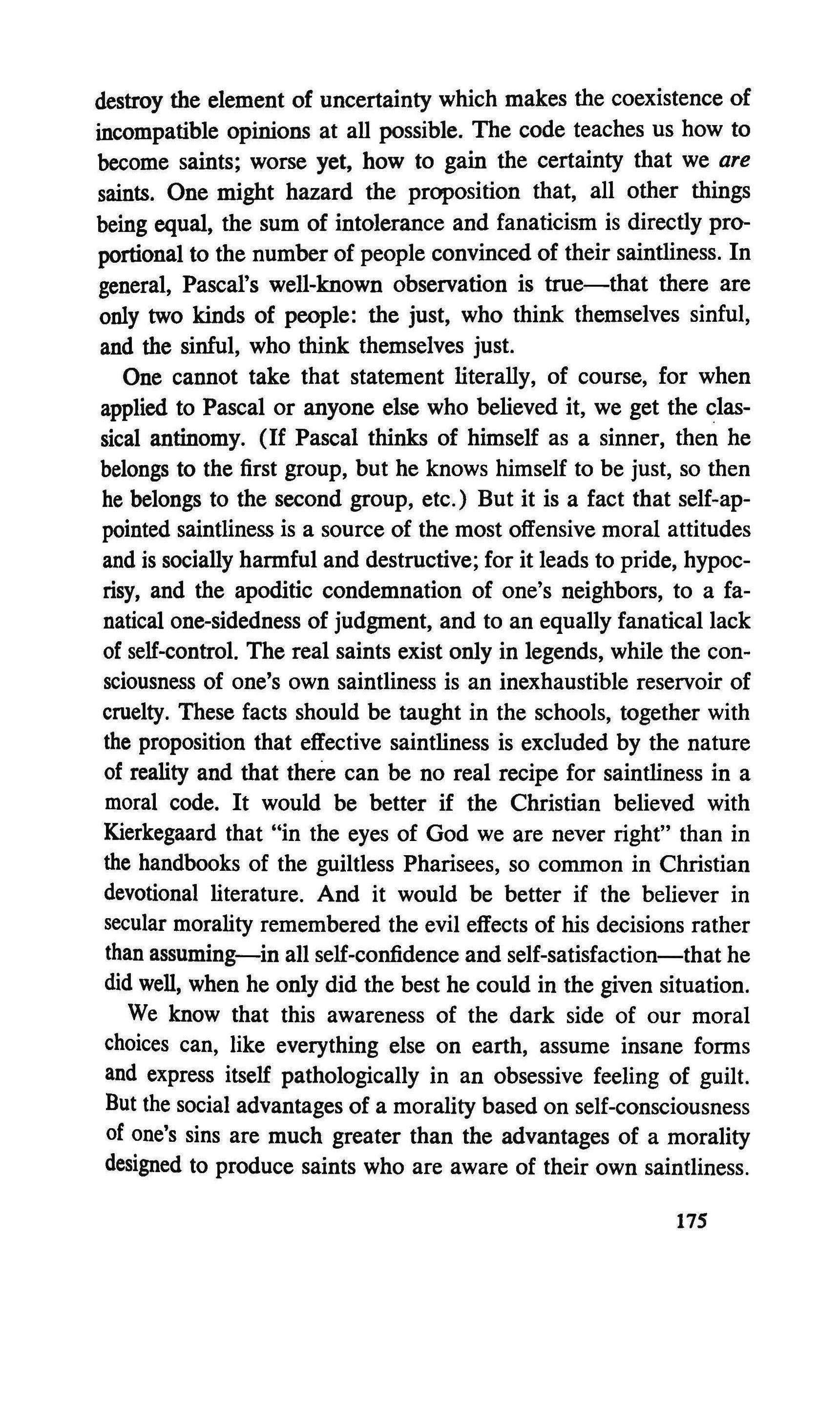
destroy the element of uncertainty which makes the coexistence of incompatible opinions at all possible. The code teaches us how to become saints; worse yet, how to gain the certainty that we are saints. One might hazard the proposition that, all other things being equal, the sum of intolerance and fanaticism is directly proportional to the number of people convinced of their saintliness. In general, Pascal's well-known observation is true-that there are only two kinds of people: the just, who think themselves sinful, and the sinful, who think themselves just.
One cannot take that statement literally, of course, for when applied to Pascal or anyone else who believed it, we get the classical antinomy. (If Pascal thinks of himself as a sinner, then he belongs to the first group, but he knows himself to be just, so then he belongs to the second group, etc.) But it is a fact that self-appointed saintliness is a source of the most offensive moral attitudes and is socially harmful and destructive; for it leads to pride, hypocrisy, and the apoditic condemnation of one's neighbors, to a fanatical one-sidedness of judgment, and to an equally fanatical lack of self-control. The real saints exist only in legends, while the consciousness of one's own saintliness is an inexhaustible reservoir of cruelty. These facts should be taught in the schools, together with the proposition that effective saintliness is excluded by the nature of reality and that there can be no real recipe for saintliness in a moral code. It would be better if the Christian believed with Kierkegaard that "in the eyes of God we are never right" than in the handbooks of the guiltless Pharisees, so common in Christian devotional literature. And it would be better if the believer in secular morality remembered the evil effects of his decisions rather than assuming-in all self-confidence and self-satisfaction-that he did well, when he only did the best he could in the given situation.
We know that this awareness of the dark side of our moral choices can, like everything else on earth, assume insane forms and express itself pathologically in an obsessive feeling of guilt. But the social advantages of a morality based on self-consciousness of one's sins are much greater than the advantages of a morality designed to produce saints who are aware of their own saintliness.
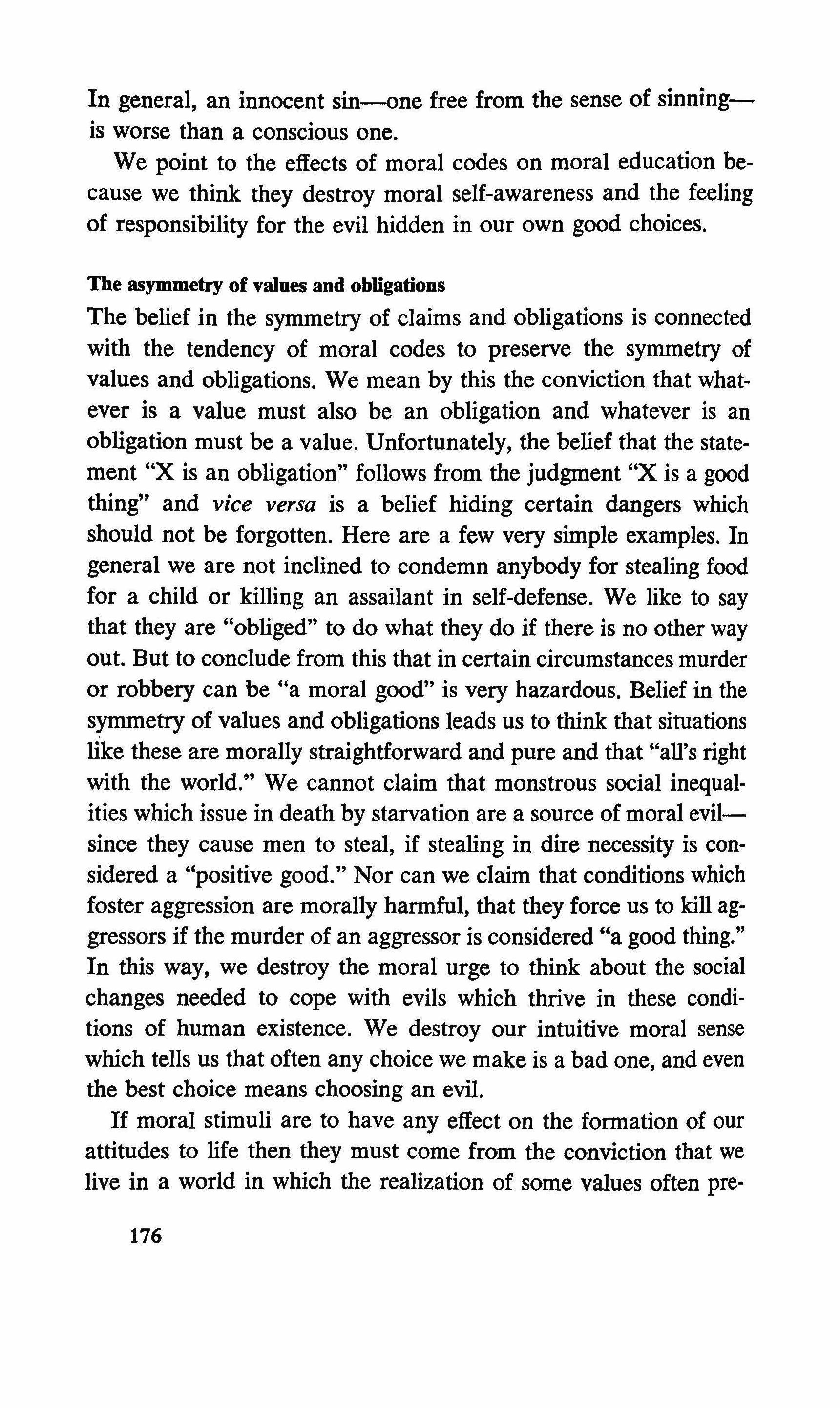
In general, an innocent sin-one free from the sense of sinningis worse than a conscious one.
We point to the effects of moral codes on moral education because we think they destroy moral self-awareness and the feeling of responsibility for the evil hidden in our own good choices.
The belief in the symmetry of claims and obligations is connected with the tendency of moral codes to preserve the symmetry of values and obligations. We mean by this the conviction that whatever is a value must also be an obligation and whatever is an obligation must be a value. Unfortunately, the belief that the statement "X is an obligation" follows from the judgment "X is a good thing" and vice versa is a belief hiding certain dangers which should not be forgotten. Here are a few very simple examples. In general we are not inclined to condemn anybody for stealing food for a child or killing an assailant in self-defense. We like to say that they are "obliged" to do what they do if there is no other way out. But to conclude from this that in certain circumstances murder or robbery can be "a moral good" is very hazardous. Belief in the symmetry of values and obligations leads us to think that situations like these are morally straightforward and pure and that "all's right with the world." We cannot claim that monstrous social inequalities which issue in death by starvation are a source of moral evilsince they cause men to steal, if stealing in dire necessity is considered a "positive good." Nor can we claim that conditions which foster aggression are morally harmful, that they force us to kill aggressors if the murder of an aggressor is considered "a good thing." In this way, we destroy the moral urge to think about the social changes needed to cope with evils which thrive in these conditions of human existence. We destroy our intuitive moral sense which tells us that often any choice we make is a bad one, and even the best choice means choosing an evil. If moral stimuli are to have any effect on the formation of our attitudes to life then they must come from the conviction that we live in a world in which the realization of some values often pre-

eludes the realization of others and that, on occasion, it may be our obligation to do evil. The notion that whatever we must do is good alleviates our anxieties in much the same way that the belief in the homogeneity of values does. In point of fact, when I say that human life is a value, I do not want to say that it is a relative value--that it is a value only in certain circumstances and that, in other circumstances, the destruction of life is a moral good. On the other hand, I do not care to renounce the death penalty completely or to proclaim a doctrine of nonresistance to evil and humbleness before aggression in the name of reverence for life. The very difficulty of moral education lies in the difficulty of explaining that human life is an absolute value but that we are permitted and sometimes obliged to kill; that lying is evil but that we are permitted and sometimes obliged to lie; in other words, that it is our obligation to do one evil in order to avoid doing a greater one. The lesser evil should not be called a "good" simply because it is a lesser evil or because we are compelled for moral reasons to bring it about. And we must remember this if we are to retain the reserve of moral sensitivity which enables us to reduce the effects of the evil we cause and to avoid the carelessness which comes with a belief in coherent, monistic, and exhaustive moral codes. A morality which seeks support in a perfect moral code will always find principles which will provide absolute justification for actions. This kind of morality always reveals an unworried belief in the parallelism of values and obligations and always concludes from the fact that something is permitted or enjoined that it is a positive good. Codes which teach us that in certain circumstances it is permissible to kill somebody, or let him die, provide a complete justification for this action, as the desire for a perfect normative system will not countenance a situation in which something is an obligation and immoral at the same time. But the facts of the real world do not agree with those imputed by the codes; the latter can be maintained only by blinding ourselves to the inevitably contradictory demands made on us by conflicting values. We should not teach children that lying is absolutely forbidden, because they quickly realize that it is often
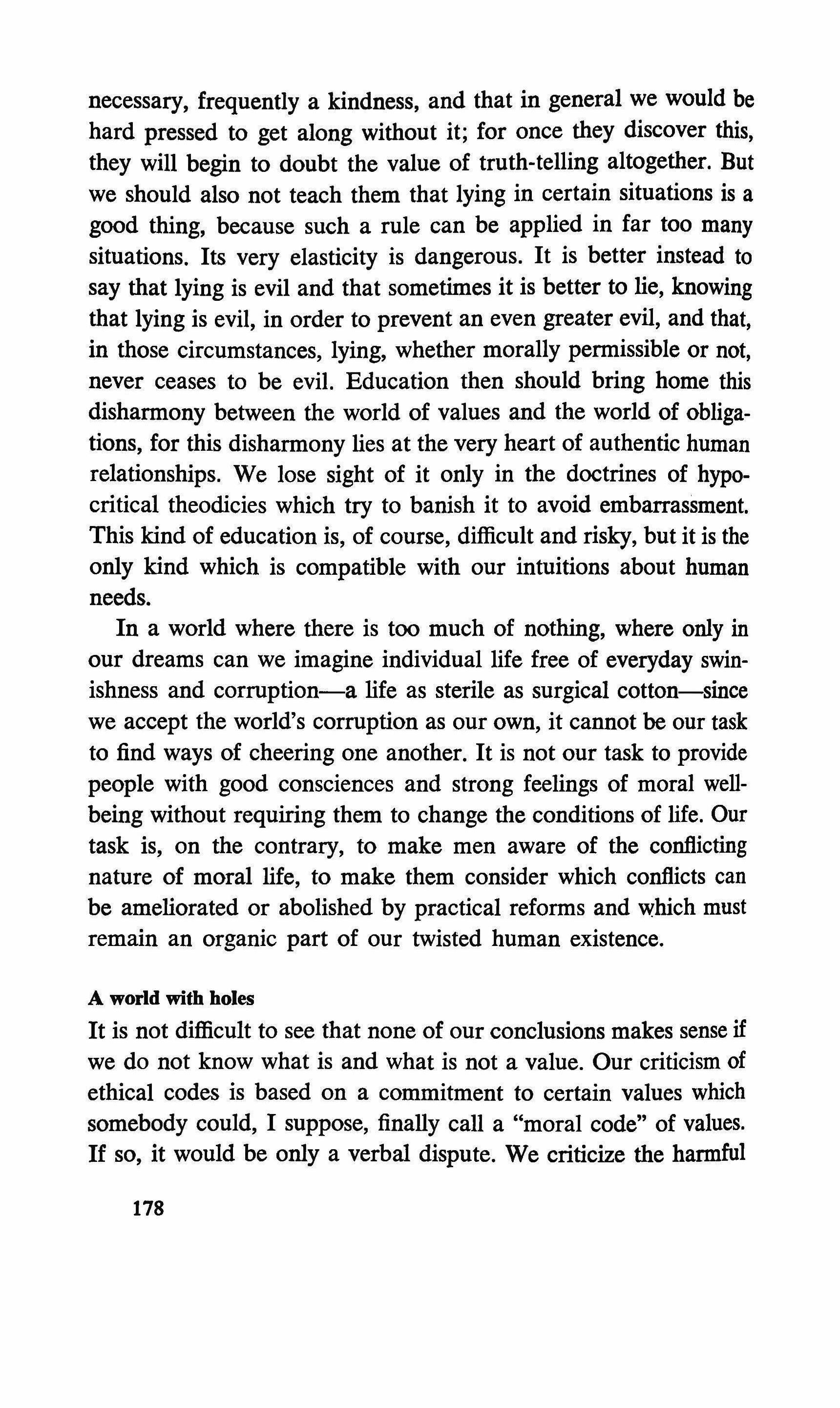
necessary, frequently a kindness, and that in general we would be hard pressed to get along without it; for once they discover this, they will begin to doubt the value of truth-telling altogether. But we should also not teach them that lying in certain situations is a good thing, because such a rule can be applied in far too many situations. Its very elasticity is dangerous. It is better instead to say that lying is evil and that sometimes it is better to lie, knowing that lying is evil, in order to prevent an even greater evil, and that, in those circumstances, lying, whether morally permissible or not, never ceases to be evil. Education then should bring home this disharmony between the world of values and the world of obligations, for this disharmony lies at the very heart of authentic human relationships. We lose sight of it only in the doctrines of hypocritical theodicies which try to banish it to avoid embarrassment. This kind of education is, of course, difficult and risky, but it is the only kind which is compatible with our intuitions about human needs.
In a world where there is too much of nothing, where only in our dreams can we imagine individual life free of everyday swinishness and corruption-a life as sterile as surgical cotton-since we accept the world's corruption as our own, it cannot be our task to find ways of cheering one another. It is not our task to provide people with good consciences and strong feelings of moral wellbeing without requiring them to change the conditions of life. Our task is, on the contrary, to make men aware of the conflicting nature of moral life, to make them consider which conflicts can be ameliorated or abolished by practical reforms and which must remain an organic part of our twisted human existence.
It is not difficult to see that none of our conclusions makes sense if we do not know what is and what is not a value. Our criticism of ethical codes is based on a commitment to certain values which somebody could, I suppose, finally call a "moral code" of values. If so, it would be only a verbal dispute. We criticize the harmful
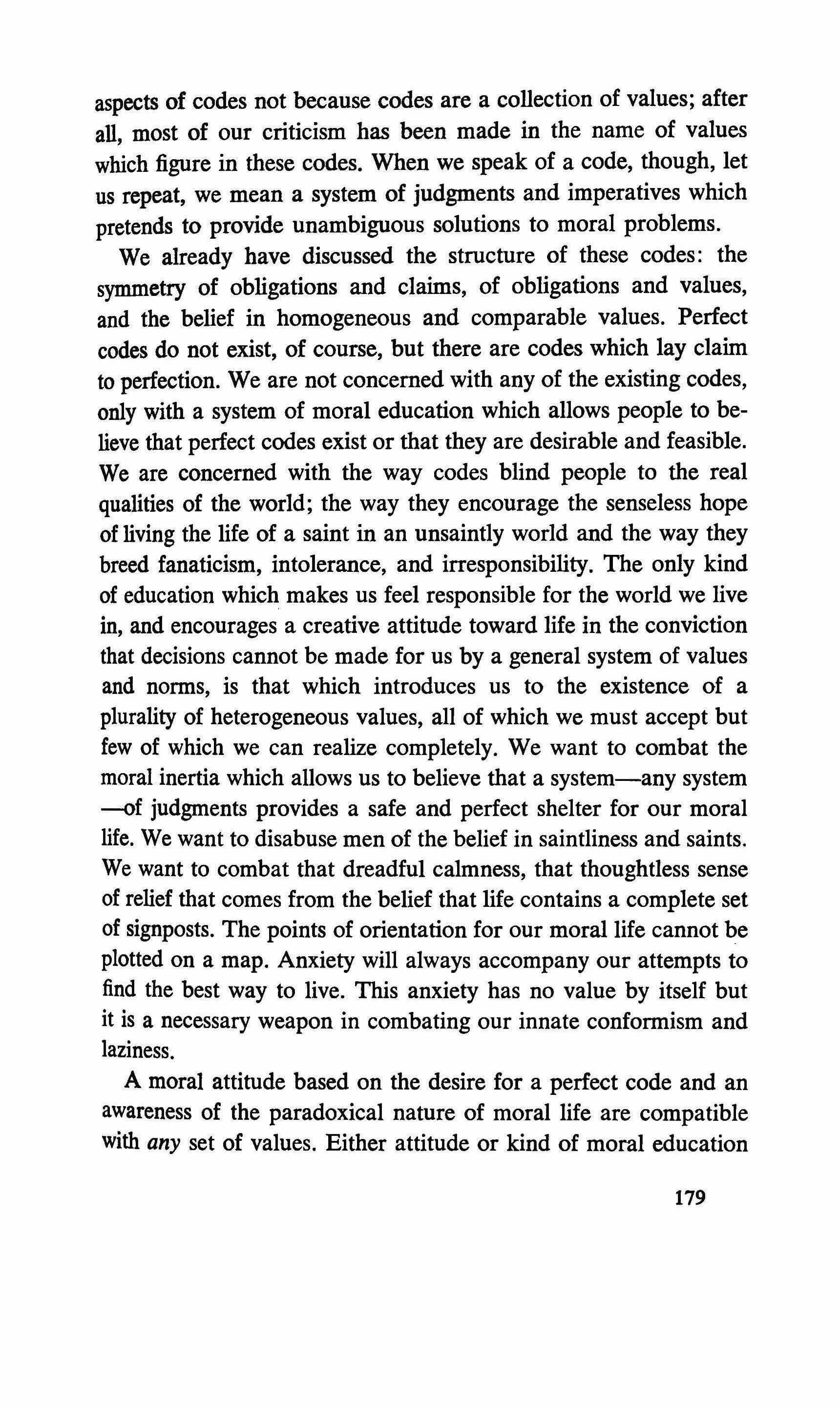
aspects of codes not because codes are a collection of values; after all, most of our criticism has been made in the name of values which figure in these codes. When we speak of a code, though, let us repeat, we mean a system of judgments and imperatives which pretends to provide unambiguous solutions to moral problems. We already have discussed the structure of these codes: the symmetry of obligations and claims, of obligations and values, and the belief in homogeneous and comparable values. Perfect codes do not exist, of course, but there are codes which lay claim to perfection. We are not concerned with any of the existing codes, only with a system of moral education which allows people to believe that perfect codes exist or that they are desirable and feasible. We are concerned with the way codes blind people to the real qualities of the world; the way they encourage the senseless hope of living the life of a saint in an unsaintly world and the way they breed fanaticism, intolerance, and irresponsibility. The only kind of education which makes us feel responsible for the world we live in, and encourages a creative attitude toward life in the conviction that decisions cannot be made for us by a general system of values and norms, is that which introduces us to the existence of a plurality of heterogeneous values, all of which we must accept but few of which we can realize completely. We want to combat the moral inertia which allows us to believe that a system-any system -of judgments provides a safe and perfect shelter for our moral life. We want to disabuse men of the belief in saintliness and saints. We want to combat that dreadful calmness, that thoughtless sense of relief that comes from the belief that life contains a complete set of signposts. The points of orientation for our moral life cannot be plotted on a map. Anxiety will always accompany our attempts to find the best way to live. This anxiety has no value by itself but it is a necessary weapon in combating our innate conformism and laziness.
A moral attitude based on the desire for a perfect code and an awareness of the paradoxical nature of moral life are compatible with any set of values. Either attitude or kind of moral education

can inhere in Christian morality, secular transcendental systems of morality, or secular systems of thought with a socialist orientation.
In order to alleviate conflicts, men must be liberated from the belief in the coherent and efficacious nature of their own set of values. They must be taught not to treat their own set of values as a perfect code because this quasi-legalistic attitude toward morals breeds fanaticism, intolerance, and the belief in the absolute value of one's own moral system.
The desire for a code comes from the urge to identify one's own moral life with a transcendent order of things. It comes from a fear of choice and, ultimately, from a fear of one's own separate individual existence. Every man is a part of the world, but no man can be completely explained in terms of the conditions in which he lives or totally identified with a pre-existing reality. We recognize the world we live in for a correlative of our own existence and as an object of obligation. We try to describe that situation, as well as recognize the irreducible character of the moral decisions we are compelled to make. And we assume that the obligation cannot be reduced to the description, for that would suggest the absence of the "cogito factor." We also assume that this is just a "factor" and that we have a situation in which we regard ourselves as inevitably related to the world as its components.
Thanks to this state of affairs, our moral situations have "meaning." For the relationship of one part of the world to another part or to the world as a whole can have "meaning," but the world "in itself" can have no meaning whatsoever. And if, as some people think, God gives it meaning, then God is meaningless. Just as physical nature can have meaning for us only as a part of our own body (to reiterate one of Marx's ideas), as a world "for something," so the world of values has meaning only if we see it as something distinct from ourselves to be realized in the course of decisions which we make every day and always at our own risk. The feeling of responsibility which cannot be expressed completely by a set of rules, but is connected nonetheless with values which are not experienced as arbitrary, is an indispensable condition of
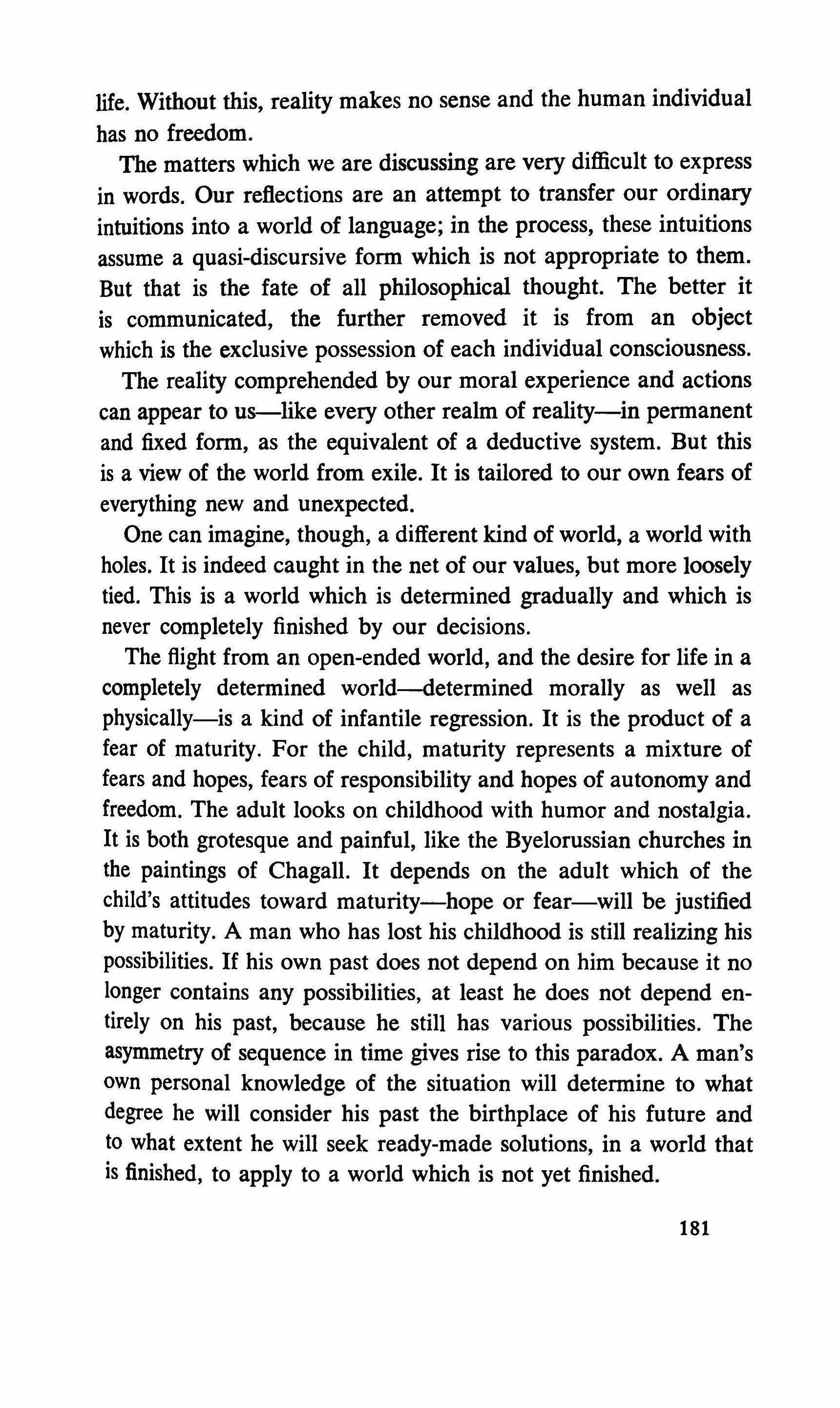
life. Without this, reality makes no sense and the human individual has no freedom.
The matters which we are discussing are very difficult to express in words. Our reflections are an attempt to transfer our ordinary intuitions into a world of language; in the process, these intuitions assume a quasi-discursive form which is not appropriate to them. But that is the fate of all philosophical thought. The better it is communicated, the further removed it is from an object which is the exclusive possession of each individual consciousness.
The reality comprehended by our moral experience and actions can appear to us-like every other realm of reality-in permanent and fixed form, as the equivalent of a deductive system. But this is a view of the world from exile. It is tailored to our own fears of everything new and unexpected.
One can imagine, though, a different kind of world, a world with holes. It is indeed caught in the net of our values, but more loosely tied. This is a world which is determined gradually and which is never completely finished by our decisions.
The flight from an open-ended world, and the desire for life in a completely determined world-determined morally as well as physically-is a kind of infantile regression. It is the product of a fear of maturity. For the child, maturity represents a mixture of fears and hopes, fears of responsibility and hopes of autonomy and freedom. The adult looks on childhood with humor and nostalgia. It is both grotesque and painful, like the Byelorussian churches in the paintings of Chagall. It depends on the adult which of the child's attitudes toward maturity-hope or fear-will be justified by maturity. A man who has lost his childhood is still realizing his possibilities. If his own past does not depend on him because it no longer contains any possibilities, at least he does not depend entirely on his past, because he still has various possibilities. The asymmetry of sequence in time gives rise to this paradox. A man's own personal knowledge of the situation will determine to what degree he will consider his past the birthplace of his future and to what extent he will seek ready-made solutions, in a world that is finished, to apply to a world which is not yet finished.

The view of the world which reduces life to its past forms liberates us from a feeling of responsibility but at the cost of thinking the future complete. And if you think that the future is complete, then you think that there is no future. With that I cease to exist, because my existence can only be realized in a constant reaching for things which are unpredictable and come to pass only as a result of my actions.
Even if it is true that, from the point of view of the cosmos, the world of man is an ephemeral bubble--that it arose for a moment on the surface of a great ocean wave; still, this is a point of view which we can experience only in the abstract. We cannot really experience it as an observer, for even the most penetrating flights into the cosmos will never liberate us from our own skins. The human point of view allows us to extend our knowledge of the world without limit, but the universe we describe will never have any more dimensions than we ourselves possess. It will be as open or as closed as each of us. The possibility of experiencing an open world is our possibility, but it is at the same time only one of many possibilities available to us. It is a vision of a world with holes which we close by our free movements, only to open new ones. 1962
translated by Alan Ross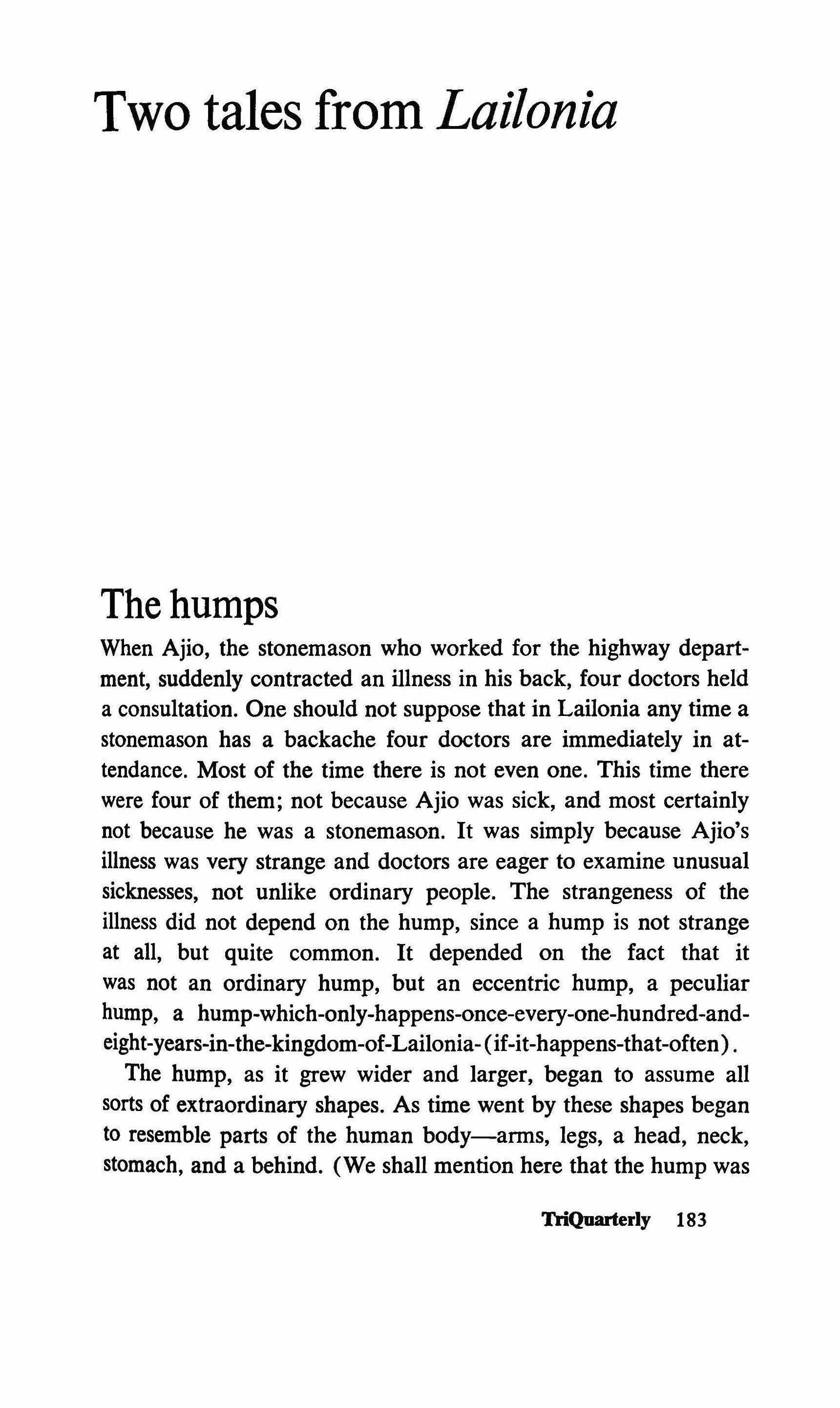
When Ajio, the stonemason who worked for the highway department, suddenly contracted an illness in his back, four doctors held a consultation. One should not suppose that in Lailonia any time a stonemason has a backache four doctors are immediately in attendance. Most of the time there is not even one. This time there were four of them; not because Ajio was sick, and most certainly not because he was a stonemason. It was simply because Ajio's illness was very strange and doctors are eager to examine unusual sicknesses, not unlike ordinary people. The strangeness of the illness did not depend on the hump, since a hump is not strange at all, but quite common. It depended on the fact that it was not an ordinary hump, but an eccentric hump, a peculiar hump, a hump-which-only-happens-once-every-one-hundred-andeight-years-in-the-kingdom-of-Lailonia-(if-it-happens-that-often).
The hump, as it grew wider and larger, began to assume all sorts of extraordinary shapes. As time went by these shapes began to resemble parts of the human body-arms, legs, a head, neck, stomach, and a behind. (We shall mention here that the hump was
TriQuarterly 183
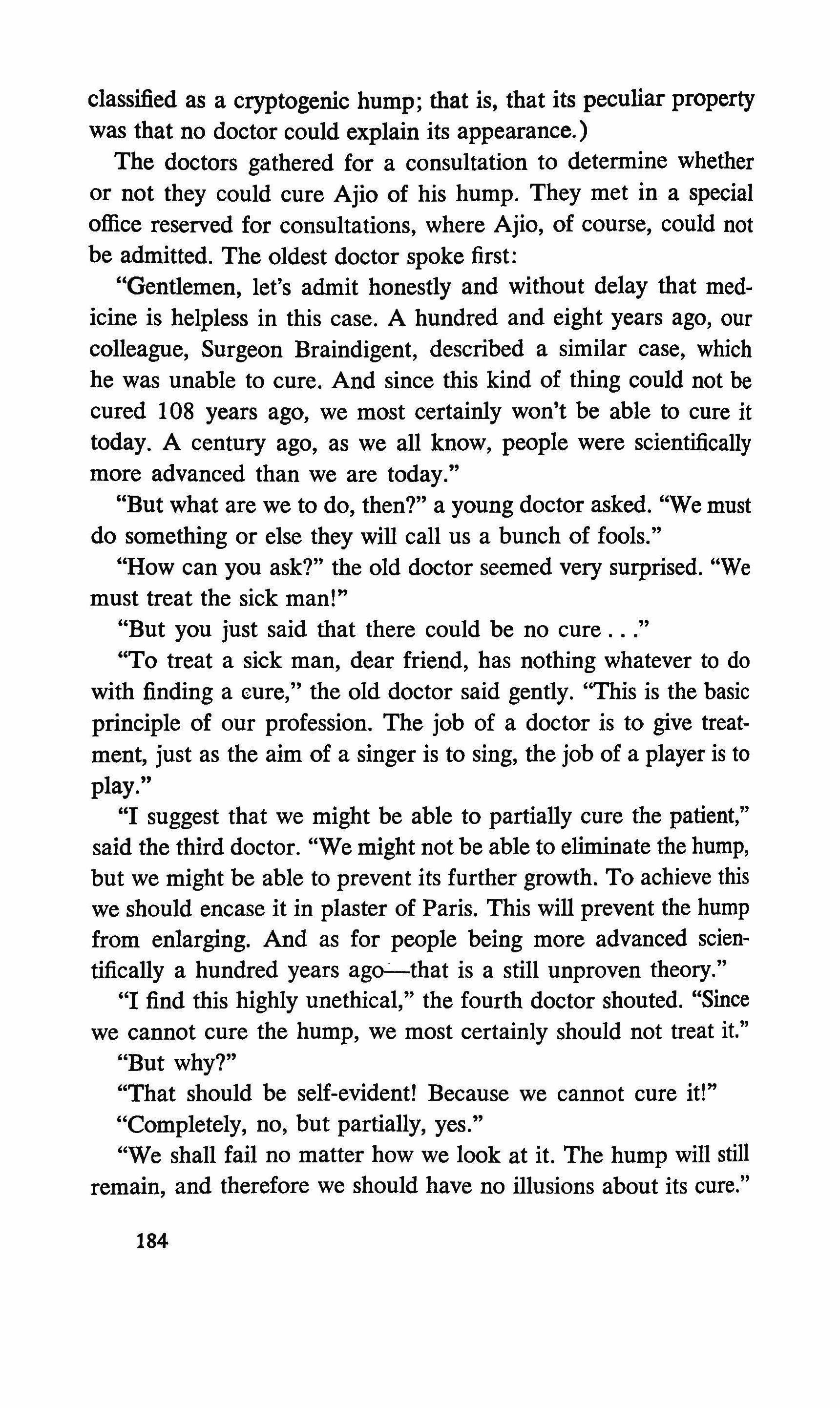
classified as a cryptogenic hump; that is, that its peculiar property was that no doctor could explain its appearance.)
The doctors gathered for a consultation to determine whether or not they could cure Ajio of his hump. They met in a special office reserved for consultations, where Ajio, of course, could not be admitted. The oldest doctor spoke first:
"Gentlemen, let's admit honestly and without delay that medicine is helpless in this case. A hundred and eight years ago, our colleague, Surgeon Braindigent, described a similar case, which he was unable to cure. And since this kind of thing could not be cured 108 years ago, we most certainly won't be able to cure it today. A century ago, as we all know, people were scientifically more advanced than we are today."
"But what are we to do, then?" a young doctor asked. "We must do something or else they will call us a bunch of fools."
"How can you ask?" the old doctor seemed very surprised. "We must treat the sick man!"
"But you just said that there could be no cure
"To treat a sick man, dear friend, has nothing whatever to do with finding a cure," the old doctor said gently. "This is the basic principle of our profession. The job of a doctor is to give treatment, just as the aim of a singer is to sing, the job of a player is to play."
"I suggest that we might be able to partially cure the patient," said the third doctor. "We might not be able to eliminate the hump, but we might be able to prevent its further growth. To achieve this we should encase it in plaster of Paris. This will prevent the hump from enlarging. And as for people being more advanced scientifically a hundred years ag�that is a still unproven theory."
"I find this highly unethical," the fourth doctor shouted. "Since we cannot cure the hump, we most certainly should not treat it."
"But why?"
"That should be self-evident! Because we cannot cure it!"
"Completely, no, but partially, yes."
"We shall fail no matter how we look at it. The hump will still remain, and therefore we should have no illusions about its cure."
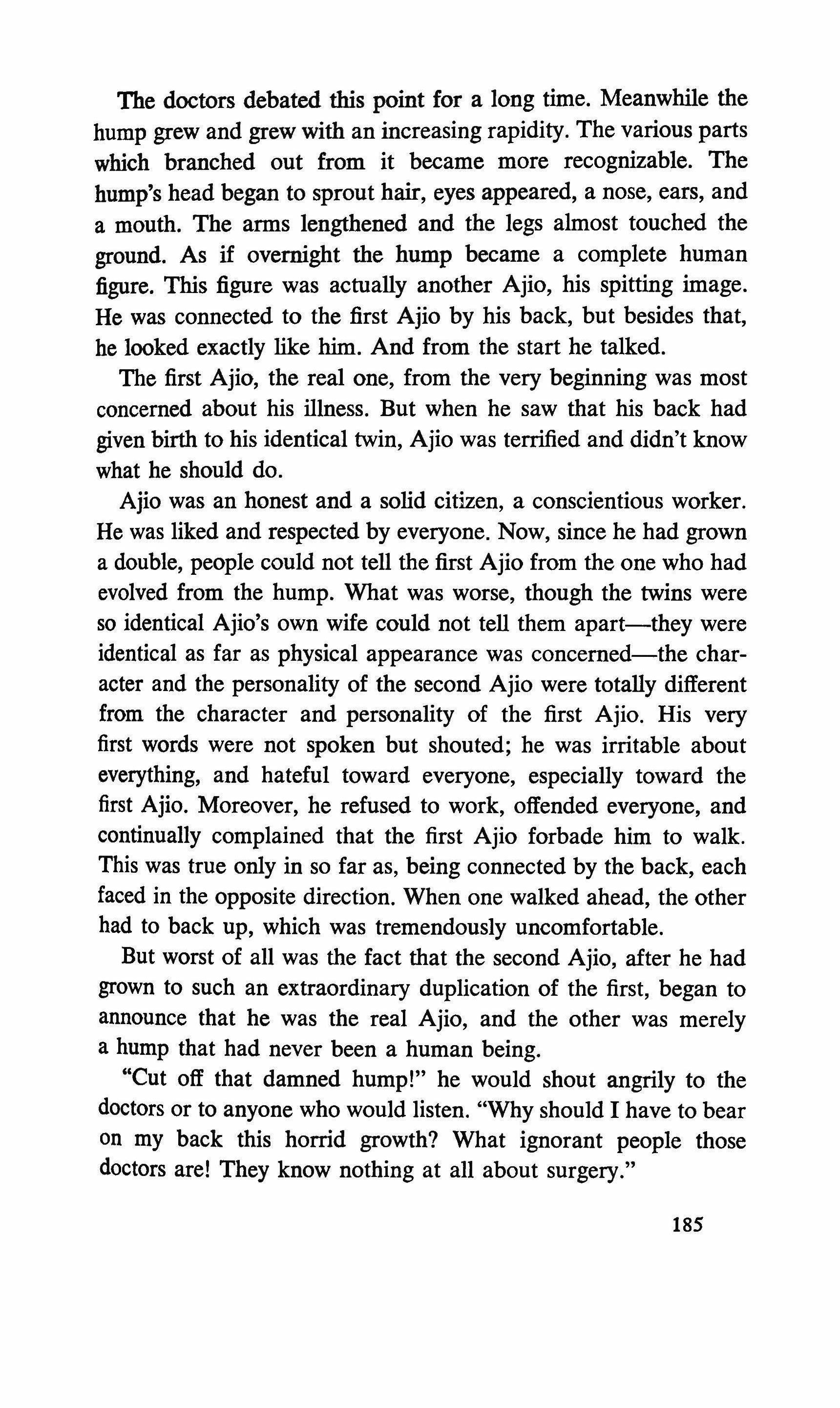
The doctors debated this point for a long time. Meanwhile the hump grew and grew with an increasing rapidity. The various parts which branched out from it became more recognizable. The hump's head began to sprout hair, eyes appeared, a nose, ears, and a mouth. The arms lengthened and the legs almost touched the ground. As if overnight the hump became a complete human figure. This figure was actually another Ajio, his spitting image. He was connected to the first Ajio by his back, but besides that, he looked exactly like him. And from the start he talked.
The first Ajio, the real one, from the very beginning was most concerned about his illness. But when he saw that his back had given birth to his identical twin, Ajio was terrified and didn't know what he should do.
Ajio was an honest and a solid citizen, a conscientious worker. He was liked and respected by everyone. Now, since he had grown a double, people could not tell the first Ajio from the one who had evolved from the hump. What was worse, though the twins were so identical Ajio's own wife could not tell them apart-they were identical as far as physical appearance was concerned-the character and the personality of the second Ajio were totally different from the character and personality of the first Ajio. His very first words were not spoken but shouted; he was irritable about everything, and hateful toward everyone, especially toward the first Ajio. Moreover, he refused to work, offended everyone, and continually complained that the first Ajio forbade him to walk. This was true only in so far as, being connected by the back, each faced in the opposite direction. When one walked ahead, the other had to back up, which was tremendously uncomfortable.
But worst of all was the fact that the second Ajio, after he had grown to such an extraordinary duplication of the first, began to announce that he was the real Ajio, and the other was merely a hump that had never been a human being.
"Cut off that damned hump!" he would shout angrily to the doctors or to anyone who would listen. "Why should I have to bear on my back this horrid growth? What ignorant people those doctors are! They know nothing at all about surgery."
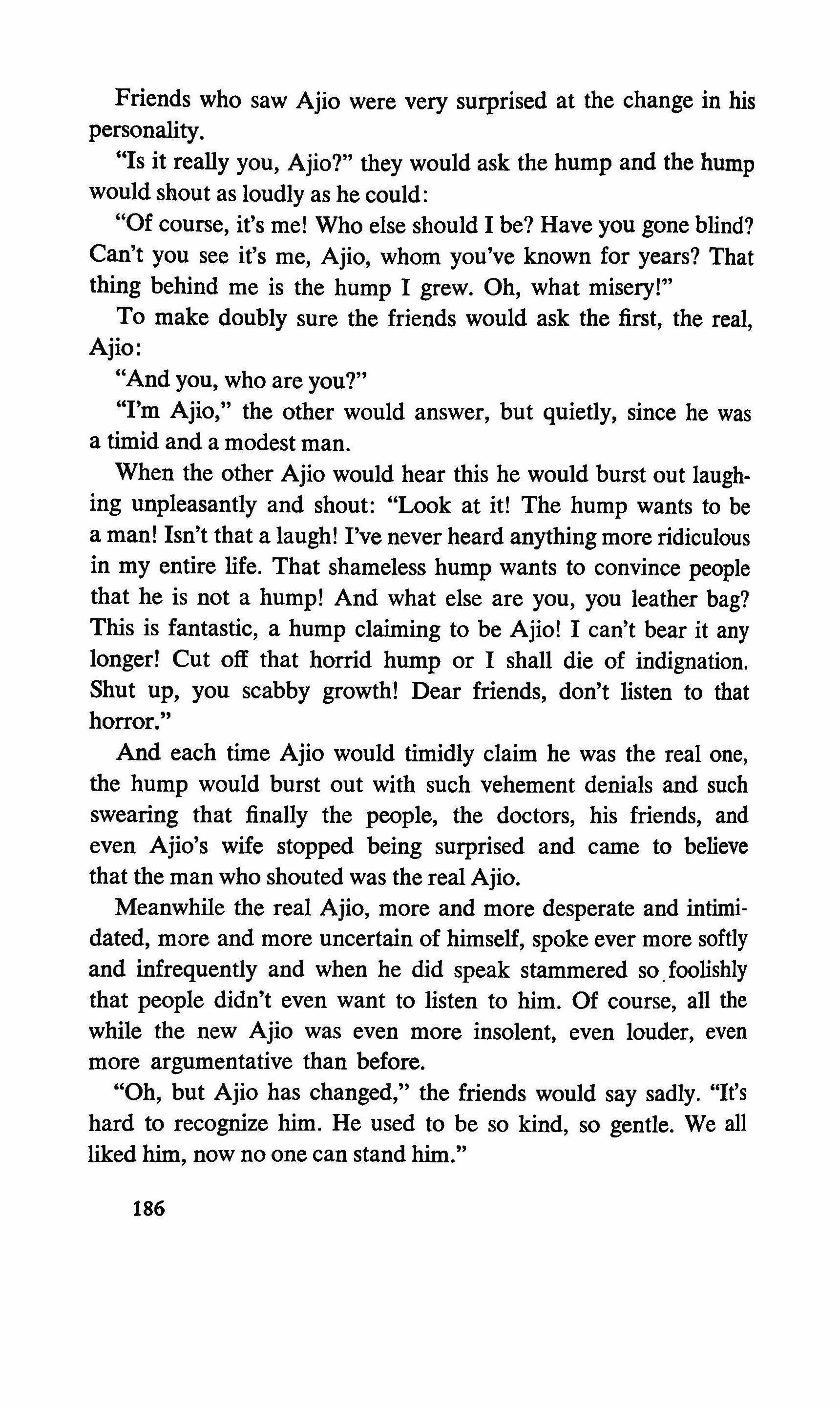
Friends who saw Ajio were very surprised at the change in his personality.
"Is it really you, Ajio?" they would ask the hump and the hump would shout as loudly as he could:
"Of course, it's me! Who else should I be? Have you gone blind? Can't you see it's me, Ajio, whom you've known for years? That thing behind me is the hump I grew. Oh, what misery!"
To make doubly sure the friends would ask the first, the real, Ajio:
"And you, who are you?"
"I'm Ajio," the other would answer, but quietly, since he was a timid and a modest man.
When the other Ajio would hear this he would burst out laughing unpleasantly and shout: "Look at it! The hump wants to be a man! Isn't that a laugh! I've never heard anything more ridiculous in my entire life. That shameless hump wants to convince people that he is not a hump! And what else are you, you leather bag? This is fantastic, a hump claiming to be Ajio! I can't bear it any longer! Cut off that horrid hump or I shall die of indignation. Shut up, you scabby growth! Dear friends, don't listen to that horror."
And each time Ajio would timidly claim he was the real one, the hump would burst out with such vehement denials and such swearing that finally the people, the doctors, his friends, and even Ajio's wife stopped being surprised and came to believe that the man who shouted was the real Ajio.
Meanwhile the real Ajio, more and more desperate and intimidated, more and more uncertain of himself, spoke ever more softly and infrequently and when he did speak stammered so. foolishly that people didn't even want to listen to him. Of course, all the while the new Ajio was even more insolent, even louder, even more argumentative than before.
"Oh, but Ajio has changed," the friends would say sadly. "It's hard to recognize him. He used to be so kind, so gentle. We all liked him, now no one can stand him."

"What do you expect?" replied the others. "He got a hump. Misfortunes make people change."
Then the conversation would turn to other people who were visited by misfortune, made bitter by sickness or bad luck, and they would forget about Ajio.
However, all through this time, the doctors continued to work on a treatment. They worked hard, day and night; they researched and they diagnosed, and finally, after many months, they invented a medicine for the hump. This was a powder, to be taken internally. three times a day after meals. They hoped that the powder would shrink the hump into oblivion within a few days.
The taste of the powder was bitter, but that could hardly matter if it were successful in curing the hump. The doctors experimented on several humpbacks, with ordinary humps, and found the results highly satisfactory. People lost their humps and praised the new medicine.
Finally the doctors were ready to administer their new medical discovery to Ajio. When they arrived at his house, Ajio, not the real one but the hump, began, as always, to scream his loud complaints about how it was impossible for him to go on and demanded that they cure him on the spot. The doctors calmed him by telling him that indeed that was what they had come for, that they had invented a most excellent treatment for his hump. The first Ajio, the real one, began to cry softly, whispering that he was the man, and the other merely his sickness. No one paid him much attention since the second Ajio silenced him by loud name-calling. Ajio's small son was the only one who cried loudly, trying to tell the doctors that the gentle one was his father and the loud one was a stranger. The grownups ignored him, since small children have not judgment enough to know better than adults.
The doctors, after a short consultation, administered the powder to the second Ajio, to the hump. The second Ajio eagerly swallowed it. As soon as he tasted its bitterness he began to revile the doctors for their stupidity in not inventing a sweet-tasting medicine, or possibly one with an artificial orange flavor.
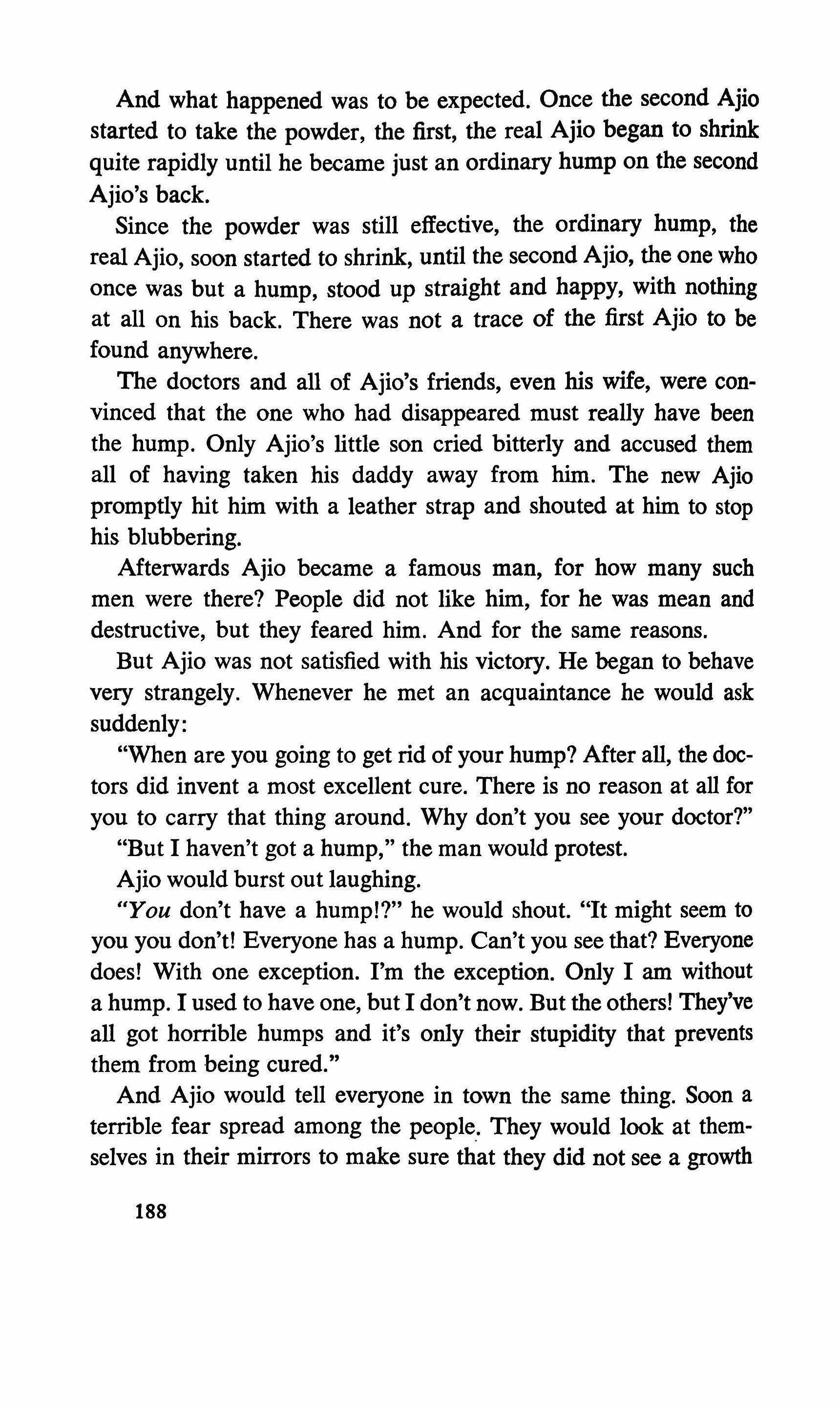
And what happened was to be expected. Once the second Ajio started to take the powder, the first, the real Ajio began to shrink quite rapidly until he became just an ordinary hump on the second Ajio's back.
Since the powder was still effective, the ordinary hump, the real Ajio, soon started to shrink, until the second Ajio, the one who once was but a hump, stood up straight and happy, with nothing at all on his back. There was not a trace of the first Ajio to be found anywhere.
The doctors and all of Ajio's friends, even his wife, were convinced that the one who had disappeared must really have been the hump. Only Ajio's little son cried bitterly and accused them all of having taken his daddy away from him. The new Ajio promptly hit him with a leather strap and shouted at him to stop his blubbering.
Afterwards Ajio became a famous man, for how many such men were there? People did not like him, for he was mean and destructive, but they feared him. And for the same reasons.
But Ajio was not satisfied with his victory. He began to behave very strangely. Whenever he met an acquaintance he would ask suddenly:
"When are you going to get rid of your hump? After all, the doctors did invent a most excellent cure. There is no reason at all for you to carry that thing around. Why don't you see your doctor?"
"But I haven't got a hump," the man would protest. Ajio would burst out laughing.
"You don't have a hump!?" he would shout. "It might seem to you you don't! Everyone has a hump. Can't you see that? Everyone does! With one exception. I'm the exception. Only I am without a hump. I used to have one, but I don't now. But the others! They've all got horrible humps and it's only their stupidity that prevents them from being cured."
And Ajio would tell everyone in town the same thing. Soon a terrible fear spread among the people: They would look at themselves in their mirrors to make sure that they did not see a growth
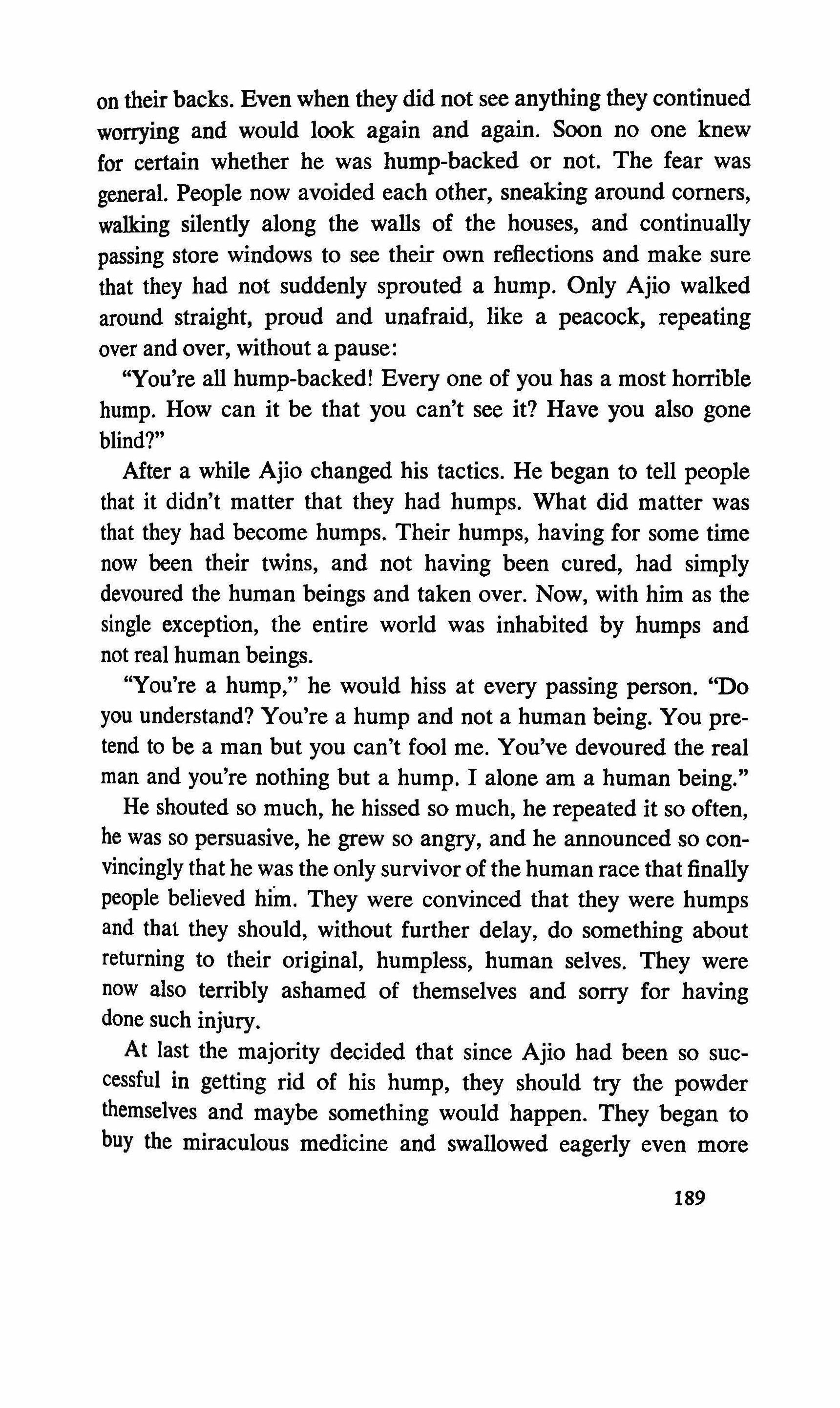
on their backs. Even when they did not see anything they continued worrying and would look again and again. Soon no one knew for certain whether he was hump-backed or not. The fear was general. People now avoided each other, sneaking around corners, walking silently along the walls of the houses, and continually passing store windows to see their own reflections and make sure that they had not suddenly sprouted a hump. Only Ajio walked around straight, proud and unafraid, like a peacock, repeating over and over, without a pause:
"You're all hump-backed! Every one of you has a most horrible hump. How can it be that you can't see it? Have you also gone blind?"
After a while Ajio changed his tactics. He began to tell people that it didn't matter that they had humps. What did matter was that they had become humps. Their humps, having for some time now been their twins, and not having been cured, had simply devoured the human beings and taken over. Now, with him as the single exception, the entire world was inhabited by humps and not real human beings.
"You're a hump," he would hiss at every passing person. "Do you understand? You're a hump and not a human being. You pretend to be a man but you can't fool me. You've devoured the real man and you're nothing but a hump. I alone am a human being."
He shouted so much, he hissed so much, he repeated it so often, he was so persuasive, he grew so angry, and he announced so convincingly that he was the only survivor of the human race that finally people believed him. They were convinced that they were humps and that they should, without further delay, do something about returning to their original, humpless, human selves. They were now also terribly ashamed of themselves and sorry for having done such injury.
At last the majority decided that since Ajio had been so successful in getting rid of his hump, they should try the powder themselves and maybe something would happen. They began to buy the miraculous medicine and swallowed eagerly even more
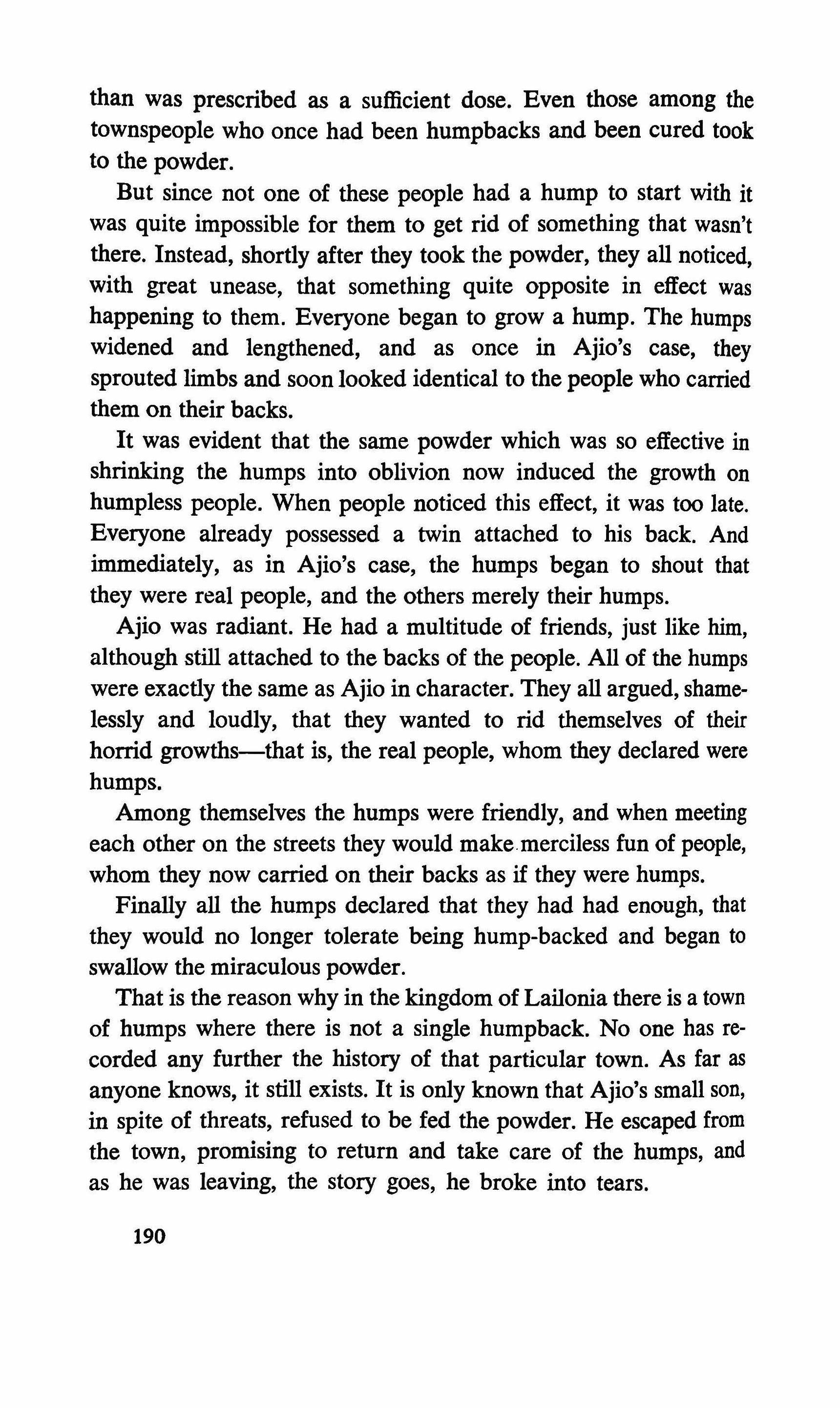
than was prescribed as a sufficient dose. Even those among the townspeople who once had been humpbacks and been cured took to the powder.
But since not one of these people had a hump to start with it was quite impossible for them to get rid of something that wasn't there. Instead, shortly after they took the powder, they all noticed, with great unease, that something quite opposite in effect was happening to them. Everyone began to grow a hump. The humps widened and lengthened, and as once in Ajio's case, they sprouted limbs and soon looked identical to the people who carried them on their backs.
It was evident that the same powder which was so effective in shrinking the humps into oblivion now induced the growth on humpless people. When people noticed this effect, it was too late. Everyone already possessed a twin attached to his back. And immediately, as in Ajio's case, the humps began to shout that they were real people, and the others merely their humps.
Ajio was radiant. He had a multitude of friends, just like him, although still attached to the backs of the people. All of the humps were exactly the same as Ajio in character. They all argued, shamelessly and loudly, that they wanted to rid themselves of their horrid growths-that is, the real people, whom they declared were humps.
Among themselves the humps were friendly, and when meeting each other on the streets they would make.merciless fun of people, whom they now carried on their backs as if they were humps.
Finally all the humps declared that they had had enough, that they would no longer tolerate being hump-backed and began to swallow the miraculous powder.
That is the reason why in the kingdom of Lailonia there is a town of humps where there is not a single humpback. No one has recorded any further the history of that particular town. As far as anyone knows, it still exists. It is only known that Ajio's small son, in spite of threats, refused to be fed the powder. He escaped from the town, promising to return and take care of the humps, and as he was leaving, the story goes, he broke into tears.
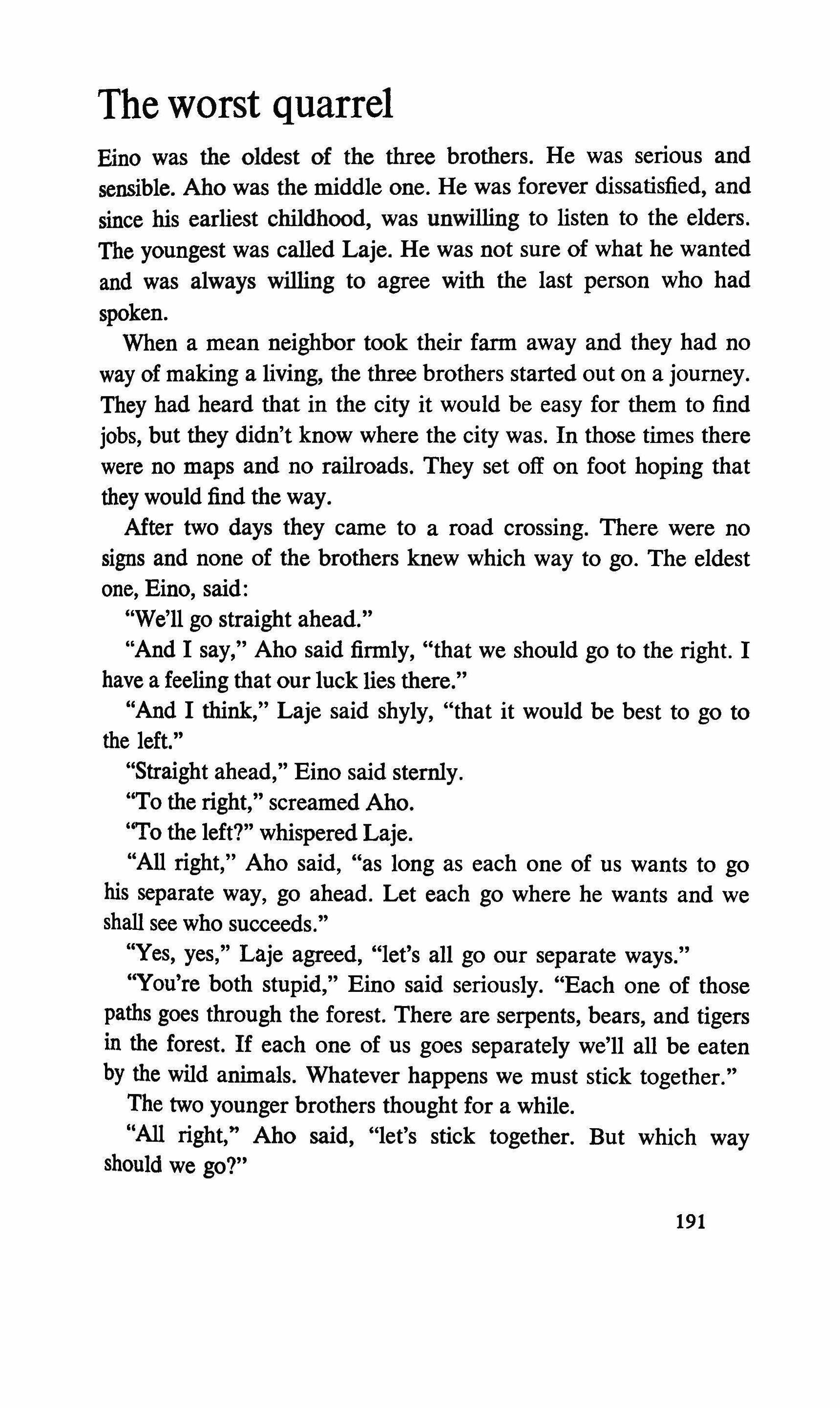
Eino was the oldest of the three brothers. He was serious and sensible. Aho was the middle one. He was forever dissatisfied, and since his earliest childhood, was unwilling to listen to the elders. The youngest was called Laje. He was not sure of what he wanted and was always willing to agree with the last person who had spoken.
When a mean neighbor took their farm away and they had no way of making a living, the three brothers started out on a journey. They had heard that in the city it would be easy for them to find jobs, but they didn't know where the city was. In those times there were no maps and no railroads. They set off on foot hoping that they would find the way.
After two days they came to a road crossing. There were no signs and none of the brothers knew which way to go. The eldest one, Eino, said:
"We'll go straight ahead."
"And I say," Aho said firmly, "that we should go to the right. I have a feeling that our luck lies there."
"And I think," Laje said shyly, "that it would be best to go to the left."
"Straight ahead," Eino said sternly.
"To the right," screamed Aho.
"To the left?" whispered Laje.
"All right," Aho said, "as long as each one of us wants to go his separate way, go ahead. Let each go where he wants and we shall see who succeeds."
"Yes, yes," Laje agreed, "let's all go our separate ways."
"You're both stupid," Eino said seriously. "Each one of those paths goes through the forest. There are serpents, bears, and tigers in the forest. If each one of us goes separately we'll all be eaten by the wild animals. Whatever happens we must stick together."
The two younger brothers thought for a while.
"All right," Aho said, "let's stick together. But which way should we go?"
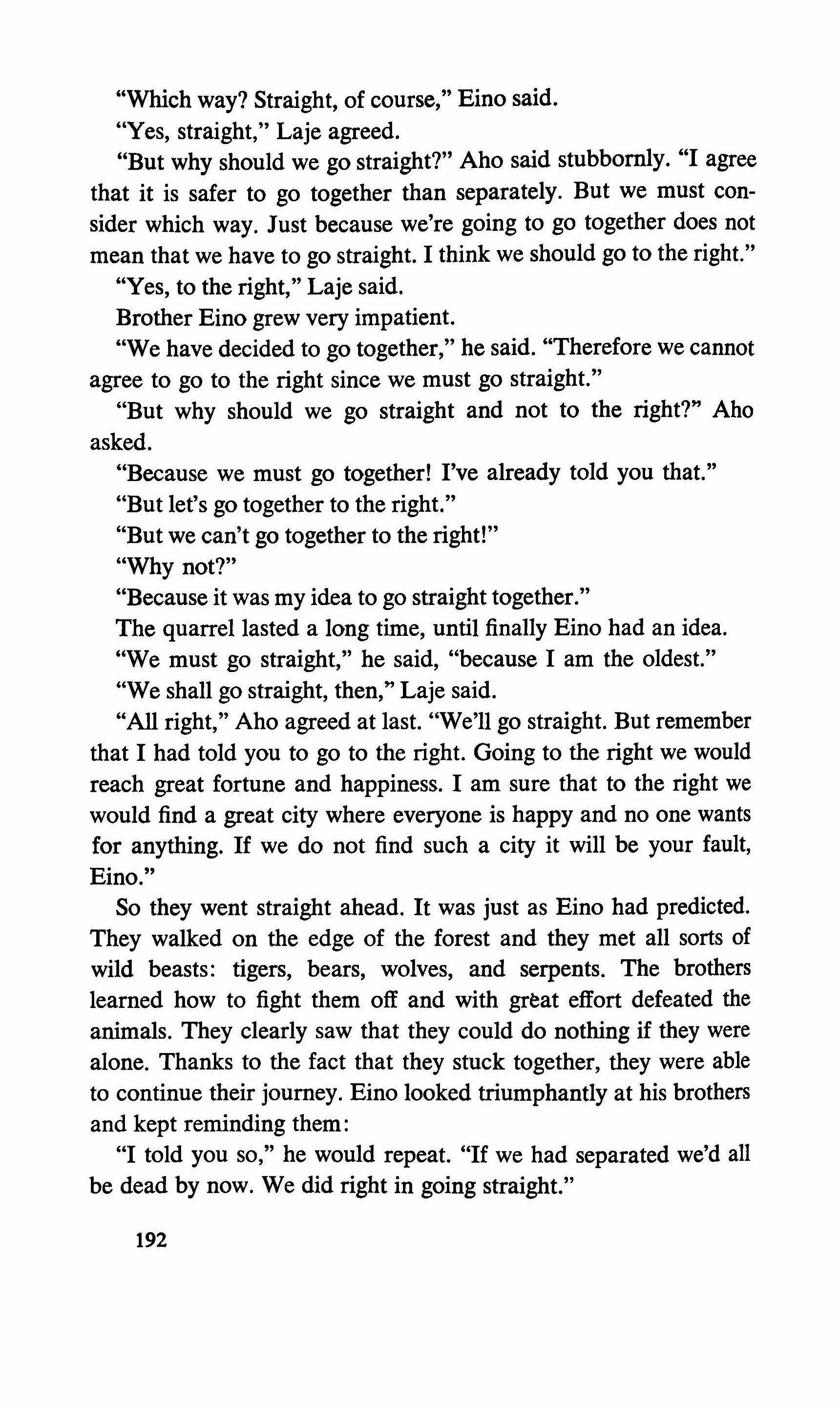
"Which way? Straight, of course," Eino said.
"Yes, straight," Laje agreed.
"But why should we go straight?" Aho said stubbornly. "I agree that it is safer to go together than separately. But we must consider which way. Just because we're going to go together does not mean that we have to go straight. I think we should go to the right."
"Yes, to the right," Laje said.
Brother Eino grew very impatient.
"We have decided to go together," he said. "Therefore we cannot agree to go to the right since we must go straight."
"But why should we go straight and not to the right?" Aho asked.
"Because we must go together! I've already told you that."
"But let's go together to the right."
"But we can't go together to the right!"
"Why not?"
"Because it was my idea to go straight together."
The quarrel lasted a long time, until finally Eino had an idea.
"We must go straight," he said, "because I am the oldest."
"We shall go straight, then," Laje said.
"All right," Aho agreed at last. "We'll go straight. But remember that I had told you to go to the right. Going to the right we would reach great fortune and happiness. I am sure that to the right we would find a great city where everyone is happy and no one wants for anything. If we do not find such a city it will be your fault, Eino."
So they went straight ahead. It was just as Eino had predicted. They walked on the edge of the forest and they met all sorts of wild beasts: tigers, bears, wolves, and serpents. The brothers learned how to fight them off and with great effort defeated the animals. They clearly saw that they could do nothing if they were alone. Thanks to the fact that they stuck together, they were able to continue their journey. Eino looked triumphantly at his brothers and kept reminding them:
"I told you so," he would repeat. "If we had separated we'd all be dead by now. We did right in going straight."
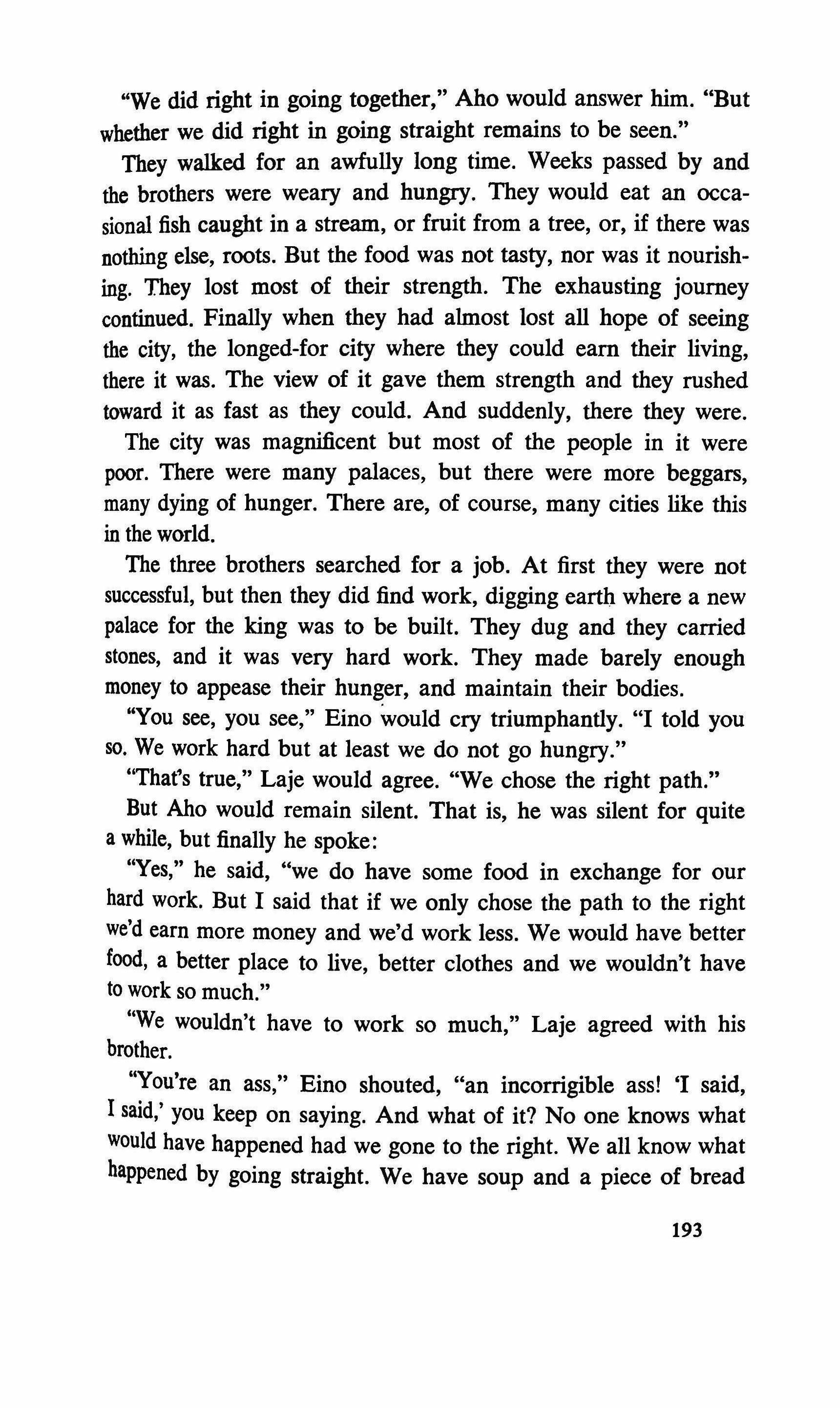
"We did right in going together," Aho would answer him. "But whether we did right in going straight remains to be seen."
They walked for an awfully long time. Weeks passed by and the brothers were weary and hungry. They would eat an occasional fish caught in a stream, or fruit from a tree, or, if there was nothing else, roots. But the food was not tasty, nor was it nourishing. They lost most of their strength. The exhausting journey continued. Finally when they had almost lost all hope of seeing the city, the longed-for city where they could earn their living, there it was. The view of it gave them strength and they rushed toward it as fast as they could. And suddenly, there they were.
The city was magnificent but most of the people in it were poor. There were many palaces, but there were more beggars, many dying of hunger. There are, of course, many cities like this in the world.
The three brothers searched for a job. At first they were not successful, but then they did find work, digging earth where a new palace for the king was to be built. They dug and they carried stones, and it was very hard work. They made barely enough money to appease their hunger, and maintain their bodies.
"You see, you see," Eino would cry triumphantly. "I told you so. We work hard but at least we do not go hungry."
"That's true," Laje would agree. "We chose the right path."
But Abo would remain silent. That is, he was silent for quite a while, but finally he spoke:
"Yes," he said, "we do have some food in exchange for our hard work. But 1 said that if we only chose the path to the right we'd earn more money and we'd work less. We would have better food, a better place to live, better clothes and we wouldn't have to work so much."
"We wouldn't have to work so much," Laje agreed with his brother.
"You're an ass," Eino shouted, "an incorrigible ass! 'I said, I said,' you keep on saying. And what of it? No one knows what would have happened had we gone to the right. We all know what happened by going straight. We have soup and a piece of bread
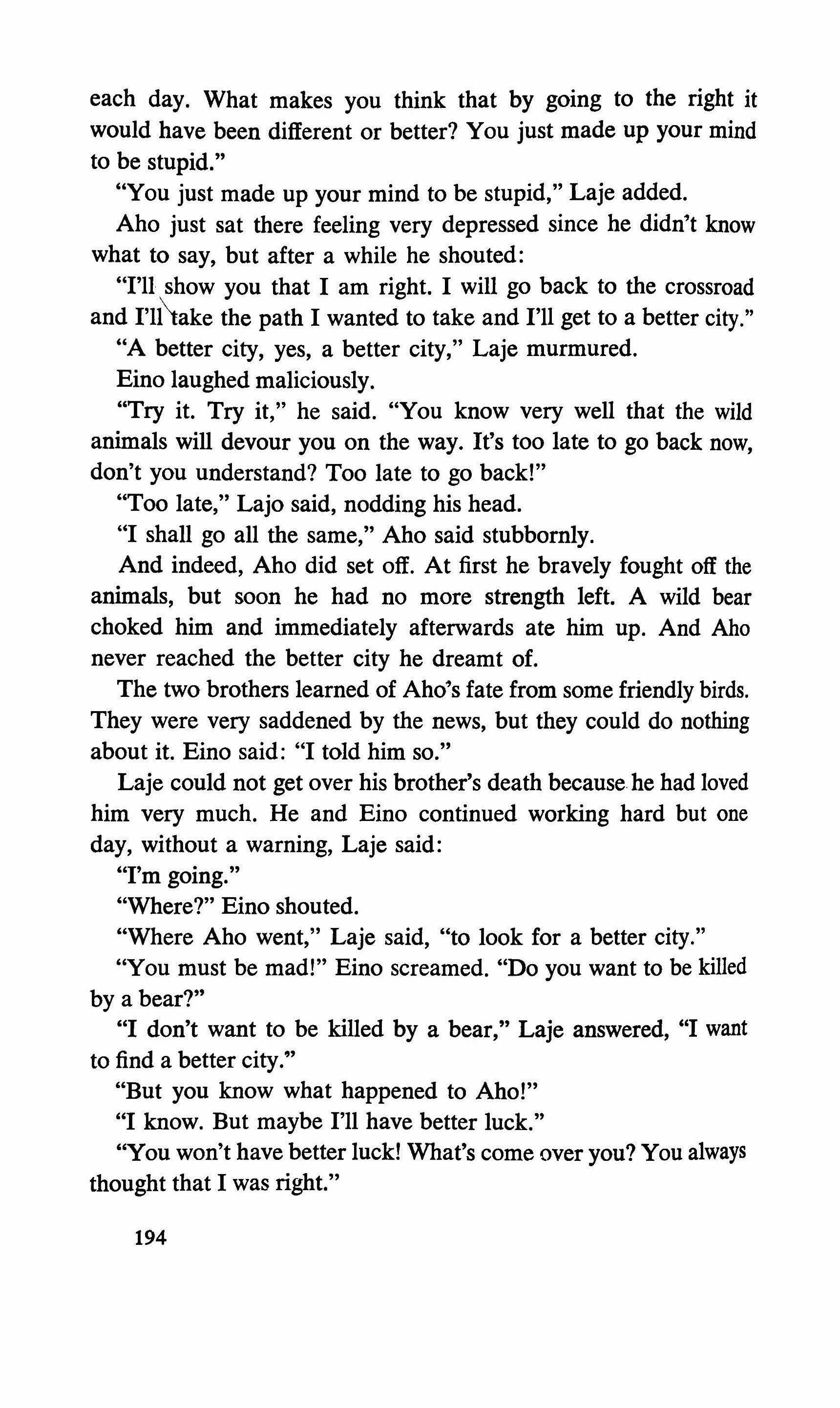
each day. What makes you think that by going to the right it would have been different or better? You just made up your mind to be stupid."
"You just made up your mind to be stupid," Laje added. Aho just sat there feeling very depressed since he didn't know what to say, but after a while he shouted:
"I'll show you that I am right. I will go back to the crossroad and I'll\ake the path I wanted to take and I'll get to a better city."
"A better city, yes, a better city," Laje murmured.
Eino laughed maliciously.
"Try it. Try it," he said. "You know very well that the wild animals will devour you on the way. It's too late to go back now, don't you understand? Too late to go back!"
"Too late," Lajo said, nodding his head.
"I shall go all the same," Aho said stubbornly.
And indeed, Aho did set off. At first he bravely fought off the animals, but soon he had no more strength left. A wild bear choked him and immediately afterwards ate him up. And Aho never reached the better city he dreamt of.
The two brothers learned of Aho's fate from some friendly birds. They were very saddened by the news, but they could do nothing about it. Eino said: "I told him so."
Laje could not get over his brother's death because he had loved him very much. He and Eino continued working hard but one day, without a warning, Laje said:
"I'm going."
"Where?" Eino shouted.
"Where Aho went," Laje said, "to look for a better city."
"You must be mad!" Eino screamed. "Do you want to be killed by a bear?"
"I don't want to be killed by a bear," Laje answered, "I want to find a better city."
"But you know what happened to Aho!"
"I know. But maybe I'll have better luck."
"You won't have better luck! What's come over you? You always thought that I was right." 194
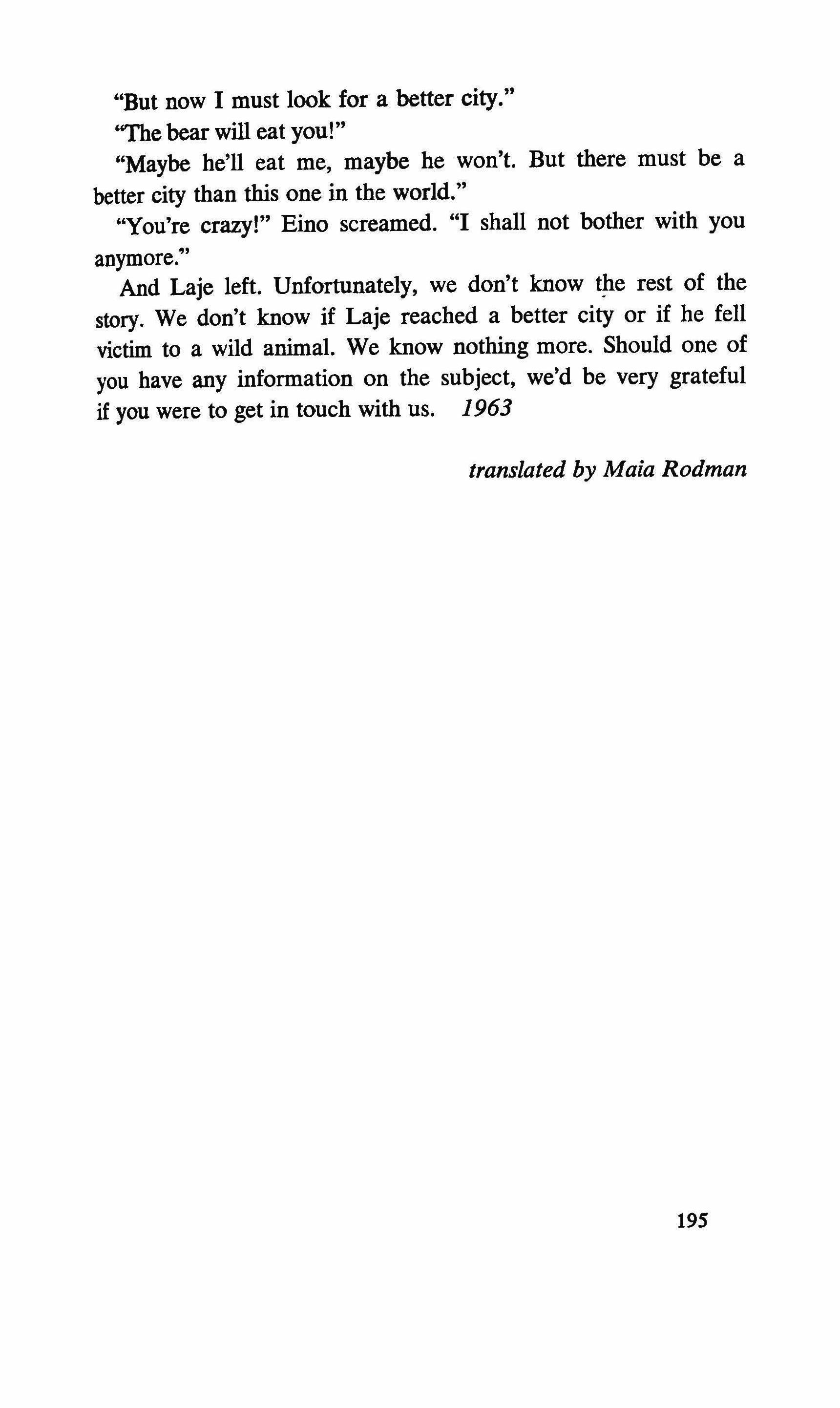
"But now 1 must look for a better city."
"The bear will eat you!"
"Maybe he'll eat me, maybe he won't. But there must be a better city than this one in the world."
"You're crazy!" Eino screamed. "I shall not bother with you anymore."
And Laje left. Unfortunately, we don't know the rest of the story. We don't know if Laje reached a better city or if he fell victim to a wild animal. We know nothing more. Should one of you have any information on the subject, we'd be very grateful if you were to get in touch with us. 1963
translated by Maia Rodman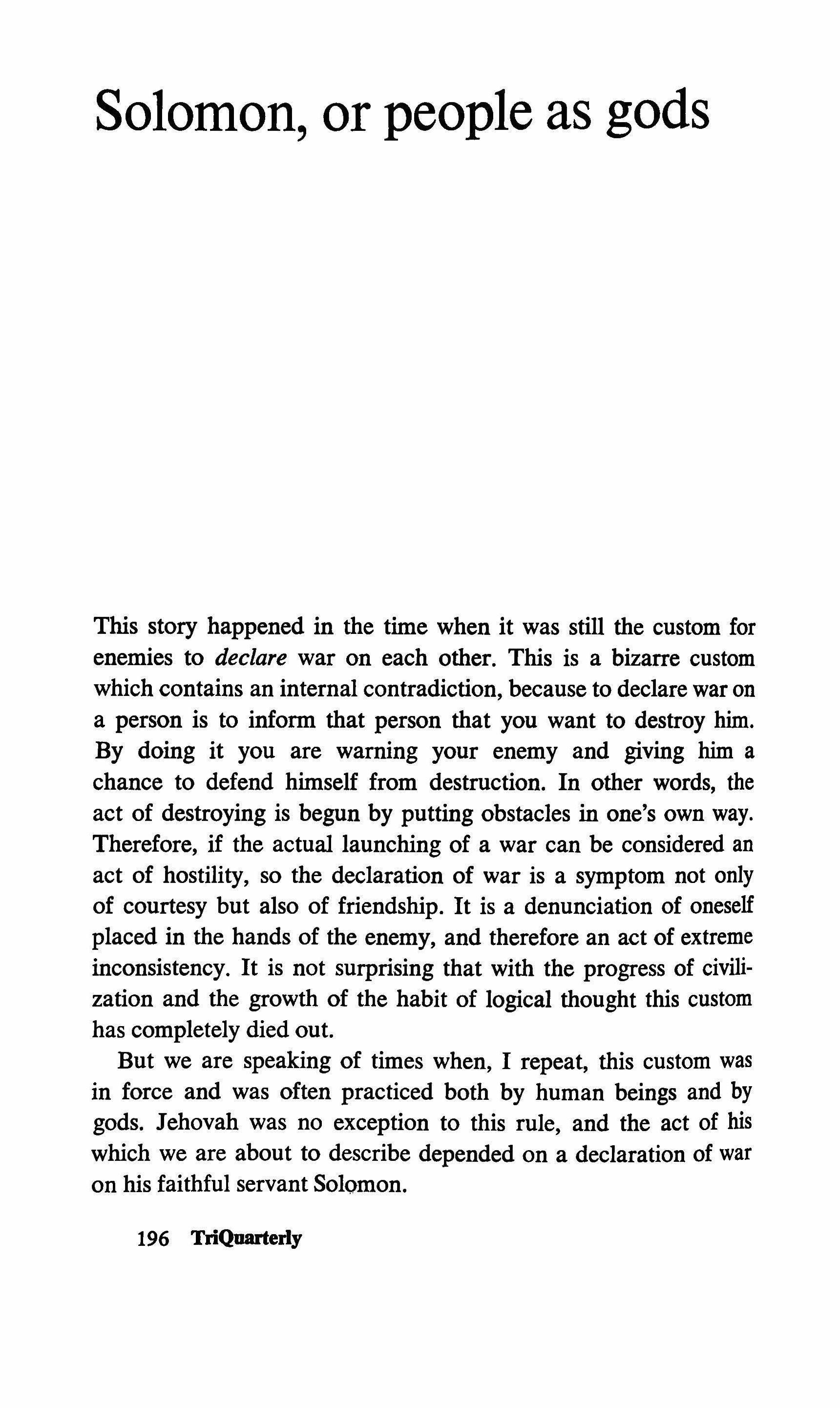
This story happened in the time when it was still the custom for enemies to declare war on each other. This is a bizarre custom which contains an internal contradiction, because to declare war on a person is to inform that person that you want to destroy him. By doing it you are warning your enemy and giving him a chance to defend himself from destruction. In other words, the act of destroying is begun by putting obstacles in one's own way. Therefore, if the actual launching of a war can be considered an act of hostility, so the declaration of war is a symptom not only of courtesy but also of friendship. It is a denunciation of oneself placed in the hands of the enemy, and therefore an act of extreme inconsistency. It is not surprising that with the progress of civilization and the growth of the habit of logical thought this custom has completely died out.
But we are speaking of times when, I repeat, this custom was in force and was often practiced both by human beings and by gods. Jehovah was no exception to this rule, and the act of his which we are about to describe depended on a declaration of war on his faithful servant Solomon.

Solomon had been behaving extremely irresponsibly and upsetting Jehovah very much. He was a man with a highly developed libido-a fact which took up much of his time and money. It is written in the Book of Kings that Jerusalem was at that time supporting seven hundred royal wives and three hundred royal concubines. The difference between these two categories was a subtle one and very hard to explain, but it is a fact that roughly a thousand women were engaged in relieving the autocrat's lust and were living off his income. Jehovah was understanding. He could sympathize with human weaknesses-if one can term it a weakness to live with a thousand women at the same time. But in the end it became too much. Solomon became so insolent that he began to give way to his women in matters of religion. We must remember that most of these women were of foreign origin and worshiped completely alien gods, with many of whom Jehovah was known.to-be on terms of war. But Solomon, like every know-it-all, had a weak character and gave in easily to various suggestions. In moments of weakness he would promise various things to his wives, and then he would be ashamed to go back on what he had promised. And all the time his wives were making demands in favor of their various gods. And no wonder. Everyone wants to offer praise to his own god, all the more so when it can be done at someone else's expense. And so the situation became worse and worse. Jerusalem swarmed with temples ablaze with gold, built to honor vast numbers of gods. It was complete chaos. The faithful had no idea where to go. The most hideous sects flourished with impunity throughout the capital; alien priests ran riot through the royal court. The state treasurehouse began to melt like the snow in spring. We all know how much it costs to cultivate one god, but when it is a matter of twenty or thirty So there it was: Moloch, Osiris, Astaroth, Chamos-whole mountains of gods began to smile down shamelessly from their gilded statues, breathing in the stench of the incense which was burnt in their exclusive honor.
Jehovah boiled with rage. He observed in despair how his rivals, many of whom had been on their last legs and were expected 197

any day to throw in the towel, began to take on a new life, to grow fat and exhibit greater and greater vitality. At the same time, he was growing thin and sad. Deprived of his sacrificial victims and faithful hearts, his torments grew worse and worse. And the sight of alien temples being built as though to mock him in the middle of his own capital caused him to suffer attacks of unbridled fury. All this became a threat both to his own health and to that of all the inhabitants of the globe.
Solomon thought a bit about his ambiguous situation. To be sure, it did strike him as somewhat awkward. His wives continually forced him to expend more and more money on their foreign gods. Occasionally he tried to protest but each time he was defeated. All he could do was breathe a sigh and sign the checks. He lay awake at nights thinking about Jehovah. "God is infinitely merciful," he thought, repeating again and again the sentence he had read in his catechism. But of course in the depths of his soul he did not believe this.
As could be foreseen, the whole thing finished as a great cause celebre. First of all, there was a short telegram to Solomon: "Stop this idolatry immediately. Jehovah." And Solomon's reply: "All right. Very well. Solomon." But even after this the temples of the unclean gods continued to grow throughout the capital like mushrooms after rain. The true religion was, to all intents and purposes, ousted.
Then a second exchange of telegrams took place, which was in the form of an ultimatum: "It seems to me that you regard my endurance as infinite. Jehovah." At once Solomon replied: "That's right. Solomon." To which Jehovah countered: "In that case, kindly take note that my infinity is exhausted. Jehovah."
The matter now rested on a knife edge. To Jerusalem came a messenger from Jehovah, a red-haired cherub who wore pincenez. Without knocking, he entered the audience chamber of the king. He dispensed with preliminaries and, lolling in one of the king's armchairs, he began to address him in a determined tone.
"Jehovah has demanded the liquidation of all false cults in the course of the next twenty-four hours. Otherwise, he has said, the
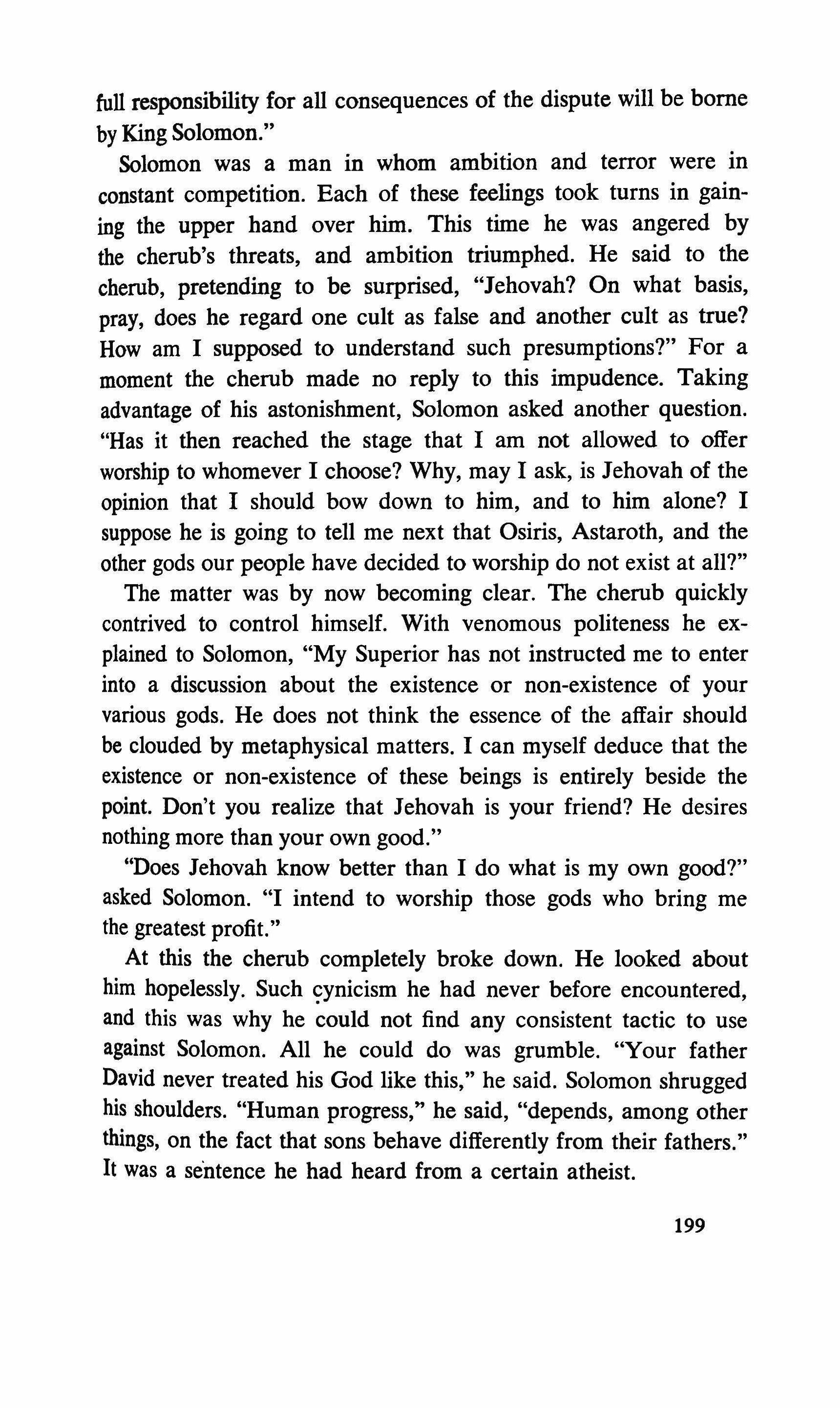
full responsibility for all consequences of the dispute will be borne by King Solomon."
Solomon was a man in whom ambition and terror were in constant competition. Each of these feelings took turns in gaining the upper hand over him. This time he was angered by the cherub's threats, and ambition triumphed. He said to the cherub, pretending to be surprised, "Jehovah? On what basis, pray, does he regard one cult as false and another cult as true? How am 1 supposed to understand such presumptions?" For a moment the cherub made no reply to this impudence. Taking advantage of his astonishment, Solomon asked another question. "Has it then reached the stage that 1 am not allowed to offer worship to whomever 1 choose? Why, may 1 ask, is Jehovah of the opinion that 1 should bow down to him, and to him alone? 1 suppose he is going to tell me next that Osiris, Astaroth, and the other gods our people have decided to worship do not exist at all?"
The matter was by now becoming clear. The cherub quickly contrived to control himself. With venomous politeness he explained to Solomon, "My Superior has not instructed me to enter into a discussion about the existence or non-existence of your various gods. He does not think the essence of the affair should be clouded by metaphysical matters. 1 can myself deduce that the existence or non-existence of these beings is entirely beside the point. Don't you realize that Jehovah is your friend? He desires nothing more than your own good."
"Does Jehovah know better than 1 do what is my own good?" asked Solomon. "I intend to worship those gods who bring me the greatest profit."
At this the cherub completely broke down. He looked about him hopelessly. Such cynicism he had never before encountered, and this was why he could not find any consistent tactic to use against Solomon. All he could do was grumble. "Your father David never treated his God like this," he said. Solomon shrugged his shoulders. "Human progress," he said, "depends, among other things, on the fact that sons behave differently from their fathers." It was a sentence he had heard from a certain atheist.
199
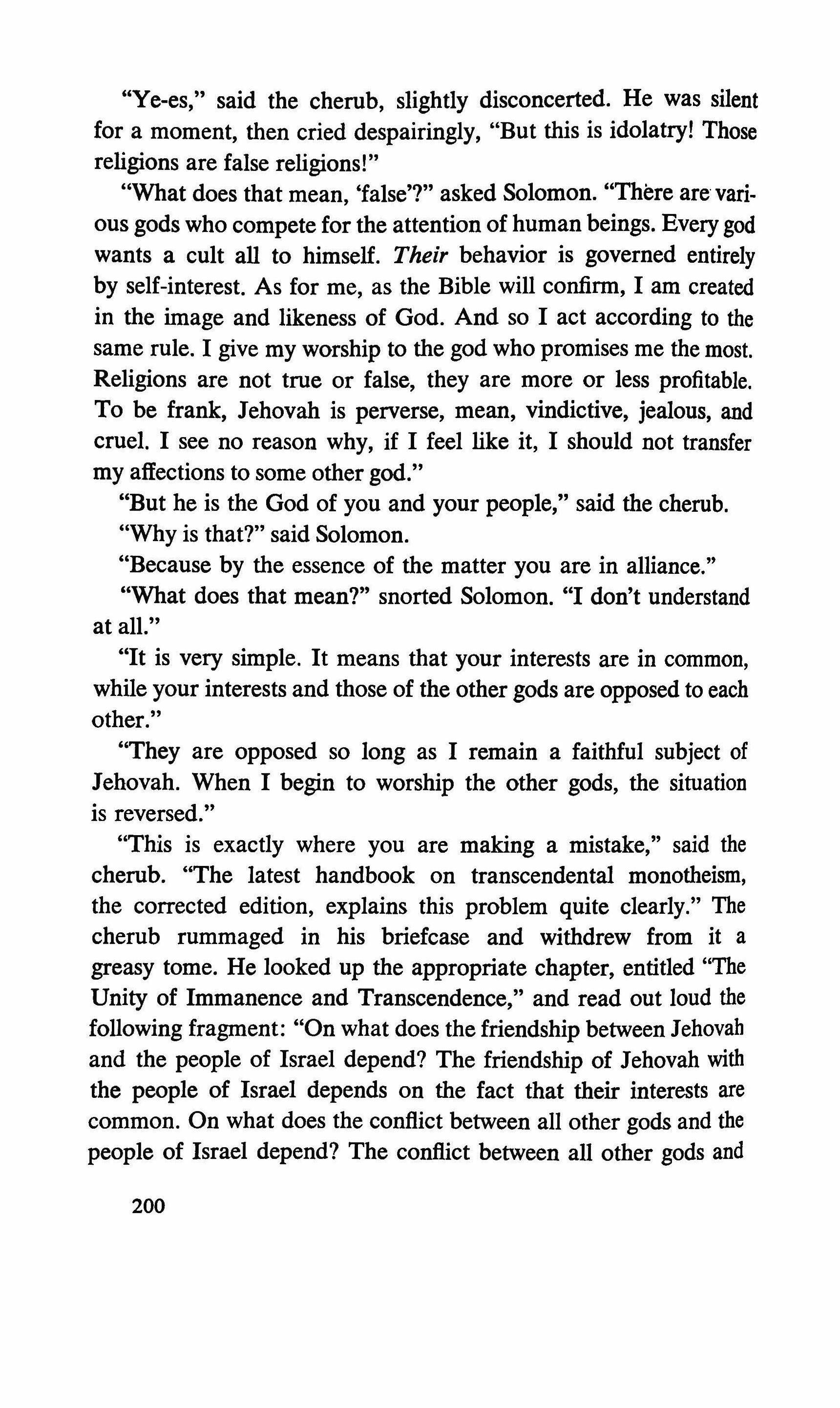
"Ye-es," said the cherub, slightly disconcerted. He was silent for a moment, then cried despairingly, "But this is idolatry! Those religions are false religions!"
"What does that mean, 'false'?" asked Solomon. "There are various gods who compete for the attention of human beings. Everygod wants a cult all to himself. Their behavior is governed entirely by self-interest. As for me, as the Bible will confirm, I am created in the image and likeness of God. And so I act according to the same rule. I give my worship to the god who promises me the most. Religions are not true or false, they are more or less profitable. To be frank, Jehovah is perverse, mean, vindictive, jealous, and cruel. I see no reason why, if I feel like it, I should not transfer my affections to some other god."
"But he is the God of you and your people," said the cherub. "Why is that?" said Solomon.
"Because by the essence of the matter you are in alliance." "What does that mean?" snorted Solomon. "I don't understand at all."
"It is very simple. It means that your interests are in common, while your interests and those of the other gods are opposed to each other."
"They are opposed so long as I remain a faithful subject of Jehovah. When I begin to worship the other gods, the situation is reversed."
"This is exactly where you are making a mistake," said the cherub. "The latest handbook on transcendental monotheism, the corrected edition, explains this problem quite clearly." The cherub rummaged in his briefcase and withdrew from it a greasy tome. He looked up the appropriate chapter, entitled "The Unity of Immanence and Transcendence," and read out loud the following fragment: "On what does the friendship between Jehovah and the people of Israel depend? The friendship of Jehovah with the people of Israel depends on the fact that their interests are common. On what does the conflict between all other gods and the people of Israel depend? The conflict between all other gods and
200
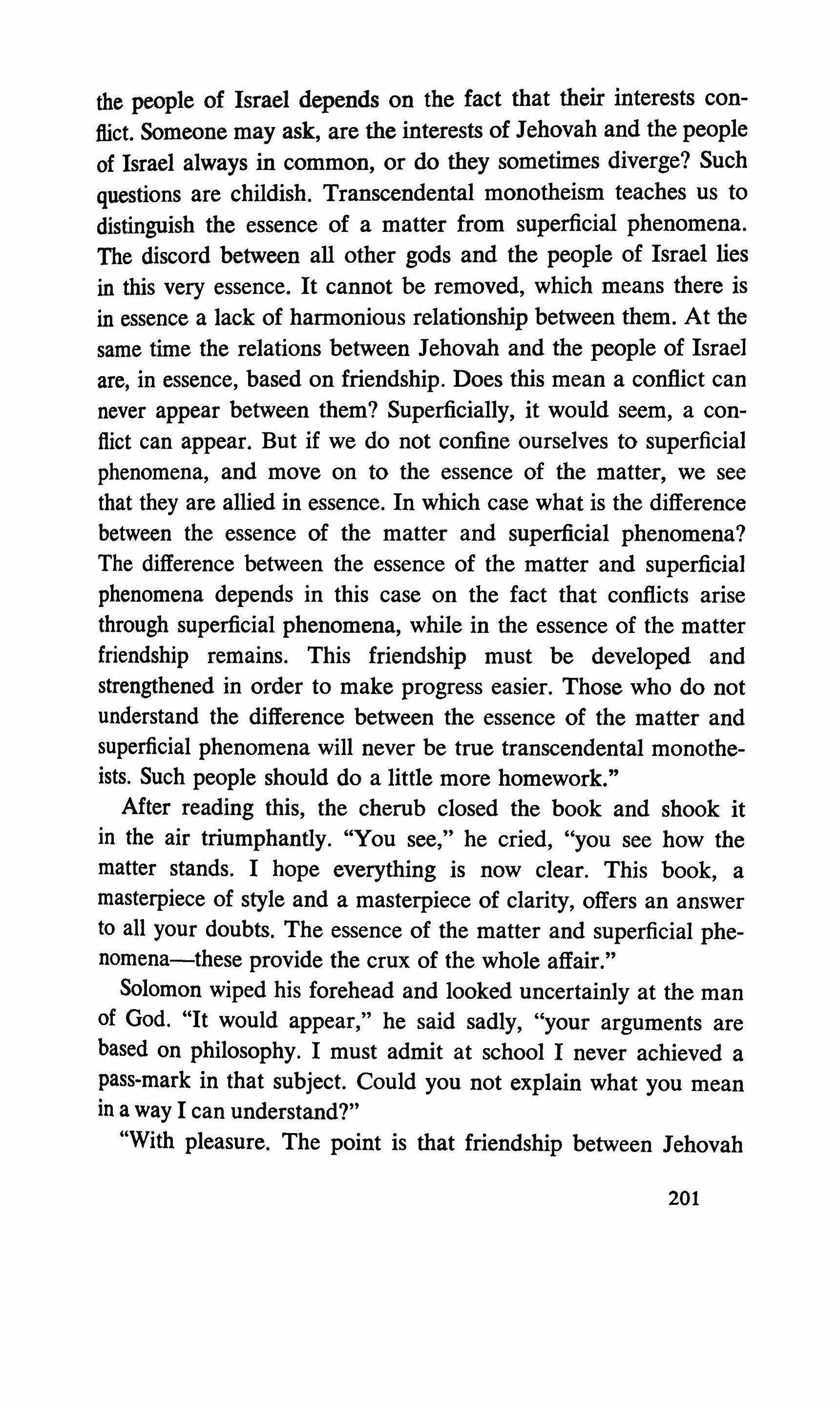
the people of Israel depends on the fact that their interests conflict. Someone may ask, are the interests of Jehovah and the people of Israel always in common, or do they sometimes diverge? Such questions are childish. Transcendental monotheism teaches us to distinguish the essence of a matter from superficial phenomena. The discord between all other gods and the people of Israel lies in this very essence. It cannot be removed, which means there is in essence a lack of harmonious relationship between them. At the same time the relations between Jehovah and the people of Israel are, in essence, based on friendship. Does this mean a conflict can never appear between them? Superficially, it would seem, a conflict can appear. But if we do not confine ourselves to superficial phenomena, and move on to the essence of the matter, we see that they are allied in essence. In which case what is the difference between the essence of the matter and superficial phenomena? The difference between the essence of the matter and superficial phenomena depends in this case on the fact that conflicts arise through superficial phenomena, while in the essence of the matter friendship remains. This friendship must be developed and strengthened in order to make progress easier. Those who do not understand the difference between the essence of the matter and superficial phenomena wiIl never be true transcendental monotheists. Such people should do a little more homework."
After reading this, the cherub closed the book and shook it in the air triumphantly. "You see," he cried, "you see how the matter stands. I hope everything is now clear. This book, a masterpiece of style and a masterpiece of clarity, offers an answer to all your doubts. The essence of the matter and superficial phenomena-these provide the crux of the whole affair."
Solomon wiped his forehead and looked uncertainly at the man of God. "It would appear," he said sadly, "your arguments are based on philosophy. I must admit at school I never achieved a pass-mark in that subject. Could you not explain what you mean in a way I can understand?"
"With pleasure. The point is that friendship between Jehovah
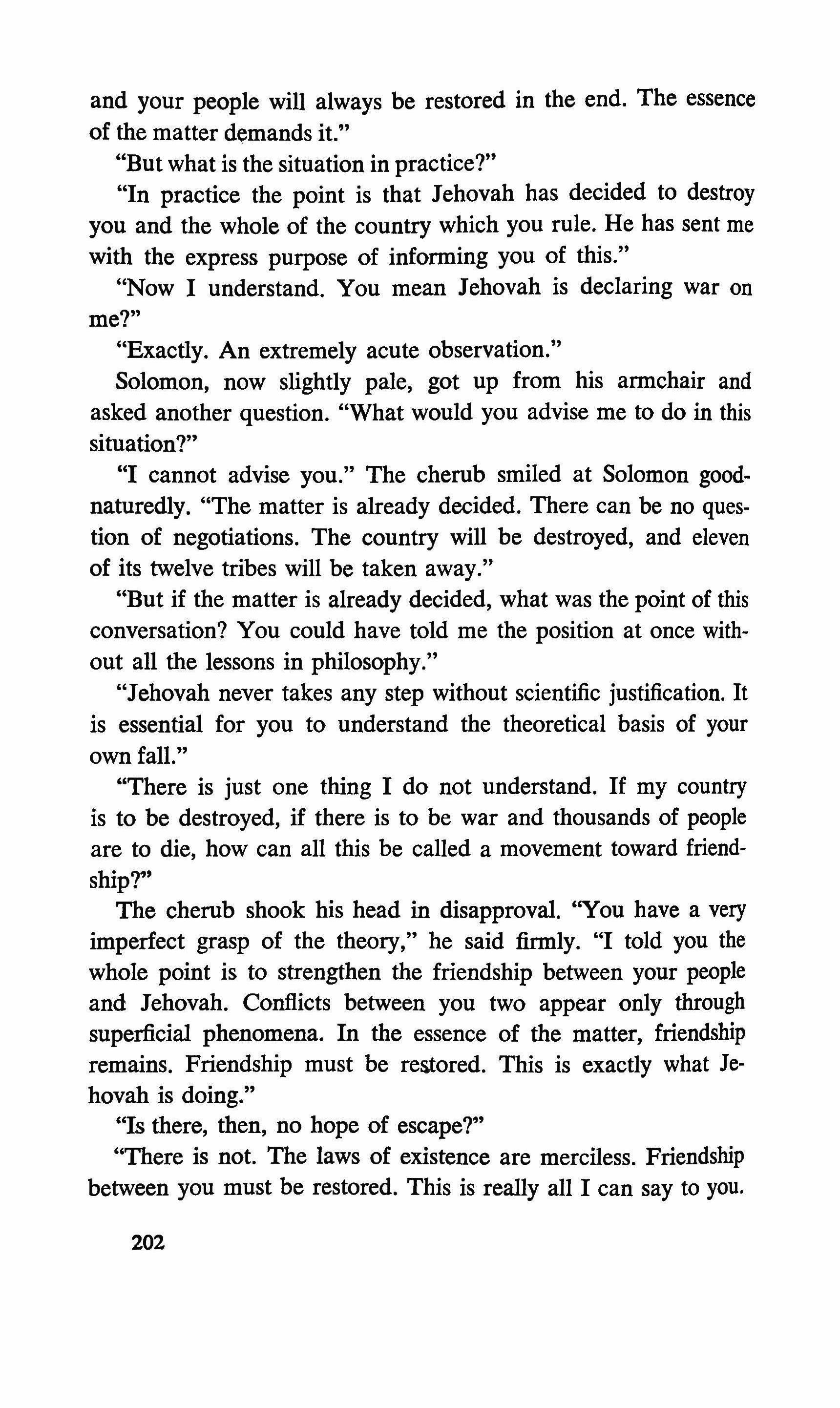
and your people will always be restored in the end. The essence of the matter demands it."
"But what is the situation in practice?"
"In practice the point is that Jehovah has decided to destroy you and the whole of the country which you rule. He has sent me with the express purpose of informing you of this."
"Now I understand. You mean Jehovah is declaring war on me?"
"Exactly. An extremely acute observation."
Solomon, now slightly pale, got up from his armchair and asked another question. "What would you advise me to do in this situation?"
"I cannot advise you." The cherub smiled at Solomon goodnaturedly. "The matter is already decided. There can be no question of negotiations. The country will be destroyed, and eleven of its twelve tribes will be taken away."
"But if the matter is already decided, what was the point of this conversation? You could have told me the position at once without all the lessons in philosophy."
"Jehovah never takes any step without scientific justification. It is essential for you to understand the theoretical basis of your own fall."
"There is just one thing I do not understand. If my country is to be destroyed, if there is to be war and thousands of people are to die, how can all this be called a movement toward friendship?"
The cherub shook his head in disapproval. "You have a very imperfect grasp of the theory," he said firmly. "I told you the whole point is to strengthen the friendship between your people and Jehovah. Conflicts between you two appear only through superficial phenomena. In the essence of the matter, friendship remains. Friendship must be restored. This is exactly what Jehovah is doing."
"Is there, then, no hope of escape?"
"There is not. The laws of existence are merciless. Friendship between you must be restored. This is really all I can say to you. 202

Aha, I had forgotten. Jehovah has asked me to tell you He will show mercy to you personally through his regard for your father David. He will therefore allow you to die quietly. The restoration of friendship will take place immediately after your death through the help of the various armies who will invade your country."
"In other words," said Solomon slowly and haltingly, "the friendship between my people and God, which has been compromised through my own fault, will be restored without my being punished but by murdering a part of my people. DC? you regard this solution as a reasonable one?"
"The justice of God is past all understanding," replied the cherub, raising his eyes to the heavens.
"Aha," said Solomon, "that is another matter. In that case everything is quite clear."
The conversation then ended in an atmosphere of mutual understanding. And the ensuing events are well documented by history.
There are many problems in this story. The three main ones are: the problem of the declaration of war, the problem of conflict and friendship, and the problem of punishing a people for the sins of its king. Each problem can be answered by an appropriate moral.
The first moral: We said at the beginning that to declare war is an act of friendship. In essence, that is true, and it proves again that in essence relations between Jehovah and Solomon were based on friendship, since Jehovah did declare war on him. On the other hand, in this precise case the declaration of war could not stop Jehovah from carrying out his intention to the end. Being Almighty and All-Powerful, he was taking no risk at all by such an act of benevolence. But in spite of everything it was a courteous and gentlemanly act. It shows that the strong can afford a truly friendly consolidation of friendship-but only the infinitely strong.
The second moral: It turns out in addition that not only is to declare war an act of friendship, but so also are actual military operations, provided that their purpose is unity. But the purpose

of wars is always unity; there is no better method of ensuring unity than a war. In this sense, to launch a war is almost always an act of friendship. There is no doctrine which craves unity more earnestly than faith in one God. That is why military civilization flourishes within the confines of monotheistic religion. The third moral: To allow the king to die in peace and to punish his people for his sins would seem on the face of it to be not entirely just. But with God this is indeed justice, since he has at his disposition certain posthumous punishments which earthly kings do not have. And justice is based primarily on not allowing the guilty to go unpunished, not on never punishing the innocent. This last has no meaning at all, since in some way all people are punished. Otherwise the meaning of life is impossible to understand. There remains one reflection, which has no moral. People fight among themselves about which god. they should worship and obey. Gods fight among themselves for the people who are to obey them. But both of these-the battles of gods among themselves and those of men among themselves-are in the end carried out by the hands of men. Up to now there has been no chance of changing this. But it is not here that we find the vital point in the mutual relations between heaven and earth. The most important fact is that gods are constantly demanding that men make unambiguous declarations on one side or another. They will not tolerate vague situations. This is why, through their pressure, they bring into human life that regrettable "either-or" character of choice, and they take away from man's existence that pleasant ambiguity which is one of the main charms of life. 1957
translated by Nicholas Bethell
Characters: MOTHER FATHER
SON, 18 YEARS
DAUGHTER, 20 YEARS
BEGGAR
POLICE INSPECTOR
DOCTOR
POLICEMAN
SCENE ONE
(IT IS EVENING. AN ORDINARY, NICE, CHARMING FAMILY IS SITTING ROUND A TABLE EATING SUPPER. THE SON IS IN HIS SUNDAY BEST, A DARK SUIT. THE DAUGHTER WEARS AN ELEGANT EVENING DRESS. FATHER AND MOTHER IN ORDINARY CLOTHES.)
MOTHER: (GREATLY MOVED) My dear son. We know how you hate speeches and ceremonies. But today is such a special, such a special occasion. It is your eighteenth birthday, and you have passed your matriculation. I was so worried about it And now I'm so happy that it's forgive me (WIPES AWAY A TEAR)
TriQuarterly 205
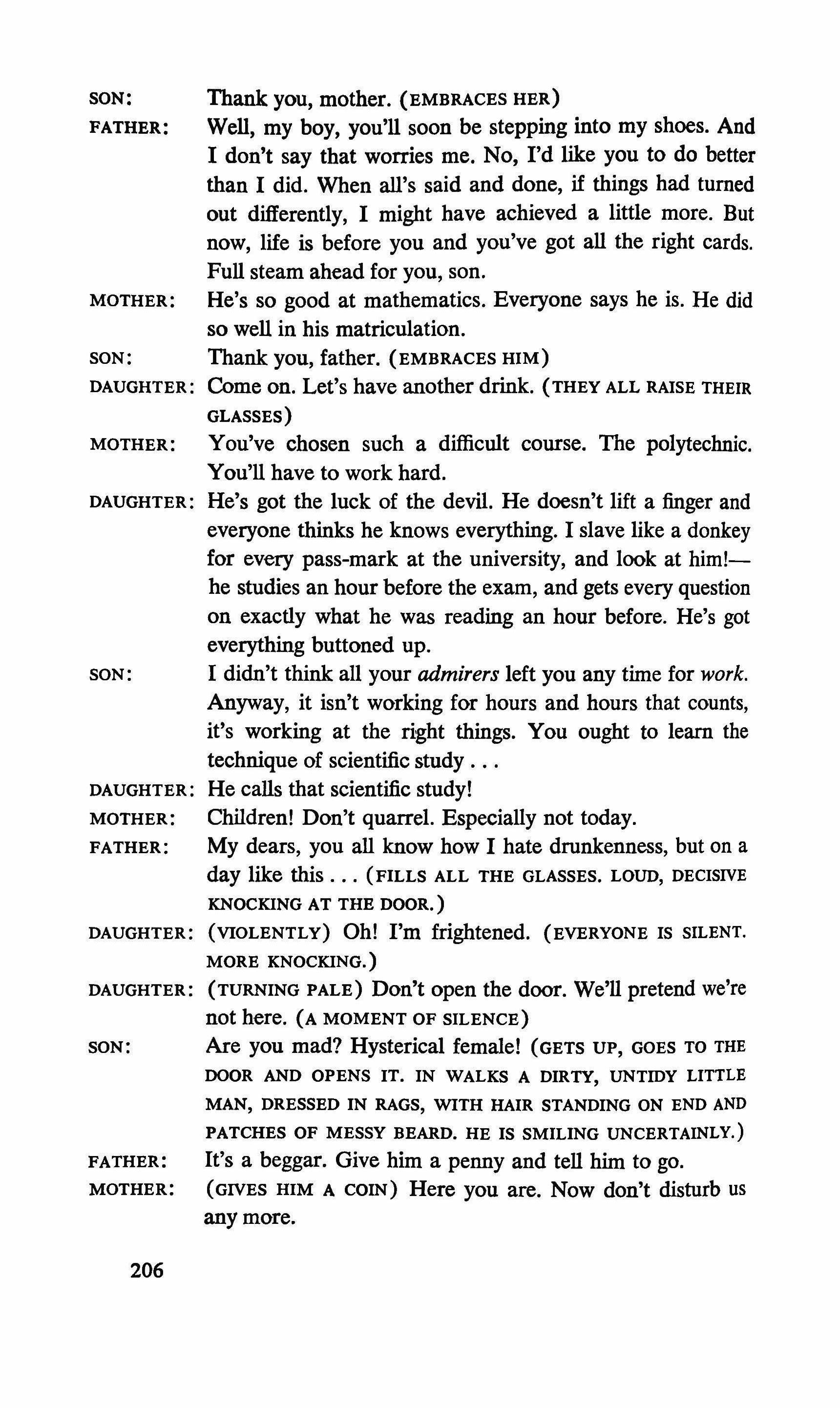
SON: Thank you, mother. (EMBRACES HER)
FATHER: Well, my boy, you'll soon be stepping into my shoes. And I don't say that worries me. No, I'd like you to do better than I did. When all's said and done, if things had turned out differently, I might have achieved a little more. But now, life is before you and you've got all the right cards. Full steam ahead for you, son.
MOTHER: He's so good at mathematics. Everyone says he is. He did so well in his matriculation.
SON: Thank you, father. (EMBRACES HIM)
DAUGHTER: Come on. Let's have another drink. (THEY ALL RAISE THEIR GLASSES)
MOTHER: You've chosen such a difficult course. The polytechnic. You'll have to work hard.
DAUGHTER: He's got the luck of the devil. He doesn't lift a finger and everyone thinks he knows everything. I slave like a donkey for every pass-mark at the university, and look at him!he studies an hour before the exam, and gets every question on exactly what he was reading an hour before. He's got everything buttoned up.
SON: I didn't think all your admirers left you any time for work. Anyway, it isn't working for hours and hours that counts, it's working at the right things. You ought to learn the technique of scientific study
DAUGHTER: He calls that scientific study!
MOTHER: Children! Don't quarrel. Especially not today.
FATHER: My dears, you all know how I hate drunkenness, but on a day like this. (FILLS ALL THE GLASSES. LOUD, DECISIVE KNOCKING AT THE DOOR.)
DAUGHTER: (VIOLENTLY) Oh! I'm frightened. (EVERYONE IS SILENT. MORE KNOCKING.)
DAUGHTER: (TURNING PALE) Don't open the door. We'll pretend we're not here. (A MOMENT OF SILENCE)
SON: Are you mad? Hysterical female! (GETS UP, GOES TO THE DOOR AND OPENS IT. IN WALKS A DIRTY, UNTIDY LITTLE MAN, DRESSED IN RAGS, WITH HAIR STANDING ON END AND PATCHES OF MESSY BEARD. HE IS SMILING UNCERTAINLY.)
FATHER: It's a beggar. Give him a penny and tell him to go.
MOTHER: (GIVES HIM A COIN) Here you are. Now don't disturb us anymore.
BEGGAR:
SON:
FATHER:
BEGGAR:
DAUGHTER:
BEGGAR:
DAUGHTER:
SON:
DAUGHTER:
BEGGAR:
DAUGHTER:
BEGGAR:
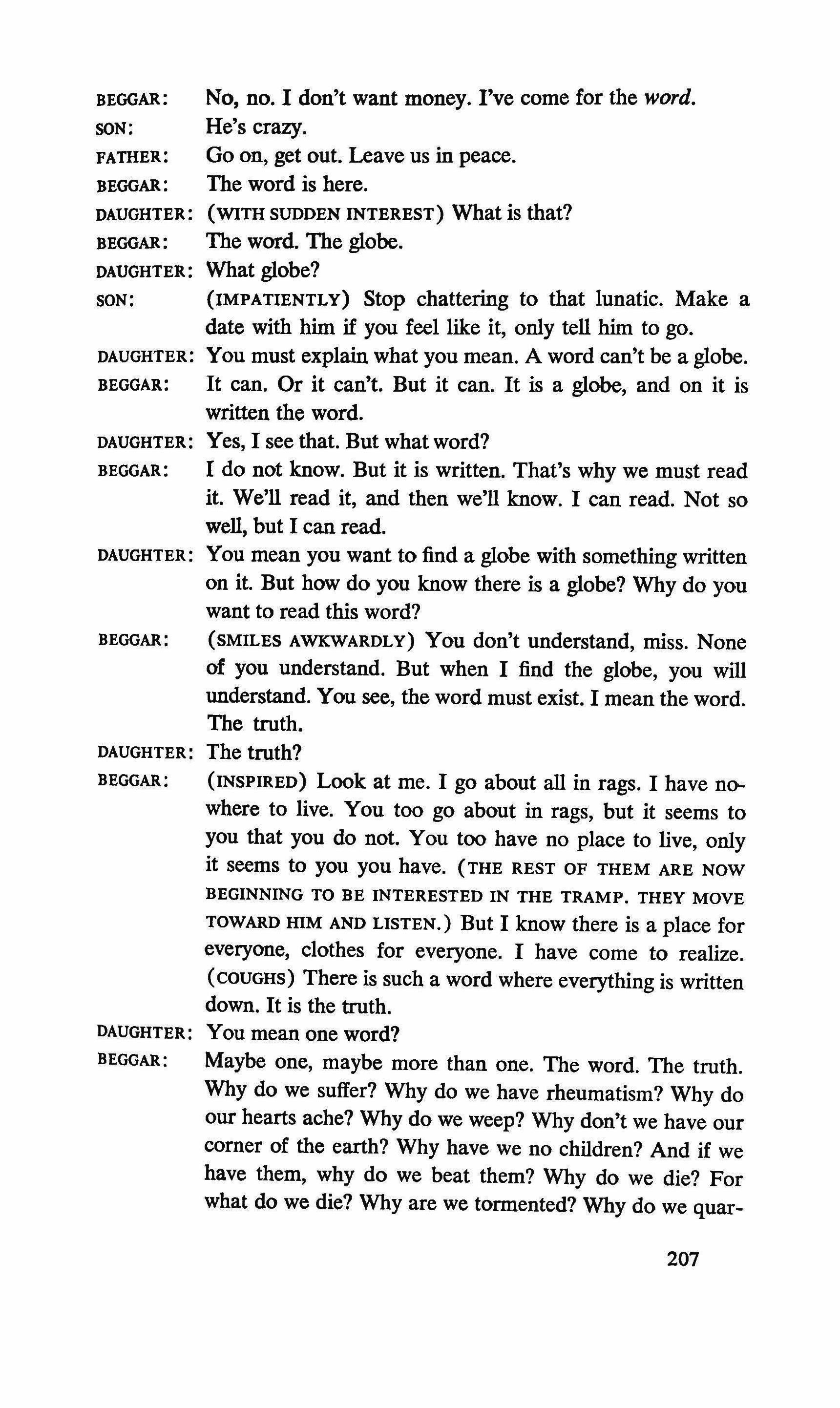
DAUGHTER:
No, no. I don't want money. I've come for the word. He's crazy.
Go on, get out. Leave us in peace. The word is here.
(WITH SUDDEN INTEREST) What is that? The word. The globe. What globe?
(IMPATIENTLY) Stop chattering to that lunatic. Make a date with him if you feel like it, only tell him to go. You must explain what you mean. A word can't be a globe. It can. Or it can't. But it can. It is a globe, and on it is written the word.
Yes, I see that. But what word? I do not know. But it is written. That's why we must read it. We'll read it, and then we'll know. I can read. Not so well, but I can read. You mean you want to find a globe with something written on it. But how do you know there is a globe? Why do you want to read this word?
BEGGAR:
(SMILES AWKWARDLY) You don't understand, miss. None of you understand. But when I find the globe, you will understand. You see, the word must exist. I mean the word. The truth.
DAUGHTER: The truth?
BEGGAR:
(INSPIRED) Look at me. I go about all in rags. I have nowhere to live. You too go about in rags, but it seems to you that you do not. You too have no place to live, only it seems to you you have. (THE REST OF THEM ARE NOW BEGINNING TO BE INTERESTED IN THE TRAMP. THEY MOVE TOWARD ruM AND LISTEN.) But I know there is a place for everyone, clothes for everyone. I have come to realize. (COUGHS) There is such a word where everything is written down. It is the truth.
DAUGHTER: You mean one word?
BEGGAR: Maybe one, maybe more than one. The word. The truth. Why do we suffer? Why do we have rheumatism? Why do our hearts ache? Why do we weep? Why don't we have our corner of the earth? Why have we no children? And if we have them, why do we beat them? Why do we die? For what do we die? Why are we tormented? Why do we quar-
MOTHER:
BEGGAR:
FATHER:
BEGGAR:
SON:
BEGGAR:
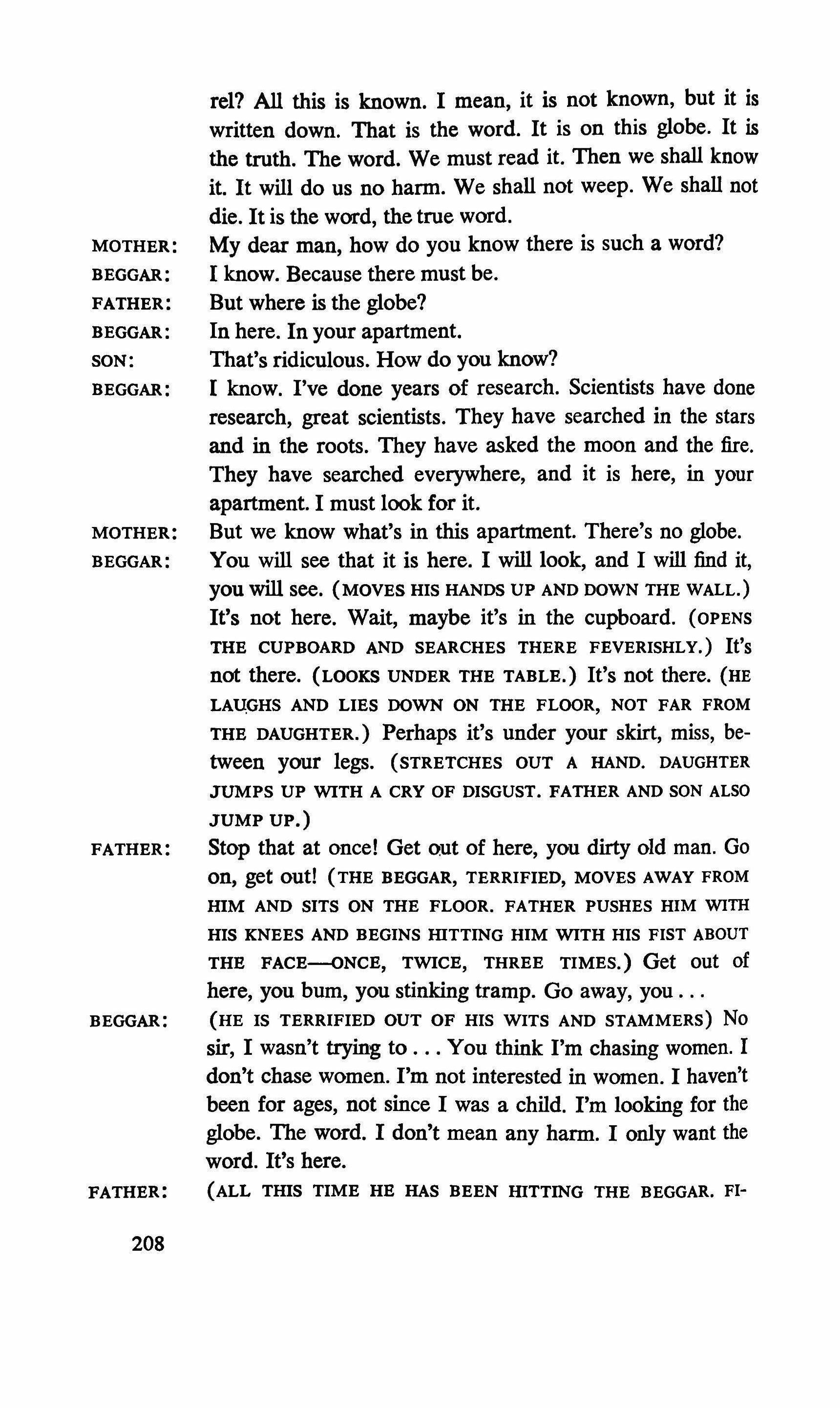
MOTHER:
BEGGAR:
reI? All this is known. I mean, it is not known, but it is written down. That is the word. It is on this globe. It is the truth. The word. We must read it. Then we shall know it. It will do us no harm. We shall not weep. We shall not die. It is the word, the true word. My dear man, how do you know there is such a word? I know. Because there must be. But where is the globe? In here. In your apartment. That's ridiculous. How do you know? [ know. I've done years of research. Scientists have done research, great scientists. They have searched in the stars and in the roots. They have asked the moon and the fire. They have searched everywhere, and it is here, in your apartment. I must look for it. But we know what's in this apartment. There's no globe. You will see that it is here. I will look, and I will find it, you will see. (MOVES HIS HANDS UP AND DOWN THE WALL.) It's not here. Wait, maybe it's in the cupboard. (OPENS THE CUPBOARD AND SEARCHES THERE FEVERISHLY.) It's not there. (LOOKS UNDER THE TABLE.) It's not there. (HE LA�GHS AND LIES DOWN ON THE FLOOR, NOT FAR FROM THE DAUGHTER.) Perhaps it's under your skirt, miss, between your legs. (STRETCHES OUT A HAND. DAUGHTER JUMPS UP WITH A CRY OF DISGUST. FATHER AND SON ALSO JUMP UP.)
FATHER:
BEGGAR:
Stop that at once! Get out of here, you dirty old man. Go on, get out! (THE BEGGAR, TERRIFIED, MOVES AWAY FROM IDM AND SITS ON THE FLOOR. FATHER PUSHES HIM WITH HIS KNEES AND BEGINS IDTTING HIM WITH HIS FIST ABOUT THE FACE--DNCE, TWICE, THREE TIMES.) Get out of here, you bum, you stinking tramp. Go away, you (HE IS TERRIFIED OUT OF HIS WITS AND STAMMERS) No sir, I wasn't trying to You think I'm chasing women. I don't chase women. I'm not interested in women. I haven't been for ages, not since I was a child. I'm looking for the globe. The word. I don't mean any harm. I only want the word. It's here.
FATHER:
(ALL TIDS TIME HE HAS BEEN IDTTING THE BEGGAR. FI-
BEGGAR:
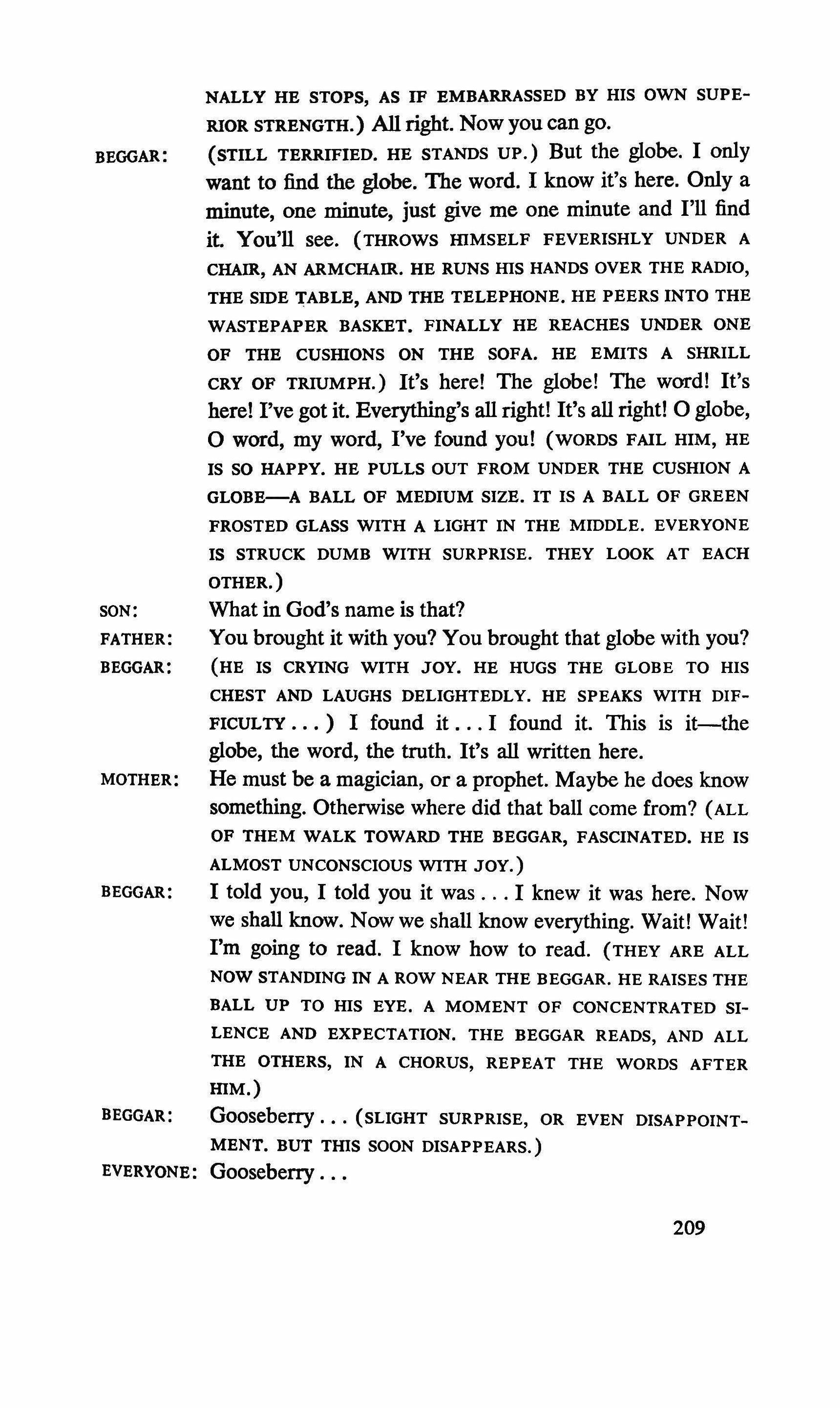
SON:
FATHER:
BEGGAR:
NALLY HE STOPS, AS IF EMBARRASSED BY HIS OWN SUPERIOR STRENGTH.) All right. Now you can go. (STILL TERRIFIED. HE STANDS UP.) But the globe. I only want to find the globe. The word. I know it's here. Only a minute, one minute, just give me one minute and I'll find it. You'll see. (THROWS HIMSELF FEVERISHLY UNDER A CHAIR, AN ARMCHAIR. HE RUNS HIS HANDS OVER THE RADIO, THE SIDE TABLE, AND THE TELEPHONE. HE PEERS INTO THE WASTEPAPER BASKET. FINALLY HE REACHES UNDER ONE OF THE CUSHIONS ON THE SOFA. HE EMITS A SHRILL CRY OF TRIUMPH.) It's here! The globe! The word! It's here! I've got it. Everything's all right! It's all right! 0 globe, o word, my word, I've found you! (WORDS FAIL HIM, HE IS SO HAPPY. HE PULLS OUT FROM UNDER THE CUSHION A GLOBE-A BALL OF MEDIUM SIZE. IT IS A BALL OF GREEN FROSTED GLASS WITH A LIGHT IN THE MIDDLE. EVERYONE IS STRUCK DUMB WITH SURPRISE. THEY LOOK AT EACH OTHER.)
MOTHER:
What in God's name is that? You brought it with you? You brought that globe with you? (HE IS CRYING WITH JOY. HE HUGS THE GLOBE TO HIS CHEST AND LAUGHS DELIGHTEDLY. HE SPEAKS WITH DIFFICULTY .) I found it I found it. This is it-the globe, the word, the truth. It's all written here. He must be a magician, or a prophet. Maybe he does know something. Otherwise where did that ball come from? (ALL OF THEM WALK TOWARD THE BEGGAR, FASCINATED. HE IS ALMOST UNCONSCIOUS WITH JOY.)
BEGGAR:
BEGGAR:
I told you, I told you it was I knew it was here. Now we shall know. Now we shall know everything. Wait! Wait! I'm going to read. I know how to read. (THEY ARE ALL NOW STANDING IN A ROW NEAR THE BEGGAR. HE RAISES THE BALL UP TO HIS EYE. A MOMENT OF CONCENTRATED SILENCE AND EXPECTATION. THE BEGGAR READS, AND ALL THE OTHERS, IN A CHORUS, REPEAT THE WORDS AFTER HIM.)
Gooseberry (SLIGHT SURPRISE, OR EVEN DISAPPOINTMENT. BUT THIS SOON DISAPPEARS.) EVERYONE: Gooseberry
BEGGAR:
EVERYONE:
BEGGAR:
EVERYONE:
BEGGAR:
EVERYONE:
BEGGAR:
EVERYONE:
BEGGAR:
EVERYONE:
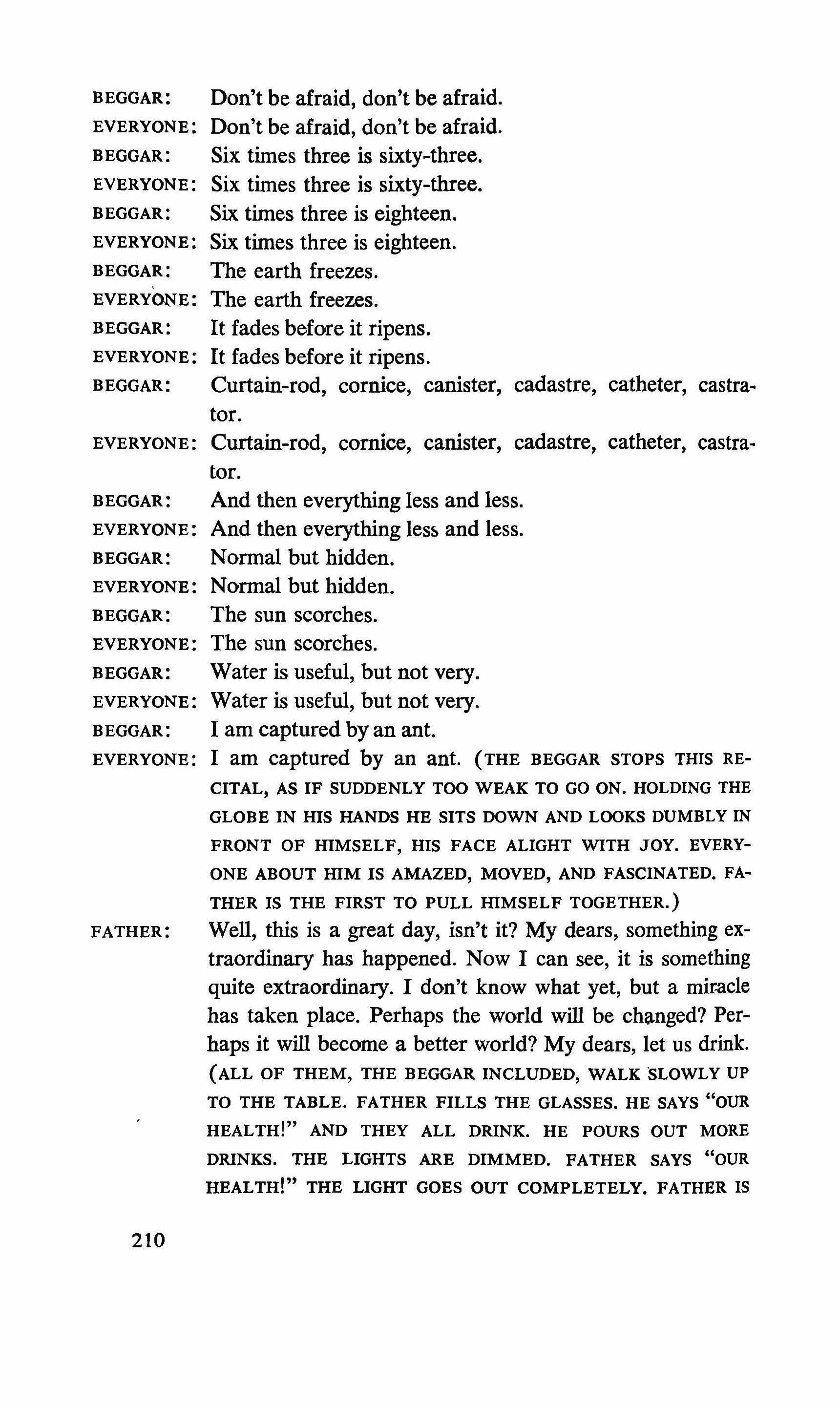
Don't be afraid, don't be afraid. Don't be afraid, don't be afraid.
Six times three is sixty-three. Six times three is sixty-three.
Six times three is eighteen.
Six times three is eighteen.
The earth freezes. The earth freezes. It fades before it ripens. It fades before it ripens.
BEGGAR: tor.
Curtain-rod, cornice, canister, cadastre, catheter, castrator.
EVERYONE: Curtain-rod, cornice, canister, cadastre, catheter, castra-
BEGGAR: And then everything less and less.
EVERYONE: And then everything less and less.
BEGGAR: Normal but hidden.
EVERYONE: Normal but hidden.
BEGGAR: The sun scorches.
EVERYONE: The sun scorches.
BEGGAR: Water is useful, but not very.
EVERYONE: Water is useful, but not very.
BEGGAR: I am captured by an ant.
EVERYONE: I am captured by an ant. (THE BEGGAR STOPS THIS RECITAL, AS IF SUDDENLY TOO WEAK TO GO ON. HOLDING THE GLOBE IN IDS HANDS HE SITS DOWN AND LOOKS DUMBLY IN FRONT OF HIMSELF, HIS FACE ALIGHT WITH JOY. EVERYONE ABOUT IDM IS AMAZED, MOVED, AND FASCINATED. FATHER IS THE FIRST TO PULL IDMSELF TOGETHER.)
Well, this is a great day, isn't it? My dears, something extraordinary has happened. Now I can see, it is something quite extraordinary. I don't know what yet, but a miracle has taken place. Perhaps the world will be changed? Perhaps it will become a better world? My dears, let us drink. (ALL OF THEM, THE BEGGAR INCLUDED, WALK SLOWLY UP TO THE TABLE. FATHER FILLS THE GLASSES. HE SAYS "OUR HEALTH!" AND THEY ALL DRINK. HE POURS OUT MORE
FATHER: 210 DRINKS. THE LIGHTS ARE DIMMED. FATHER SAYS "OUR HEALTH!" THE LIGHT GOES OUT COMPLETELY. FATHER IS
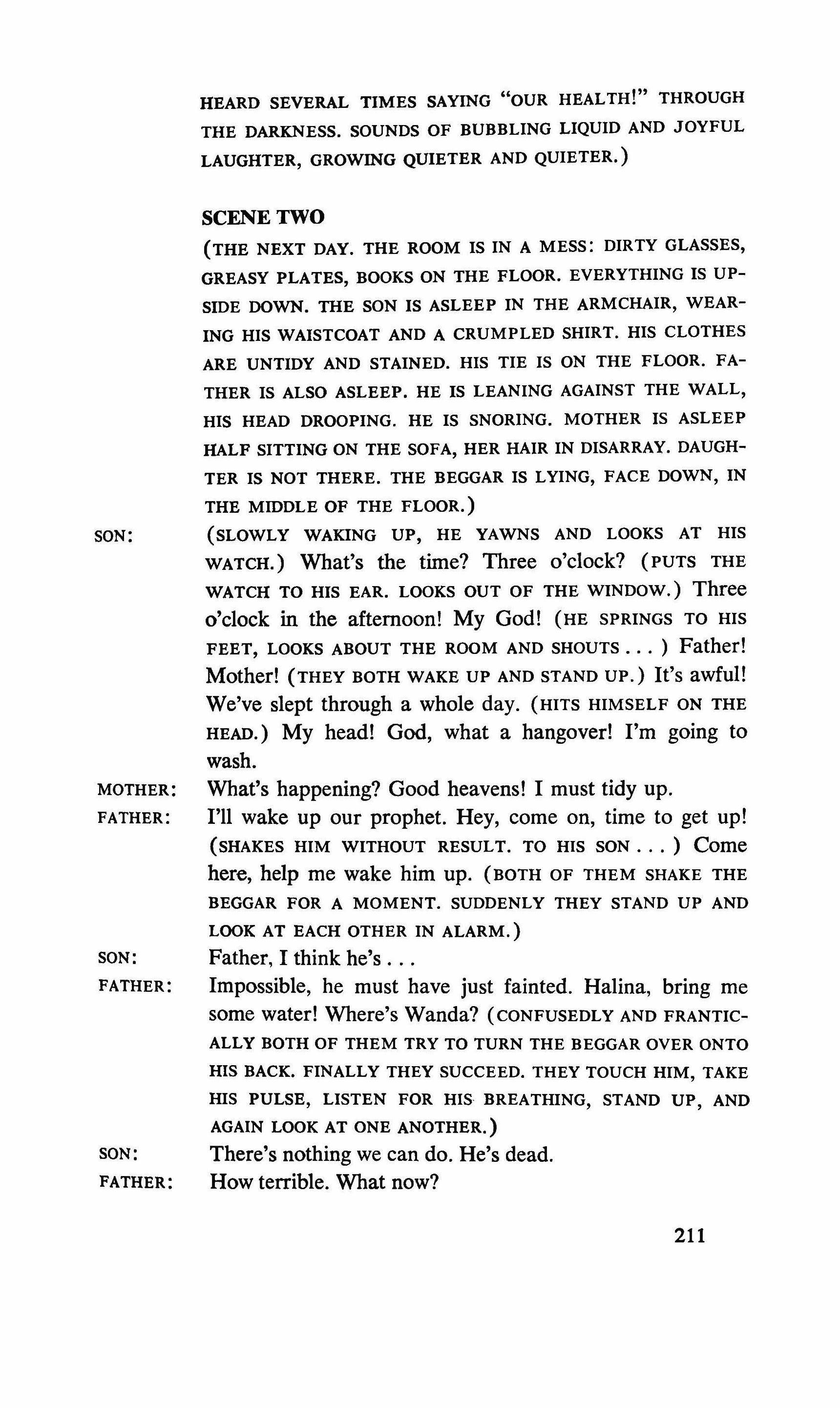
HEARD SEVERAL TIMES SAYING "OUR HEALTH!" THROUGH THE DARKNESS. SOUNDS OF BUBBLING LIQUID AND JOYFUL LAUGHTER, GROWING QUIETER AND QUIETER.)
SCENE TWO
(THE NEXT DAY. THE ROOM IS IN A MESS: DIRTY GLASSES, GREASY PLATES, BOOKS ON THE FLOOR. EVERYTHING IS UPSIDE DOWN. THE SON IS ASLEEP IN THE ARMCHAIR, WEARING HIS WAISTCOAT AND A CRUMPLED SHIRT. HIS CLOTHES ARE UNTIDY AND STAINED. HIS TIE IS ON THE FLOOR. FATHER IS ALSO ASLEEP. HE IS LEANING AGAINST THE WALL, HIS HEAD DROOPING. HE IS SNORING. MOTHER IS ASLEEP HALF SITTING ON THE SOFA, HER HAIR IN DISARRAY. DAUGHTER IS NOT THERE. THE BEGGAR IS LYING, FACE DOWN, IN THE MIDDLE OF THE FLOOR.)
SON: (SLOWLY WAKING UP, HE YAWNS AND LOOKS AT HIS WATCH.) What's the time? Three o'clock? (PUTS THE WATCH TO HIS EAR. LOOKS OUT OF THE WINDOW.) Three o'clock in the afternoon! My God! (HE SPRINGS TO HIS FEET, LOOKS ABOUT THE ROOM AND SHOUTS ) Father! Mother! (THEY BOTH WAKE UP AND STAND UP.) It's awful! We've slept through a whole day. (HITS HIMSELF ON THE HEAD.) My head! God, what a hangover! I'm going to wash.
MOTHER: What's happening? Good heavens! I must tidy up.
FATHER: I'll wake up our prophet. Hey, come on, time to get up! (SHAKES HIM WITHOUT RESULT. TO HIS SON ) Come here, help me wake him up. (BOTH OF THEM SHAKE THE BEGGAR FOR A MOMENT. SUDDENLY THEY STAND UP AND LOOK AT EACH OTHER IN ALARM.)
SON: Father, I think he's
FATHER: Impossible, he must have just fainted. Halina, bring me some water! Where's Wanda? (CONFUSEDLY AND FRANTICALLY BOTH OF THEM TRY TO TURN THE BEGGAR OVER ONTO HIS BACK. FINALLY THEY SUCCEED. THEY TOUCH HIM, TAKE HIS PULSE, LISTEN FOR HIS BREATHING, STAND UP, AND AGAIN LOOK AT ONE ANOTHER.) There's nothing we can do. He's dead. How terrible. What now?
SON: FATHER:
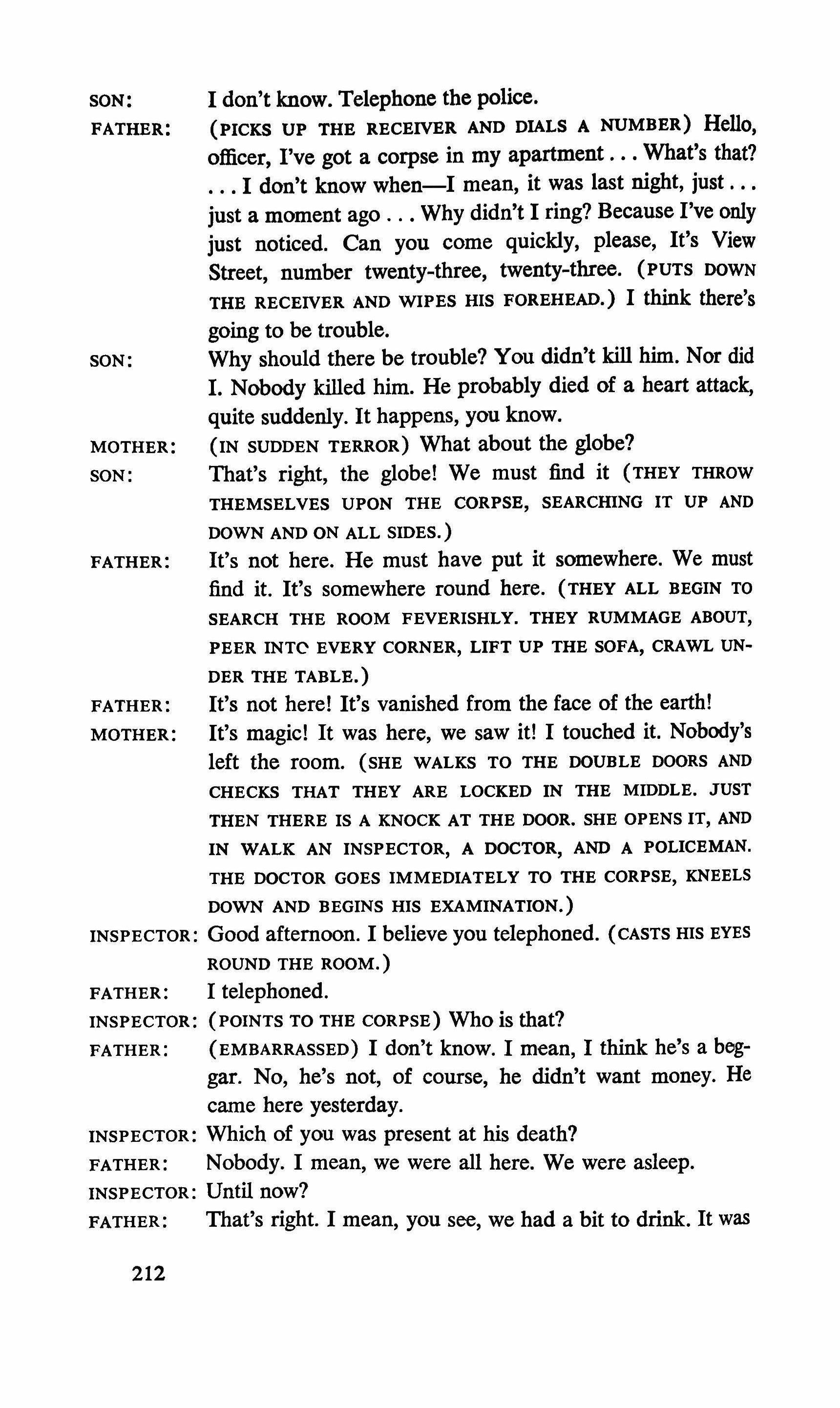
SON: I don't know. Telephone the police.
FATHER: (PICKS UP THE RECEIVER AND DIALS A NUMBER) Hello, officer, I've got a corpse in my apartment What's that? I don't know when-I mean, it was last night, just just a moment ago Why didn't I ring? Because I've only just noticed. Can you come quickly, please, It's View Street, number twenty-three, twenty-three. (PUTS DOWN THE RECEIVER AND WIPES HIS FOREHEAD.) I think there's going to be trouble.
SON: Why should there be trouble? You didn't kill him. Nor did I. Nobody killed him. He probably died of a heart attack, quite suddenly. It happens, you know.
MOTHER: (IN SUDDEN TERROR) What about the globe?
SON: That's right, the globe! We must find it (THEY THROW THEMSELVES UPON THE CORPSE, SEARCIDNG IT UP AND DOWN AND ON ALL SIDES.)
FATHER: It's not here. He must have put it somewhere. We must find it. It's somewhere round here. (THEY ALL BEGIN TO SEARCH THE ROOM FEVERISHLY. THEY RUMMAGE ABOUT, PEER INTC' EVERY CORNER, LIFT UP THE SOFA, CRAWL UNDER THE TABLE.)
FATHER: It's not here! It's vanished from the face of the earth!
MOTHER: It's magic! It was here, we saw it! I touched it. Nobody's left the room. (SHE WALKS TO THE DOUBLE DOORS AND CHECKS THAT THEY ARE LOCKED IN THE MIDDLE. JUST THEN THERE IS A KNOCK AT THE DOOR. SHE OPENS IT, AND IN WALK AN INSPECTOR, A DOCTOR, AND A POLICEMAN. THE DOCTOR GOES IMMEDIATELY TO THE CORPSE, KNEELS DOWN AND BEGINS HIS EXAMINATION.)
INSPECTOR: Good afternoon. I believe you telephoned. (CASTS HIS EYES ROUND THE ROOM.)
FATHER: I telephoned.
INSPECTOR: (POINTS TO THE CORPSE) Who is that?
FATHER: (EMBARRASSED) I don't know. I mean, I think he's a beggar. No, he's not, of course, he didn't want money. He came here yesterday.
INSPECTOR: Which of you was present at his death?
FATHER: Nobody. I mean, we were all here. We were asleep.
INSPECTOR: Until now?
FATHER: That's right. I mean, you see, we had a bit to drink. It was
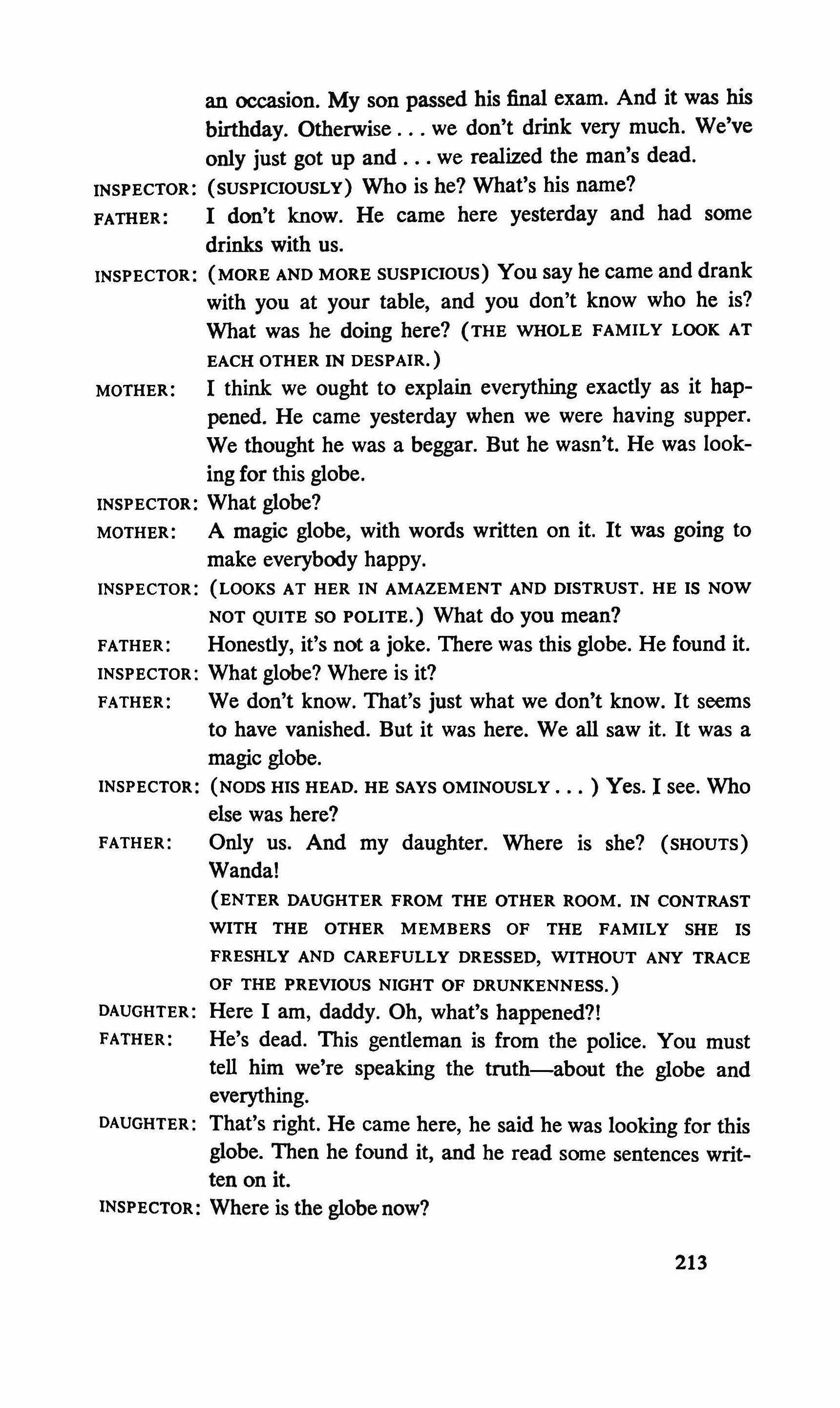
an occasion. My son passed his final exam. And it was his birthday. Otherwise we don't drink very much. We've only just got up and we realized the man's dead.
INSPECTOR: (SUSPICIOUSLY) Who is he? What's his name?
FATHER: I don't know. He came here yesterday and had some drinks with us.
INSPECTOR: (MORE AND MORE SUSPICIOUS) You say he came and drank with you at your table, and you don't know who he is? What was he doing here? (THE WHOLE FAMILY LOOK AT EACH OTHER IN DESPAIR.)
MOTHER: I think we ought to explain everything exactly as it happened. He came yesterday when we were having supper. We thought he was a beggar. But he wasn't. He was looking for this globe.
INSPECTOR: What globe?
MOTHER: A magic globe, with words written on it. It was going to make everybody happy.
INSPECTOR: (LOOKS AT HER IN AMAZEMENT AND DISTRUST. HE IS NOW NOT QUITE SO POLITE.) What do you mean?
FATHER: Honestly, it's not a joke. There was this globe. He found it.
INSPECTOR: What globe? Where is it?
FATHER: We don't know. That's just what we don't know. It seems to have vanished. But it was here. We all saw it. It was a magic globe.
INSPECTOR: (NODS HIS HEAD. HE SAYS OMINOUSLY ) Yes. I see. Who else was here?
FATHER: Only us. And my daughter. Where is she? (SHOUTS) Wanda!
(ENTER DAUGHTER FROM THE OTHER ROOM. IN CONTRAST WITH THE OTHER MEMBERS OF THE FAMILY SHE IS FRESHLY AND CAREFULLY DRESSED, WITHOUT ANY TRACE OF THE PREVIOUS NIGHT OF DRUNKENNESS.)
DAUGHTER: Here I am, daddy. Oh, what's happened?!
FATHER: He's dead. This gentleman is from the police. You must tell him we're speaking the truth-about the globe and everything.
DAUGHTER: That's right. He came here, he said he was looking for this globe. Then he found it, and he read some sentences written on it.
INSPECTOR: Where is the globe now?
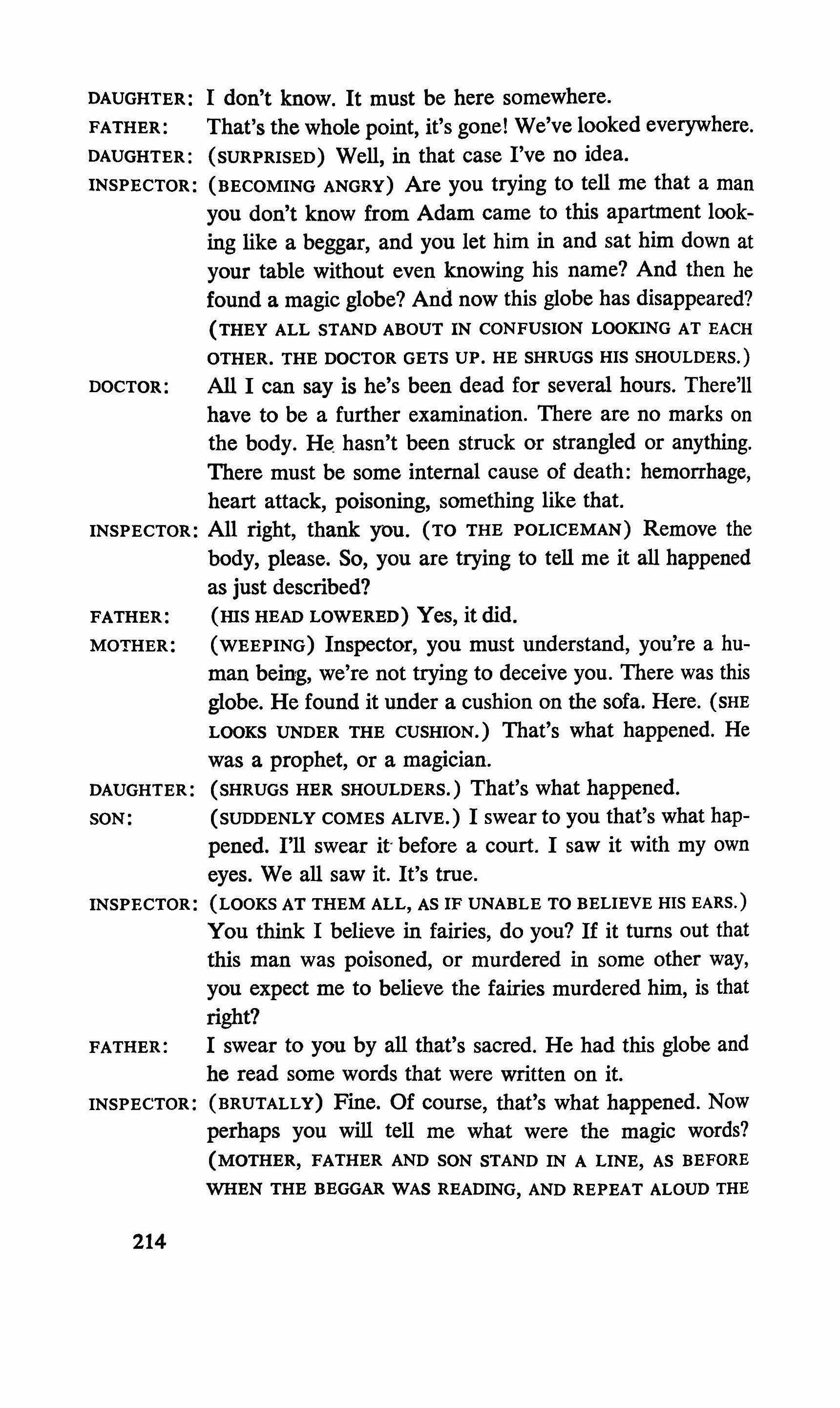
DAUGHTER: I don't know. It must be here somewhere.
FATHER: That's the whole point, it's gone! We've looked everywhere.
DAUGHTER: (SURPRISED) Well, in that case I've no idea.
INSPECTOR: (BECOMING ANGRY) Are you trying to tell me that a man you don't know from Adam came to this apartment looking like a beggar, and you let him in and sat him down at your table without even knowing his name? And then he found a magic globe? And now this globe has disappeared? (THEY ALL STAND ABOUT IN CONFUSION LOOKING AT EACH OTHER. THE DOCTOR GETS UP. HE SHRUGS HIS SHOULDERS.)
DOCTOR: All I can say is he's been dead for several hours. There'll have to be a further examination. There are no marks on the body. He hasn't been struck or strangled or anything. There must be some internal cause of death: hemorrhage, heart attack, poisoning, something like that.
INSPECTOR: All right, thank you. (TO THE POLICEMAN) Remove the body, please. So, you are trying to tell me it all happened as just described?
FATHER: (ms HEAD LOWERED) Yes, it did.
MOTHER: (WEEPING) Inspector, you must understand, you're a human being, we're not trying to deceive you. There was this globe. He found it under a cushion on the sofa. Here. (SHE LOOKS UNDER THE CUSHION.) That's what happened. He was a prophet, or a magician.
DAUGHTER: (SHRUGS HER SHOULDERS.) That's what happened.
SON: (SUDDENLY COMES ALIVE.) I swear to you that's what happened. I'll swear it- before a court. I saw it with my own eyes. We all saw it. It's true.
INSPECTOR: (LOOKS AT THEM ALL, AS IF UNABLE TO BELIEVE HIS EARS.) You think I believe in fairies, do you? If it turns out that this man was poisoned, or murdered in some other way, you expect me to believe the fairies murdered him, is that right?
FATHER: I swear to you by all that's sacred. He had this globe and he read some words that were written on it.
INSPECTOR: (BRUTALLY) Fine. Of course, that's what happened. Now perhaps you will tell me what were the magic words? (MOTHER, FATHER AND SON STAND IN A LINE, AS BEFORE WHEN THE BEGGAR WAS READING, AND REPEAT ALOUD THE
FATHER, MOTHER, AND SON:
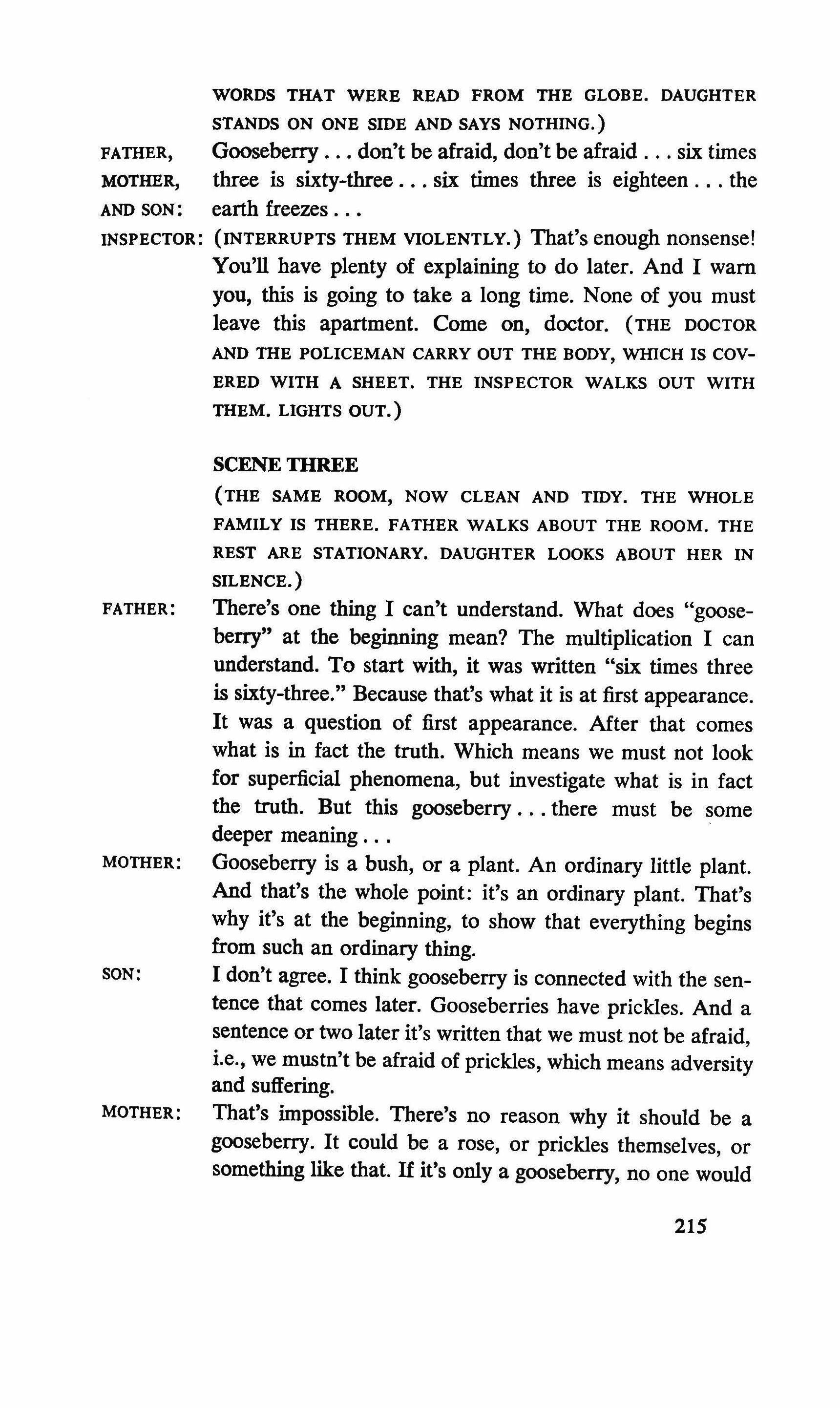
WORDS THAT WERE READ FROM THE GLOBE. DAUGHTER STANDS ON ONE SIDE AND SAYS NOTHING.)
Gooseberry don't be afraid, don't be afraid six times three is sixty-three six times three is eighteen the earth freezes
INSPECTOR: (INTERRUPTS THEM VIOLENTLY.) That's enough nonsense! You'll have plenty of explaining to do later. And I warn you, this is going to take a long time. None of you must leave this apartment. Come on, doctor. (THE DOCTOR AND THE POLICEMAN CARRY OUT THE BODY, WHICH IS covERED WITH A SHEET. THE INSPECTOR WALKS OUT WITH THEM. LIGHTS OUT.)
(THE SAME ROOM, NOW CLEAN AND TIDY. THE WHOLE FAMILY IS THERE. FATHER WALKS ABOUT THE ROOM. THE REST ARE STATIONARY. DAUGHTER LOOKS ABOUT HER IN SILENCE.)
FATHER: There's one thing I can't understand. What does "gooseberry" at the beginning mean? The multiplication I can understand. To start with, it was written "six times three is sixty-three." Because that's what it is at first appearance. It was a question of first appearance. After that comes what is in fact the truth. Which means we must not look for superficial phenomena, but investigate what is in fact the truth. But this gooseberry there must be some deeper meaning
MOTHER: Gooseberry is a bush, or a plant. An ordinary little plant. And that's the whole point: it's an ordinary plant. That's why it's at the beginning, to show that everything begins from such an ordinary thing.
SON: I don't agree. I think gooseberry is connected with the sentence that comes later. Gooseberries have prickles. And a sentence or two later it's written that we must not be afraid, i.e., we mustn't be afraid of prickles, which means adversity and suffering.
MOTHER: That's impossible. There's no reason why it should be a gooseberry. It could be a rose, or prickles themselves, or something like that. If it's only a gooseberry, no one would
FATHER:
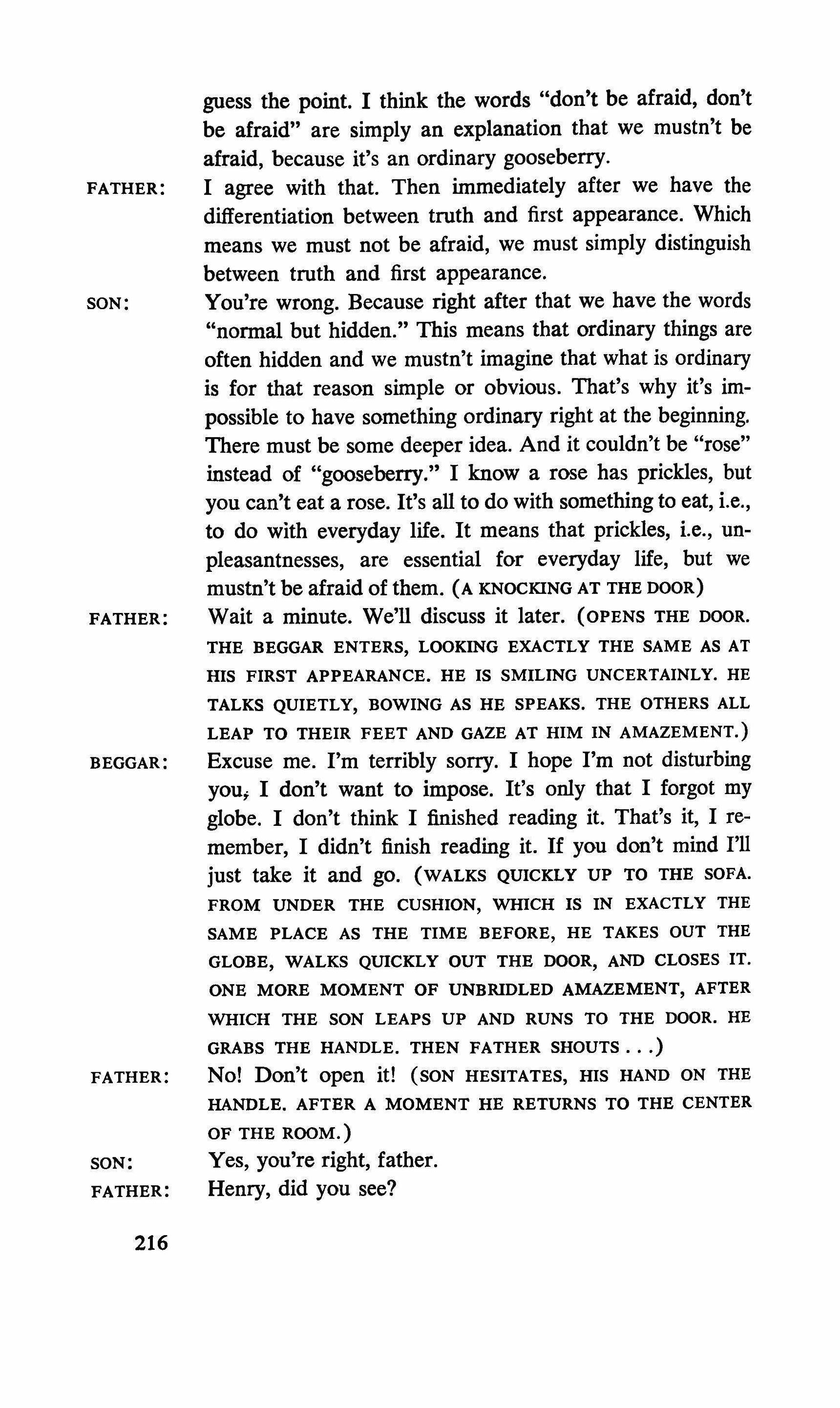
SON:
FATHER:
guess the point. I think the words "don't be afraid, don't be afraid" are simply an explanation that we mustn't be afraid, because it's an ordinary gooseberry. I agree with that. Then immediately after we have the differentiation between truth and first appearance. Which means we must not be afraid, we must simply distinguish between truth and first appearance. You're wrong. Because right after that we have the words "normal but hidden." This means that ordinary things are often hidden and we mustn't imagine that what is ordinary is for that reason simple or obvious. That's why it's impossible to have something ordinary right at the beginning. There must be some deeper idea. And it couldn't be "rose" instead of "gooseberry." I know a rose has prickles, but you can't eat a rose. It's all to do with something to eat, i.e., to do with everyday life. It means that prickles, i.e., unpleasantnesses, are essential for everyday life, but we mustn't be afraid of them. (A KNOCKING AT THE DOOR)
Wait a minute. We'll discuss it later. (OPENS THE DOOR. THE BEGGAR ENTERS, LOOKING EXACTLY THE SAME AS AT HIS FIRST APPEARANCE. HE IS SMILING UNCERTAINLY. HE TALKS QUIETLY, BOWING AS HE SPEAKS. THE OTHERS ALL LEAP TO THEIR FEET AND GAZE AT HIM IN AMAZEMENT.)
BEGGAR:
FATHER:
Excuse me. I'm terribly sorry. I hope I'm not disturbing you; I don't want to impose. It's only that I forgot my globe. I don't think I finished reading it. That's it, I remember, I didn't finish reading it. If you don't mind I'll just take it and go. (WALKS QUICKLY UP TO THE SOFA. FROM UNDER THE CUSHION, WHICH IS IN EXACTLY THE SAME PLACE AS THE TIME BEFORE, HE TAKES OUT THE GLOBE, WALKS QUICKLY OUT THE DOOR, AND CLOSES IT. ONE MORE MOMENT OF UNBRIDLED AMAZEMENT, AFTER WHICH THE SON LEAPS UP AND RUNS TO THE DOOR. HE GRABS THE HANDLE. THEN FATHER SHOUTS ) No! Don't open it! (SON HESITATES, HIS HAND ON THE HANDLE. AFTER A MOMENT HE RETURNS TO THE CENTER OF THE ROOM.)
SON:
FATHER: 216
Yes, you're right, father. Henry, did you see?
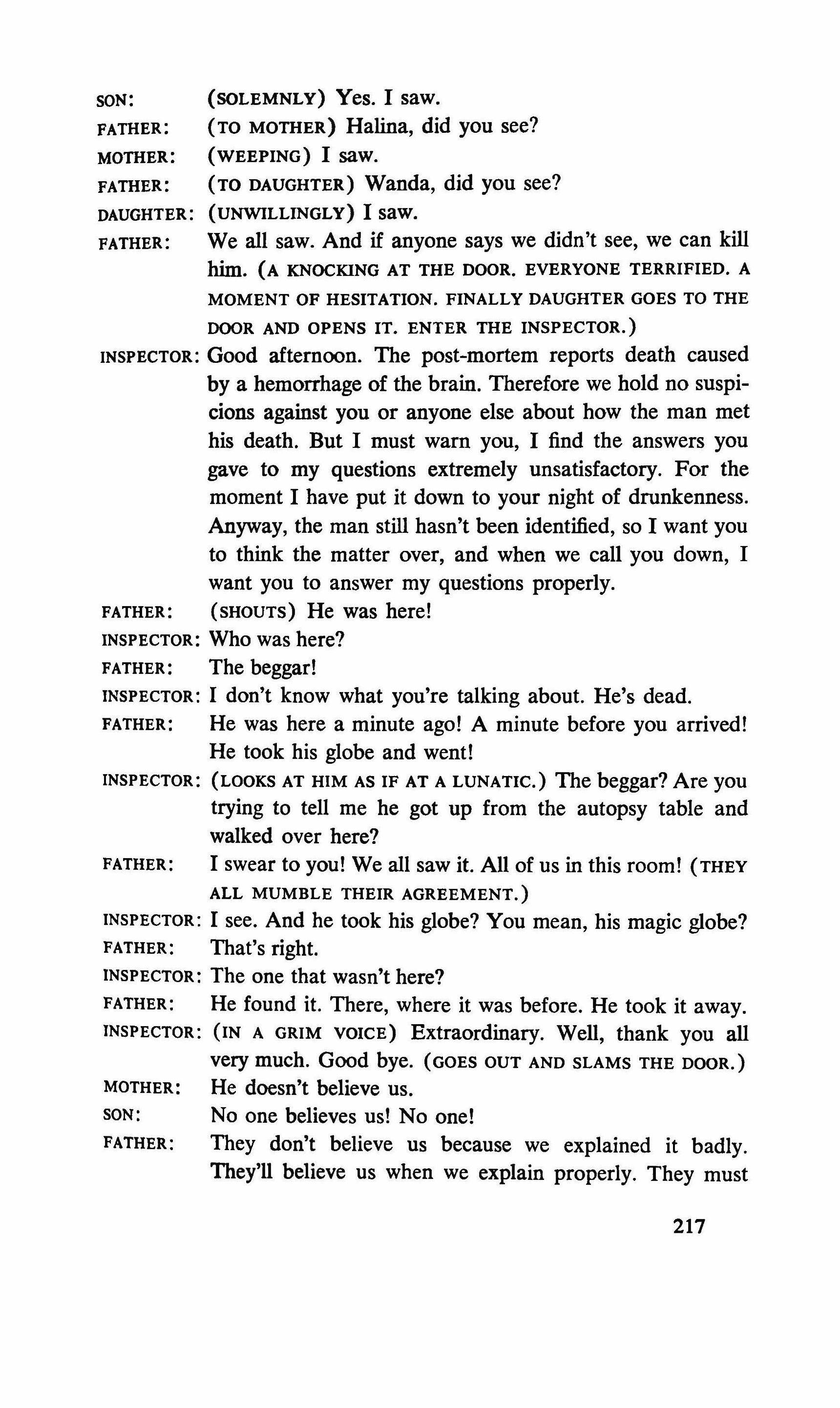
SON: (SOLEMNLY) Yes. I saw.
FATHER: (TO MOTHER) Halina, did you see?
MOTHER: (WEEPING) I saw.
FATHER: (TO DAUGHTER) Wanda, did you see?
DAUGHTER: (UNWILLINGLY) I saw.
FATHER: We all saw. And if anyone says we didn't see, we can kill him. (A KNOCKING AT THE DOOR. EVERYONE TERRIFIED. A MOMENT OF HESITATION. FINALLY DAUGHTER GOES TO THE DOOR AND OPENS IT. ENTER THE INSPECTOR.)
INSPECTOR: Good afternoon. The post-mortem reports death caused by a hemorrhage of the brain. Therefore we hold no suspicions against you or anyone else about how the man met his death. But I must warn you, I find the answers you gave to my questions extremely unsatisfactory. For the moment I have put it down to your night of drunkenness. Anyway, the man still hasn't been identified, so I want you to think the matter over, and when we call you down, I want you to answer my questions properly.
FATHER: (SHOUTS) He was here!
INSPECTOR: Who was here?
FATHER: The beggar!
INSPECTOR: I don't know what you're talking about. He's dead.
FATHER: He was here a minute ago! A minute before you arrived! He took his globe and went!
INSPECTOR: (LOOKS AT HIM AS IF AT A LUNATIC.) The beggar? Are you trying to tell me he got up from the autopsy table and walked over here?
FATHER: I swear to you! We all saw it. All of us in this room! (THEY ALL MUMBLE THEIR AGREEMENT.)
INSPECTOR: I see. And he took his globe? You mean, his magic globe?
FATHER: That's right.
INSPECTOR: The one that wasn't here?
FATHER: He found it. There, where it was before. He took it away.
INSPECTOR: (IN A GRIM VOICE) Extraordinary. Well, thank you all very much. Good bye. (GOES OUT AND SLAMS THE DOOR.)
MOTHER: He doesn't believe us.
SON:
FATHER: No one believes us! No one! They don't believe us because we explained it badly. They'll believe us when we explain properly. They must
MOTHER:
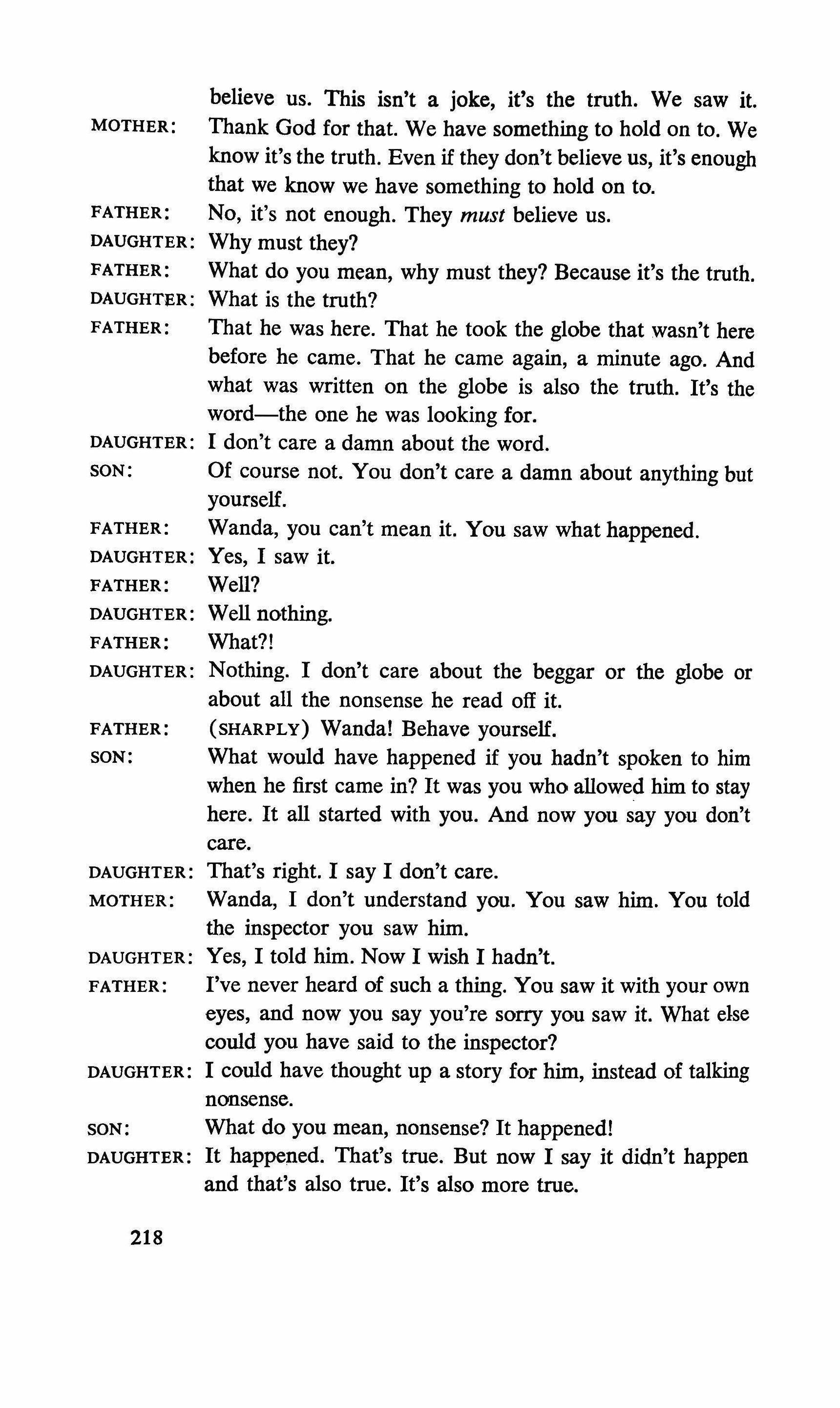
FATHER:
DAUGHTER:
FATHER:
DAUGHTER:
FATHER:
believe us. This isn't a joke, it's the truth. We saw it. Thank God for that. We have something to hold on to. We know it's the truth. Even if they don't believe us, it's enough that we know we have something to hold on to. No, it's not enough. They must believe us. Why must they?
What do you mean, why must they? Because it's the truth. What is the truth?
DAUGHTER:
SON:
FATHER:
DAUGHTER:
FATHER:
DAUGHTER:
FATHER:
DAUGHTER:
FATHER:
SON:
DAUGHTER: MOTHER:
DAUGHTER: FATHER:
That he was here. That he took the globe that wasn't here before he came. That he came again, a minute ago. And what was written on the globe is also the truth. It's the word-the one he was looking for. I don't care a damn about the word. Of course not. You don't care a damn about anything but yourself.
Wanda, you can't mean it. You saw what happened. Yes, I saw it. Well? Well nothing. What?!
Nothing. I don't care about the beggar or the globe or about all the nonsense he read off it.
(SHARPLY) Wanda! Behave yourself. What would have happened if you hadn't spoken to him when he first came in? It was you who allowed him to stay here. It all started with you. And now you say you don't care.
DAUGHTER:
SON:
DAUGHTER: 218
That's right. I say I don't care. Wanda, I don't understand you. You saw him. You told the inspector you saw him. Yes, I told him. Now I wish I hadn't. I've never heard of such a thing. You saw it with your own eyes, and now you say you're sorry you saw it. What else could you have said to the inspector? I could have thought up a story for him, instead of talking nonsense.
What do you mean, nonsense? It happened! It happened. That's true. But now I say it didn't happen and that's also true. It's also more true.
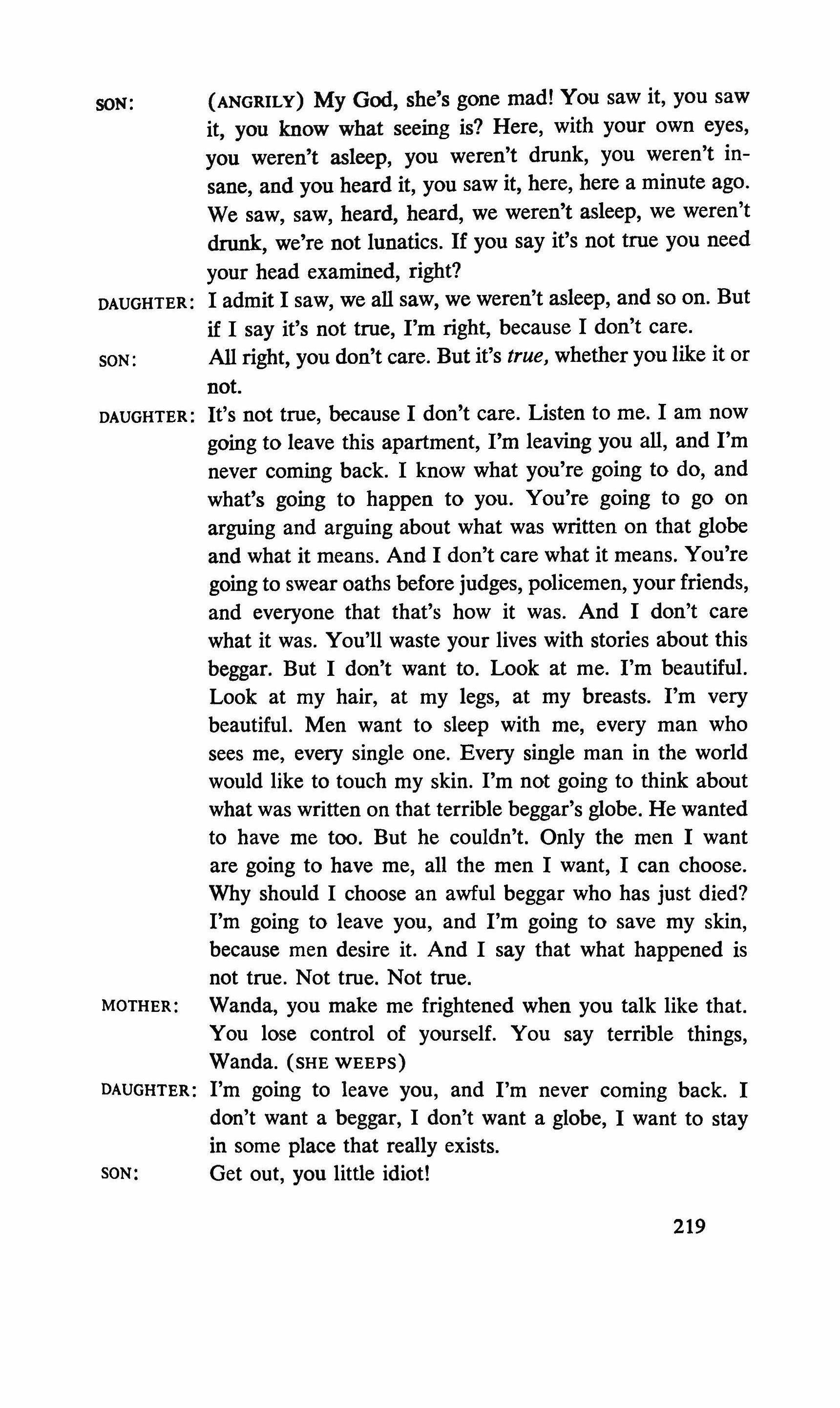
SON: (ANGRILY) My God, she's gone mad! You saw it, you saw it, you know what seeing is? Here, with your own eyes, you weren't asleep, you weren't drunk, you weren't insane, and you heard it, you saw it, here, here a minute ago. We saw, saw, heard, heard, we weren't asleep, we weren't drunk, we're not lunatics. If you say it's not true you need your head examined, right?
DAUGHTER: I admit I saw, we all saw, we weren't asleep, and so on. But if I say it's not true, I'm right, because I don't care.
SON: All right, you don't care. But it's true, whether you like it or not.
DAUGHTER: It's not true, because I don't care. Listen to me. I am now going to leave this apartment, I'm leaving you all, and I'm never coming back. I know what you're going to do, and what's going to happen to you. You're going to go on arguing and arguing about what was written on that globe and what it means. And I don't care what it means. You're going to swear oaths before judges, policemen, your friends, and everyone that that's how it was. And I don't care what it was. You'll waste your lives with stories about this beggar. But I don't want to. Look at me. I'm beautiful. Look at my hair, at my legs, at my breasts. I'm very beautiful. Men want to sleep with me, every man who sees me, every single one. Every single man in the world would like to touch my skin. I'm not going to think about what was written on that terrible beggar's globe. He wanted to have me too. But he couldn't. Only the men I want are going to have me, all the men I want, I can choose. Why should I choose an awful beggar who has just died? I'm going to leave you, and I'm going to save my skin, because men desire it. And I say that what happened is not true. Not true. Not true.
MOTHER: Wanda, you make me frightened when you talk like that. You lose control of yourself. You say terrible things, Wanda. (SHE WEEPS)
DAUGHTER: I'm going to leave you, and I'm never coming back. I don't want a beggar, I don't want a globe, I want to stay in some place that really exists.
SON: Get out, you little idiot!
DAUGHTER: FATHER:
SON:

FATHER:
SON:
FATHER:
There's one thing I don't understand. What did it mean when he said "Water is useful, but not very"? That's easy. Water is the most important substance necessary for human life. So if even water is "not very" useful, it means that everything that helps to support life is unimportant. It means there are more important things. And before that there was something about the sun scorching. The sun is the truth. So when the truth is revealed, the things which help to maintain life become unimportant. Maybe you're right. But I'm worried about those words: "cornice, canister, et cetera. We'll find an explanation. We can't do everything at once. Oh dear, I feel quite tensed up. I must try and relax. Let's go through it all once more. (THEY GET UP AND STAND, ALL THREE OF THEM, IN A LINE. THEN THEY BEGIN TO RECITE IN A MONOTONOUS VOICE.)
FATHER, MOTHER, AND SON:
Don't be afraid, don't be afraid. Six times three is sixty-three. Six times three is eighteen
1965 translated by Nicholas
Bethell
1
What I call the "aetiology of knowledge" encompasses all genetic studies of the distorting, or constitutive, influence which the social or psychological situations in which knowledge is acquired and confirmed exert upon the content of that knowledge. In terms of Mannheim's distinction, what matters most is the influence that affects the content of knowledge rather than the "selective influence" which merely defines the topic of [cognitive] interest. The selective influence seems at first glance to be epistemologically insignificant, although the work of certain philosophers (Bergson above all, but also Ajdukiewicz) suggests that the "selective influence" may only seem inessential.
The aetiology of knowledge may be classified either in terms of the kind of influence in question or in terms of the historical, or copyright © 1971 by
Leszek KolakowskiTriQuarterJy 221

rather empirical, orientation involved. I shall not enter into such classifications here. The aetiology of knowledge includes: the "sociology of knowledge," the "psychoanalysis of cognitive functions," "genetic epistemology" in Piaget's sense, i.e., a branch of the experimental psychology-certainly not the epistemologyof child development.
Following other authors, I pose the question: does the influence of the extra-cognitive situation upon the content of knowledge have any significance for the epistemological evaluation of knowledge, i.e., for the designation of the cognitive content as either true or false?
Mannheim's answer to this question is negative. Indeed, we note from the first that the question of what motivates an individual or group to accept or reject a given opinion, scientific theory, or world-view is logically independent of the question of the truth or falsity of that opinion, theory, or world-view. This independence holds for every kind of case. If Darwin's theory was in part the result of Malthusian inspiration, and if Malthus' doctrine sprang from liberal ideology; if Pythagoras was trying to find in numerical relationships a metaphysical principle of being-still the circumstance that these doctrines sprang genetically from a given ideological situation must not-according to the principles of scientific method-influence our judgment as to their cognitive value. Freudians can perhaps show that the theory of relativity was a product of Einstein's Oedipus complex, but this circumstance is of no interest to physicists. Similarly, I might maliciously spread a rumor, having no evidence to back it up; and the rumor might tum out by chance to be true. In a word: the motives for someone's acceptance or rejection of a given judgment have no significance for the question of the cognitive value of that judgment.
2
This is the way the question seems, at first glance, to stand. But at second glance, a complication appears. Genetic and epistemological questions are logically independent in the case of each par-
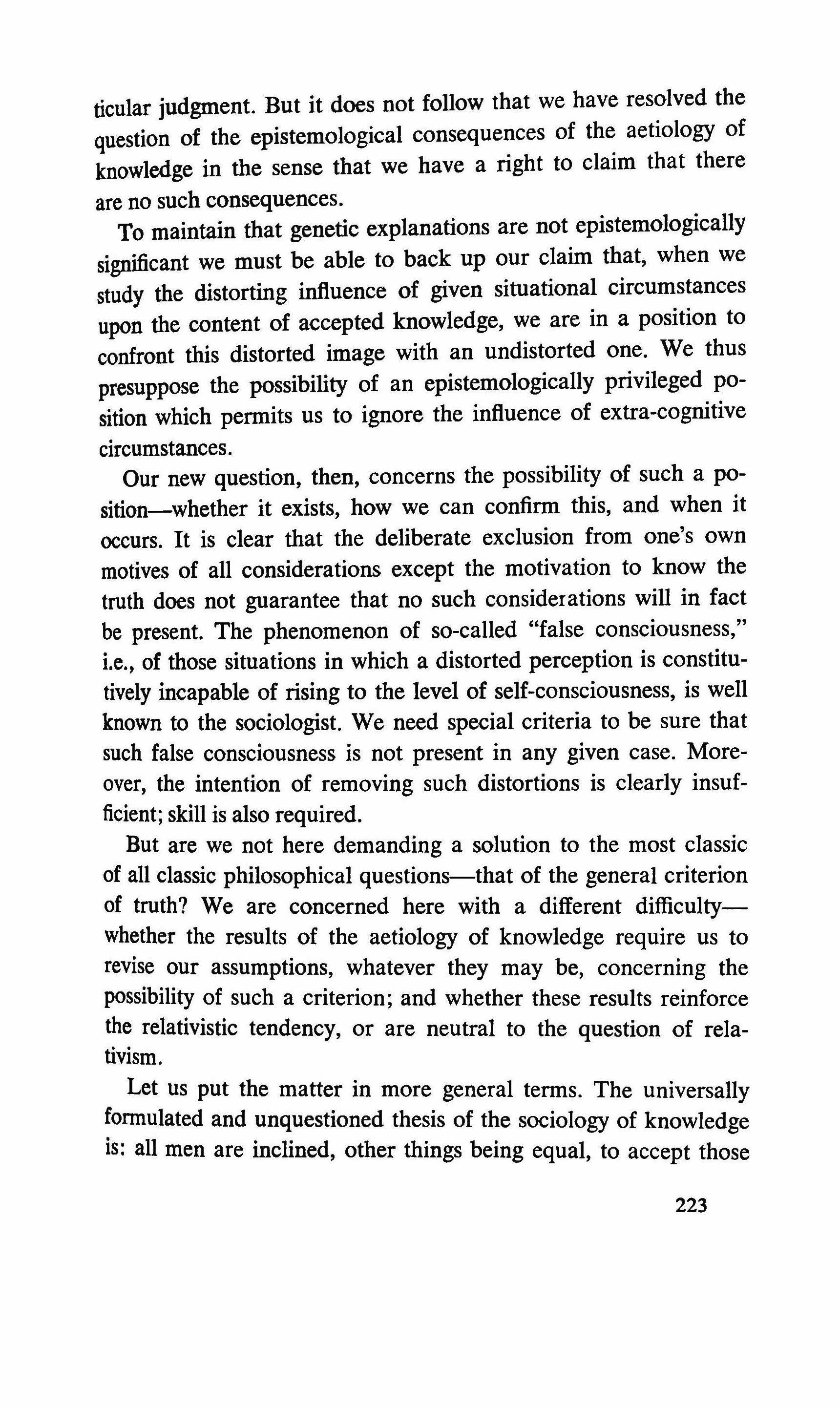
ticular judgment. But it does not follow that we have resolved the question of the epistemological consequences of the aetiology of knowledge in the sense that we have a right to claim that there are no such consequences.
To maintain that genetic explanations are not epistemologically significant we must be able to back up our claim that, when we study the distorting influence of given situational circumstances upon the content of accepted knowledge, we are in a position to confront this distorted image with an undistorted one. We thus presuppose the possibility of an epistemologically privileged position which permits us to ignore the influence of extra-cognitive circumstances.
Our new question, then, concerns the possibility of such a position-whether it exists, how we can confirm this, and when it occurs. It is clear that the deliberate exclusion from one's own motives of all considerations except the motivation to know the truth does not guarantee that no such considerations will in fact be present. The phenomenon of so-called "false consciousness," i.e., of those situations in which a distorted perception is constitutively incapable of rising to the level of self-consciousness, is well known to the sociologist. We need special criteria to be sure that such false consciousness is not present in any given case. Moreover, the intention of removing such distortions is clearly insufficient; skill is also required.
But are we not here demanding a solution to the most classic of all classic philosophical questions-that of the general criterion of truth? We are concerned here with a different difficultywhether the results of the aetiology of knowledge require us to revise our assumptions, whatever they may be, concerning the possibility of such a criterion; and whether these results reinforce the relativistic tendency, or are neutral to the question of relativism.
Let us put the matter in more general terms. The universally formulated and unquestioned thesis of the sociology of knowledge is: all men are inclined, other things being equal, to accept those 223
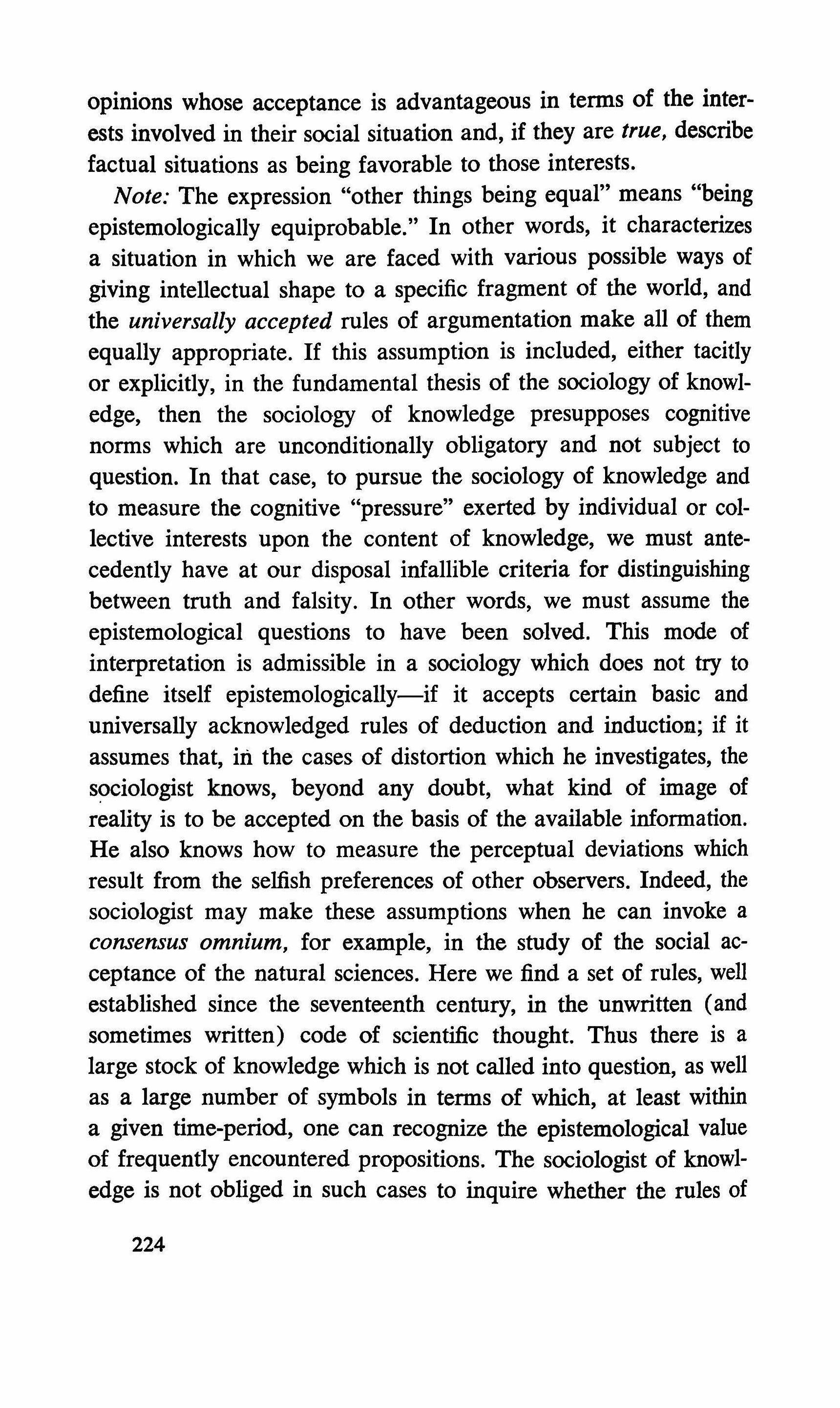
opinions whose acceptance is advantageous in terms of the interests involved in their social situation and, if they are true, describe factual situations as being favorable to those interests.
Note: The expression "other things being equal" means "being epistemologically equiprobable." In other words, it characterizes a situation in which we are faced with various possible ways of giving intellectual shape to a specific fragment of the world, and the universally accepted rules of argumentation make all of them equally appropriate. If this assumption is included, either tacitly or explicitly, in the fundamental thesis of the sociology of knowledge, then the sociology of knowledge presupposes cognitive norms which are unconditionally obligatory and not subject to question. In that case, to pursue the sociology of knowledge and to measure the cognitive "pressure" exerted by individual or collective interests upon the content of knowledge, we must antecedently have at our disposal infallible criteria for distinguishing between truth and falsity. In other words, we must assume the epistemological questions to have been solved. This mode of interpretation is admissible in a sociology which does not try to define itself epistemologically-if it accepts certain basic and universally acknowledged rules of deduction and induction; if it assumes that, in the cases of distortion which he investigates, the sociologist knows, beyond any doubt, what kind of image of reality is to be accepted on the basis of the available information. He also knows how to measure the perceptual deviations which result from the selfish preferences of other observers. Indeed, the sociologist may make these assumptions when he can invoke a consensus omnium, for example, in the study of the social acceptance of the natural sciences. Here we find a set of rules, well established since the seventeenth century, in the unwritten (and sometimes written) code of scientific thought. Thus there is a large stock of knowledge which is not called into question, as well as a large number of symbols in terms of which, at least within a given time-period, one can recognize the epistemological value of frequently encountered propositions. The sociologist of knowledge is not obliged in such cases to inquire whether the rules of
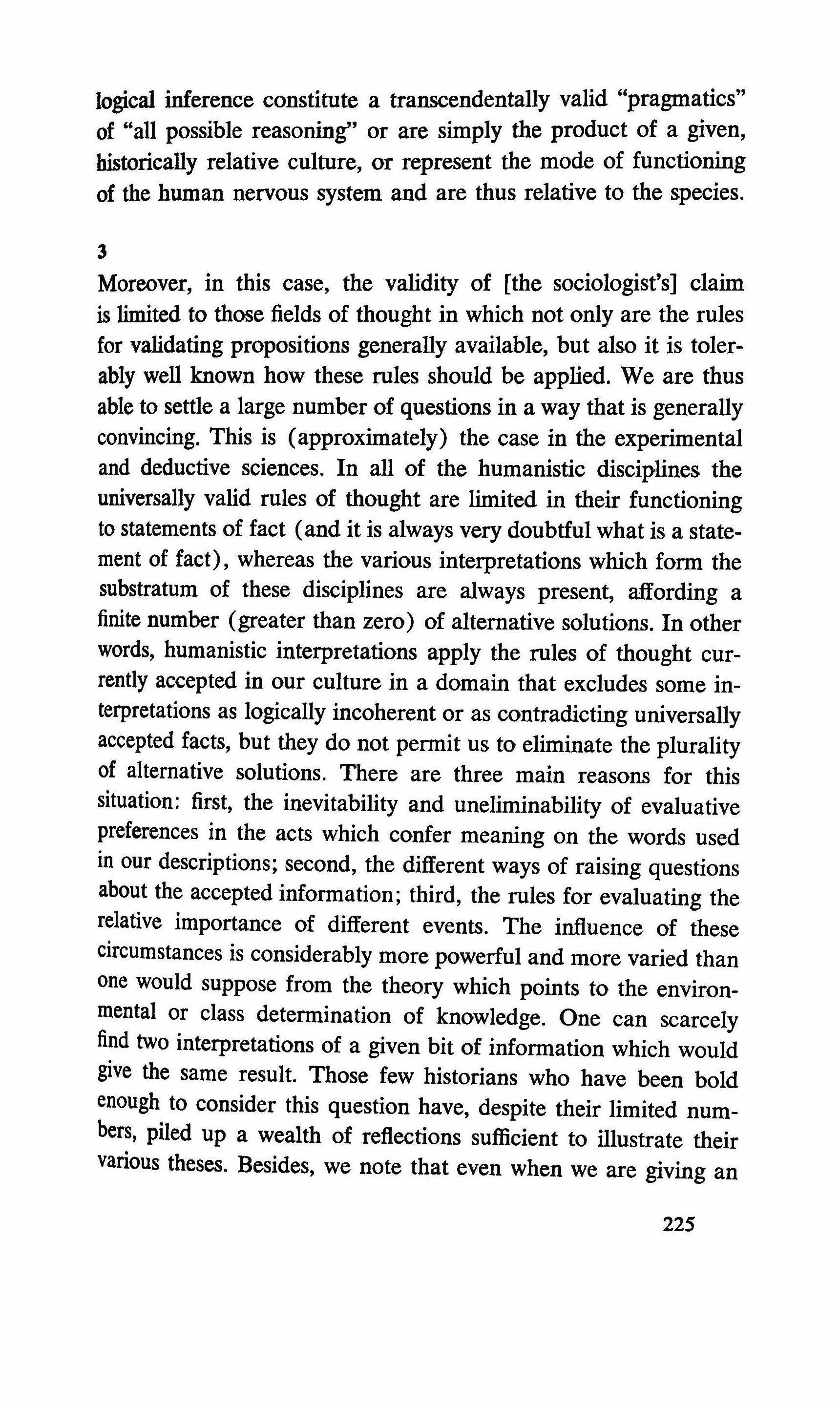
logical inference constitute a transcendentally valid "pragmatics" of "all possible reasoning" or are simply the product of a given, historically relative culture, or represent the mode of functioning of the human nervous system and are thus relative to the species.
3
Moreover, in this case, the validity of [the sociologist's] claim is limited to those fields of thought in which not only are the rules for validating propositions generally available, but also it is tolerably well known how these rules should be applied. Weare thus able to settle a large number of questions in a way that is generally convincing. This is (approximately) the case in the experimental and deductive sciences. In all of the humanistic disciplines the universally valid rules of thought are limited in their functioning to statements of fact (and it is always very doubtful what is a statement of fact), whereas the various interpretations which form the substratum of these disciplines are always present, affording a finite number (greater than zero) of alternative solutions. In other words, humanistic interpretations apply the rules of thought currently accepted in our culture in a domain that excludes some interpretations as logically incoherent or as contradicting universally accepted facts, but they do not permit us to eliminate the plurality of alternative solutions. There are three main reasons for this situation: first, the inevitability and uneliminability of evaluative preferences in the acts which confer meaning on the words used in our descriptions; second, the different ways of raising questions about the accepted information; third, the rules for evaluating the relative importance of different events. The influence of these circumstances is considerably more powerful and more varied than one would suppose from the theory which points to the environmental or class determination of knowledge. One can scarcely find two interpretations of a given bit of information which would give the same result. Those few historians who have been bold enough to consider this question have, despite their limited numbers, piled up a wealth of reflections sufficient to illustrate their various theses. Besides, we note that even when we are giving an 225

account of a situation which we have personally witnessed, and in which we have taken part, there are always hidden value-judgments which make possible many incompatible and equally valid ways of providing significant descriptions. Let us ask a simple question: Who holds power in a given (contemporary) state? We immediately discover not only how many possible meanings this question has but also how many assumptions must be made in order to give the question a precise meaning-unless we take it as simply equivalent to the factual and non-controversial question: what individual is prime minister or head of the police force, or what party has the greatest number of seats in parliament or the greatest number of positions in the cabinet? On any other interpretation the question becomes complex and controversial. What does it mean to "hold power"? To make laws or issue decrees that are legally binding? If so, the answer is easy: the legislature and the government [i.e., the executive branch] hold power. But to give such a meaning to the expression 'hold power' we must assume, first, that to make laws or issue decrees that are legally binding is the same thing as effectively guiding the most important forms of behavior in the governed community, and, second, that those who make the political decisions have a sufficient degree of freedom of action to permit them to be moved in their decisions only by the interests with which they identify themselves-either their own interests or the interests of the country as a whole. Thus one must accept specific criteria for judging both the importance of social events and the freedom of action of the persons who hold specific positions in the administrative hierarchy. Neither kind of criterion can be defined in such a way as to gain the universal agreement of competent judges. It may be immediately objected that other circumstances are decisive for the life of the community in question, e.g., industrial investment, military organization, or fiscal policy, and that the government groups are subject to many unquantifiable pressures from circles that do not have high positions in the apparatus of government. In a word, the question "Who holds power?" is applicable to those persons who make the decisions which are most important in their effects upon the given COID-
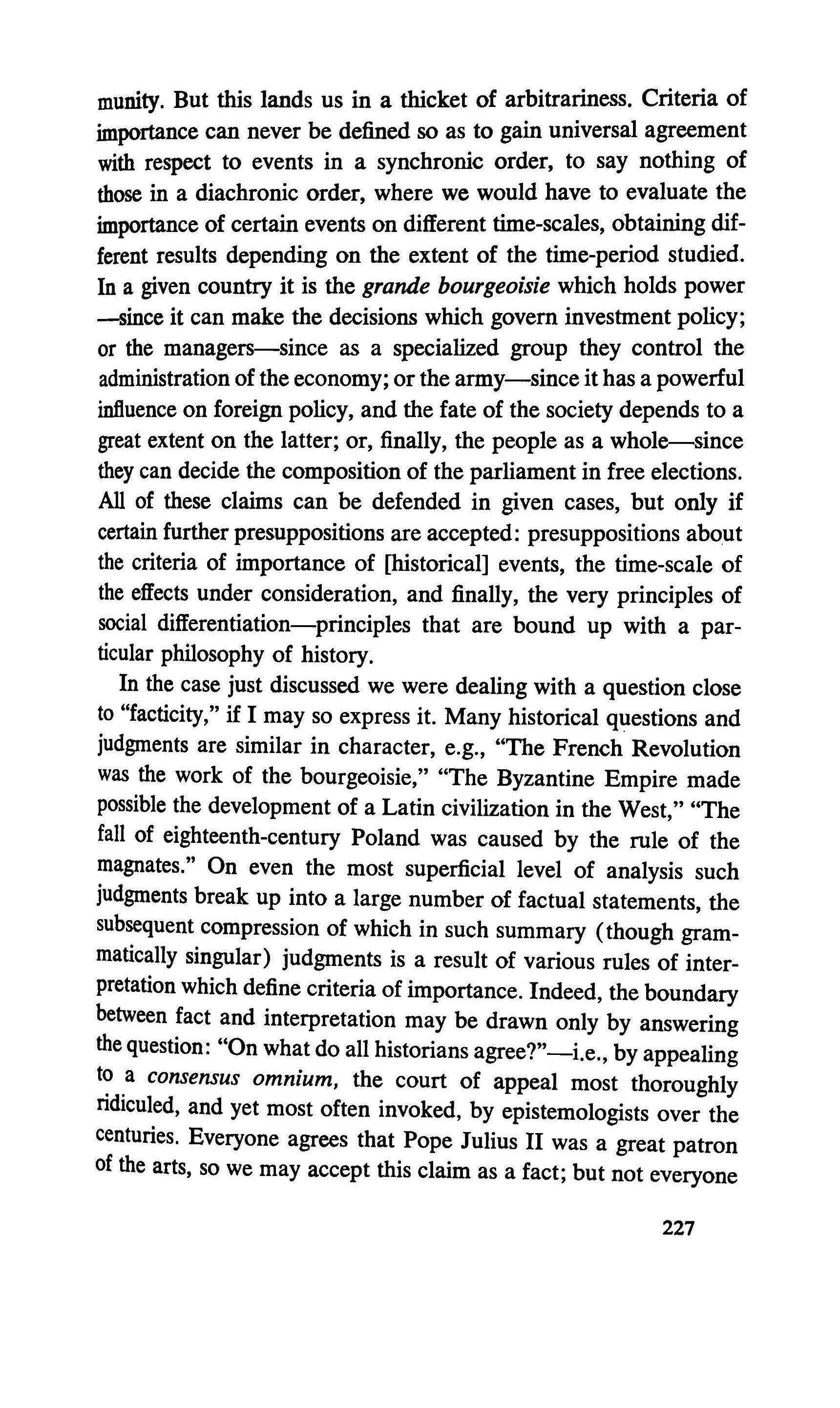
munity. But this lands us in a thicket of arbitrariness. Criteria of importance can never be defined so as to gain universal agreement with respect to events in a synchronic order, to say nothing of those in a diachronic order, where we would have to evaluate the importance of certain events on different time-scales, obtaining different results depending on the extent of the time-period studied. In a given country it is the grande bourgeoisie which holds power -since it can make the decisions which govern investment policy; or the managers-since as a specialized group they control the administration of the economy; or the army-since it has a powerful influence on foreign policy, and the fate of the society depends to a great extent on the latter; or, finally, the people as a whole-since they can decide the composition of the parliament in free elections. All of these claims can be defended in given cases, but only if certain further presuppositions are accepted: presuppositions about the criteria of importance of [historical] events, the time-scale of the effects under consideration, and finally, the very principles of social differentiation-principles that are bound up with a particular philosophy of history.
In the case just discussed we were dealing with a question close to "facticity," if I may so express it. Many historical questions and judgments are similar in character, e.g., "The French Revolution was the work of the bourgeoisie," "The Byzantine Empire made possible the development of a Latin civilization in the West," "The fall of eighteenth-century Poland was caused by the rule of the magnates." On even the most superficial level of analysis such judgments break up into a large number of factual statements, the subsequent compression of which in such summary (though grammatically singular) judgments is a result of various rules of interpretation which define criteria of importance. Indeed, the boundary between fact and interpretation may be drawn only by answering the question: "On what do all historians agree?"-Le., by appealing to a consensus omnium, the court of appeal most thoroughly ridiculed, and yet most often invoked, by epistemologists over the centuries. Everyone agrees that Pope Julius II was a great patron of the arts, so we may accept this claim as a fact; but not everyone
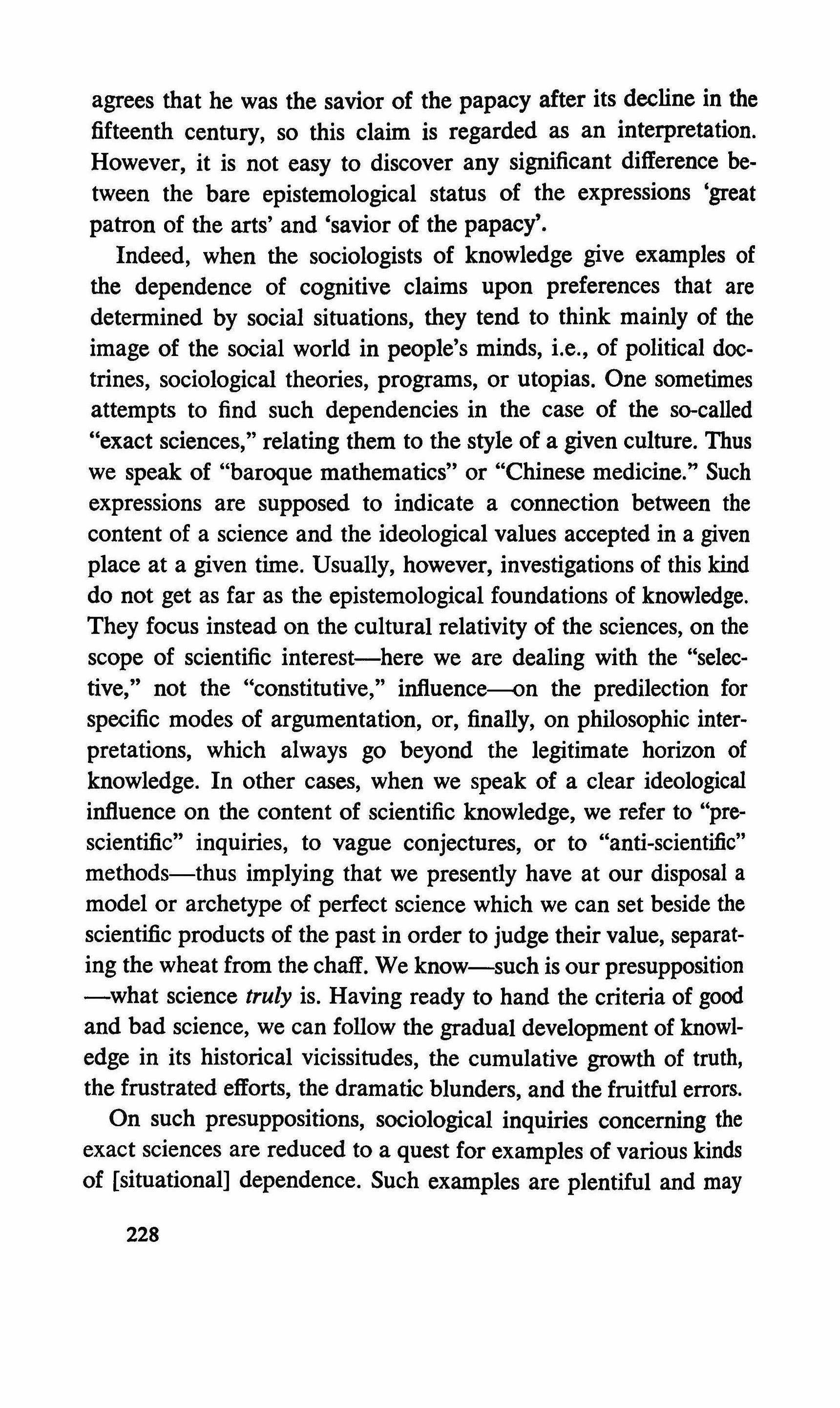
agrees that he was the savior of the papacy after its decline in the fifteenth century, so this claim is regarded as an interpretation. However, it is not easy to discover any significant difference between the bare epistemological status of the expressions 'great patron of the arts' and 'savior of the papacy'.
Indeed, when the sociologists of knowledge give examples of the dependence of cognitive claims upon preferences that are determined by social situations, they tend to think mainly of the image of the social world in people's minds, i.e., of political doctrines, sociological theories, programs, or utopias. One sometimes attempts to find such dependencies in the case of the so-called "exact sciences," relating them to the style of a given culture. Thus we speak of "baroque mathematics" or "Chinese medicine.'" Such expressions are supposed to indicate a connection between the content of a science and the ideological values accepted in a given place at a given time. Usually, however, investigations of this kind do not get as far as the epistemological foundations of knowledge. They focus instead on the cultural relativity of the sciences, on the scope of scientific interest-here we are dealing with the "selective," not the "constitutive," influence--on the predilection for specific modes of argumentation, or, finally, on philosophic interpretations, which always go beyond the legitimate horizon of knowledge. In other cases, when we speak of a clear ideological influence on the content of scientific knowledge, we refer to "prescientific" inquiries, to vague conjectures, or to "anti-scientific" methods-thus implying that we presently have at our disposal a model or archetype of perfect science which we can set beside the scientific products of the past in order to judge their value, separating the wheat from the chaff. We know-such is our presupposition -what science truly is. Having ready to hand the criteria of good and bad science, we can follow the gradual development of knowledge in its historical vicissitudes, the cumulative growth of truth, the frustrated efforts, the dramatic blunders, and the fruitful errors. On such presuppositions, sociological inquiries concerning the exact sciences are reduced to a quest for examples of various kinds of [situational] dependence. Such examples are plentiful and may
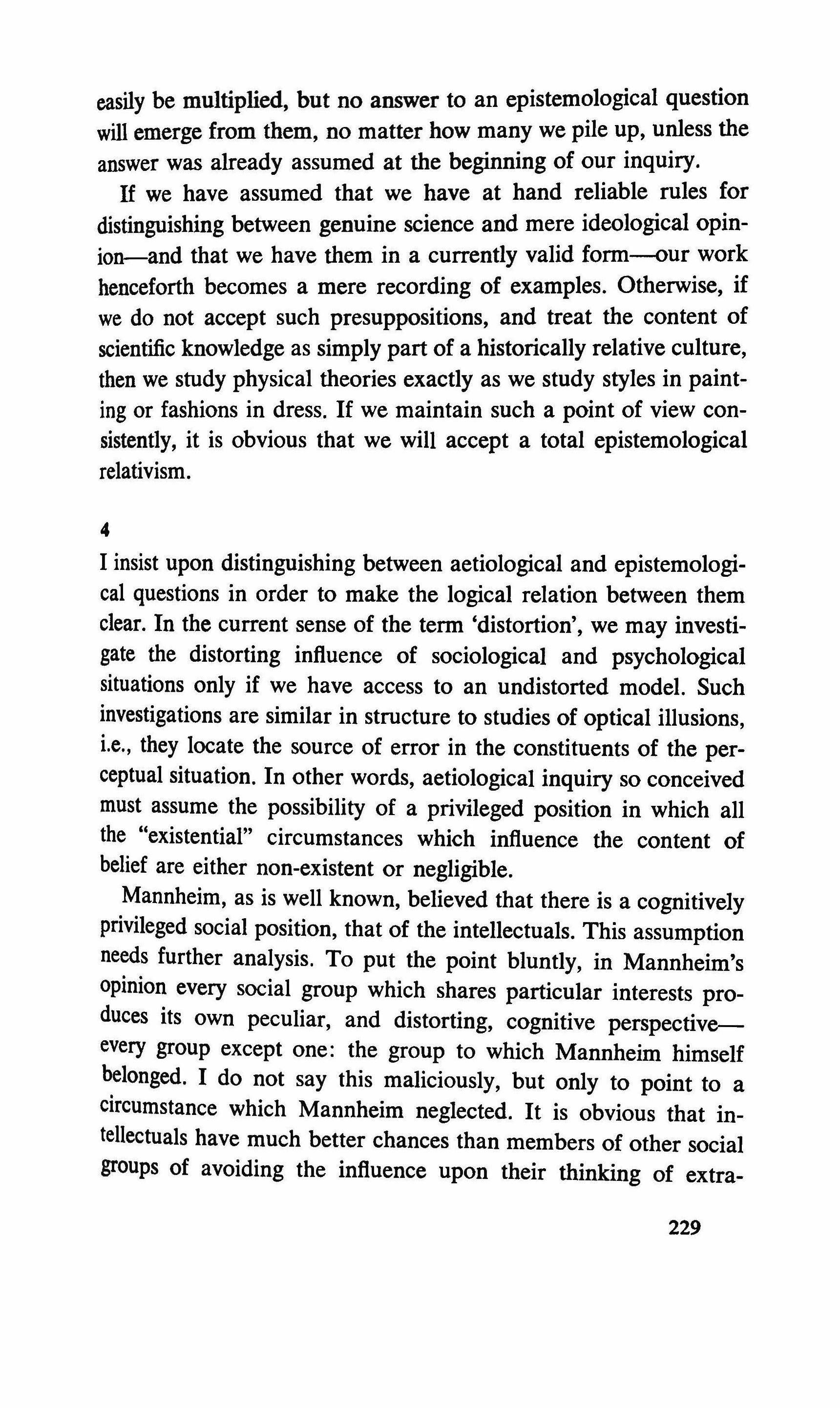
easily be multiplied, but no answer to an epistemological question will emerge from them, no matter how many we pile up, unless the answer was already assumed at the beginning of our inquiry.
If we have assumed that we have at hand reliable rules for distinguishing between genuine science and mere ideological opinion-and that we have them in a currently valid form--our work henceforth becomes a mere recording of examples. Otherwise, if we do not accept such presuppositions, and treat the content of scientific knowledge as simply part of a historically relative culture, then we study physical theories exactly as we study styles in painting or fashions in dress. If we maintain such a point of view consistently, it is obvious that we will accept a total epistemological relativism.
4
I insist upon distinguishing between aetiological and epistemological questions in order to make the logical relation between them clear. In the current sense of the term 'distortion', we may investigate the distorting influence of sociological and psychological situations only if we have access to an undistorted model. Such investigations are similar in structure to studies of optical illusions, i.e., they locate the source of error in the constituents of the perceptual situation. In other words, aetiological inquiry so conceived must assume the possibility of a privileged position in which all the "existential" circumstances which influence the content of belief are either non-existent or negligible.
Mannheim, as is well known, believed that there is a cognitively privileged social position, that of the intellectuals. This assumption needs further analysis. To put the point bluntly, in Mannheim's opinion every social group which shares particular interests produces its own peculiar, and distorting, cognitive perspectiveevery group except one: the group to which Mannheim himself belonged. I do not say this maliciously, but only to point to a circumstance which Mannheim neglected. It is obvious that intellectuals have much better chances than members of other social groups of avoiding the influence upon their thinking of extra-
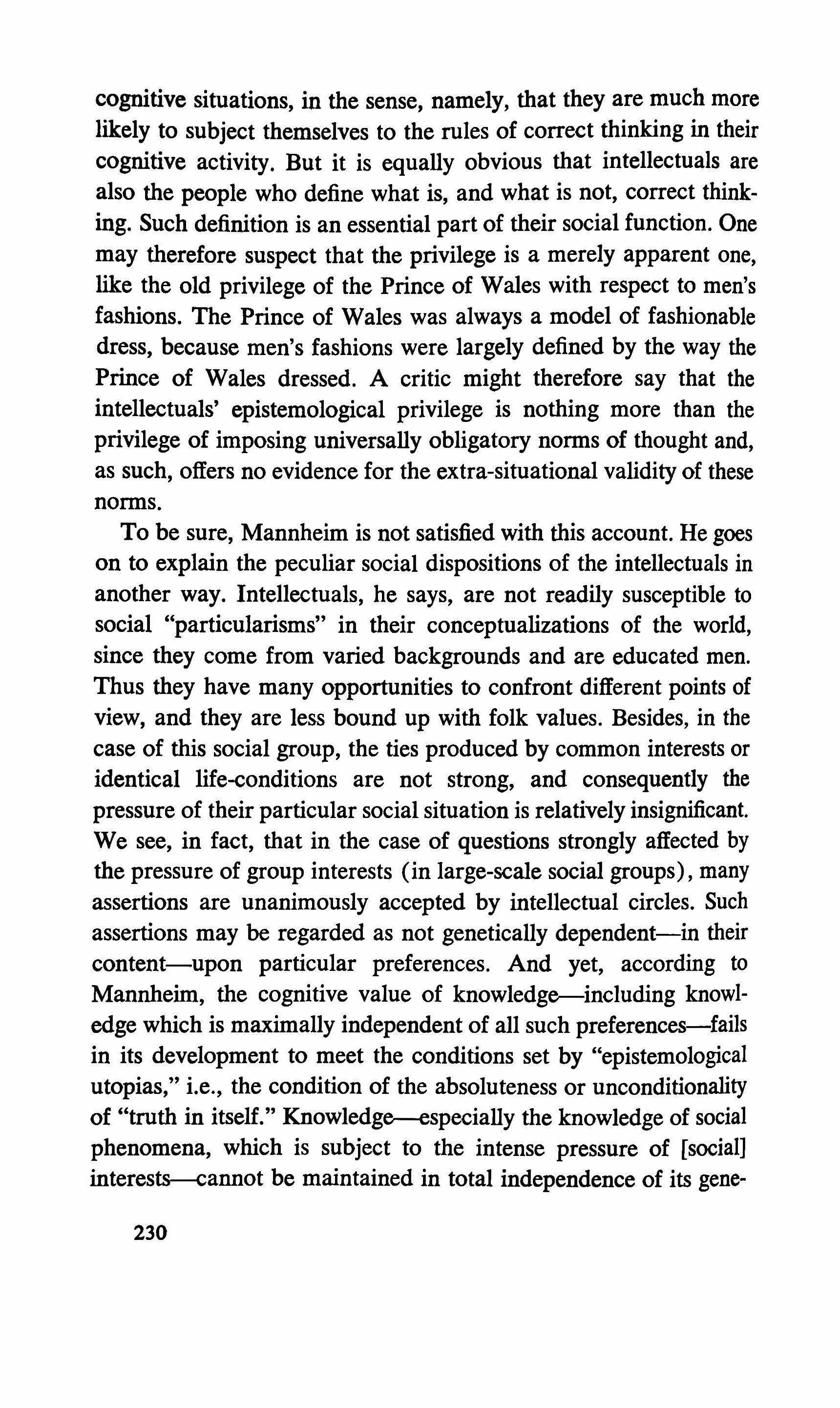
cognitive situations, in the sense, namely, that they are much more likely to subject themselves to the rules of correct thinking in their cognitive activity. But it is equally obvious that intellectuals are also the people who define what is, and what is not, correct thinking. Such definition is an essential part of their social function. One may therefore suspect that the privilege is a merely apparent one, like the old privilege of the Prince of Wales with respect to men's fashions. The Prince of Wales was always a model of fashionable dress, because men's fashions were largely defined by the way the Prince of Wales dressed. A critic might therefore say that the intellectuals' epistemological privilege is nothing more than the privilege of imposing universally obligatory norms of thought and, as such, offers no evidence for the extra-situational validity of these norms.
To be sure, Mannheim is not satisfied with this account. He goes on to explain the peculiar social dispositions of the intellectuals in another way. Intellectuals, he says, are not readily susceptible to social "particularisms" in their conceptualizations of the world, since they come from varied backgrounds and are educated men. Thus they have many opportunities to confront different points of view, and they are less bound up with folk values. Besides, in the case of this social group, the ties produced by common interests or identical life-conditions are not strong, and consequently the pressure of their particular social situation is relatively insignificant. We see, in fact, that in the case of questions strongly affected by the pressure of group interests (in large-scale social groups), many assertions are unanimously accepted by intellectual circles. Such assertions may be regarded as not genetically dependent-in their content-upon particular preferences. And yet, according to Mannheim, the cognitive value of knowledge-including knowledge which is maximally independent of all such preferences-fails in its development to meet the conditions set by "epistemological utopias," i.e., the condition of the absoluteness or unconditionality of "truth in itself." Knowledge---especially the knowledge of social phenomena, which is subject to the intense pressure of [social] interests--cannot be maintained in total independence of its gene-
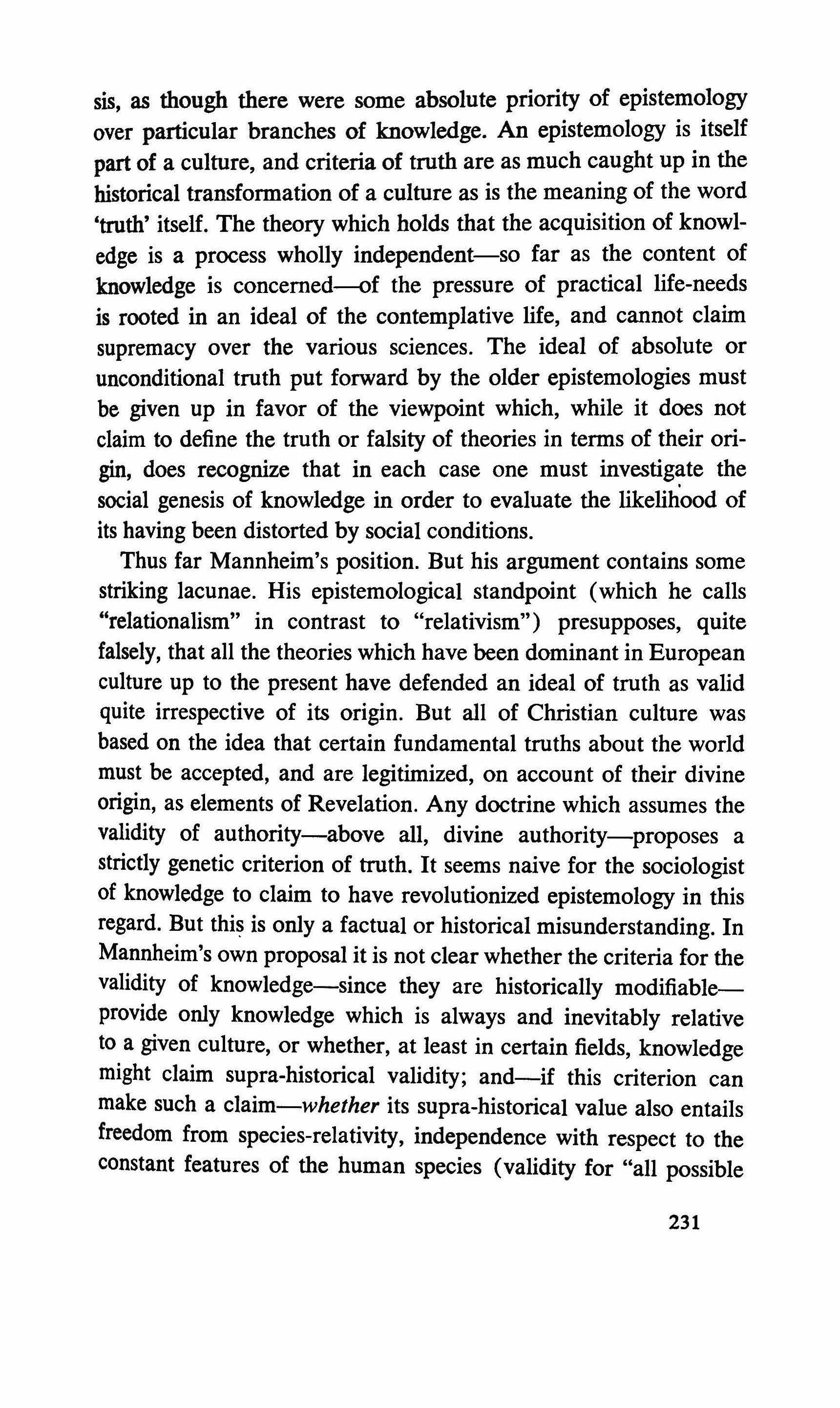
sis, as though there were some absolute priority of epistemology over particular branches of knowledge. An epistemology is itself part of a culture, and criteria of truth are as much caught up in the historical transformation of a culture as is the meaning of the word 'truth' itself. The theory which holds that the acquisition of knowledge is a process wholly independent-so far as the content of knowledge is concemed--of the pressure of practical life-needs is rooted in an ideal of the contemplative life, and cannot claim supremacy over the various sciences. The ideal of absolute or unconditional truth put forward by the older epistemologies must be given up in favor of the viewpoint which, while it does not claim to define the truth or falsity of theories in terms of their origin, does recognize that in each case one must investig�te the social genesis of knowledge in order to evaluate the likelihood of its having been distorted by social conditions. Thus far Mannheim's position. But his argument contains some striking lacunae. His epistemological standpoint (which he calls "relationalism" in contrast to "relativism") presupposes, quite falsely, that all the theories which have been dominant in European culture up to the present have defended an ideal of truth as valid quite irrespective of its origin. But all of Christian culture was based on the idea that certain fundamental truths about the world must be accepted, and are legitimized, on account of their divine origin, as elements of Revelation. Any doctrine which assumes the validity of authority-above all, divine authority-proposes a strictly genetic criterion of truth. It seems naive for the sociologist of knowledge to claim to have revolutionized epistemology in this regard. But this is only a factual or historical misunderstanding. In Mannheim's own proposal it is not clear whether the criteria for the validity of knowledge-since they are historically modifiableprovide only knowledge which is always and inevitably relative to a given culture, or whether, at least in certain fields, knowledge might claim supra-historical validity; and-if this criterion can make such a claim-whether its supra-historical value also entails freedom from species-relativity, independence with respect to the constant features of the human species (validity for "all possible
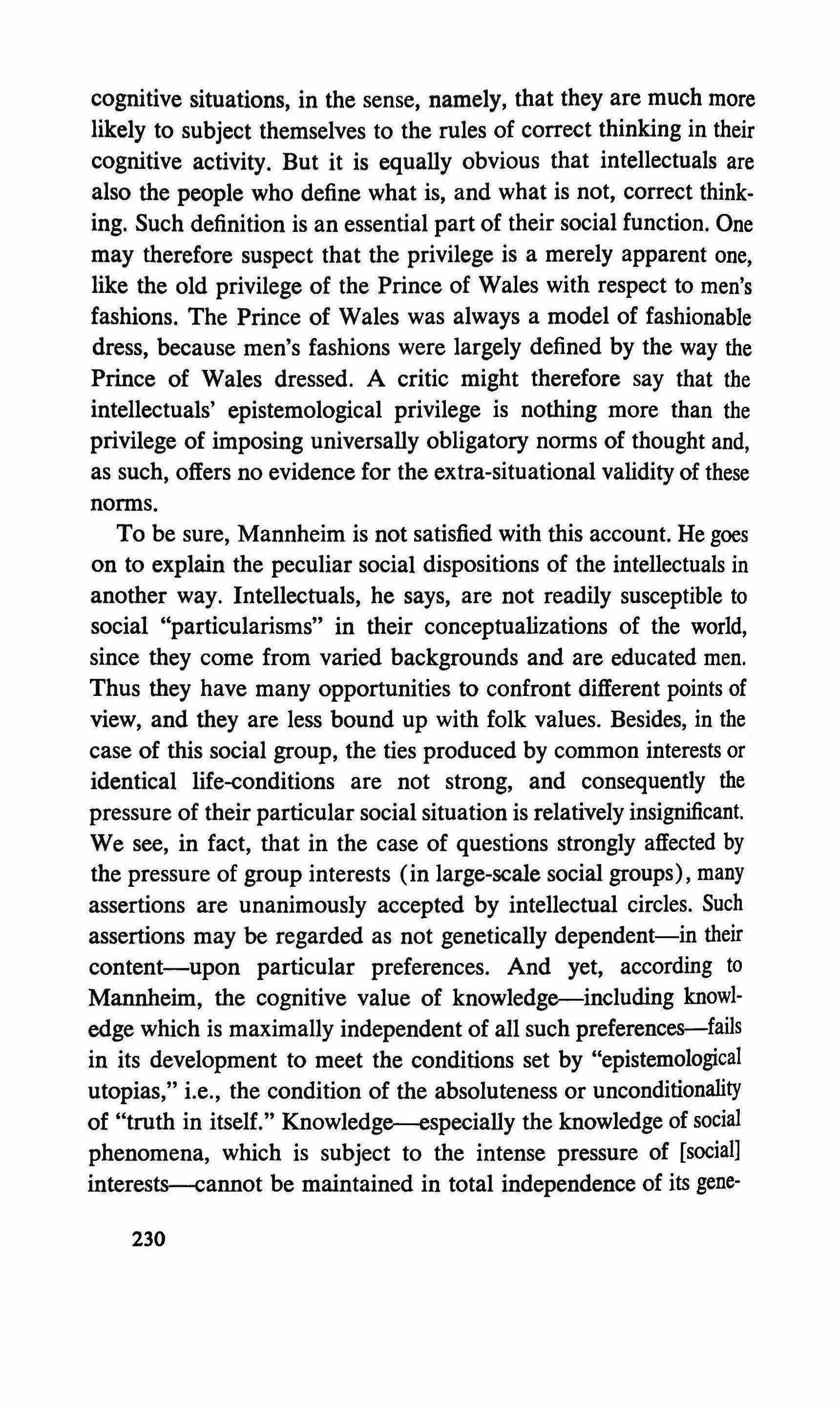
cognitive situations, in the sense, namely, that they are much more likely to subject themselves to the rules of correct thinking in their cognitive activity. But it is equally obvious that intellectuals are also the people who define what is, and what is not, correct thinking. Such definition is an essential part of their social function. One may therefore suspect that the privilege is a merely apparent one, like the old privilege of the Prince of Wales with respect to men's fashions. The Prince of Wales was always a model of fashionable dress, because men's fashions were largely defined by the way the Prince of Wales dressed. A critic might therefore say that the intellectuals' epistemological privilege is nothing more than the privilege of imposing universally obligatory norms of thought and, as such, offers no evidence for the extra-situational validity of these norms.
To be sure, Mannheim is not satisfied with this account. He goes on to explain the peculiar social dispositions of the intellectuals in another way. Intellectuals, he says, are not readily susceptible to social "particularisms" in their conceptualizations of the world, since they come from varied backgrounds and are educated men. Thus they have many opportunities to confront different points of view, and they are less bound up with folk values. Besides, in the case of this social group, the ties produced by common interests or identical life-conditions are not strong, and consequently the pressure of their particular social situation is relatively insignificant. We see, in fact, that in the case of questions strongly affected by the pressure of group interests (in large-scale social groups), many assertions are unanimously accepted by intellectual circles. Such assertions may be regarded as not genetically dependent-in their content-upon particular preferences. And yet, according to Mannheim, the cognitive value of knowledge-including knowledge which is maximally independent of all such preferences-fails in its development to meet the conditions set by "epistemological utopias," i.e., the condition of the absoluteness or unconditionality of "truth in itself." Knowledge-especially the knowledge of social phenomena, which is subject to the intense pressure of [social] interests--cannot be maintained in total independence of its gene-
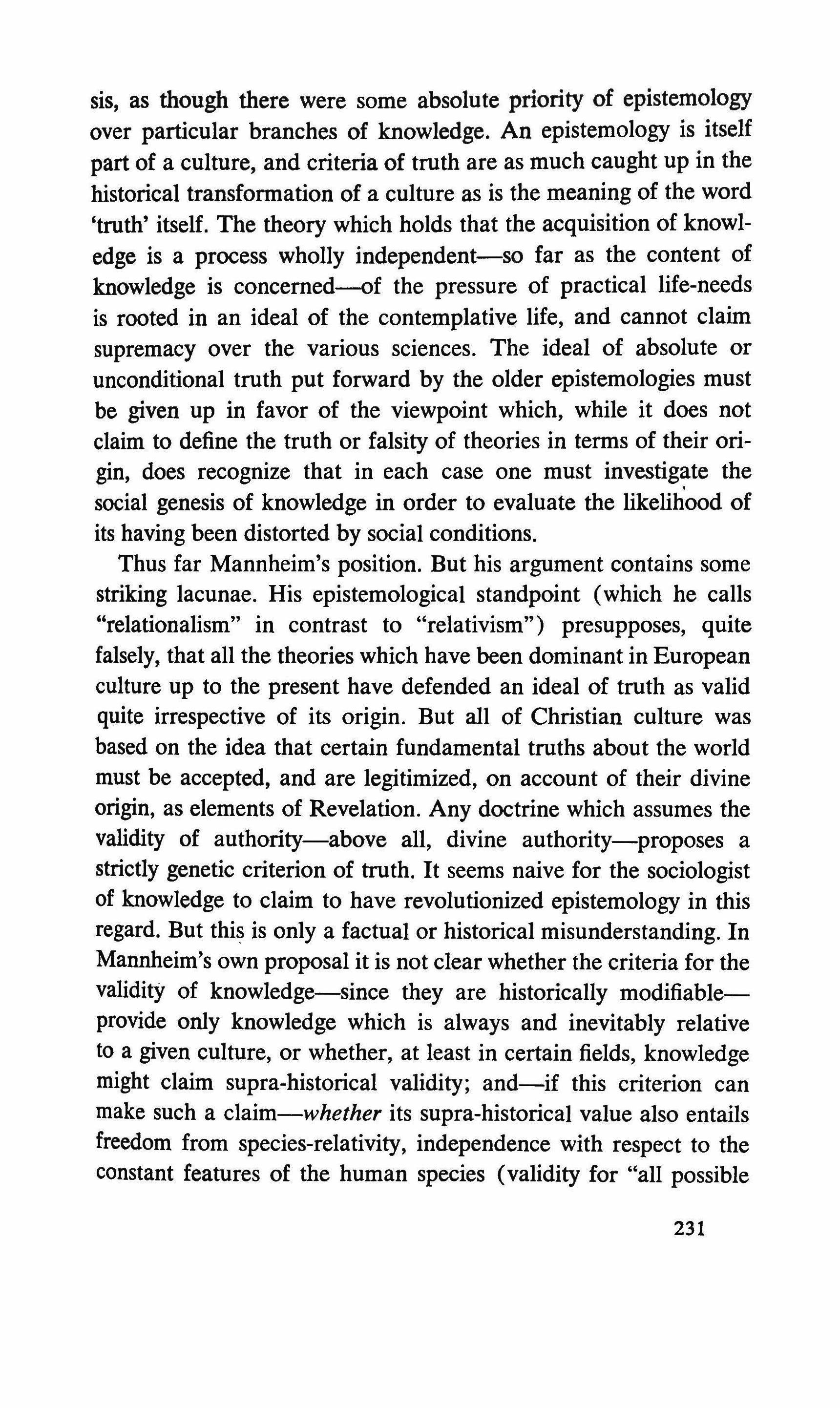
sis, as though there were some absolute priority of epistemology over particular branches of knowledge. An epistemology is itself part of a culture, and criteria of truth are as much caught up in the historical transformation of a culture as is the meaning of the word 'truth' itself. The theory which holds that the acquisition of knowledge is a process wholly independent-so far as the content of knowledge is concemed-of the pressure of practical life-needs is rooted in an ideal of the contemplative life, and cannot claim supremacy over the various sciences. The ideal of absolute or unconditional truth put forward by the older epistemologies must be given up in favor of the viewpoint which, while it does not claim to define the truth or falsity of theories in terms of their origin, does recognize that in each case one must investig�te the social genesis of knowledge in order to evaluate the likelihood of its having been distorted by social conditions.
Thus far Mannheim's position. But his argument contains some striking lacunae. His epistemological standpoint (which he calls "relationalism" in contrast to "relativism") presupposes, quite falsely, that all the theories which have been dominant in European culture up to the present have defended an ideal of truth as valid quite irrespective of its origin. But all of Christian culture was based on the idea that certain fundamental truths about the world must be accepted, and are legitimized, on account of their divine origin, as elements of Revelation. Any doctrine which assumes the Validity of authority-above all, divine authority-proposes a strictly genetic criterion of truth. It seems naive for the sociologist of knowledge to claim to have revolutionized epistemology in this regard. But this is only a factual or historical misunderstanding. In Mannheim's own proposal it is not clear whether the criteria for the validity of knowledge-since they are historically modifiableprovide only knowledge which is always and inevitably relative to a given culture, or whether, at least in certain fields, knowledge might claim supra-historical validity; and-if this criterion can make such a claim-whether its supra-historical value also entails freedom from species-relativity, independence with respect to the constant features of the human species (validity for "all possible
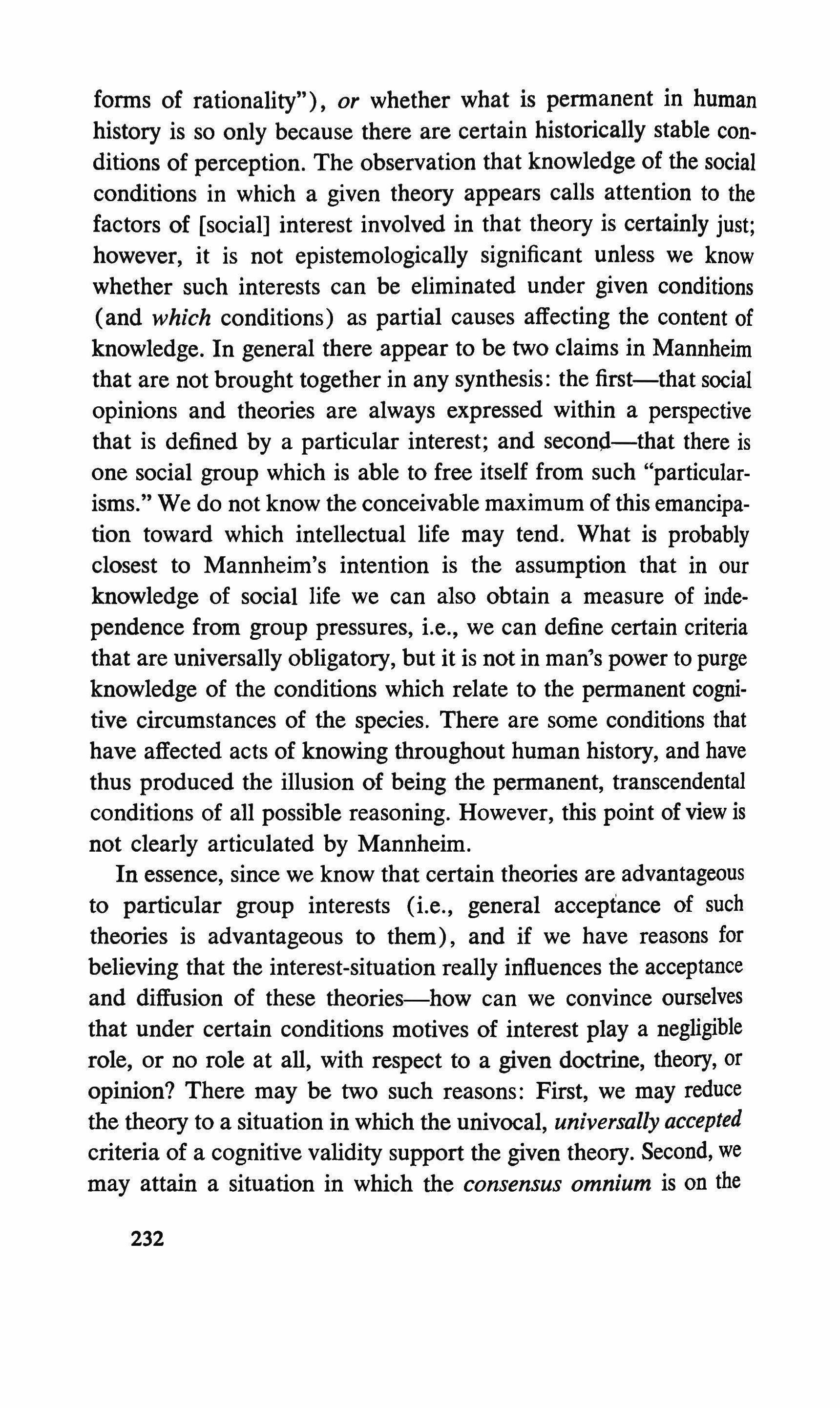
forms of rationality"), or whether what is permanent in human history is so only because there are certain historically stable conditions of perception. The observation that knowledge of the social conditions in which a given theory appears calls attention to the factors of [social] interest involved in that theory is certainly just; however, it is not epistemologically significant unless we know whether such interests can be eliminated under given conditions (and which conditions) as partial causes affecting the content of knowledge. In general there appear to be two claims in Mannheim that are not brought together in any synthesis: the first-that social opinions and theories are always expressed within a perspective that is defined by a particular interest; and second-that there is one social group which is able to free itself from such "particularisms." We do not know the conceivable maximum of this emancipation toward which intellectual life may tend. What is probably closest to Mannheim's intention is the assumption that in our knowledge of social life we can also obtain a measure of independence from group pressures, i.e., we can define certain criteria that are universally obligatory, but it is not in man's power to purge knowledge of the conditions which relate to the permanent cognitive circumstances of the species. There are some conditions that have affected acts of knowing throughout human history, and have thus produced the illusion of being the permanent, transcendental conditions of all possible reasoning. However, this point of view is not clearly articulated by Mannheirn.
In essence, since we know that certain theories are advantageous to particular group interests (i.e., general acceptance of such theories is advantageous to them), and if we have reasons for believing that the interest-situation really influences the acceptance and diffusion of these theories-how can we convince ourselves that under certain conditions motives of interest play a negligible role, or no role at all, with respect to a given doctrine, theory, or opinion? There may be two such reasons: First, we may reduce the theory to a situation in which the univocal, universally accepted criteria of a cognitive validity support the given theory. Second, we may attain a situation in which the consensus omnium is on the
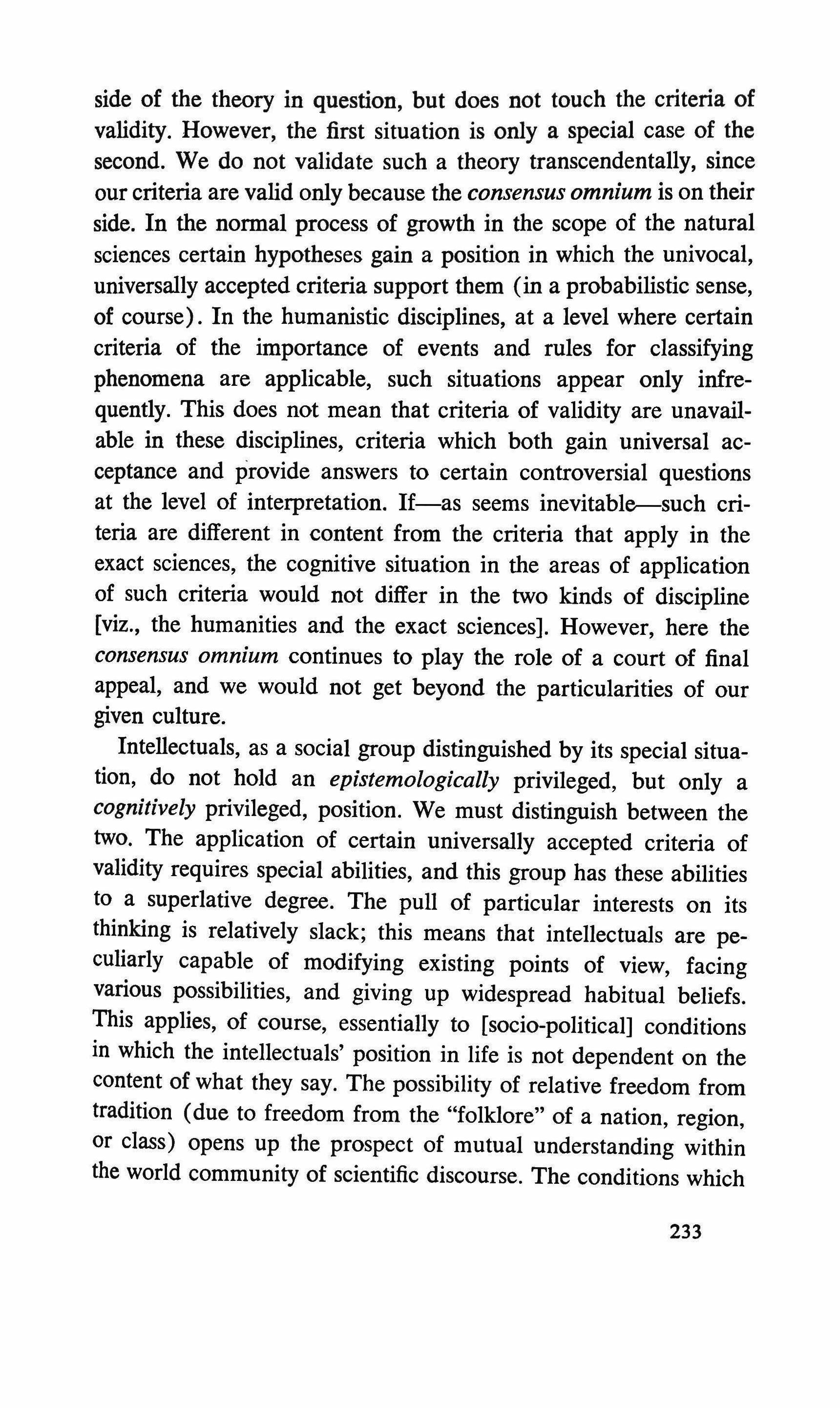
side of the theory in question, but does not touch the criteria of validity. However, the first situation is only a special case of the second. We do not validate such a theory transcendentally, since our criteria are valid only because the consensus omnium is on their side. In the normal process of growth in the scope of the natural sciences certain hypotheses gain a position in which the univocal, universally accepted criteria support them (in a probabilistic sense, of course). In the humanistic disciplines, at a level where certain criteria of the importance of events and rules for classifying phenomena are applicable, such situations appear only infrequently. This does not mean that criteria of validity are unavailable in these disciplines, criteria which both gain universal acceptance and provide answers to certain controversial questions at the level of interpretation. If-as seems inevitable-s-such criteria are different in content from the criteria that apply in the exact sciences, the cognitive situation in the areas of application of such criteria would not differ in the two kinds of discipline [viz., the humanities and the exact sciences]. However, here the consensus omnium continues to play the role of a court of final appeal, and we would not get beyond the particularities of our given culture.
Intellectuals, as a social group distinguished by its special situation, do not hold an epistemologically privileged, but only a cognitively privileged, position. We must distinguish between the two. The application of certain universally accepted criteria of validity requires special abilities, and this group has these abilities to a superlative degree. The pull of particular interests on its thinking is relatively slack; this means that intellectuals are peculiarly capable of modifying existing points of view, facing various possibilities, and giving up widespread habitual beliefs. This applies, of course, essentially to [socio-political] conditions in which the intellectuals' position in life is not dependent on the content of what they say. The possibility of relative freedom from tradition (due to freedom from the "folklore" of a nation, region, or class) opens up the prospect of mutual understanding within the world community of scientific discourse. The conditions which 233
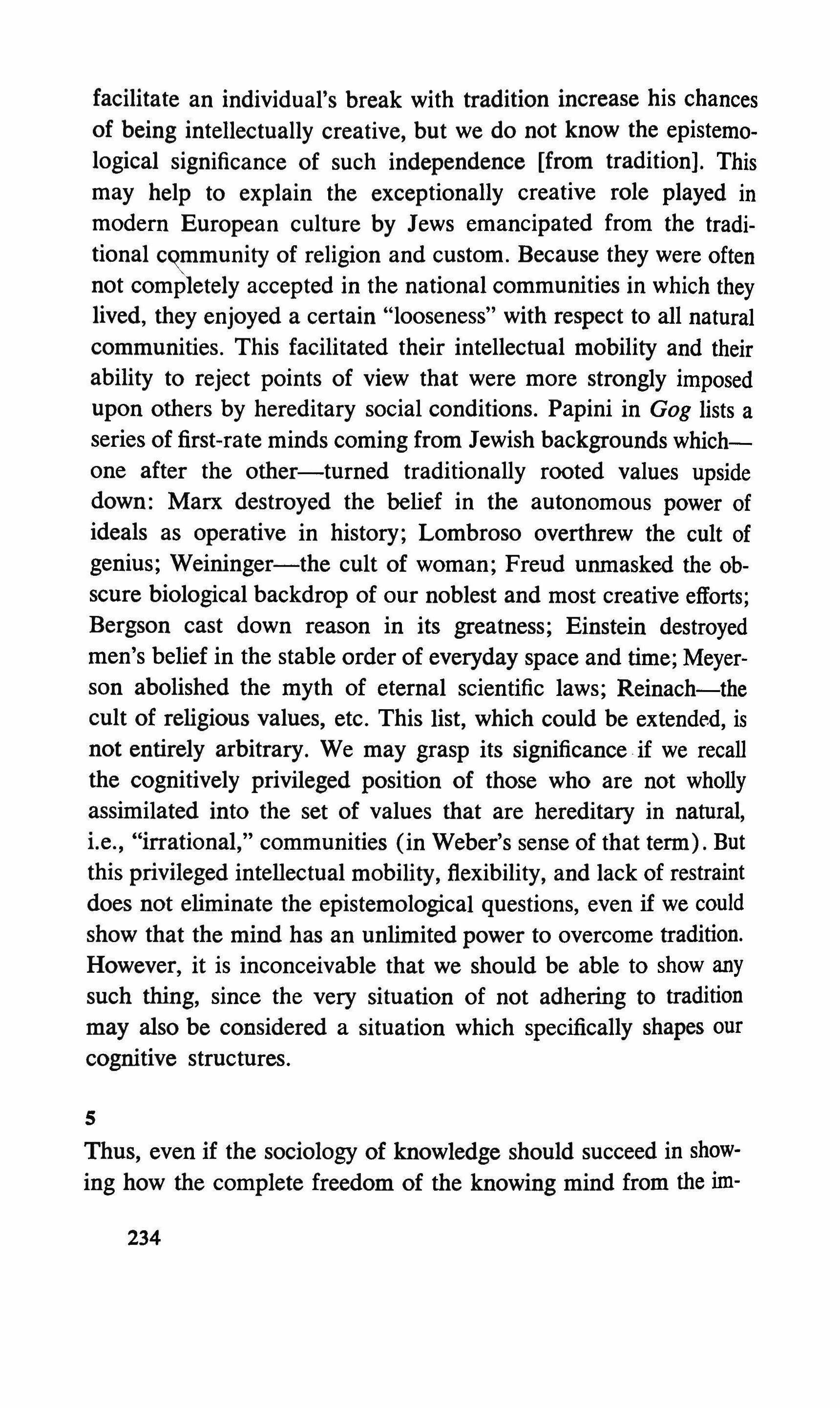
facilitate an individual's break with tradition increase his chances of being intellectually creative, but we do not know the epistemological significance of such independence [from tradition]. This may help to explain the exceptionally creative role played in modern European culture by Jews emancipated from the traditional c�mmunity of religion and custom. Because they were often not completely accepted in the national communities in which they lived, they enjoyed a certain "looseness" with respect to all natural communities. This facilitated their intellectual mobility and their ability to reject points of view that were more strongly imposed upon others by hereditary social conditions. Papini in Gog lists a series of first-rate minds coming from Jewish backgrounds whichone after the other-turned traditionally rooted values upside down: Marx destroyed the belief in the autonomous power of ideals as operative in history; Lombroso overthrew the cult of genius; Weininger-the cult of woman; Freud unmasked the obscure biological backdrop of our noblest and most creative efforts; Bergson cast down reason in its greatness; Einstein destroyed men's belief in the stable order of everyday space and time; Meyerson abolished the myth of eternal scientific laws; Reinach-the cult of religious values, etc. This list, which could be extended, is not entirely arbitrary. We may grasp its significance if we recall the cognitively privileged position of those who are not wholly assimilated into the set of values that are hereditary in natural, i.e., "irrational," communities (in Weber's sense of that term). But this privileged intellectual mobility, flexibility, and lack of restraint does not eliminate the epistemological questions, even if we could show that the mind has an unlimited power to overcome tradition. However, it is inconceivable that we should be able to show any such thing, since the very situation of not adhering to tradition may also be considered a situation which specifically shapes our cognitive structures.
5
Thus, even if the sociology of knowledge should succeed in showing how the complete freedom of the knowing mind from the im-
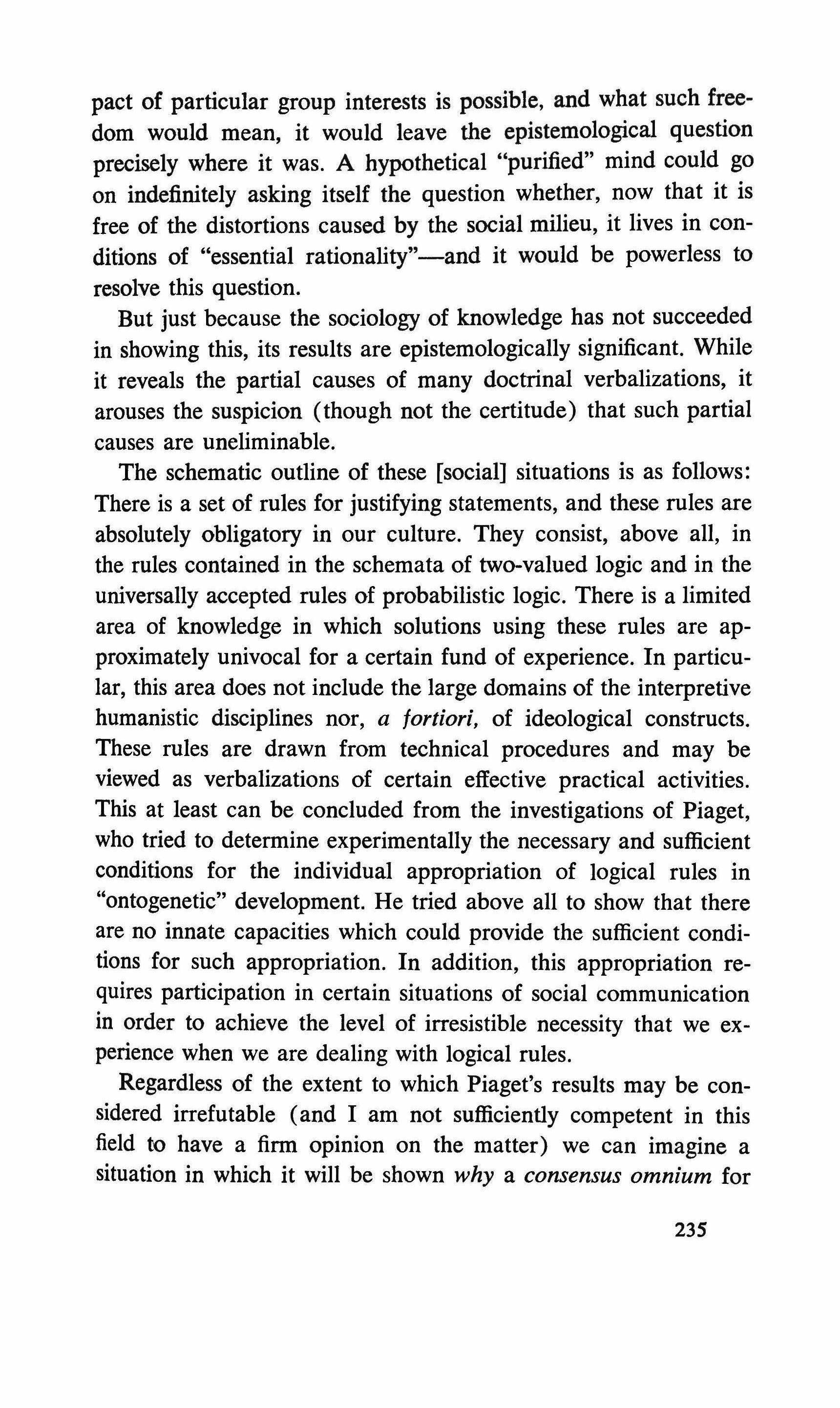
pact of particular group interests is possible, and what such freedom would mean, it would leave the epistemological question precisely where it was. A hypothetical "purified" mind could go on indefinitely asking itself the question whether, now that it is free of the distortions caused by the social milieu, it lives in conditions of "essential rationality"-and it would be powerless to resolve this question.
But just because the sociology of knowledge has not succeeded in showing this, its results are epistemologically significant. While it reveals the partial causes of many doctrinal verbalizations, it arouses the suspicion (though not the certitude) that such partial causes are uneliminable.
The schematic outline of these [social] situations is as follows: There is a set of rules for justifying statements, and these rules are absolutely obligatory in our culture. They consist, above all, in the rules contained in the schemata of two-valued logic and in the universally accepted rules of probabilistic logic. There is a limited area of knowledge in which solutions using these rules are approximately univocal for a certain fund of experience. In particular, this area does not include the large domains of the interpretive humanistic disciplines nor, a fortiori, of ideological constructs. These rules are drawn from technical procedures and may be viewed as verbalizations of certain effective practical activities. This at least can be concluded from the investigations of Piaget, who tried to determine experimentally the necessary and sufficient conditions for the individual appropriation of logical rules in "ontogenetic" development. He tried above all to show that there are no innate capacities which could provide the sufficient conditions for such appropriation. In addition, this appropriation requires participation in certain situations of social communication in order to achieve the level of irresistible necessity that we experience when we are dealing with logical rules.
Regardless of the extent to which Piaget's results may be considered irrefutable (and I am not sufficiently competent in this field to have a firm opinion on the matter) we can imagine a situation in which it will be shown why a consensus omnium for 235
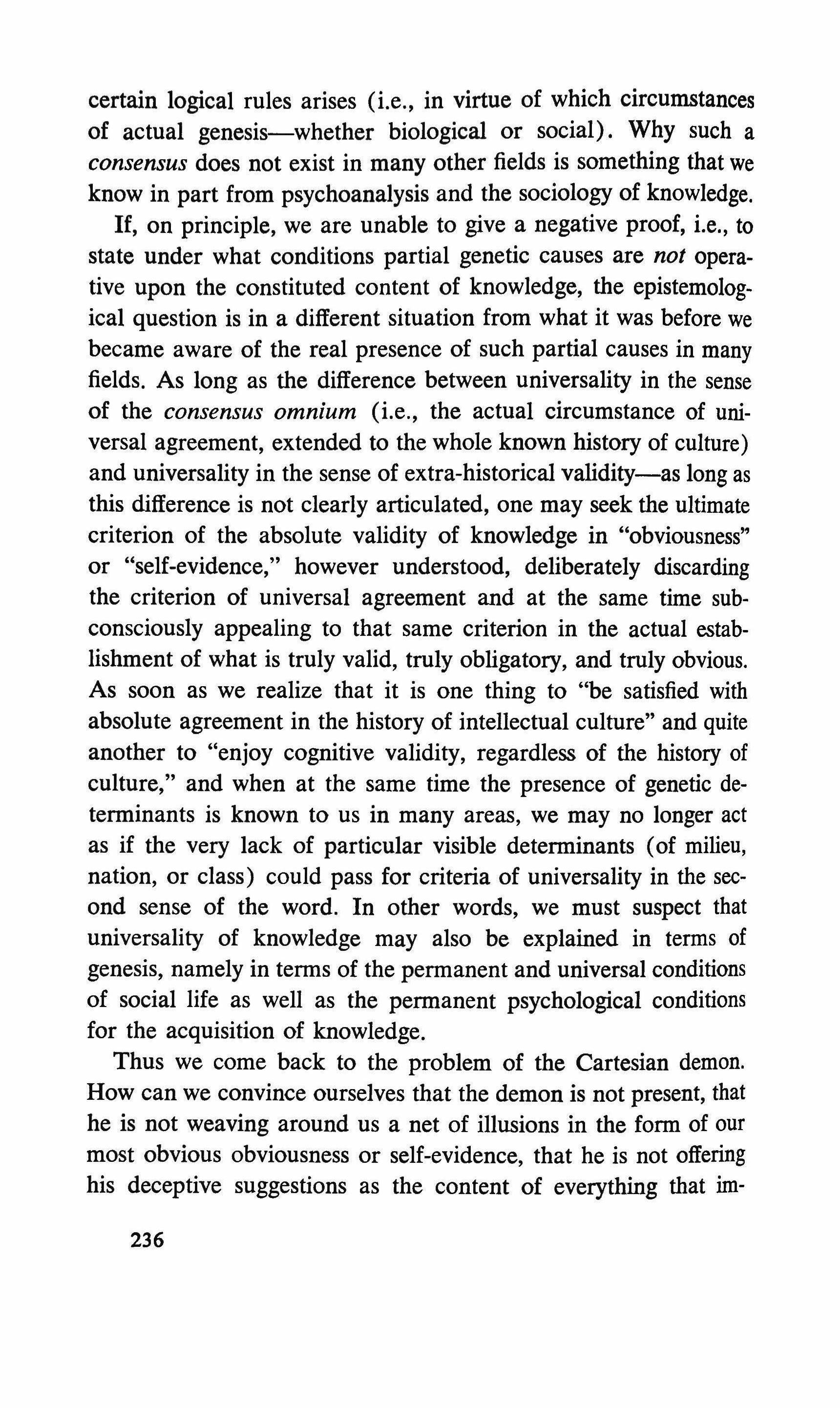
certain logical rules arises (i.e., in virtue of which circumstances of actual genesis-whether biological or social). Why such a consensus does not exist in many other fields is something that we know in part from psychoanalysis and the sociology of knowledge.
If, on principle, we are unable to give a negative proof, i.e., to state under what conditions partial genetic causes are not operative upon the constituted content of knowledge, the epistemological question is in a different situation from what it was before we became aware of the real presence of such partial causes in many fields. As long as the difference between universality in the sense of the consensus omnium (i.e., the actual circumstance of universal agreement, extended to the whole known history of culture) and universality in the sense of extra-historical validity-as long as this difference is not clearly articulated, one may seek the ultimate criterion of the absolute validity of knowledge in "obviousness" or "self-evidence," however understood, deliberately discarding the criterion of universal agreement and at the same time subconsciously appealing to that same criterion in the actual establishment of what is truly valid, truly obligatory, and truly obvious. As soon as we realize that it is one thing to "be satisfied with absolute agreement in the history of intellectual culture" and quite another to "enjoy cognitive validity, regardless of the history of culture," and when at the same time the presence of genetic determinants is known to us in many areas, we may no longer act as if the very lack of particular visible determinants (of milieu, nation, or class) could pass for criteria of universality in the second sense of the word. In other words, we must suspect that universality of knowledge may also be explained in terms of genesis, namely in terms of the permanent and universal conditions of social life as well as the permanent psychological conditions for the acquisition of knowledge.
Thus we come back to the problem of the Cartesian demon. How can we convince ourselves that the demon is not present, that he is not weaving around us a net of illusions in the form of our most obvious obviousness or self-evidence, that he is not offering his deceptive suggestions as the content of everything that im-
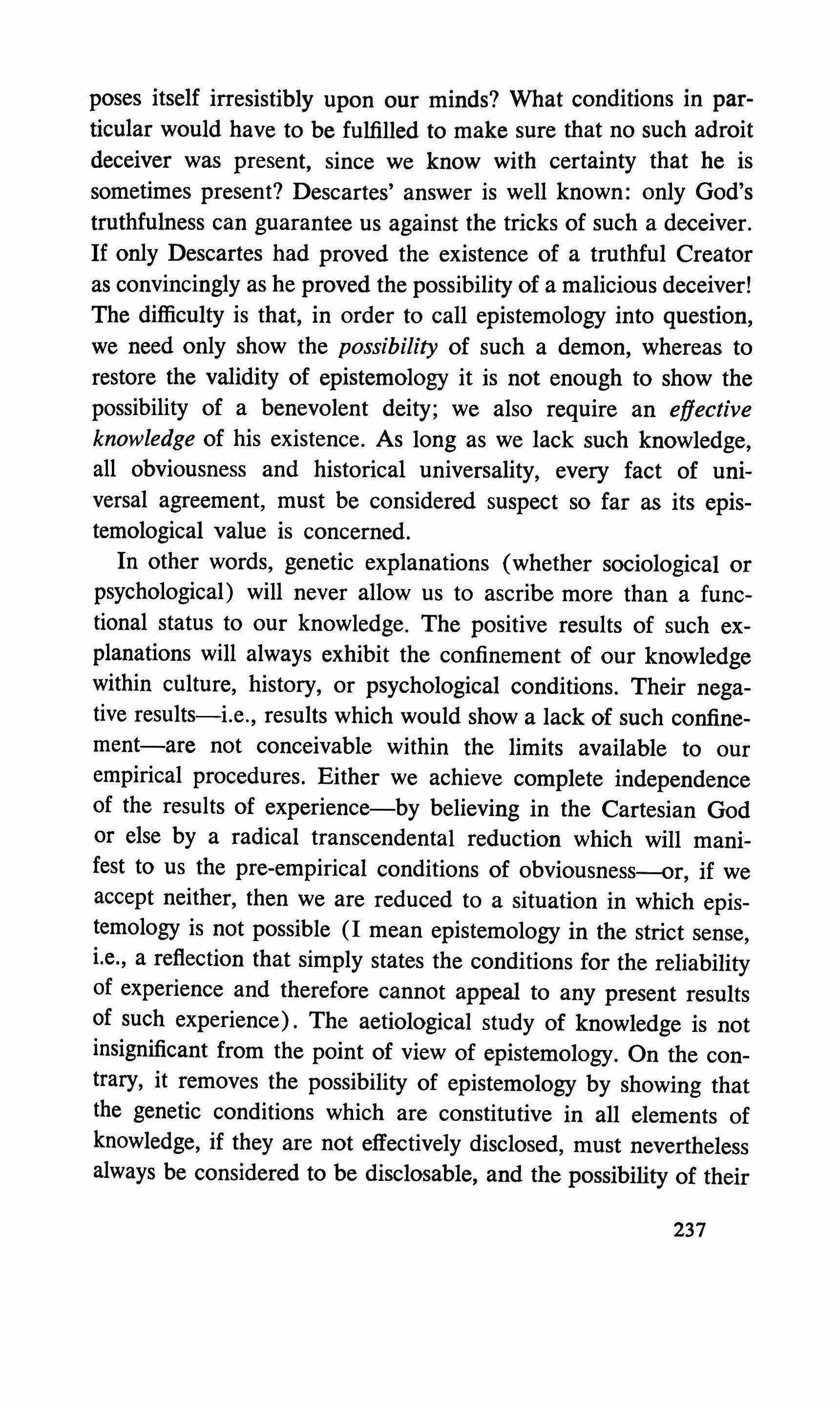
poses itself irresistibly upon our minds? What conditions in particular would have to be fulfilled to make sure that no such adroit deceiver was present, since we know with certainty that he is sometimes present? Descartes' answer is well known: only God's truthfulness can guarantee us against the tricks of such a deceiver. If only Descartes had proved the existence of a truthful Creator as convincingly as he proved the possibility of a malicious deceiver! The difficulty is that, in order to call epistemology into question, we need only show the possibility of such a demon, whereas to restore the validity of epistemology it is not enough to show the possibility of a benevolent deity; we also require an effective knowledge of his existence. As long as we lack such knowledge, all obviousness and historical universality, every fact of universal agreement, must be considered suspect so far as its epistemological value is concerned.
In other words, genetic explanations (whether sociological or psychological) will never allow us to ascribe more than a functional status to our knowledge. The positive results of such explanations will always exhibit the confinement of our knowledge within culture, history, or psychological conditions. Their negative results-i.e., results which would show a lack of such confinement-are not conceivable within the limits available to our empirical procedures. Either we achieve complete independence of the results of experience-by believing in the Cartesian God or else by a radical transcendental reduction which will manifest to us the pre-empirical conditions of obviousness--or, if we accept neither, then we are reduced to a situation in which epistemology is not possible (I mean epistemology in the strict sense, i.e., a reflection that simply states the conditions for the reliability of experience and therefore cannot appeal to any present results of such experience). The aetiological study of knowledge is not insignificant from the point of view of epistemology. On the contrary, it removes the possibility of epistemology by showing that the genetic conditions which are constitutive in all elements of knowledge, if they are not effectively disclosed, must nevertheless always be considered to be disclosable, and the possibility of their
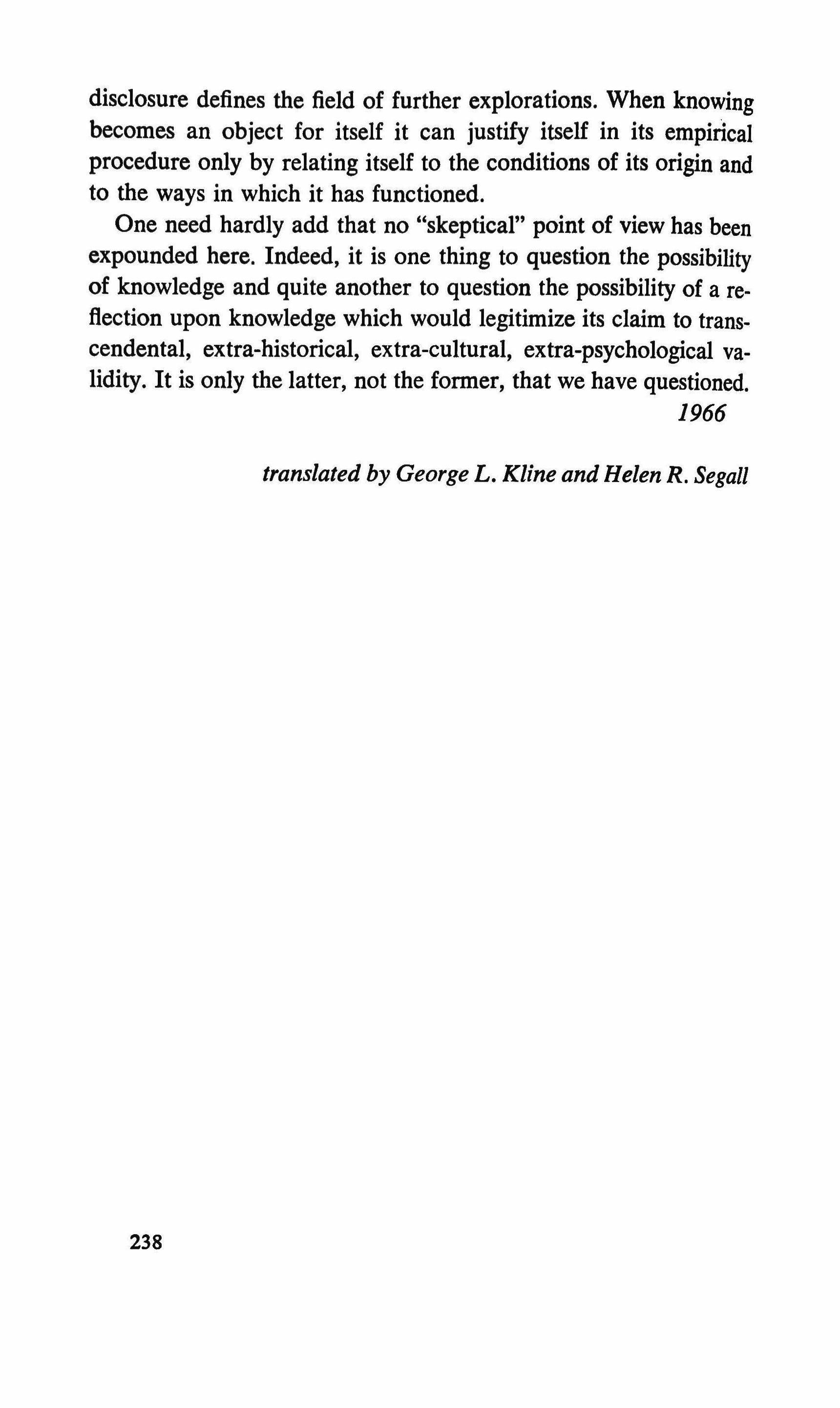
disclosure defines the field of further explorations. When knowing becomes an object for itself it can justify itself in its empirical procedure only by relating itself to the conditions of its origin and to the ways in which it has functioned.
One need hardly add that no "skeptical" point of view has been expounded here. Indeed, it is one thing to question the possibility of knowledge and quite another to question the possibility of a reflection upon knowledge which would legitimize its claim to transcendental, extra-historical, extra-cultural, extra-psychological validity. It is only the latter, not the former, that we have questioned.
1966
translated by George L. Kline and Helen R. Segall
"Tomasz Morus+wielkose w rekach szialbierzy" (Thomas More-a Great Man in the Hands of Betrayers), Nowe Drogi, No.4 (1949), pp. 119-128.
"Avicenna-lekarz dusz i cial" (Avicenna-Healer of Bodies and Souls), Mysl Filozojiczna, No.3 (1952), pp. 36-55.
"Filozofia nieinterwencji: Glos w dyskusji nad radykalnym konwencjonalizmen" (A Philosophy of Non-Intervention: Contribution to the Discussion of Radical Conventionalism), Mysl Filozojiczna, No.2 (1953), pp. 335-372.
(With Bronislaw Baczko) "Tradycje naukowego socjalizmu i zadania marksistowskiej historiografii filozoficznej" (The Traditions of Scientific Socialism and the Tasks of a Marxist Historiography of Philosophy), Mysl Filozojiczna, No.4 (1954), pp. 78-103. (A paper presented at a Polish-German conference on the methodology of the history of philosophy, East Berlin, June 11-13, 1954.)
Szkice 0 jilozojii katolickiej (Sketches of Catholic Philosophy), Warsaw: Paristwowe Wydawnictwo Naukowe, 1955. 266 pp. Contains the following chapters:
(1) "Od autora" (From the Author).
(2) "Neotomizm w walce z postepern nauk i prawami czlowieka" (NeoThomism in Conflict with the Progress of the Sciences and the Rights of Man) : reprinted from Nowe Drogi, No.1 (1953), pp. 68-81.
I have been greatly assisted in tbe preparation of this bibliography both by Mr. Kolakowski himself and by Mrs. Gesine Schwan of West Berlin, the bibliographical portions of whose doctoral dissertation (on Kolakowski's philosophy) have been made available to me in typescript. I am most grateful to them both.-G.L.K.
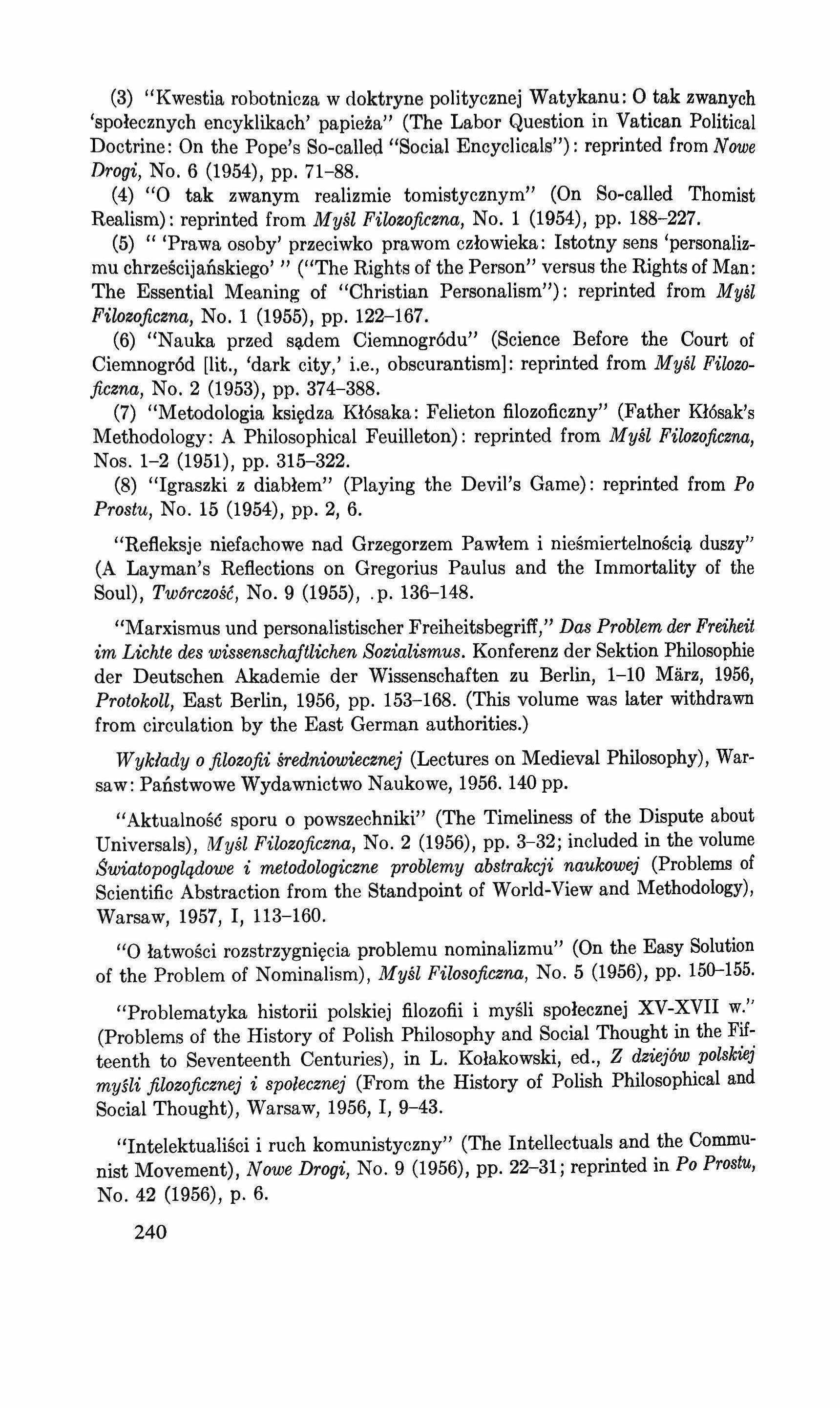
(3) "Kwestia robotnicza w doktryne politycznej Watykanu: 0 tak zwanych 'epolecznych encyklikach' papiesa" (The Labor Question in Vatican Political Doctrine: On the Pope's So-called "Social Encyclicals"): reprinted from Nowe Drogi, No.6 (1954), pp. 71-88.
(4) "0 tak zwanym realizmie tomistycznym" (On So-called Thomist Realism): reprinted from Mysl Filozoficena, No.1 (1954), pp. 188-227.
(5) "'Prawa osoby' przeciwko prawom czlowieka: Istotny sens 'personalizmu chrsesciianskiego' ("The Rights of the Person" versus the Rights of Man: The Essential Meaning of "Christian Personalism"): reprinted from Mysl Filozoficeno, No.1 (1955), pp. 122-167.
(6) "Nauka przed sadern Ciemnogr6du" (Science Before the Court of Ciemnogr6d [lit., 'dark city,' i.e., obscurantism]: reprinted from Mysl Filozoficena, No.2 (1953), pp. 374-388.
(7) "Metodologia ksiedza Klosaka: Felieton filozoficzny" (Father Klosak's Methodology: A Philosophical Feuilleton): reprinted from Mysl Eilozoficena, Nos. 1-2 (1951), pp. 315-322.
(8) "Igraszki z diablem" (Playing the Devil's Game): reprinted from Po Prostu, No. 15 (1954), pp. 2, 6.
"Refleksje niefachowe nad Grzegorzem Pawlem i niesmiertelnoscia duszy" (A Layman's Reflections on Gregorius Paulus and the Immortality of the Soul), Tw6rczosc, No.9 (1955), .p. 136-148.
"Marxismus und personalistischer Freiheitsbegriff," Das Problem der Freiheit im Lichte des wissenschaftlichen Sozialismus. Konferenz der Sektion Philosophie der Deutschen Akademie der Wissenschaften zu Berlin, 1-10 Marz, 1956, Protokoll, East Berlin, 1956, pp. 153-168. (This volume was later withdrawn from circulation by the East German authorities.)
Wyklady 0 filozofii sredniowiecznej (Lectures on Medieval Philosophy), Warsaw: Panstwowe Wydawnictwo Naukowe, 1956. 140 pp.
"Aktualnosc sporu 0 powszechniki" (The Timeliness of the Dispute about Universals), Mysl Filozoficena, No.2 (1956), pp. 3-32; included in the volume 8wiatopoglqdowe i metodologiczne problemy abstrakcji naukowej (Problems of Scientific Abstraction from the Standpoint of World-View and Methodology), Warsaw, 1957, I, 113-160.
"0 latwosci rosstrzygniecia problemu nominalizmu" (On the Easy Solution of the Problem of Nominalism), Mysl Filosojiczna, No.5 (1956), pp. 150-155.
"Problematyka historii polskiej filozofii i mysli spoleesnej XV-XVII w." (Problems of the History of Polish Philosophy and Social Thought in the Fifteenth to Seventeenth Centuries), in L. Kolakowski, ed., Z dziej6w polskiej mysli jilozojicznej i spolecznej (From the History of Polish Philosophical and Social Thought), Warsaw, 1956, I, 9-43.
"Intelektualisci i ruch komunistyczny" (The Intellectuals and the Communist Movement), Nowe Drogi, No.9 (1956), pp. 22-31; reprinted in Po Prostu, No. 42 (1956), p. 6.
240
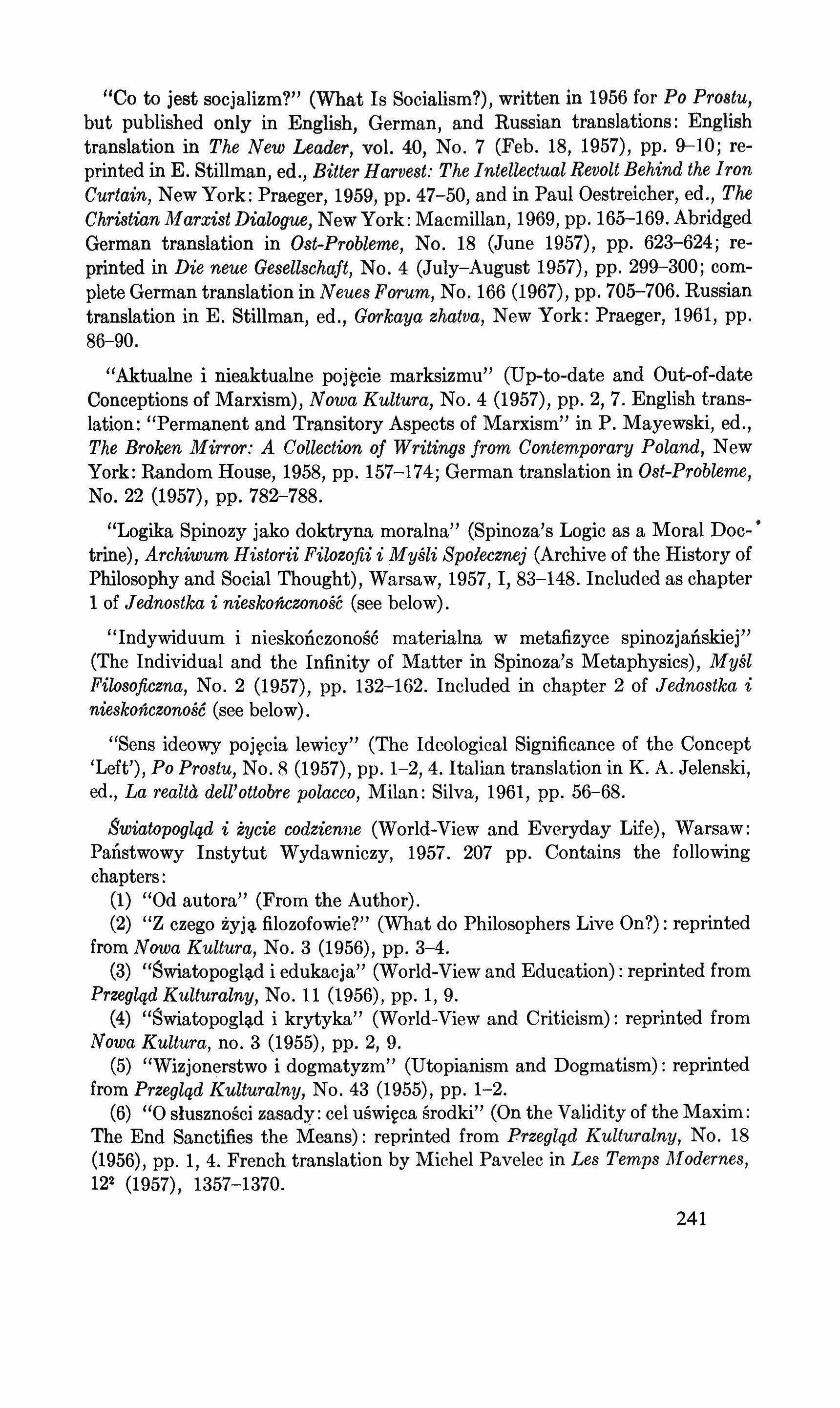
"Co to jest socjalizm?" (What Is Socialism?), written in 1956 for Po Prostu, but published only in English, German, and Russian translations: English translation in The New Leader, vol. 40, No.7 (Feb. 18, 1957), pp. 9-10; reprinted in E. Stillman, ed., Bitter Harvest: The Intellectual Revolt Behind the Iron Curtain, New York: Praeger, 1959, pp. 47-50, and in Paul Oestreicher, ed., The Christian Marxist Dialogue, New York: Macmillan, 1969, pp.165-169. Abridged German translation in Ost-Probleme, No. 18 (June 1957), pp. 623-624; reprinted in Die neue Gesellschaft, No.4 (July-August 1957), pp. 299-300; complete German translation in Neues Forum, No. 166 (1967), pp. 705-706. Russian translation in E. Stillman, ed., Gorkaya zhatva, New York: Praeger, 1961, pp. 86-90.
"Aktualne i nieaktualne pojecie marksizmu" (Up-to-date and Out-of-date Conceptions of Marxism), Nowa Kultura, No.4 (1957), pp. 2, 7. English translation: "Permanent and Transitory Aspects of Marxism" in P. Mayewski, ed., The Broken Mirror: A Collection of Writings from Contemporary Poland, New York: Random House, 1958, pp. 157-174; German translation in Ost-Probleme, No. 22 (1957), pp. 782-788.
"Logika Spinozy jako doktryna moralna" (Spinosa's Logic as a Moral Doctrine), Archiwum Historii Filozojii i Mysli Spolecznej (Archive of the History of Philosophy and Social Thought), Warsaw, 1957, I, 83-148. Included as chapter 1 of Jednostka i nieskonczonosc (see below).
"Indywiduum i nieskoncsonosc materialna w metafizyce spinosjanskiej" (The Individual and the Infinity of Matter in Spinoza's Metaphysics), Mysl Filosojiczna, No.2 (1957), pp. 132-162. Included in chapter 2 of Jednostka i nieskonczonosc (see below).
"Sens ideowy pojecia lewicy" (The Ideological Significance of the Concept 'Left'), Po Prostu, No.8 (1957), pp. 1-2,4. Italian translation in K. A. Jelenski, ed., La realta dell'ottobre polacco, Milan: Silva, 1961, pp. 56-68.
8wiatopoglqd i zycie codzienne (World-View and Everyday Life), Warsaw: Panstwowy Instytut Wydawniczy, 1957. 207 pp. Contains the following chapters:
(1) "Od autora" (From the Author).
(2) "Z czego zyj� filozofowie?" (What do Philosophers Live On?): reprinted from Nowa Kultura, No.3 (1956), pp. 3-4.
(3) "Swiatopoglad i edukacja" (World-View and Education): reprinted from Przeglqd Kulturalny, No. 11 (1956), pp. 1,9.
(4) "Swiatopoglad i krytyka" (World-View and Criticism): reprinted from Nowa Kultura, no. 3 (1955), pp. 2, 9.
(5) "Wizjonerstwo i dogmatyzm" (Utopianism and Dogmatism): reprinted from Przeglqd Kulturalny, No. 43 (1955), pp. 1-2.
(6) "0 slusznosci zasady: eel uswieca srodki" (On the Validity of the Maxim: The End Sanctifies the Means): reprinted from Przeglqd Kulturalny, No. 18 (1956), pp. 1,4. French translation by Michel Pavelec in Les Temps Modernes, 122 (1957), 1357-1370.

(7) "Istota i istnienie w pojeciu wolnosci" (Essence and Existence in the Concept of Freedom).
(8) "Platonism, empiryzm i opinia publiczna" (Platonism, Empiricism, and Public Opinion): reprinted from Nowa Kultura, No. 16 (1956), pp. 1-2, 7.
(9) "Katolicyzm i humanizm" (Catholicism and Humanism) : reprinted from Po Proeiu, No.3 (1956), pp. 1, 7.
(10) "Antysemici: Pi�c tez nienowych i przestroga" (The Antisemites: Five Theses which are not New, and a Warning): reprinted from Po Prosiu, No. 22 (1956), pp. 1, 7.
(11) "Swiatopoglad i zycie codzienne" (World-View and Everyday Life): reprinted from Preeqlqd Kulturalny, No. 37 (1956), p. 9; No. 38, p. 4.
"Odpowiedsialnose i historia" (Responsibility and History), Nowa Kultura, No. 35 (1957), pp. 1-2, 11; No. 36, pp. 4-5; No. 37, pp. 4-5; No. 38, pp. 4-5. Abridged English translation in East Europe, Vol. 5, No. 12 (1957), pp. 12-15; Vol. 6, No.2 (1958), pp. 17-21; No.3, pp. 24-28; No.5, pp. 12-16. Reprinted in Bitter Harvest, pp. 94-125; selections in A. Mendel, ed., Essential Works of Marxism, New York: Bantam Books, 1961, pp. 347-370, and in George Novack, .ed., Existentialism versus Marxism, New York: Dell, 1966, pp. 280-295. French translation by Anna Posner in Les Temps Modernes, 132 (1958), 20492093 and 141 (1958), 264-297. Abridged Russian translation in Gorkaya zhatva, pp. 374-419.
"Pochwala niekonsekwencji' (In Praise of Inconsistency), Tworczo8c, No.9 (1958), pp. 88-94. French translation by Anna Posner in Arguments, Nos. 27-28 (1962), pp. 1-6.
Jednostka i nieskonczonosc: Wolnosc i antynomie wolnosci w jilozojii Spinozy (The Individual and the Infinite: Freedom and the Antinomies of Freedom in Spinosa's Philosophy), Warsaw: Pafistwowe Wydawnictwo Naukowe, 1958. 630 pp.
"Karol Marks i klasyczna definicja prawdy" (Karl Marx and the Classical Definition of Truth), Studia Filozoficene, No.2 (1959), pp. 43-67. (With English and Russian abstracts.) Abridged English translation in L. Labedz, ed., Revisionism: Essays on the History oj Marxist Ideas, London: Allen & Unwin; New York: Praeger, 1962, pp. 179-187.
"Mistyka i konflikt spoleczny: 0 mozliwosci interpretacji mistycyzmu metodami materialistycznego pojmowania dziej6w" (Mysticism and Social Conflict: On the Possibility of Interpreting Mysticism by the Methods of the Materialist Conception of History), Studia Filozoficene, No.3 (1959), pp. 3-51. (With English and Russian abstracts.)
"Determinizm i odpowiedsialnose" (Determinism and Responsibility) in the volume Fragmenty jilozojiczne: Seria druga (Philosophical Fragments: Second Series) [A Festschrift for Tadeusz Kctarbifiski], Warsaw: PaIistwowe Wydawnictwo Naukowe, 1959, pp. 25-43.
242

"Pierre Bayle: Critique de la metaphysique spinoziste de la substance," in the volume Pierre Bayle, le philosophe de Rotterdam (etudes et documents publies sous la direction de Paul Dibon), Paris: Vrin, 1959, pp. 66-80.
"Kaplan i blazen: Rozwasania 0 teologicznym dziedzictwie wsp6lczesnego myslenia" (The Priest and the Jester: An Examination of the Theological Heritage in Contemporary Thought), Tworc2osc, No. 10 (1959), pp. 65-85. English translation by Pawel Mayewski in Maria Kuncewicz, ed., The Modern Polish Mind, Boston: Little Brown, 1962, pp. 301-326.
"Racjonalizm jako ideologia" (Rationalism as an Ideology), Argumenty, No. 19 (1959), pp. 1, 5, 8; No. 20, pp. 1, 8. Spanish translation (from the German) by Jacobo Munoz: El racionalismo como ideologia, Barcelona: Ariel, 1970.
"SwiatopogllJ,d XVII stulecia" (The Seventeenth-Century World-View) in the volume Filozojia XVII wieku: Francja, Holandia, Niemcy (SeventeenthCentury Philosophy: France, Holland, Germany), texts selected, introduced, and annotated by Leszek Kolakowski, Warsaw: Panstwowe Wydawnictwo Naukowe, 1959. 419 pp.
An essay on Tadeusz Kroriski in T. Kroriski, Rozwazanie uioko! Hegla (Studies Around Hegel), Warsaw, 1960, pp. 493-499; reprinted, with slight revisions, from Tw6rczosc, No.6 (1959), pp. 81-85.
"Irracjonalizacja religii jako produkt racjaonalizmu: Sprawa Jana Bredenburga" (The Irrationalization of Religion as a Product of Rationalism: The Case of Jan Bredenburg), Studia Filozoficene, Nos. 2-3 (1960), pp. 193-235. (With English and Russian abstracts.) Included !LS chapter 4 of 8wiadomosc religijna... (see below).
"Dirk Camphuysen i zrodla religijnosci bezwyznaniowej" (Dirk Camphuysen and the Sources of Non-Denominational Religiousness), Archiwum Historii Filozojii i jI,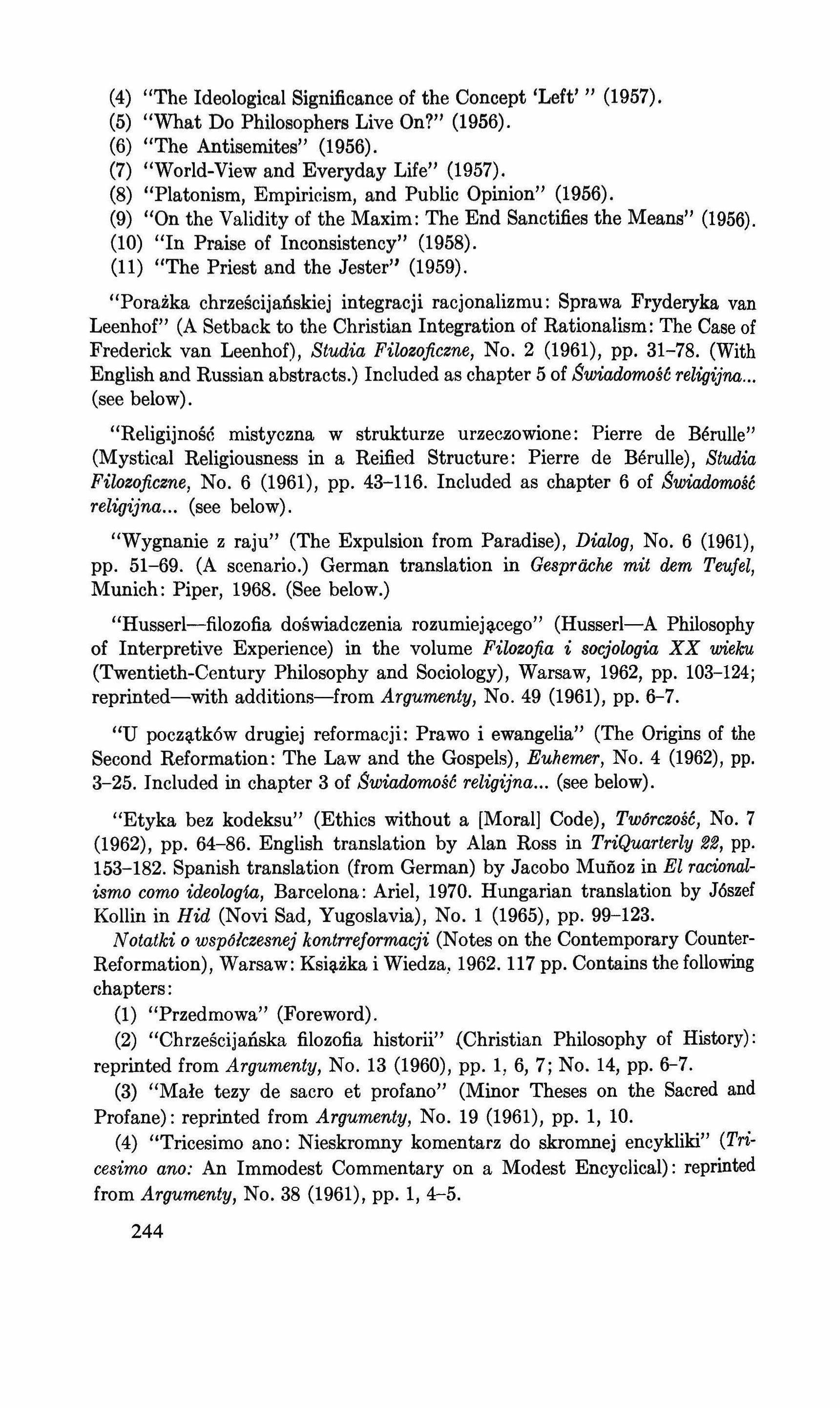
(4) "The Ideological Significance of the Concept 'Left' (1957).
(5) "What Do Philosophers Live On?" (1956).
(6) "The Antisemites" (1956).
(7) "World-View and Everyday Life" (1957).
(8) "Platonism, Empiricism, and Public Opinion" (1956).
(9) "On the Validity of the Maxim: The End Sanctifies the Means" (1956).
(10) "In Praise of Inconsistency" (1958).
(11) "The Priest and the Jester" (1959).
"Porazka chrsescijariskie] integracji racjonalizmu: Sprawa Fryderyka van Leenhof" (A Setback to the Christian Integration of Rationalism: The Case of Frederick van Leenhof), Studia Filozoficene, No.2 (1961), pp. 31-78. (With English and Russian abstracts.) Included as chapter 5 of Bwiadomosc religijna (see below).
"Religijnosd mistyczna w strukturze urzeczowione: Pierre de Berulle" (Mystical Religiousness in a Reified Structure: Pierre de Berulle), Studia Filozojiczne, No.6 (1961), pp. 43-116. Included as chapter 6 of Bwiadomosc religijna... (see below).
"Wygnanie z raju" (The Expulsion from Paradise), Dialog, No.6 (1961), pp. 51-69. (A scenario.) German translation in Geeprache mit dem Teufel, Munich: Piper, 1968. (See below.)
"Husserl-filozofia doswiadcsenia rozumiejacego" (Husserl+A Philosophy of Interpretive Experience) in the volume Filozofia i socjologia XX wie/w, (Twentieth-Century Philosophy and Sociology), Warsaw, 1962, pp. 103-124; reprinted-with additions-from Argumenty, No. 49 (1961), pp. 6-7.
"U poczatkow drugiej reformacji: Prawo i ewangelia" (The Origins of the Second Reformation: The Law and the Gospels), Euhemer, No.4 (1962), pp. 3-25. Included in chapter 3 of Bwiadomosc religijna (see below).
"Etyka bez kodeksu" (Ethics without a [Moral) Code), Tw6rczosc, No.7 (1962), pp. 64-86. English translation by Alan Ross in TriQuarterly 22, pp. 153-182. Spanish translation (from German) by Jacobo Munoz in El racionalismo como ideologia, Barcelona: Ariel, 1970. Hungarian translation by J6szef Kollul in Hid (Novi Sad, Yugoslavia), No.1 (1965), pp. 99-123.
Notatki 0 wsp6lczesnej kontrreformacji (Notes on the Contemporary CounterReformation), Warsaw: Ksiaska i Wiedza, 1962. 117 pp. Contains the following chapters:
(1) "Przedmowa" (Foreword).
(2) "Chrzescijariska filozofia historii" (Christian Philosophy of History): reprinted from Argumenty, No. 13 (1960), pp. 1, 6, 7; No. 14, pp. 6-7.
(3) "Male tezy de sacro et profane" (Minor Theses on the Sacred and Profane): reprinted from Argumenty, No. 19 (1961), pp. 1, 10.
(4) "Tricesimo ano: Nieskromny komentarz do skromnej encykliki" (Tricesimo ana: An Immodest Commentary on a Modest Encyclical): reprinted from Argumenty, No. 38 (1961), pp. 1, 4-5.
244
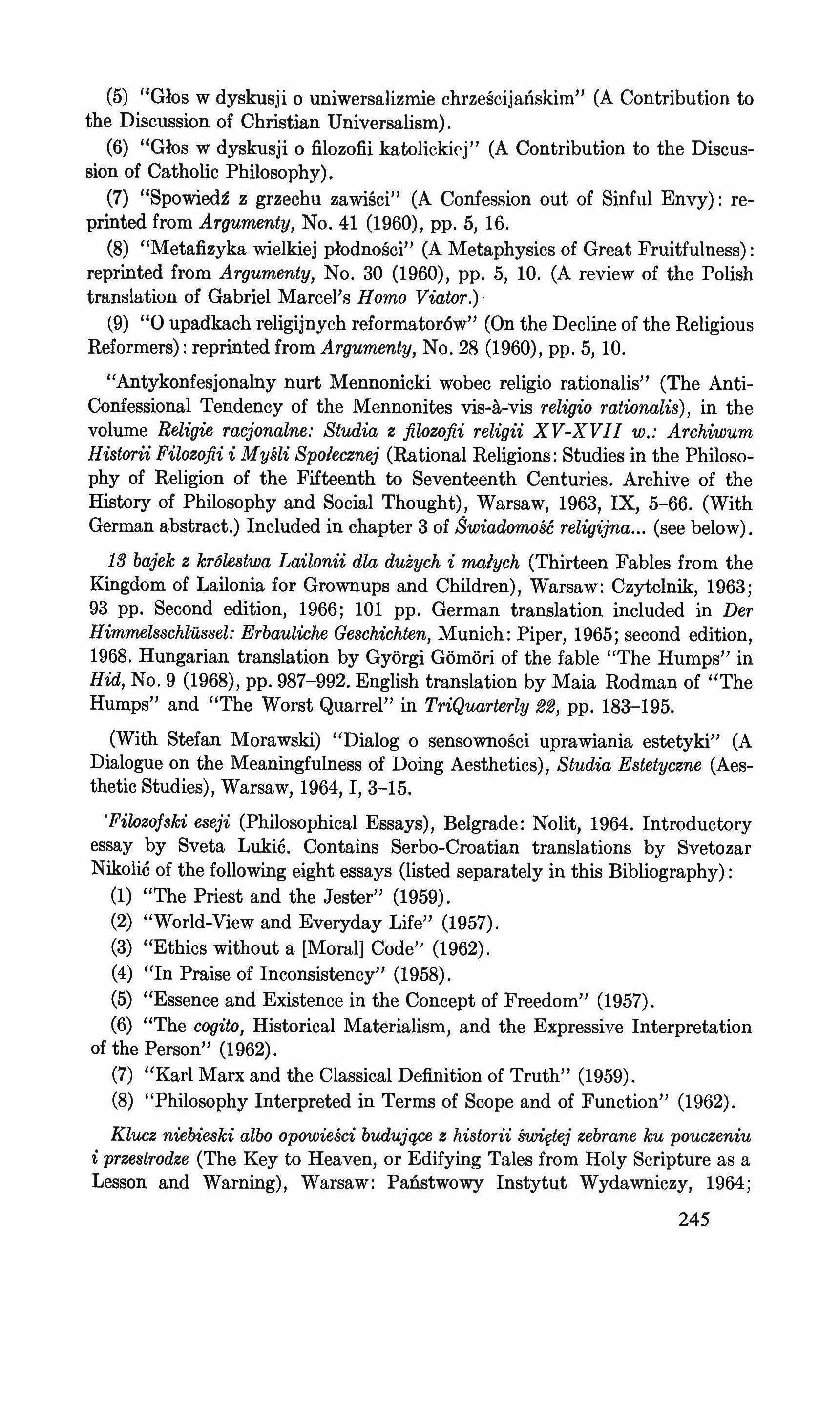
(5) "Glos w dyskusji 0 uniwersalizmie chrsescijariskim" (A Contribution to the Discussion of Christian Universalism).
(6) "Glos w dyskusji 0 filozofii katolickiej" (A Contribution to the Discussion of Catholic Philosophy).
(7) "Spowiedz z grzechu zawisci" (A Confession out of Sinful Envy): reprinted from Argumenty, No. 41 (1960), pp. 5, 16.
(8) "Metafizyka wielkiej plodnosei" (A Metaphysics of Great Fruitfulness) : reprinted from Argumenty, No. 30 (1960), pp. 5, 10. (A review of the Polish translation of Gabriel Marcel's Homo Viator.)·
(9) "0 upadkach religijnych reformator6w" (On the Decline of the Religious Reformers): reprinted from Argumenty, No. 28 (1960), pp. 5, 10.
"Antykonfesjonalny nurt Mennonicki wobec religio rationalis" (The AntiConfessional Tendency of the Mennonites vis-a-vis religio rationalis), in the volume Religie racjonalne: Studia z jilozojii religii XV-XVII W.: Archiwum Historii Filozojii i Mysli Spolecznej (Rational Religions: Studies in the Philosophy of Religion of the Fifteenth to Seventeenth Centuries. Archive of the History of Philosophy and Social Thought), Warsaw, 1963, IX, 5-66. (With German abstract.) Included in chapter 3 of 8wiadomosc religijna (see below).
13 bajek z kr6lestwa Lailonii dla duiych i malych (Thirteen Fables from the Kingdom of Lailonia for Grownups and Children), Warsaw: Czytelnik, 1963; 93 pp. Second edition, 1966; 101 pp. German translation included in Der HimmelsschlUssel: Erbauliche Geschichten, Munich: Piper, 1965; second edition, 1968. Hungarian translation by Gyorgi Gomor] of the fable "The Humps" in Hid, No.9 (1968), pp. 987-992. English translation by Maia Rodman of "The Humps" and "The Worst Quarrel" in TriQuarterly 22, pp. 183-195.
(With Stefan Morawski) "Dialog 0 sensownosci uprawiania estetyki" (A Dialogue on the Meaningfulness of Doing Aesthetics), Studia Estetyczne (Aesthetic Studies), Warsaw, 1964, I, 3-15.
'Filozofski eseji (Philosophical Essays), Belgrade: Nolit, 1964. Introductory essay by Sveta Lukic. Contains Serbo-Croatian translations by Svetozar Nikolic of the following eight essays (listed separately in this Bibliography) :
(1) "The Priest and the Jester" (1959).
(2) "World-View and Everyday Life" (1957).
(3) "Ethics without a [Moral] Code" (1962).
(4) "In Praise of Inconsistency" (1958).
(5) "Essence and Existence in the Concept of Freedom" (1957).
(6) "The cogito, Historical Materialism, and the Expressive Interpretation of the Person" (1962).
(7) "Karl Marx and the Classical Definition of Truth" (1959).
(8) "Philosophy Interpreted in Terms of Scope and of Function" (1962).
Klucz niebieski albo opounesci budujqce z historii swit;tej zebrane ku pouczeniu i przestrodze (The Key to Heaven, or Edifying Tales from Holy Scripture as a Lesson and Warning), Warsaw: Paristwowy Instytut Wydawniczy, 1964; 245

second edition, 1965. 103 pp. Reprinted from Nowa Kultura, No.5 (1957), pp. 6-7; No.6, p. 6; No.8, p. 6; No.9, p. 7; No. 12, p. 6; No. 14, p. 6; No. 16, p. 7; No. 17, p. 8. German translation by Wanda Bronska-Pampuch and Mikolaj Dutsch included in Der Himmelsschliusel: Erbauliche Geschichten, Munich: Piper, 1965; second edition, 1968. Czech translation (of excerpts) in Svetovd Literatura (Prague), No.6 (1966), pp. 158-165. English translation by Nicholas Betheil of "Solomon, or People as Gods," in TriQuarterly 22, pp. 196-204.
'Al ha-reshut ha-netunah: MivlJ,ar masoi (On the Possibility of Choice: A Collection of Essays), Merl,lavya[Israel]: Sifriyat Po 'alim, 1964. Preface by Zvi Posen. Contains Hebrew translations, by Mordecai Dekel and others, of the following twelve essays (listed separately in this Bibliography):
(1) "The Intellectuals and the Communist Movement" (1956).
(2) "Responsibility and History" (1957).
(3) "The Ideological Significance of the Concept 'Left' (1957).
(4) "What Do Philosophers Live On?" (1956).
(5) "World-View and Everyday Life" (1957).
(6) "Platonism, Empiricism, and Public Opinion" (1956).
(7) "On the Validity of the Maxim: The End Sanctifies the Means" (1956).
(8) "In Praise of Inconsistency" (1958).
(9) "The Priest and the Jester" (1959).
(10) "The Limits of Freedom" (chapter 6 of Jednostka i nieskonczonosc, 1958).
(11) "Karl Marx and the Classical Definition of Truth" (1959).
(12) "Ethics without a [Moral] Code" (1962).
"Bardzo dobry krol: Zagadnienie tolerancji religijnej" (A Very Good King: The Problem of Religious Tolerance), Argumenty, No.2 (1965), p. 5.
"System ksiedsa Jensena albo wejscie i wyjscie. Farsa w 2 aktach" (Father Jensen's System, or Entrance and Exit. A Farce in Two Acts), Dialog, No.6 (1965), pp. 18-31. This play was produced in Warsaw in 1962, but withdrawn after a short run. It was later broadcast by the BBC in London. A German translation is included in Gesprach» mit dem Teufel, Munich: Piper, 1968.
"Szanse Teilharda-szanse chrsescijanatwa" (Teilhard's Chances [and] Christianity's Chances), Argumenty, No. 10 (1965), pp. 5-6; German translation in Ost-Probleme, No. 20 (1965), p. 630.
"Jezus Chrystus prorok i reformator" (Jesus Christ, Prophet and Reformer), Argumenty, Nos. 51-52 (1965), pp. 1, 6-7. English translation by Henry His in TriQuarterly, No.9 (1967), pp. 65-77; reprinted in George Gomori and Charles Newman, eds., New Writing of East Europe, Chicago: Quadrangle Books, 1968, pp. 69-81.
Rozmowy z diablem (Conversations with the Devil), Warsaw: Parlstwowy Instytut Wydawniczy, 1965. 123 pp. Contains the following chapters:
(1) "Wielkie kazanie ksi�za Bernarda" (Father Bernard's Great Sermon): reprinted from Tworczosc, No. 10 (1961), pp. 8-16.
246
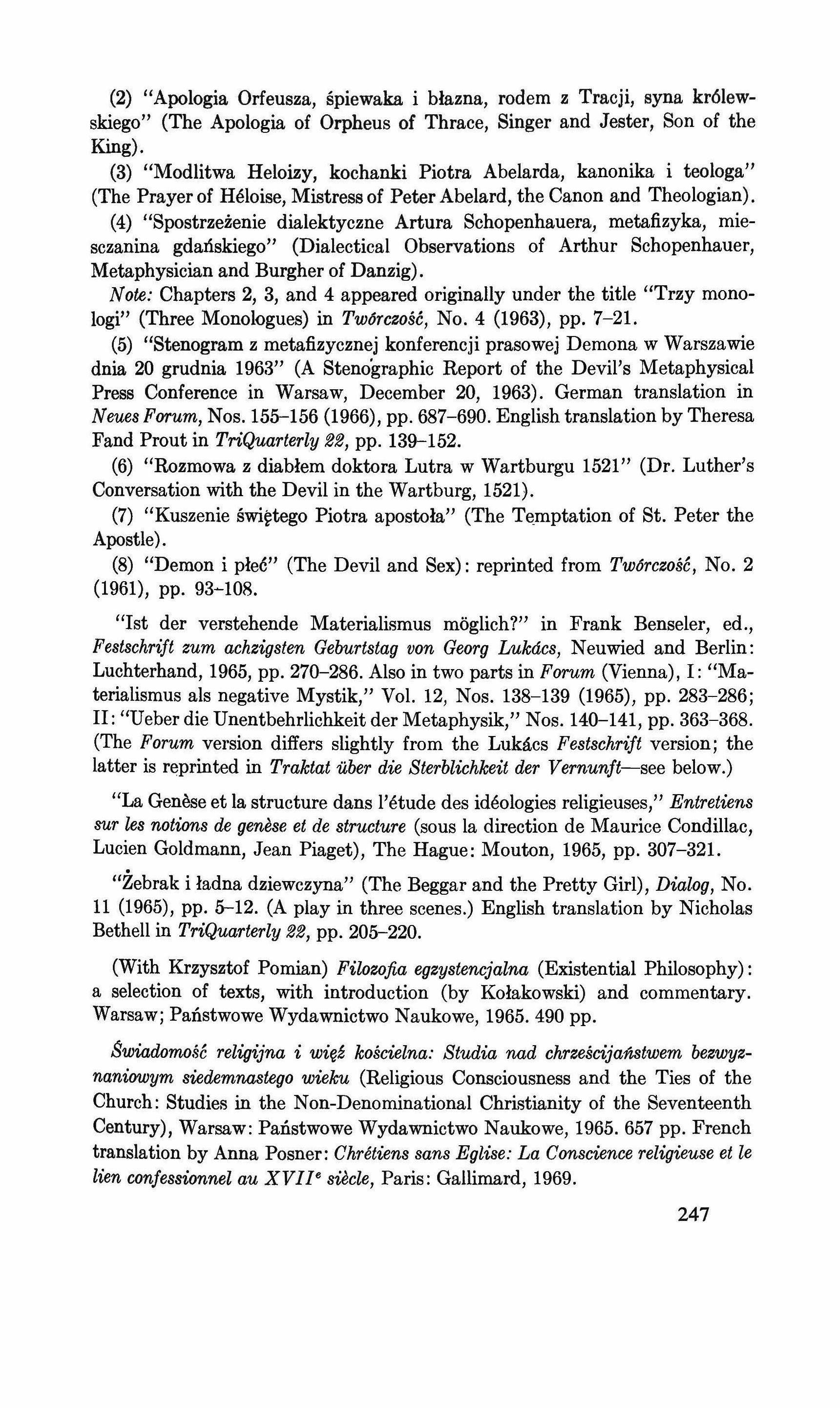
(2) "Apologia Orfeusza, spiewaka i blasna, rodem z Tracji, syna kr6lewskiego" (The Apologia of Orpheus of Thrace, Singer and Jester, Son of the King).
(3) "Modlitwa Heloizy, kochanki Piotra Abelarda, kanonika i teologa" (The Prayer of Heloise, Mistress of Peter Abelard, the Canon and Theologian).
(4) "Spostrzesenie dialektyczne Artura Schopenhauera, metafizyka, miesczanina gdariskiego" (Dialectical Observations of Arthur Schopenhauer, Metaphysician and Burgher of Danzig).
Note: Chapters 2, 3, and 4 appeared originally under the title "Trzy monologi" (Three Monologues) in Tw6rczosc, No.4 (1963), pp. 7-21.
(5) "Stenogram z metafizycznej konferencji prasowej Demona w Warszawie dnia 20 grudnia 1963" (A Stenographic Report of the Devil's Metaphysical Press Conference in Warsaw, December 20, 1963). German translation in Neuee Forum, Nos. 155-156 (1966), pp. 687-690. English translation by Theresa Fand Prout in TriQuarterly 22, pp. 139-152.
(6) "Rozmowa z diablem doktora Lutra w Wartburgu 1521" (Dr. Luther's Conversation with the Devil in the Wartburg, 1521).
(7) "Kuszenie swi�tego Piotra apostola" (The Temptation of St. Peter the Apostle).
(8) "Demon i plec" (The Devil and Sex): reprinted from Tw6rczosc, No.2 (1961), pp. 93-108.
"1st der verstehende Materialismus moglich?" in Frank Benseler, ed., Festschrift zum achzigsten Geburtstag von Georg Lukacs, Neuwied and Berlin: Luchterhand, 1965, pp. 270-286. Also in two parts in Forum (Vienna), I: "Materialismus als negative Mystik," Vol. 12, Nos. 138-139 (1965), pp. 283-286; II: "Ueber die Unentbehrlichkeit der Metaphysik," Nos. 140-141, pp. 363-368. (The Forum version differs slightly from the Lukacs Festschrift version; the latter is reprinted in Traktat uber die Sterblichkeit der Vernunft-see below.)
"La Genese et la structure dans l'etude des ideologies religieuses," Entretiens sur lee notions de genese et de structure (sous la direction de Maurice Condillac, Lucien Goldmann, Jean Piaget), The Hague: Mouton, 1965, pp. 307-321.
"Zebrak i ladna dziewczyna" (The Beggar and the Pretty Girl), Dialog, No. 11 (1965), pp. 5-12. (A play in three scenes.) English translation by Nicholas Bethell in TriQuarterly 22, pp. 205-220.
(With Krzysztof Pomian) Filozojia egzystencjalna (Existential Philosophy): a selection of texts, with introduction (by Kolakowski) and commentary. Warsaw; Panstwowe Wydawnictwo Naukowe, 1965.490 pp. 8wiadomo.§c religijna i wi�� koscielna: Studia nad chrzescijanstwem bezwyznaniowym siedemnastego wieku (Religious Consciousness and the Ties of the Church: Studies in the Non-Denominational Christianity of the Seventeenth Century), Warsaw: Panstwowe Wydawnictwo Naukowe, 1965. 657 pp. French translation by Anna Posner: Chretiens sans Eglise: La Conscience religieuse et le lien confessionnel au XVII" eiecle, Paris: Gallimard, 1969.
247
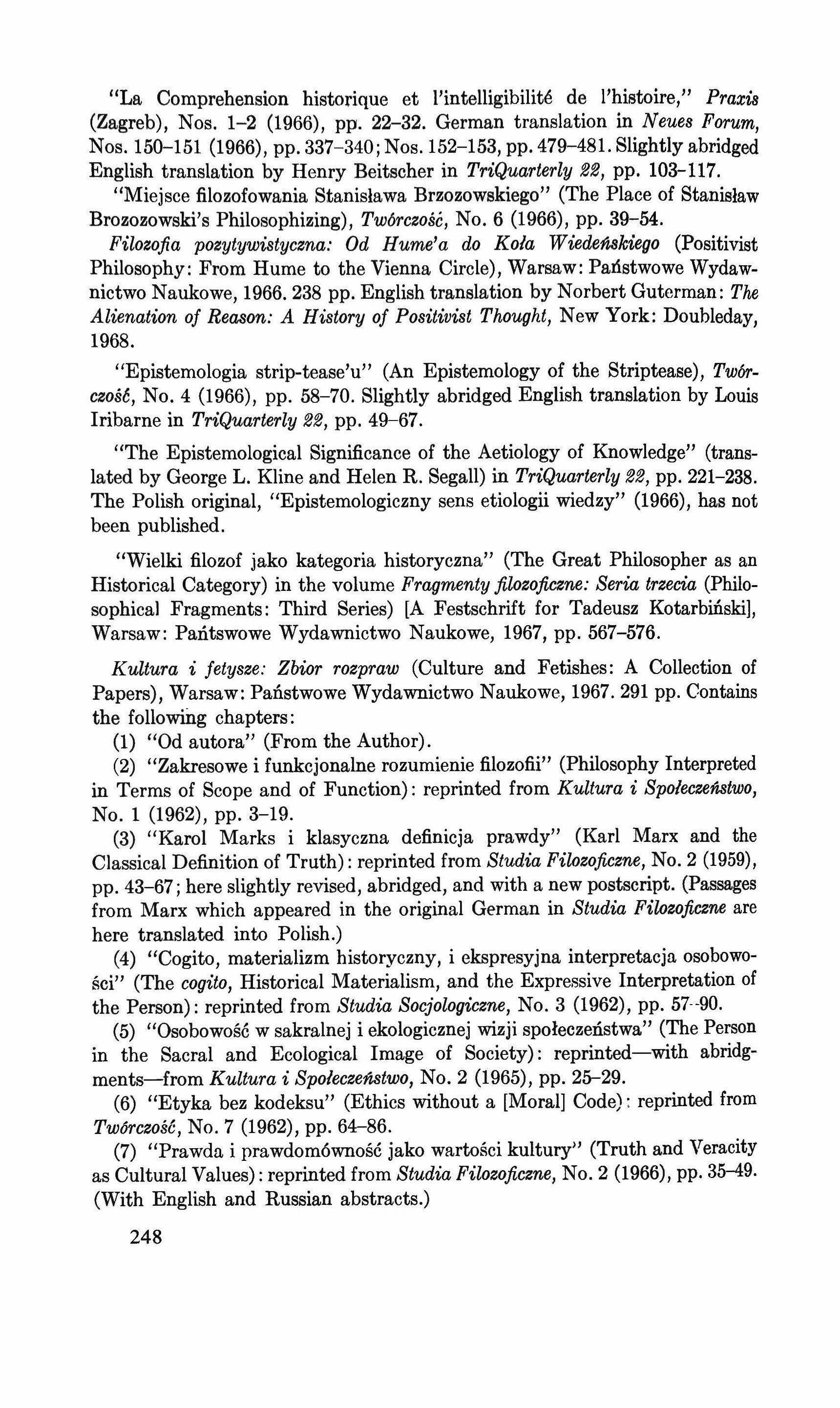
"La Comprehension historique et l'intelligibilite de l'histoire," Praxis (Zagreb), Nos. 1-2 (1966), pp, 22-32. German translation in Neues Forum, Nos. 150-151 (1966), pp. 337-340; Nos. 152-153, pp. 479-48l. Slightly abridged English translation by Henry Beitscher in TriQuarterly 22, pp. 103-117.
"Miejsce filozofowania Stanislawa Brzozowskiego" (The Place of Stanislaw Brozozowski's Philosophizing), Tw6rczosc, No.6 (1966), pp. 39-54.
Eilozofia pozytywistyczna: Od Hume'a do Kola Wiedenskiego (Positivist Philosophy: From Hume to the Vienna Circle), Warsaw: Panstwowe Wydawnictwo Naukowe, 1966.238 pp. English translation by Norbert Guterman: The Alienation oj Reason: A History oj Positivist Thought, New York: Doubleday, 1968.
"Epistemologia strip-tease'u" (An Epistemology of the Striptease), Tw6rczos6, No.4 (1966), pp. 58-70. Slightly abridged English translation by Louis Iribarne in TriQuarterly 22, pp. 49-67.
"The Epistemological Significance of the Aetiology of Knowledge" (translated by George L. Kline and Helen R. Segall) in TriQuarterly 22, pp. 221-238. The Polish original, "Epistemologiczny sens etiologii wiedzy" (1966), has not been published.
"Wielki filozof jako kategoria historyczna" (The Great Philosopher as an Historical Category) in the volume Fragmenty filozoficene: Seria trzecia (Philosophical Fragments: Third Series) [A Festschrift for Tadeusz Kotarbiriski], Warsaw: Paritswowe Wydawnictwo Naukowe, 1967, pp. 567-576.
Kultura i jetysze: Zbior rozpraw (Culture and Fetishes: A Collection of Papers), Warsaw: Panstwowe Wydawnictwo Naukowe, 1967.291 pp. Contains the following chapters:
(1) "Od autora" (From the Author).
(2) "Zakresowe i funkcjonalne rozumienie filozofii" (Philosophy Interpreted in Terms of Scope and of Function): reprinted from Kultura i Spoleczenstwo, No.1 (1962), pp. 3-19.
(3) "Karol Marks i klasyczna definicja prawdy" (Karl Marx and the Classical Definition of Truth): reprinted from Studia Filozoficene, No.2 (1959), pp. 43-67; here slightly revised, abridged, and with a new postscript. (Passages from Marx which appeared in the original German in Studia Filozojiczne are here translated into Polish.)
(4) "Cogito, materializm historyczny, i ekspresyjna interpretacja osobowosci" (The cogito, Historical Materialism, and the Expressive Interpretation of the Person): reprinted from Studia Socjologiczne, No.3 (1962), pp. 57--90.
(5) "Osobowose w sakralnej i ekologicznej wizji spoleczeIistwa" (The Person in the Sacral and Ecological Image of Society): reprinted-with abridgments-from Kultura i Spoleczenstwo, No.2 (1965), pp. 25-29.
(6) "Etyka bez kodeksu" (Ethics without a [Moral] Code): reprinted from Tw6rczosc, No.7 (1962), pp. 64--86.
(7) "Prawda i prawdomownosc jako wartosoi kultury" (Truth and Veracity as Cultural Values): reprinted from Studia Filozoficene, No.2 (1966), pp. 35-49. (With English and Russian abstracts.)
248
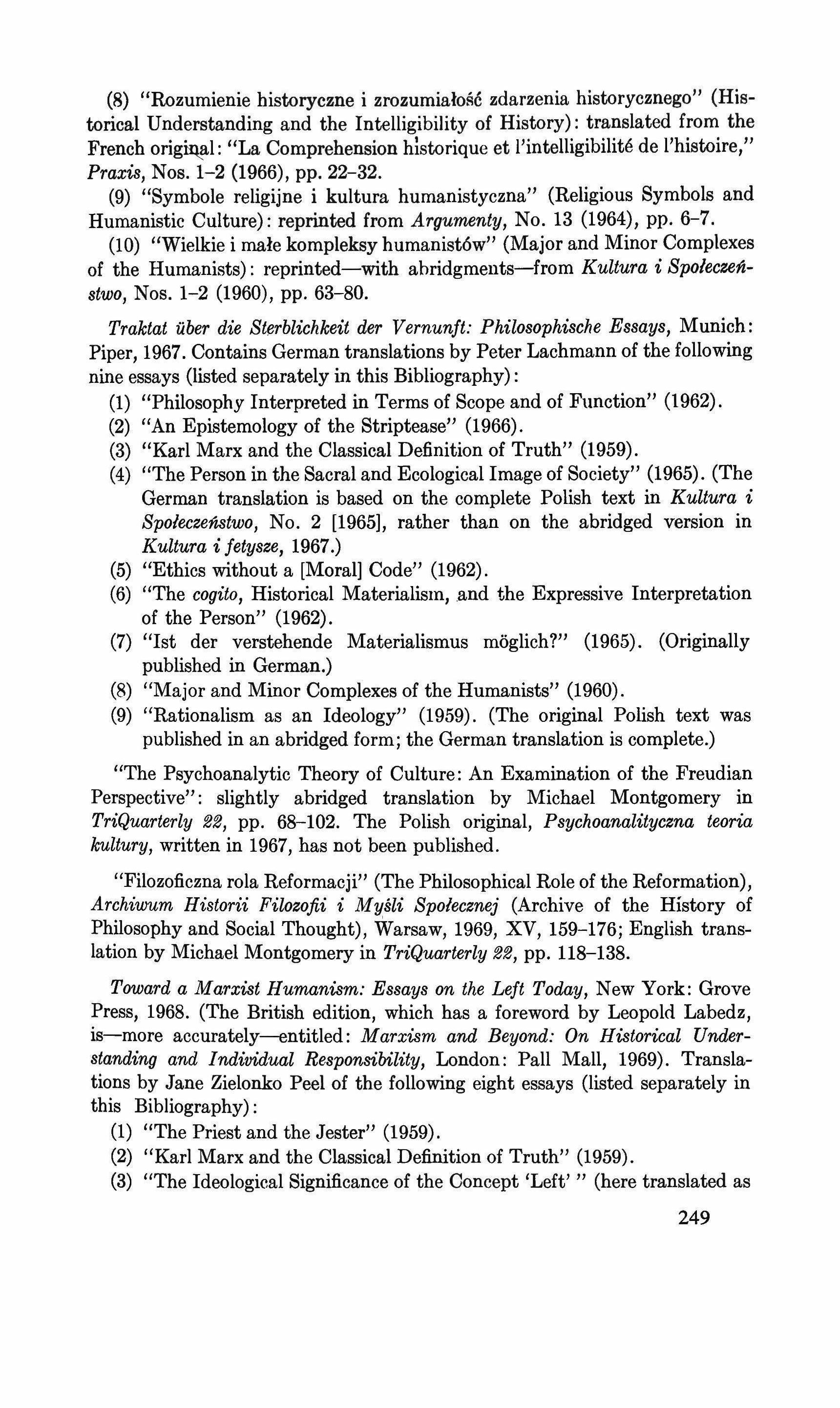
(8) "Rozumienie historyczne i zrozumialosc zdarzenia historycznego" (Historical Understanding and the Intelligibility of History): translated from the French original: "La Comprehension historique et l'intelligibilite de l'histoire," Praxis, Nos. 1-2 (1966), pp. 22-32.
(9) "Symbole religijne i kultura humanistyczna" (Religious Symbols and Humanistic Culture): reprinted from Argumenty, No. 13 (1964), pp. 6-7.
(10) "Wielkie i male kompleksy humanist6w" (Major and Minor Complexes of the Humanists): reprinted-with ahridgments-from Kultura i Spoleczenstwo, Nos. 1-2 (1960), pp. 63-80.
Traktat ilber die Sterblichkeit der Vernunft: Philosophische Essays, Munich: Piper, 1967. Contains German translations by Peter Lachmann of the following nine essays (listed separately in this Bibliography) :
(1) "Philosophy Interpreted in Terms of Scope and of Function" (1962).
(2) "An Epistemology of the Striptease" (1966).
(3) "Karl Marx and the Classical Definition of Truth" (1959).
(4) "The Person in the Sacral and Ecological Image of Society" (1965). (The German translation is based on the complete Polish text in Kultura i Spoleczenstwo, No. 2 [1965], rather than on the abridged version in Kultura i fetysze, 1967.)
(5) "Ethics without a [Moral] Code" (1962).
(6) "The cogito, Historical Materialism, and the Expressive Interpretation of the Person" (1962).
(7) "Ist der verstehende Materialismus moglich?" (1965). (Originally published in German.)
(8) "Major and Minor Complexes of the Humanists" (1960).
(9) "Rationalism as an Ideology" (1959). (The original Polish text was published in an abridged form; the German translation is complete.)
"The Psychoanalytic Theory of Culture: An Examination of the Freudian Perspective" : slightly abridged translation by Michael Montgomery in TriQuarterly 22, pp. 68-102. The Polish original, Psychoanalityczna teoria kultury, written in 1967, has not been published.
"Filozoficzna rola Reformacji" (The Philosophical Role of the Reformation), Archiwum Historii Filozojii i Mysli Spolecznej (Archive of the History of Philosophy and Social Thought), Warsaw, 1969, XV, 159-176; English translation by Michael Montgomery in TriQuarterly 22, pp. 118-138.
Toward a Marxist Humanism: Essays on the Left Today, New York: Grove Press, 1968. (The British edition, which has a foreword by Leopold Labedz, is-more accurately--entitled: Marxism and Beyond: On Historical Understanding and Individual Responsibility, London: Pall Mall, 1969). Translations by Jane Zielonko Peel of the following eight essays (listed separately in this Bibliography):
(1) "The Priest and the Jester" (1959).
(2) "Karl Marx and the Classical Definition of Truth" (1959).
(3) "The Ideological Significance of the Concept 'Left' (here translated as 249
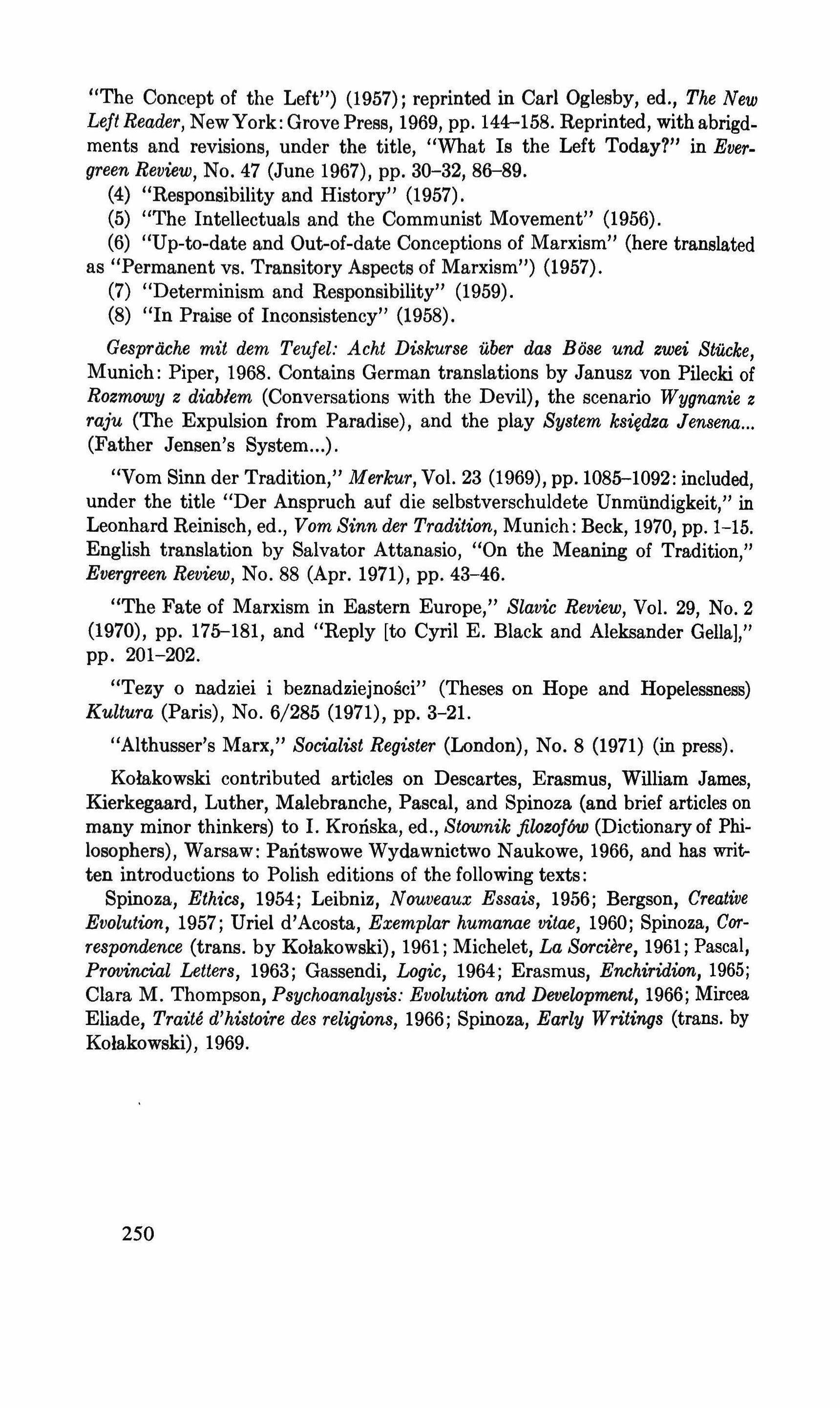
"The Concept of the Left") (1957); reprinted in Carl Oglesby, ed., The New Left Reader, NewYork: Grove Press, 1969, pp. 144-158. Reprinted, with abrigdments and revisions, under the title, "What Is the Left Today?" in Evergreen Review, No. 47 (June 1967), pp. 30-32, 86-89.
(4) "Responsibility and History" (1957).
(5) "The Intellectuals and the Communist Movement" (1956).
(6) "Up-to-date and Out-of-date Conceptions of Marxism" (here translated as "Permanent vs, Transitory Aspects of Marxism") (1957).
(7) "Determinism and Responsibility" (1959).
(8) "In Praise of Inconsistency" (1958).
Gesprache mit dem Teufel: Acht Di.,kurse uber das Bose und zwei Stucke, Munich: Piper, 1968. Contains German translations by Janusz von Pilecki of Rozmowy z diablem (Conversations with the Devil), the scenario Wygnanie z raju (The Expulsion from Paradise), and the play System ksi�dza Jensena (Father Jensen's System ).
"Vom Sinn der Tradition," Merkur, Vol. 23 (1969), pp.l085-1092: included, under the title "Der Anspruch auf die selbstverschuldete Unmftndigkeit," in Leonhard Reinisch, ed., Yom Sinn der Tradition, Munich: Beck, 1970, pp. 1-15. English translation by Salvator Attanasio, "On the Meaning of Tradition," Evergreen Review, No. 88 (Apr. 1971), pp. 43-46.
"The Fate of Marxism in Eastern Europe," Slavic Review, Vol. 29, No.2 (1970), pp. 175-181, and "Reply [to Cyril E. Black and Aleksander Gella]," pp. 201-202.
"Tezy 0 nadziei i beznadsiejnosoi" (Theses on Hope and Hopelessness) Kultura (Paris), No. 6/285 (1971), pp. 3-21.
"Althusser's Marx," Socialist Register (London), No.8 (1971) (in press).
Kolakowski contributed articles on Descartes, Erasmus, William James, Kierkegaard, Luther, Malebranche, Pascal, and Spinoza (and brief articles on many minor thinkers) to I. Kroriska, ed., Stownik jilozoJbw (Dictionary of Philosophers), Warsaw: Paritswowe Wydawnictwo Naukowe, 1966, and has written introductions to Polish editions of the following texts: Spinosa, Ethics, 1954; Leibniz, Nouveaux Essais, 1956; Bergson, Creative Evolution, 1957; Uriel d'Acosta, Exemplar humanae vitae, 1960; Spinoza, Correspondence (trans. by Kolakowski), 1961; Michelet, La Sorciere, 1961; Pascal, Provincial Letters, 1963; Gassendi, Logic, 1964; Erasmus, Enchiridion, 1965; Clara M. Thompson, Psychoanalysis: Evolution and Development, 1966; Mircea Eliade, Traite d'histoire des religions, 1966; Spinoza, Early Writings (trans. by Kolakowski), 1969.
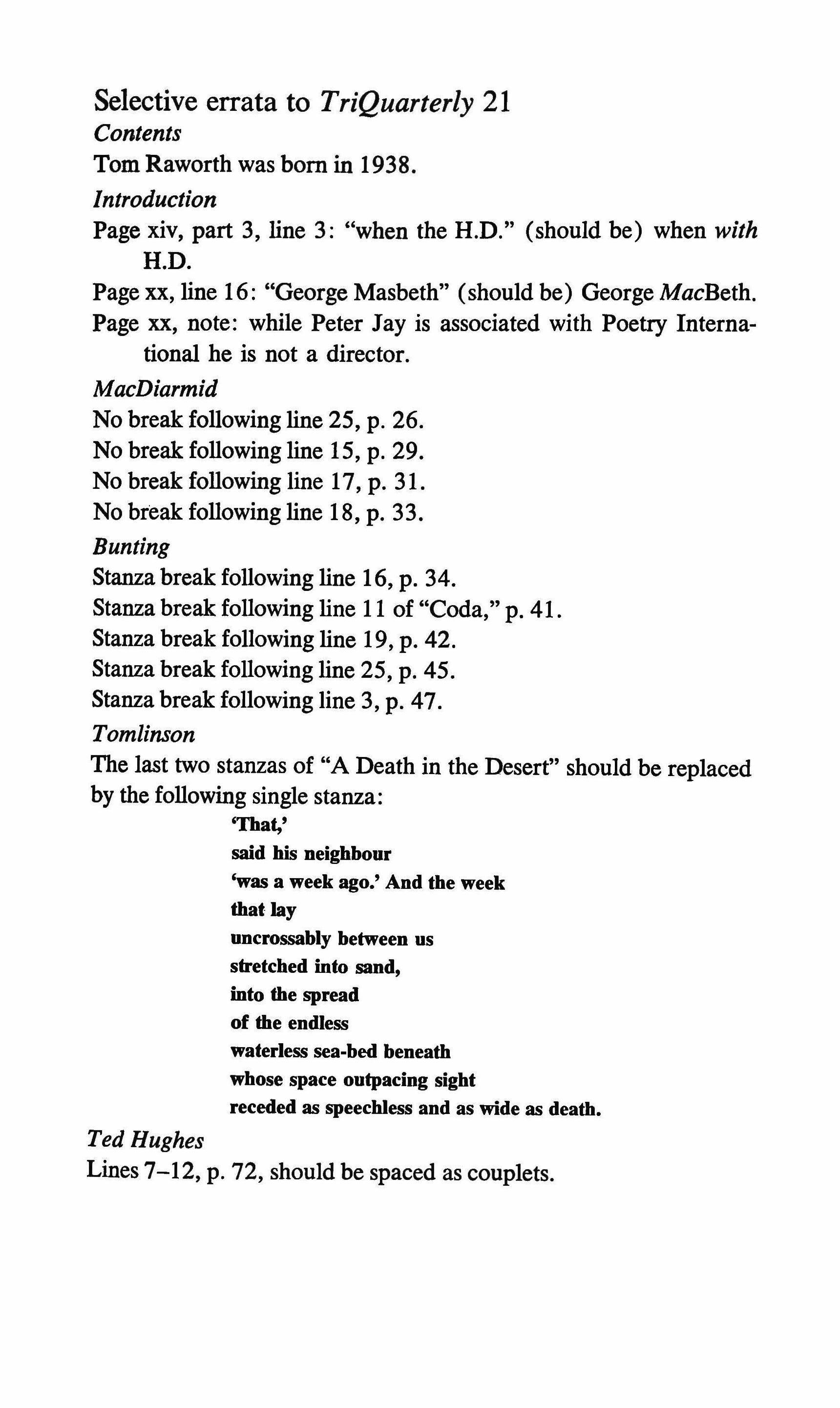
Tom Raworth was born in 1938.
Introduction
Page xiv, part 3, line 3: "when the H.D." (should be) when with H.D.
Page xx, line 16: "George Masbeth" (should be) George MacBeth.
Page xx, note: while Peter Jay is associated with Poetry International he is not a director.
MacDiarmid
No break following line 25, p. 26.
No break following line IS, p. 29.
No break following line 17, p. 31.
No break following line 18, p. 33.
Bunting
Stanza break following line 16, p. 34.
Stanza break following line 11 of "Coda," p. 41.
Stanza break following line 19, p. 42.
Stanza break following line 25, p. 45.
Stanza break following line 3, p. 47.
Tomlinson
The last two stanzas of "A Death in the Desert" should be replaced by the following single stanza: 'That,' said his neighbour 'was a week ago.' And the week that lay uncrossably between us stretched into sand, into the spread of the endless waterless sea-bed beneath whose space outpacing sight receded as speechless and as wide as death.
Ted Hughes
Lines 7-12, p. 72, should be spaced as couplets.
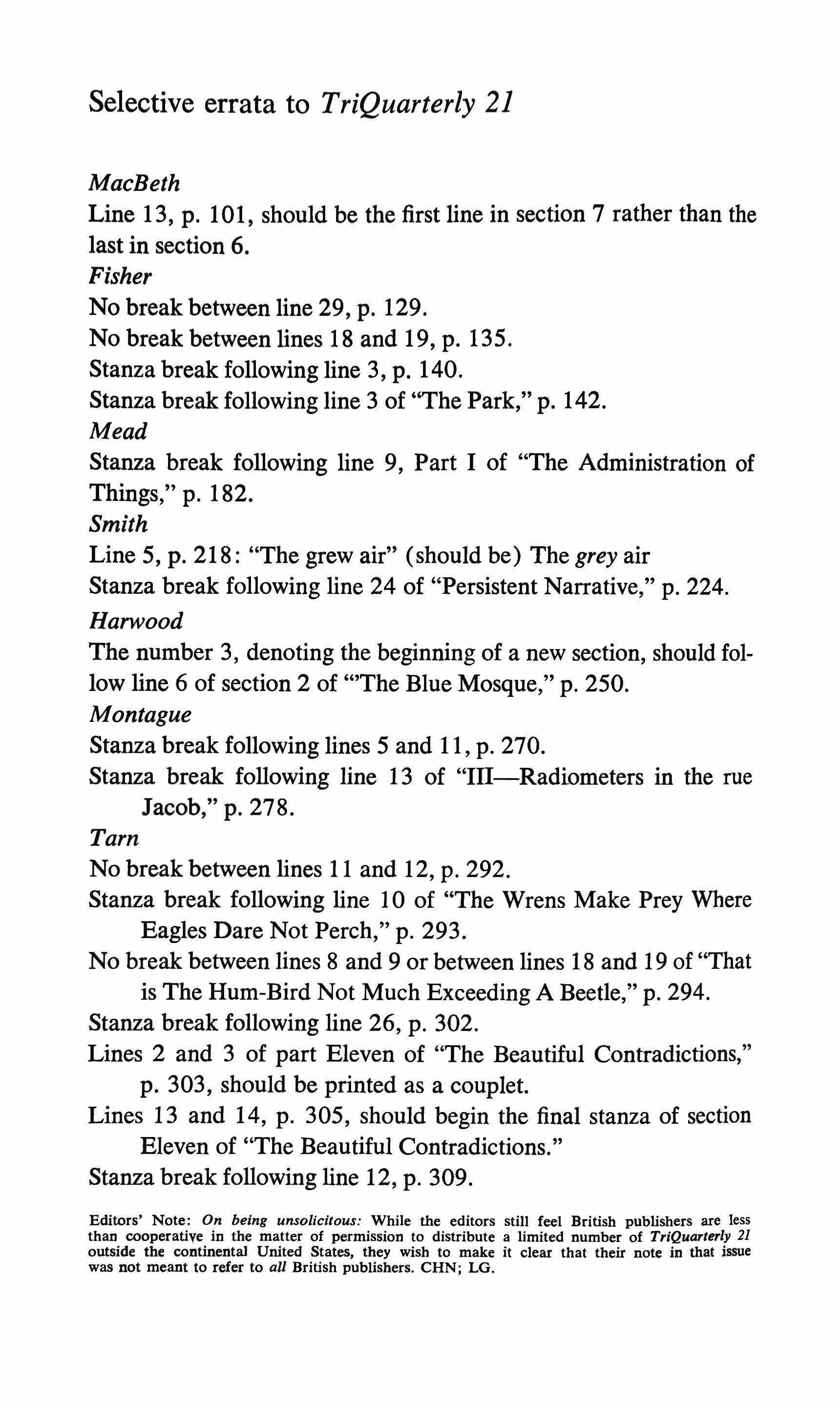
MacBeth
Line 13, p. 101, should be the first line in section 7 rather than the last in section 6.
Fisher
No break between line 29, p. 129.
No break between lines 18 and 19, p. 135.
Stanza break following line 3, p. 140.
Stanza break following line 3 of "The Park," p. 142.
Mead
Stanza break following line 9, Part I of "The Administration of Things," p. 182.
Smith
Line 5, p. 218: "The grew air" (should be) The grey air
Stanza break following line 24 of "Persistent Narrative," p. 224.
Harwood
The number 3, denoting the beginning of a new section, should follow line 6 of section 2 of "'The Blue Mosque," p. 250.
Montague
Stanza break following lines 5 and 11, p. 270.
Stanza break following line 13 of "III-Radiometers in the rue Jacob," p. 278.
Tarn
No break between lines 11 and 12, p. 292.
Stanza break following line 10 of "The Wrens Make Prey Where Eagles Dare Not Perch," p. 293.
No break between lines 8 and 9 or between lines 18 and 19 of "That is The Hum-Bird Not Much Exceeding A Beetle," p. 294.
Stanza break following line 26, p. 302.
Lines 2 and 3 of part Eleven of "The Beautiful Contradictions," p. 303, should be printed as a couplet.
Lines 13 and 14, p. 305, should begin the final stanza of section Eleven of "The Beautiful Contradictions."
Stanza break following line 12, p. 309.
Editors' Note: On being unsolicitous: While the editors still feel British publishers are less than cooperative in the matter of permission to distribute a limited number of TriQuarterly 21 outside the continental United States, they wish to make it clear that their note in that issue was not meant to refer to all British publishers. CHN; LG.
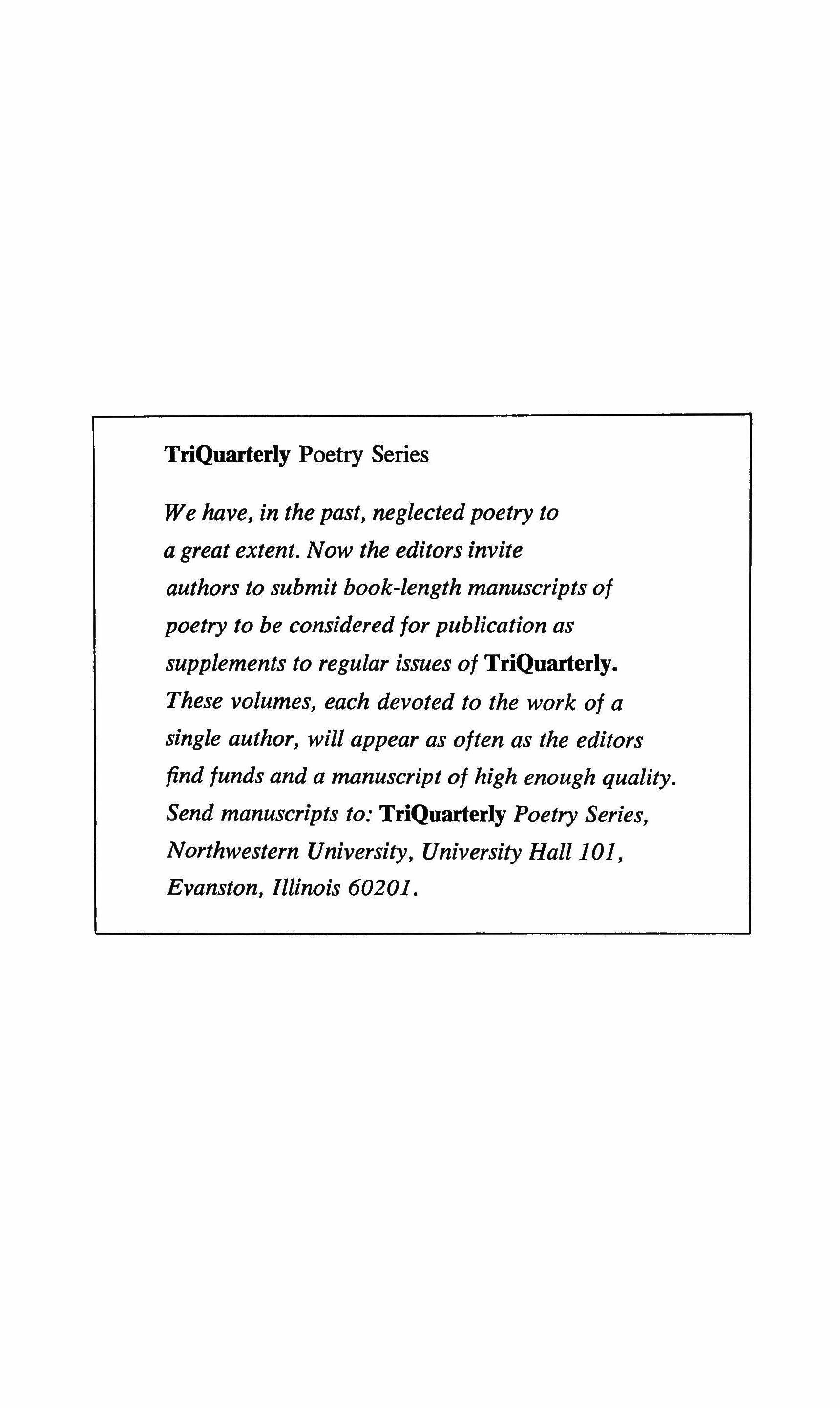
We have, in the past, neglected poetry to a great extent. Now the editors invite authors to submit book-length manuscripts of poetry to be considered for publication as supplements to regular issues of TriQuarterly. These volumes, each devoted to the work of a single author, will appear as often as the editors find funds and a manuscript of high enough quality. Send manuscripts to: TriQuarterIy Poetry Series, Northwestern University, University Hall 101 Evanston, Illinois 60201.

"This work contains three groups of splendid poems: the impressive, multisectioned main title work a remarkable poem [which] seems to have as heroine the very Incan earth and culture [and] makes this volume unique; then Choices, nine poems including 'The Great Odor of Summer' (it is said it brought a Princeton audience to its feet when read there last June after Kent State); and October, eleven poems concluding with a stern elegy which gives Tarn's deep feeling for his Jewish past and its suffering. No library dare miss this volume by the author of Beautiful Contradictions."-Library Journal
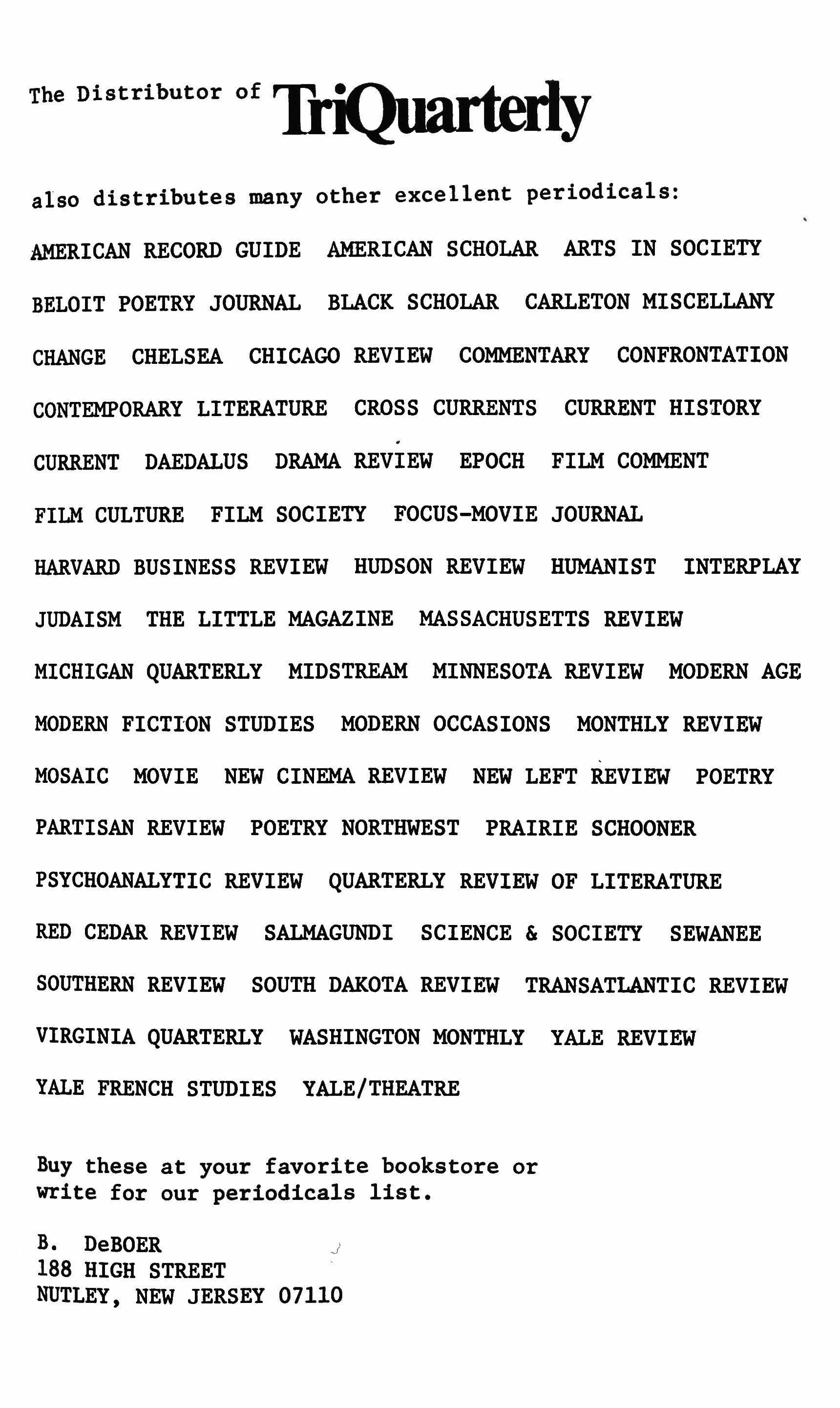
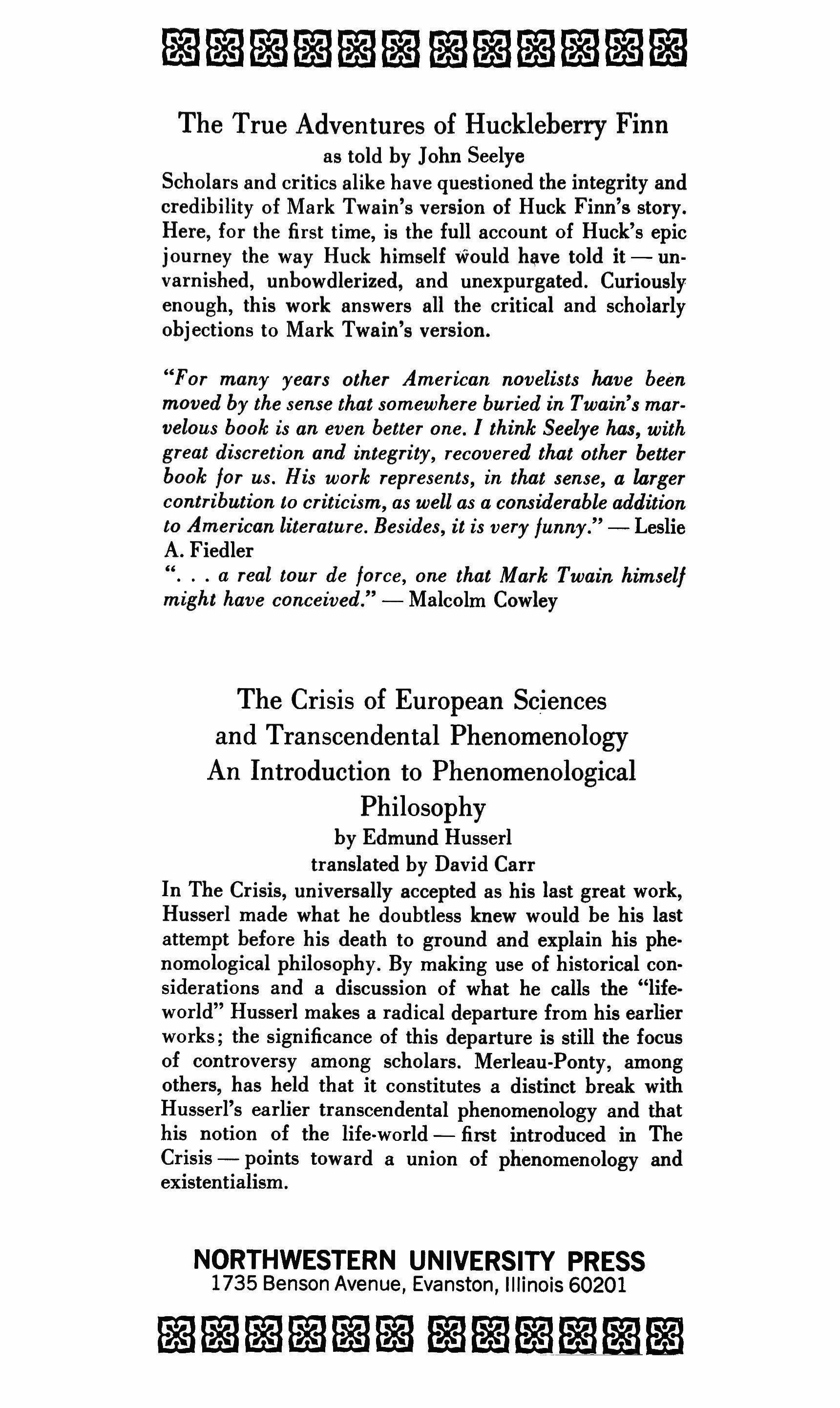
as told by John Seelye
Scholars and critics alike have questioned the integrity and credibility of Mark Twain's version of Huck Finn's story. Here, for the first time, is the full account of Huck's epic journey the way Huck himself would have told it - unvarnished, unbowdlerized, and unexpurgated. Curiously enough, this work answers all the critical and scholarly objections to Mark Twain's version.
"For many years other American novelists have been moved by the sense that somewhere buried in Twain's marvelous book is an even better one. I think Seelye has, with great discretion and integrity, recovered that other better book lor us. His work represents, in that sense, a larger contribution to criticism, as well as a considerable addition to American literature. Besides, it is very [unny:" - Leslie A. Fiedler a real tour de [orce, one that Mark Twain himself might have conceived." - Malcolm Cowley
In The Crisis, universally accepted as his last great work, Husserl made what he doubtless knew would be his last attempt before his death to ground and explain his phenomological philosophy. By making use of historical considerations and a discussion of what he calls the "lifeworld" Husserl makes a radical departure from his earlier works; the significance of this departure is still the focus of controversy among scholars. Merleau-Ponty, among others, has held that it constitutes a distinct break with Husserl's earlier transcendental phenomenology and that his notion of the life-world - first introduced in The Crisis - points toward a union of phenomenology and existentialism.

can rightly be called a pioneer of post-Marxist socialist ethics. In other words, Kolakowski's ethical vision is existential without being existentialist, rational though not necessarily rationalistic and is in a state of constant flux and revision. Kolakowski's work abounds in paradoxes and is not exempt from contradictions. Yet his liberation from the dead hand of the past, from external and internal constraints, is a difficult and contradictory process open to unexpected setbacks and pseudo-liberation. Most significant perhaps is his insistence that a classless and free society is guaranteed neither by science nor by history. For all his recent emphasis on faith and individual responsibility, Kolakowski is a major figure of the Second Enlightenment.
from theforeward by George Gomori
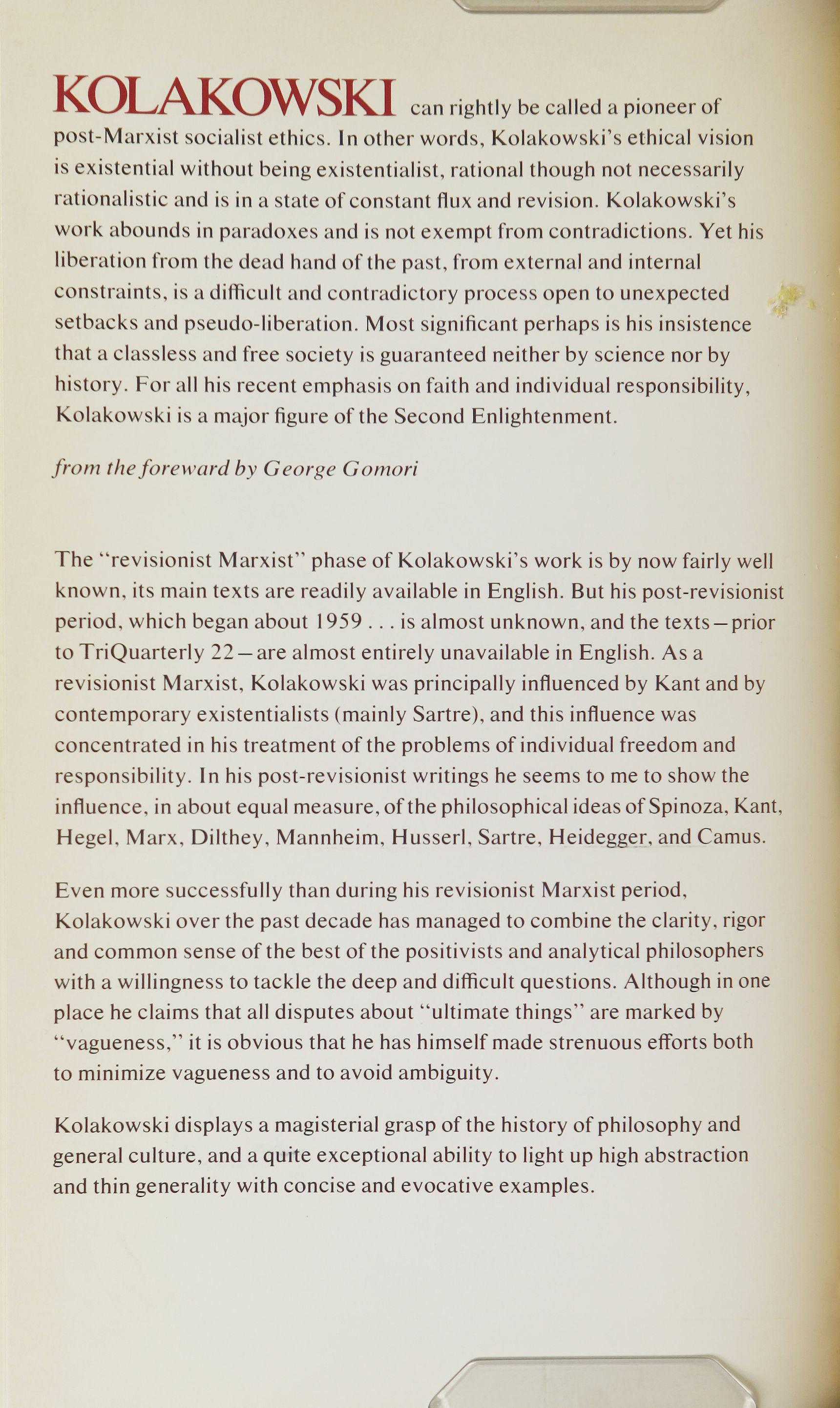
The "revisionist Marxist" phase of Kolakowski's work is by now fairly well known, its main texts are readily available in English. But his post-revisionist period, which began about 1959 is almost unknown, and the texts - prior to TriQuarterly 22 - are almost entirely unavailable in English. As a revisionist Marxist, Kolakowski was principally influenced by Kant and by contemporary existentialists (mainly Sartre), and this influence was concentrated in his treatment of the problems of individual freedom and responsibility. In his post-revisionist writings he seems to me to show the influence, in about equal measure, of the philosophical ideas ofSpinoza, Kant, Hegel, Marx, Dilthey, Mannheim, Husserl, Sartre, Heidegger, and Camus.
Even more successfully than during his revisionist Marxist period, Kolakowski over the past decade has managed to combine the clarity, rigor and common sense of the best of the positivists and analytical philosophers with a willingness to tackle the deep and difficult questions. Although in one place he claims that all disputes about "ultimate things" are marked by "vagueness," it is obvious that he has himself made strenuous efforts both to minimize vagueness and to avoid ambiguity.
Kolakowski displays a magisterial grasp of the history of philosophy and general culture, and a quite exceptional ability to light up high abstraction and thin generality with concise and evocative examples. /